The Double Blue International
Wesley College Colombo - Sri Lanka
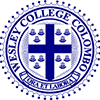
Our Distinguished Past Students
The Prestigious Hill Medal is awarded to the Best Scholar in the School
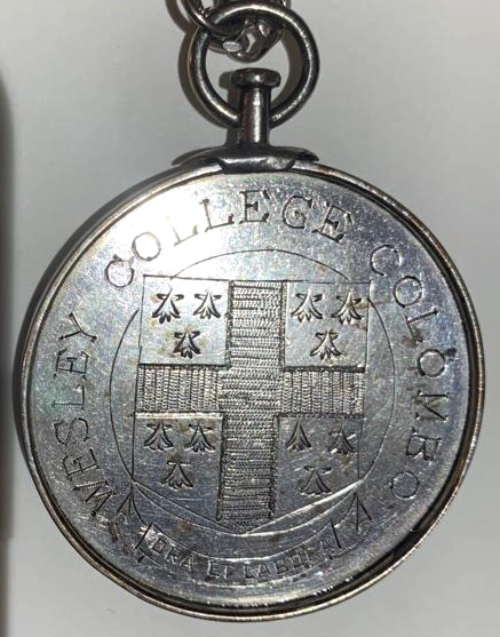
.........................................................................
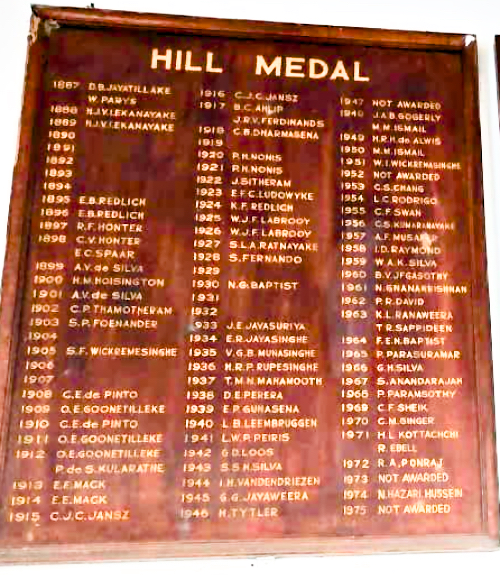
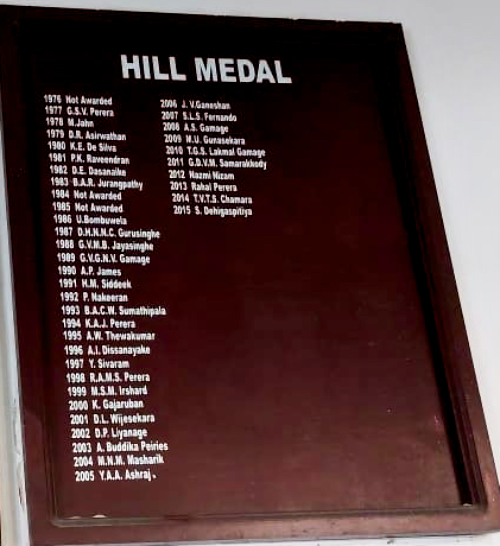
.........................................................................
Double Click the link below
The History of the Hill Medal
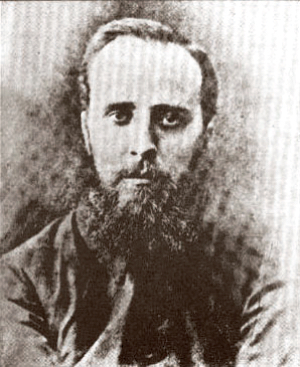
Hill Medal is a prestigious award, a unique honour, given at the Annual Prize Giving Ceremony to the student who has received the highest aggregate marks at the University Entrance examination. There is a board in the Great hall to honour those students whose names are inscribed in bold white.
The Hill Medal was first awarded in 1887 when the School was in Dam Street Pettah. This was before the Highfield era during the Principalship of Rev Thomas Moscrop. The first winner was Don Baron Jayatilleke later Sir D.B Jayatilleke. He was an educationalist, statesmen and diplomat. He was Vice-President of the Legislative Council of Ceylon; the Minister for Home Affairs and Leader of the House of the State Council of Ceylon; and Representative of Government of Ceylon in New Delhi.
The Medal is named after Rev Samuel Hill. He was born in Lancaster on 8th December, 1853, became a missionary in 1878. He arrived in Ceylon a year later, succeeding Rev. Langdon as the principal of Richmond College. He did a distinctive service, specially in raising the standard of the school in the academic context. During his period, the boys of Richmond excelled in public examinations. It was on his recommendation as principal that the decision was taken by the District Committee of the Methodist Mission to rename the school as Richmond College. Rev. Hill has published a few books on English grammar. Professor D. M. De Z. Wickremasinghe, who was a famous scholar, was a pupil of Rev. Hill. He left Richmond in 1882 and for nearly two years did missionary work in Moratuwa. He also held the post of principal of Wesley College from 1883-85. Rev. Hill died in Colombo on 25th November 1885, age 32, after a brief illness which was thought to be not serious.
This most coveted scholarship was awarded in memory of Rev. Daniel John Gogerly. It was first awarded in 1874 by Rev S.R Wilkin. He writes: The Gogerly Scholarship to the value of Rs 120.00 a year, tenable for 2 years is open to competition for all students of the College. Presently, this prestigious award is presented at the Annual Prize Giving Ceremony to the student with the best results at the GCE (ordinary level) examination.
I was greatly honoured to win the Gogerly's Scholarship in 1959.
I remember a student, J.A.B Gogerly, who proceeded to the Engineering Faculty of the University of Ceylon in 1950 and became a lecturer in the Faculty. We also had John Gogerly who taught us woodwork/carpentry in the Primary School in the 1950's. They may be descendants of the illustrious Daniel John Gogerly.
From the Royal Asiatic Society Archives - Researched by Dr Nihal D Amerasekera
Daniel John Gogerly (1792-1862) was a British Wesleyan Methodist missionary, who served in Ceylon from 1818, never returning to England. He was one of the first British translators of the Pāli texts into English, and the greater part of his time was spent in research work in the literature of Ceylon Buddhism. His aim was to accurately portray Buddhism, but he also used his translations to highlight differences between Buddhism and Christianity in furtherance of his missionary agenda. Overall, Gogerly is important not only because his translations were so early but also because the differing factors that conditioned them underscore the complexity within any study of orientalist representations of Buddhism.
After passing several years in general studies, and particularly in earnest preparation for the ministry, he proceeded to Ceylon in 1818, to take charge of the Wesleyan Mission Press at Colombo. From the time of his arrival, he engaged in the study of the vernacular tongues, and was one of the first missionaries who preached extemporaneously in the Sinhalese language. While at Negombo, where he was stationed from 1822 to 1834, he began the study of Pali.
His principal publications consist in essays and translations contributed to the pages of various local periodicals and the Journal of the Ceylon Branch of the Royal Asiatic Society, of which he became in succession secretary, vice-president, and president. These papers are of value to researchers, as records of ancient Pali treatises, of which neither translations nor printed editions existed before Gogerly. His 'Dictionary of the Pali language' could be considered his greatest literary work. He had begun to compile it while at Mathura, and continued adding to it constantly as his reading became more extensive, so that at the time of his death it contained 15,000 words.
Gogerly died at the Wesleyan Mission House, Colpetty, near Colombo, in 1862
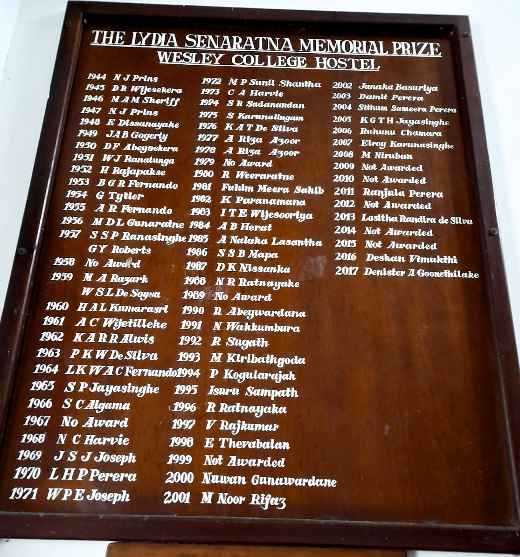
From Dr Nihal D Amerasekera
Lydia Senaratne was a coveted award presented to the Best All Round student in the Hostel. After much searching of the Methodist archives and the internet I found relevant information as to the origin of this award.
Rev G.A.F Senaratne was a well known Methodist Minister in Ceylon from the early to the middle years of the 20th Century. It is doubtful that any single event has had a more profound and far-reaching impact on the political history of Colonial Ceylon than the race riots of 1915. The heavy handed actions of colonial authorities to suppress the riots and the punishments handed down by it were heavily criticized in the Legislative Council. There were many killings, scores were wounded and hundreds of houses burnt down. Rev G.A.F Senaratne's work and mission during the Race Riots in 1915 was greatly appreciated and admired by the public. His kindness, concern and support for the injured during those harrowing times are well documented. Rev.G.A.F.Senaratne and the Colombo City Mission lost no time in organizing public relief for the wounded and homeless in the riots that shook the nation. In his book “Riots and Martial Law in Ceylon” Hon.P. Ramanathan makes special reference to the tremendous social and community work done by Rev. Senaratne at this most challenging and diffcult time in Ceylon.
Rev G.A.F Senaratne was appointed the first Ceylonese secretary of the Methodist Synod circa 1940. He later became the Chairman of the Synod, a most prestigious position for a Ceylonese during the British Colonial period.
In September 1944, Rev William Holden bade farewell to Wesley. Then Rev. G.A.F. Senaratne acted as Principal until Rev. James Cartman arrived in March 1945.
Rev G.A.F Senaratne's wife was Lydia Senaratne. I presume this award was made in her name after her demise when Rev Senaratne was Acting Principal 1944/45. The first award was made in 1944 to N.J Prins which he would have received at the Prize Giving ceremony in 1945.
Rev G.A.F and Lydia Senaratne had a son, Paul Senaratne. He rose to the prestigious position of Chief Engineer at Ceylon Government Railways (C.G.R) . In the 1960's Paul Senaratne was a regular spectator at Cricket matches at Campbell Park. He passed away in 2001. His sons Jagath and Gayan were students at Wesley College.
As the boarding does not exist anymore this Award will not be presented in the future, until of course the Hostel is revived.
The distinguished first recipient of this fine award in 1944 was Nathaniel James PRINS. After emigration to Melbourne in 1967 he became a Manager of a Trust Fund. N.J Prins remained a loyal old boy all through his life. Many of those who won this award became honoured and valued members of society like M.A.M Sheriff, J.A.B Gogerly, Dr MDL Gunaratne, Dr P.K.W De Silva, Dr WSL de Zoysa and KRR Ranjit Alwis to name but a few. Some joined as teachers at Wesley College like Edmund Dissanayake, D.F Abeysekera and Henry Rajapaksa.
I do wish and hope this board with the names will be preserved for posterity as a tribute to Lydia Senaratne. We must also remember the many winners of this award for their immense contribution to the school and the boarding. This is part of our precious history.
Links to further reading
Transcribed form the 150th Anniversary Chronicle
During the tenure of Rev. Albert Hutchinson, the Prefect system was introduced to the College which Rev. P.T. Cash started for the Hostel. Every student appointed as a Prefect was inducted at a full Assembly in the hall. A book was placed on the Principals table on the stage and the appointed Prefects walked up when called by name and signed the book in the presence of the whole school accepting the office of Prefect and its privileges and responsibilities.
As the years rolled on, the tradition has changed in modern times where the prefects are called on to the stage at assembly and a prefects badge is handed to them by the Principal.
In the case of the induction of the Senior Prefect, the tradition followed today is where the outgoing Senior Prefect or the Head Prefect as it was known in the past exchanges his jacket with the in-coming Senior Prefect. The same tradition is followed for the induction of the Deputy Senior Prefects and the pinning of the Senior and Deputy Prefects badge is done by the Principal.
The Prefectships and its Power and the Glory by Dr Nihal D Amerasekera
'Praefectus' is an Ancient Roman term given to a person who has been given administrative responsiblities. The power was conferred by delegation from a higher authority.
In the 1920's the Prefects system was already well established in the famous public schools of England. School Prefects are chosen by the staff. They are usually year 6 pupils who are considered as model pupils! Prefectship is considered to be a prestigious position. Each year prefects are appointed, all of whom have significant and notable achievements in their time at school. The role of Prefect is an important one and if selected will be accepting a position of considerable responsibility. It will provide them the opportunity to develop leadership skills. Prefects have a significant influence on the daily life of the school. These prefects also take on additional school responsibilities.
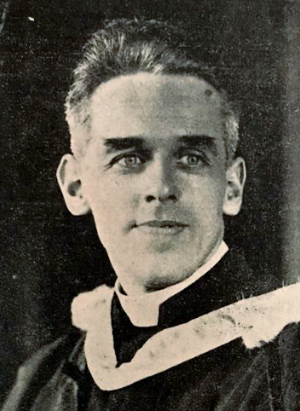 The Prefectships at Wesley were established by Rev Albert Hutchinson who succeeded The Great Rev Henry Highfield as the Principal of Wesley College Colombo. He will be forever remembered for the introduction of the House System and the Prefect System to the school. These made a huge difference to the life of the school.Those systems have evolved further and are well established to the present day.
The Prefectships at Wesley were established by Rev Albert Hutchinson who succeeded The Great Rev Henry Highfield as the Principal of Wesley College Colombo. He will be forever remembered for the introduction of the House System and the Prefect System to the school. These made a huge difference to the life of the school.Those systems have evolved further and are well established to the present day.
We all have had encounters with prefects during our time at school. Some of us have been Prefects in our senior years. I recall with great clarity seeing the Prefects and the Sub Prefects standing to attention around in the Great Hall at Assembly.
Prefects are an august body at school and play an essential role in maintaining law and order. The selection of prefects was widely believed to be based purely on merit. But there tended to be an (unintended) bias in favour of sportsmen as opposed to scholars. The School appoints Prefects each year to undertake various roles and responsibilities around the school. This is a perfect role for senior students who want to take on extra responsibility, extend their experience and provide themselves with opportunities which will support their applications to university and to work. They provide student leadership, guidance and link students to the administration. They are responsible for discipline and enforcement of school rules. Prefects are chosen for their prowess in Scholarship or in Sports. They had several responsible duties to discharge. Of course, they enjoyed some privileges but each prefect had to earn the esteem and respect of the students as well as the confidence of the teachers. At times this was a hard juggling act. Standing at the school gates to nab late comers was a task they did everyday. Many of the late arrivals were given detention.
Tobacco smoking was the scourge of the 20th Century. The habit filtered down from the parents to a few schoolboys who were hardcore smokers. At Wesley the habit was punishable by suspension or even dismissal. The Prefects were always on the lookout for smokers. The ‘Thamby kade’ at the bottom of Karlsruhe gardens was their haven where they gathered in the intervals for a quick puff. Prefects did constant reconnaissance and raids but the hardcore had ingenious ways to hide from the ‘cops’. This hide and seek went on day after day with the smokers returning to the fold smelling of peppermint with their halos intact.
The prestigious appointment as Senior Prefect commanded great respect at school. He had an air of confidence and carried himself with grace and dignity. The Senior Prefect had the honour of delivering the vote of thanks to the Chief Guest at the Annual Prize Giving. It was the tradition for the Senior Prefect to ask the Principal for a holiday on the following Monday. That wish was always granted.
When appointed, the new prefects had to undergo an initiation ceremony held within the Prefects Guild. This was always shrouded in secrecy. This Prefects Guild, at the back of the stage, was also the place where errant students were reprimanded.
The Prefects wielded much power and commanded great respect in the old days. I am reliably informed that the authority and the influence of the Prefects have been drastically watered down over the years.
From Dr Nihal D Amerasekera
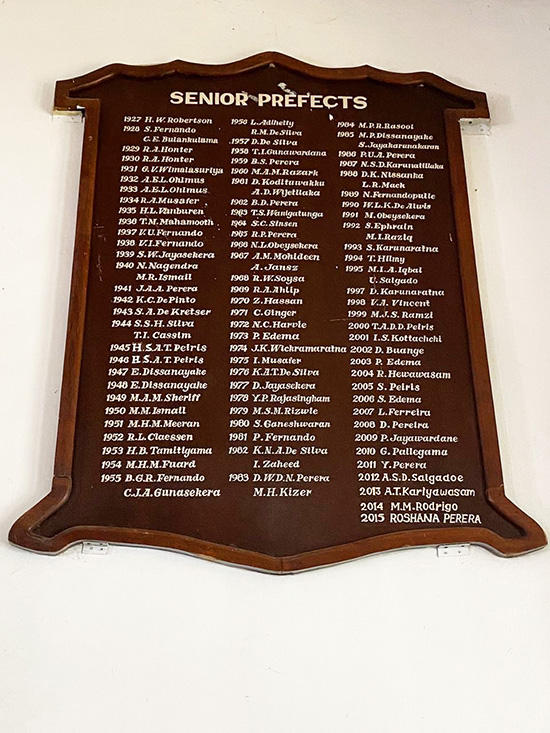
2016 - Arom Medis
2017 - Joshua Siriwardene
2018 - Dersith Fernando
2019 - Shenal Dangalla
.....................................................................
The position of Senior Prefect is granted to a student who exemplifies good leadership and behavior. He is responsible for setting an example for other students of the school. The Senior Prefect serves as a leader in school activities. They are often required to be ambassadors for their school at events. At these events, the Senior Prefect may speak on behalf of the student body. At school parents' evenings, He will speak with attendees.
The prestigious appointment as Senior Prefect commanded great respect at school. He had an air of confidence and carried himself with grace and dignity. The Senior Prefect had the honour of delivering the vote of thanks to the Chief Guest at the Annual Prize Giving. It was the tradition for the Senior Prefect to ask the Principal for a holiday on the following Monday. That wish was always granted.
The appointment as Senior Prefect is considered a great achievement. This embellishes the curriculum vitae of the person and will stand him in good stead in his future career.
Afghar Mohideen Senior Prefect 1967
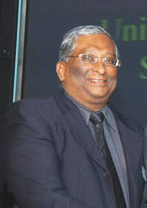
The Prefects Guild of Wesley has always maintained and safeguarded the rich traditions that have come down over the years. The Guild comprises the Head Prefect, prefects and sub prefects. The sub prefects are usually the new appointees and are appointed by the College Staff.
It has been a tradition over the years that the new sub prefects appointed have to go through an ‘initiation ceremony which is usually held on a Saturday evening with the new sub prefects attired in a pair of shorts.
The programme begins by all of us going for the 6.30 pm movie either at the Savoy, Liberty or Regal Theatre. Once over the entire Guild assembles at a Chinese restaurant where there is a comfortable quantity of food at a reasonable price which fits our purse.
Once dinner is over, the initiation ceremony begins where we get to know the new sub prefects more in detail. The entire evening is conducted with utmost dignity and of course a lot of fun and laughter takes place and enjoyed by all present. The College makes available a comfortable Prefects Room where the prefects meet for weekly meetings at which the minutes are recorded and maintained by the Secretary of the Prefects Guild.
The main functions of the prefects are to maintain discipline among the students, maintain silence at Assembly in the College Hall till such time the Principal and Staff arrive and to maintain discipline among the students who remain in the class while prayers are conducted in the main hall.
Unlike today, the inter-school cricket matches attracted large spectator participation mostly from students and old boys of the participating schools and other well wishers. On the day ‘home’ matches are played at Campbell Park the prefects are on duty to control the crowd along the boundary lines and also to manage entry to the Pavilion.
Unfortunately I am told that today there are hardly any spectators at College cricket matches, not only at Wesley but even in other schools. During our time, College used to have the ‘Double Blue Fete’ which was held over two days. Prefects were expected to be on duty during these fairs. Apart from Wesley, other schools too had their own fairs and the members of the Prefects Guild used to, as a group, go to these fairs. I must add that a fair which was never missed was the Methodist College fair.
All prefects had to wear a badge during school hours. The Head Prefect had a different badge. Whenever a prefect entered University, and during our times at least four to five from the Guild entered University, the Guild organised a farewell party which was funded mosdy by those who were leaving. In my year just before I left school to enter University, was the Methodist College Fair. The entire Guild went for it and had a memorable evening together with the Methodist College prefects.
The Wesley College Prefects Guild always maintained healthy traditions and I hope it still prevails. The bond of friendship that we made as prefects is still maintained long after we left College even with those who are overseas.
Links to further reading
Who is The Senior Prefect?
An article dedicated to the Memory of Past Principal Dr. N.A.B Fernando
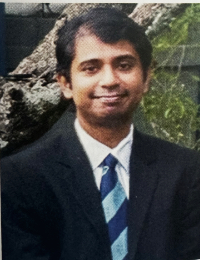 The kind invitation to write an article by the Chronicles Editor, on the subject of the apex appointment attainable by a student at Wesley, provided me an invaluable opportunity to fulfil what I believe was a duty unperformed since 2002, when the idea of writing an article tided ‘Who is The Senior Prefect?’ was put to me by my former Principal, the now late Dr. N.A.B. Fernando in a letter to me written during his retirement.
The kind invitation to write an article by the Chronicles Editor, on the subject of the apex appointment attainable by a student at Wesley, provided me an invaluable opportunity to fulfil what I believe was a duty unperformed since 2002, when the idea of writing an article tided ‘Who is The Senior Prefect?’ was put to me by my former Principal, the now late Dr. N.A.B. Fernando in a letter to me written during his retirement.
Planning to do my best to write the article for the Double Blue magazine that was intended to be realised that year in 2002, I set myself to the task to do interviews and gain perspective from a few senior members of the staff on what qualities they believe The Senior Prefect should possess, and on what basis he should be selected and what his role and function should be in College? In all honesty seeing as how that article could not be done, now over 20 years later, I cannot find those interview notes.
However I can recall from memory the core of what three members of the staff discussed after I sat down to interview them at different appointments fixed in the College library.
The late Mrs. Nirmali Fernando who having reached 38 years of service at Wesley was then the most senior member of the staff and shared her impressions of many praiseworthy Senior Prefects whom she had seen over the years, and what she thought about the office, as per the role of the Senior Prefect at Wesley. She explained how the office must be earned through merit and be bestowed to the student who best displays leadership which can be seen through qualities such as good discipline, integrity, honesty, courtesy, being an example to others and being a role model to younger students, having strength of character and earning the respect and confidence of both staff and students.
The late Mr. Winsiri Fernando who also was a keen observer and insightful commentator on student leadership also shared his thoughts and said that a badge stating an office alone doesn’t command respect but that every person appointed to that position commands that respect from his fellow students because of the personality he had developed over the years, and thereby had won acceptance from his fellow students as the one to lead them. He said that the Senior Prefect should be one whose authority is never openly challenged or defied by a student.
Mr. Wasantha Kasthuriarachchi who is an Old Boy of the College and was a Prefect during his schooldays, shared with me his recollections and thereby valuable insights into the role of the Senior Prefect at Wesley. He told me how he saw as a young boy how his Principal Mr. Shelton Wirasinha conducted himself in a manner that was distinct and noticeably different when interacting with the Senior Prefect of the College. He said it was almost as though the Principal he was talking with a friend. He went on to elaborate how on occasions when he was in the Principal’s office as a boy in the middle school, he saw Principal Wirasinha had the demeanour of a firm figure of authority, but if the Senior Prefect happened to step into the office to speak with the Principal, Mr. Wirasinha’s demeanour changed immediately when he went over to speak with the Head of the Student Body. Right in the presence of the impressionable middle-schoolboys, the Principal’s stern demeanour would become affable and sociable with the Senior Prefect and the two of them appeared almost as friends.
But as soon as the discussion with the Senior Prefect finished, the Principal’s demeanour switched to that of the figure of authority he projected to the young children. It was almost as though he donned his cloak of ‘officialness’ when he returned to his seat to continue addressing the pupils from the middle school. That visible differential treatment by the Principal to the Senior Prefect stated a clear message about the status quo in relation to the office, and symbol of the Senior Prefect within the culture of Wesley.
“We saw him as an emissary of the Principal to the students,” were the exact words of Mr. Kathuriarachchi as I clearly recall even to this day after over 20 years, when he summed up the substance of that perspective he gained through his observation as a young boy.
During my era in College, the Senior Prefect was colloquially referred to as “HP”among students. This term is of course an abbreviation of “Head Prefect” which was what resonated among most students as the more readily understandable descriptive of the Chief5 of the Prefects. In most schools (at least nowadays) the leader of the prefect body would be called or designated as, Head Prefect. Why then does Wesley use the term ‘Senior Prefect’ one may ask? It is pertinent I believe in this context to give some perspective on what distinguishes the two forms that designate the same position. The term ‘Senior Prefect’ is of English boarding school tradition.
The term ‘Head Prefect’ to my knowledge had been the more preferred designation in private schools in the United States. Both terms are synonymous with each other and refer to the student designated as the Head of the Student Body, and thereby is alternatively called Head Boy, School Captain / College Captain. And of course since prefects are also informally known as ‘cops’ due to their role as enforcers of rules and regulations and thereby maintained of overall school discipline, the head of that enforcement body is by default called either ‘Head Cop’ or ‘Senior Cop’ as many no doubt are aware. In this context it must be mentioned that as at Wesley, the term ‘Senior Prefect’ is still in formal use at both Trinity College and Kingswood College.
The Senior Prefect of Wesley is chosen on the basis of merit and not by factors of identity which are based on coincidence of birth. Factors of race and / or religion are not the basis on which the College administration selects the student most worthy to hold the apex office of the student body. If I were to sum up in one sentence the substance of the practical basis on which the Senior Prefect should be selected in order to achieve what needs be done by him in his capacity, I would put it thus: the student who can best command the obedience of the student body. And if I am to elaborate it further in terms of the context of the system in which he operates, I would add to that as: the student who can best command the obedience of
the student body and possess the confidence of the administration. The Senior Prefect has to be able to command the obedience of students when they are required to comply with the policies/ rules of the college. At times simply being respected does not mean guaranteed compliance. After all, people can respectfully disagree with a higher up, isn’t that so? The Senior Prefect must therefore be able to exact compliance when it is required from fellow students. How he exacts it can be through multiple ways which can be both earning the love, respect and admiration of students, which must, when required, be fused with a dose of sternness which expresses with abundant clearness that appropriate action will be immediately enforced upon the disobeyer if he shows signs of persisting with his defiance of rules and regulations. Therefore the Senior Prefect, I believe, cannot be a figure who is ever ready for endless dialogue with a student on how he may be gendy convinced to give up his defiance of the College’s policies.
The Senior Prefect is technically the student who has the closest proximity to the College administration and its inner functions. He is a conduit in a certain sense between the student body and the mature adults who administer the College for the benefit and welfare of the students. He should be the one with the right dose of maturity to see the concerns, interests and priorities of the two primary segments that make up the ‘populace’ (the students and the tutorial staff) of the College and act as a bridge, as and when necessary, to see that the concerns and priorities of the adult administrators and the impressionable students are fairly addressed.
He is an ambassador of not merely the student body but the College itself, since the whole purpose of any school’s existence is for the students it nurtures. I would therefore say that the Senior Prefect should possess a skilful combination of being an orator, diplomat, policeman and a judge, within the context of being a role model who is seen by the students as an emissary bearing Principal’s delegated authority.
The question of whether or not I had done a good job as Senior Prefect loomed over my conscience towards the end of my career. Whether my being in that position inspired younger students to believe in what I stood for, was best answered on that Tuesday, 15th of October 2002, when I ceremonially handed over office to my successor Praveen Edema. (On a side note I should mention that it so happened that my appointment as Senior Prefect also happened on the 15th of October, the previous year!) The answer my conscience sought came in the form of a very pleasant experience of farewell which I must say had a twofold element.
At the ceremonial assembly, making a brief address of thanks and farewell I called upon my successor. And after ceremonially donning the official blazer of office on my successor, I began stepping towards the centre of the stage to make my way off the stage down the small case of steps placed in front. I then became aware the applause, which began as soon as the change of office happened, growing noticeably robust, and as I lifted my head up towards the audience to take a look at the audience, the applause grew even lauder and I realised this was a cheering gesture from the student body as a sign of farewell. And just then as pretty much a reflex, I did something which was to an extent, ‘out of step with tradition one may say at the occasion of handing over office, although nothing improper I believe, which was to put my right hand up high and wave goodbye to the crowd just as I took my last step or two down the steps from the stage. And reaction was that the already loud applause erupted into a thunderous cheer which even included a loud cheering whistle, the kind done with two fingers in the mouth, shrilling out from somewhere in body of students assembled in the main hall!
What happened after the assembly was over, became something totally unprecedented. After assembly finishes usually the boys going over to the commerce and arts section always go back to their classrooms stepping off the main hall corridor, so as not to obstruct the staff members who arrive from the backstage entry. However on that day, since the sub-prefects who are the ones who ensure that the usual order of things is followed were also called on stage after the new Senior Prefect and his Deputies were appointed in, to be promoted as full Prefects. The lack of supervising the usual directional flow of students from the main hall as soon as the assembly finished, resulted in the boys from the Advance Level section flooding into the main corridor and trooping towards where I and my former Deputies, Eksath Perera, Ruzni Raheem and Bala Sudharshan, as well as our fellow batch mate and past Prefect Thanushka Jayasundera, who came to be keep us company on our last day in College, to shake hands with me and my friends and wish us farewell. It was truly unexpected and deeply heart-warming.
After the many rounds of goodbyes with my teachers the hour was nearing for me to collect my testimonial from the College office, say goodbye to the Principal and take make leave and thus exit the hallowed ground which was in every sense a second home for the last 13 years of my life. But before I stepped out for the last time in the attire of a student, I decided, as pre-planned, as to how my last day in College day should be, I visited every single classroom of mine since Grade 4 onwards, (since the classrooms from grades 1-3 which I occupied were demolished over the course of time to make way for the 125th Anniversary building and the Rev. D. H. Pereira Block) simply to have a look at those spaces and for a mere fleeting moment at least to visualise glimpses of the past. After I finished visiting the Wirasinha Block which housed classrooms of 6E, 7E and 8E back when I was in middle school, and was about to step through the rear entry / opening to the Highfield Block I heard the urgent voice of a child from right behind me saying : “Dilshan aiya! Dilshan aiya!”. I turned around immediately to see three small boys who looked keen to speak with me. One of them had a ballpoint pen in both hands and held it out to me saying, “We want to give you this pen.”I recall that with almost a reflex I bent and then crouched to level my face with theirs and said “Ane, thank you malli,” I was deeply moved, honoured and humbled by their sincerely thoughtful gesture.
I believe I asked them which class they were in, and from what I can recall now I believe they were in grade 7 at the time. I recalled one of them was a pioneer of the General Knowledge Club in the Middle School, and less than two weeks ago, along with some of his colleagues offered chocolate to all the teachers on Teachers Day that year, as part of their club’s activities.
I know of this since it so happened I was seated in conversation with the Principal that moment when they came in to the office to offer him a piece from a box of ‘Kandos Promises’, and I too was kindly offered when Mr. M. A. P. Fernando commended their gesture and said “You must also offer one to the Senior Prefect.”, to which the young Wesleyite replied “Of course sir.”I thanked them for the kind gesture and commended their project. And so to these thoughtful preteens who thought of giving me a parting gift on my last day in College I spoke a few words of encouragement and I believe I told them they should aspire to become Prefects one day. Sadly I do not know their names, and will surely not be able to recall them by sight now. I only hope they will come across this article, remember that thoughtful gesture they did back on the 15th of October 2002 and read reach out to me one day. What became of that parting gift? I assure you dear reader I treated that blue ballpoint pen as a treasure, and still possess it to this day. And alongside my Senior Prefect badge I snapped a picture of it to be included in this article.
Being the Senior Prefect of Wesley was an experience unlike any other. And how dearly I wish I could relive it all over again.
The Prefects of 1959
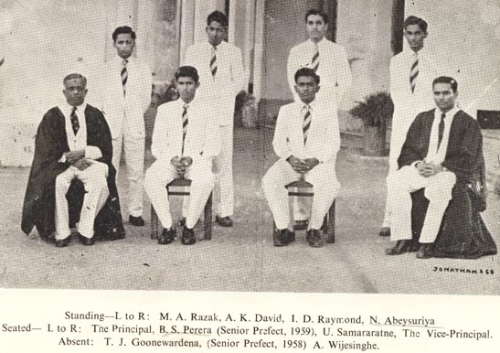
..............................................................
The Prefects of 1961
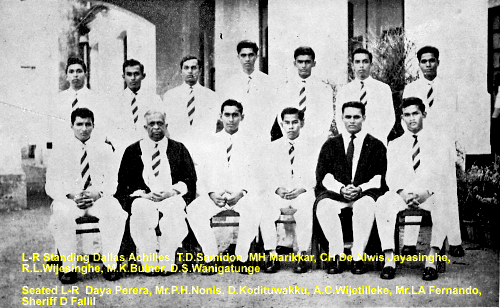
..............................................................
The Prefects of 1963
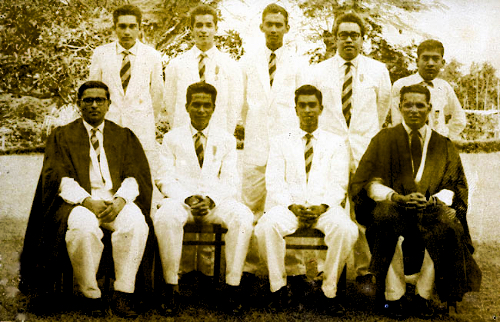
..............................................................
The Prefects of 1969
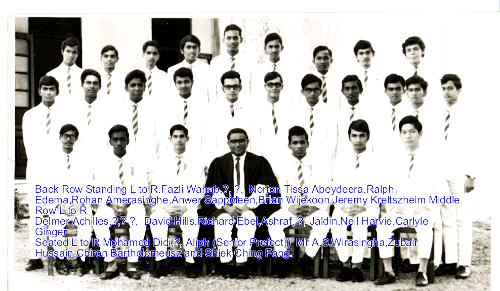
Middle Row L to R: Delmer Achilles,??,??, David Hills, Richard Ebell, Ashraf, Jaldin, Neil Harvie,Carlisle Ginger
Seated L to R: Mohammed Didi, ?? , R.A Ahlip (Senior Prefect), Mr A.S Wirasinha, Zubair Hussain, Chiron Bartholomeusz, Sheik Ching Fong
..............................................................
The Prefects of 1972
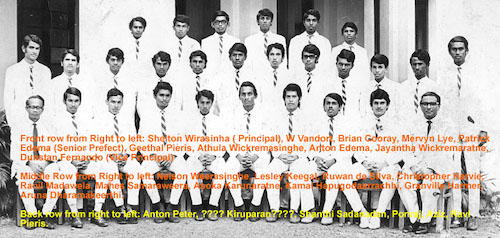
..............................................................
The Prefects of 1973
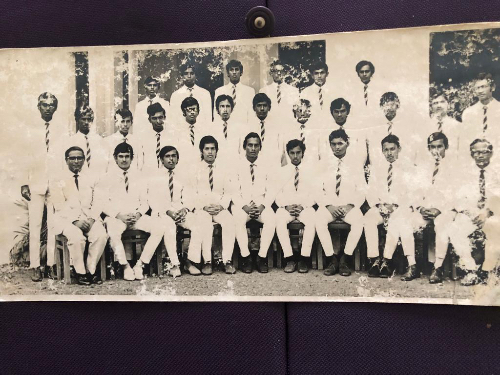
..............................................................
The Prefects Guild 1989
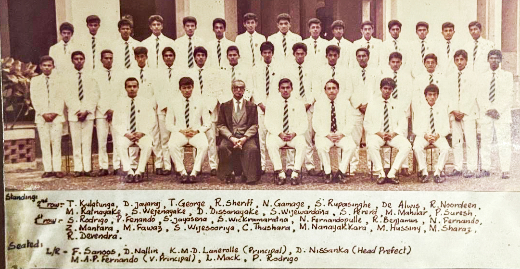
..............................................................
The Prefects of the year 2000
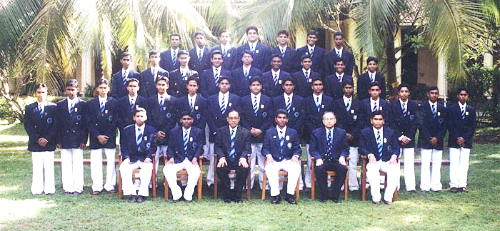
By J.C.P Wickramanayake
WESLEY COLLEGE OLD BOYS UNION |
YEAR OF SERVICE |
Rev. Samuel R Wilkin |
1874 - 1879 |
Rev. Arthur Shipman |
1880 - 1883 |
Rev. Samuel Hill |
1883 - 1885 |
Rev. Thomas Moscrop |
1886 - 1888 |
Rev. Thomas C Hillard |
1889 - 1892 |
Rev. Joseph Passmore |
1893 - 1895 |
Rev. Henry Highfield |
1895 - 1925 |
Rev. Albert Hutchinson |
1925 - 1928 |
Rev. John Dalby |
1929 - 1935 |
Dr. S. Muttiah |
1935 - 1937 |
Mr. G.C.S. Corea |
1937 - 1939 |
Mr. C.E De Pinto |
1939 - 1940 |
Mr. O.E.Goonetilleke |
1940 - 1949 |
Prof. E.F.C. Ludowyke |
1949 - 1951 |
Mr.G.Wickremasinghe |
1951 - 1952 |
Sir.O.E.Goonetilleke |
1952 - 1964 |
Mr. W.H.De Kretser |
1964 - 1965 |
Dr. N.J.A.Cooray |
1965 - 1967 |
Mr. S.Ratnakaran |
1967 - 1971 |
Mr.P.H.Nonis |
1972 - 1975 |
Mr.K.Wickremaratne |
1975 - 1976 |
Mr.E.N.Rajah Sinnathuray |
1976 - 1982 |
Mr.P.B.Herat |
1982 - 1986 |
Hon.M.H.Mohamed |
1986 - 1996 |
Mr.Haleem Ishak |
1996 - 1999 |
Mr.Mervyn Peiris |
1999 - 2000 |
Mr.Rienzie Wijetilleke |
2000 - 2004 |
Mr.Lasantha P Fernando |
2007 - 2012 |
Mr.Ivor Maharoof |
2012 - 2014 |
Mr.Richie Sappideen |
2014 - 2015 |
Mr.Jeremy Brohier |
2015 - 2017 |
Mr.Wilhelm VanDort |
2017 - 2019 |
Mr.Sri Shanmugalingam |
2019 - 2020 |
Mr.Fowzil Nawaz |
2021 - 2023 |
Very little is known of the early history of the Wesley College Old Boys' Union. The earliest available records date from 1928. and whatever information has been gathered - about the period prior to this it from tradition, from the memory of the older Old Boys, or from old Magazines of the school. Tradition has it that the Old Boys' Union of the school was inaugurated on the 1st December 1874, which is the same year as that in which he school was founded. This may appear strange, but it can be explained by the fact that when Wesley College was opened, it took students from the Pettah Methodist School, which would have had students in the highest form and new students would also have been admitted to that form in that year, so that a fair number of students would have left school at the end of that year. Also, the Methodist Church is well known as pioneers in the idea of involving all its members in Church activities, and it is possible that this idea was extended to students in relation to school activities It could, therefore, be surmised that the Methodist Principal, Rev. S. R. Wilkin, who was the first Principal of Wesley College, would have conceived the idea of summoning a meeting of the students who left in the first year to form an Old Boys' Union.
Recently, this claim was challenged by a senior Old Boy who stated that- the Old Boys' Union was formed only in 1910, when the' Rules were passed.; It is possible that both statements arc correct, i.e. that the 'Old boys Union was actually inaugurated in 1874 in an informal ,way, with the school authorities acting' as office bearers to get together Old Boys when occasion demanded it, and that' the Union -was formalized only in 1910 when the Rules of the Union were adopted and the. Union elected its own office-bearers. The Old Boys' Union of Wesley College followed the' tradition of all Old Boys' Unions of schools of having the Principal of the school as its President irrespective of whether he was on Old Boy or not.' The Union broke with the tradition in 1935 when a resolution- moved by Mr. V. E. Charavanamuttu was passed at the Annual General Meeting to the effect that the Principal should ex-officio be the Patron of the Union and that the President should be an, Old Boy of the school elected at 'each Annual General Meeting.
The membership of the Union stood at About 300 in 1927 and is about 900 today. Which is perhaps less than 20% of the I number of Old Boys who arc living today. This is admittedly disappointing' and steps are being taken by the present. Members of the Union to increase the membership. The low membership is, however, not an index of the loyalty of Old Boys to their Alma Mater. Old Boys who are nonmembers of the Union have always rallied to calls for assistance to, the school when such calls were made, thus proving 'that the following lines of the school song are not a mere sentiment - "And when Wesley's call shall sound Ready, aye! .shall all be found, In duty and in honour bound One instance of this is the response to the call made in 1951 for contributions towards constructing a new block known as the High field Block" to commemorate the 75th anniversary of the birthday of the late Rev. Henry Highfield who did so much 'for the school, which brought in about Rs. 75,000 from Old Boys. This block of 12 classrooms was completed in 1959. We hope and trust that a further example on this will be provided- by the response to the call for contributions to the Centenary Fund and that the response would enable us to reach the target of Rs. I million 'set for the Fund.
The O B. U. owes a debt of gratitude to the many Old Boys who gave their time to serve as office-bearers of the Union. Sir Oliver Goonetilleke, served as 'President Of the Union for the longest period- 19 years -from mid 1940 to 1948, and 1953 to 1963. Mention must. also be made of Mr. P. H. Nonis, our present President, who was the first Old boy Principal of the school, in fact the only one up to now. Mr. J. S Ratnayake Was the first elected Hony. Secretary of the Union after the Rules f the Union were adopted in. 1910, and served for a number of years in that capacity. Mr. Terrence de Zylwa had the longest tenure of office as Hony. Secretary-8 years' from 1952 to 1959. The writer himself served in this capacity for' 7 years from 1960 to 1966. - Mr. Edmund Dissanayake served longest as Hony, Treasurer-12 years from 1953 to 1964. Among those who served as Hony. Auditor were Mr. B. L. W. Fernando who later served as Auditor General -of the Island Mention must be made of the benefactors of the O B. U. Among these are Mr. W.H. I ' de Kretser. Who was always ready to contribute most generously towards any activity of the school or the O. B. U. Mr. F. V. H. Labrooy was another. He chose to keep himself aloof but was always interested in tile affairs of the school as of the OBU and was ready to help generously One of his contributions was a payment Of Rs. 100/-to meet the cost of 'entertaining the School Cricket Team and OBU lunch , which he made many times. Mention must also be made of a contribution of Rs. 10,000 to meet the cost of repairs to the school buildings by Dr. N. J. A. Cooray, who served as President of the Union, in 1965, which as the first year in which he served as 'resident.
The Union has its annual celebrations in the first weekend of March each year. As from 1963 a Founder's Day Service was held in the School Hall on 2nd March each year as part of the celebrations, in !place of the "Re-union" Service which we held in the Wesleyan. Church, Maradana on The Sunday of the week-end up to then. The celebrations include 'Past vs. Present' encounters., at Cricket, Soccer, Hockey and Rugger, 'Old Boys Vs Staff, encounters at Tennis and Bridge, and a lunch in the School and -the Other events are O.B.U. Dinners which are held in one or other of the leading hotels in Colombo and to which eminent persons arc invited. About 15 O.B.U. Dinners have been held. In recent years, a 'Dinner Dance' has taken the place of these Dinners. 3 Dinner Dances have been held. A 'Club Nite' to enable Old Boys to get together more frequently and in a more informal atmosphere was inaugurated -in 1964. This'' activity was given new life in 1968 by the younger Old Boys' and made a regular event on the 1st Saturday or each month. Special events organised 'by the 0. B. U included the construction of the, Highfield Memorial Building in l959, which has been referred to earlier, mainly through the efforts of the late Mr. Terrence de Zylwa who was the then Hony. Secretary who almost re-enacted in 1950 what the late Rev. Highfield did in the first decade of the century when he collected almost single-handed a considerable sum of money towards the cost of constructing the main buildings which 'houses the school. Other activities were receptions to old boys or the unveiling of photographs of old boys who achieved some notable success or gained distinction in the various' walks of life, which brought honour to the o school, the feting of teachers who have served 'the school for long periods) and farewells to Principals on their relinquishing their posts. Old Boys gather in strength to watch and encourage present boys at games, especially.
At cricket matches Many Old Boys have been generous 'with gifts of items of equipment for the various sports and feted teams which have achieved marked success in any year. They also help boys who come from less, affluent homes to get The necessary gear for the sport in which they participate. In recent years Old Boys' have provided funds to meet the cost of refreshments served, at Athletics Meets. Old Boys have also donated trophies and prizes at the annual Prize-Giving and Athletic meets. They have also given generous contributions and other assistance whenever calls were made by the school, and have actively supported the school in all fundraising events. A most encouraging feature in recent years is the interest' taken by the younger Old Boys in the affairs of the Union. I close this with .an appeal to the present boys, especially to The more senior among them, to -note that they must consider it their duty, and in fact a privilege to join the OBU. As soon as they find, their feet after they leave' school without waiting to be invited to do so. The Union belongs to Old Boys and 'is run by Old Boys and the influx of younger Old Boys is necessary to keep-it alive and to infuse, new life into it, which is necessary to keep it going as a live force; worthy of the high reputation and standing' ,of the school. There' can be no excuse for not joining the Union as one can always get an application form whatever information one requires from the College.
Humble beginnings
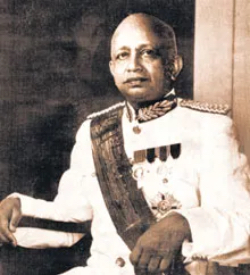 At first glance, the curriculum vitae of Sir Oliver Goonetilleke appears somewhat pedestrian. The only son out of eight children, he came from a respectable middle-class family, his father holding various positions within the Postal Service. Brought up a Christian and educated at Wesley College, Oliver showed promise, yet lacked the vital impetus of wealth and status. His attempts to gain a scholarship to study in England failed and he was overtaken by wealthier contemporaries whose degrees from Oxford or Cambridge virtually guaranteed them a place on the fast-track to positions of influence and political power.
At first glance, the curriculum vitae of Sir Oliver Goonetilleke appears somewhat pedestrian. The only son out of eight children, he came from a respectable middle-class family, his father holding various positions within the Postal Service. Brought up a Christian and educated at Wesley College, Oliver showed promise, yet lacked the vital impetus of wealth and status. His attempts to gain a scholarship to study in England failed and he was overtaken by wealthier contemporaries whose degrees from Oxford or Cambridge virtually guaranteed them a place on the fast-track to positions of influence and political power.
Sir Oliver Goonetilleke
Behind the scenes, Sir Oliver assiduously forged his own path to the top working his way through a series of worthy, but unexciting-sounding posts, such as a sub-accountant at the Colombo Bank, assistant auditor in the government railway service and Colonial Auditor until, finally, he obtained the post of Financial Secretary of Ceylon.
Accountants rarely transform into super heroes. But Sir Oliver broke the mould. A good head for figures was just one of his many talents. He was also a consummate negotiator and political tactician who not only oversaw the safe transition of his country to independent status but who managed, on at least one occasion, to prevent the early onset of the ruinous civil war to which it finally succumbed.
He acquired many powerful friends who included fellow exile and former Prime Minister Sir John Kotelawala. Their first meeting set the tone of their future relationship. Sir Oliver had returned to Wesley College as a teacher and was refereeing a soccer match with Royal College whose team captain was Kotelawala. Sir Oliver recounted how “not long after the match started, the rival captains forgot soccer and in the course of play started to rush at each other like two warring bull elephants.” Taking swift and decisive action, Sir Oliver sent both captains off the pitch.
On a subsequent occasion, his skills of diplomacy once more came into play when the hot-tempered Kotelawala, now honorary Secretary of the Orient Club, settled a dispute with his fists.
Heading off a move by outraged members to eject Kotelawala, Sir Oliver suggested he resign his post and remain as an ordinary member; a tactic that proved agreeable to all sides, ensuring Kotelawala’s continued membership and his future patronage of the Club. There was also a benefit for Sir Oliver who “consented to fill” the post from which he had persuaded his friend to resign.
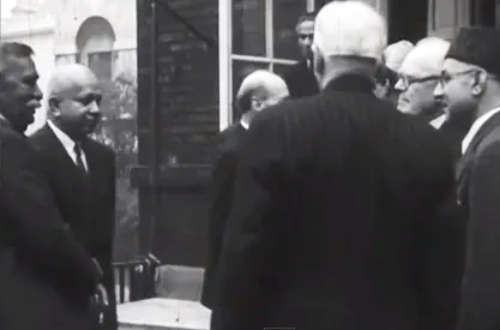
The feisty Kotelawala was just one of a growing circle of powerful friends that Sir Oliver gathered around him. Others included D.S. Senanayake who was to become the first Prime Minister of independent Ceylon and Lord Soulbury who lent his name to the new Constitution implemented in 1946.
Despite the lack of a glamourous public profile, Sir Oliver’s brilliance as an administrator brought him to the attention of the British during World War II when Ceylon was in imminent danger of attack from Japan. He was asked to lead the Civil Defence Department, an appointment that marked a significant departure from the norm.
According to Dr E.F.C. Ludowyk: “The choice of the quickest-witted Ceylonese of his generation for a position which would normally have gone to a top-ranking white bureaucrat showed how far things had changed from 1915 and even from 1931.”
Signing of the Declaration of Independence Agreement in 1948: Seated- Sir Henry Monck-Mason Moore, Governor of Ceylon, D.S. Senanayake, Prime Minister. Standing-C.H. Mulhall, Sir Oliver Goonetilleke, Sir Arthur Ranasinghe Signing of the Declaration of Independence Agreement in 1948: Seated- Sir Henry Monck-Mason Moore, Governor of Ceylon, D.S. Senanayake, Prime Minister. Standing-C.H. Mulhall, Sir Oliver Goonetilleke, Sir Arthur Ranasinghe
Sir Oliver set about this new task with his usual energy and enthusiasm, drawing up plans for the construction of 60-foot wide fire-gaps in Colombo which necessitated the bull-dozing of many buildings and the relocation of their occupants.
However, he was to reflect bitterly on the tardiness of the compensation paid for these acts of destruction.
“My hope then was that after the war a new Colombo would arise … but looking at those neglected fire-gaps which have never been repaired, I cannot help but think that very often small nations who join their more powerful allies in a total war-effort are left to fend for themselves and, as in the case of Ceylon, do not get a farthing of reparations.”
Words which could be applied to similar arrangements elsewhere in the 21st century!
In fact, Sir Oliver’s role in Civil Defence had unexpected advantages when members of the Soulbury Commission visited Ceylon in 1944. Negotiations for the country’s independence had not progressed as quickly – or as far – as the Ceylonese had wished. However, instead of confrontation, Sir Oliver launched a charm offensive, using the civil-defence organisation to transport the Commission members around the island and ensure they had a memorable trip.
Throughout these critical negotiations, Sir Oliver employed his diplomatic skills to good effect, smoothing out disagreements and heading off destructive confrontation. He was not only a skilled negotiator, but appears to have had an uncanny knack for recognising people he could trust. One such was Lord Soulbury with whom he developed a warm friendship and who he judged, within minutes of their first meeting, to be a man who would “be fair and honourable in all his decisions.”
Sir Oliver’s partnership with D.S. Senanayake was another key element in the smooth transition to Independence. When Senanayake, frustrated by the shortcomings of the Soulbury Commission, threatened to push ahead without them regardless of the consequences, it was Sir Oliver who interceded, advising moderation.
The result of this hard work, based on goodwill and moderation, was a triumph for Senanayake in the State Council. After a speech in which he urged representatives not to “refuse bread merely because it is not cake”, the British scheme was passed by 51 to 3.
Observers, such as Sir Ivor Jennings, were in no doubt about the extraordinary achievement of the Senanayake-Goonetilleke partnership. Without them, he believed, Ceylon would have remained a Crown Colony. If so, who knows what it might otherwise have had to endure before gaining Independence?
Sir Oliver Goonetilleke: Life in exile
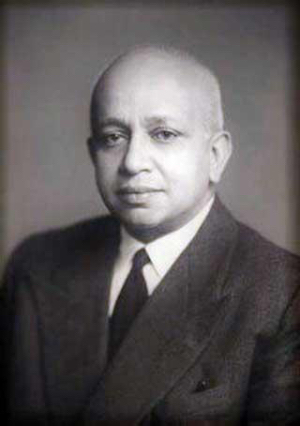 Nine years of researching the background to my novel The Devil Dancers introduced me to some fascinating historical characters. One of the most remarkable was Sir Oliver Goonetilleke (1892 –1978), one of the key architects of Ceylon’s Independence and the first Ceylonese to hold the post of Governor-General. This is the last of three articles on one of the most brilliant statesman of his generation.
Nine years of researching the background to my novel The Devil Dancers introduced me to some fascinating historical characters. One of the most remarkable was Sir Oliver Goonetilleke (1892 –1978), one of the key architects of Ceylon’s Independence and the first Ceylonese to hold the post of Governor-General. This is the last of three articles on one of the most brilliant statesman of his generation.
Following his loss of office, Sir Oliver’s sudden departure from Ceylon and his final destination were matters of conjecture. A short paragraph in The Times noted his arrival in Paris along with a statement from Mr A. P. Jayasuriya, leader of the Senate, that Sir Oliver was “neither removed from office nor did he resign.” A remark that seems somewhat disingenuous in hindsight. However, the mystery was soon resolved. England was Sir Oliver’s choice for his self-imposed exile. His friend Sir John Kotelawala had already taken up residence in the Kentish village of Biddenden following his failure to win the 1956 General Election.
Almost immediately, Sir Oliver was received into the highest levels of society. For instance, the Court and Social pages of The Times record a dinner party given “in honour of Sir Oliver Goonetilleke in honour of his relinquishing the office of Governor-General of Ceylon” by Sir Graham and Lady Rowlandson at 18 Grosvenor Square. Among the guests were the High Commissioner for Ceylon and Sir John Kotelawala.
Unlike his friend who enjoyed the tranquillity of a rural setting, Sir Oliver preferred the frenetic pace of the city, choosing to live near Hyde Park, at the heart of London. It is one of the city’s most select addresses, just over a mile from Buckingham Palace and with Apsley House, the home of the Dukes of Wellington, as a close neighbour.
Within days of Sir Oliver’s departure from Ceylon, The Times recorded a Troskyite MP questioning the House of Representatives with regard to the amount of money that the former Governor-General had been allowed to take out of the country. The sum in question was £7,000 when the normal travel allowance was only £150. The delicate question of money resurfaced several months later when the House of Representatives raised 56,250 rupees (£4,000) to be paid to Sir Oliver in lieu of 10 months leave not taken by him when in office. A Government spokesman explained that this was to be sent to him in monthly instalments of £150, Sir Oliver having “told the British press recently that he was penniless because all his money was tied up in Ceylon.”
Doubtless, Sir Oliver had had to leave much of his wealth behind. However, just how penniless he was is open to question. Just two months after settling in England, he is recorded as having paid 1,500 guineas for a horse called Hippo at the Doncaster bloodstock sales.
Horse-racing was to be one of the many activities with which he diverted himself while abroad. He had already established himself as a leading member of the racing fraternity, being described by the Sporting Chronicle as one of the most popular and respected owners. He had raced his horses in England and France for many years, his two-year old Henrico having won the prestigious Prix de la Cascade at Longchamp in 1949. However, perhaps one of his proudest moments was being able to give the famous jockey Lester Piggott his first ride.
Despite his sadness at leaving Ceylon, Sir Oliver did not succumb to grief. Instead, he created a new life. He accepted various posts with companies related to Ceylon’s tea and rubber companies and achieved another ‘first’ when he became the first Asian underwriter at Lloyds.
He travelled extensively – especially during the English winter – paying annual visits to India. He also discovered domestic happiness after having spent many years as a widower since the death of his first wife Esther in 1931. He first met his second wife Phyllis Miller when she visited Ceylon as secretary to the Soulbury Commission. After that, they stayed in close contact and, following his removal to London, she helped him with his business affairs. They married quietly in 1968, only announcing their marriage several months later.
However, his self-imposed exile did not guarantee immunity from deteriorating political conditions at home. Two years after Sir Oliver’s departure, Philip Gunawardena, head of the United Left Front, declared his belief that sinister forces were at play. His evidence? Recent visits to Ceylon by Lord Mountbatten, Lord Soulbury and Sir John Kotelawala, a trip to Madras by Sir Oliver and alleged telephone conversations between Sir Oliver and Dudley Senanayake.
They were flimsy threads from which to weave a plot but Mrs Bandaranaike took these claims seriously and invited Philip Gunawardena to her home for secret talks. The result was uproar with everyone accusing everyone else of betrayal and Dudley Senanayake complaining to the police that attempts were being made to establish a dictatorship. According to The Times, “no one knew what was happening.”
By now, Parliament had been prorogued for a record four months and Mrs Bandaranaike was contemplating a coalition with the far Left. With an election looming the next year, the political atmosphere was rapidly becoming toxic, conspiracy was perceived everywhere and even elderly statesmen living thousands of miles away were caught up in the maelstrom.
Trial and Retribution
By the early 1970s, Ceylon had changed its name to Sri Lanka; Mrs Bandaranaike, having been temporarily been ousted by her rival Dudley Senanayake, was back in power and a new threat to stability had arisen: the JVP movement. As part of the measures to deal with the JVP, the Government introduced the Criminal Justice Commissions Act. Under this, some 130 insurgents were jailed, including one of the JVP’s prime-movers Rohanna Wijeweera.
However, the Act had implications for several people unconnected with the JVP. It was extended to a handful of individuals accused of Exchange Control Offences – among them Sir Oliver Goonetilleke.
Aged 82, he was tried in absentia and sentenced to four years rigorous imprisonment and a fine of 950,000 rupees (£61,000).
While he could not be extradited, the sentence nevertheless had a discernible impact on his life. Having met and entertained the Queen on many State occasions, he was now banned from her presence. In a sense, he was doubly exiled. It must have been a stinging blow.
In 1977, Mrs Bandaranaike was defeated at the polls by Junius Jayewardene. He repealed the Act accusing the previous Government of having used it to destroy its opponents. Those who had been jailed under the provisions of the Act were released and an amnesty declared.
This sparked a flurry of communications between the British High Commission in Colombo and the Foreign and Commonwealth Office in London. Due to their sensitive nature, these remained embargoed for 30 years.
Now available for public viewing, these documents reveal frantic activity by diplomats and civil servants in trying to establish the exact nature of Sir Oliver’s status under the amnesty.
The question is succinctly stated in a memo to Bob Dewar at the British High Commission, Colombo from R. E. Holloway, South Asian Department, Foreign and Commonwealth Office:
“We are of course particularly interested in Sir Oliver Goonetilleke and need a full account of where he now stands under Sri Lankan law. As you probably know Sir Oliver has been under a cloud in London since he was convicted and sentenced for the Exchange Control Offences. He is no longer invited to Royal functions or to other occasions at which the Queen is present. We must now advise the Lord Chamberlain on whether, according to Sri Lankan law and in the eyes of the Sri Lankan Government, he is entirely redeemed.”
Other memos show that these concerns were due not only to the niceties of royal protocol but also to an anxiety “that the Sri Lanka Government might take it amiss if we were seen still to be treating him [Sir Oliver] as a distinguished elder statesman.”
Sir Oliver was eventually re-instated and his name cleared, allowing him to return home to Sri Lanka where he died a few months later at the age of 84. Sadly, this last chapter of his life does not reflect well on any of the individuals or authorities who had benefited from his years of devoted service. Some actively sought his final ignominy while others passively complied with it.
However, his contribution to Sri Lanka’s Independence is a lasting monument to his unique skills. In the words of his biographer, Sir Charles Jeffries: “If Ceylon makes it, this will largely be due to Oliver Goonetilleke. If she fails, it will not have been his fault.”
Sources:
1. O.E.G. Sir Oliver Goonetilleke – a biography by Sir Charles Jeffries
2. E.G.C. Ludowyk The Story of Ceylon, p 262 [cited in OEG p. 44]
3. Emergency ’58: Tarzie Vittachi
4. The Times digital archive
Sir Oliver Goonetilleke - first Ceylonese Governor-General
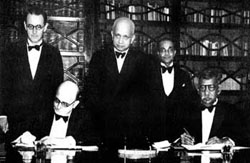 Sir Ivor Jennings, the then Vice-Chancellor of the University of Ceylon, in his book on the Constitution has stated if not for Messers D.S. Senanayake and Olver Goonetilleke Ceylon would have remained a Crown Colony for a larger period of time. We all know that Rt. Hon: D.S. Senanayake as the "Father of the Nation "who gained independence for Sri Lanka (then Ceylon) from the British Empire. It seems that all of us have forgotten the great person who was responsible for the birth of that independence. He is none other than Sir Oliver Ernest Goonetilleke who became the first Ceylonese Governor-General.
Sir Ivor Jennings, the then Vice-Chancellor of the University of Ceylon, in his book on the Constitution has stated if not for Messers D.S. Senanayake and Olver Goonetilleke Ceylon would have remained a Crown Colony for a larger period of time. We all know that Rt. Hon: D.S. Senanayake as the "Father of the Nation "who gained independence for Sri Lanka (then Ceylon) from the British Empire. It seems that all of us have forgotten the great person who was responsible for the birth of that independence. He is none other than Sir Oliver Ernest Goonetilleke who became the first Ceylonese Governor-General.
The leading role played by Sir Oliver Goonetilleke is unique in the gaining of independence for Sri Lanka in crucial negotiations with the British officials. The trio D. S. Senanayake took office as the Vice-Chairman of the Board of Ministers of which the Chairman was the British Governor, when Sir Don Baron Jayatilleke took office as the Ambassador of Sri Lanka in New Delhi in December 1942. Sir Oliver Goonetilleke was the Commissioner of Civil Defence and the Control Room of the Civil Defence Department under Sir Oliver Goonetilleke served as the focal point in the independence movement. I must state here the name of Sir Ivor Jennings for his hearty assistance extended to the duo Messers Senanayake and Goonetilleke in constitutional matters. All these led to the British Rulers to issue the 1943 Declaration in order to grant entire responsible Government to this country in all the matters of civil administration. However, the trio Senanayake, Goonetilleke and Jennings feeling little satisfaction over this as they Considered it was far below their expectation triumvirate drafted a fresh Constitution for the country. This Draft Constitution which came to be known as "Ministers' Draft "was submitted to the British Government in February 1944. Commissioner.
It was at this juncture Sir Oliver Goonetilleke who was appointed the Commissioner of Food went to England to discuss an urgent Food supplies to this country. On his journey Mr. D.S. Senanayake wanted Sir Oliver Goonetilleke to do his utmost to iron out any differences between the British Government and the Ceylonese Ministers over the "Ministers' Draft".
He was warmly received in London and he could discuss with the British Officials over all the matters in concern. Further he was directed to meet Lord Soulbury who has been assigned to lead a Commission to visit Sri Lanka to find out the views of the Ceylonese at lunch on the following day. At the luncheon Sir Oliver impressed Lord Soulbury. The latter asked the former "tell me Sir Oliver, in confidence, want is wrong with the "Ministers' Draft" Sir Oliver promptly responded "Nothing whatever is wrong with it." Sir Oliver who came back with much hope, the first task which he attended was to pacify the angry Mr. D.S. Senanayake and to advise on some important matters in good faith. As the advice of Sir Oliver, D.S. Senanayake met socially and unofficially the members of the Soulbury Commission which arrived in Sri Lanka on 22,12,1944.
After the Report of the Commission was presented to the Secretary of State for Colonies Mr. Oliver Stanley in London, he invited Mr. D.S. Senanayake to London for discussions. At the time when Mr. D.S. Senanayake arrived in London the Government had been changed as a result of a General Election and Mr. Oliver Stanley had been succeeded by Mr. George Hall as the Secretary of State for Colonies. Mr. Senanayake presented him a fresh report. Mr. Senanayake had to return as a disappointed and a disgruntled person, as it was not accepted by the Secretary, and he continued his struggle for independence.
Again Mr. Senanayake decided to reject a proposal made by the British Government to grant a Dominion Status to Sri Lanka. At this juncture, it was Sir Oliver Goonetilleke who intervened and explained to Mr. Senanayake that it was reasonable to accept what was granted and then fight for the rest in an atmosphere and goodwill. Further he persuaded Mr. Senanayake to present this proposal to the State Council. Since the proposal was accepted by the State Council, there had been a series of discussions in London for the purpose of deciding how it could be implemented. Sir Oliver who held the post of Financial Secretary by that time, represented Mr. D.S. Senanayake for these discussions. After the conclusion of discussions the first of the necessary orders of Council was enacted on 15.05.1946.
In 1974 Sir Oliver had much arguments in London with Mr. Greech Jones who succeeded Mr. George Hall as the secretary of State for Colonies. After all Sir Oliver realised that he had the goodwill of the Secretary of State and the Colonial Staff. Finally in June 1947 the British Cabinet of Ministers decided to introduce the legislation necessary to confer independence to Sri Lanka. Victorious Sir Oliver came back victoriously with a draft for independence which referred to Sri Lanka the receiving of full responsibility the status with the British Commonwealth of Nations. 04.02.1948 was fixed the Independence day. The Duke of Gloucester representing the King, delivered the Throne Speech at the opening of Parliament on 10.02.1948.
Although Sir Oliver was made to propose the Address of Thanks, he volunteered to give the opportunity to Mr. S.W.R.D. Bandaranaike who did his best which hailed as one of the most brilliant in his life time. One of who contributed to build-up of Sri Lanka during the post independence days Sir Oliver Ernest Goonetilleke was born on 20.10.1892 to Mr. Alfred Goonetilleke who held the post of Post Master in the Trincomalee Post Office and Mrs. Goonetilleke as the 5th child and the only one son of the family. A product of Wesley College, he firstly joined the staff therein in 1911. After a short spell of time, he resigned from the teaching profession and in 1921 he began to serve the Public Service as a Railway Auditor.
From that position he stepped higher to become the Auditor General at the age of 38. He got a new appointment as the Chairman of the Salaries and Cadres Commission. He was appointed the First Civil Defence Commissioner. At that time the Japanese were surging forward South East Asia and an attack on Sri Lanka was expected at any moment. Further he became the first Sri Lankan and Sinhalese Finance Secretary of the Country. After Sri Lanka regained independence from British he resigned from the Government Service and Became the Minister of Home Affairs and Rural Development under the Premiership of Mr. D.S. Senanayake. He later resigned and was appointed the first High Commissioner of the United Kingdom. Again he returned and became the Leader of the Senate and the Minister of Food and Agriculture. On 17.07.1954 he succeeded Lord Soulbury as the Governor-General. He served in this post till march 1962. He passed away on 17.12.1978 peacefully with a full accomplishment in life at the age of 86. May he attain Nibbana. -
Reminiscences of Sir Oliver Goonetilleke
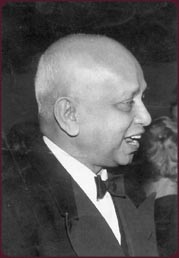
In his book Glimpses of the Public Services During a Period of Transition 1927-1962, (Kandy Books 2005), A. E. H. Sanderatne includes brief histories of the most important services of the public administration of Sri Lanka from the inception of British Rule in 1796 till 1962. The book provides insights into the working of the administration and the lives and character of public servants. It visualises the working of the bureaucratic system in a bygone era. We publish an excerpt from the book that recollects the early life of Sir Oliver Earnest Goonetilleke as a public servant.
Sir Oliver was perhaps the only colourful personality among those who functioned as Auditor General during a period of nearly a quarter century, from 1921 to 1946. The others did not get such publicity as Sir Oliver. No other Auditor General brought the work of the Audit into such limelight and publicity. In every Audit Report of his he was able to spotlight the various irregularities and frauds discovered by Audit officers. He saw to it that these revelations were given the widest publicity. People began to speak of these disclosures and therefore Sir Oliver gained a reputation for his ability. He was classed as a clever watchdog of the public purse.
Original ideas
Sir Oliver had his education at Wesley College, Colombo during the times of then Principal, Rev. H. Highfield and the Headmastership C.P. Dias, M.M.C. Both of them gave him every encouragement and saw in him great possibilities. The late Mr. Dias used to say of him “If you want an original idea, you better go to Oliver”. His intelligence, tact and ability to please his teachers and companions were seen in his school boy days.
He taught at Wesley for a few years and later passed the London B.A. and the London Inter Science (Economics). Rev. P.T. Cash the Vice Principal too gave him much encouragement and helped him in his studies. He had the innate understanding to deal with all sorts of people and get on with them in friendliest of terms.
He got employment as an Accountant of the now defunct Colombo Bank but left it before its closure. He had realised that the Bank would not be able to continue its activities very long. He took up the appointment as a Manager at Lake House. When the post of Assistant Auditor for Railways fell vacant, he was an applicant for the post. Sir Oliver’s father had also worked under Sir Wilfred Woods when the latter was the Post Master General. O.E.G. took up this appointment with great enthusiasm and ambition to make it a stepping stone to higher appointments in his career in the public service. From the commencement of his work in the Audit, he did not fail to show the indispensability of his services to the Colonial Auditor Sir Wilfred Woods, who found him ever ready to be very useful to him. He took up every work entrusted to him with very great zest in displaying his abilities.
Investigative mind
O.E.G. was an able writer and Sir Wilfred himself was a very clever writer of reports and communications on administrative matters. Sir Wilfred appreciated his reports, which were a marked improvement on the normal reports from the staff officers in Audit. O.E.G. was also fortunate that the accounts of Railway Extensions Department came under the scrutiny of Audit. It proved to be a very fertile field for O.E.G. to show his mettle in the investigation of the irregularities and misuse of government funds.
There had been a colossal waste of money and officials and contractors made easy money as a result of the callous manner in which the extension works were supervised. There was hardly any proper supervision.
He went into this work of investigation with an unusual zest, knowing fully well that this was an opportunity which he must exploit to the full and establish for himself a name in the Department. He made a lasting mark by the disclosures he made by personal investigations and scrutiny of the accounts of these extensions. Money had been wasted on unnecessary items of work or money had been paid in excess of work actually done.
The public were made aware of this waste of public funds and the Legislature too was grateful to O.E.G. for the able manner, in which he brought to light the waste of public funds. His work in the Railway Audit helped him to establish himself firmly above all other staff officers of the Department. The Assistant Colonial Auditor at that time was an Englishman, who did his normal work but was not so useful as O.E.G. Sir Wilfred recognised this fact and often very important papers were referred to him for his study and comments. When therefore Mr. Gentle left the Department there was no question that O.E.G. would succeed him. He was appointed Assistant Colonial Auditor on February 27, 1925. His meteoric rise in the Public Service is so well known that it needs hardly any mention here.
Enterprising mind
What were the chief characteristics of this man, which were observed by the officers, who had worked with him during the period of nearly a quarter century from 1921 to 1946? What were their impressions of him? There are people living today who had known him at Wesley, at Lake House, in the Audit, Civil Defence, Treasury, Home Ministry, and at Queen’s House. They are the people who can truly speak of him from personal experience of the man in close relations with them. What was his real self?
First of all one must not forget that he belonged to a middle class family. His father had been a Post Master who had served in several outstations with his family. O.E.G. is said to have been born in Trincomalee. His father gave all his children a middle class education. He was the only son. He had five sisters. The family had difficult days but all of them did well in school. It is true that O.E.G. had to supplement the income of the family by giving private tuition during the period he taught at Wesley.
In 1914, he was living in a house adjoining the Campbell Park. He became the mainstay of his family and had to help his sisters in many ways, especially at the time of their marriages. Early in life he faced difficulties. He therefore maintained a sympathetic attitude in life and that was the most redeeming feature of his life, which the officers who worked under him appreciated. At the time he joined the Railway Audit, a senior officer who worked with him was asked whether the Sinhalese in particular could expect much from him. He made a very shrewd observation about Sir Oliver then. “I doubt very much whether the Sinhalese as such will have any distinct advantage. He will spare no pains to attain his ambitions. He is not the man who will jeopardise his future in the service by going out of his way to help the Sinhalese in any special way.”
There was no doubt that he was very ambitious and left no stone unturned to achieve the highest positions open to him in the Public Service. He was aware of his capabilities and was shrewd enough to spot the weaknesses of the higher-ups in particular. He also realised that his future lay with those who exercised power not only in the bureaucracy but also in the political life of the country. He was a prominent member of the Turf Club and also at one time the Secretary of the Orient Club. He was also said to have been a Free Mason. He was also a prominent Churchman in the Diocesan Council and at one time President of the Central Y.M.C.A.
He knew very well that the contacts he gained in public life would be very useful to him. He saw in D.S. Senanayake a prospective leader of the people. He lived close to his residence and one could have seen both of them on horse back in the mornings going round on their usual riding exercise. In the early days of D.S.’s political life he proved himself to be a great helper to D.S. both as adviser and friend. This friendship did bear great fruit in the future career of O.E.G. Another great friend of his in the early days was Sir A.E. De Silva. He had accompanied him to India and was close to him when Sir Ernest was stricken with Small Pox.
Valued friend
It was no secret that Sir Ernest proved to be a very valued friend of his in many ways during his career. Although at one stage the estimation of him may have suffered in some ways, his determination to face difficulties won the day for him. He was no doubt astute and another in his position may have failed to make a success of his career. But he was always prepared to take great risks to achieve his ambitions in life. He did not shun the use of external influence when ever he found it necessary to do so. He was a master of compromise and diplomacy. For the most part of his life in Audit, he was generally considerate to subordinates. He showed sympathy to officers in distress.
The Tamils very soon realised that they need not fear him as he had no communal bias in favour of the Sinhalese. He very clearly made them understand that as long as they did work for him, he would not go out of his way to help the Sinhalese. The Tamils found their position quite secure during his regime.
From about April till July, each year he spared no pains in the preparation of the Annual Report. He expected the officers to work wholeheartedly during this period. A good number of officers took special care to please him at this period. They would stay after hours and work on Sundays, whether it was quite essential to do so or not. He saw to it that the Report was published expeditiously.
It was a common sight every evening to see a box load of papers being carried to his home in his car for attention. This trunk was known as the “Hamu’s Pettiya”. These papers generally dealt with subjects on which O.E.G. thought it a matter of wise policy to delay giving immediate orders or ignore them wholesale in process of time. Some assumed that the box went to and fro with the same papers and remained locked up in the same condition, untouched by hand. The officers did not actually know what was the ultimate fate of those papers!
Society man
He was very social by nature and was lavish in treating fellow officers, friends and visitors. When officers were specially called to work after hours he saw to it that they were provided with refreshments from the Pagoda Tea Rooms at his own expense. At times he utilised the service of officers to help in the counting of collections on Flag-days and he insisted that these officers should be looked after in the matter of refreshments and other facilities. He had been helping officers in financial distress. On one occasion a Class 3 officer was unable to meet the funeral expenses of his father. He approached him and O.E.G. gave him the money. The officer undertook to pay it back in instalments, but this officer after a few payments did not bother to pay the balance. Generally he was particular to attend the functions of subordinate officers when invited.
He also had a keen sense of humour and appreciated fun and laughed quite a lot on hearing humorous anecdotes concerning people. Once, a Railway Audit examiner was sent to check certain items in the Railway Stores. He had to do a test check. After checking, the list was duly submitted to O.E.G. He called the Head of the Branch and the Audit Examiner and questioned him as to why certain items were not checked. The officer felt rather hurt that he was so insistent and said in desperation “Facile Dictu, Difficile Factu (easy to say but difficult to do)” O.E.G. stopped further questioning by asking the Head of Branch whether “facile dictu etc.” were also instruments in the Railway Stores. That ended the matter; both O.E.G. and the Head of Branch laughed over the reply given in that manner.
It was usual to see almost daily a good number of people of various walks of life, coming to interview him. The Heads of Departments sometimes came on matters connected with important queries raised. Jockeys came from the Turf Club. Merchants and businessmen too visited him. There were Muslim and Borah merchants too. A Mudalali (dressed in coat, cloth and comb) used to come very often to see him and he was known to be a most trusted man of his. His sudden death was a very sad blow to O.E.G.
Once Terence De Zylwa, the leftist of the Suriyamal Campaign days, who was with him at Wesley, visited him. Terence had explained to him about the greatness of the Communist ideologies and his efforts to bring about a revolution in Ceylon. He had listened to him very patiently. Terence came out very much satisfied and told us that O.E.G. agreed with him and wished him every success in his work. He also had told him that he himself had to fight against imperialist forces in his career in the Public Service. No doubt even the Imperial England valued O.E.G. for his services in trying to make Ceylon a “little England”.
D.S. Senanayake was a frequent visitor; one saw them both walking out from his room smilingly enjoying some kind of joke or other. On race days, there was no doubt that bookmakers were the ones who saw him frequently.
Y.M.C.A. officials too come to discuss matters connected with its activities for he was at that time the President of the Y.M.C.A. It was rumoured that the General Secretary of the Y.M.C.A. spent an hour with him one morning espousing the cause of an aspirant to the post of Chief Audit Examiner.
Old friends of “Wesley days” were also seen coming for help and advice. No one went away without being at least satisfied with a friendly word. Even Christian padres and Buddhist priests interviewed him. He was very particular to give very great respect to the Buddhist priests and they always had a very good word to say of him. He always stood up humbly as the Priest advanced to him and he received him with the usual veneration. “He was all things to all men”.
O.E.G. lost his wife in 1931. That was a heavy blow to him. His wife had been a great source of strength to him in every way. From that time his house was kept for him by his brother-in-law Col. C.P. Jayawardena and his wife.
From a report in the Ceylon Daily News
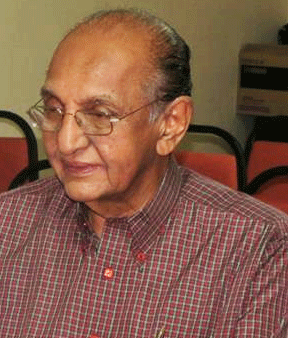 His research has Lead to the Global Control of Filariasis. Abridged from a Report in the Ceylon Daily Research carried out in Sri Lanka by Prof. Mahroof Ismail, leading a team from the Faculty of Medicine, University of Colombo, The National Hospital, Colombo in collaboration with Washington University School of Medicine, St Louis, USA has discovered that Albendazole, a drug manufactured by SmithKIine Beecham, ( the standard treatment worldwide to combat intestinal worms) when given in single dose, combined with other anti-parasitic drugs is effective against the parasite which causes lymphatic filariasis. This highly beneficial single dose treatment will replace the previous long duration treatment lasting at times for 3 weeks or more. As a result of these research findings ( now confirmed by other Scientists) the World Health Organisation and the SmithKIine Beecham(SB) have signed a Memorandum of Understanding whereby SB will donate the drug free of charge to WHO for use by Governments and other collaborating organisations working for elimination of the disease worldwide. Over one (1) billion people in 73 countries are at risk of contacting lymphatic filariasis and there over 120 million people already effected.
His research has Lead to the Global Control of Filariasis. Abridged from a Report in the Ceylon Daily Research carried out in Sri Lanka by Prof. Mahroof Ismail, leading a team from the Faculty of Medicine, University of Colombo, The National Hospital, Colombo in collaboration with Washington University School of Medicine, St Louis, USA has discovered that Albendazole, a drug manufactured by SmithKIine Beecham, ( the standard treatment worldwide to combat intestinal worms) when given in single dose, combined with other anti-parasitic drugs is effective against the parasite which causes lymphatic filariasis. This highly beneficial single dose treatment will replace the previous long duration treatment lasting at times for 3 weeks or more. As a result of these research findings ( now confirmed by other Scientists) the World Health Organisation and the SmithKIine Beecham(SB) have signed a Memorandum of Understanding whereby SB will donate the drug free of charge to WHO for use by Governments and other collaborating organisations working for elimination of the disease worldwide. Over one (1) billion people in 73 countries are at risk of contacting lymphatic filariasis and there over 120 million people already effected.
In Sri Lanka it has reached epidemic pro portions and is endemic, and about 1.5 to 2 million persons are effected. The disease is carried by mosquitoes and, if, untreated, leads to elephantiasis, the disfiguring enlargement of the arms, legs and genital organs. According to Professor Ismail an added advantage of using Albendazole for the control of filariasis is that simultaneously with the filariasis parasite other intestinal parasites such as hookworms, and roundworms will be eliminated. These latter parasites are known to cause anaemia and retardation of physical growth and mental development, especially in children and adolescents in developing countries. In a press release issued in January 1998, Dr.Hiroshi Nakagima, WHO Director-General, says this will be one of the largest global disease elimination programmes ever undertaken by public health authorities. There will be a huge benefit to Sri Lanka, from this landmark research finding, both in terms of funds expended on drugs, as well as in the elimination of a widely prevalent debilitating disease, which when implemented will bring relief to several thousands of Sri Lankans. Editors note: Prof. Mahroof Ismail, M.B.B.S., D.T.M& H., M.D, PhD.,Emeritus Professor of Parasitology, had his entire primary and secondary education at Wesley College from 1935 to 1950. He was twice winner of the Hill Medal, and carried away the class prize each year, in addition to other prizes.After graduating from the Medical College, he joined the Medical Research Institute where he had an outstanding career, and finally became the Director of the Institute.... in 1983.
In 1983 he was appointed as Professor of Parasitology, in the Faculty of Medicine, and became Dean of the Faculty of Medicine in 1994-96, and acted for the Vice Chancellor in 1996. ... He has been on the Board of numerous medical, educational, and scientific organisations both in Sri Lanka and abroad. He is an internationally recognised authority on Filariasis and soil transmitted nematode infections. He is a Member of the WHO Expert Committee on Filariasis. He has been a prolific contributor on research work undertaken by him and has over 60 publications to his credit. He is on the Editorial Board of three(3) International Journals on Tropical Medicine. He was Chairman, Post Graduate Institute of Medicine during 1994 to 96. He has had a long association with Wesley, first as student, then as an Old Boy, and has been a Member of the College Governing Board. He rendered yeoman service as President of the Old Wesleyites Sports Club, and revived and infused new life into its activities, as well as enhancing the facilities available. In addition to the many academic accomplishments, Mahroof also had the time and inclination to participate in Hockey and Badminton both at College and the University, where fu won his colours. He is an accomplished Pianist, and has been the accompanist at several school functions. He was honoured by the school for his outstanding achievements when he was invited to be its Chief Guest at the Prize giving in 1991, as a distinguished Old Boy.
Links to further reading
Transcribed from the Australian Double Blue Bulletin
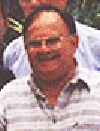 Commencing with this issue of the Double Blue Bulletin we intend to feature Old Wesleyites, living in Australia, who distinguished themselves while in school. This first portrait is focused on Henry N Duckworth, undoubtedly one of the oldest living cricket captains of Wesley College. Henry was a most respected Captain of Wesley in the 1930’s, during which period cricket blossomed in Ceylon. His entire education was at Wesley College from 1926 to 1937, during the Principalships of the Rev. John Dalby (1925 to 1928) and Rev Albert Hutchinson (1929 – 1940). As a 15 year old Henry played in the first eleven cricket team in 1931, and captained the school in both 1936 and 1937. He scored 117 runs against Ananda College in 1937 and had many scores of over 50 runs in his school cricket career. The legendary M Sathasivam played under Henry’s captaincy. Henry and "M. Satha" were both selected to play for the Combined Colleges in 1936 under the captaincy of D Fairweather of St Thomas College against the visiting Indian Universities team. In the match M Sathasivam and D Fairweather put on a 100 run partnership for the 3rd wicket. The press describing it as the "finest batting seen for years".Other notable players in Henrys team were Ivan Walbeoff and S Nagendra who played for Ceylon. Henry was a good all-round sportsman being a top athlete and gaining places in the Public School meets in sprint events; he also represented Wesley in Soccer. The genial Henry Duckworth now lives in retirement in an outer eastern suburb of Melbourne and keenly follows the activities of the OBA while fondly remembering and reminiscing on the glorious days at his beloved Wesley College, Colombo. Well Done Henry, we wish you the best of health and happiness.
Commencing with this issue of the Double Blue Bulletin we intend to feature Old Wesleyites, living in Australia, who distinguished themselves while in school. This first portrait is focused on Henry N Duckworth, undoubtedly one of the oldest living cricket captains of Wesley College. Henry was a most respected Captain of Wesley in the 1930’s, during which period cricket blossomed in Ceylon. His entire education was at Wesley College from 1926 to 1937, during the Principalships of the Rev. John Dalby (1925 to 1928) and Rev Albert Hutchinson (1929 – 1940). As a 15 year old Henry played in the first eleven cricket team in 1931, and captained the school in both 1936 and 1937. He scored 117 runs against Ananda College in 1937 and had many scores of over 50 runs in his school cricket career. The legendary M Sathasivam played under Henry’s captaincy. Henry and "M. Satha" were both selected to play for the Combined Colleges in 1936 under the captaincy of D Fairweather of St Thomas College against the visiting Indian Universities team. In the match M Sathasivam and D Fairweather put on a 100 run partnership for the 3rd wicket. The press describing it as the "finest batting seen for years".Other notable players in Henrys team were Ivan Walbeoff and S Nagendra who played for Ceylon. Henry was a good all-round sportsman being a top athlete and gaining places in the Public School meets in sprint events; he also represented Wesley in Soccer. The genial Henry Duckworth now lives in retirement in an outer eastern suburb of Melbourne and keenly follows the activities of the OBA while fondly remembering and reminiscing on the glorious days at his beloved Wesley College, Colombo. Well Done Henry, we wish you the best of health and happiness.
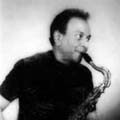 Lambert Abeytunge had his initial education at Dharmaduta College Badulla and later at Wesley College Colombo. First he was a boarder and then a day scholar. I remember him as a quiet student. He played the bamboo flute exceptionally well. Thereafter he left the boarding and stayed with his classmate I.D.Raymond in Kolonnawa. After an illustrious academic career at Wesley he entered the Medical Faculty Colombo in 1960. He did his internship at the General hospital, Colombo, and left for postgraduate studies at the Royal College of Surgeons in England. In 1969 Lambert obtained the FRCS. He returned to Sri Lanka but career prospects were not to his liking. He returned to the UK and subsequently to the USA where he worked in New York, California and finally in Las Vegas where he now has a lucrative practice in Cosmetic Surgery. Lambert plays the saxaphone,clarinet and the flute. He wishes to return to Sri Lanka and provide medical and financial help to the poor starting his project in Badulla. We wish him well.
Lambert Abeytunge had his initial education at Dharmaduta College Badulla and later at Wesley College Colombo. First he was a boarder and then a day scholar. I remember him as a quiet student. He played the bamboo flute exceptionally well. Thereafter he left the boarding and stayed with his classmate I.D.Raymond in Kolonnawa. After an illustrious academic career at Wesley he entered the Medical Faculty Colombo in 1960. He did his internship at the General hospital, Colombo, and left for postgraduate studies at the Royal College of Surgeons in England. In 1969 Lambert obtained the FRCS. He returned to Sri Lanka but career prospects were not to his liking. He returned to the UK and subsequently to the USA where he worked in New York, California and finally in Las Vegas where he now has a lucrative practice in Cosmetic Surgery. Lambert plays the saxaphone,clarinet and the flute. He wishes to return to Sri Lanka and provide medical and financial help to the poor starting his project in Badulla. We wish him well.
The affable Lankan doctor who made it big in USA - From Sri Lankan Daily Newspaper - 15/2/2010
 Running into a Sri Lankan face in far off United States of America is an experience that could be nerve tingling. And when that person happens to be a man or woman of substance, the excitement is all the more greater.So when I was introduced to Dr. Lambert Abeytunga, who has made his mark as a reputed and respected surgeon, it was something I had not bargained for.I expected to meet a personage aloof and with a commanding disposition. This anticipation was further strengthened when his American security personnel pried and probed me before informing him of my presence. When I faced him in his clinic, Dr. Abeytunga belied all the visual images I had of him.I was assured that Dr. Abey, as he is affectionately called, is a man of punctuality and will be there if your appointment is confirmed, and so it was with Dr. Abeytunga there at his clinic at the appointed time.
Running into a Sri Lankan face in far off United States of America is an experience that could be nerve tingling. And when that person happens to be a man or woman of substance, the excitement is all the more greater.So when I was introduced to Dr. Lambert Abeytunga, who has made his mark as a reputed and respected surgeon, it was something I had not bargained for.I expected to meet a personage aloof and with a commanding disposition. This anticipation was further strengthened when his American security personnel pried and probed me before informing him of my presence. When I faced him in his clinic, Dr. Abeytunga belied all the visual images I had of him.I was assured that Dr. Abey, as he is affectionately called, is a man of punctuality and will be there if your appointment is confirmed, and so it was with Dr. Abeytunga there at his clinic at the appointed time.
Despite his many years of living in the states here was a personality quintessentially Sri Lankan with the typical bonhomie characteristic of our countrymen.The tone and timbre of his voice as he welcomed me was that of a long lost friend. There was the unmistakable Sri Lankan characteristic of speaking to strangers without inhibitions. I was astonished at the simplicity of the man who was highly revered in Las Vegas, where he is living now, among the medical fraternity, particularly the surgeons.Dr. Abeytunga has build himself a niche as an individual outstanding in cosmetic, cancer surgery and surgery connected with child related diseases.He had no reservations to hide his humble origins. A resident of Badulla where he had his early education at Dharmaduta College and later at Wesley College, Colombo, from whence he entered Medical College, Colombo and obtained his MBBS. After his internship at the General hospital, Colombo, he left for England to further his studies at the Royal College of Surgeons in 1969 and obtained FRCS status.
He came back to Sri Lanka to serve his motherland but was disillusioned with the prospects for doctors here. In his own words, he said that "the profession was getting more politicised, so he took wings for good old England. As he found the prospects there were not good, he decided to try the US for a change, but with many misgivings.Within a short spell he made it good after sitting an examination afresh in the US as the British degrees are not recognised there.He first worked in New York’s Watkins Glen Hospitral, then shifted to sunny California as a consultant surgeon and built up an excellent practice.He came out with honours at the FRCS and also at the Fellow of the American College of Surgeons of America and Canada and set up a highly successful medical practice in California.
His fame and skills as a modern surgeon spread throughout the Californian state. Dr. Abeytunga is much sought after by patients needing surgery of an arduous and delicate nature.Today Dr. Abeytunga lives in Las Vegas of casino fame with his own private practice in a plush medical centre with all modern facilities.Despite his fame Dr. Abey has not lost the ethos of the country of his birth in his general demeanour. Despite his standing in society he is simple, down to earth and speaks modestly of his humble beginnings.Even while talking to me, his hand phone was buzzing most of the time, so he excused himself, telling "They are all my patients wanting an appointment"The affable doctor apart from his interest in medicine, has other interests - he loves to play the saxophone and the flute and clarinet. He loves gardening and also loves to paint. He is a votary of Sri Satya to whom he attributes his success. He indulges in meditation and said "I start my day with prayers to God."
He has two sons, one married recently in the traditional Sinhala style to a local girl. But now, with age catching up, his overriding concern is to return to the land of his birth, to set up a trust to provide free medical aid and schooling for the poor and needy.I will always start my clinic in Badulla first and later in the other cities and also in Colombo" he said.Those then are the marks of greatness of a Lankan who, despite his fame and fortune earned in a foreign land is yearning to share his wealth and talent with his less fortunate brethren in his beloved motherland.
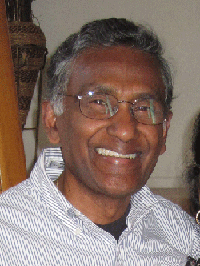 Soma first joined the boarding in 1956 having had his early education in Badulla. He lived with his parents at Aggratenne Estate Passara. His father owned Modern Theatre Badulla. He soon came into prominence because of his skills in the football field. He represented the school in First XI Soccer. This was the famous team with Samidon, OK Hemachandra and Mynah Wickremaratne when success in the field was taken for granted. Soma remained a popular student in the boarding as well as in the riotous 6th Form. He entered the University of Ceylon Peradeniya in 1963 and completed an honours degree in Chemistry. After research posts in the UK Soma emigrated to the USA and now is the Adjunct Professor of Organic Chemistry in the San Diego State University. He has numerous publications to his name. Soma was my closest pal in the boarding but we haven't seen each other since leaving school. We have vowed to correct this sometime soon.
Soma first joined the boarding in 1956 having had his early education in Badulla. He lived with his parents at Aggratenne Estate Passara. His father owned Modern Theatre Badulla. He soon came into prominence because of his skills in the football field. He represented the school in First XI Soccer. This was the famous team with Samidon, OK Hemachandra and Mynah Wickremaratne when success in the field was taken for granted. Soma remained a popular student in the boarding as well as in the riotous 6th Form. He entered the University of Ceylon Peradeniya in 1963 and completed an honours degree in Chemistry. After research posts in the UK Soma emigrated to the USA and now is the Adjunct Professor of Organic Chemistry in the San Diego State University. He has numerous publications to his name. Soma was my closest pal in the boarding but we haven't seen each other since leaving school. We have vowed to correct this sometime soon.
Links to further reading
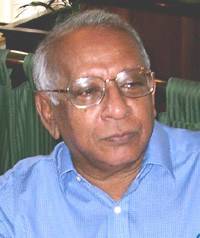 Neville Weerasekera, was a student at Wesley from 1946-50, in the Cartman era. He was twice winner of the Gogerly Scholarship, and entered the University of Ceylon, Faculty of Engineering in 1950, and graduated with First Class Honours in Mechanical Engineering . He joined the Shell Company of Ceylon in 1955 and became Technical Manager. In 1968 he Joined the Ceylon Petroleum Corporation and was lastly the Refinery Manager before he left to take up an Appointment as Project Director with Petromin in Saudi Arabia, in 1975. He returned to Sri Lanka in 1989. He is a Chartered Engineer and is married with two children.
Neville Weerasekera, was a student at Wesley from 1946-50, in the Cartman era. He was twice winner of the Gogerly Scholarship, and entered the University of Ceylon, Faculty of Engineering in 1950, and graduated with First Class Honours in Mechanical Engineering . He joined the Shell Company of Ceylon in 1955 and became Technical Manager. In 1968 he Joined the Ceylon Petroleum Corporation and was lastly the Refinery Manager before he left to take up an Appointment as Project Director with Petromin in Saudi Arabia, in 1975. He returned to Sri Lanka in 1989. He is a Chartered Engineer and is married with two children.
16th June 2012
Were not attained by sudden flight.
But they, while their companions slept,
Were toiling upward in the night.
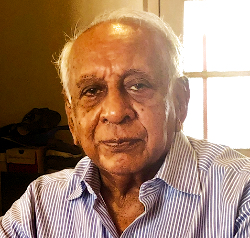 He is my mother’s brother. My first recollection of him was from Nugegoda when I started schooling in 1947 at St. John’s School. He was poring over his books studying for the Senior School Certificate. As a kid I admired his energy, his attention to detail and his creativity when he made little "gadgets" for us to play. In 1950 he had the unenviable task of taking a 7 year old on his first day to Wesley College. I was mesmerized by the elegant sweep of the magnificent buildings which was to be a part of my life for a further 12 years. The fears, nerves and excitement of that experience has remained in my memory ever since..
He is my mother’s brother. My first recollection of him was from Nugegoda when I started schooling in 1947 at St. John’s School. He was poring over his books studying for the Senior School Certificate. As a kid I admired his energy, his attention to detail and his creativity when he made little "gadgets" for us to play. In 1950 he had the unenviable task of taking a 7 year old on his first day to Wesley College. I was mesmerized by the elegant sweep of the magnificent buildings which was to be a part of my life for a further 12 years. The fears, nerves and excitement of that experience has remained in my memory ever since..
Neville Shelton Weerasekera (NSW) started his education at Kingswood College Kandy (1937-44) during the Principalship of Mr FAJ Utting. He joined Wesley College in 1945 and remained until 1950 during the ever popular Cartman era. Right from the beginning the sciences and mathematics stimulated and excited him. He was determined and dedicated. He worked tirelessly and achieved excellence academically winning the much coveted Gogerly Scholarship on 2 successive years 1948 and 49. I recall, in whatever he did he was meticulous and thorough.
A new Engineering faculty was to open with the first intake in 1950. NSW decided on a career in Engineering but at Wesley there were no teachers allocated for this brand new degree. It fell upon Rev Cartman to appoint and designate tutors for students to sit the all important University Entrance Examination. NSW has great praise for the Principal for his foresight and support.
JAB Gogerly and NSW entered the University of Ceylon in 1950. They belonged to the pioneering group of students of the newly formed faculty of Engineering and came under the tutelage of Prof E.O.E Perera, the Founder of the Faculty. The Professor is recognised as the Father of modern engineering education in Sri Lanka. NSW's brilliant University career was completed with a 1st Class Honours degree bringing great honour to the family, school and himself.
In 1955 he joined the Shell Company of Ceylon as an Executive Technical Assistant. The company sent him abroad for further studies. 1957-59 he was in the UK with Hawker Siddeley Group undergoing shop floor training. He followed specialist courses on Petroleum Products with the Shell Company.
NSW was Elected Chartered Mechanical Engineer UK in 1963.
He remained a Technical assistant at the Shell Company from 1959-64 when he was appointed Technical Manager for the Company. In that same year because of his exceptional combination of skills he obtained an assignment with Shell International Petroleum , in London as an Executive in the Product Applications Dept. From 1966-68 he was the Senior Scientific Officer, Tropical Products Institute, London.
Despite this meteoric rise in the profession he had the urge to return to his roots and to Sri Lanka. CIC Ltd recognized his ability and appointed him their Product Manager. His heart though was in Petroleum and returned to it by joining The Ceylon Petroleum Corporation in 1969 as a Senior Manager. Here NSW held a variety of Engineering positions gaining wide experience in the field. He was appointed the Engineering Manager of the Oil Refinery in 1971. His gently probing style and disarming courtesy, especially with politicians, made him one of the most respected and skillful Managers in the business.
In 1975 he obtained a position with PETROMIN, Saudi Government Oil Organization, as the Assistant Manager of the Jeddah Oil Refinery. His hard work expertise and intelligence was soon recognized. In 1976 he became the Project Director for the rapidly expanding Jeddah Refinery. He is a pragmatist and possesed the gift and the ability to make a cool decision in the heat of a fierce debate. Success came after a lot of hard graft and teamwork. His work was greatly valued and in 1980 was appointed the Project Director of the Refinery in Rabigh, Saudi Arabia.
In the 1980’s I had the good fortune to work in brief spells at King Khalid Hospital, on the outskirts of Jeddah. To me it was a new challenge and I enjoyed it enormously. NSW and I had a marvellous opportunity to bond again since our younger days and it was a sublime experience. We visited the souks, ate delicious "shawarma", wandered through the narrow alleys of the magnificent old city and drove into the desert to experience its inhospitable terrain and vastness. Jeddah is an exciting place, but scary at times. It was a surreal existence in an Oasis. The privations of life would be enough to challenge the most intrepid of men. But life can be good and work can be most rewarding. The stifling heat is overpowering, crime was virtually non existent. Jeddah comes to a standstill when there is a sandstorm. It never rains over there but when it does large parts of the city goes under water. A few days after the rains the desert comes to life with flowers, birds and insects. The hot barren desert gets transformed to a carpet of green. Sri Lankan expats in Jeddah hang out with other Asians who are all trying to kill the pain of isolation from their own culture. The tall and vigorous "Karapincha" tree behind their house in Jeddah was ample tribute to his wife, Suvendrini's fine Sri Lankan culinary expertise. When he lived alone he cooked for me at weekends and I recall the fine Seer fish curry he made which ignited my taste buds. The non-alcoholic beer never tasted better!!
He was always aware of the limitations of chasing money and have lead a sensible and frugal life. A good-natured Christian , NSW combined humane instincts with a firm grasp on reality. Wherever he worked he was not just admired but loved. Despite the uncertain future and the ethnic strife in Sri Lanka, in 1989 NSW resigned from Petromin and returned home, to spend his time in retirement with his extended family. He has fulfilled his aspirations to a comfortable retirement and leads a quiet, calm life in Wellawatte. Many have been at the receiving end of his kind and considerate ways. He has helped us all as a family. NSW has a remarkable ability to connect with people, making him not only a wonderful friend but a good listener.
NSW has fond memories of his days at Kingswood College during the Principalship of FAJ Utting. He has always been proud of his Wesley connection and has been in the Wesley College Old Boys Union and in its committee in gratitude for those rewarding years spent at the School. Neville Weerasekera has been a generous donor and has supported the school in all its functions.
We wish him well in the months and years to come.
Links to further reading
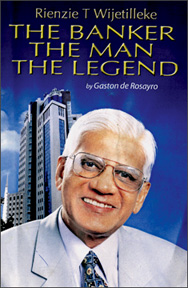 Of the many items scheduled for celebrating the 125 years Anniversary of Wesley College, one that will become a landmark, because of the widespread popularity it has already achieved, is Hatton National Bank's "SINGITHI PATHUM" which is associated with an All Island Art Competition open to all Schools. The thoroughly apposite theme of this art competition is a "United Sri Lanka". 'Already 100,000 entries have been received, and students from the remotest villages are participating. Not only does it demonstrate the appropriateness of the theme and the widespread interest it generates but also the organisational skills and publicity which Hatton National Bank has extended to this programme. The entire publicity and thrust for this stimulating project, with a theme focused on a major problem besetting this Nation, has come from Hatton National Bank, under the vibrant direction of the Managing Director & C.E.O- Rienzie T. Wijetillake.
Of the many items scheduled for celebrating the 125 years Anniversary of Wesley College, one that will become a landmark, because of the widespread popularity it has already achieved, is Hatton National Bank's "SINGITHI PATHUM" which is associated with an All Island Art Competition open to all Schools. The thoroughly apposite theme of this art competition is a "United Sri Lanka". 'Already 100,000 entries have been received, and students from the remotest villages are participating. Not only does it demonstrate the appropriateness of the theme and the widespread interest it generates but also the organisational skills and publicity which Hatton National Bank has extended to this programme. The entire publicity and thrust for this stimulating project, with a theme focused on a major problem besetting this Nation, has come from Hatton National Bank, under the vibrant direction of the Managing Director & C.E.O- Rienzie T. Wijetillake.
The name of Wesley College has been prominently associated with this competition a& a part of its 125 years celebration of educational excellence. Rienzie Wijetillake had his early education at Christian College, Kotte and then moved onto Wesley College where he completed his secondary education. He was an outstanding student and carried away several academic prizes. He was also a College Prefect. On leaving school he joined the Bank of Ceylon, and he continued to pursue his studies and obtained a BSc(Economics) degree. By now his executive talents were being recognised and he was posted to the Bank's International Division London Branch in 1966. On completion of his assignment he returned to the Island, and in 1971 he joined the Hatton National Bank which was just incorporated.
At Hatton National Bank his career has been nothing short of meteoric. In 1983 he became Manager of the largest Branch namely the the City Office in Fort. In a relatively short period he became the Managing Director and C.E.O. of Hatton National Bank which is one of the largest commercial private Banks in terms of assets, market penetration and customer base. Such a dominant position was achieved by the carefully planned strategy over the last ten years. He is also currently the Chairman of Colombo Stock Exchange, a highly prestigious and responsible position. He is also on the Board of several Companies despite his onerous duties and responsibilities at a top ranking Bank, Rienzie Wijetillake has found the time energy to devote his skills and talents to "Youth Welfare" special emphasis on the rural youth of our country. At a time when there is so much frustration amongst rural youth mainly due to the lack of job opportunities his projects have helped to alleviate such difficulties.
The thrust of this work has been through the "Gam Pubudu Sevaya", by which means HNB has painstakingly developed strategy for assisting and developing youth to achieve their full potential and becoming useful citizens. Under his personal direction HNB has organised a special team of trained persons to visit chosen areas and implement their programmes. In addition HNB has also assisted in rehabilitating and reviving local bodies which have fallen into disarray, and bringing them back into performing their proper role. The success of such endeavours has deservedly earned for HNB many encomiums, including the World Bank which commended the Bank's work in this youth development sphere, and has held it up as an example for others to emulate. The beneficiaries of such programmes in the rural areas have been uniform in their praise of the benefits that have accrued to them.
A feature of HNB's success has been their sustained efforts over several years, and not a flash in the pan venture. Too often in many such schemes of this type after the initial euphoria, there is a waning of attention and the project falls apart. But not so in HNB's case. Rienzie Wijetillake has also devoted his attention to the Temperance movement realising the havoc alcohol abuse inflicts on the poorer clauses. Again he has placed youth involvement in these movements as a primary focus. He has organised counselling sessions and attempted to revitalize youth, and lead them back to the Temple, Church, Kovil and Mosque as a primary source of guidance. He has been involved in such work from the horrendously troubled time of 1988/89. Rienzie Wijetillake has firmly stood behind the concept of a United Lanka free of religious and racial prejudices, where all persons have equal opportunities regardless of their racial or religious background. We are indeed proud and happy to record these achievements of an Old Wesleyite who has unflinchingly and unhesitatingly responded to Wesley's call.
Addendum
Mr Rienzie Wijetilleke who is both a Fellow of the Chartered Institute of Bankers, UK and a Fellow of the Institute of Bankers, Sri Lanka has been the Managing Director of Hatton National Bank Limited (HNB) since 1988. Commencing his banking career at Bank of Ceylon,he counts over 40 years in the industry. He joined HNB during its formative years but left in 1983 to work for the British Bank of the Middle East in the UAE (presently HSBC). He was invited back to HNB in 1987 to be the Bank's Chief Executive.Mr Wijetilleke joined the DFCC Board in May 2001. He is the Chairman of Jardine Fleming HNB Securities (Pvt) Limited. He is also on the Boards of the Colombo Stock Exchange, People's Merchant Bank Limited and CF Venture Fund Limited.
Rienzie Wijetilleke: 50 years a banker Banks must focus on rural economy -October 28, 2010,
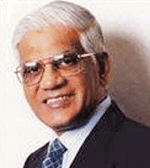 Rienzie T. Wijetilleke, who celebrates fifty years in banking today, said the industry must pay much more attention to the rural population. "Focusing on the micro, small and medium enterprises is a must if the banking sector wishes to make a significant contribution towards economic development," the Chairman of one of Sri Lanka’s successful banks, HNB, said. "The villages in Sri Lanka are home to about 60 to 70 percent of the country’s population. In my work with HNB I discovered that there were around 93,000 village hamlets and they were home to around 16 to 18 million people. So if Sri Lanka is gong to develop these people must be able to take a greater share in the country’s economic activities and this is where the banking sector has an important role to play," Wijetilleke said. "Finance is not the only thing they need, they also need guidance and banks providing financial services should make sure that a whole package is developed, not just with one-off facilities, but also with guidance on marketing and simple accounting," he said. Given the number of people in rural Sri Lanka, Wijetilleke firmly believes that each bank has room to grow without having to compete with one another for deposits, unlike in the Western Province and other major towns where banking is saturated. "The rural economy needs banking services and no single bank can do this alone. Even foreign banks should reach out to the rural population. There is enormous room for growth and there is no question of competition. Those who matter must realise the potential of reaching out to the rural economy. Not only would the banks grow, but the rural economies and entire country as well," Wijetilleke said. "In this exercise, banks should not think of making short term profits. Reaching out to the rural economy is a long term investment based on building long term relationships.
Rienzie T. Wijetilleke, who celebrates fifty years in banking today, said the industry must pay much more attention to the rural population. "Focusing on the micro, small and medium enterprises is a must if the banking sector wishes to make a significant contribution towards economic development," the Chairman of one of Sri Lanka’s successful banks, HNB, said. "The villages in Sri Lanka are home to about 60 to 70 percent of the country’s population. In my work with HNB I discovered that there were around 93,000 village hamlets and they were home to around 16 to 18 million people. So if Sri Lanka is gong to develop these people must be able to take a greater share in the country’s economic activities and this is where the banking sector has an important role to play," Wijetilleke said. "Finance is not the only thing they need, they also need guidance and banks providing financial services should make sure that a whole package is developed, not just with one-off facilities, but also with guidance on marketing and simple accounting," he said. Given the number of people in rural Sri Lanka, Wijetilleke firmly believes that each bank has room to grow without having to compete with one another for deposits, unlike in the Western Province and other major towns where banking is saturated. "The rural economy needs banking services and no single bank can do this alone. Even foreign banks should reach out to the rural population. There is enormous room for growth and there is no question of competition. Those who matter must realise the potential of reaching out to the rural economy. Not only would the banks grow, but the rural economies and entire country as well," Wijetilleke said. "In this exercise, banks should not think of making short term profits. Reaching out to the rural economy is a long term investment based on building long term relationships.
As I said earlier, finance is not the only requirement, what is needed is a holistic approach," he said. The North and East... Wijetilleke said the banking sector had a very important role to play in uplifting the economies of the North and East as well. "The outlook of the people in North and East must be changed, the focus so far has been to restore livelihoods but banks can play a big role in providing a commercial orientation to the people of these areas. They must be encouraged to make medium term investments in farming and fisheries and I will boldly say that the North and East could satisfy the whole country’s requirement of agricultural and dairy produce and fish.
People must be encouraged to produce on a commercial scale. For this, packaging, storage and transportation facilities must be developed and this is where banks can encourage investment," Wijetilleke said. "If we can do this, then the dividends of peace would be realised sooner and the whole country could realise its development potential. Government... But Wijetilleke said there was only so much the banking sector or private sector could do. "There has to be a joint government sector and private sector approach to development. The private sector has many success stories and although the government sector does not have that many successes, it provides essential services and facilities the private sector could not provide, such as health, education, telecommunication and transportation infrastructure, where the returns are not immediately felt but these are investments that bring enormous benefits to the country," Wijetilleke said. He said success would depend on how well the government and private sector worked together, each playing there distinct roles. Attracting FDIs... Since the war ended foreign direct investments (FDI) did not materialised in volumes that were expected, in fact they declined by about 17 percent during the first six months of this year from the first six months of 2009. In order for sustained growth at 7-8 percent, FDIs must increase.
Short term foreign currency inflows have increased however, mainly investment in the stock exchange and short term government securities. This has put pressure on the rupee to appreciate and is threatening the competitiveness of our exports. "One must look at FDIs in a pragmatic manner. We need to identify the sectors that require immediate investment and where returns would be immediate from the sectors that would take time to generate returns. There are investors who look for short term gains and there are some who are prepared to reap returns in the medium term. There are also a number of investors who are prepared to invest and wait for a longer period. "What we need to do is match the sectors with the appropriate investors. For example, the tourism and construction sector require immediate investment and the returns they would generate returns within a short period, so we need to encourage the short term investors to invest in these sectors. So this is an area banks can play a big role in marching investment appetites to the appropriate sectors," Wijetilleke said. Banks need to be bigger... Wijetilleke said that banks in Sri Lanka should also be big enough in terms of financial strength in order to give investors confidence. "The sooner this is done, the sooner the country could realise its economic goals," he said. Values and ethics... To be able to play its role affectively, the banking sector needs professionals of the highest calibre. "Professionals need to have a visionary approach to life. It is not the position that matters but it is the passion in which work is done.
In my years in the banking sector I have never wanted to be in a comfort zone, sheltered and tolerated. I took well calculated risks. Many young bankers think risk management is about not taking risks but I disagree with this view. Professionals must be able to take risks, manage them and mitigate them. "Professionals must have a good mix of knowledge, skills, attitude with good standards of values and ethics. All this will bring success to a professional. What matters at the end of the day is what you have been able to achieve. Our young professionals may never experience the turbulence and rough seas we experienced (during the 30-year conflict and the JVP insurrection in 1989). They should have confidence and be true to themselves," Wijetilleke said.
Rienzie Wijetillake retires after 24 years with Hatton National Bank
March 12, 2011
HNB Chairman Rienzie T. Wijetilleke, the country’s most senior professional banker, will retire after a 24-year career in the bank, 17 of which was as Managing Director/CEO and the last seven years as Chairman. Wijetilleke who will be succeeded by retired Central Bank Deputy Governor, Dr. Ranee Jayamaha, said in the bank’s annual report that he will be stepping down from the chairmanship as well as from the Board on March 31, 2011.
"I have watched with much satisfaction the great value addition that has occurred to our organization over this long period," he said. "This has been mainly due to the prudent management efficiency and transparency displayed by your Board of Directors in enthusiastically formulating and directing policy for the organization.’’
"As I bid goodbye to the Bank, I am quite pleased to leave behind lasting memories of my long stay with an abundance of hope and faith on the excellent prospects that HNB has for further growth and rapid progress in the future."
The Woldwide Brotherhood of Wesleyites wish him a long and happy retirement and thank him for his services to Wesley College over the years.
Links to further reading
Remembered by Shelton Peiris
From the 125th Anniversary Souvenir
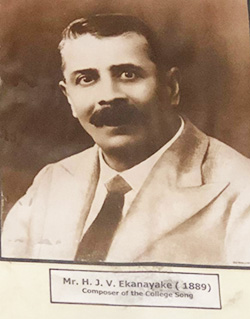 H JVI Ekanayake is perhaps better known to generations of Wesleyites as the composer of the rousing College Song, "Boys of Wesley through the land". Yet in his time he was an outstanding Scholar, Bard and Legal luminary. He had the advantage of family wealth and lineage but his intellect and leadership backed by hard work and dedication secured for him a high position in society. HJVI was enrolled at Wesley College during its location at Dam Street in 1882, when Rev. Arthur Shipham was the Principal. He made excellent progress at school both in the academic work and in sports, and came later under the influence of Rev.Thomas Moscrop, who further developed his innate academic skills.
H JVI Ekanayake is perhaps better known to generations of Wesleyites as the composer of the rousing College Song, "Boys of Wesley through the land". Yet in his time he was an outstanding Scholar, Bard and Legal luminary. He had the advantage of family wealth and lineage but his intellect and leadership backed by hard work and dedication secured for him a high position in society. HJVI was enrolled at Wesley College during its location at Dam Street in 1882, when Rev. Arthur Shipham was the Principal. He made excellent progress at school both in the academic work and in sports, and came later under the influence of Rev.Thomas Moscrop, who further developed his innate academic skills.
He participated extensively in the activities of the school, and had a prominent position being an eloquent speaker. He was Secretary of the College Literary Association, and the first Editor of the Wesley College magazine which was published in 1898. In an Editorial he wrote " We do not apologise for our existence, we will try to justify it." In a Prize winning Debate , in which his oratorical skills shone, he pleaded for " Oriental Languages in a Collegiate Course", at a time when English Language held supreme pride of place. He was a keen student of the Classical Languages of Greek and Latin, but did not neglect the Oriental Classical languages of Sanskrit and Pali in which he achieved a high degree of proficiency.
 Interest in the latter Languages was encouraged by the Rev. Thomas Moscrop's interest in Buddhism, as for a proper study of Buddhism it was necessary to consult Buddhist canons in Sanskrit and Pali. HJVI passed the Cambridge Senior with Distinctions, and was the winner of the Hill Medal in both 1888 and in 1889. HJVI had the good fortune to come under the influence of Rev.Henry Highfield during the closing stages of his school career, who immediately recognised his talents. He was also a keen sportsman and played for the 1st XI Cricket Team, and was the Secretly of the Cricket Club. On leaving School he became a teacher at Wesley for a short time, and put to full use his training in both Western and Eastern Classical Languages.
Interest in the latter Languages was encouraged by the Rev. Thomas Moscrop's interest in Buddhism, as for a proper study of Buddhism it was necessary to consult Buddhist canons in Sanskrit and Pali. HJVI passed the Cambridge Senior with Distinctions, and was the winner of the Hill Medal in both 1888 and in 1889. HJVI had the good fortune to come under the influence of Rev.Henry Highfield during the closing stages of his school career, who immediately recognised his talents. He was also a keen sportsman and played for the 1st XI Cricket Team, and was the Secretly of the Cricket Club. On leaving School he became a teacher at Wesley for a short time, and put to full use his training in both Western and Eastern Classical Languages.
He also inaugurated the Wesley College Cadet Corps. He decided to follow a career in Law, and won a scholarship awarded by the Board of Legal Education, After qualifying he was called to the Bar in 1900. He was later appointed as a magistrate and was held in high regard, and administered his judicial responsibilities with skill, justice and fair play. This was amply displayed at the time of the "Ambalangoda riots", which flared up primarily due to excesses on the part of the military. In 1906 he was promoted as a District Judge, and entered the ranks of the prestigious Civil Service, and his judgments earned him the sobriquet of "Daniel of the Bench".
Despite his onerous official duties HJVI did not hesitate to play a leading role in Society, he was a Founder Member of the Sinhalese Sports Club, and was its Vice President, he was also Secretary of the Radella Club, and later Patron of the Wesley College Old Boys Union. He married Geraldine Louise May the daughter of Maha Mudaliyar James Amerasekera of Nattandiya. They had an only child, a son, Edward Stubbs Dewinton, so named after Sir Edward Stubbs, Governor at the time, who was the godfather.
A plaque now marks the position of a tree planted at Ekanayake Walauwwa gardens in Kotte by Sir Edward Stubbs during a visit to the home of HJVI. Tragically this only child was lost at the age of 17 years in a drowning accident, causing considerable grief to the parents. His literary talents and skills are best displayed by the composition which later became the College song, his extempore" Boys of Wesley through the Land" sung after a farewell dinner to a Junior Master- An Old Boy- held at College Hall in Dam Street.
This was an instant hit, which not only cites the brotherhood of Past and Present, but also makes a patriotic appeal, 'and for our dear Land we'd be, men of grit and Industry." Both the words and tune of this College Song has brought Wesleyites of several generations together, and now with Branch OBU's in the UK and Australia, its popularity has gone beyond the shores of Sri Lanka. HJVI is indeed a worthy product of Wesley College, and future generations can continue to be inspired by his outstanding performance and high standard of integrity. He was honoured by the School when soon after his death a Portrait was unveiled in the College Hall by the Principal Rev. D. lzzette at the Annual OBU Celebration in March 1941. A Prize named after him is also presented at the Annual Prize Giving. The Latin quote -' Non tetigil, quod non ornavil ' well describes his life's work - for he touched nothing which he did not a adorn! '
Sir Oliver Ernest Goonetilleke GCMG., KCVO, KBE,KSTJ, DLL, BA.,
 Sir Oliver Ernest Goonetilleke, is without doubt the most illustrious product of Wesley College. He was the only son of Mr. & Mrs. A.E.Goonetilleke, and one of eight children, born on October 20th ,1892 in Trincomalee. From humble beginnings he blazed a career to the highest position in the land, which can be described only in superlatives. His early education was at Wesley College at the time of the legendary Rev. Henry Highfield, and he was a brilliant student right from the start.
Sir Oliver Ernest Goonetilleke, is without doubt the most illustrious product of Wesley College. He was the only son of Mr. & Mrs. A.E.Goonetilleke, and one of eight children, born on October 20th ,1892 in Trincomalee. From humble beginnings he blazed a career to the highest position in the land, which can be described only in superlatives. His early education was at Wesley College at the time of the legendary Rev. Henry Highfield, and he was a brilliant student right from the start.
His school career ended with his receiving the Hill Medal, (which he won for a third time, a record unsurpassed to this day), Gogerly Scholarship and several other prizes. With regard to OEG's involvment in sports, one could quote Headmaster, Eric A Gunasekera's article in a Double Blue Magazine, " Few people will believe that OEG ever wielded the willow. As a matter of fact he captained a third eleven team against Royal College. Even in those early days, in the classroom and in the field of sports he showed signs of leadership, a brilliant mind, and great versatility.
Queens Visit to Ceylon - 1954
Sir O.E.G seen at the Welcoming Ceremony For the Queen and the Duke with Lord Soulbury, The Governor of Ceylon
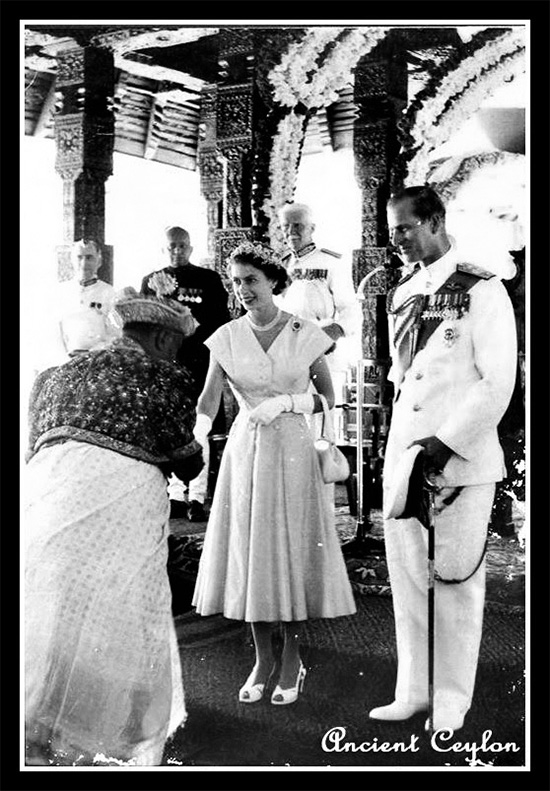
He was also a smart Officer in the Ceylon Cadet Battalion." Sir Oliver's first appointment was as an Assistant Teacher at Wesley, but this was a short stint, as he then joined a Bank, and subsequently Government service. Here his extraordinary ability and intellect took him to the very top, as Auditor General . Prof. Ludowyk describes him as the " quickest witted Ceylonese of his generation, which earned him this high position", which in normal circumstances at the time would surely have gone to a British Civil Servant. During the Second World War, he functioned as Civil Defence Commissioner, and Food Commission, responsible for securing food supplies at a time of extreme scarcity. In 1944 he became the first Ceylonese Financial Secretary.In 1947 he left Govt service and was appointed Minister of Home Affairs and Leader of the Senate. In 1947 began one of the most exacting assignments of his career, that of negotiating with the Colonial Office the New Constitution of Ceylon, on behalf of D S Senanayake, the Prime Minister. It was a perfect partnership in which neither could have succeeded without the other. OEG a calm, quiet negotiator with an analytical mind who clearly saw what had to be achieved. It was indeed an arduous and complex task, which culminated in the draft Constitution, granting full Dominion status to Ceylon.
He spent many hours and days arguing line by line with Whitehall Officials the best terms he could get whilst keeping in close touch with his partner, D.S.Senanayake. The Soulbury Commission who were entrusted with the final negotiations visited Ceylon, and Sir Oliver handled this visit and the numerous contacts they wished to make at many locations. Sir Ivor Jennings in his book "The Constitution of Ceylon ", paid a handsome tribute to the services of DS Senanayake and Sir Oliver and makes the remark that if not for their efforts Ceylon would have remained a Crown Colony for a while longer. In fact he makes the remark "Well done OEG ".
At the time, SWRD Bandaranaike was becoming a force to reckon with, whilst he initially opposed the proposed Constitution, upon further scrutiny with Sir Oliver and DS he relented and in fact moved the motion in Parliament to adopt the new Constitution. It was indeed a worthy victory. He was appointed Minister of Home Affairs in the first Cabinet and the leader of the Senate in 1948, and in the same year was appointed as the First Ambassador to the Court of St James, London. Then there was the death of his dear friend DS Senanayake, and he returned home, and was in charge of the arrangements of a befitting funeral. At the end of this sad event it is reported he walked all the way home alone. In the new Dudley Senanayake cabinet he was once again appointed Minister of Home Affairs and upon the former's resignation.
Sir John Kotelawela the new Premier, appointed him as Minister of Finance in his Cabinet. At the Commonwealth Finance Ministers Conference in Canberra in 1954, the Ceylon Daily News headlined, "Fireworks are expected from Sir Oliver with his demand that the social advancement in Asia, must receive top priority and not await long term solutions." Dr. Evatt of Australia described him as one "of the five best brains in the Commonwealth." His participation at the conferences was highly valued as he had the capacity to iron out differences and reach a consensus on complex and controversial matters.
A noteworthy achievement in the time was the successful launching of a 5.0 million Loan in the London Financial markets to be used for the country's development. In 1954 budget he proposed a plan for attracting foreign investment to bring in capital and expertise. cardinal principles which reads like a recent BOI statement. Clearly these measures were ahead of its time and OEG's visionary plans did not come into full fruition. In 1954 in addition to being Minister of Finance, he was also appointed Minister in Attendance for the impending State visit of Her Majesty, Queen Elizabeth II.
Again Sir Oliver took complete charge and meticulously made all the arrangements for what turned out to be a highly successful visit Additional honours followed and he was appointed was the First Ceylonese Governor General in 1954. To this high office he brought his great experience and talents, and caused successive Premiers to turn to him for counsel and advice, which he impartially and freely gave. The very first public engagement after his appointment as to visit his Alma Mater, Wesley College . It was fortuitous that the Principal at the time was Cedric Oorioff, a former CCS, steeped in the classical languages, as was Sir Oliver. His welcoming speech was full of Latin quotations.
Sir Oliver did not fail to recall with gratitude the education he received at Wesley, and that the bursaries and scholarships played a valued part. Sir Oliver maintained an abiding interest in Wesley and made Several contributions for its improvement. Despite his onerous duties he threw his heart and soul into the activities of the Old Boys' Union. He was its first President and always found time to attend committee meetings. He was the confidante of Principals, and befriended many an Old Boy and teacher, and was truly a friend of the school in good times and bad.
He did not hesitate to welcome into "Queens House" Old Boys for meetings, and even during the time he was away in England he remained as its President, at the unanimous request of the Old Boys. Another institution which engrossed Sir Oliver's attention and support was the Diocese of Colombo. He addressed himself to the task of securing funds which the Diocese needed. He satdown day afterday and signed scores of appeals to Church people, thereby obtaining the necessary funds by voluntary contributions and was also involved in the YMCA and was active in the forum.
In 1956 SWRD Bandaranaike became Premier but he retained OEG as Governor-General: However, the Opposition Left -wing group moved a motion to -reduce his emoluments, but SWRD responded with great dignity as follows. To quote "It is only fair on my part to state that H.E. the Governor General, Sir Oliver Goonetilleke has placed his knowledge, experience and Constitutional powers at the full disposal of the present Government, and as constitutionally proper has been most helpful, and given great assistance to many pressing problems. " The motion was defeated in Parliament. In May 1958 in Sir Oliver's words ," A cataract of looting and public killings ruined the fair name of Ceylon, and unasked I took over the task of saving Ceylon from the flames of racial conflict.
Commenting on this action Prof.. EFC Ludowyk said " His action was without constitutional precedent , and had he not taken action many more hundreds of lives would have been lost." According to Prof Ludowyk, Sir Oliver paid the penalty " for superior powers of mind, which cause a continual reproach in self esteem of small persons". Tarzie Vittachi, described him as "the most interesting Sri Lankan who had ever lived since the West came to Ceylon. " In 1962 came the end of is term as Governor General, in which high office he had spent 8 years. After 40 years of unbroken service to his country, at the age of 70 this loyal son of Lanka retired to England.
There his mind was active as ever, he became a member of Lloyds, and indulged in his favourite sport Racing. He traveled in the winter months, which included a visit to his life long friend Pandit Jawarhal Nehru. In the evening of his life, he returned to Sri Lanka and passed away on the 17th December, 1978, at the age of 86 years. A large and appreciative public erected a statue to honour his memory at Kanatte road roundabout. Yet his huge contributions in the service to Sri Lanka will remain an even more permanent memorial in the annals of this country, surpassing either marble or bronze.
Addendum
Sir O E Goonetilleke (1892 - 1978)
Public Servant and Race Horse Owner
Oliver Ernest Goonetilleke, son of A.E. Goonetilleke, was born in 1892. He had two daughters Sheila Sathanandan and Joyce Wijesinghe. He studied at Wesley College, in Colombo. He achieved a Bachelor of Arts Degree at London University in England. He was a teacher at Wesley College for a time and later worked as an Accountant at the Bank of Colombo, Manager of the Ceylon Daily News, Director of the YMCA and also held high office in the Diocese of the Anglican Church.Entry in to Public Service was when he was appointed as Assistant Railway Auditor. Under the Donoughmore Constitution he worked as Auditor General. He was appointed Civil Defence Conunissioner at the outbreak of the Second World War. He was vested with great authority in many fields of civil government. In the years immediately following the war, he played a major role in laying the political and economic foundation of the island. His negotiations with the British government enabled Ceylon to have a greater share in the prosperity of tea, miter and coconut industries. His action in imposing export duties brought the government considerable revenue. As Financial Secretary, under the Donoughmore Constitution, he gave his assistance to introducing the Soulbury Constitution and Independence. He was knighted.In Ceylon's first Cabinet he was appointed Home Minister. He was then made Ceylon's High Commissioner in London. In 1954 he became Ceylon9s Governor General. In retirement, he lived and worked in London, England.
His greatest interests were horses and racing them. His horses ran at Epsom and Ascot just outside London. The Ceylon Turf Club honoured him by calling one of the principal events of the Colombo August Race Meet the 'O.E.Goonetilleke Cup'.
H.A.J. Hulugalle has said: "Sir Oliver Goonetilleke reached eminence by a combination of mental ability, physical energy and a happy knack of being always there".
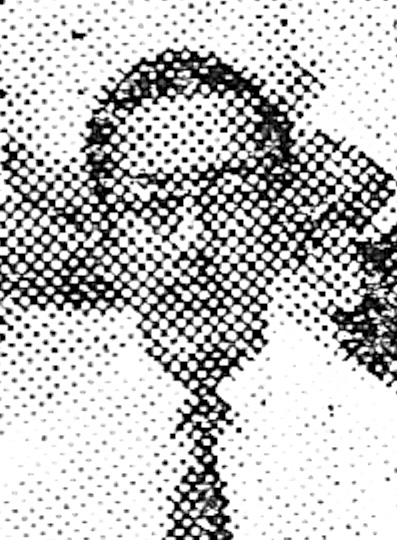 Fred was a student at Wesley during the Cartman and Oorloff eras from 1945-51. He was a College Prefect, Troop Leader, Senior Hostel Prefect, Editor- Double Blue and Captain of the College Hockey XI. He graduated from the Ceylon University and taught at Wesley from 1957-60. He was a highly successful teacher of English and also actively promoted the game of Hockey.
Fred was a student at Wesley during the Cartman and Oorloff eras from 1945-51. He was a College Prefect, Troop Leader, Senior Hostel Prefect, Editor- Double Blue and Captain of the College Hockey XI. He graduated from the Ceylon University and taught at Wesley from 1957-60. He was a highly successful teacher of English and also actively promoted the game of Hockey.
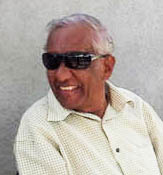 |
Addendum by Dr. Nihal D Amerasekera
I have known Fred Abeysekera since my very early childhood being a family friend living near Nugegoda -Then as a school prefect and thereafter as an English teacher. He was a superb teacher and I learnt many tips and skills of English essay writing. Fred made English interesting. In addition to the classic text "Treasure Island" he introduced us to the many aspects of English poetry. Fred's insight into the various nuances of the poem by Samuel Taylor Coleridge "THE RYME OFTHE ANCIENT MARINER" still lingers in my mind. After I left Wesley I have met Fred many times. Welfare of his beloved school is foremost in his mind. Always soft spoken and kind I will remember him as an excellent teacher and a good friend. We wish him a long and happy retirement.
From The Editor 125th Anniversary Souvenir
 Vivian began his career at Wesley and is a product of the Cartman era. He is the donor of the LV Jayaweera Memorial Trophy for the St.Anthonys v Wesley Cricket match awarded in memory of his father who was an old Antonian and former All Ceylon Cricketer. He was Wesley's honorary Boxing coach during Rev Cartman's era. Vivian has been responsible for promoting sports at Wesley for many years. He was an Officer of the Mounted Police. His deep and abiding concern to be associated in perpetuating the memory of his Principal Rev. Cartman is exemplary.
Vivian began his career at Wesley and is a product of the Cartman era. He is the donor of the LV Jayaweera Memorial Trophy for the St.Anthonys v Wesley Cricket match awarded in memory of his father who was an old Antonian and former All Ceylon Cricketer. He was Wesley's honorary Boxing coach during Rev Cartman's era. Vivian has been responsible for promoting sports at Wesley for many years. He was an Officer of the Mounted Police. His deep and abiding concern to be associated in perpetuating the memory of his Principal Rev. Cartman is exemplary.
From Dr Nihal D Amerasekera
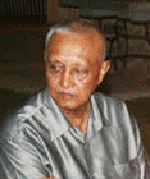 Vivian Jayaweera joined Wesley in 1946. He represented school in rugby, badminton and athletics and completed the Senior School Certificate (SSC) in 1957. Mr. Dabrera got him a job at Baurs, which he declined and stayed at home until mid 1959. Then he worked at the Colombo Municipal Council and later joined the police in January 1960.
Vivian Jayaweera joined Wesley in 1946. He represented school in rugby, badminton and athletics and completed the Senior School Certificate (SSC) in 1957. Mr. Dabrera got him a job at Baurs, which he declined and stayed at home until mid 1959. Then he worked at the Colombo Municipal Council and later joined the police in January 1960.
As I recall. Vivian Jayaweera was 2 years my senior at school. He was a lively lad into schoolboy mischief and was a popular boy. He was ever present at the school cricket matches standing under the "Mara Trees", supporting the school with his booming loud voice . His brother Gamini was a year junior to me and was a fine athlete. His sister Manel was at Wesley until STD 3.
I had the good fortune to meet Vivian around 2005. He was a most generous host taking me to a plush Colombo hotel for a sumptuous dinner. We talked at length reminiscing about mutual friends and teachers and the happy times at school. Subsequently I have kept in touch with Vivian who has since emigrated to Sydney Australia. He is still in touch with the many Wesleyites in Sydney and joins in the fun at the reunions and get-togethers.
Vivian has been a great supporter in keeping the memory of Rev James Cartman alive. When Rev Cartman's daughter visited the school Vivian joined in the tributes and the celebrations that ensued.
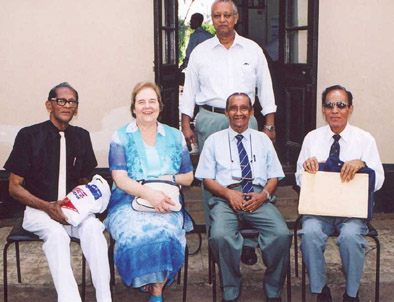
L to R: : Shelton Peiris, Christine Weaver, Mervyn Peiris and MAM Sheriff,LV Jayaweera standing
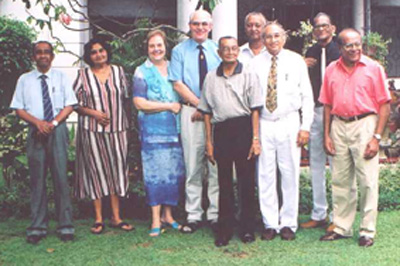
Mervyn Peiris, Suveni Weerasekera, Mrs. Christine Weaver, Michael Weaver, Edmund Dissanayake, Vivian Jayaweera, MAP Fernando, Shelton Peiris, Neville Weerasekera
I wish Vivian a long and happy retirement in Australia
Link to further reading
From Malinda Seneviratne
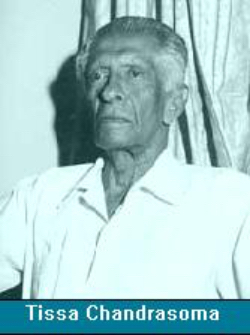 Manikkuwadumestri Chandrasoma Is probably one of the oldest if not the oldest survivors of the Ceylon Civil Service, that august collective of which members of the present day incarnation, the sri Lanka Administrative Service , speak with awe, but with hardly a tinge of guilt. At 87 he has lost none of his eloquence and the capacity to laugh at himself, although by his own admission he has trouble remembering names.He was the eldest in a family of 7 boys and 2 girls, and was born in his mother's village Hennatota, Dodanduwa in 1913. The family had later moved to their father's village of Arachchikande, off Hikkaduwa. Chandrasoma, Tissa to his colleagues and friends, claims that his family name, Minikkuwadumestrige, means "master carpenter" or builder of boats and ships. His father: MWM.de Silva, was a government contractor specialising in bridge building and apparently built the Chilaw Puttalam railwayline. Chandrasoma himself had heard about this very recently and said he couldn't confirm the story, although he did recall having spent a lot of time in that area when he was very young.
Manikkuwadumestri Chandrasoma Is probably one of the oldest if not the oldest survivors of the Ceylon Civil Service, that august collective of which members of the present day incarnation, the sri Lanka Administrative Service , speak with awe, but with hardly a tinge of guilt. At 87 he has lost none of his eloquence and the capacity to laugh at himself, although by his own admission he has trouble remembering names.He was the eldest in a family of 7 boys and 2 girls, and was born in his mother's village Hennatota, Dodanduwa in 1913. The family had later moved to their father's village of Arachchikande, off Hikkaduwa. Chandrasoma, Tissa to his colleagues and friends, claims that his family name, Minikkuwadumestrige, means "master carpenter" or builder of boats and ships. His father: MWM.de Silva, was a government contractor specialising in bridge building and apparently built the Chilaw Puttalam railwayline. Chandrasoma himself had heard about this very recently and said he couldn't confirm the story, although he did recall having spent a lot of time in that area when he was very young.
He had his early education at the Hikkaduwa government school. Later he had been sent to the section of Ananda Vidyalaya that was later to become Nalanda College. Since Ananda did not prepare students for the Cambridge Junior Examination largely influenced by his uncle Chandrasoma chose to go to Wesley College where he excelled both as a student and an athlete. Since he was very young, he had to sit the Cambridge Junior three times."the first time I got honours and distinctions, the 2nd time I got honours and the last time I just passed" he said laughingly. . He was a member of an elite relay team which broke all three major relay records in one afternoon,100, 220 and 440yards.
Speaking of his days at Wesley Chandrasoma said that Mr. Moscrop,the son of a Protestant Missionary in Jaffna,who was his English teacher had a strong influence on him. In fact he said that he owed much of his writing skills to this teacher, who had made him write endless essays and had encouraged him to read one verse of the New Testament everyday as a way of improving his English. Moscrop had been a friend of Joseph Conrad and would receive that authors latest books which he would pass on to his disciple. His uncle had got together with Mr.Kularatne to persuade him to sit his Matriculation examination from Ananda. This he did and got a first division pass. In 1932 he entered the university and later passed the Civil service examination joining the service in 1938. here he had a brief but eventful tenure. In 1952 at the age of 39 he was appointed as the Principal Collector of Customs and was the 1st Sri lankan to hold that post. Chandrasoma had acted on behalf of his predecessors when they had gone on leave. It was Sir John who made his appointment. By 1957 he had become disillusioned with the Service. For 6 years after that he worked as operations manager at the Shell company. In 1963 he again joined the Port Commission. After leaving the Civil Service he worked in the Private sector until he was 60. Chandrasoma has written 4 books. His "Vignettes of the Ceylon Civil Service 1938-57" was published in 1991.
From Parakrama Chandrasoma
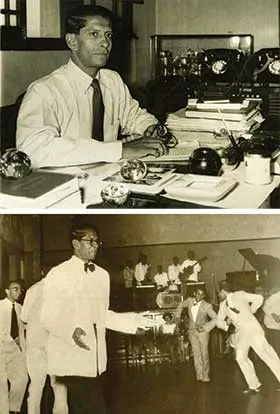 Tissa Chandrasoma lived a wonderfully eventful life. He was the epitome of the generation of children who began schooling in their small villages and sought higher education in Colombo. The post-independence leaders of the country were mostly born from this group. The first part of this transition was magnificent for Tissa. He met and married my mother in University College, Colombo and entered the elite Ceylon Civil Service. After service in Kandy, Badulla, Kegalle, Puttalam and Gampaha, he returned to Colombo to work under Sir John Kotelawala in the Ministry of Communications. He replaced the departing British head of the Customs and Port Commission, the first Sri Lankan after Independence to hold a job vital to the economy of a country then dependent on the export of one product. There, he reached the pinnacle of his career, very much in the public eye, living in splendour and traveling the world.
Tissa Chandrasoma lived a wonderfully eventful life. He was the epitome of the generation of children who began schooling in their small villages and sought higher education in Colombo. The post-independence leaders of the country were mostly born from this group. The first part of this transition was magnificent for Tissa. He met and married my mother in University College, Colombo and entered the elite Ceylon Civil Service. After service in Kandy, Badulla, Kegalle, Puttalam and Gampaha, he returned to Colombo to work under Sir John Kotelawala in the Ministry of Communications. He replaced the departing British head of the Customs and Port Commission, the first Sri Lankan after Independence to hold a job vital to the economy of a country then dependent on the export of one product. There, he reached the pinnacle of his career, very much in the public eye, living in splendour and traveling the world.
I treasure a picture of him in his naval uniform introducing his staff to Queen Elizabeth at the opening of the new pier in the Colombo port, dedicated to Her Majesty during her Royal visit to Ceylon in 1952. Sadly, Tissa’s life in public service came to an abrupt end soon after the election of Mr. Bandaranaike in 1956. After a conflict with the new Prime Minister, a political disagreement strangely at odds for a man who didn’t have a political bone in his body, Tissa resigned from his beloved Civil Service. While this completely justifiable action was based on principle, it is something my father regretted all his life.
The above paragraph describes what most people know about Tissa Chandrasoma. It is largely irrelevant in the big scheme of things. The wonder of my father’s life can never be measured by his achievements, powerful as they may have been. It must be measured by who he was within his brain and his soul. That is the man I knew and will try to describe.
In the first decade of my life, which began one month after Independence, I did not know my father very well. His life was too hectic. His time at home was always rushed. While every memory I had of him during my early life was positive, one remains indelibly fixed in my mind. I must have been eight years old. I had done something wrong; I do not remember what it was. When confronted by my mother, I lied, denying that I was the culprit. My father was watching. He called me and told me to sit next to him. He asked me: “Son, tell me, did you lie?”. I knew I was caught. I nodded my head with my eyes cast down to the floor. He gently lifted my face and made me look at him. He said, “Son, lying is in itself a bad thing. But that is not the real problem about a lie. When you lie, you are admitting that you are frightened of the person to whom you are lying. You are being a coward. There is no reason in the world for you to be frightened of your family. But you must also learn to never be frightened of anyone else in the world. Do you understand?” I nodded my head. He ruffled my hair in the usual manner he expressed affection, smiled, and dismissed me. That single lesson I have tried to follow all my life. I have tried to live my life without lying or fear of anyone. Lying, as my father always said, is the primary sin. If one can lie, one can do anything.
However, white lies to preserve domestic peace are perhaps the exception that prove this rule.
After Tissa left public service, he joined Shell Company as its Operations Manager. This required him to travel for management training in England. Our whole family joined him to England a few months after his departure. At the end of the year of his training, my father and I came back to Ceylon. My mother and three brothers stayed in London, two to pursue higher education and, in the case of our beloved youngest brother Mahen, to desperately find an impossible cure for his cerebral palsy.
I had nearly three years during which I lived with my aunt Viji and had my father all to myself. His life was still busy but I was the focus of his attention. Every morning, he would drive to his office in the Fort and then give the wheel over to the driver to take me to Royal College. School was over at 3:45 and I got to his office around 4. As I walked in, my father was invariably lounged in his chair with his feet on the desk, his brow furrowed by a particularly difficult clue in the London Times cryptic crossword puzzle. He would acknowledge me with a wave and I would sprawl on the floor to finish my homework. I would watch his face turn from puzzlement to delight as he found answers. He never left the office till the crossword was done. I used to gather the Times look at the completed puzzle. I could never figure it out. Many decades later, I was at an airport with a long flight ahead of me. Browsing in the bookstore, I saw a book of London Times Crossword puzzles. I immediately bought it, resolved to solve many puzzles. During the next seven hours, my brow never displayed happiness. I could not figure out a single clue. I realized then that to be called smart in my father’s time was infinitely more difficult than when I reached his age.
Again, one conversation with my father during this time stands out in my memory. My mother and father were from different castes and we grew up in a home where caste was never discussed. When a discussion around caste arose at school among my second form friends, I had no clue. Driving back home after work that day, I asked my father to which caste I belonged. He smiled knowingly and, without batting an eye, said: “Tell your friends that your father and mother are of different castes, and that makes you a proud member of the Jarawa caste!” His disdain for the caste system was profound.
Weekends were father-son times during these three years. We took body-surfing beach trips to Mount Lavinia followed by lime juice with soda at the Sinhalese Sports Club. Regular trips back to his home in Arachikande that always consisted of fast and spine-tingling driving on narrow roads, a sea bath in the pristine beach at Hikkaduwa, king coconut water and a well bath, followed by lunch and a long siesta.
But the most vivid image I have of our weekend trips were the ones to Nuwara Eliya. The Shell Company had a vacation home on Upper Lake Road called Craig Var. After driving dangerously over the winding mountainous roads, we would have a quick bath and go to the Grand Hotel for dinner. The hurry to get there was so that my father could play billiards with Wilson, the billiards marker. After that it was my turn when they tried to teach me the game. This was a thrill as I improved, slowly evolving into a decent player over the years.
After dinner, we drove back to Craig Var to hang out in the living room. With a log fire roaring and creating a delightfully warm room, I still see my father sitting on an oversized armchair with his books and crosswords, and me sprawled on the carpet trying to figure out the answers to problems in a book of complicated mathematical puzzles that he had bought for me. Few words were spoken or necessary as we just lounged till close to midnight.
I saw and understood Tissa Chandrasoma’s real self on our short sojourns during this magical time of my life. The world may have seen a jet set fast living man. But to me, he was an incredibly simple man whose ethical code was impeccable and incorruptible. He remained throughout his life the child that he describes in his first book “Five to Eight” about his childhood in his village on the Southern Coast of Sri Lanka. All the pomp and pageantry that surrounded him in his later years never touched his basic simplicity and goodness.
He visited our home in Pasadena once. He did not like the American way of life that we lived. It was too complicated, even though he did not realize that it was much simpler than the life he lived when he was my age. He was sad that my children did not know Buddhism sufficiently. Upon leaving, he promised to write about Buddhism for my children. His book about the Buddha’s life (“Siddhartha Gotama of the Sakya Clan”) is written as a letter to his grandson Pradip, my youngest son. It is one of our family’s greatest treasures. He left us with the firm statement that he would never again go to a place where he did not have his bed in his room in his house in Sri Lanka. He never did.
He died in the last week of December 2004. He was sitting in front of the television, having breakfast. His heart and brain simply stopped when he saw the first images of the tsunami devastate the coastline around his beloved Hikkaduwa.
May he have attained Nibbana.
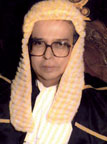 A Distinguished Old Boy of Wesley College Hon Mohamed Haniffa Mohamed was born on 15 June 1921,at Dematagoda in Colombo his father N.M.M.Haniffa was one of the first muslims to attend Wesley under Rev Samuel R.Wilkin. Proctor Haniffa's father was the uncrowned King of Colombo's vegetable trade it is said that it was Proctor Haniffa father A.M.Nagoor Meera who was one of the those philanthropist who helped Rev Henry Highfield.When the latter went around the country on his bicycle.
A Distinguished Old Boy of Wesley College Hon Mohamed Haniffa Mohamed was born on 15 June 1921,at Dematagoda in Colombo his father N.M.M.Haniffa was one of the first muslims to attend Wesley under Rev Samuel R.Wilkin. Proctor Haniffa's father was the uncrowned King of Colombo's vegetable trade it is said that it was Proctor Haniffa father A.M.Nagoor Meera who was one of the those philanthropist who helped Rev Henry Highfield.When the latter went around the country on his bicycle.
Hon M.H.Mohamed joined Wesley in 1926 and spent the entirety of his student life at Wesley.When asked why Wesley? Mr Mohamed replied that at Wesley "their were no racial or religious lines drawn and the education was secular".Hon Mohamed was at Wesley during the era of Rev A.Huchinson and Rev John Dalby.All his brother also went to Wesley students of Wesley will remember M.H.M.Munas the donor of the Botany/Bio Lab M.H.M.Munas is the elder brother of Hon M.H.Mohamed.Hon Mohamed's five sons also went to Wesley college and are actively involved with the Union.
Hon M.H.Mohamed on leaving Wesley took up business established by his Grandfather and took a keen interest in politics he was elected to the Colombo municipal council in 1945 and went on to become the First Muslim Mayor of Colombo.During his tenure of office he got the Campbell park lease extended and when Hussain Mohamed his eldest son became Mayor Campball park was handed to Wesley. Hon M.H.Mohamed first contested for a Parliament seat in 1965. and was returned as the M.P for Borella the seat he still holds. Hon M.H.Mohamed was rewarded for his invaluable service to the community, by being appointed a minister for 4 successive cabinets of the United National Party and went on to become the Speaker of the Sri Lanka Parliament on 9 March 1989.
Hon M.H.Mohamed it must be remembered was one of those Wesleyites who were instrumental in saving Wesley College being taken over by the government in 1961, in the famous takeover crisis of private school.Hon M.H.Mohamed is the only distinguished old boy to be invited on 5 occasions to be the Chief Guest at the Wesley College Annual Prize Giving. Hon M.H.Mohamed has been a pillar of support to his old school, both financially and actively supporting various projects.This notable achievement was rewarded by the Union,by electing him the president of the OBU Colombo from 1987 to 1995.
It was during his Presidency that Wesley was provided with a fine play ground and turf wickets,extension of the playing area and the refurbishment of the sports pavilion which was renamed in his honour.Hon M.H.Mohamed's services to Wesley was recognised when his photograph was unveiled in the College hall. Wesley College together with the other support groups of Wesley formally facilitated Hon M.H.Mohamed MP a distinguished old boy of Wesley for his invaluable and painstaking services rendered to the public and his old school for the past 50 years.
HON. M H MOHAMMED TURNS NINETY (Added 25th June 2011)
Distinguished old Wesleyite the Hon M H Mohammed, Speaker of Sri Lanka Parliament('89 – '94), Minister of Western Regional Development('01 –'04), Minister of Parliamentary Affairs('07 – '10), Member of Parliament for Colombo District('89 – '10) and Mayor of Colombo('60 – '62) celebrated his 90th birthday with family and friends in Colombo. The College is felicitating Hon Mr Mohammed's 67 years of service to the Nation in the College Hall on the eve of his 90th birthday 14th June 2011. Mr Mohammed's sons followed in their father's footsteps from Kindergarten right through maintaining the strong link with Wesley College. They are still involved with the brotherhood of Wesleyites and demonstrates the once strong father-son links that underpinned the traditions of Wesley College which sadly has fallen away over recent years. Many would remember Mr Mohammed's sons: M. Hussain Mohamed, Former Mayor of Colombo, Vice Patron OBU Colombo; Hassen Gazzali Mohamed; Ahamed Azahim Mohamed, active member of the OBU UK Branch; Haniffa Mohamed and Shaul Hameed Mohamed, Vice President OBU Colombo.
Sir Baron Jayatilaka's legacy From the Ceylon Daily News 17th August 2001
Sunday Leader, June 19, 2011
Prof. G.L. Peiris, the Minister of External Affairs said that Mr. M.H. Mohamed was an exemplary politician who is loved and respected by all communities in his political career for nearly 07 decades. Minister Peiris made this comment when he was addressing a meeting organized by the Past Pupils Association of Wesley College, Colombo on the occasion of the 90th birthday of Mohamed who has held the positions of Mayor, Speaker and a number of Ministerial posts.
This occasion was attended by a large number of professionals representing the political, religious, medical, engineering, law, management, and sports fields who were past pupils of Wesley College.
Prof. Peiris further stated "M.H. Mohamed can be described as a politician who brought various communities together". He has rendered yeoman service to the country and all communities, while being Mayor, Minister of Transport, Labour, Urban Development and Muslim Affairs and holding the position of the Speaker in the Parliament. His services were not limited to the Muslim community. For a long time Sinhalese, Tamils and Muslims together with all communities supported him to serve as the representative of the people in the Borella electorate. In this context a question arises whether there should be political parties confined to each community.
Muslim politicians in this country such as C.A.S. Marikkar, Badurdeen Mahamud, A.C.S. Hameed, Bakeer Markar and A.H.M. Fowzie received the support of all the communities in this country i.e. Sinhala, Tamil and Muslim. Hameed represented electorates such as Akurana and Harispattuwa for 35 years, while Bakeer Marker represented the Beruwala people. Entirety of communities in this country extended their support to these political leaders and these leaders too rendered their services to all the communities lavishly.
Mohamad is a political leader who brought the people together. Language skills in Sinhala, Tamil and English possessed by him were of immense use for him to build up this situation. Language ability is very important for communication among one another and it is a must in creating harmony among the communities. Similar ideas and opportunities to exchange ideas and thoughts among each other pave the way for peace and reconciliation among communities. Therefore, the government has given priority to the programme on providing language training for the members of the community and the public officers.
As the Holy Quran states, once a group of followers met with Holy Prophet Mohamed and said "when we face with some problem or trouble we come to you and have it settled by you. But how can we get such troubles settled when you are not among us." Then the Holy Prophet Mohamed had said "In my absence you may settle your problems by discussing them openly without hiding anything in a peaceful manner. The decision you reach shall be treated as the decision I gave you". Therefore, Mohamed also can be described as an exemplary politician who is devoted to his religion and tried to find solutions for the problems of the people by listening to their grievances, without limiting it to one community.
Minister Peiris expressed his gratitude to the Wesley College Old Boys Association which had organized the occasion to pay tribute to a political leader who has rendered an immense service to the country and wished long and healthy life for M.H. Mohamed who completes his 90th year.
The welcome speech was made by Lasantha Fernando President of the Old Boys Association, Wesley College and the Vote of Thanks was made by Hussein Mohamed.
Shanti Mclleland, the Principal, Rajah Sinnathurai, President of the Welfare Society, Azahim Mohamed, Rienzie Wijethilake, Chairman - HNB and Rev. Rohitha de Silva also spoke on the occasion.
Lasantha Fernando (OBU) and Jeremy Brohier(OWSC) presented plaques, in appreciation of the services rendered by Mohamed.
This occasion was attended by Alavi Moulana, Governor of the Western Province, Senior Minister A.H.M. Fowzie, Nimal Siripala de Silva, the Minister of Irrigation and MP Thilanga Sumathipala.
By Shelton Peries
 It was in the mid 40s - the war years - that the writer, as a senior student, met MSM Saleem, in a makeshift Cadjan class room, one of the many erected, around that sprawling mansion - Kittiyakara, that formed the main school. - Wesley's temporary abode. There was a woeful dearth of teachers. As a large number was manning the Civil defence desks. A handful of Senior students were invited to conduct classes. At that point of time, I cannot recall anything very significant that flashes into my mind regarding the subject of this piece.
It was in the mid 40s - the war years - that the writer, as a senior student, met MSM Saleem, in a makeshift Cadjan class room, one of the many erected, around that sprawling mansion - Kittiyakara, that formed the main school. - Wesley's temporary abode. There was a woeful dearth of teachers. As a large number was manning the Civil defence desks. A handful of Senior students were invited to conduct classes. At that point of time, I cannot recall anything very significant that flashes into my mind regarding the subject of this piece.
However, as the term succeeded term, and the school was stabilizing itself with activities, many challenges surfaced. Many of the students at Wesley, then, came from other schools, yet not organized. The buildings at Karlsruhe and its grounds were yet under the command of the Military. There was just a handful of 'Original' Wesleyites forming a rare nucleus. Saleem found his feet very early. He helped us in the library. Staying in after school, this little man, assisted in 're-shelfing' and attending to the Lending registers.
He could be trusted to do a good job. I recall then at Wesley there was a very core of many activities, liaising and linking with like groups of students, and displaying a superlative degree of bon homie My memory focuses on a few of them, like Saleem - Haleem Ishak, Sadique, Mahroof Ismail (Prof. Emeritus), diminutive Ghouse (Whose father-a very gracious gentleman, contracted with Rev. James Cartman in constructing the upper floors of the main building. Jehan Cassim, Mohamed Ahmed, Sanoon, M K Packeer, Jaufer, Meeran, and other fine students. Saleem was a driving force of his group, lending a rich timbre to the very spirit of the school with his perpetual smile and his Aye Aye Sir attitude embellishing whatever undertaking he figured in.
It was MSM who was instrumental in forming the first ever Wesley College Tamil Literary Union. I may interpose here to mention, that our own Haleem Ishak was a luminary of the Sinhala Literary Union, surpassing over his Sinhala colleagues! One recalls that when the great Englishman - Rev. James Cartman was scraping the bottom of the barrel for the upper floor extensions, that young showman Saleem, on many an occasion, stepped into augment the meager College Building Fund. I am sure, to recollect correct, that is was Saleem who put on Stage at Wesley, the First ever Tamil drama.
The Chief Guest was the then Mr Oliver Gunatilleke. Saleem on his own invited that famous artiste, of Tower hall fame, Luxmi Bhai, who graced the stage and held the audience spellbound, with her renderings of Sinhala, Tamil, and Hindi hits. Saleem propelled himself to success - he had no mentor - though Saleem sought the advice and was grateful to his father. It certainly was his sheer grit and perseverance that braced him. Showman Saleem was a big hit in town and the suburbs and even out of our shores.
Another of his big hits to energize College fund was his-'Stars on Parade' a hall overflowing variety show, which was followed a few months later with his scintillating 'Dances of India' lilting to his Oriental Orchestra of Strings and Drums. Saleem's talents were not prescribed to the stage alone, for he was a regular feature program mist of a variety of topics - Music, art, culture and his series of absorbing talks Interspersing all this he appeared with his very popular group-Cuban Combo- a much in demand group by all ages with its variety of tempos.. Brother Saleem's not too big physique was blessed with stamina and also unbounding energy, which stood this talented artist in good stead.
His varied skills, and his multifaceted interests had other ranges loo. The combination of his imagination and deep knowledge of men and matters had no fences, for they traversed the wide open spaces of opportunity and service. He yet remains the untarnished social worker, unbounded by Caste, Creed or Race, Like Abu Ben Adam, a great patriarch, whose virtues were extolled by the Poets. He remains the Common man's sterlings, as he labours behind the limelight shunning the full glare of publicity, unlike some we hear, strutting in dwarf tempo, found everywhere blasting their trumpets, but this giant with absolutely no need of Fife or Drum, remains in the hearts and minds of those he so unobtrusively serve, and who are so appreciative of such service.
Our hero has done Yeoman service to that area of Dehiwela, through the Dehiwela Welfare Association o His service is legendary. We of Wesley are proud to share the great Joy of the State's recognition and appreciation and the honour conferred on him. We also share the pride, of this award, when our modest Hero blushed in receiving the KALABOOSHAN AWARD 2000. Well done thou good and faithful servant, MOHAMED SALIH MOHAMED SALEEM. WE SALUTE YOU.
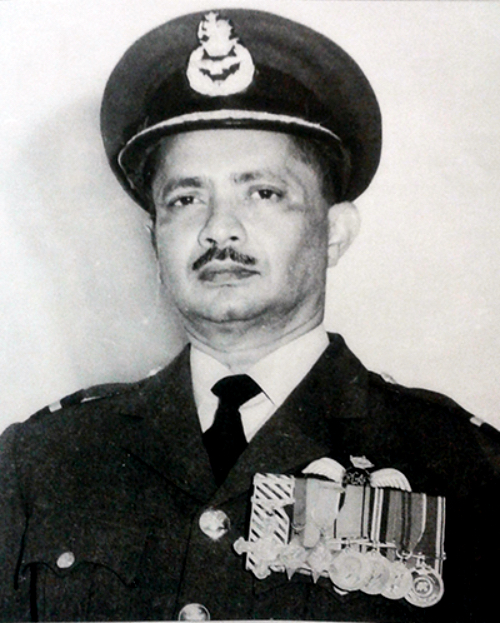
Edward Rohan Amerasekera was born in Kegalle. He received his early education at Kingswood College and then at Wesley College from 1925-29 . Rohan joined the Royal Air Force aged 24 and served in the 153 and 640 Squadrons. He flew 85 sorties over Nazi Germany and became the most decorated Asian in the Royal Air Force. After returning home he joined the Royal Ceylon Air Force first becoming the Air Commodore in 1962 and then the Air Vice Marshall. He was well known for his quiet unassuming ways. Rohan retired in 1972 and died in 1974 at the age of 57.
...........................................................................
From the Sri Lanka Airforce website
Ekanayake Rohan Amarasekara became the first Ceylonese to take over control of the Royal Ceylon Air Force. He was appointed to office on 01 November 1962 holding the rank of Air Commodore.
Rohan Amarasekara was RCyAF's very own World War II hero, having served with distinction as a navigator in the RAF Bomber Command. He had flown on as many as 52 raids, mostly over Nazi Germany. His gallant and selfless contribution during World War II earned him the prestigious Distinguished Flying Cross twice.
He returned to Ceylon in 1951 as one of the RCyAF's first officers, holding the rank of Squadron Leader. He then converted to the General Duties (Pilot) branch when he underwent flying training at No 1 Squadron. He was then appointed as the Senior Air Staff Officer at Air Force Headquarters, and subsequently as the Chief of Staff prior being appointed as the Commander.
He was appointed to the helm of the organization on 01 November 1962. AVM Amarasekara pursued the Ceylonisation of the Air Force. He was instrumental in drafting the Queen’s Regulations to suit local conditions. The official language was introduced into day to day administration of the Air Force. He also played a key role in quelling the coup-d’ètat that threatened to overthrow the government. Amarasekara relinquished command on 01 January 1971. He passed away on 20 March 1974.
...........................................................................
World War II Medals awarded for Service and Bravery
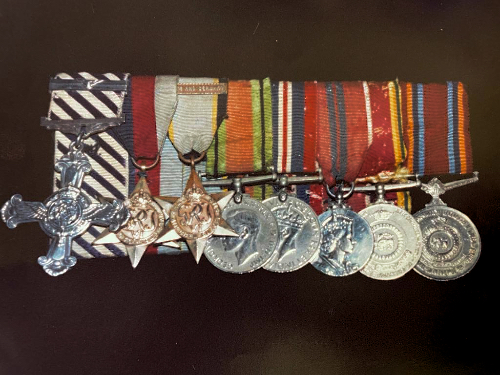
A Description of the Medals
From left: Distinguished Flying Cross(DFC), bar to DFC (2nd award), 1939-1945 Star, Air Crew Europe Star with clasp for France and Germany Star. There should also be a clasp for Bomber Command which is not in this set. Then it’s the War Medal, Defense Medal, QE2 Coronation Medal, Ceylon Armed Services Medal, Ceylon Long Service Medal.
The Distinguished Flying Cross (DFC) is the third-level military decoration awarded to officers, and since 1993 to other ranks, of the United Kingdom's Royal Air Force and other services, and formerly to officers of other Commonwealth countries, for "an act or acts of valour, courage or devotion to duty whilst flying in active operations against the enemy"
The Air Crew Europe Star is a military campaign medal, instituted by the United Kingdom in May 1945 for award to British and Commonwealth air crews who participated in operational flights over Europe from bases in the United Kingdom during the Second World War.Two clasps were instituted to be worn on the medal ribbon: Atlantic and France and Germany.[
The War Medal 1939–1945 is a campaign medal which was instituted by the United Kingdom on 16 August 1945, for award to citizens of the British Commonwealth who had served full-time in the Armed Forces or the Merchant Navy for at least 28 days between 3 September 1939 and 2 September 1945
The Defence Medal is a campaign medal instituted by the United Kingdom in May 1945, to be awarded to citizens of the British Commonwealth for both non-operational military and certain types of civilian war service during the Second World War
The Queen Elizabeth II Coronation Medal (French: Médaille du couronnement de la Reine Élizabeth II[1]) is a commemorative medal instituted to celebrate the coronation of Queen Elizabeth II on 2 June 1953
The Ceylon Armed Services Long Service Medal (Sinhala: සන්නද්ධ සේවා දීර්ඝ සේවා පදක්කම ārakśaka sēvā dhīrgha sēvā padakkama) was a service medal of Ceylon from 1968 to 1972. It was granted to all ranks of the regular forces of the Ceylon Army, Royal Ceylon Navy and Royal Ceylon Air Force provided they had completed 12 years of service. It was replaced by the Sri Lanka Armed Services Long Service Medal in 1972 when Sri Lanka became a republic.
Distinguished Flying Cross The citation for his DFC reads "This officer has displayed a high degree of courage and determination in navigating his aircraft to the target and back, often under great difficulties. In November 1943 whilst on a flight to a distant target, the oxygen supply failed early in the sortie. P/O. Ameresekere, though suffering from lack of oxygen and extreme cold continued his duties and the mission was successfully completed. This officer has proved himself to be a navigator of outstanding ability.".[8]
Bar to Distinguished Flying Cross The citation for the bar to his DFC reads "This officer has completed the second tour of the operational duty. In December, 1944 on route to Essen his aircraft was engaged by searchlights and heavy anti-aircraft fire causing severe damage to the aircraft. Despite shell splinters entering his compartment Flying Officer Ameresekere took evasive action and completed his allotted task. His other targets have been Ruhr Valley, Chemnitz and Hanover. On all occasions FO Ameresekere had a set a fine example by his tenacity and devotion to duty".[9]
...........................................................................
AVM Ekanayake Edward (Rohan) Amerasekera DFC & Bar. R.Cy.A.F. By Charles M. Ameresekere
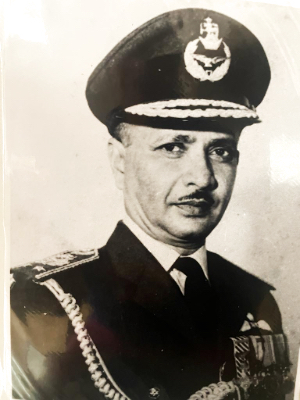 Seven years ago when I first started collecting medals, my father, whose group of medals was the first in my collection, said "You should ask Aunty Aloma for Uncle Rohan's Medals. He won the DFC twice in the last war." Fancy that, if not for my hobby I would never have known that my father's relative was a war hero. After doing some research and with the help of Mrs. Aloma Amerasekera and the offices of the RAF, London and the SLAF, Colombo, and the No 158 and 640 Squadron Associations, I have pieced together his story.
Seven years ago when I first started collecting medals, my father, whose group of medals was the first in my collection, said "You should ask Aunty Aloma for Uncle Rohan's Medals. He won the DFC twice in the last war." Fancy that, if not for my hobby I would never have known that my father's relative was a war hero. After doing some research and with the help of Mrs. Aloma Amerasekera and the offices of the RAF, London and the SLAF, Colombo, and the No 158 and 640 Squadron Associations, I have pieced together his story.
Ekanayake Edward Amerasekera was born in Kegalle, Ceylon on May 21, 1916, and was one of the seven children of Edward Henry Ekanayake Amerasekera and Joselina Amerasekera (nee' de Silva Samarasinghe Siriwardena). Orphaned at the age of four, he was brought up by his uncle and aunt, Victor and Eda de Silva Siriwardena and later lived with his eldest sister, Hyacinth and her husband, Ashley Peiris at 'Ash Court', Kegalle. He received his education at Wesley College in Colombo (1925-29), Kingswood College in Kandy (1929-32), St. Mary's, Kegalle (1933-34) and at the Pembroke Academy (1935-39). Early in his life an astrologer had predicted that one day he will be a great commander, but young Edward could not figure out how that would come about.
At the outbreak of the war Edward joined the Army, but his sister and other family members objected and somehow got him out before he was shipped overseas. He, then, secretly applied to join the RAF on Sept 19, 1940, was selected and left for England with the first batch of RAF Recruits from Ceylon in June 1941 on the S.S. Exeter.
They reached England on Sept 28, 1941 and he enlisted at Euston on Sept 30, 1941 as an Aircraftman 2nd class RAFVR with the service number 1396932. He was reinstated as U/T Observer on Nov 3, 1941 and posted to 5 ITW on Dec 13, 1941. On Feb 20, 1942 he was promoted to Leading Aircraftman and was posted to 1 Empire Air Navigation School on May 2, 1942, followed by a posting to the 1 Advanced Flying Unit on Sept 26, 1942.
On Nov 30, 1942 he was remustered as an Air Navigator, promoted to Temporary Sergeant and posted to the 10 OTU in Abingdon, Berkshire, where he 'crewed up' with Sgt. Stan Emms' crew. They were sent on April 27, 1943 to the 1652 HCU to convert from Whitleys to the heavier Halifax bombers and on June 13, 1943 they got their first squadron posting to No 158 Squadron based at Lissett, Yorkshire.
This Squadron was equipped with Halifax II's and engaged in strategic bombing duties. They flew their first mission on June 21, 1943 to Krefeld. Whilst with this Squadron, on July 29, 1943 he was commissioned as a Pilot Officer, General Duties (Navigator) Branch RAFVR with the Service number 155926.
By Sept 7, 1943 they had completed 16 Operations and it was at this time that they were posted to No 35 Squadron of the Pathfinder Force. The PFF had asked for a volunteer crew from No 158 Squadron and though they had not volunteered they were sent. They spent the rest of September training with the PFF Navigation Training Unit and when it was known to the PFF that they had not volunteered for Pathfinder duties, they were posted back to No 158 Squadron in early October, 1943 to continue their tour.
These transfers show up in the RAF Records as follows- No 158 Squadron microfilm shows "...13 June 1943 arrived with crew ex-1652 Conversion Unit. Sept 1943 Posted to No 35 Squadron." No 35 Squadron's records show "Amerasekera posted in W.E.F. 29 July 1943 from No 158 Squadron. Posted back to 158 Squadron 4 Oct 1943."
P/O Amerasekera flew a total of 20 missions with Sgt. Stanley W. Emms and crew from 21 June 1943 to 18 Nov 1943 before he was screened to do a tour of instruction. These missions were flown just before the end of the Battle of the Ruhr, through the Battle of Hamburg and at the beginning of the Battle of Berlin, and included targets such as Krefeld, Wuppertal, Gelsenkirchen, Koln, Aachen, Hamburg, Peenemunde, Berlin, Essen, Mannheim and Monchen-Gladbach. Twelve of these missions were flown on the aircraft HR755/NP-X (Xpress Delivery).
The crew consisted of F/Sgt. Stanley W. Emms (Pilot), P/O E.E.Amerasekera (Nav), F/O P.H.Ackling (B/A), W/O Geoffrey S. Almond (Wop), Sgt. D.G.Cree (M/U/G), P/O John McGuire (R/G) and Sgt. W.S.H.Strong (F/E). The crew were decorated at the end of their tour, mainly for dedication and bravery shown on Nov 11, 1943 on their mission to Cannes. This incident is mentioned below in Amerasekera's DFC Citation. Emms, Cree and Strong received the DFM, Almond was awarded the Bar to his DFM (he had won his DFM previously with No 102 Squadron), which was one of 60 issued for WW2 & Amerasekera, McGuire and Ackling were awarded the DFC. McGuire rose to the rank of Wing Commander, receiving the OBE in addition to his DFC. Today, McGuire, Emms and Almond are the only surviving members of that crew.
Amerasekera was promoted to Flying Officer on Jan 29, 1944 and was awarded the DFC (L/G Feb 15, 1944). The Citation is as follows- "This officer has displayed a high degree of courage and determination in navigating his aircraft to the target and back, often under great difficulties. In November 1943 whilst on a flight to a distant target, the oxygen supply failed early in the sortie. P/O. Amerasekera, though suffering from lack of oxygen and extreme cold continued his duties and the mission was successfully completed. This officer has proved himself to be a navigator of outstanding ability."
While on Instruction duties, Amerasekera had flown on one Operation, of which details are unknown.
Upon completing his time as an Instructor, Amerasekera joined the No 640 Squadron on Aug 16, 1944. No 640 Squadron which had formed in January 1944 at Leconfield from the C Flight of his old Squadron (No 158) and was now equipped with Halifax III's. Initially he flew eight missions with F/O Fred J. Papple (Pilot), F/Sgt S.I. McLean (B/A), Sgt. R.G.Gunstone (Wop), Sgt. T.W.Dakin (M/U/G), Sgt. J.W.Burns ((R/G) and Sgt. D.S. MacDonald (F/E), replacing their regular navigator 'Ade' Hyde DFC, who had been injured. The targets included Gelsenkirchen, Boulogne, Neuss and Calais.
When Papple's crew completed their tour, Amerasekera flew one mission with P/O F.W. Mills and crew (on Nov 29, 1944 to Essen) and then 'crewed up' with F/O A.J."Bert" Jeeves (Pilot), F/O M.J.Cruthers (B/A), F/Sgt.A.V. Syddall (Wop), Sgt.R.E.Draper (M/U/G), Sgt.F.Smith (R/G) and P/O W.H.Harding (F/E), to fly another 22 Missions from Dec 5/6, 1944 to March 19, 1945.
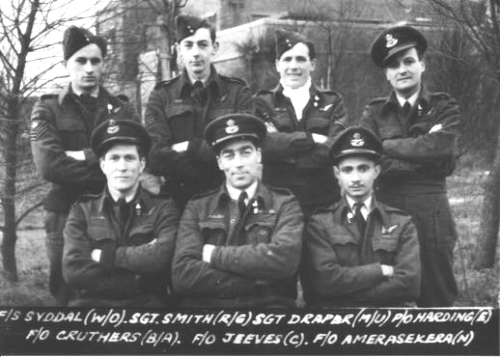
RAF records show that F/O Amerasekera DFC ended his tour with No 640 Squadron on Oct 12, 1944, but actually he continued to fly until March 1945 with the permission of the C/O, in order to complete his second tour. His last Operation was on March 18/19 1945, to Witten. He had flown a total of 52 Operations in these two tours.
Amerasekera was back with the No 158 Squadron from May 6, 1945 to Aug 14, 1945. Here on July 29, 1945 he was promoted to Flight Lieutenant and was awarded the Bar to the DFC (L/G Nov 30, 1945), with the following citation- "This officer has completed his second tour of operational duty. In December 1944, whilst on route to Essen, his aircraft was engaged by searchlights and heavy anti-aircraft fire was encountered causing severe damage to the aircraft. Despite the fact that shell splinters penetrated his compartment, F/O. Amerasekera took evasive action and completed his allotted task. His other targets have included the Ruhr Valley, Chemnitz and Hanover. On all occasions, F/O. Amerasekera has set a fine example by his tenacity and devotion to duty."
The incident mentioned in the citation occurred on December 12/13. 1944 during the outward journey to attack Essen. Their aircraft was illuminated by a cone of searchlights and almost immediately received severe damage by anti-aircraft fire. While Jeeves took violent evasive action to escape the searchlights, Amerasekera calmly continued with his work.
Alex Syddall recalls another (or perhaps the same) incident and I quote "The only time I ever saw 'Amer' look disconcerted was when on our return from either Essen or Chemnitz, he picked up his parachute which he had stowed under his Navigator's seat, to find pieces of Flak embedded in it! But for that parachute he would have been somewhat uncomfortable or at worst the SLAF would not have had Amer as Chief of Staff!"
In addition to the DFC and Bar, he received the 1939-45 Star, the Air Crew Europe Star with the France and Germany bar, the Defence Medal and the War Medal. He was released from service on July 20, 1946 and his last day of service being November 3, 1946. He resigned his commission on November 4, 1946 with permission to retain the rank of Flight Lieutenant. All his surviving crew mates and Bomber Command colleagues remember him with great affection. Ian Roberts of the No 640 Squadron remembers him in his article "Leconfield's League of Nations" as "Handsome and dapper, with hair swept back and parted precisely down the middle, Amerasekera hailed from Ceylon. He completed 52 Operations, requesting permission from the C.O. to stay with Jeeves' crew in order to do so. He flew 22 operations with the New Zealander Jeeves and 8 with Fred Papple. I remember him most vividly with red nose and red cheeks as he was rolled in the snow during one of the inevitable snowball fights between the sergeants' and the officers' messes. After the war he completed a pilots' course and eventually rose to be Chief of Air Staff of the Sri Lankan Air Force. He was an unforgettable man."
In a later interview, speaking of his RAF days, Amerasekera recalled "It was a wonderful experience; we simply lived in them forgetting everything else." Amerasekera returned to Ceylon in late 1945 and served at the RAF Station in Kandy as an Interpreter, with F/Lt. Peter Chadwick, who was in charge of the Civilian employees at RAF Kandy. Here he worked until August 1946.
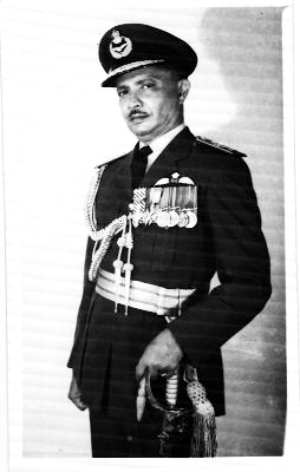 Amerasekera changed his middle name from Edward to Rohan. His service record in the Department of Civil Aviation and the Royal Ceylon Air Force reflects this change. Though he was a Christian, he was very much interested in Buddhist Philosophy, even during the war, and became an ardent student of Spiritualism, Mysticism and mooted for a 'Universal Religion'. He also wrote six booklets about these subjects.
Amerasekera changed his middle name from Edward to Rohan. His service record in the Department of Civil Aviation and the Royal Ceylon Air Force reflects this change. Though he was a Christian, he was very much interested in Buddhist Philosophy, even during the war, and became an ardent student of Spiritualism, Mysticism and mooted for a 'Universal Religion'. He also wrote six booklets about these subjects.
He joined the Department of Civil Aviation on Aug 20, 1946 as the Assistant Aerodrome Officer (Flying Control) at the Colombo Airport in Ratmalana, while on leave from the RAF, and on Oct 1, 1950, he was promoted to Acting Airport Controller. He followed some training in England, where he met up with some of his former crew members. He left this Department on May 15, 1951 to join the newly formed Royal Ceylon Air Force under the Commandership of G/Cpt. Graham Clerke Bladon OBE, an officer seconded from the R.A.F. On May 15, 1951 he was commissioned as Pilot Officer (Service number 01002) and promoted to the rank of Squadron Leader with effect from the same date.
While in R.Cy.A.F. he attended the following Courses- No 67 Officers Advanced Training School course at RAF School of Administration, Bircham Newton (Jan 5 to Feb 27, 1953), No 24(A) Long Photographic Intelligence Course (Strategical Wing) at RAF Wyton (March 2 to April 2, 1953), No 11 Staff College course at RAF Staff College, Andover (April 1953 to March 1954) and the Senior Officers Course at the Imperial Defence College, London (Jan 4 to Dec 15, 1961).
On Oct 1, 1955 he was promoted to the rank of Wing Commander, followed by promotions to the ranks of Group Captain (July 1, 1959), Temporary Air Commodore (Nov 13, 1962), Air Commodore (Jan 1, 1964) and Air Vice-Marshal (Oct 1, 1967). Rohan Amerasekera held the following appointments in the RCyAF- Senior Air Staff Officer, Air Force HQ, Colombo from May 14, 1955 to May 21, 1955, Chief of Staff, Air Force HQ, Colombo from May 21, 1955 to Dec 17, 1960, Senior Air Staff Officer, HQ Unit, Colombo from April 22, 1962 to Nov 13, 1962.
While with the RCyAF, Amerasekera trained as a Pilot, first in Chipmunks and later in the Jet Provost under the guidance of 'Paddy' Mendis, who would later succeed him as Commander of the RCyAF. Mendis recalls that though Amerasekera wore his full Wings as a Pilot, he had a soft corner for the Half Wing he wore as a Navigator on his many missions over Germany.
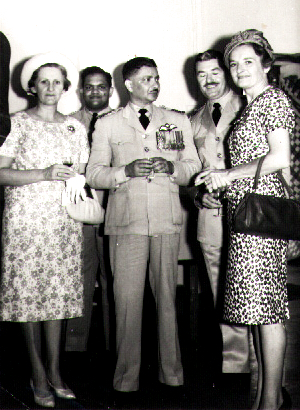 On Nov 13, 1962 the astrologer's prediction came true when he became the first Ceylonese Commander of the R.Cy.A.F., succeeding A/V/M. John Lindsay Barker CB, CBE, DFC.
On Nov 13, 1962 the astrologer's prediction came true when he became the first Ceylonese Commander of the R.Cy.A.F., succeeding A/V/M. John Lindsay Barker CB, CBE, DFC.
He retired from that post on Dec 31, 1970 after nineteen years and seven months service in the Royal Ceylon Air Force, handing over command to A/Cdr Padman "Paddy" Hariprasadha Mendis. Whilst in the service of the RCyAF, Amerasekera received the Coronation Medal of Queen Elizabeth II, The Ceylon Armed Services Inauguration Medal (Cey/Gaz Nov 4, 1955) and the Ceylon Armed Services Long Service Medal.
Rohan Amerasekera died on March 20, 1974 at the age of 57, and is survived by his widow Aloma (nee' Dender) whom he had married on Nov 12, 1958, his son and daughter. He was accorded a funeral with full military honours by the Government of Ceylon and in deference to his wishes, Buddhist, Christian, Hindu and Islamic religious services were held at his graveside. His ceremonial sword and the miniature medals are on display at the Sri Lanka Air Force Museum.
...........................................................................
The following article is from the Times of Ceylon by Sqn. Ldr. J.T.R. Fernando (Retd)
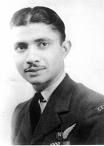 Time dims memory, and with the many problems confronting us in our work-a-day world, we as a nation tend to forget the services of important and notable personalities who have done the country proud and made significant contributions to the national effort and aspirations. . One remarkable person who has faded into relative obscurity is Air Vice Marshal E. Rohan Amarasekera, the first Sri Lankan to command the Sri Lanka Air Force. On March 2, the Sri Lanka Air Force celebrated its 50th anniversary. Coincidentally the 28th death anniversary of this distinguished personality fell on March 20.
Time dims memory, and with the many problems confronting us in our work-a-day world, we as a nation tend to forget the services of important and notable personalities who have done the country proud and made significant contributions to the national effort and aspirations. . One remarkable person who has faded into relative obscurity is Air Vice Marshal E. Rohan Amarasekera, the first Sri Lankan to command the Sri Lanka Air Force. On March 2, the Sri Lanka Air Force celebrated its 50th anniversary. Coincidentally the 28th death anniversary of this distinguished personality fell on March 20.
Much has been written about the heroes of the Second World War and about the significant contribution made by various persons during the formative years of the Armed Forces. Therefore it is not only timely but an obligation to recall the illustrious career of AVM Amarasekera. The Japanese bombed Colombo and Trincomalee harbours 59 years ago. But the real impact of the Second World War was not felt by Sri Lankans as they were out of the war arena of Asia. A large number of Sri Lankans joined the British forces at that time and some of them had distinguished careers. But there was no Sri Lankan who had such a distinguished career as Rohan Amarasekera. Amarasekera from Kegalle, received his early education at Kingswood College and later at Wesley College.
Young daring and adventurous, he decided to join the Royal Air Force (RAF) during the most turbulent war years, despite stiff opposition from his elders. Joining the RAF in 1940 at 24, he distinguished himself as an air gunner in active service serving operational squadrons 153 and 640. Amarasekera was the most decorated Asian in the RAF. He was a hero who flew no less than 85 sorties over Hitler's Germany during the war years, while Hermann Goering's Luftwaffe, the Nazi Air Force pounded Britain in an effort to demoralize the British and destroy its fighting capability. Rohan who started as a gunner became a flier who could be depended on to hit a target from an aircraft during an era when advanced techniques were not available. He was decorated for bravery and awarded the coveted "Distinguished Flying Cross" and Bar. He and Air Commodore Fred Papple who was his pilot and later his squadron Commander flew many missions together. Papple dedicated the recent book he has published, "An Anecdotal History of the 640 Squadron", to those who served the squadron and devoted one chapter to "Amare". Anxious to make his service and experience available to the Royal Ceylon Air Force , Amarasekera returned to Sri Lanka. Functioning as the Chief of Staff, when Air Vice Marshal J.L. Barker relinquished command of the Royal Ceylon Air Force, he assumed duties as the first Sri Lankan Commander on November 1, 1992.
He continued to command the Sri Lanka Air Force till December 31, 1970 and retired from service at 57. He systematically reorganised the Air Force to meet the exacting demands of a developing country. He set a high code of ethics for his officers. A man of principles, he never hesitated to speak up for what he believed in. He never bowed to outside pressure or interference. He always stood steadfast in his principles. AVM Amerasekera was a great man, who resolutely believed in the immortal assertion by Henry Ward Beecher, "Greatness lies not in being strong, but in the right use of strength". His strength was his uncompromising strict code of professional rectitude. The Government had to rely heavily on the Air Force during two abortive coup d'etats. Amerasekera played a significant role in quelling successive attempts to overthrow the government. On retirement, he led a quiet, secluded life.
His life revolved around his family, his wife Aloma, son Ajith and daughter Roshanthi. He also actively pursued the study of contemporary religions. He wrote a few booklets on the various facets of Buddhism. The most impressive and soul searching was "The Power Within" dedicated to his dear friend D.C.O.T. Amarasekera. AVM Amarasekera declined many a prestigious appointment offered to him while in retirement. When he retired he did not even have a house of his own in Colombo and had to rent out one in the suburbs. Amarasekera died on March 20, 1974 and was afforded a full service funeral. In deference to his wishes Buddhist, Hindu, Christian and Islamic religious services were held at his graveside.
...........................................................................
Air Vice Marshal E R Amerasekera, DFC& Bar, RCyAF By Wg Cdr E. H. Ohlmus ( SLAF Retd)
Air Vice Marshal E. R. Amarasekera, DFC & Bar, AEM, RCyAF
(The 1st Ceylonese and the 3rd Commander of the Royal Ceylon Air Force)
On 20th March 1974 , the Royal Ceylon Air Force, and indeed the country, lost one of its most distinguished military officers and beloved sons, Air Vice Marshal Rohan Amarasekera, DFC & Bar. He passed away at the early age 58 after a very brief illness; and being the great human he was, it would not be out of place to honour him here, even in a small way, by recounting some hitherto unpublished facets of his life.
AVM Amarasekera was born in Kegalle and completed his education at Wesley College, Colombo, that also produced another Air Force Commander, Air Marshal Terence Gunawardena. Being a young man with an inherent yearning for adventure, Rohan Amarasekera joined the Royal Air Force in 1940, as a Air Gunner. This was the time when Britain was at war with Nazi Germany.
His courage and competence soon earned for him a ‘promotion’ as a Navigator, guiding aircraft of the famous wartime No. 640 RAF Bomber squadron on dangerous bombing missions and night raids over Germany’s hostile enemy airspace, that was teeming with the dreaded German Messerschmitt (ME 109E) fighters, which were faster and deadlier that the RAF’s Hurricanes and Spitfires.
The AVM’s navigational skills coupled with cool nerves of steel, and over 85 flying sorties and air raids, earned him the highly coveted Distinguished Flying Cross & Bar, (— the term ‘Bar’ here means an addition to an earned gallantry medal, indicated by a strip of metal below the clasp, and signifies that the award was made twice, or more in exceptional instances. The medal is worn just above the left breast pocket of the uniform shirt or tunic.)
AVM Amarasekera was also the recipient of the ‘Aircrew Europe Medal’. In an article, titled "Snippets — the Good Old Days" published in a RAF magazine, Squadron Leader Sam "Whacko" Samarasinghe (who was No. 5 in the Royal Ceylon Air Force, — (the AVM was No. 2) — retired in 1965 to join the Royal Air Force and is now living in retirement in the UK.) recounted a hitherto untold incident at an RAF Officers’ Mess in the UK way back in November 1951 when he was on a Training course. This relevant passage of the article is indeed very informative and interesting.
Writes Squadron Leader Sam, "I had a tendency, to head straight for the bar on being posted to a new Station — one saw that as the most logical and, therefore, cost-effective way of making one’s number in the social context. It was also a rather pleasant way of doing things — even though women were not allowed in the bar! On one such occasion, a chap looked at me and said, ‘You are from Ceylon, aren‘t you?’ I said, ‘Yes, but how did you guess?’. He asked, ‘What do you mean?" I replied, ‘Well, wherever I go I am taken for an Indian’. He said, ‘Bull S—t!!, I know the difference! I flew with Ameresk!’. He was, of course, referring to the then Squadron Leader Rohan Amarasekera, DFC & Bar — and he went to add, ‘but he never showed fear’. That really was an accolade, from an RAF Pilot who also wore the Aircrew Europe Medal, of which Amaresk once said meant more than his DFCs!"
Squadron Leader JTR (Rex) Fernando, (SLAF Retd.) also a close confidante of the late AVM, has over a number of years written at length in the press about the life and times of this simple but great man, who joined the RCyAF from the RAF in 1951, who became the first Ceylonese to command it in 1962 and who retired to become a very private citizen sans publicity and fanfare on 1.1.1971; and to whom an unique and unforgettable Service Funeral Ceremonial was accorded. But his real strength and greatness was his humility which is illustrated in another passage in Whacko Sam’s "Snippets":- "I was on my first tour as the Officer Commanding (RCyAF Hqrs. Unit) (’55-’57). Amaresk was a Wing Commander. Group Captain GC Bladon, RAF, was the Commander of the Air Force. Amaresk, a couple of officers and I were sipping beers in the Officer’s Mess (Parson’s Road) in the forenoon on a Sunday, when the liaison officer at the Ministry turned up and said to Amaresk, "Sir, the PM (Sir John Kotelawela) wants you at Kandawela right away!’ Amaresk dashed away. We were still there at the bar when Amaresk returned. I asked, ‘What’s the score, Sir?’ He said, ‘The PM wants me to take over the RCyAF’.
We then started to offer him our congratulations and called for a celebration, starting immediately with another round of beers, when he said, ‘No. I said I didn’t have enough experience.’ And that was that! And I, for one, can’t think of anyone else who could have been so genuinely honest, modest and unassuming.’
Those who had the privilege to know him as a friend, to serve with him as a colleague and to serve under him as a subordinate, as I did, will always remember him as a fine officer, an exemplary gentleman and indeed a great Man of 20th Century Sri Lanka.
 Graham Dissanayake had his entire education Wesley College from 1938 to 51, He was a College Prefect, and won his Hockey Colours. He entered The University of Peradeniya, and after graduation Bachelor of Arts, he was selected to the Sri Lanka Administrative Service, where he served in several positions with distinction. A notable assignment was as Land Development Officer where he implement Government policy creditably. He finally rose to the position of Food Commissioner, once again rendering an outstanding performance with integrity. Graham is youngest of the five famous Dissanayake brothers Bertram, Donald, Edmund,& Littla, who have been staunch Wesleyites. Graham is a life member of the Wesley OBU.
Graham Dissanayake had his entire education Wesley College from 1938 to 51, He was a College Prefect, and won his Hockey Colours. He entered The University of Peradeniya, and after graduation Bachelor of Arts, he was selected to the Sri Lanka Administrative Service, where he served in several positions with distinction. A notable assignment was as Land Development Officer where he implement Government policy creditably. He finally rose to the position of Food Commissioner, once again rendering an outstanding performance with integrity. Graham is youngest of the five famous Dissanayake brothers Bertram, Donald, Edmund,& Littla, who have been staunch Wesleyites. Graham is a life member of the Wesley OBU.
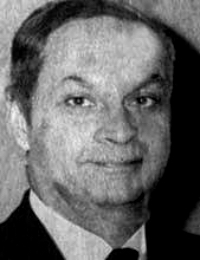 Evelyn Frederick Charles Ludowyk,-an unique combined product of two great Methodist Schools, Richmond College, Galle and Wesley College , Colombo - was born on the 16th of October 1906. He was a brilliant scholar with an outstandingly brilliant mind - academic success coming his way with the greatest of ease! In 1913 he passed the Cambridge Junior Examination with First Class Honours, inclusive of four distinctions. He also had the unparalleled distinction of being the youngest King's Scout in the British Empire at the tender age of thirteen ! His great versatility is illustrated further by a remark of his mother (mentioned by Kenneth de Lanerolle in the Essay 'The Young Mister Ludowyk) on Lyn's extraordinary talent of reading Shakespeare texts and playing the Piano simultaneously!
Evelyn Frederick Charles Ludowyk,-an unique combined product of two great Methodist Schools, Richmond College, Galle and Wesley College , Colombo - was born on the 16th of October 1906. He was a brilliant scholar with an outstandingly brilliant mind - academic success coming his way with the greatest of ease! In 1913 he passed the Cambridge Junior Examination with First Class Honours, inclusive of four distinctions. He also had the unparalleled distinction of being the youngest King's Scout in the British Empire at the tender age of thirteen ! His great versatility is illustrated further by a remark of his mother (mentioned by Kenneth de Lanerolle in the Essay 'The Young Mister Ludowyk) on Lyn's extraordinary talent of reading Shakespeare texts and playing the Piano simultaneously!
Ludowyk entered the University College, Colombo ( affiliated to the University of London at the time) in 1925 and distinguished himself further, with First class Honours in English. He consequently won a Government Scholarship to Cambridge in 1929, where he distinguished himself once again obtaining First Class Honours in the Tripos ; also winning the prestigious Oldham Shakespeare Prize. This was the era when three men of great originality - I.A.Richards, Mansfield Forbes and F.R.Leavis were making a "deep impact on Cambridge English". To merely summarise that Ludowyk was brilliant , creative and versatile would be an understatement ! Much more needs to be known of him, especially by the present boys of Wesley.
He was invited to join the staff of the University College , Colombo ( at Thurstan Road , Colombo) in 1932; and was appointed Professor of English in 1936, when he was just thirty years old. Four years later, he was appointed Dean of the faculty of Arts- the first Ceylonese to hold this office. When the University College ( in the time of Prof. Robert Marrs,) gained recognition as an independent entity, he continued as Professor and Dean; and remained Professor of English until his retirement in 1956. In recognition of his outstanding and unique contribution to the University College, and then to the University of Ceylon he was made Professor Emeritus Ludowyk's contribution to Theatre in Ceylon has been spectacular as well.
Shortly after he returned from Cambridge in 1932 he immersed himself in the Theatre. He began in a modest way, by assisting Agnes Marshall (of Tiddenham-Barrow, Bandarawela) in a Christmas Play, - "The Hope of the World" , and his major First production Nikolai Gogol's, "Marriage", was presented by the YMCA Dramatic Club, at the Central YMCA Hall in 1933. Percy Colin Thome' in 'Honouring E. F. C. Ludowyk', elaborates on the play, thus: 'Gogol' had a theory that every bridegroom went through an acute emotional crisis just before his wedding and was sorely temp fed at some critical point to run away from his obligations. The brilliant comedian P.C. Thambugala played the bashful bridegroom who in the final scene escaped through a window" Ludowyk's next play was an adaptation of Sydney Grundy's comedy "A Pair of Spectacles" which attracted audiences in England for almost a hundred years. Grundy's play was an adaptation of Labiche's "Les Petis Oiseaux" which culminated in a further adaptation, " He Comes From Jaffna".
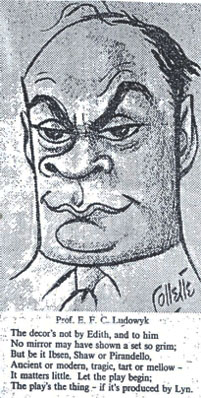 The introduction by Ludowyk, of Issacsz the shoe maker to the characters in the play was based on a well known personality in the Galle Fort, resulting in what has been described as vintage malapropisms from the predominantly Dutch Burgher city of Galle, adding wit and sparkle to the script. To those of us who have seen the play, shoemaker Issacsz's famous words, "Outside calling Fre'rick home calling Fraco" echo and re-echo in our ears! "He Comes From Jaffna", was first presented by the YMCA Dramatic Club in 1934. The play is still produced to packed houses and is a tribute to Ludowyk's genius. Christobel Leembrugen (who later married CJ.Oorloff) had been one of the original cast , along with H.C.N. Lanerolle. Ludowyk was also a wholesome influence on the Sinhala Theatre in Ceylon.
The introduction by Ludowyk, of Issacsz the shoe maker to the characters in the play was based on a well known personality in the Galle Fort, resulting in what has been described as vintage malapropisms from the predominantly Dutch Burgher city of Galle, adding wit and sparkle to the script. To those of us who have seen the play, shoemaker Issacsz's famous words, "Outside calling Fre'rick home calling Fraco" echo and re-echo in our ears! "He Comes From Jaffna", was first presented by the YMCA Dramatic Club in 1934. The play is still produced to packed houses and is a tribute to Ludowyk's genius. Christobel Leembrugen (who later married CJ.Oorloff) had been one of the original cast , along with H.C.N. Lanerolle. Ludowyk was also a wholesome influence on the Sinhala Theatre in Ceylon.
Along with Professor Ediriweera Sarathchandra, Gogol's play "Marriage" was adapted to local conditions and more importantly to local customs. Ludowyk considered "Marriage", to be an ideal play to begin with. The play was translated to Sinhala, and as Ludowyk had a good command of spoken Sinhala, he took complete charge of its direction. The play was titled "Kapuva Kapothi the brilliant apposite chosen by Sarathchandra! When the play was first staged at King George Hall (at the University) in 1945 it was found that the audience reaction to the ending - of the bridegroom escaping through a window- was one of disappointment. They wanted to know what happened after he took that step ! Two significant changes in the original text were consequently made- the female broker being changed into a male in accordance with local custom: with the Kapuva (broker) made to marry the girl in the end ! The play (as so modified ) was described as an unprecedented success.
Over sixty public performances in Colombo and the outstations ensued. This was a tremendous achievement in an era when there was so much prejudice against the theatre- parents being diffident about allowing their daughters to participate in a play -to do so being considered extremely damaging to their marriage prospects of a suitable marriage ! Such was our straightlaced Sinhala-Tamil -Victorian sense of morality and propriety of the time. Ludowyk had much to contend with. Then followed a spate of oilier plays over the years. His long association as Producer of the University of Ceylon Dramatic Society commenced with the production of. "Where Women Rule" by Serafin & Joaquin Alvarez Quintero (Kenneth de Lanerolle playing a part in it). The play was staged at the Royal College Hall in September 1933. This was the first of a series of hilarious farces, comedies and satires staged from 1933-1941.
In 1946 Ludowyk married Edith Ujvari, a Hungarian national, who had left her country as a political refugee in 1919 and gone to Berlin, where she studied Psychoanalysis. Edith was responsible for the decor and costumes of the Drams' in a positive effort to identify herself as an integral part of Ludowyk's world. In 1942 after the formation of the University of Ceylon the UCDS (University College Dramatic Society) was renamed the CUDS- The Ceylon University Dramatic Society but superseded by the name coined by its undergraduates , DRAMSOC!'Eugene O'Neils's "Marco Millions"- an imaginative reconstruction of Venetian legend spun around Marco Polo- was staged at the King George Hall in December, A revolving stage was what was sorely need (a great expectation of the Dramsoc'sPeradeniya days of the fifties - yet to materialise.) and to overcome this serious set back Ludowyk's innovative mind resorted to the use of an old Chinese convention of the Chronicler and the chorus being present throughout the play, which in effect provided a fixed set as opposed to multiple sets the play required) ." Marco Millions" was an antiwar and was a daring contribution of Ludowyk at the height of the Second World War.
Other productions followed - "The Simpleton of the Unexpected Isles" by Bernard Shaw; "Tobias And the Angel" by James Bridie; "Right if You are. if you think So"',, by Luigi Pirandello; Bertit Brecht's , "The Good Woman of Setzaan", "Antigone" by Anouilh; and the "Little Clay Cart" by Shudraka - translated from the Sankrit. Luigi Pirandello's, "Naked" was staged at the time (1951) bringing home forcefully to us the essence of Pirandello's philosophy- man's need to deceive himself constantly !- " the ferocious derision of destiny which condemns us to deception." This was Ludowyk's last production at King George Hall with the Dramsoc (and us) moving to Peradeniya in October 1952.
Ludowyk was responsible for inviting two producers from abroad to enrich the University Theatre as well our learning experience at the University Robert Newton and Jubal. Newton produced Shakespeare's " Twelfth Night", and Jubal several plays, inclusive of the famous "Insect Play" (1952-1955) staged in Jaffna, as well. In September, 1956 Ludowyk presented his last play in Sri Lanka, at the Lionel Wendt Theatre - Bernard Shaw's "Androcles and the Lion" - S. B. Dissanayake (later Professor of Dentistry) playing the Lion. The Ludowyks were to sail for England where they had decided to live, soon afterwards, and there was a feeling of nostalgia that pervaded the Wendt amongst all of us present there. It was "Farewell and Bon Voyage" to Ludo and his wife Edith, from so many of us who had come to know, love and respect them. I would wish to specifically include a few paragraphs on the Ludowyk I knew personally, at the University. He was a warm understanding and genial person with a subtle sense of humour. As a teacher he excelled in reading plays, unraveling the intricacies of the plot, sub - plots, characters -the__ nature; and dramatic techniques.His mere presence in Peradeniya made The English literary Circle flourish.
We read Plays and Poetry; critic analysed and discussed passages of Prose; and enjoyed OUT academic life to the hilt ! The inter Hall Drama Competitions in Peradeniya was triggered off by him, and ably bolstered by Hector Passe' and Doric de Souza. Literature we began to realise was intensely involved in the world of values. And Ludowyk taught us that facile generalisations and making of final and conclusive judgment on any literary work - Poetry , Prose or Drama- were not possible.
He would leave us there- to savor the experience ourselves! In the tradition of the Great Teacher he brought us to the brink when we had to discover things for ourselves and to make our efforts as refreshing and creative as possible. In lighter vein are some incidents from our life as undergraduates which, I recall with a chuckle. Ludo bad set us one of his weekly Tutorials and we were left to our own devices, to do or perish! My own effort was average - having nodded over my reference books after a strenuous game of hockey in Kandy with the strong Asoka Students XI, combined with a delicious meal - High Table Dinner with Hector Passe at Marr's Hall. A colleague of mine -also from Marrs- had gone to town- snaring up volume after volume of "Scrutiny" to the consternation of Librarian Enwright! His , had then to be a very comprehensive answer.
There was no doubt about it. A day or two later Ludo, in characteristic style , read out our grades- most of us oscillating between C's and B's with a dramatically announced solitary A+! There was much excitement as an 'A' from Ludo meant that one was almost of the calibre of F.R.Leavis! Loaded with drama, he went on to explain, that this was truly great- a very excellent effort ? and continued, as on a stage, to indicate as at the climatic point in a play, that he was not aware until then that Mr. Alan Tate was a member of his class! Mr. Alan Tate had scored an A+; and my colleague from Marrs ( The Scrutiny Man ) n-o-u-g-h-t! (not even a D-) which usually put us in the dog house. Ludowyk had a subtle sense of humour. On one occasion when the dashing Gregory Peck was at Peradeniya Royal Botanical Gardens, taking part in the film, " The Bridge over the River Kwai " which was being shot there some feminine admirers, decked in their "Sunday best" had dared to cut Ludo*s tute class 8.00 They returned around 8.45 am and gingerly tiptoed their way to the back of Ludo's class-mercifully unseen by him as he was scribbling something on the blackboard. Suddenly he twirled his spectacles, faced the class, smiled a most benevolent smile and merely pronounced: " Ladies! -One must choose - between Lyn and Peck! "
In 1956 Prof. & Mrs Ludowyk left Sri Lanka to settle in England. At a farewell dinner to them chaired by Chief Justice E.F.N Gratien, a general sense of sadness prevailed . It is said that he left because of the gloomy foreboding he had for the University and the Country, and because the health of Mrs. Ludowyk required her to live in a temperate climate. His enduring love and affection for Ceylon and its people stayed with him- as evident from his subsequent writings- the land he was born in and grew up, and loved as is evident in the "Footprint of the Buddha", (1958) written from his home in Suffolk, "which is like no other book on this country. Clearly the product of many years of research and travel, it is a magnificent evocation of the great moments of the Island story revealing the authors deep love and understanding of the land of his birth."
He followed this with a "Modern History of Ceylon" which was in the same style and form and completes his History of Ceylon. In 1984 some of his students now in prestigious positions, and others who knew him, who had come under his influence, published a glowing tribute to his work and life in Lanka, called "Honouring E.F.C. Ludowyk". It is indeed a lasting tribute to him outlining his contribution to the Teaching of English, and his pioneering work in the establishment of a Theatre in the country, and also chronicles the numerous publications he made. Professor Ludowyk passed away in 1985, and Wesley honoured him by un veiling his photograph in m6, in the College Hall.
Links to further reading
By N.S.Weerasekera
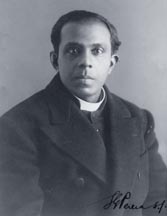 The 125th Souvenir proudly records the achievements of Wesley's products, to mention a few. Sir Oliver Goonetillake-an outstanding administrator. Sir D.B.Jayatilleke-an outstanding statesman. Professor E.F.C.Ludowyk- Ceylon's English genius, H.J.V.I Ekanayake- a scholar and administrator, Rienzie Wijetillake- an outstanding business Executive, Prof-Mahroof Ismail, an outstanding academician and scholar. And now we are proud to record yet another, that of Father S.G.Perera, Wesley's great Historian and scholar. Simon Gregory Perera was born on the 18th, June 1882 in Kalutara.
The 125th Souvenir proudly records the achievements of Wesley's products, to mention a few. Sir Oliver Goonetillake-an outstanding administrator. Sir D.B.Jayatilleke-an outstanding statesman. Professor E.F.C.Ludowyk- Ceylon's English genius, H.J.V.I Ekanayake- a scholar and administrator, Rienzie Wijetillake- an outstanding business Executive, Prof-Mahroof Ismail, an outstanding academician and scholar. And now we are proud to record yet another, that of Father S.G.Perera, Wesley's great Historian and scholar. Simon Gregory Perera was born on the 18th, June 1882 in Kalutara.
He had his early education at Holy Cross College Kalutara, and after a brief stint at StJoseph's College, he moved to Wesley College, at the time located in Dam Street There he came under the stimulating influence of Rev.Henry Highfield, who recognised his latent talents, and laid the foundation for the flowering of those talents in later years. Headmaster C.PDias also moulded his character, for whom he had the utmost respect and awe, and of whom he wrote in later years, reminiscing of his school days, " the most good natured of God's good men, in class a dreaded disciplinarian but out of class or in his home or in the street he was the gentlest of men." On leaving Wesley from Dam Street, Simon Gregory was recruited to the Government Clerical Service at a competitive examination and was posted to the Land Registration Office at Ratnapura.
This hum- drum position was in no way suited to the young S.G.Perera, and he soon decided to embark on a more stimulating vocation, suited to his talents and temperament, and at the age of 23 years he entered the Roman Catholic Ministry, mid joined the Society of Jesus. He went to a Jesuit College in India for his spiritual training and theological studies. From there he proceeded to Rome, where once again his outstanding abilities shone through and he was appointed Professor of Missionology at the Georgian University in the Vatican, Rome. After seven long years there it was time to return home, and in 1939 he came back to Lanka and was appointed as the Vicar General of the Roman Catholic Diocese in Galle.
In addition to his ministering spiritually to his pastoral flock. Father S.G.Percra, totally immersed himself in the study of the History of Ceylon, the period engaging his attention being 1505 to 1948, from the time of the Portuguese conquest, and the Dutch period, culminating in the British period to the dawn of independence from Colonial rule. In the execution of his monumental work of the History of Ceylon, Father S.G. Perera, left no stone unturned whether searching archival material in Buddhist Temples, or visiting ancient battle sites to verify and authenticate facts.
He bad many a discourse with learned contemporary Buddhist monks who were repositories of both oral and written traditions of Lanka pursuit of such knowledge he travelled the length and breadth of Lanka to numerous historical sites to re-enact the historical events that occurred there. His work contributed in no small measure to the understanding of the power structure prevailing in the time in Kotte, Kandy and Nallur. He revived and reconstructed the history of Kotte, or Jayawardena Kotte, the fortified city surrounded by the Diyawanna Oya, with its palaces, walls and ramparts and temples.
He similarly researched on Nallur, which at the time was peculated with Buddhist Sinhalese, again a fortified city against invaders. He also reviewed Kande- uda-pas-rata, which later became Kande anglicised to Kandy, and depicted its historical past vividly. Father S.G.Perera's work on Ceylon's History was carried out at a time of British Rule, when perhaps the teaching of "British History" would have loomed large in school curricula. His book on the History of Ceylon was a standard text for many years and faithfully read by many a schoolboy.
He was a great linguist, and in addition to his excellent command of the English language, he also mastered the Western Classical languages, and was fluent in his mother tongue, enabling him to read ancient documents at .Source. He also translated into English many Sinhala texts, the best known being the "Subasita Wamanawa". In recognition of his work, he was elected a Fellow of the Royal Asiatic Society (F.R.A.S.,). Father S .G.Perera's life came to a close on the 19th of February 1950, just two years short of the biblical span of three .score years and ten. His historical works will indeed ensure him a permanent place in the History of Sri Lanka.

Distance and time often leads to golden misty enchantment. In Ceylon it was a time of great serendipity. My formative cricket watching years began as I started schooling at Wesley in 1950. Watching school cricket was a joy and a privilege and I was genuinely moved by the games
Dashing and adventurous, Brian Claessen was an extraordinary cricketer whose silky touch drew legions of admirers. He was never one for the dull grind, or the tedious draw. As a batsman, he wanted to take the bowlers on; as captain, he was interested in moving the game along. One of the most enduring memories of the 1952/53 cricket seasons at Campbell Park - for the spectators if not for opposing batsmen - was the graceful, rhythmic bowling action of Wesley Spin bowler, Bryan Claessen. Four or five easy paces would bring him to the crease. The loop and turn which he generated from his deceptive approach to the stumps mesmerised batsmen. On wearing wickets he developed both the accuracy and subtlety to keep batsmen at bay.
Bryan Claessen was a hero and an Icon for all Wesleyites, a unique talent loved by many. He is one of the finest all rounders to grace the "matting" at Campbell Park. Those were the halcyon days of cricket at Wesley. Many an article has been written in its praise. With A.V.Fernando as coach the team was simply invincible. The remarkable statistics of the games, the many centuries and the wonderful bowling performances speaks for itself. They are a fitting tribute to his leadership. With brothers Radley and Herman they were a formidable trio who were feared and respected in equal measure.
Bryan was at heart a performer who treated the cricket pitch as a stage on which to display his talents. Ask those who played with or against him between 1950 and 1953, or those who watched him play, and they will tell you that Bryan Claessen with P.I Pieris of St Thomas' were the finest all round cricketers of that era.They both played for Ceylon while at school. Such success reflected his own sense of competitiveness.
His chief qualities as a captain were his courtesy and his intensity of purpose. He was unfailingly loyal to his players. He spoke warmly of the members of the cricket team of 1953 which he captained. Bryan was also unwaveringly straight. His players knew exactly where they were with him, and if at times he was too lenient for their own good that was a fault they enjoyed. He had a delicate touch with both the late cut and the leg glance. Brilliant player though he was, he took few risks, partly because he didn't need to.
I have fond memories watching cricket at Campbell Park. Bryan was an adaptable player with a touch of genius. He possessed a sound defence, a wonderful eye and the right stroke for every ball. Among the young batsmen of the day, there is no one better worth watching. He was particularly strong on the leg side and his confidence, coolness and resource are remarkable for so young a player. Although not a prominent cricketer himself, Bryan's father played an important part in his son's progress for he afforded him every opportunity and encouragement to pursue his inclinations for sport. His brother Radley was a great source of inspiration.
I have been a keen follower of school cricket and without doubt Bryan is the finest all round cricketer I have seen. To be selected to play for Ceylon whilst still at school must indeed have been a great honour. He speaks very warmly of his time at Wesley and the wonderful memories. Self-confidence, without arrogance, is one of Bryan's hallmarks. Another is the unconfined enjoyment he got out of the game.
The old primary school block which has now been demolished has special memories for Bryan. To quote " Mr.JVB De Silva called me to aside and said that I had used the 'F' word at times. Do you know its meaning? When I told him I did not and that was a fact, he very quietly informed me that he could explain it to me but because I wasn't old enough I probably would not understand. He assured me that one day as I grew up I would get to know what it means and until then he asked me to accept his word that it wasn't a nice word and he asked me not to use it again. I was so impressed by his approach that I did not resort to that word during the rest of my schooldays. It is amazing what a person remembers from the past". A generous compliment to a wonderful teacher. Bryan never told me he didn't use it after leaving school!!
Bryan fondly remembers the old school bathrooms and the concrete water tanks which were used for 'duckings' for 1st XI Team freshers.
Some months ago Bryan has contacted his old maths teacher CJT Thamotheram who has indeed returned his call from London. He remembers CJT taking the maths class in the classroom by the chemistry lab and the famous remark "I think you all are more likely to pass the ass ass C rather than the SSC".
When it was the 100th birthday of the legendary Wesley teacher, Lionel Jayasuriya, Bryan and Radley had sent him letters of good wishes. In those days Lionel Jayasuriya lived in the Vice Principals bungalow. There was a string hanging down by the stairs. If a boy wanted to see him he would pull the string which rang the bell. As the house was next to the tennis courts Bryan used to go with a couple of friends and ring the bell to get some water. Mr.LJ generously always produced an Orange Barley or a Lanka Lime.
Bryan has asked old boys in the UK to visit Rev RW Pile , our Chaplain of the 1950's, who was then in a retirement home in Leamington Spa in Warwickshire UK. Brian Mack, Senthil Sinniah and I respected his wish and obliged. We had a wonderful meeting with Rev Pile who remembered much of the old days despite his spritely 96 years.
I struck up a friendship with Bryan after my article appeared in the 125th Souvenir. Once I received a poem, A tribute to Sir Don Bradman, which he had published in a local newspaper. I have included this in the sports section of this website. Bryan stood on top of the schools cricketing arena and enjoyed it.
Wesley College went through a spiral of decline for 30 years. All through those difficult times Bryan had immense patience and understanding for those in charge of the school with never a harsh word for anyone. He had tremendous optimism that the good times will not be too far away. Even in the worst moments when the OBU was tearing itself apart he had a kind word for them to bring the warring factions together.
Although he wasn't a wealthy man whenever there was a fund collecting money for Wesley Bryan was one of the first to make a generous donation. That was his love for the school. He had told me many times that his best years were spent in the school on Karlsruhe Hill.
Bryan emigrated to Perth Western Australia in 1957 and then moved to Adelaide in 1960. There he joined the Sturt District Cricket Club and continued his love of cricket. Later he continued his cricket at the Modbury Cricket Club. He was hugely popular at the club where Bryan became its President in the 1970's. His contribution to the sport and the Club was immense. It would be fair to say Bryan played cricket for the love of the game, not the money, and he never lost that love.
After retirement he continued to live in Tailem Bend with his wife Carol near Adelaide in South Australia where he reminisced about his life today and stories of times past. He defied the perceived restrictions of old age managing a small farm in Tailem Bend and enjoying community life of that rural idyll. Bryan wrote emails regularly to his numerous friends worldwide. In his spare time Brian wrote poetry. He told me he was no wizard with the internet but used the computer as a wordprocessor. His wistful, heartfelt and honest emails were a great pleasure to read. Bryan used his technology as a platform to enlighten us about life in general from the perspective of an senior old boy who’s been there and done that in the hope we will respond and keep in touch and also support Wesley despite the ignominies and frustrations due to internal wranglings.
Bryan found time for old friends writing letters or phoning them specially his classmates George Robertson and Arthlow Chapman. He visited the state of Victoria and stayed with Norman de la Harpe, Wesley cricketer and high jump champion of 1947. They wined and dined Lou and Lisbeth Adhihetty in the year 2000 of which they spoke about most warmly. His passion was for old style dancing, far removed from the stresses and strains of cricket and also modern life. He played tennis once a week and grew roses. He never grumbled about life except the frustrations of his own failing health.
Despite his many visits to hospital Bryan was able to meet his death with a kind of calm and continued to the end as he had been in life jolly, joking, relishing a good story. His good humour was sustained by the closeness of his family and the love of his wife.
As a former colleague noted, he was " a fine cricketer, good, gentle and funny". I would like to add that he inspired and encouraged us and will remain a legend at Wesley forever.
Loyal old boy, sportsman, poet and mischievous wit, Bryan Claessen passed away on the 16th of March 2010. Even now there are people of a certain age, when I speak to them about school cricket who say "Ah! I remember Bryan Claessen that fine all round cricketer".
Links to further reading
- Elton Bryan Claessen - In Memoriam 18/3/2010 - Double Click
- Cricketers of 1953 - Sent by Olkie Edema - Double Click
- A Tribute to Sir Donald Bradman- A Poem by Bryan Claessen - Double Click
- Some Memories of cricket of the 1950's sent by Bryan Claessen - Double Click
- Bryan Claessen by Dr. Nihal D Amerasekera - Double Click
- Lunch with the Claessens - From the OBUA Newsletter 2005 - Double Click
- A Letter from Bryan Claessen sent in 2009 - Double Click
- Bryan's tribute to Lou Adhihetty
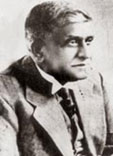 A distinguished product of Wesley College Colombo, Sir Baron Jayatillake, was born on the 13th February 1863, at Waragoda. Kelaniya. His father Don David Jayatillake hailed from the ancient village of Pattalangedera and his mother was Elaine Weerasinghe of Waragoda. He did not have the advantage of family wealth or connections, but by his sheer intellectual ability and handwork reached the top. He was six years old when he read his first letters at the Vidiyalankara Pirivena his tutor was the reputed Oriental. Scholar the Venerable Ratmalana Sri Dharmaloka. Here his education was in Sinhala, Sanskrit and Pali, with an emphasis on the Buddhist scriptures. Undoubtedly this impact on the young mind, sowed the seeds of nationalistic and religious fervour which destined the course of his educational and political career.
A distinguished product of Wesley College Colombo, Sir Baron Jayatillake, was born on the 13th February 1863, at Waragoda. Kelaniya. His father Don David Jayatillake hailed from the ancient village of Pattalangedera and his mother was Elaine Weerasinghe of Waragoda. He did not have the advantage of family wealth or connections, but by his sheer intellectual ability and handwork reached the top. He was six years old when he read his first letters at the Vidiyalankara Pirivena his tutor was the reputed Oriental. Scholar the Venerable Ratmalana Sri Dharmaloka. Here his education was in Sinhala, Sanskrit and Pali, with an emphasis on the Buddhist scriptures. Undoubtedly this impact on the young mind, sowed the seeds of nationalistic and religious fervour which destined the course of his educational and political career.
His Venerable teacher had forecast, based on his intellectual abilities, that Baron will have a remarkable future linked to his Motherland. His wise parents, though pleased with their child's progress and knowledge, decided with the concurrence of the venerable Monk, to send Baton to the Baptist English School at Gonawala, Kelaniya run by English Missionaries. He caught on the new language with consummate skill and ease and stood well above his age and class, that the English gentlemen had no difficulty in persuading his father David to send young Baron to the prestigious Wesley College, which! he joined in 1881, then located in Pettah. He travelled from Waragoda daily crossing the Kelaniya by boat and then proceeding by cart. He had a strenuous time as a student but had a dogged determination and will attending Wesley College in the morning and the Pirivena in the afternoon.
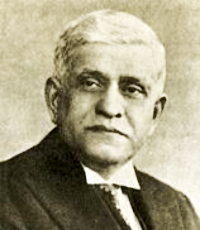 This was the daily routine of the country's future leader. It was at Wesley, Sir Baron passed both the Junior and Senior Cambridge University Examinations, and was the very first winner of the Hill Medal in 1887. He also obtained in 1886 an Honours decree from the University b. of Calcutta offering Latin and English. He was a brilliant Student, a fluent debater and an impressive speaker. On one occasion during a class exercise he had argued with the Principal Rev Thomas Moscow who graciously conceded that he had got the better of him! He was on the staff of Wesley College for a short Period and thereafter joined Dharmarajah College straightaway as its Principal.
This was the daily routine of the country's future leader. It was at Wesley, Sir Baron passed both the Junior and Senior Cambridge University Examinations, and was the very first winner of the Hill Medal in 1887. He also obtained in 1886 an Honours decree from the University b. of Calcutta offering Latin and English. He was a brilliant Student, a fluent debater and an impressive speaker. On one occasion during a class exercise he had argued with the Principal Rev Thomas Moscow who graciously conceded that he had got the better of him! He was on the staff of Wesley College for a short Period and thereafter joined Dharmarajah College straightaway as its Principal.
He raised the educational standards of the school and also introduced Western Classics which he conducted. At the time, events at the leading Buddhist College Ananda, were giving cause for concern, and he was compelled to take up duties as Principal of Ananda. In a short time he was able to put things to right, and Ananda's educational reputation soared, drawing students from all parts of the Island and even from India. lie gave pride of place to Oriental Languages placing them on par with English and the Western Classic& and. gave Buddhism its due place in the life of the school. On the l2th of August 1898 he married Mallika, The daughter of the well-known Oriental Scholàr Pundit Batuwanthuduwa.She was a cultured and refined young lady, a student of fine Arts and created in their home an environment which was well suited to Sir Baron's life's work and aspirations.
In addition to his onerous duties as Principal of Ananda. he was also the Manager of the Schools run by the Buddhist Theosophical Society. lie was President of the YMBA, to which office he was repeatedly elected, and which he retained until his death. lie was always in touch with people, and had time for monks, teachers, Buddhist workers particularly from rural areas and those who met him were charmed by his graciousness. With the desire to serve his country in an Capacity, though with regret he laid down the reins of office at Ananda in 1910 and proceeded for further studies and entered Christ College Oxford where He obtained a BA degree and in 1913 an MA. He was also called to the Bar at Lincoln's Inn.
During his three years at Oxford he attended the Congress of Religions at Berlin, where he read an erudite paper on Buddhism, which greatly impressed the audience. Baron's intrinsic genius shone with the simplicity with which be expounded a complex subject. The German media gave him banner headlines and hailed him as the "Apostle of the Dharma" Sir Baron returned to Sri Lanka, and joined the Temperance Movement, but in 1915 the British were on a "war footing" ruthlessly trying to quell an agitation which later escalated into riots and the Temperance Movement workers, along with Sir Baron were jailed, but released later.
However, again in June 1915 he was arrested by the order of the General Officer Commanding the Troops allegedly for making seditious speeches and writing treasonable articles. The time was ripe potential leader to begin his political career. Then followed the arrests of F.R.Senanayake and D.S.Senanayake and other activists, all of whom agitated for the emancipation of the country from Colonial rule. It is of great interest to note that Rev. Henry Highfield intervened on behalf of the arrested persons and in a letter to the Governor remarked that British sense of fairplay and justice had not been observed.
Very soon thereafter, they were released, and in 1949 the Rt Hon D.S.Senanayake, our first Prime Minister; presiding at the Wesley College Prize Giving, recalled gratefully the action taken by Rev Highfield at the time. He was in later years in the forefront and dogged fighter for Constitutional reforms. As time went on with Constitution Baron was returned as the un-opposed representative for Kelaniya Wesley is justly proud Baron, who was an eminent leader, firstly as an aid later as an outstanding political leader; with other "greats" of the time.
He had many firsts to his credit Credit, the first Sri Lankan to join and actively participate in the temperance movement in London, the first Sinhala oriental scholar to be called to the Lincoln's Inn bar, the first President of the YMBA, which he founded. He was the first Leader of the House of Representatives, the first Buddhist to be Knighted for his services to the Country, and the first Lankan Ambassador to India, which position be held until his death in May 1944. When Sir Baron retired from active politics he accepted the position of High Commissioner to India Whilst in service he was taken ill at the age of 76 years.
On a special emergency flight back to Ceylon he was eager to know whether he had reached his beloved country, and the plane made a special landing at the site of the present Independence Square. Thus came to an end the life of a genuine son of Ceylon, who by sheer hard work and noble qualities reached the higher echelons of statesmanship. 2lberc were few peers to match him as a scholar and statesman. Many thousands from all walks of life thronged his funeral procession, and the Wesley Flag was held high preceding the Transitive with a large banner which read ' WESLEY HONOURS ITS HONOURED DEAD" carried by a squad of Senior students of Wesley College.
Sir Baron Jayatilaka's legacy From the Ceylon Daily News 17th August 2001
D. B. Jayatilaka was born on February 13, 1868, at Waragoda, Kelaniya, and was the eldest male child of Don Daniel Jayatilaka, a government contractor, and his wife Elisiyana. Sir Baron had two brothers and two sisters both of whom died young. When he was seven years the boy was sent to the Vidyalankara Pirivena, where he learnt Sinhala, Pali and Sanskrit at the feet of the famous Ratmalane Sri Dharmaloka Thera. To study English and other subjects in the English medium, he was sent to the local Baptist school from where he was sent to Wesley College in 1881. It was from there that the future philosopher king passed both the junior and senior examinations of the Cambridge University. You will be interested to know that he did the trip from Kelaniya to the Pettah, where Wesley College was situated by cart. At the age of 22, young Jayatilaka applied for a clerk's job in the Land Settlement Department. The Head of the Department who interviewed him found him too good for the job and advised him to study further. Since there were no examinations of the London University held in Sri Lanka at the time, D. B. Jayatilaka registered for the B.A. Examination of the Calcutta University which he passed in 1896 with honours in English and Latin. Meanwhile, the young Jayatilaka had come under the influence of Col. H. S. Olcott who had come to the island in 1880 to study Buddhism. He started the Buddhist Theosophical Society and began to open Buddhist Schools in various parts of the country. Ananda was started in 1886. D. B. joined Olcott in this movement and wanted to teach. Together they started Dharmaraja College which was at first called the Kandy Buddhist High School. D. B. became its first Principal in 1890. His salary was Rs. 30/- a month. This he spent on the College. His whole idea was to serve the Buddhists who had no English schools of their own. At that time, the only recognised schools in Kandy were Trinity College and St. Anthony's College which were being patronised by the Kandyan Buddhists. D.B. went round the neighbouring villages to raise funds for the new school and soon became a household word even in remote villages of the province. Within seven years, he had succeeded in establishing Dharmaraja as a first rate College. A. Ratnayake, a former Minister, observed in his condolence speech "if you go to Kandy, to places like Ampitiya, Walala, Talatuoya, Attaragala and distant Mailapitiya you will see in those remote villages the good work and the hard work Sir Baron had performed when he was quite a young man. We in the Kandyan provinces, can never forget him."
The B.T.S. was so pleased with his work at Dharmaraja that they brought him down to Colombo as Vice Principal of Ananda in 1898. D. B. became Principal in 1900 when A. E. Buultjens, the then Principal retired. He went all over the country by rail, coach, cart, and for the most part on foot, raising money for the school. The journeys were tiring and difficult, He spent the nights at the homes of friends and relatives. With the funds so collected, D. B. improved the College beyond expectations. The name D. B. Jayatilaka became a household word among the Buddhists of the country. Without his knowing it, D. B. Jayatilaka became a national figure. Meanwhile, in addition to being Principal of Ananda College, D. B. Jayatilaka was appointed to the post of General manager of Buddhist Schools in 1902 and elected to the post of secretary of the B.T.S. in 1908 which gave him considerable scope for advancing the cause of Buddhist education. Another allied project in which the young Jayatilaka got himself interested was the YMBA which he founded in 1898. A grateful membership continued to elect him as President every year till 1944, the year of his death. To further equip himself in his efforts to advance the cause of education in general and Buddhist education in particular, Jayatilaka now decided to go to England for further studies and left the island on 14th July 1910. Before reaching England, he visited Berlin where he read a paper on Buddhism at the Congress of Religions, which a well-known daily newspaper published in its entirety in German. His speech at the Congress made him a scholar of international repute. Thinkers, philosophers and authors who had attended the Congress, it is said, carried back with them the most favourable impressions. Jayatilaka arrived in England on 15th August 1910 and joined Jesus College, Oxford, from where he obtained the L.L.B. degree in 1913 and was called to the Bar. During his stay in England he did not engage himself in any political activity. He wanted to be a scholar and a lawyer. He made a name for himself, however in the social, religious and intellectual spheres. He was active in the Indian Majlis, the Society of Indian students in Oxford, serving as its Secretary, Treasurer, and President on different occasions. He also involved himself actively in the cause of Temperance and was in the forefront of the Temperance Movement there, addressing Temperance meetings all over England. He returned to his mother country on 10th August 1913, having attended the Congress of Religions in Paris, on his way back. He was now 46 and was given a hero's welcome on his return. Receptions were held at Ananda College, Vidyalankara Pirivena, and here at Dharmaraja College where he declared that he shall always remember the Kandyan people, the Kandyan areas, and Dharmaraja College "I began my public life first here in Kandy," he declared. For a time, D. B. practised as a lawyer in Colombo, Kandy, Ratnapura and Kurunegala. But soon he got involved in the nationalist movement against Colonial rule, even though his heart was in education. Because, as he once remarked, "there is no greater danger to a country than an ignorant democracy".
His political career commenced from the day he decided to fight the cause of innocents in prison. The local European community made the British Government believe that Buddhist leaders were conspiring against it and were secretly supporting the Germans. Arrests were made without trial. D.B. Jayatilaka himself was arrested on 21st June 1915, allegedly for making seditious speeches and writing inflammatory articles. Along with him, several others including D. S. Senanayake and his brothers F. R. and D. C. Senanayake were also taken in. Martial Law was declared after what is known as the Sinhala-Muslim riots took place on 28th May 1915 and continued till 5th June. Jayatilaka was released on 4th August. He left for England in December 1915 and arrived there on 6th January 1916, to get riot prisoners released and ask for reforms. He emerged as a politician and freedom fighter overnight. The British Government made him a politician, although he was born to be an educationist and religious and social worker. He now started a reform movement and along with some others like F. R. Senanayake, E. W. Perera and Sir Ponnambalam Ramanathan, asked for a Royal Commission. He remained in England to fight for reforms. In Ceylon, the National Congress was formed and Jayatilaka became its representative in England. He propagated the view that Europeans, Burghers, Sinhalese, Tamils, and Moors were all one people and refrained from asking for separate rights.
Jayatilaka returned to the country on November 26, 1919. He travelled by ship, but when he heard that numerous receptions were being organized to welcome him back, he decided to avoid them by getting down in Bombay and travelling to Colombo by train via Talaimannar. When he got down at the Fort Railway Station, huge crowds greeted him and a meeting was held at Ananda College to welcome him back. At that meeting he declared "I have decided not to have receptions and processions. I believe in giving of my best to my Motherland without expectation of any praise or demonstration of any kind. I believe in humility and simplicity. I believe in being one with the common man." This was the exact impression I formed of him when I first met him in 1939. He was unanimously elected President of the Ceylon National Congress on 21st December 1923. In 1924, under a new scheme of reforms which provided for a Legislative Council with a clear unofficial majority, territorial representation and an elected Vice President, D. B. Jayatilaka was returned uncontested to represent the Colombo District. His name was proposed by an European and seconded by a Burgher. But these reforms hardly satisfied the Congress. Led by Jayatilaka, its leaders pressed for further reforms. The outcome was the Donoughmore Commission which recommended a new constitution. Elections were held under adult franchise in 1931 and Jayatilaka was elected unopposed for Kelaniya. He became Leader of the House and Minister for Home Affairs on 22nd September, the same year. The next year, D. B Jayatilaka was made a Knight by the British Government in recognition of his services to the country. In December the same year he was struck by malaria and fell seriously ill. When World War II broke out in 1939 in Europe, D. B. was so magnanimous towards the British, despite their imprisoning him earlier and treating him harshly, that he persuaded the State Council to pass resolution assuring the British government of whole hearted support in the prosecution of the war. It was his nature to forget the past and forgive offenders. When the Japanese bombed Colombo on 5th April 1942, within hours Colombo was deserted because the city-dwellers fled to remote areas. By mid day, there was no one to unload food ships in the harbour. D. B. rushed to Kelaniya, his electorate, and appealed for help in the crisis. 400 volunteers immediately came forward to unload the ships. In August the same year there was a food crisis for another reason. India refused to send food to us. D. S. Senanayake, then Minister of Agriculture and Food, followed by G. C. S. Corea, then Minister of Trade and Commerce both went to Delhi to plead Sri Lanka's case. But India was adamant. Sir Baron look up the challenge and went to Delhi himself. He was already known to the Indian leaders as a scholar and a friend of India. Where D. S. and Corea failed, D. B. succeeded and the food was obtained. S. Natesan, then member for Kankesanthurai in the State Council, speaking on the condolence Motion on the occasion of the passing away of Sir D. B., related to the House how a great public figure of India whom he knew had said that the appointment of Sir Baron as the Representative of the Government of Ceylon in New Delli was an honour done to India by Ceylon. His name was known widely among men of learning and culture in the sub-continent. He took up this post in November 1942 - under pressure, it is said because at that time, the country needed strong leadership and Sir D. B.'s advanced age and hence temperamental unfitness made him unfit for the job of taking the country towards the final goal of complete independence. Sir D. B. was already in failing health. So he made way for D. S. Senanayake who became Leader of the House and Arunachalam Mahadeva succeeded him as Home Minister.
Relations between India and Sri Lanka had already become strained over the problem of Indian immigrants who had come here to work in our tea estates and elsewhere. Nevertheless, philosopher statesman that he was, Sir D. B. maintained cordial relations with our giant neighbour. He emphasized always the debt this country owed to India for the gift of Buddhism and the inheritance of Indian Culture and the existence of the same stock of people in the island as brothers and sisters of India. Sir D.B's failing health gave way in New Delhi. At first it was malaria. Then it was some other kind of fever. After that it was a stomach ailment for which he had thought local ayurvedic treatment would be the best. So he decided to return home immediately and the Viceory in Delhi placed a special plane at his disposal for the journey. On the way back, the country's most "uncommon common man" as a legal luminary once described him, is said to have had a heart attack and passed away when the plane was over Bangalore, quite appropriately, since in the plane he was closer to the mountain top from where looked at human problems. When the State Council met to pass a vote of condolence on Sir D.B's passing away, glowing tributes were paid to his memory by all sections of the House. The then Chief Secretary, a Britisher, said that Sir Baron "had a calmness of outlook on life and its problems, a serenity which was classic....When he spoke as he did on rare occasions with vehemence he spoke from an altitude on which he stood alone". G. G. Ponnambalam, then member for Point Pedro, observed "starting life as schoolmaster, Sir Baron remained to the end of his days a student; and what is more, a scholar - in the remarkable combination of qualities of scholarship, of statesmanship and erudition I think Baron Jayatilaka will be difficult to be surpassed in the near future". Siripala Samarakkody, then President of the Ceylon National Congress, who was a severe critic of Sir Baron, said that the dead leader was "a superb statesman who took criticism in the proper light and never carried a vendetta or animosity against his critics". D. S. Senanayake, who succeeded Sir Baron to the leadership of the country mentioned that his erstwhile leader "had the courage of his convictions, that it was not popularity,that he sought, but that he should act in the way which he thought was in the best interests of the country.... personal considerations never weighed with him. The interests of the country were all that he was concerned with".
The traditional "Going Down Dinner" at the University of Ceylon (Peradeniya Campus) was over and it was time for us to bid farewell to our several friends; and mentally attune ourselves to leave our idyllic campus, as undergraduates, and venture out into the harsh competitive world of reality - the world of employment. Sir Ivor Jennings, in his address had cautioned us of the jolt we may experience - and the need to adjust ourselves to a merciless world of men and women wielding both power and influence to help their kith and kin stampede for the more lucrative and attractive jobs available. They were not the best who always got the best jobs! Without any overbearing ambition to be a Julius Ceasar, I settled down to write three brief letters, offering my services as a Teacher of English, to Trinity, Wesley - my old school - and to Richmond. I was delighted to receive a telegram, within a week of my writing from the Principal of Richmond, which read: " will be delighted to have you join us on the 1st May, 1955" - and so began my delightful spell at Richmond, as a Teacher, and my meeting with E. R. De Silva, the Principal. The college was rich in tradition and the staff comprised men and women of robust character. Just as a boy faces his first day at school - with anxiety and trepidation- one goes to meet, face to face, one’s first employer! E. R. De Silva had the gift of putting one at ease; and I was happy to meet him! He conveyed, at our first meeting, a sense of camaraderie and warmth that I spontaneously took to. I had always been told by another great teacher - Kenneth de Lanerolle of Wesley - that I had a very keen and sensitive perception of people and I took to ER as a schoolboy takes to ice cream! Here was an outstanding man, talented and gracious, extending to me a sincere welcome to the Richmond fold: with his versatile Vice-Principal, A S Wirasinghe, making me feel a part of Richmond as well, the two of them being an irresistible combination ER fought hard to introduce change in the overall interests of the child. In his Prize Day Report, in 1941 some of his views were lucidly expressed: "In all future reforms it will be necessary for us to realize that one of the chief purposes of education is to extend in greater measure to the larger life of our land this spirit of harmony which now links the students in our public schools - under economic pressure or on grounds of utility to multiply our divisions, will be, to say the least, a retrograde move." Richmond, having had British Headmasters (Principals) of the highest calibre from 1876 -1940, ushered in change in 1941 with the appointment of ER De Silva as her first Ceylonese (Sri Lankan) Principal - in recognition of his unique and creative personality and qualities of wholesome leadership. That the school grew in stature and richness under his direction is well established - largely due to the humility of this great man. I recall vividly an episode which warranted careful analysis and discussion by the entire staff because of what was superficially seen as a serious breach of conduct by a senior student, who was immensely talented, and a natural leader. A Sherlock Holmes type on the staff had detected the boy puffing a cigarette at Richmond’s big match - their annual cricket encounter with Mahinda. The consensus was that the boy had to be expelled from school as an "example" (a cliche) to others! The battle within the staff - to sack or not to sack the student went on for hours, when a freshman on the staff, more attuned to the indiscretions of youth, suggested that the incident did not warrant the death penalty! ER seized the opportunity. The meeting was adjourned for one hour and ER looked pleased as Punch! The mood had changed. The hour’s break gave time to re-evaluate our collective stance resulting in the recommendation that the boy be "severely" (another cliche) warned! And kept on in school. It was a classic example of tempering justice with mercy - a basic Christian concept which we found so difficult to uphold as a staff! It is oft wondered whether a vibrant, creative personality is ever fully understood; as conformity, with its attendant mediocrity, are oft more acceptable as such attitude permits the status quo to go on - and feathers of the powers that be unruffled. With objectivity; and in retrospect, one sees ER as a man figuratively standing head and shoulders above the average school principal, sensitive to issues that would build or destroy a nation’s harmony - and the great emphasis he gave to the role of education in maintaining wholesome child-centered values - which augured for the nation’s future. Such men are indeed rare! And the point is that one must be able to recognize them for their sincerity of purpose, their inherent honesty; and humility. Men such as ER are truly the country’s heroes. Under ER flourished a multifaceted mosaic of events to enrich the child’s personality and growth. Cricket, soccer, scouting, the annual swimming gala with Wesley in the Galle harbour when over a hundred swimmers took part, literary associations, dramatics, the Farmer’s Club and athletics, do you know contests and debating made the school hub of activity. Leadership was recognized early in students, and fostered with great care. The need to look beyond one’s own personal interests was inculcated in all Richmondites who were his students. The emphasis on a set of wholesome values in life permeated the thinking of the time and Richmond was richer for this. ER was attesting witness at my wedding at St. Luke’s Church, Borella - a tribute I could pay him; personally, as a refreshing personality whose sincerity of purpose in whatever he undertook was never in doubt. I conclude these memories of ER, with his own words, to illustrate the humility of the truly great man he was. Reproduced in the Richmond College magazine, Volume XLVII of 1957, is ER’s Annual Report, an extract of which reads: "I took charge of the school in 1940. I then saw the opportunity of paying back to her a part of the great debt which I owed her. Having seen the school through periods of stress and strain, growth and progress, I remain now a grateful and a bigger debtor both to man and God. I know how readily the old boys, parents, well-wishers and the students have helped me in my work. I know how great has been God’s grace to me and how bountiful His blessings. The school handed to my keeping I hand back rejoicing in the comfort of "What I aspired to be and was not", more than of any completed task." Truly, the humility of a great man. (Mr. Fred Abeyesekera served on the staff of Richmond College from 1955-1956) (A meeting to commemorate the event will be held at 4:30 p.m. at the Ecumenical Council, 490/5 Havelock Road, Colombo 6 on 13.05.2001 (Sunday). Past pupils and well-wishers of Richmond College are welcome to attend the meeting).By D.F (Fred) Abeysekera
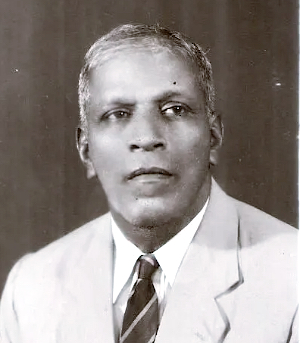
 My link with ER was further strengthened in the knowledge that he too had been a student at Wesley - more so, in the time of the great Henry Highfield - and as ‘hearts ne’er cooled that once have beat ‘neath the Double Blue’ gave our relationship a very special flavour, from the start. As an educationist of the richest quality, ER made ripples. His vigorous and honest thinking oft disturbed those who had lulled themselves into a sense of mundane complacency. A vibrant and dynamic personality, he created waves at times - often misunderstood too. His place after Richmond was Wesley; but paradoxically, the conventional Church misread both his zeal and commitment to education - the child being at the centre of his ideals - not bureaucrats. He critically evaluated the educational system of the time in order to correct what was defective; and fought doggedly to forge a system that recognized the myriad talents of children and to make provision for them, rather than distort them in order that they could squeeze into the drab, narrow grooves of a system predetermined for them, with no regard to their ceaseless creativity! Many a conventional "failure" was due to the stupid rigidity in the system of education in the country. One could not, for instance, read English, Mathematics and Economics at the University as the powers that be had decreed that mathematics was a "science subject" and hence taught in the Faculty of Science; whereas English was taught in the Faculty of Arts - and one could not be in two faculties, despite both faculties being housed in one and the same campus! So too were subjects arbitrarily grouped in the schools. The children rejected by their inability to fit into narrow predetermined slots, troubled ER sorely. The entire concept of "creativity" in education had been effectively obliterated by cold insensitive, rigid, bureaucratic dictates, Herbert Reed’s concept of Education through Art, and similar thinking totally annihilated.
My link with ER was further strengthened in the knowledge that he too had been a student at Wesley - more so, in the time of the great Henry Highfield - and as ‘hearts ne’er cooled that once have beat ‘neath the Double Blue’ gave our relationship a very special flavour, from the start. As an educationist of the richest quality, ER made ripples. His vigorous and honest thinking oft disturbed those who had lulled themselves into a sense of mundane complacency. A vibrant and dynamic personality, he created waves at times - often misunderstood too. His place after Richmond was Wesley; but paradoxically, the conventional Church misread both his zeal and commitment to education - the child being at the centre of his ideals - not bureaucrats. He critically evaluated the educational system of the time in order to correct what was defective; and fought doggedly to forge a system that recognized the myriad talents of children and to make provision for them, rather than distort them in order that they could squeeze into the drab, narrow grooves of a system predetermined for them, with no regard to their ceaseless creativity! Many a conventional "failure" was due to the stupid rigidity in the system of education in the country. One could not, for instance, read English, Mathematics and Economics at the University as the powers that be had decreed that mathematics was a "science subject" and hence taught in the Faculty of Science; whereas English was taught in the Faculty of Arts - and one could not be in two faculties, despite both faculties being housed in one and the same campus! So too were subjects arbitrarily grouped in the schools. The children rejected by their inability to fit into narrow predetermined slots, troubled ER sorely. The entire concept of "creativity" in education had been effectively obliterated by cold insensitive, rigid, bureaucratic dictates, Herbert Reed’s concept of Education through Art, and similar thinking totally annihilated.Mr. E. R. de SILVA, BA (London) (1923 - 1957)
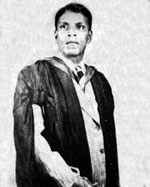 When speaking of Richmond there are few eras that stands out and referred to by the name of the head of the school who was at the helm. These references are to the glorious periods of Richmond. One such era is "ER's period".
When speaking of Richmond there are few eras that stands out and referred to by the name of the head of the school who was at the helm. These references are to the glorious periods of Richmond. One such era is "ER's period".
Egodage Richard de Silva but popularly referred to as "ER" was born on 7th May, 1901 in Ambalangoda. He had his education first at the Wesleyan Mission Boys' High School at Ambalangoda. In 1914 he and his elder brother joined Richmond. In 1918 he went from Richmond to Wesley in Colombo to pursue his higher studies.
During the time he spent at Richmond he made a name for himself in many spheres. ER was an all-rounder, and was soon making a mark for himself both in academic sphere and in the varied life of the College. Latin, Mathematics and English were his favourite subjects, and he became the Secretary of the Literary Association. After a short period as day scholars, the brothers joined the hostel. Here ER blossomed out, becoming the life and soul of Winchester House. He became a First Class Scout, Sergeant of the Junior Cadet Corps, and later a member of the platoon which won the Ceylon Shooting Cup for Senior Cadets. His greatest prowess, however, was as centre forward at Soccer. He was in the 1917 team that beat All Saints', Mahinda and St. Aloysius College in Galle and held St. Thomas' College which was the champion Colombo, to the small advantage of one goal.
In 1918 ER joined Wesley for higher studies. Wesley was, then under Henry Highfield, P. T. Cash and C. P. Dias — some of the finest teachers of their day. Incidentially Rev. Cash was also the Principal of Richmond from 1914 to 1915 the first year of life of ER at Richmond. Later he joined the Staff of Trinity where A. G. Fraser was Principal.
Mr. ER obtained the Bachelor of Arts degree of the University of London in 1925. The same year saw the 'wanderer' back at his old school, Richmond by which time he was well equipped, with the traditions of such schools as he had known to draw upon.
Mr. ER plunged into his new assignment with his wonted enthusiasm, devotion and skill. As a teacher of Mathematics and Latin he was clear, patient and hardworking. The slowest of his pupils received the greatest attention and in the junior forms he laid for them a firm foundation for higher studies in these subjects. It was work of this sort and the influence of the Head Master E. F. C. Ludowyk that produced scholars.
On the playing field ER was soon a dynamic coach of Soccer, Cricket and Athletics. A keen student of the games himself he demanded discipline, hard training and meticulous concentration from his pupils. You had to learn to kick with both feet, to make a really good start in a sprint and develop a good stride, bat, bowl and field with precision. The trier always won his praise but he was not slow to use hard words on the slacker, driving him on to greater endeavour.
Very soon ER made his mark as a keen educationalist. He became president of the Southern Province Teachers' Association and championed the rights of teachers all over Ceylon, particularly those in the vernacular schools. He was a member of the Board of Education from 1939 and President of the All-Ceylon Teachers' Union in 1941. As Secretary and later President of the Headmasters' Conference, his views on all matters relating to education were much sought after. His evidence before the Kannangara Education Commission was of great value and he championed the cause of Free Education which was achieved in 1944. It was greatly owing to his persuasion that the Methodist Church of Sri Lanka handed over all her schools except Methodist College and Wesley College to the State. ER was honured by the government and awarded the Order of the British Empire (OBE) in recognition of his services to education.
The appointment of Mr. E. R. de Silva as Richmond's first Ceylonese Principal was hailed by all who had the interests of the school at heart. To follow after men like Darrell, Small, Sneath and Dalby was no small undertaking, but ER entered into his task with humility and confidence in the co-operation of the staff and pupils of Richmond. Under him the school experienced a new period of growth. The establishment of University Entrance and Inter Arts classes created a need for new teachers and ER found for his pupils the very best available. The school now needed more classrooms and wider accommodation for the extra-curricular programmes that were introduced. The Principal's excellent relations with the Old Boys of Richmond soon helped him to give the school an extended Kindergarten, a fine new block of five class rooms above the tennis court, a new Biology Laboratory and Junior Common Room furnished in the finest taste, add a Staff Room, Audio Visual Room and a special room for Woodwork. All the buildings had a simple dignity of their own which harmonised with the beautiful landscape that is Richmond. Girls were admitted to the higher classes, and special recognition given in the prize list to Art, Handicraft, Drama and Progress, the last so that weaker students too could share in the honours on Prize Day. The Common Room afforded pupils facilities for quiet reading and in the evenings served for meetings like those of the Wednesday Evening Club which in later days took the place of Alec Sneath's Sathya Visandana Samithiya.
Though not a singer himself, how much he enjoyed the College Hymn, the Song and the new Richmond Song in Sinhala that was introduced during his period as Principal. Those of his pupils who came to know him best found in him a warm and close friend. He was always available to those who needed him, taking joy in their success and helping them in their moments of sorrow and failure. He would rarely miss the wedding of a pupil and there would be light banter and words of good advice to those who were starting a new chapter in their lives. If ever there was a death in one's family ER was there with his sympathy and his quiet friendliness. It was his deep humanity one remembered in the end.
In 1957 ER retired from his position as Head of Richmond to move to Colombo and be with his family. He was a great husband and father as his wife Hilda and children Ranjan, Chitrani and Nayeni so well know. He worked for a while as Secretary of Steuart Agencies Ltd. with the same efficiency and devotion that he had shown as Principal of Richmond. Even now he tried his best to be present in Galle for the Big Match each year. As he approached his seventies, however, his health began to fail. Perhaps he had remained in harness too long, but retirement in the normal sense of that word was quite impossible for a man like him. He passed away on 11th November 1970.
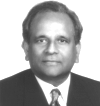
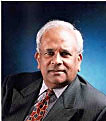 Allen Pathmarajah is a Fellow of the Institute of Chartered Accountants in England and Wales and Fellow of the Marketing Institute of Singapore. For over 22 years he was with the Overseas Chinese Banking Corporation Group (OCBC). Initially he was Executive Director of OCBC's management consultancy arm and concurrently Special Assistant to the Group Chairman. Thereafter he was with OCBC's Great Eastern Life Assurance Co Ltd as General Manager and subsequently its Managing Director. He continued as a Director until May 1998. In addition to representing Asean Focus Group in Singapore, Allen is Chairman of CSA Holdings Ltd, Eutech Cybernetics Pte Ltd, Medi-Projects Pte Ltd and H Neumann International (Asia) Pte Ltd. He also serves on a number of Singapore government committees.
Allen Pathmarajah is a Fellow of the Institute of Chartered Accountants in England and Wales and Fellow of the Marketing Institute of Singapore. For over 22 years he was with the Overseas Chinese Banking Corporation Group (OCBC). Initially he was Executive Director of OCBC's management consultancy arm and concurrently Special Assistant to the Group Chairman. Thereafter he was with OCBC's Great Eastern Life Assurance Co Ltd as General Manager and subsequently its Managing Director. He continued as a Director until May 1998. In addition to representing Asean Focus Group in Singapore, Allen is Chairman of CSA Holdings Ltd, Eutech Cybernetics Pte Ltd, Medi-Projects Pte Ltd and H Neumann International (Asia) Pte Ltd. He also serves on a number of Singapore government committees.
Allen is an old boy of Wesley College Colombo and was in the boarding for many years. He had an excellent academic career at school and won numerous prizes.
Addendum by Afghar Mohideen
I met up with Allen Pathmarajah in Singapore. He is an old Wesleyite and a hosteller and his father also taught at Wesley many years ago. Allen has consented to be one of the Speakers for the Veteran Cricketers re-union dinner on 7th Septembe 2012r.
Allen J. Pathmarajah is a Fellow - Institute of Chartered Accountants in England and Wales, Marketing Institute of Singapore and Singapore Human Resources Institute. He was formerly Ex. Vice Chairman of Overseas Chinese Banking Corporation and Great Eastern Life Assurance Co. Ltd., Governing Council of the Singapore Institute of Management.
- Executive Chairman of AJP Advisers Pte Ltd (Business Advisers focussed on Organisational Transformation through Leadership Development, Strategic and Financial Management) and Business Thinking Systems (Singapore) Pte Ltd (Business Coaching)
- Chairman of Eutech Cybernetics Pte Ltd. §
- Director of Vistage Singapore Pte Ltd, EAI Services Pte Ltd, Quantum Inventions Pte Ltd and QAI Ltd (India)
- Chairman Logan Rockfeller Asia Ltd., an Global Asset Management Company based in New York.
- He speaks on Leadership and various management topics to business and public sectors locally and internationally.
- He is Chairman of Singapore Professionals’ and Executives’ Co-operative (SPEC), and Member of:
- Marketing Institute of Singapore - Senate
- Singapore Human Resources Institute - Advisory Panel
- Board of Advisors of the International Association of Business and Economics Students (AIESEC). and also on the Board of several public listed in Private companies in Singapore and in Overseas.
John Capper in his "Old Ceylon – sketches of life in the olden time" pp154-161 dealing with Ceylon Moor shopkeepers in main Street, Pettah, in the year 1848 describes Sulaiman Lebbe Naina Marikar as "Number 42" based on the address of his business located at No 42, Main Street, Pettah. Many of the Moor businessmen were thus called by the assessment number of their respective businesses in the Pettah as their names were too complex to be remembered and pronounced by the Colonial rulers (British). Capper describes Sulaiman Lebbe as follows:- "The most flourishing of these gentry is certainly Number Forty Two, a portly oily-skinned, well conducted Moorman with a remarkably well shaved head surmounted on its very apex by a ridiculously little colored cap like an infantive bee-hive. His bazaar is admitted on all hands, especially amongst the fair sex to be "fi……chop". Yet a stranger would imagine that the fiscal had possession of the place and was on the point of selling off by auction the entire contents; so confused and motley an appearance do they wear. The doorway, narrow and low, is jealously guarded by a pile of grindstones, surmounted by a brace of soup-tureens on the one side and by tools and weapons of offence on the other" Family of Sahib Doray Naina-Marikar Hajiar A clan of Ceylon Moors moved from Beruwala to Panadura and set up business establishments in Colombo where they subsequently settled down once business prosperred.
One of these families contained a person named Sahib Doray Muhammad Lebbe Marikar, who married Assen Kandu Natchia, the third daughter of Meera Lebbe Slema Lebbe Comoster, in 1817. Their son was Sulaima Lebbe (Jahil) who in turn had a son named Naina Marikar in 1868. Naina-Marikar received his Arabic education at home and Tamil at a night school and also attended Wesley College, which was then situated next door in Old Moor Street, for his English education. As was the prevailing custom then, he also attended his father’s shop during his free time and learnt the mechanics of business. His father passed away in 1892 and Naina-Marikar took over the business at Main Street, Pettah. His business flourished rapidly and he opened up several new shops in the Pettah. Naina-Marikar was resident at No 43, New Moor Street, Colombo, and in 1900 he purchased a palatial bungalow, that contained a large garden, at Turret Road called "Muirburn". Within this compound he built another shop called Victoria Drapery Stores. He also worked as an indenting agent and imported large stocks of goods from Europe to be disposed of wholesale to other big merchants in Ceylon. He sold on credit and his stock in trade was valued at several hundreds of thousand Rupees. Naina-Marikar made a donation towards the construction of the Wesley College building at baseline Road, Colombo.
This donation, along with many others, has been gratefully acknowledged on the plaque near the main entrance of the school even ntil today. He took an active part in the educationa movement of Wapchi Marikar at Zahira College and of I.L.M.H. Noordeen Hajiar, his Father-In-Law, at Hameedia School. The prevailing system of Muslim Marriage Registration in Ceylon was not beneficial to the parties in the event of any disputes arising between them. The Government found it quite difficult to settle such disputes, especially in the Eastern Province. As the Muslim Marriage Registration Ordinance had not been compulsorily enforced on the Muslims, the Government Agent, Mr. Lushington, addressed Naina-Marikar, in 1907, on the subject as he was considered the leader of the Muslims of Colombo. Naina-Marikar sumoned a meeting of the Muslims, consisiting of both lay people and Ulemas, at his residence at "Muirburn" and explained the difficulties of the Government in settling marriage disputes. Several other meetings followed and, finally, a request was made to the Government to make the registration of Muslim marriages compulsory.
The congregation of the New Moor Street Mosque had always opposed the registration of Muslim marriages on the grounds that it was not islamic and hence not required. This opposition was prevalant since the inception of the marriage registration ordinance in 1886 for which the Muslims were not required to comply at the time of introduction. A meeting of the congregation of the New Moor Street Mosque, under the Presidency of M.I.Muhammad Ali JP, paternal grandfather of Mrs. Ummuna Azeez, was held in the Mosque to protest against Naina-Marikar’s proposal and the proccedings of the meeting were published in the "Crescent" of Sheikh Abdulla Quilliam of Liverpool Muslim fame as follows:- "A General Meeting was held at 8.00 p.m. on the 12th July 1907 at New Moor Street Mosque, to discuss the subject of introducing registration or\f Muhammadan marriages. Mr. Muhammad Ismail Muhammad Ali, Khan Bahdur, Persian Consul and Justice of the Peace, presided and Mr. A.K.Uduman hajiar acted as Secretary, and there was a respectable assembly of some of the leading Muhammadans including Alims and Mullahs. It was unanimously resolved that this Registration Ordinance should not be introduced, as it is aginst the Muhammadan religion and serves no purpose.
There was an assembly of about 5,000 people". Nevertheless, amendents were made to the Muhammadan Marriage Laws and registration became compulsory. Naina-Marikar’s ancestors were members of the Maradana Mosque congregation and they contributed money for the purchase of a property in 1840. naina-Marikar, at his own personal cost, erected a building for the Maradana Mosque Ablution Tanks (Howl) in 1899. R.H. Bassett, CCS, remarked, "the Howl or the ablution place oat Zahira College Mosque is extremely picturesque seen through its low circular arches". He contributed two thousand rupees for the Zahira College houses (from Nos. 105 to 121) to make up the twelve thousand seven hunfred and fifty rupees required. He also paid two hundred and fifty rupees to equip Wapchi Marikar’s second building with furniture. As a member of the executive committee of the Maradana Mosque he was elected Treasurer for several periods. He was also a contributing member of the Jameeathul Hameediah which managed the Hameediah School. Oduma Lebbe Marikar Ahmed Lebbe Marikar Alim (OLMALM Alim) was one of the wealthy amongs the Ceylon Moors in Colombo.
He did extensive hardware business and was possessed of several immovable properties. He had several sons who managed each department of his businesses. He passed away in 1917 and his estate was valued at approximately two million rupees. When his last will was submitted to court some of his heirs contested it. The will was not proved and the Court declared that he had died intestate. The Supreme Court rejected the appeal and preparations were being made by the heirs to appela to the Privy Council. Some of the elders in the community advised them to stop legal proceedings and allocate the properties to the heirs. The parties concerned agreed to the selection of S.L.Naina-Marikar Hajiar as the arbitrator and his award was accepted as final. Naina-Marikar was engaged in the hardware buisiness during the latter years of his life. His establishment was situated at No. 188, Keyzer Street, Pettah. Prior to that, in 1920, he was also engaged in the automobile business, in partnership with Weerappas, and was involved in importing motor vehicles from Britain and Europe. Naina-Marikar passed away on December 24, 1926.
He loved learning, and remained a student to the end AGAMPODI PAULUS DE ZOYSA was born 80 year ago on April 5. in a small house, which still stands by the sea In Rendombe near Ambalangoda. He died on a Poya day two Years ago, working till the till the day of his last book an abridged edition of the Majjhima NikŒya. It was his ambition, to produce the whole of the Buddhist texts so that all could read it. Many parts of the Buddhist Scriptures had been translated, both into English and Sinhalese from the original Pall texts, but this was the first attempt to translate the whole work. It took over 20 years-and ran Into 48 volumes. After printing the Sinhalese Tripitaka in its complete form, Dr. de Zoysa started on a shorter edition which he hoped to compress into about ten volumes, but he only got as far as the first two books. The Digha NikŒya and the Majjhima NikŒya.
Dictionaries Besides his MAGNUM OPUS the Tripitaka, he compiled and printed in 1948, his English - Sinhala Dictionary and also a cheaper, concise edition of this for the benefit of school children. In the following year his Sinhala Dictionary in two volumes, appeared. A second enlarged edition of this was Published in 1967 in three volumes. This colossal task put a severe strain on him and he spent three months in hospital but made a remarkable recovery and went straight back to his printing press. As a child Dr. de Zoysa had his first lessons in the temple, writing his letters in the sand and learning his religion from the bhikkhus. Later he attended Mahinda College. Galle, and came under the influence of its dedicated principal, F. L. Woodward.
His next move was to Wesley College in Colombo where he proved to be not only a good student but also a keen sportsman, besides being something of an actor. After some time in a teachers' training college he was appointed Art Master at Royal College but soon decided to go to England for further studies. He had made some money out of a book on mathematics and with the help of his uncle was able to meet the initial cost. In London Dr, de Zoysa's parents had died on the day he was eleven years old. So he had to rely on his own efforts to support himself in London. He was a born teacher and soon became a popular coach to overseas students. He was appointed examiner in Slnhalese to the Universities of London and Cambridge. In 1921 he was called to the Bar at Gray's Inn and in 1929 obtained a doctorate in London University. During this time he was active in the Buddhist movement in London, and addressed meetings in Hyde Park and also visited Ireland and New York where he lectured on Buddhism. . After about 15 yeas in England he returned to Ceylon. From the ship the sight of Sri Pada against a clear sky was for him a good omen. He was greeted by Bhikkhus chanting pirith and large crowds of friends and former pupils.
This Poor man's lawyer began the struggle to earn a living at the Bar and with odd jobs of teaching. He soon became known as a poor man's lawyer and when he decided to contest Colombo South in 1936 he found many good friends to help him. One of his former students, the late Mudaliyar Madanayake of Kelaniya, sent a whole fleet of buses, newly arrived from England, to take voters to the polls. Dr. de Zoysa won the election, was unseated, but was re-elected with an increased majority. Under the Donoughmore Constitution each member Of the State Council was on a special committee with a Minister as chairman. Dr. de Zoysa joined the Education Committee. He war deeply interested in promoting a better system of education from the elementary school upwards and the granting of more scholarships to deserving students. Soon after becoming a State Councillor he started a press, producing his own books on educational subjects including two historical plays Vihara Maha Devi and Kuveni and two volumes on ayurvedic medicine. Then he began his larger works "the Tripitaka" and "the Dictionaries" In his spare time he made a comparative study of Christianity and Buddhism which he had always found a fascinating theme.
Although an ardent Buddhist he was greatly interested in Christian teachings and his copy of the Bible was underlined at the passages which appealed to him such as "Provide neither gold nor silver nor brass for your purses." Dr. de Zoysa found a great deal that was common to the two religions and the way of life of their founders. In the simplicity of his own life, his total unselfishness and his dedication to his work he would have been an ornament to either religion. He was a man of rare integrity and great courage, often unorthodox and obstinate as for instance in his views on social reforms. He cared neither for praise nor for blame. He loved learning and remained a student to the end of his days. When he wanted to do something, no trouble was too great. His patience, perseverance and powers, of endurance was almost limitless He left no money and no property, only his invaluable books and the smile that lights the faces of those who knew him whenever his name is mentioned. By G. P. Malasekera
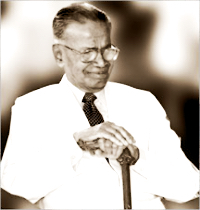 When we reflect on the late D.M. Rajapakse, Member for Hambantota in the State Council from 1945 to 1947 and for Beliatta in the House of Representatives from 1947 to 1965, we should ponder over the representation of our people in the legislature since its inception in 1833. The British government in this country began in 1795 and within a few years the all powerful Governor Frederick North had a semblance of discussion with a Council of three Members with which he was supposed to consult so that it might appear that laws were passed by the "Governor in Council". What seemed a one-man government was changed in 1833 after the Colebrook-Cameron Commission, when a Legislative and an Executive Council formed for the whole island which was now divided into five provinces.
When we reflect on the late D.M. Rajapakse, Member for Hambantota in the State Council from 1945 to 1947 and for Beliatta in the House of Representatives from 1947 to 1965, we should ponder over the representation of our people in the legislature since its inception in 1833. The British government in this country began in 1795 and within a few years the all powerful Governor Frederick North had a semblance of discussion with a Council of three Members with which he was supposed to consult so that it might appear that laws were passed by the "Governor in Council". What seemed a one-man government was changed in 1833 after the Colebrook-Cameron Commission, when a Legislative and an Executive Council formed for the whole island which was now divided into five provinces.
The Legislative Council was presided over by the governor himself. It had eight officials and six unofficial Members appointed by the governors. Of the six, three represented the Europeans, and one each represented the Sinhalese, Tamils and Burghers. This system continued till 1889 when two more unofficial members were added, one to represent the Kandyan Sinhalese and the other to represent the Muslims. By this time the original five provinces were increased to nine as a result of redemarcation. In 1912 the principle of election of Members was introduced but on a restricted franchise. Those who qualified as "Educated Ceylonese" - 2934 in number, elected one, 2149 Burghers elected one and the 1306 Europeans elected two. So to these four "elected" Members were added six more nominated members. Hence there were ten unofficial members as against eleven official members - thus retaining the official majority. In 1921 on a slightly restricted franchise sixteen members were elected of whom three were for the Western Province and one for each of the other eight provinces.
As mentioned earlier the original five provinces of 1833 were increased to nine by 1889. To the eleven thus elected for the Provinces, three were elected for the Europeans, one for the Burghers and for the recently formed "Low-Country Products Association". A feature of this election was that a candidate for any of the Provincial seats had to be a resident therein. This was a cautious step by the governor to prevent what today we call the "parachuting" of candidates from Colombo as prospectives in the Provinces. Hence the first elected Member for the Southern Province was O.C. Thilakaratne of Matara and so were D.H. Kotalawala of Badulla elected for Uva and S.D. Krisnaratne of Anuradhapura elected for the North Central Province. In 1924 some of the "One Member" Provinces had their quota increased. Thus Southern Province Western Division (Galle District) elected C. W. W. Kannangara who had represented the Southern Province itself for a short time in the previous Legislative Council. Southern Province Central Division (Matara District) elected F. A. Obeysekara who had his origins in Kataluwa and the Southern Province Eastern Division (Hambantota District) elected V. S. de S. Wickramanayake a lawyer practising for long in Tangalle, incidentally defeating G. K. W. Perera by the narrowest margin of 17 votes at that election.
By 1924, D. M. Rajapakse of Weeraketiya having had his education at Richmond College Galle and then at Wesley College, Colombo where he captained the College cricket team returned home to his village instead of seeking whatsoever employment that was available outside for a rural youth who had had a fair knowledge of English - a rare achievement at that time. The Mudaliyar of the West Giriwa Pattu appeared very hostile to D. M. and was insulting whenever the occasion arose. He fought back courageously without yielding to officialdom. He organized peasants' agitations for rural development, roads, schools, hospitals and land and the restoring of village tanks and channels.
He stood up for the cause of the neglected villages and the oppressed poor. At last there was a local leader to oppose the rule of the Gate Mudaliyar. At the 1931 State Council elections under the Donoughmore Constitution which granted the vote to everyone above 21 years of age the Hambantota constituency was contested by V. S. de S. Wickramanayke and the late Mudaliyar Harry O. Jayawardene. Wickramanayake was supported by D. M. and inflicted a resounding defeat on his opponent. By the time of the 1936 State Council election D. M. was ready for the fray. He marshalled "Viridu" singers, "Raban" players etc. and won his election with a majority of over 15,000 votes - almost a record at that time. Once in the State Council, as the first son of the soil to represent the Hambantota District he carried on his objectives which he visualized as a school leaver in the 1920's.
However he died before his time in May 1945, barely 50 years of age, muttering under his dying breath that he could not do enough for his people of Ruhunu. A lot of coercion and pressure and extensive requests from many delegations ultimately pushed D. M. Rajapakse, D.M's younger brother, to the Hambantota Kachcheri on nomination day clad in the famous "Kurakkan" shawl added to his new national dress. None dared to come forward against D. M.'s family. Moreover many thought that elections would be held soon under the new Soulbury Constitution. However the new elections were postponed till the latter part of 1947. Meanwhile D. M. did not change his simple ways and remained the same old village gentleman who had moved with his people without either putting on weight or adopting any pretences. He set about providing land for the landless, water for the cultivators and above all giving a patient hearing to the people to whom he made himself available at all times.
He lived in a single room at "Sravasti" the M. P.'s hostel. He had no house in Colombo, only a utility vehicle. His only wealth was a happy house in Weeraketiya where he had lived with his devoted wife and his family of three daughters and six sons. He was never a rich man and died almost 30 years ago, a little over 60 years of age. When S. W. R. D. Bandaranaike resigned in 1951 from the UNP because he felt that the independence we got in 1947 was being wasted on wrong priorities and crossed the floor of the House abandoning his Ministry and being Leader of the House, a loyal follower who walked behind him across the floor of the House was D. M. Although he appeared a mild man he was of tremendous courage and loyalty.
Why do we remember him with affection? He bore no ill-will towards anyone. He very rarely got angry. His eldest son Chamal who is in Parliament is a living replica of his father in physical appearance and quiet conduct. Three of his sons, I understand, have settled in the USA, one of them a retired Colonel of the Sri Lankan Army and another a Soviet Union qualified engineer. D. M.'s greatest contribution appears to many to be his son Mahinda who first came to Parliament in 1970. It is well known that he is a matured senior Parliamentarian who has inherent courage and professional skill. His practical experience is far more useful than mere bookishness. He can handle any Ministry. Even if he is made the Minister without portfolio he will make even that attractive and enviable. He is forthright in his views and courageous in expressing them. He is a practical politician from the South whose capacity and leadership qualities cannot be ignored. We remember D. M. for many reasons, foremost among them as the father of Mahinda Rajapaksa.
Addendum by Bashur Musafer, Sydney, Australia
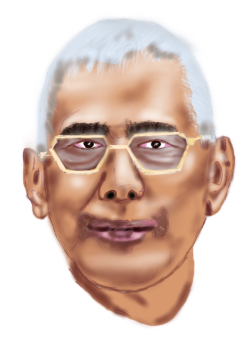 The article written by the author Sam Wijesinghe gives a great insight into the contributions made by both Don Matthew Rajapakse (DM) and his younger brother Don Alvin (DA) to the rural folk in the deep rural south. The author compliments DM for carrying on his objectives he visualised as a young school leaver undoubtedly derived from his schooling at Richmond and Wesley College. Undoubtedly it was DM who as the "Lion of the South" laid the foundation for the Rajapakse clan to dominate politics in the Hambantota district.
The article written by the author Sam Wijesinghe gives a great insight into the contributions made by both Don Matthew Rajapakse (DM) and his younger brother Don Alvin (DA) to the rural folk in the deep rural south. The author compliments DM for carrying on his objectives he visualised as a young school leaver undoubtedly derived from his schooling at Richmond and Wesley College. Undoubtedly it was DM who as the "Lion of the South" laid the foundation for the Rajapakse clan to dominate politics in the Hambantota district.
I would like to clarify some aspects of the article. Mahinda Rajapakse together with Chamal, Basil and Gotabaya were the sons of Don Alvin. DA took to politics after the untimely death of DM in 1945.
George and Lakshman were the sons of DM. George followed in the footsteps of his father and represented Royal College at cricket.
It must be said that DM and DA were both simplistic in manner and attitude who served in the best interest of the people.
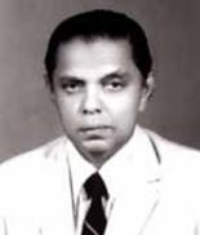 Was born at No. 47, Church Street, Fort, Galle on September 7, 1877. He was educated at Wesley College, Colombo (Pettah) and represented the College Cricket XI under the name of M.M.Muhammad, as he was then known at school. His contemporaries were, C.E.Pereira, who was the captain of the Cricket XI at Wesley, and S.P.Foenander, the worlds official cricket record keeper. Muhammad made an unsuccessful attempt at passing the pre-medical examination before turning to business. He was the Vice Consul for Turkey at Galle and later Consul for Turkey at Colombo during the period 1903 to 1915. He was also a member of the Galle Municipal Council, for twenty five years, during the period 1906 to 1931. later he was a member of the Colombo Municipal Council from 1940 to 1943. he also sat as a member of the Fez Committee and was the founder President of the All Ceylon Moor’s Association for and held that position for a number of years. He, subsequently, held the position of President of the All Ceylon Muslim League in 1945. He represented the Consulate of Turkey in Ceylon. First Muslim Member for the All Island Seat at the Legislative Council. Senator 1947-1952. In addition, Muhammad was a registered member of the congregation of the Maradana Mosque.
Was born at No. 47, Church Street, Fort, Galle on September 7, 1877. He was educated at Wesley College, Colombo (Pettah) and represented the College Cricket XI under the name of M.M.Muhammad, as he was then known at school. His contemporaries were, C.E.Pereira, who was the captain of the Cricket XI at Wesley, and S.P.Foenander, the worlds official cricket record keeper. Muhammad made an unsuccessful attempt at passing the pre-medical examination before turning to business. He was the Vice Consul for Turkey at Galle and later Consul for Turkey at Colombo during the period 1903 to 1915. He was also a member of the Galle Municipal Council, for twenty five years, during the period 1906 to 1931. later he was a member of the Colombo Municipal Council from 1940 to 1943. he also sat as a member of the Fez Committee and was the founder President of the All Ceylon Moor’s Association for and held that position for a number of years. He, subsequently, held the position of President of the All Ceylon Muslim League in 1945. He represented the Consulate of Turkey in Ceylon. First Muslim Member for the All Island Seat at the Legislative Council. Senator 1947-1952. In addition, Muhammad was a registered member of the congregation of the Maradana Mosque.
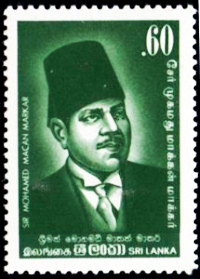 He was Knighted in 1938. Ibrahimiya Arabic College at Galle was founded by his mother, Mrs. O.L.M.Macan Markar, who left endowments for its maintenance. The institution is now being maintained by the firm. Haji Muhammad Macan Markar, Effendi, as he was known then, married Noor Neima Naina-Marikar, the eldest daughter of S.L.Naina Marikar Hajiar, on July 2, 1910, at "Muirburn", Turret Road, Colombo. When the Hijaz Railway connecting Makkah and Madinah was commenced in 1907, Ceylon Muslims presented, at the Grand Mosque, New Moor Street, an address of thanks to the Turkish Consul, Muhammad Macan Markar, for submission to the Sultan of Turkey. A photograph of those who attended this function is still available. Muhammad Macan Markar performed the Hajj piligrimage, in 1906, together with his mother, Aamina Umma, daughter of Aboobucker Mudaliyar, his grandmother Pathumuthu, daughter of Mudaliyar Cassim Lebbe Marikar (Cassile Blanc), his maternal uncle, Avoo Lebbe Marikar and the two ikhwans. S.L.M.H.Abdul Wahab and H.S.M. Izzadeen. They encountered a number of interesting adventures on their journey, including an encounter with a Bedouin tribe while crossing the Arabian desert on camel back, in a caravan. As Turkish Consul, he visited Istanbul together with his brother Abdul Vadood and thereafter Rome, Paris and London on business, in 1909. While in London, he was presented to His Majesty King Edward VII, at St. James’s Palace by Lord Crewe. Muhammad Macan Markar took a keen interest in the promotion of Muslim education and subscribed Rs. 1,000 towards the construction of houses, alongside the New Olympia Theatre at Darley Road, in a project that was estimated to cost Rs. 12,750. He, along with M.T.Akbar and several others, founded the Ceylon Muslim Educational Society Ltd., which established and managed the Hussainiya Boy’s School and Fathima Girl’s School. He realised the disability he suffered from insufficient education and endeavoured to provide his sons the best possible education available. It was in his lavish bungalow, "Villa Stamboul", Galle Road, Colpetty, that the Muslim Ladies of Ceylon, gave an "Arabian Night" reception and presented an address paper to Lady Manning, wife of Governor, Sir Henry Manning, on October 5, 1921.
He was Knighted in 1938. Ibrahimiya Arabic College at Galle was founded by his mother, Mrs. O.L.M.Macan Markar, who left endowments for its maintenance. The institution is now being maintained by the firm. Haji Muhammad Macan Markar, Effendi, as he was known then, married Noor Neima Naina-Marikar, the eldest daughter of S.L.Naina Marikar Hajiar, on July 2, 1910, at "Muirburn", Turret Road, Colombo. When the Hijaz Railway connecting Makkah and Madinah was commenced in 1907, Ceylon Muslims presented, at the Grand Mosque, New Moor Street, an address of thanks to the Turkish Consul, Muhammad Macan Markar, for submission to the Sultan of Turkey. A photograph of those who attended this function is still available. Muhammad Macan Markar performed the Hajj piligrimage, in 1906, together with his mother, Aamina Umma, daughter of Aboobucker Mudaliyar, his grandmother Pathumuthu, daughter of Mudaliyar Cassim Lebbe Marikar (Cassile Blanc), his maternal uncle, Avoo Lebbe Marikar and the two ikhwans. S.L.M.H.Abdul Wahab and H.S.M. Izzadeen. They encountered a number of interesting adventures on their journey, including an encounter with a Bedouin tribe while crossing the Arabian desert on camel back, in a caravan. As Turkish Consul, he visited Istanbul together with his brother Abdul Vadood and thereafter Rome, Paris and London on business, in 1909. While in London, he was presented to His Majesty King Edward VII, at St. James’s Palace by Lord Crewe. Muhammad Macan Markar took a keen interest in the promotion of Muslim education and subscribed Rs. 1,000 towards the construction of houses, alongside the New Olympia Theatre at Darley Road, in a project that was estimated to cost Rs. 12,750. He, along with M.T.Akbar and several others, founded the Ceylon Muslim Educational Society Ltd., which established and managed the Hussainiya Boy’s School and Fathima Girl’s School. He realised the disability he suffered from insufficient education and endeavoured to provide his sons the best possible education available. It was in his lavish bungalow, "Villa Stamboul", Galle Road, Colpetty, that the Muslim Ladies of Ceylon, gave an "Arabian Night" reception and presented an address paper to Lady Manning, wife of Governor, Sir Henry Manning, on October 5, 1921.
Muhammad Macan Markar was elected the first Mohammedan Member for the all island seat in the Legislative Council in 1924. He was subsequently elected member for the Batticaloa South electorate in the State Council from 1931 to 1936 defeating E.R. Thambimuthu, and thereby gave the Muslims of the Eastern Province a political consciousness. he was elected the Minister of Communication and Works and it was his deciding vote in the Board of Ministers that introduced Income Tax to Ceylon. He was Knighted in 1938. At a grand public reception given to him in his home town, Galle, he was the first Muslim to openly espouse the establishment of a Sinhala Government, provided that justice and fair play amongst all the communities in the country was ensured. As a matter of fact, the pro-Sinhala attitude of the All Ceylon Moor’s Association, of which Sir Muhammad was the President, broke the back-bone of the pro-fifty-fifty group. Sir Muhammad’s successor in office, Sir Razik Fareed, carried on this policy with great gusto until the fifty-fifty cry was silenced. Sir Muhammad was appointed a Senator in the first Parliament of Ceylon in 1947 and continued to remain so until his death, after a short illness, on May 10, 1952 (15 Sha’aban 1371H). His wife pre-deceased him. Sir Muhammad made a bequest of Rs. 50,000 towards the construction of a Mosque in the University of Ceylon campus at Peradeniya. He also made substantial endowments towards Muslim female education and for post graduate studies for Muslim students.
by W.T.A. Leslie Fernando
 The 50th death anniversary of Fr. S.G. Perera, the well known priest of the society of Jesus, the famous historian and erudite scholar fell on February 19. An authority on the history of the Catholic Church in Sri Lanka, Fr. S.G. Perera passed away on February 19, 1950. Rev. Fr. Gregory Simon Perera SJ, was born at Kalutara on June 5, 1882. He had his early education at Holy Cross College, Kalutara and secondary education at Wesley College and St. Joseph's College, Colombo. At the age of 18, he passed the government clerical examination and served in the Land Registry, Ratnapura. In 1905 he answered a call to join the vineyard of Christ and left the country to join the Jesuit Novitiate in India.He was ordained a Jesuit priest on November 21, 1917. He was the first Sinhalese to join the Society of Jesus. Proficient in several languages, for some time Fr.S.G. Perera served as the Professor of Missiology at the Gregorian University Rome. After he came back to Sri Lanka, he served as a teacher at St. Aloysius College, Galle and as principal, St. Servatious College, Matara. His historical studies began in 1915. His versatility in Portuguese made Fr. S.G. Perera to do research about the Portuguese period in Sri Lanka. Soon his learned, analytical and critical works brought Fr. S.G. Perera to the forefront as a historian. Intensive labour In 1918, the government invited Fr. S.G. Perera to translate 'Conquista Temporale Espireitual de Ceylao' by Ferma de Queros an authentic and comprehensive work on the Portuguese period in Sri Lanka into English. Fr. S.G. Perera undertook this laborious task with great interest and enthusiasm. It took over ten years of intensive labour for S.G. Perera to translate this work containing 1054 manuscript folio in Portuguese. The translation of Fr. S.G. Perera was published in 1930 titled 'The Temporal and Spiritual Conquest of Ceylon'. This indeed was his greatest contribution to the study of history in Sri Lanka.
The 50th death anniversary of Fr. S.G. Perera, the well known priest of the society of Jesus, the famous historian and erudite scholar fell on February 19. An authority on the history of the Catholic Church in Sri Lanka, Fr. S.G. Perera passed away on February 19, 1950. Rev. Fr. Gregory Simon Perera SJ, was born at Kalutara on June 5, 1882. He had his early education at Holy Cross College, Kalutara and secondary education at Wesley College and St. Joseph's College, Colombo. At the age of 18, he passed the government clerical examination and served in the Land Registry, Ratnapura. In 1905 he answered a call to join the vineyard of Christ and left the country to join the Jesuit Novitiate in India.He was ordained a Jesuit priest on November 21, 1917. He was the first Sinhalese to join the Society of Jesus. Proficient in several languages, for some time Fr.S.G. Perera served as the Professor of Missiology at the Gregorian University Rome. After he came back to Sri Lanka, he served as a teacher at St. Aloysius College, Galle and as principal, St. Servatious College, Matara. His historical studies began in 1915. His versatility in Portuguese made Fr. S.G. Perera to do research about the Portuguese period in Sri Lanka. Soon his learned, analytical and critical works brought Fr. S.G. Perera to the forefront as a historian. Intensive labour In 1918, the government invited Fr. S.G. Perera to translate 'Conquista Temporale Espireitual de Ceylao' by Ferma de Queros an authentic and comprehensive work on the Portuguese period in Sri Lanka into English. Fr. S.G. Perera undertook this laborious task with great interest and enthusiasm. It took over ten years of intensive labour for S.G. Perera to translate this work containing 1054 manuscript folio in Portuguese. The translation of Fr. S.G. Perera was published in 1930 titled 'The Temporal and Spiritual Conquest of Ceylon'. This indeed was his greatest contribution to the study of history in Sri Lanka.
The historical studies of Fr. S.G. Perera was not confined to the Portuguese period, and extended to the Dutch and the British periods as well. He did his research not only in Sri Lanka but visited various archives and libraries in Goa, Lisbon, Hague, Rome, London and Paris and discovered rare manuscripts and ancient documents on our history. The extensive research and well-acclaimed articles of Fr. S.G. Perera like 'The City of Colombo', 'Alagiyawanna' and 'The Rise and Fall of the Kandyan Kingdom' brought forth hither to unknown facts and incidents in our history. In all Fr. S.G. Perera has published not less than 15 books and over 300 learned articles in various journals and periodicals - both here and abroad. Fr. S.G. Perera is also an authority on the history of the Catholic Church in our country. Incidentally his first attempt at history was that of the Jesuits in Sri Lanka, the religious family to which he belonged. Later in 1941, he put together all his material and published the book 'Jesuits in Ceylon.' Fr. S.G. Perera is outstanding when he deals with the history of the Catholic Church in Sri Lanka during the Dutch period. The Catholics in Sri Lanka under the Dutch were subject to severe oppression, victimisation and humiliation. Yet they held on to the faith with a wonderful tenacity until the Dutch extended some measures of religious tolerance towards the end of their rule. In fact, during the time of Dutch persecution, Catholic faith in Sri Lanka strengthened and its roots struck deep down in the soil. Foundation It was also during the Dutch period that a foundation was laid to present the Catholic religion with a national setting.
Missionaries like Blessed Joseph Vaz, Fr. Jacome Gonsalvez and other Oratorian priests who followed them did not translate or imitate Western religious works. They rather produced Sinhala and Tamil religious literature, prayers, hymns and drama to suit the cultural traits in this country. The researches of Fr. S.G. Perera and his works like 'Oratorian Mission in Ceylon' and 'Historical Sketches' splendidly brings to light the set backs and successes of Catholics and magnificent cultural adaptation of the Oratorians during the Dutch times. Fr. S.G. Perera was composing the history of the Catholic Church in Sri Lanka when sickness intervened. He had completed five chapters on it when he passed away on February 19, 1950. If he had lived to complete this work, it would have been his masterpiece. That is not all. Fr. S.G. Perera served as the editor of 'Ceylon Literary Register', a member of the Ceylon Historical Commission, and was on the council of the Ceylon Royal Asiatic Society. He was also the first Sri Lankan Vicar General of the Diocese of Galle. On the National Heroes day of Navy 22, 1983 the Philatelic Bureau issued a commemorative stamp on Fr. S.G. Perera in appreciation of his scholarly, magnificent and patriotic contributions towards the study of history in Sri Lanka. Fr. S.G. Perera SJ was exemplary as a priest of God. All his endeavours were in harmony with his priesthood and he never made use of his talents and vocation to earn foreign dollars. He was sincere to God and sincere to man and spirituality reigned supreme all throughout his career. The writer is a former High Court Judge.
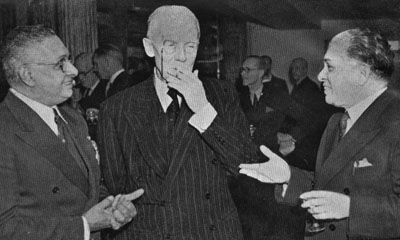 In 1946,he entered the diplomatic service,as Ceylon's representative in the UK,and in 1948 was Sri Lanka's first ambassdor to the USA. He will be remembered as one of Sri Lanka's first and ablest envoys and is an Old Boy of Wesley College Colombo..Lady Corea, will be 99 (1998) next month. In 1952 while her husband Claude Corea served as Ceylonese representative in Britain, Karmanie Corea remembers the ceremony at Buckingham Palace when the Queen bestowed his knighthood. “I did not go into the hall, but was called in later and the Queen spoke to me. I was wearing a royal blue saree and a diamond in my nose. I was always referred to as the ‘lady with a diamond in her nose’.“My husband, after he was knighted, was also seconded to both Paris and Holland though based in London. Ambassadors were considered very important and so we had much entertaining to do.“I served a few local dishes such as stringhopper buriyani, wattalapam and for tea included patties and cutlets.
In 1946,he entered the diplomatic service,as Ceylon's representative in the UK,and in 1948 was Sri Lanka's first ambassdor to the USA. He will be remembered as one of Sri Lanka's first and ablest envoys and is an Old Boy of Wesley College Colombo..Lady Corea, will be 99 (1998) next month. In 1952 while her husband Claude Corea served as Ceylonese representative in Britain, Karmanie Corea remembers the ceremony at Buckingham Palace when the Queen bestowed his knighthood. “I did not go into the hall, but was called in later and the Queen spoke to me. I was wearing a royal blue saree and a diamond in my nose. I was always referred to as the ‘lady with a diamond in her nose’.“My husband, after he was knighted, was also seconded to both Paris and Holland though based in London. Ambassadors were considered very important and so we had much entertaining to do.“I served a few local dishes such as stringhopper buriyani, wattalapam and for tea included patties and cutlets.
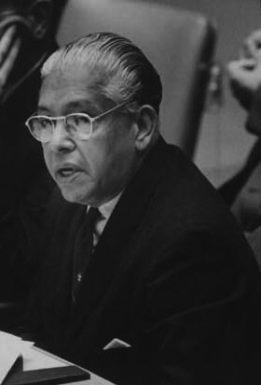 In fact when my husband later went to Washington as ambassador I demonstrated on T. V. how to make stringhoppers.There were funny moments, recalls Lady Corea. Once she attended a party for Nehru in London which it turned out, was an all-male affair. “The host insisted I pose for a photograph with Nehru. After that, another lady and I tried to make ourselves invisible behind the dining room door.“I could never resist buying shoes and often borrowed money from my chauffeur for I never carried much money with me. The chauffeur told me he would come to Ceylon and open up a shoe shop for me one day.“Life with my husband who was Minister thrice was never dull. Those days,” said Lady Corea, her tired eyes looking far away “will never come back.
In fact when my husband later went to Washington as ambassador I demonstrated on T. V. how to make stringhoppers.There were funny moments, recalls Lady Corea. Once she attended a party for Nehru in London which it turned out, was an all-male affair. “The host insisted I pose for a photograph with Nehru. After that, another lady and I tried to make ourselves invisible behind the dining room door.“I could never resist buying shoes and often borrowed money from my chauffeur for I never carried much money with me. The chauffeur told me he would come to Ceylon and open up a shoe shop for me one day.“Life with my husband who was Minister thrice was never dull. Those days,” said Lady Corea, her tired eyes looking far away “will never come back.
Sir Claude was commissioned by Don Stephen Senanayake, the first Prime Minister, to undertake diplomatic missions in the United States. He was appointed as the first Ceylonese Ambassador to the United States in 1948. Records in the Truman Library reveal that Sir Claude visited the President on 1 March 1949 and again on 21 July 1952, marking his period as Ambassador of Ceylon in the United States. During this period he attended the 5th session of FAO in Washington DC from 21 November to 6 December 1949. Sir Claude was appointed as High Commissioner of Ceylon in United Kingdom in 1954. He was given concurrent accreditation to France and the Netherlands in January 1956. He served as High Commissioner at the Court of St. James until 1958.
He was drawn increasingly into multilateral diplomacy in this period, being appointed as Chairman of the UN Interim Committee on International Commodity Arrangements of GATT at its 10th session, in 1955 - having been associated with GATT from its inception. Ceylon only became member of the United Nations on December 14, 1955. In August 1956 he participated in the 22 power London conference that discussed the brewing Suez crisis, before travelling to China.
On 8 September 1956 he arrived in Beijing as Special Ambassador to China, at the head of a Ceylon Government Delegation that was to have preliminary discussions with the Government of the People's Republic of China regarding the establishment of diplomatic relations, trade expansion, economic co-operation and cultural exchanges. The delegation included Sir Susantha de Fonseka, K.B.E., Mr. T.B.Subasinghe, M.P., Parliamentary Secretary to the Minister of Defence and External Affairs and Mr. R. Coomaraswamy, Senior Assistant Secretary, Ministry of Finance. Mr Coomaraswamy subsequently became Deputy Administrator of UNDP and the other two members became cabinet ministers.
The Suez Crisis boiled over from 5 November to 22 December 1956.
Sir Claude chaired the 12th session of GATT in October 1957 in the Palais des Nations in Geneva.
He was next appointed as Representative to the United Nations in June 1958 and was in office in September of that year when Prime Minister Solomon W. R. D. Bandaranaike was assassinated in Ceylon. Among those who called to offer condolences were Mr. Vazili Kuzanesov, Soviet Deputy Foreign Minister and Mr. V. K. Krishna Menon, India's Defence Minister. Bandaranaike’s widow, Sirimavo Bandaranaike, became Prime Minister in July 1960.
In 1960 Sir Claude Corea reflected on the irony behind Secretary of State Christian Archibald Herter's remark that it was "wholly possible" for Red China to be invited to disarmament discussions, asking wryly whether "[i]f they are not considered good enough to take their place in the U.N., would they be good enough to sit around the disarmament table?" Sir Claude seems to have caught the attention of the Republican National Committee: Documents pertaining to him are to be found in Box 628 of the Dwight D. Eisenhower Library under the rubric “Corea, Claude (Sir) – Ceylon – Chairman U. N. 1st Political Committee.
Sir Claude became President of the UN Security Council in May 1960 President of Security Council. On the first day of his presidency Francis Gary Power’s Lockheed U-2 plane was forced down onto Soviet territory and he was captured. The presidential race was under way at this time and the Democratic contender, Senator John F. Kennedy, visited Sir Claude in his apartment, for consultation. On May 25, 1960, closing a politically stormy month, Sir Claude told the Security Council: "We hold that, at the present time, it is a rule of international law that the air space over the territory of any country belongs to that country and cannot be violated without a breach of international law…..The International Civil Aviation Organization negotiated an international agreement which was signed in Chicago in 1944 . The signatories, who were sovereign states, big and small, accepted in that agreement the principle of the sovereign right of each state to the air space over its territory. Among the big states which subscribed to this principle is the United States…” He pointed out that “…secretly, there have been violations of this principle for the purpose of espionage” and that espionage has “… existed for centuries and will continue as long as human frailties continue, and will last as long as states suspect each other, fear each other and seek to dominate each other . But espionage is carried out in darkness, shunning publicity as if it were ashamed of its ugliness. We suppose it is considered necessary in the so-called civilized society of today, although the act itself is demoralizing and degrading."
The John F. Kennedy Library records that “Sir Claude Corea, former Ceylonese diplomat, died” on. 2 September 1962 in Germany. Lady Corea survived Sir Claude by over 35 years, living a simple life in Colombo, wearing only white after she was widowed.
Links to further reading
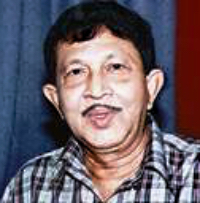 Sinhala songs based on South Indian tunes were born even before the chronicle of Sinhala Cinema began in this country. This tendency accelerated during the 1950 decade. But quite unexpectedly a Sinhala youth started singing love songs based on Western tunes during this period. One such song became so popular that even today youths tend to whisper it in the ears of their estranged girlfriends. This song is 'Sudo Poddak Andanna' - Harima Asayi Balanna,' 'Oya lassana Andana witadee' - Kandulu Binduwak Helanna' penned by Cyril A. Seelawimala and comprised by Patrick Denipitiya - based on the tune of Harry Bella Fontae's western song "sad to say I am on my way - I won't be back for many a day. The young man who sang this perennial favourite is none other than Maurice Dahanayake, a singer who had remained very popular among generations of music fans. Maurice Dahanayake was born in Colombo on December 11, 1932. His parents were Samson Dahanayake of Galle a popular artiste of Tower Hall fame and Mrs. Sakuntala Karunaratne Weeraman. The eldest in a family of five Maurice was drawn towards the arts in the footsteps of his father. Ranjith Dahanayake, journalist who played a minor role as a horse rider in the film 'Sandesaya' is one of Maurice's brothers while Bharata Natyam idol Padmini Dahanayake who played the role of Florida Jayalath's childhood in 'Sada Sulang' is one of his sisters. Maurice's father Samson who accompanied Padmini to India to study Bharata Natyam had the opportunity of acting in several Sinhala films during his stay in India. Maurice had his primary education at Musaeus College, Colombo. Later he entered Aloysius College, Galle when his father migrated to Galle with his family to start a business. Very soon the Dahanayake family shifted residence to Dematagoda, Colombo and Maurice was admitted to Ananda College, Colombo.
Sinhala songs based on South Indian tunes were born even before the chronicle of Sinhala Cinema began in this country. This tendency accelerated during the 1950 decade. But quite unexpectedly a Sinhala youth started singing love songs based on Western tunes during this period. One such song became so popular that even today youths tend to whisper it in the ears of their estranged girlfriends. This song is 'Sudo Poddak Andanna' - Harima Asayi Balanna,' 'Oya lassana Andana witadee' - Kandulu Binduwak Helanna' penned by Cyril A. Seelawimala and comprised by Patrick Denipitiya - based on the tune of Harry Bella Fontae's western song "sad to say I am on my way - I won't be back for many a day. The young man who sang this perennial favourite is none other than Maurice Dahanayake, a singer who had remained very popular among generations of music fans. Maurice Dahanayake was born in Colombo on December 11, 1932. His parents were Samson Dahanayake of Galle a popular artiste of Tower Hall fame and Mrs. Sakuntala Karunaratne Weeraman. The eldest in a family of five Maurice was drawn towards the arts in the footsteps of his father. Ranjith Dahanayake, journalist who played a minor role as a horse rider in the film 'Sandesaya' is one of Maurice's brothers while Bharata Natyam idol Padmini Dahanayake who played the role of Florida Jayalath's childhood in 'Sada Sulang' is one of his sisters. Maurice's father Samson who accompanied Padmini to India to study Bharata Natyam had the opportunity of acting in several Sinhala films during his stay in India. Maurice had his primary education at Musaeus College, Colombo. Later he entered Aloysius College, Galle when his father migrated to Galle with his family to start a business. Very soon the Dahanayake family shifted residence to Dematagoda, Colombo and Maurice was admitted to Ananda College, Colombo.
It is no exaggeration to say that it was Ananda College which enabled Maurice to sharpen his talents as a vocalist by providing many musical opportunities to him. During his school days itself Maurice got an opportunity to feature in an amateur, radio musical program sponsored by 'Brussels Coffee'. This program was recorded at the Parakrama Cinema, Narahenpita. The producer of this program was late radio personality Thevis Guruge. Maurice rubbed shoulders with vocalists R. Sivanandan, H. R. Jothipala and Christie Leonard Perera during this program. The comperes were Laddy Ranasinghe and Eddie Yapa. While at Ananda, Maurice befriended Susil Premaratne, a student of St. John's vidyalaya and Upali Attanayake and Sydney Attygalle, students of St. Joseph's Vidyalaya. Susil was the eldest and was already a radio artiste. At this time Maurice got an opportunity to take part in Susil Premaratne's light songs programs as a supporting vocalist. Maurice studied music at the feet of Suriya Shankar Molligoda, a music teacher at Ananda and later from R. A. Chandrasena and Shelton Premaratne. Maurice was a mischievous boy who neglected studies to devote his time to outside activities and this behaviour on his part prompted principal Dr. P. de S. Kularatne to expel him from Ananda. Samson Dahanayake who wanted Maurice to have a sound education admitted him to St. Patrick's College Jaffna to separate him from his fastidious friends in Colombo. But that too did not last long. Maurice was again admitted to Wesley College, Colombo where he passed his senior school certificate. At this time a song sung by Maurice was recorded at Radio Ceylon. The song was Ridi Chandaniye' penned by Upali Attanayake to a Hindi Tune. Prof. Pandit Ratna Jankar of India arrived here in 1947 to grade Radio Ceylon Vocalists - Among the four vocalists who passed his test was Maurice. The other three were R. Sivanandan, Indrani Wijebandara and Seetha Nanayakkara. Thereafter there were 12 grading tests at Radio Ceylon and Maurice stood for each one of them.
In 1954 Maurice joined the Free Lanka Insurance Company of Sir Cyril de Zoysa as a Grade 2 clerk. When Free Lanka Insurance became Sri Lanka Insurance Corporation Maurice had rose up to be an executive officer. At the time he retired from the Sri Lanka Insurance Corporation in 1992 he was serving as Publicity officer and Co-ordinating Officer to the Chairman and Board of Directors. Maurice is an acting member of the music group that meets at a residence in Maradana for music sessions which was called the music room. This room situated in a flat opposite the town hall belonged to Cyril A. Seelawimala who served in the 'Chalana Chitra" film magazine. It was a popular rendezvous of vocalists such as H. R. Jothipala, Freddie Silva, Christopher Paul, Lal Heenatigala, R. Sivanandan and Sisira Senaratne. They came here either to get some lyrics written by Seelawimala or to stay the night after returning from a late night musical show. Maurice befriended Anula Manel Athukorale, subsequent beauty queen of Wayamba in 1963, at a musical show in Kandy in 1958. They married in 1965 and bore two sons Channa and Sanjeewa. Channa the third generation Dahanayake also became a film artiste by playing Sanath Gunatilleke's childhood in the film Ganga Addara'. During a musical show in Kandy in 1963 Maurice happened to meet Simon Marawanagoda, a film producer.
The following day Maurice came to Colombo and Director Sudas Maskorale visited him to invite him to play the role of a Police Inspector in the film Para Valalu (1969). M. S. Anandan introduced H. R. Jothipala as a lead actor in his film 'Athulweema Thahanam' in 1966. He next introduced Maurice Dahanayake for the main role in 'Pravesamvanna' in 1969. In Pravesamvanna Maurice played the role of villain. However 'Pravesamwanna' was released earlier than 'Para Valalu'. Thereafter Maurice got breaks in a host of films including Adare Hithenava Dekkama (1972), 'Hondama Velawa' (1973), Lassana Kella (1975), Unnath Dahai Malath Dahai (1976), 'Hithuvakkarayo' (1977), 'Savdam Jema' (1979), 'Onna Mame Kella Penapi' (1976) and Colompur (1999). In Adare Hithenava Dekkama Maurice played the playback for Vijaya Kumaratunga's song 'Muthu Vitak Piri Eththe nam'. Joining the drama scene in 1954 Maurice contributed playback singing for 'Maru Vela'. His first play back song was the duet Re Bowee Eyi - Bowee Eyi - Wedapala Ivarayi- with Haroon Lanthra. Maurice who revelled in singing calypso type songs later began singing solo compositions. Among his solo creations were Meth Mal Pibidewa, "Me ahanna me balanna and See Pada Vannam which became very popular. He entered the teledrama field by playing a role in 'Numba Nadan Senehelatha'. He has also sung songs for Television. Maurice who enjoys a very wide fan mail has always fought for the rights of artistes and vocalists. He was founder vice President of the Sri Lanka Publishers Company and a member of the Public Performances Board for two years. Maurice who still remain an artiste has always come forward to help and assist less fortunate artistes of yore. He has also rewarded two songs for the HMV label and six songs for the Philips label, a major achievement for any contemporary vocalist of that period.
Links to further reading
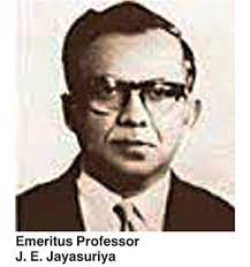 February 14, 2001 marked the 83rd birth anniversary of the late Prof. J. E. Jayasuriya, Sri Lanka’s educationist of the 20th century. Those who had the good fortune to be his students, colleagues, fellow-workers and friends, as well as others who did not know him personally but value the outstanding contribution made by him to education in this country, gathered at the Sri Lanka Foundation Institute to listen to the Annual Memorial Lecture given in his honour, by Prof. Chandra Gunawardene, Professor of Education in the Open University. Being the son of a public servant in a transferable service, young John Ernest Jayasuriya had his early education in a number of schools in different parts of the country. This would, no doubt, have been a learning experience in itself for the educationist in the making. Among the schools that he attended were Anuruddha Vidyalaya, Nawalapitiya; Dharmasoka College, Ambalangoda and Wesley College, Colombo. He always excelled in his studies, and was placed second in the island in order of merit at the Cambridge Senior Examination in 1933. At the Ceylon University College, he was a brilliant student of mathematics, and graduated with first class honours in 1939. During these formative years, JEJ laid the foundation for a life of excellence, commitment and service, in which he was able to leave his mark for posterity to remember in whatever assignment he undertook and whatever responsibility he was entrusted with. At the very young age of 21 years, he became founder principal of Dharmapala Vidyalaya, Pannipitiya. A few years later, JEJ had the honour of being hand-picked by the then Minister of Education, Mr. C. W. W. Kannangara, to be the principal of Matugama Central School in the Minister’s own electorate.
February 14, 2001 marked the 83rd birth anniversary of the late Prof. J. E. Jayasuriya, Sri Lanka’s educationist of the 20th century. Those who had the good fortune to be his students, colleagues, fellow-workers and friends, as well as others who did not know him personally but value the outstanding contribution made by him to education in this country, gathered at the Sri Lanka Foundation Institute to listen to the Annual Memorial Lecture given in his honour, by Prof. Chandra Gunawardene, Professor of Education in the Open University. Being the son of a public servant in a transferable service, young John Ernest Jayasuriya had his early education in a number of schools in different parts of the country. This would, no doubt, have been a learning experience in itself for the educationist in the making. Among the schools that he attended were Anuruddha Vidyalaya, Nawalapitiya; Dharmasoka College, Ambalangoda and Wesley College, Colombo. He always excelled in his studies, and was placed second in the island in order of merit at the Cambridge Senior Examination in 1933. At the Ceylon University College, he was a brilliant student of mathematics, and graduated with first class honours in 1939. During these formative years, JEJ laid the foundation for a life of excellence, commitment and service, in which he was able to leave his mark for posterity to remember in whatever assignment he undertook and whatever responsibility he was entrusted with. At the very young age of 21 years, he became founder principal of Dharmapala Vidyalaya, Pannipitiya. A few years later, JEJ had the honour of being hand-picked by the then Minister of Education, Mr. C. W. W. Kannangara, to be the principal of Matugama Central School in the Minister’s own electorate.
Central Schools were the pet project of Mr. Kannangara, and he would have none but the best as principals of these schools. Being selected to head Matugama Central was indeed a recognition of both his abilities and potential. In 1949, JEJ was appointed lecturer in mathematics at the Government Training College, and soon came to be known as an outstanding mathematics teacher. While at the Training College, he won a scholarship to do his post-graduate studies at the Institute of Education, University of London, which enabled him to obtain the M.A. degree in education. In the years that followed, he became a household name with the triple series of textbooks he wrote for teaching mathematics in Sinhala, namely, Ganitha Navodaya, Sighra Jyamithiya and Veeja Ganithaya. These have been widely acknowledged as by far the best books written in Sinhala for the teaching of mathematics in schools. It was unfortunate that these were allowed to be swept away by the tidal wave of New Mathematics which engulfed us in later years. Mr. Jayasuriya joined the Department of Education of the University of Ceylon in 1952 as a lecturer and, in 1957, succeeded Prof. T. L. Green as Professor of Education. He held this position with great distinction until 1971.
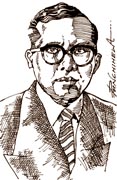 It is well known that under his stewardship, and due largely to his vision and initiative, the Department which was then located at the Peradeniya campus became a centre of excellence, and a nurturing ground for many of Sri Lanka’s leading educationists. It remained for a long time the only centre in the island where graduate teachers were professionally trained, and advanced studies and research in education undertaken. With characteristic courage and foresight, Prof. Jayasuriya introduced the Bachelor of Education course in 1965, it has been said, "in an atmosphere of opposition from within the University and apathy from outside the University". It was Prof. Jayasuriya who made education a subject of serious study and research in this country, and enabled it to gain recognition as a discipline with an identity of its own. Although he returned to the island with the M.A. degree in education from the University of London foregoing the opportunity of proceeding to a Ph.D., due to his sense of service and commitments back home, his research output in education remains unparalleled to this day. It is in the fitness of things, therefore, that the University of Colombo conferred on him the degree of Doctor of Letters (honoris causa) in 1982, and the Open University conferred on him the degree of Doctor of Science (honoris causa) in 1987. Prof. Jayasuriya’s contribution to education was not confined to the four walls of the academia. He came into wider national focus when, in March 1961, he was made Chairman of the National Education Commission appointed by government to make a comprehensive review of the country’s education system and propose necessary changes. This was the first time such a review was undertaken since the Special Committee on Education did so in the early 1940s during the period of the Donoughmore Constitution, under the chairmanship of Mr. C. W. W. Kannangara, the Minister of Education. Among the members of the Jayasuriya Commission was Mr. Kannangara himself, which reflects in no small measure the respect and recognition which Prof. Jayasuriya, yet in his early forties, had earned by that time as the country’s leading educationist. The Jayasuriya Commission issued an Interim Report in October 1961, and its final report in July 1962.
It is well known that under his stewardship, and due largely to his vision and initiative, the Department which was then located at the Peradeniya campus became a centre of excellence, and a nurturing ground for many of Sri Lanka’s leading educationists. It remained for a long time the only centre in the island where graduate teachers were professionally trained, and advanced studies and research in education undertaken. With characteristic courage and foresight, Prof. Jayasuriya introduced the Bachelor of Education course in 1965, it has been said, "in an atmosphere of opposition from within the University and apathy from outside the University". It was Prof. Jayasuriya who made education a subject of serious study and research in this country, and enabled it to gain recognition as a discipline with an identity of its own. Although he returned to the island with the M.A. degree in education from the University of London foregoing the opportunity of proceeding to a Ph.D., due to his sense of service and commitments back home, his research output in education remains unparalleled to this day. It is in the fitness of things, therefore, that the University of Colombo conferred on him the degree of Doctor of Letters (honoris causa) in 1982, and the Open University conferred on him the degree of Doctor of Science (honoris causa) in 1987. Prof. Jayasuriya’s contribution to education was not confined to the four walls of the academia. He came into wider national focus when, in March 1961, he was made Chairman of the National Education Commission appointed by government to make a comprehensive review of the country’s education system and propose necessary changes. This was the first time such a review was undertaken since the Special Committee on Education did so in the early 1940s during the period of the Donoughmore Constitution, under the chairmanship of Mr. C. W. W. Kannangara, the Minister of Education. Among the members of the Jayasuriya Commission was Mr. Kannangara himself, which reflects in no small measure the respect and recognition which Prof. Jayasuriya, yet in his early forties, had earned by that time as the country’s leading educationist. The Jayasuriya Commission issued an Interim Report in October 1961, and its final report in July 1962.
When Prof. Jayasuriya found that the government’s White Paper, entitled Proposals for a National System of Education issued in February 1964, had made substantial departures from the Commission’s recommendations on what he considered to be vital and crucial issues, he went public with a penetrating analysis (running into 80 printed pages) of the government’s proposals. He concluded his incisive examination of the White Paper proposals with the following words: "It was the purpose of this analysis to examine the implications of the proposals for education in the White Paper, especially the implications that are hidden under a sugar-coating of facile phraseology, .....and to focus attention on the limitations of the proposals from the point of view of planning a rational system of education that would on the one hand bring a good education within the reach of every child, irrespective of the economic condition or social status of his parents, and on the other hand gear education to the economic needs of the country. One of the most disquieting features of the White Paper is that by and large it stands for the maintenance of the status quo, with the minimum of disturbance to the interests of the well-to-do parent. No other explanation is possible of the way in which some of the N.E.C. proposals.... have been rejected or rendered ineffectual." (Some Issues in Ceylon Education, J. E. Jayasuriya, 1964) Such was the forthrightness and the sturdy independence of the man! Although mild-mannered and soft spoken as a person, he was always unrelenting in the pursuit of his convictions. He was never an ‘yes man’ and fought for what he believed in. With him, no sacrifice of a principle was possible for positions of personal glory and power. Prof. Jayasuriya always spoke up for the teaching profession, and was a doughty fighter for academic freedom. In a pamphlet entitled Some Comments on the Education Bill (Nov. 1967), he wrote: "In the Bill, the teaching service, which plays such a key-role in education, is disposed of in a single sentence. This reflects the present attitude of the bureaucracy towards teachers. The teacher has been reduced to a tape recorder.
A few individuals, distinguished not by their contribution to educational thinking but by their subservience to bureaucracy, sit down in their offices and write down what one lakh of teachers in the schools should say and do.... A free nation cannot grow up if teachers are bound hand and foot by chains, and their mouths muffled. When will Parliament realise this, irrespective of party politics, and restore to the teacher the priceless possession of academic freedom?" Having left the service of the University, Prof. Jayasuriya worked for the Unesco Regional Office in Bangkok from 1971, as the Regional Adviser on Population Education for a period of five years and thereafter as Consultant. He was highly respected both in Unesco circles and in countries of the Asia Pacific region for the outstanding contribution he made for popularizing population education. The work he did in this field was truly of a pioneering nature. In delivering the Second JEJ Memorial Lecture in 1992, Dr. Ansar Ali Khan of Unesco referred to Prof. Jayasuriya deservedly as "the father of Population Education in the Asian region".
Prof. Jayasuriya’s publications are far too numerous to mention here, and a full list appears in the J. E. Jayasuriya bibliography published by the National Institute of Education in 1992. Educational Policies and Progress during British Rule in Ceylon (Sri Lanka) 1796-1948 running into 558 pages and Education in Ceylon before and after Independence (1939-1968) running into 218 pages remain to this day the most authoritative works on Sri Lanka’s education in the periods they cover. Three works which deserve special mention here are Education in Korea - a Third World Success Story, Dynamics of Nation - building in Malaysia, and Education in the Third World - Some Reflections. In mid 1982, after his return to Sri Lanka from Bangkok, Prof. Jayasuriya accepted my invitation to take up a consultancy in the Unesco-managed Project for Quality Improvement of General Education, at its very inception. He did so as a labour of love having resolved that his entire remuneration shall go for charity. He made an invaluable contribution, helping the project to chart out the directions in which it should proceed.
We visited schools together as part of the study he undertook to evaluate how technical subjects were taught in schools at the time. His insights into education and the guidance so readily forthcoming from him were of great value to us, and we drew heavily from the wealth of experience he possessed. The new subject of life skills that the project was instrumental in introducing to schools on a pilot basis, and was later introduced to the entire school system by the Ministry of Education, owed a lot to him. His residence in Mt. Lavinia was ‘open house’ for brain storming sessions we used to have on week-ends and public holidays. His razor-like wit, his composure even when he intensely disagreed, his sense of humour and even his sarcasm, together with the generous hospitality of the Jayasuriyas, make the memory of these meetings linger on to this day. The close personal friendship which I was able to develop with Prof. Jayasuriya during this period lasted until his death. He gifted me autographed copies of a number of his publications, which were no longer available in bookshops, and these happen to be some of my most valued possessions. We used to visit each other regularly, and discuss issues and problems in education most of the time. His constant lament was that despite Commissions, Committees and White Papers, and a proliferation of agencies and institutions for the development of education in the country, we had basically stagnated while other countries in the region had made great headway. Prof. Jayasuriya was never afraid to call a spade anything but a spade. Just as much as he was a great builder and innovator, he was a vehement critic when the occasion demanded. He was the model professional who saw the need for professionals to hold their own, and not become handmaids of the powers that be. More and more men and women of his calibre, integrity and independence are sorely needed in this country today. From wherever he is in his journey through ‘sansara’, may he continue to inspire us and give us strength!
A restless crusader for peace By Ransiri J. Fernando
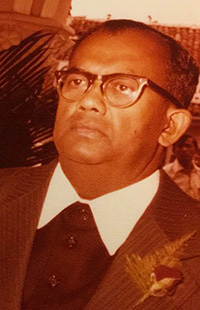 To all christians and Methodists in particular Rev. Christie Rosa is synonymous with great preaching, unstinted devotion, and unbending loyalty to the Master. It was Francis Bacon who wrote that ``Reading maketh a full man; Conference a ready man; and preaching an exact man.'' This fact is very clearly illustrated in the life of Rev. Christie Rosa, who passes another milestone in his ministry. For 50 long years he has illuminated the lives of thousands of men and women by his exemplary life, prophetic advice and unparalleled preaching. He is a fiery orator in English and Sinhala and has the ability to capture crowds with his eloquence. Rev. Christie Rosa is an overseer, a dedicated pastor and a good shepherd. His simplicity, humility, commitment and the sense of humour endeared him to the hearts of many. His faith in Jesus Christ and his confidence in God were always evident to all who associated with him. Born to a Methodist family on December 5, 1922 he had his primary education at Newstead College, Negombo and secondary education at Wesley College from 1935 - 1942. After successfully completing the London Matriculation he graduated from the Theological College in Bangalore obtaining a second class degree. After completion of theological education he was appointed to Colombo City Mission as a Junior Minister to Rev. John Wright, within a short period of time he was transferred to Kingswood College, Kandy as the chaplain. Here he worked with young children and was able to give a patient hearing and solve many a problem. He identified himself with the young people not only as an accomplished educationalist but also as a firm believer in students rights for freedom and responsibility. Rev. Rosa obtained a Masters Degree in Sociology at the Union Theological Seminary in New York which is also the Theological faculty of the Colombian University. Rev. Christie Rosa claims that his second call for service came during his term of office at Maradana under Rev. Robert Nelson. A person who was a national in his outlook, international in his enterprise.
To all christians and Methodists in particular Rev. Christie Rosa is synonymous with great preaching, unstinted devotion, and unbending loyalty to the Master. It was Francis Bacon who wrote that ``Reading maketh a full man; Conference a ready man; and preaching an exact man.'' This fact is very clearly illustrated in the life of Rev. Christie Rosa, who passes another milestone in his ministry. For 50 long years he has illuminated the lives of thousands of men and women by his exemplary life, prophetic advice and unparalleled preaching. He is a fiery orator in English and Sinhala and has the ability to capture crowds with his eloquence. Rev. Christie Rosa is an overseer, a dedicated pastor and a good shepherd. His simplicity, humility, commitment and the sense of humour endeared him to the hearts of many. His faith in Jesus Christ and his confidence in God were always evident to all who associated with him. Born to a Methodist family on December 5, 1922 he had his primary education at Newstead College, Negombo and secondary education at Wesley College from 1935 - 1942. After successfully completing the London Matriculation he graduated from the Theological College in Bangalore obtaining a second class degree. After completion of theological education he was appointed to Colombo City Mission as a Junior Minister to Rev. John Wright, within a short period of time he was transferred to Kingswood College, Kandy as the chaplain. Here he worked with young children and was able to give a patient hearing and solve many a problem. He identified himself with the young people not only as an accomplished educationalist but also as a firm believer in students rights for freedom and responsibility. Rev. Rosa obtained a Masters Degree in Sociology at the Union Theological Seminary in New York which is also the Theological faculty of the Colombian University. Rev. Christie Rosa claims that his second call for service came during his term of office at Maradana under Rev. Robert Nelson. A person who was a national in his outlook, international in his enterprise.
Even his internationalism did not limit him because his interests were cosmic spread beyond any human limitation. From 1958 - 1963 Rev. Rosa served at Katunayake and he became a prophet acclaimed in his own city. Versatility and firmness was his forte and Katunayake church grew to great heights during his stay. In all issues he was firm, independent and self reliant. From 1963 - 1968 he served at Badulla, Bandarawela and Haputale and was responsible for reconstructing the Badulla Methodist church and starting the Welimada Youth Centre with the assistance of the YMCA. This serves as a Community Centre to a large number of people. His Three year stay at Moratumulla was described by people as ``Life wedded to his Church.'' The sermons he preached from the Moratumulla Church pulpit on complex Theological problems are still remembered, for their truth and encouragement. In 1969 Rev Rosa was the Methodist Church representative at the British conference. He addressed a large community at Aston University, Birmingham and Lincoln Oxford. From 1974 his life was fully involved with finding ways and means of reducing racism, disarmament, poverty alleviation and finding a place for the oppressed. He opposed people and nations being dominated by super powers thus becoming exploited economically segregated and humiliated. His address to the Peace Seminar on the question of ``Disarmament in Czechoslovakia, ``Christian struggle against misery at the Soviet Union'' are still remembered by those who were fortunate to listen to them. Rev. Rosa's mission was that the Church which is the body of the Christ should not align itself with the privileged classes and so defend the status quo that it has been unwilling to answer the call of the ordinary man.
He reminded that the church is not the master or the servant of the state but rather the conscience of the state. It must be the guide and the critic of the state and never its tool. If the church does not recapture its mission, it will become an irrelevant social club without moral or spiritual authority. The pinnacle of Rev. Christie Rosa's career was in 1976 when he was appointed as secretary general of the International Peace Conference, a highly prestigious and internationally recognised appointment. He led the delegation to the Socialist Republic of Vietnam and exposed to the world the reasons for the Vietnamese victory and the amount of misery, torture and destruction by the Americans. The Vietnamese were united in purpose and in goal and that was the secret of their success. Rev. Rosa's contribution to give a better international understanding to the North Korean and South Korean conflict has to be remembered. On June 8, 1989 Rev. Rosa obtained the Doctor of Theology award from the Charles University of prague which is the oldest university in Europe. It was bestowed upon him in recognizing the unstinted services to the cause of world peace, understanding, harmony and the welfare of the people. He was out spoken in his strong condemnation of false interpretations of peace. He strongly believed that peace is not passivity; peace is not escapism; That peace is not the absence of war and that peace is not the fruit of deterrence. The penetrating lucid felicity of his words used in his sermons left an indelible impression in the hearts of the people. Truly there is something about him that makes him stand out from the rest. It is not only his large size but also there is a certain air about him that makes an impression of importance. We wish him long life and thank God for this methodical, dedicated and dynamic pastor.
Links to further reading
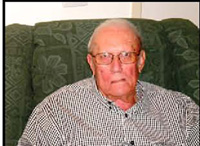 Norman was enrolled as a student of Wesley College Colombo in 1935… He received his entire education at Wesley and was privileged to be a pupil under the Principalship fo the Reverends Dalby, Izzet, Holden, Cartman and Mr C J Oorloff. Norman proudly claims that he is a “born and bred” Wesleyite”.
Norman was enrolled as a student of Wesley College Colombo in 1935… He received his entire education at Wesley and was privileged to be a pupil under the Principalship fo the Reverends Dalby, Izzet, Holden, Cartman and Mr C J Oorloff. Norman proudly claims that he is a “born and bred” Wesleyite”.
Norman was an outstanding sportman. He excelled in cricket and athletics, also played hockey, tennis and was a promising boxer. As a cricketer (1946-48), Norman will be remembered as a fiery opening pace bowler., arguably the fastest schoolboy pace bowler in 1948. He was a member of Harold Matthysz champion team of 1948 and vividly remembers our big match against the powerful Royal College side. Norman took (4/40) and N S Jayasundera (3/32) to dismiss The Royal College side for a mere 136 runs. Wesley replied with 172, this match remembered for the magnificent 119 runs by Harold. In the second innings Norman was unwell and Wesley deprived of their key strike bowler, resulted in Royal winning this match by 36 runs.
 Norman continued playing club cricket for the Colts CC and CCA.
Norman continued playing club cricket for the Colts CC and CCA.
Norman’s outstanding contribution to Wesley College sport was in the field of Athletics. He was a member of the great Wesley athletic team that included Mohammed Sheriff (Hop-Step & Long Jump) Harold Matthysz Pole Vault / Javelin) Trevor Van Rooyen (Hurdles) and Ian Campbell (High Jump).
At the Public Schools Meet 1948, Wesley just missed out winning the Tarbat Challenge Cup. Our 4 x 400 Relay team was disqualified for dropping the baton in the final leg of this event. Norman was placed first in the High Jump and Putt Shot events at this meet.
 Norman won the Wilton Bartlett Challenge Cup for the outstanding performance in the AAA meet of 1951/52 and later that year also won the prestigious G K Thornhill and C C Dissanayake trophies as the outstanding athlete of the Government Service Athletic Meet. He was selected to represent Ceylon at the Asian Games in 1953, at New Delhi in the high jump event..
Norman won the Wilton Bartlett Challenge Cup for the outstanding performance in the AAA meet of 1951/52 and later that year also won the prestigious G K Thornhill and C C Dissanayake trophies as the outstanding athlete of the Government Service Athletic Meet. He was selected to represent Ceylon at the Asian Games in 1953, at New Delhi in the high jump event..
Representing Wesley at the Stubbs Shield Boxing meet in 1947 – Norman was awarded the best loser’s trophy in the heavy weight division, it was quite a remarkable achievement, as Wesley did not regularly participate in boxing. This was his one and only appearance in the ring, the pasting he received that day convinced him that athletics and cricket were his preferred options.
Norman alludes to the great sporting spirit that existed between St Joseph’s College and Wesley. He remembers the moment when Lucian Dep of St Joseph’s College, Colombo, who had completed his regulation jump in the Pole vault event and realising that Harold could not complete his final jump, as his vaulting pole had snapped, offered his pole in an unselfish sporting gesture – HAROLD WON THIS EVENT. At the same Public School’s meet, Norman who had trouble with his “spikes” accepted Shirley Perera’s offer, also a Josephian, to jump in his “spikes” resulting in Norman winning the high jump event. Sportsmanship of this order is sadly seldom seen these days.
Norman immigrated to Australia in 1958 .. He lives a full life, plays golf off an enviable handicap, and enjoys the activities of the WCC OBU. He is closely associated with the ACF, the Burgher Association and the Ceylon Masons.
Above all Norman is a true son of Wesley, loyal and proud of his Alma mater, a man of grit and Industry
From the Wesley Times November 2010
Former Melbournian, Norman de la Harpe visited Melbourne for a couple weeks holiday to meet up with friends and family, Now a resident of Queensland. it was sometime since Norman has visited. At a dinner party hosted in his honour by Rod de Kretser, for a few Wesleyites – George Robertson, Glenn Reimers, Trevor Collette and Keith de Kretser old friends caught up for a chat and reminisced. Norman in his inimitable style kept the ladies and gentlemen entertained with stories of his exploits at Wesley and life. It was good to catch up with Norman who was a regular at all the OBUA events.
Links to further reading
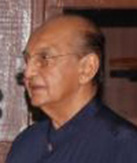 |
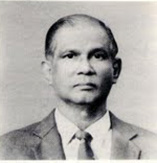 |
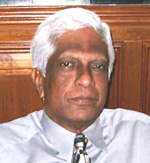 |
| Mahroof Ismail | Denzil Perera | LR Goonetilleke |
Friday the 3rd of December 1999, will not be just another day in the life of the 'Old Wesleyites Sports Club' (OWSC). For to be more specific, the evening of that day is bound to be special, and one among other significant milestones in the life of the OWSC where members of the Club, well wishers and friends, with a sense of belonging and pride, will gather to felicitate three outstanding (club revival) past presidents in Prof; Mahroof Ismail, Denzil Perera and Lucky Goonetilleke.
The deep commitment of these past presidents and the measure of their giving in the wider sense, could only be appreciated. - When one begins to realise, that the club which was dormant and eventually defunct for eleven years (1978-1989), was virtually resuscitated in 1989, mainly through the unflagging zeal and fervour of these three presidents. Mahroof, Denzil and Lucky each of them during their respective presidency's along with their accredited committees, spanning a decade (1989-1998), strove successfully in those crucial formative revival years to give the club, tone and direction, a distinctive character of its own and more importantly the much needed financial stability. The club, which is now well established with the base and foundation so laid for sustained progress, is fortunate to have as its current president, the highly enthusiastic and versatile Capt: Navin de Silva to steer it through into the next millennium.
It's against this background and in recognition of the pioneering service rendered by Prof: Mahroof Ismail, Denzil Perera and Lucky Gunetilleke, endearingly referred to as the revival presidents -That the club in oneness of spirit amidst much fellowship will unveil their respective portraits. Truly a fitting gesture of "Honour to whom honour is due, Thanks to whom thanks is due." Mahroof who was the first of the club revival presidents (1989-1993) was an accomplished all round student and the senior head prefect at Wesley.
He had a penchant for winning prizes and carried away many of them at the college annual prize giving, inclusive of the prestigious 'Hill Medal' on two successive occasions in 1948 & 1949. As a keen sportsman, he captained the college at hockey and badminton and went on to lead the Ceylon university in both sports. His contribution to hockey was recognised, when he was at one time made the president of the state services hockey association and vice president of the Ceylon hockey association.
The early promise of eminence at college, was seen when he progressed to be the Director of the Medical Research Institute and later to be the Dean of the Faculty of Medicine in the University of Colombo.
Denzil who took over from Mahroof in 1994 was president till 1995. It was during his tenure, that the club developed from the railway carriage stage to have a sophisticated sports complex and a modern club house. As a meticulous student and sportsman he displayed leadership qualities and organising ability at a very early age. He captained the college hockey team and represented Ceylon and travelled abroad as a member of the mercantile hockey team. Denzil is the proprietor of 'Qualipacks' (Pvt) Ltd and had done much in the raising of funds, especially by organising the popular annual dance, not forgetting his touching gesture of the assistance given in the cause of the billiard room.
Lucky who succeeded Denzil in 1996, was the third of the revival presidents and served up to the end of 1998. Being lanky and lithesome, he had the natural aptitude for being a classy left arm pace bowler. He had an outstanding career at Wesley, as a student and a rare bowler, who won many an award with a hat-trick or two to his credit. He made the right kind of impression, to be among the wickets at the NCC and was picked to represent Ceylon. The beauty of a ball with which he bowled the English Captain, Ted Dexter is still spoken of. His administrative ability as a planter and former Director of Whittal Boustead and Gordon Frazer, was in evidence during his three year period as president. He will, amongst others, be remembered for getting down school teams from the north and east to participate in the schools'- 6-a-side cricket tournament and, for providing crutches and artificial limbs to wounded soldiers. Lucky at present is the Director of Link Engineering.
The 'Old Wesleyites Sports Club' came into being in 1941, mainly out of a growing passion for hockey, which existed within the old Wesleyites of that era. A common bond amongst players and enthusiasts had been established throught this sport. And it became necessary on leaving college, to further strengthen this and give continuity to it, which resulted in the OWSC being born. History records that in the early fifties, members of the OWSC played a prominent role in the promotion and furtherance of hockey in the country. Hockey teams of the OWSC participated in the Pioneer Shield, Andriesz Shield and Bacon Cup tournaments, with a measure of success, being champions on more than one occasion. The club in those years, was preoccupied with hockey, it failed to broaden out to other areas, and was greatly disadvantaged by the lack of a meeting place, a club house. Naturally then the club had a chequered existence, with more downs than ups and long spells of inactivity, to be finally defunct from 1978 to 1989. Heartening it is to observe, that in the last ten years, the club under the three revival presidents, has recorded unprecedented growth of a sustaining nature, which augurs well for the future. This was made possible by the high powered, ambitious projects which brought in the necessary funds for the club to forge ahead, and as well support the college in its endeavours.
Chief among which, was the pioneering ventures such as the schools' six-a-side cricket tournament under the chairmanship of Eric Gauder, and the schools 7-a-side hockey tournament managed by Rohan Amerasinghe. The former is being sponsored by the Ceylon Cold Stores Ltd., whilst the latter is sponsored by Janashakthi.
The chief guest at the evening's function on December 3rd, will be the illustrious old boy of Wesley Rienzie Wijetilleke, the managing Director of Hatton National Bank and currently president of the Interim Cricket Board.
Rienzie has been very supportive of both the college and club in many ways, and will do the honours of unveiling the portraits of the three revival presidents, and a panel depicting the names of past presidents of the club. The guests of honour will be two distinguished old boys, Richard Ebell and L.C.R. Wijesinghe.
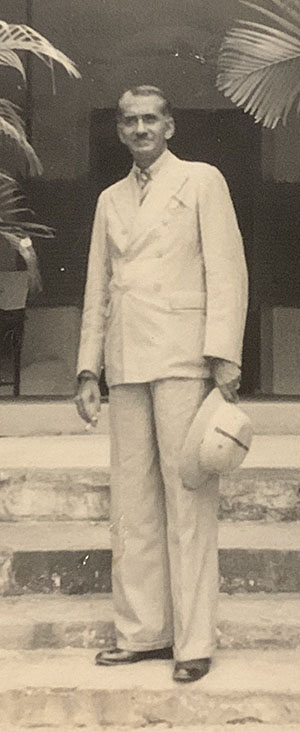 He was a student at Wesley during the Highfield era and rose to be the principal of Methodist Central College Batticaloa
He was a student at Wesley during the Highfield era and rose to be the principal of Methodist Central College Batticaloa
One of the teachers to whom this writer owes his prowess with the pen is now long dead. But, it is said that a man is not dead as long as there is someone who remembers him. How can I ever forget that tall, ramrod straight man who taught me English at the Methodist Central College, Batticaloa, when I was just a lad entering my teens. S. V. O. Somanader was his name. What those initials stood for I have never been able to find out, for he was always known as S. V. O. Somanader. When he wrote articles to the news papers, he always signed off as "S.V.O.S.", seldom using his surname. But everyone who read his articles knew who the writer was.S. V. O. Somanader could write on almost any subject you could name. And he could do so in just the time it took to write it. He had all that knowledge at his fingertips, so to speak.In class, he had little need to look into text books. He would teach us, often without looking at any book, so well had he prepared his lesson for the day. I wonder whether there is any teacher today who can do that - teach off the cuff. Often, at least once a month, he would take us pupils out of the classroom to places like Rugam, Unnichai and other places in the Batticaloa district. It was an outing with a purpose. For what we learned on these trips stood us in good stead in later life. They were lessons on a variety of subjects, not merely English Literature, Grammar and Composition. We studied on these outings about the fauna and flora of the land in which we lived. Somanader did not need text books for these lessons. He knew every bird, beast, reptile and whatever, their habits, almost their very language. He would spot some rare bird high up in a tree, show it to us and then tell us all about the bird, without ever referring to a book. He was invariably right, as I discovered shortly after I had bought Henry's Birds of Ceylon for my youngest daughter, several years later, when we lived on the borders of Udawattakelle in Kandy, and I found that she was a bird fancier.
When S. V. O. Somanader taught me English, how to speak and write it, he made it interesting, and gave meaning to the guidance he provided us with. One thing I remember very well is his teaching us how to write so that the reader would go on reading without getting bored. "Use simple language" he would say. "You will find that a book that is easy to read is a book that does not contain bomb blast."One day, when we had been studying the life of Dr. Samuel Johnson, way back in 1936, a bright lad in the class was heard to tell his neighbour, "You are a sublime mediocrity, intoxicated by the exuberance of your own verbosity."S. V. O. Somanader, who had very sharp ears as well as very good eyesight, heard this remark and had the boy who said it stand up in class."Puvinayagam," he said in a mild undertone, "Don't be a pedant. It doesn't become you." One of the other things I learned from S. V. O. Somanader was about how to write an essay. "When you end what you are writing, keep the reader on his toes." He would say. "Be like the scorpion. Have your sting in the tail. "
This advice about using simple language and keeping up interest in the story to the very end, is something I have tried to follow in my nearly fifty years in journalism, despite the efforts of some who have tried to tell me to "use big words, strong words to impress your readers than try to impress them. Perhaps this is the reason why my file of letters from readers of what I have written is such a voluminous one. William de Alwis, who together with Oscar Rajasooriya introduced me to journalism, has paid a tribute to S. V. O. Somanader after their first meeting, way back in 1978. On my last meeting with Oscar a few days ago, he gave me a letter he had received when he was in the Asian Service of Deutsch Welle, from H. M. H. Wijekoon, a government surveyor from Pannala. It enclosed a cutting of a short article William de Alwis had written of that first meeting. I don't think I can do better than quote from what Willie wrote: "We found ourselves high and dry one idyllic afternoon with nowhere to go and nothing to eat on the beach of Kalkudah. This was decades before the hotels got there and a colleague, Oscar Rajasooriya and I had brought a globe-trotting couple from Switzerland on a do-it-cheap scooter ride to this skin-diver's paradise.
"Until too late we have given little thought to food and lodging and the only sign of life was a lone figure in wind-whipped white robes standing at the pier a short distance away. "We were debating a quick ride to a wayside boutique for some buns and plantains for dinner when a friendly voice hailed us. It was our first introduction to Batticaloa's S. V. O. Somanader who had strolled up unnoticed. He gripped my arm: "Quick see there! You are lucky. That's also an illicit immigrant" S.V.O.S. was pointing to a little bird in the shrubs. We were not too interested in bird life at the time, however. He sensed this and was also quick to sense why. "Have you eaten?" "That was SVOS all over. "Love surpasseth all" he said with amusement pointing a fatherly finger at the young couple frolicking in the water quite oblivious to the desperate predicament Oscar and I had been discussing. "Come home. Come home now.""We went and found ourselves in the lap of Eastern hospitality at its best. A pleasant evening spent in the discussion of matters close to SVOS's heart - from the coastal veddahs to legendary finds of ambergris and from migrant birds from as far off as Siberia to fossilised crabs and singing fish."We spent five memorable days there. Old Mr. Somanader, as we called him, saw to it that we had a deserted house placed at our disposal with its caretaker looking after our needs. None in that quartet will ever forget him and I am sure we all still have the little keepsakes he distributed as parting gifts to each of us - a fragment of a fossilised crab for Dr. Peter Zurcher of Zurich, a cluster of peacock feathers for his wife Astrid, and a bird's feather each for Oscar and me - now treasured mementoes of a great educationist, a great father, a great and good man."
Is it any wonder then that I can never forget this "man who tanned the hide of us" as we sang in later years at Trinity ?
Well-known Naturalist, S. V. O. Somanader, conferred D. Lit by Eastern University
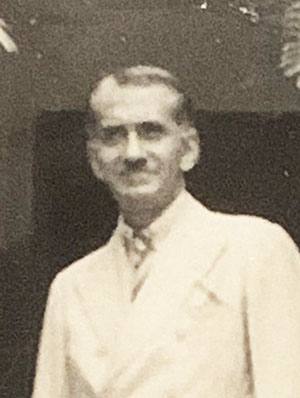 Samuel Victor Ousmund Somanader the famed naturalist was conferred the degree Doctor of Literature (Honoris Causa) posthumously at the recently held Convocation of the Eastern University, Batticaloa. He received this well-deserved honour for his immense contribution chiefly in the fields of education and the study of the fauna and flora and the folk culture of the Batticaloa district.
Samuel Victor Ousmund Somanader the famed naturalist was conferred the degree Doctor of Literature (Honoris Causa) posthumously at the recently held Convocation of the Eastern University, Batticaloa. He received this well-deserved honour for his immense contribution chiefly in the fields of education and the study of the fauna and flora and the folk culture of the Batticaloa district.
He was a well-known and respected, journalist, naturalist, photographer philatelist, a keen student of wide life especially the fauna and the flora of the jungles of the Eastern Province. He regularly wrote a feature titled "Nature Notes by Victor" to the "Times of Ceylon" for many years. He was an Honorary Member of the Wild Life and Nature Protection Society to whose journal "Loris" he contributed nature articles often. He was made a Fellow of the Zoological Society of London in recognition of his scientific study of the birds and animals of Eastern Province.
He contributed articles on these subjects to foreign newspapers and magazines too. He was also a Fellow of the Royal Geographical Society and the Royal Society of Teachers. Because of his knowledge and expertise many foreign and local naturalists consulted him on their visit to Batticaloa.
He was first Sri Lankan Principal of Methodist Central College, Batticaloa. During his tenure as Principal many improvements were made to the school. The school expanded in numbers and additional classrooms were built. Higher forms were commenced and the examination results improved. He retired after 12 years as Principal in 1954. He was made an Island wide Justice of the Peace (JP).
He was an old boy of Methodist Central College, Batticaloa and Wesley College, Colombo. At the Government Teachers' College, Colombo he became first in the Final diploma examination and won the Evans Teaching Prize in his first year.
C.P.Thamotheram was a student at Wesley during the Principalship of Rev. Henry Highfield
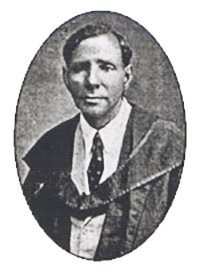 The year 1915 marked a turning point in the history of this School when C.P. Thamotheram was appointed Principal. He was a Graduate of the Madras University and during his period of 28 years, significant changes occurred. The School was named as Hartley College in 1916 when Rev. Marshall Hartley laid a foundation for a Chemistry Laboratory and six class rooms in his second visit to Point Pedro as Secretary in the Mission House for the East. The building was completed in 1917. He was the pioneer of this School because of his tireless efforts and dedicated service, the school was given a face lift. Mention should be made of the late A. Kandiah, who was one of the first Chemistry teachers who later ended up as a Professor of Chemistry at the University. During Thamotheram's tenure of office, he had capable assistants, who played a vital role for the development of the College. Notable contribution was made by W. A. Walton, who was a veteran in Shakespeare's Plays. He inspired the students to take an active part in Shakespeare's Plays. Within a short period after he had assumed office, the school began to grow day by day. With the widening of he curriculum and demands of the Education Department, it became necessary to spend more money. This placed the Management in financial difficulties. The Synod of 1920, after deliberations, decided to concentrate to Jaffna Central School. But after a long debate, thereafter, the Synod decided to continue Hartley College as a Secondary School on condition that it does not seek financial assistance from the Missionary Society. Mr. Thamotheram took up this challenge and dedicated himself to run the School without any assistance from the Missionary Society. As a result of his tireless efforts and ability, the hall was renovated and some more class rooms came to be constructed. It is worth mentioning the fact a piece of land was bought to be used as a playground. At this time, the Hostel too, was shifted to the land in front of the playground. It was only after this event that sports activities such as Football, Cricket, Athletics were encouraged systematically. Thus, Hartley College also began to demonstrate that it is not second to any of the leading schools in the peninsula.
The year 1915 marked a turning point in the history of this School when C.P. Thamotheram was appointed Principal. He was a Graduate of the Madras University and during his period of 28 years, significant changes occurred. The School was named as Hartley College in 1916 when Rev. Marshall Hartley laid a foundation for a Chemistry Laboratory and six class rooms in his second visit to Point Pedro as Secretary in the Mission House for the East. The building was completed in 1917. He was the pioneer of this School because of his tireless efforts and dedicated service, the school was given a face lift. Mention should be made of the late A. Kandiah, who was one of the first Chemistry teachers who later ended up as a Professor of Chemistry at the University. During Thamotheram's tenure of office, he had capable assistants, who played a vital role for the development of the College. Notable contribution was made by W. A. Walton, who was a veteran in Shakespeare's Plays. He inspired the students to take an active part in Shakespeare's Plays. Within a short period after he had assumed office, the school began to grow day by day. With the widening of he curriculum and demands of the Education Department, it became necessary to spend more money. This placed the Management in financial difficulties. The Synod of 1920, after deliberations, decided to concentrate to Jaffna Central School. But after a long debate, thereafter, the Synod decided to continue Hartley College as a Secondary School on condition that it does not seek financial assistance from the Missionary Society. Mr. Thamotheram took up this challenge and dedicated himself to run the School without any assistance from the Missionary Society. As a result of his tireless efforts and ability, the hall was renovated and some more class rooms came to be constructed. It is worth mentioning the fact a piece of land was bought to be used as a playground. At this time, the Hostel too, was shifted to the land in front of the playground. It was only after this event that sports activities such as Football, Cricket, Athletics were encouraged systematically. Thus, Hartley College also began to demonstrate that it is not second to any of the leading schools in the peninsula.
Hartley's results at the Cambridge Examinations were exceptionally good. Scholarships were won especially in Mathematics and Science both at then University College and abroad. Hartley College earned its recognition as a leading school during Mr. Thamotheram's tenure of office. Mr. Thamotheram could be properly described as an all-rounder. He was a versatile teacher, who could teach any subjects whether it be Mathematics, English Literature or English, History with enthusiasm. He had a personal knowledge of every student. After a long period of 28 years as Principal of Hartley College, he retired in 1943 at the age of 60 years and the number on roll at this period stood at over 500.
From Dr Nihal D Amerasekera
Mr CP Thamotheram's son Mr.CJT Thamotheram was a respected Mathematics teacher at Wesley College in the 1950's. He left Wesley in 1959 and proceeded to the UK in 1961 to teach at the Latymer School in London.
C.P Thamotheram by Mr. P. Balasingham from the Hartley College, Point Pedro website
In the long and inspiring history of Hartley College the period of Charles Ponniah Thamotheram shines with an outstanding luster. He was the first Principal who put the college on the map by producing brilliant Hartleyites. He is also the one with the longest period of service from 1913 to 1943. His record is amazing because when he assumed office the situation was not rosy to him. The Wesleyan Mission, which was in charge of the management, gave him a tight budget as they were reportedly pessimistic about the future of the school. But Thamotheram, undaunted by this restraint, enlisted the support of the community and launched a sound master plan that promised to put the college on the highway to a steady progress.
Thus when Rev Marshall Hartley, Foreign Secretary of the Methodist Mission in England, visited the college in 1917 he was so impressed by the Principal's prestige in the community as well as his dynamic dedication and clairvoyant vision, that he enhanced the Mission's grant and laid the foundation for a Science Laboratory.
And a grateful Principal christened the erstwhile Christ Church College as Hartley College in honor of the Reverend and carried forward his endeavors.
CPT soon completed the lab with the latest equipments and supplemented it with a library of up-to-date books. He built a number of spacious classrooms furnished with long benches. Himself an accomplished and versatile teacher, he recruited competent teachers for Science, Mathematics and Liberal Arts. In 1921, when the Colombo University College, affiliated to the University of London was established, he started the University Entrance classes for Science and Arts.
He put up a two-storey Hostel to accommodate students from distant places. Many pupils from far and wide came into occupation. One of them was K. B. Ratnayake (Member of Parliament, Minister of Parliamentary Affairs and Sports and Transport, Speaker of the Parliament and Governor of the Central Province). He was sent by his parents in Anurhadapura attracted by the fame of the college. He was in the hostel from 1936 to 1943 and had a very distinguished career.
A legendary fan of foot-ball Thamotheram bought a full-sized football field alongside the hostel and nurtured a football team that became the talk of the Jaffna town for its prowess. He also introduced cricket and volley-ball. He paid special attention to Sports, dividing the college into Houses in the names of former Principals -- Sherrad, Paulpillai, Kanapathyppillai and Abraham -- and held Annual Athletic Meets planned on Olympic standards.
He encouraged other extra-curricular activities like poetry, singing, and drama competitions. He was a lover of Shakespeare and he sponsored the staging of his plays that, especially the "The Tempest", brought fame to the College.
The growth of the College soon became exponential attracting many pupils in Vadamaradchy from going to schools in Jaffna. It is said that in the first twenty-two years of the Colombo University's existence several Hartleyites found easy admissions to it with eleven of them gaining scholarships to the University of London. Among them were many Science and Arts scholars who later became Lecturers, Professors, Doctors, Research Scientists and prominent members of the then prestigious Ceylon Civil Service.
Most notable among this galaxy were S. Nadarasar ( Reader in Mathematics -- University of Ceylon) K. Kanapathypillai (Professor of Tamil -- University of Ceylon) C. J. Eliezer (Professor of Mathematics -- University of Ceylon, Malaysia and Australia) Those who entered the CCS were K. Alvappillai ( Permanent Secretary -- Ministry of Food and Agriculture) , J. N. Arumugam, A. S. Navaratnarajah and M. Sinnathamby. The Science scholars were: Dr. P. Rajasingham (Deputy Director of Health Services Ceylon and Regional Director of the WHO -- New Delhi) and A. Sundaralingam, S. Shunmuganathan, A. Kandiah and R. K. Kandiah (Research Scholars abroad). Another notable Hartleyite was C. Loganathan, the first Manager of the Bank of Ceylon.
Mr. C.P.Thamotheram retired in 1943 having made Hartley College one of the brightest stars in the educational firmament in Ceylon (Sri Lanka). He was succeeded by Mr. K. Pooranampillai who was a distinguished member of his staff from 1932. Mr. Pooranampillai carried the college to still greater heights. As a grateful and graceful tribute to his guru he created the Thamotheram House and laid the foundation for a two-storey Laboratory named after Thamotheram to perpetuate his memory.
He was Principal of Ananda College Colombo 1923 - 1932 and Founded Nalanda College
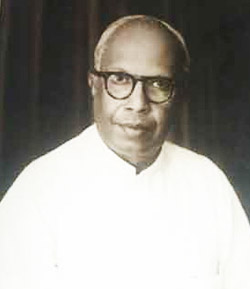 He was a student at Wesley College Colombo
He was a student at Wesley College Colombo
His, was the most fruitful period when the Ananda College expanded physically, and won fame educationally and socially, Mr Kularatne was a great stalwart who laboured for Ananda for twenty five years. During his time Ananda came to be registered as a Collegiate School with a separate Primary School. Students were prepared to sit the London intermediate, Pre. Medical and University Entrance examinations. Teaching in the mother tongue in the Kindergarten was introduced by him long before it was introduced by the department. Pali and Sanskrit came to be recognized as subjects for public examinations. He instilled a national consciousness among the students and laid emphasis on a buddhist education. Religion was given a predominant place. While being Principal at Ananda he founded many buddhist schools of repute. Mr Kularatne's period of office is significant as there was amity and religious tolerance amoung the various communities.
Nalanda, one of the main buddhist schools in Sri Lanka, was inaugurated in 1925 as the branch of the sister buddhist school Ananda. In 1926, the school has been named NALANDA and served as a separate school, and institited at Campbell place, Colombo 10. The founder of Nalanda is late P.De S. Kularatne and the first principal was the late Gunapala Mallasekara. The motto of Nalanda is "APADANA SOBHINI PANNA" - character beautifies knowledge. Building up of character is the main aim of the school.
Super franchise scheme of Sathosa was his brainchild by a special correspondent
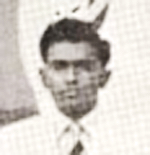 Recently at the BMICH I had the pleasure of listening to Mr. Upali Samararatne who was the guest of honour at the Multi Lac Paints Dealer Convention. One thousand five hundred people packed the hall. Trade and Commerce Minister Kingsley T. Wickramaratne, Deputy Minister of Youth Affairs and Sports, Reginald Cooray addressed them. Minister of Transport and Highways, M.H.M. Fowzie was the special guest of honour. The man who kept the audience in pindrop silence was Mr. Upali Samararatne who addressed the gathering for nearly two h ours. I have heard Mr. Samararatne before and I am convinced he is a man who has a unique style of oratory which goes to the heart of the audience within minutes. Mr. Samararatne is a management and marketing specialist consultant and an internationally acclaimed sales trainer and a motivational speaker. He has trained over 25,000 people and worked on assignments for over 100 companies, both locally and abroad. Mr. Samararatne says that he learnt for a lifetime during the two-year spell he had with Sathosa (CWE) as Chief Executive Officer. The franchise scheme of Sathosa had a sale of 18 million for a month with 318 franchise holders appointed when Mr. Samararatne assumed duties. The Minister had given Mr. Samararatne the task of appointing 5,000 franchisees within two months. It took him only 58 days to achieve the target and the franchise sales reached 100 million per month, a month within four months without any bulk sales to Jaffna at that time.
Recently at the BMICH I had the pleasure of listening to Mr. Upali Samararatne who was the guest of honour at the Multi Lac Paints Dealer Convention. One thousand five hundred people packed the hall. Trade and Commerce Minister Kingsley T. Wickramaratne, Deputy Minister of Youth Affairs and Sports, Reginald Cooray addressed them. Minister of Transport and Highways, M.H.M. Fowzie was the special guest of honour. The man who kept the audience in pindrop silence was Mr. Upali Samararatne who addressed the gathering for nearly two h ours. I have heard Mr. Samararatne before and I am convinced he is a man who has a unique style of oratory which goes to the heart of the audience within minutes. Mr. Samararatne is a management and marketing specialist consultant and an internationally acclaimed sales trainer and a motivational speaker. He has trained over 25,000 people and worked on assignments for over 100 companies, both locally and abroad. Mr. Samararatne says that he learnt for a lifetime during the two-year spell he had with Sathosa (CWE) as Chief Executive Officer. The franchise scheme of Sathosa had a sale of 18 million for a month with 318 franchise holders appointed when Mr. Samararatne assumed duties. The Minister had given Mr. Samararatne the task of appointing 5,000 franchisees within two months. It took him only 58 days to achieve the target and the franchise sales reached 100 million per month, a month within four months without any bulk sales to Jaffna at that time.
The super franchise scheme of Sathosa was Mr. Samararatne's brianchild. He saw many drawbacks in the franchise distribution network and he thought the super franchise scheme was the answer. If properly implemented, the people will benefit immensely by the ready availability of goods at lower transportation costs. Vegetable sales
Another area where Mr. Samararatne showed his prowess at dynamic results-oriented management was the Sathosa vegetables sales project. In July 1995 when the vegetable prices were skyrocketing, on a directive from the President, Minister Wickramaratne directed the CWE to venture into vegetable marketing within just 14 days. Under the personal direction of the CEO, the CWE successfully started the project in just ten days. The CWE did not have buying centres nor the expertise at selling vegetables. But with the commitment of all concerned and the direction of the Minister, the CWE started selling vegetables and achieved a sale of 3,000 kilos a months making a profit of around Rs. 300,000 a month whilst selling about five to ten rupees below the market price. The Manning Market wastage rate was 30-40%. But the CWE wastage rate was contained, to a maximum of 10%. The success of this project was due to the minister's personal interests in the project and training of staff and farmers and building long-term relationships. The project paid farmers upfront whilst the wholesellers paid them after two weeks.
Mr. Samararatne was requested by Mrs. Hema Ratnayake, Minister of Women's Affairs, to establish a buying centre at Bogahakumbura in her electorate at Welimada as the farmers were in the stranglehold of wholesalers. She was pleasantly surprised when the CEO himself visited Bogahakumbura and estbalished with her assistance a buying centre within one week purchasing over one million rupees of vegetables from this rural area per month. In 1995 July vegetable prices in growing areas were at rock-bottom. Radish (rabu) was going at 50 cts a kilo. Farmers were throwing produce on to the roadside for collection by anyone. Minister Wickramaratne entrusted the damage control project to Mr. Samararatne. Vegetable prices came back to reasonable levels in two weeks time due to the dynamism shown by the CWE. Mr. Samararatne was surprised to find Sathosa closed on Sundays. He made a quick decision and opened all outlets of Sathosa on Sundays and Poya days in spite of initial resistance.
Another brainchild
The Sathosa internaitonal franchise scheme was another brianchild of Mr. Samararatne. His idea not only envisaged outflow of goods but also sourcing. The Sathosa Mithuru People's Card was another project of Mr. Samararatne in conjunction with the People's Bank. He conceived the idea of a CWE credit card where payments could also be deducted from the employees' paysheets. A total sale of five hundred million was the vision, considering a ready base 5,000 cardholders each from the CWE and People's Bank. Mr. Samararatne conceived the merchandising boxes at Sathosa outlets. The annual rents at that time paid by the CWE per annum were 60 million. His target income form merchandising boxes was a modest 20 million, thus subsiding the CWE's annual shop rentals. His charismatic leadership mixed with fearlessness, empathy gave the drive to the CWE staff to get the job done. He would lead from front when it was necessary and people would follow him to the end. Mr. Samararatne is a trail blazer and a nationalist and wears only national dress and gets deep into the western styled private sector, speaks fluently in English, Sinhala an Tamil. Much travelled, he can speak about villages and places in most parts of the country to the surprise of the residents of the area. Mr. Samararatne was a good sportsman in his day. He captained the Wesley College soccer team, was vice captain of the first eleven and played rugby for the college. He was a superb wicket-keeper, batsman and played for combined Schools and turned up for Bloomfield at the Saravanamuttu trophy tournament. Upali Samararatne's style of dynamic management is tempered with sympathy and empathy. On a visit to the Galewala CWE an old security guard was found not wearing shoes which was a part of the stipulated uniform. The local manager and staff were sure of an instant punishment for this lapse. The Chief Executive whilst leaving gently took the security guard to a side and asked why he was sans shoes. The guard informed Mr. Samararatne that his legs were swollen and he could not wear shoes. Instead of punishment he was quickly referred to the Sathosa Medical Centre with full official travelling facilities. Yet again a female clerk approached the CEO to seek permission to be absent from work from 10 a.m. to 2 p.m. daily to enable her to attend to her mother who was terminally ill at the cancer hospital. She volunteered to work late daily in lieu of her absence. The CEO's reaction was "you look after your mother, we will look after your work, don't worry."
The loss to Sathosa by Upali reverting to the private sector is in a way beneficial to the country as he is once again engaged full time in consultancy work benefiting hundreds of persons and many companies, thus doing a great service to the country.
Links to further reading
Colvin Sydney Kumaranayake was a pupil of Wesley from 1951-57. As Mr. Oorloff has said in his letter of reference "He is a pleasant lad, with fine manners, intelligent, dependable and hard working. His conduct and character were always very good. In recognition of all his qualities he was appointed a College Prefect." That was a glowing tribute from an honest man.
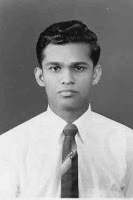 At Wesley, CSK was the Vice President of the VI th Form Literary Union and Captained his House to which he gave intelligent and loyal service. He won the Hill Medal in 1956, the highest accolade for academic achievement at school, and gained entry to Medical College in 1957. He worked for several years in Sri Lanka before obtaining the MRCP(UK) degree in 1972. Subsequently he emigrated to Canada and qualified further in Internal Medicine and Gastroenterology where he rose to become the Head of the Endocopy Services and Chief of the Department of Medicine at the Joseph Brant Memorial Hospital, Ontario, Canada. He is at present the Assistant Clinical Professor in Medicine and Gastroenterology at the McMaster University, Hamilton Ontario.
At Wesley, CSK was the Vice President of the VI th Form Literary Union and Captained his House to which he gave intelligent and loyal service. He won the Hill Medal in 1956, the highest accolade for academic achievement at school, and gained entry to Medical College in 1957. He worked for several years in Sri Lanka before obtaining the MRCP(UK) degree in 1972. Subsequently he emigrated to Canada and qualified further in Internal Medicine and Gastroenterology where he rose to become the Head of the Endocopy Services and Chief of the Department of Medicine at the Joseph Brant Memorial Hospital, Ontario, Canada. He is at present the Assistant Clinical Professor in Medicine and Gastroenterology at the McMaster University, Hamilton Ontario.
I end this short resume of Sydney's achievements with a quotation once again from Mr.Oorloff's letter of reference: " We can rely on Kumaranayake to maintain in the larger life he now enters the high traditions he helped to maintain at Wesley". He has lived upto this astute prediction with great distinction. I wish Mr.Oorloff was alive today to read this account of his distinguish student..
Kind courtesy of the Wesley College OBU Australia
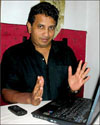 Mahendra is our own computer guru and the designer/engineer of our state of the art Website. Apart from his scholastic achievements he is also an outstanding sportsman and was also the Senior Prefect. Mahendra captained Wesley College Cricket first eleven in 1984 and was the youngest cricket captain the College has ever had. Mahendra captained the Colombo Schools against the outstation schools that same year. He played for Wesley from 1983-85 and was an all rounder of high calibre. In 1985 Wesley College was selected as the best school team and Mahendra's outstanding all round performance contributed largely to the teams success.
Mahendra is our own computer guru and the designer/engineer of our state of the art Website. Apart from his scholastic achievements he is also an outstanding sportsman and was also the Senior Prefect. Mahendra captained Wesley College Cricket first eleven in 1984 and was the youngest cricket captain the College has ever had. Mahendra captained the Colombo Schools against the outstation schools that same year. He played for Wesley from 1983-85 and was an all rounder of high calibre. In 1985 Wesley College was selected as the best school team and Mahendra's outstanding all round performance contributed largely to the teams success.
In 1985 Mahendra created two records in a cricket season - 8 for 54 against St Peters and 7 for 34 (1st innings) 7 for 30 (2nd innings) against Nalanda College. This performance is truly remarkable and will remain on the books for yet some considerable time to come. It must be mentioned that Nalanda had a powerful cricket team, several of their players later represented Sri Lanka at test level. Mahendra was considered a bright prospect to represent his country at Test level. But a powerful official who bore a grudge against Wesley College made sure that this did not eventuate. It was a great pity and a disgrace that SL Cricket was deprived of a quality fast bowler. Mahendra achieved the feat of securing over five wickets on six occasions 1983 6 for 52 vs Prince of Wales 1983 7 for 44 vs St Joseph's 1984 7 for 45 vs Zahira 1985 8 for 54 vs St Peters 1985 7 for 34 vs Nalanda (1st innings) 1985 7 for 30 vs Nalanda (2nd innings) Mahendra Dissanayake and Bryan Claessen (1951 - 52) are the only bowlers to have achieved the feat of securing over five wickets on six occasions. Mahendra is hard working and a loyal supporter of the OBU. He is both modest and unassuming and will undertake any assignment with great diligence and love for his Alma Mater. Mahendra is the son of Graham Dissanayake (1946-52) and the nephew of the one and only Edmund.
Mahendra Dissanayake in the News
Infosoft to enter European, UK markets- Daily News
Lanka can be the monarch of IT:
Infosoft Pvt limited a newly formed IT company is looking at entering the European and UK markets providing e-learning and mobile solutions.
MD, Infosoft, Mahendra Dissanayake
Managing Director, Infosoft, Mahendra Dissanayake said they have developed an e-learning system that allows students to sit for demo exams, practice exams as well as for the final exams. In addition the students will be able to keep track of there past performances by using this software.
There is an increasing demand from leading educational institutions in UK to have this particular system installed for them as well. The company has also developed a high end Theatre Booking system for US that enables users to create the exact layout of the theatre, define the seating arrangements, set the pricing of seats, manage events and special offers as well as manage client accounts. The customers are able to view the seating arrangement and make reservations online. “We are hoping to extend this facility to the UK markets as well,” he said. In Sri Lanka Infosoft developed a Corporate Loyalty Portal for Dialog and also developed their filing system for Roaming Information management. Dissanayake who played professional cricket for an Australian league has designed, developed and deployed software, to compare and rank performances of umpires and match referees in Sri Lanka. “There is no system like this anywhere in the world,” he said. The Company also developed a resource management application to allocate and manage the resources of the organisation to Brandix. Commenting on the local IT sector he said there is enormous potential yet to be unearthed. “Though University students have knowledge they don’t have the confidence. I think one of the first things the authorities should do is try to teach English in a more aggressive manner. Looking at IT development without English is like asking a bird to fly without feathers,” he said. If this area is addressed Sri Lanka can be the Monarch of IT in the region as the local workforce is very talented. After just four years today the company client base includes medium to large-scale organizations in both the local and international markets and they are spread across different segments such as the education sector, apparel sector, telecommunications, media and the leading sports body for Cricket in Sri Lanka. “We specialize in e-learning Solutions, Web based Hotel Booking Applications, Collaborative Suite, recruitment Portals and HRM Solutions and offer other solutions on demand. The company’s most recent assignment was the re designing of the Lankapuwath website. More details on Infosoft Pvt Limited could be obtained from mahendra@infosoft.lk or from their website www.infosoft.lk (SS)
Mahendra Dissanayake (Director/CEO) Infosoft
Prior to forming Infosoft, Mahendra worked for the company he co-founded in Melbourne, Australia. He has also worked for the Malaysian company Angkasa GHD as a consulting engineer for Puthrajaya Project (high tech city). His experiences include engineering management, staff training and management, IT consultancy and project management. British Petroleum awarded ADMA Holdings "Customer Service Excellence Award" while he was in charge of the company.
Mahendra's previous work experiences include the following positions:
Founder/Managing Director of BMT Solutions Pty. Ltd - Melbourne, Australia
Managing Director - ADMA Holdings Pty. Ltd - Melbourne, Australia
Consultant Electrical Engineer – Angkasa GHD - Malaysia
Electrical Engineer - R.L. Polk and Co - Melbourne, Australia
In the field of sports, Mahendra represented his Sri Lankan school's cricket team and captained RMIT University cricket team in 1995.
Mahendra has a bachelors degree in electrical engineering from RMIT University in Australia, and a masters degree in computer systems engineering from the same university.
Cricket is a great game. Once bitten you are an addict for life. To the outsider cricket can make little sense. My father's American friends once said to me How can you take seriously a game that goes for five days without any guarantee of a result ? A cricketer fan would say that it is like relationships, sometimes you walk away and there's no winner and no loser.
As a six years old kid I used to play soft ball cricket with my neighbors. They were about my age and were very keen cricketers. Three of us played endless matches almost every day. That's where I first started to play cricket.
My father decided to send me to Wesley because he was an old boy there and so were his three (out of four) brothers. Except my father, all three brothers played 1st XI cricket for Wesley. Strangely, I learnt to play cricket thanks to kids of the neighborhood not any one of my uncles. They hardly ever spoke about cricket let alone influencing me to play.
When I look back, what a great time I had at Wesley. I'm glad that I didn't spend 12 years of my life inside a 6000 student educational institutions where talented (some of them imported from other schools) were given opportunities and not so talented were totally neglected. At Wesley it was a different education and we were part of one big family.
I first played under 12 cricket for Wesley in 1976. My first game was against D.S.S College. I remember us loosing the game by few runs and a hard hitting batsman scored 50 runs for the opposition who was finally out bowled around the legs by Sanjeev Ganarajah. The batsman was none other than Aravinda De Sliva. Until I left school in 1986 I represented and led Wesley cricket teams in all age groups.
In 1985 Wesley team was chosen as the best in Sri Lanka and I had my best ever season. We were the first Wesley team to be chosen as the champions since Sri Lanka gained test status. I believe that the standard of school cricket in 1984 and 1985 were higher than any other period in our country's cricket history. To give you an idea, seven players of the world cup winning Sri Lanka cricket team represented their respective schools in those two years. The list includes Aravind De Silva, Roshan Mahanama, Asanka Gurusinghe and Hashan Tillakaratne. I was fortunate that I left school cricket scene on a high thanks to a bunch of very talented and highly motivated cricketers.
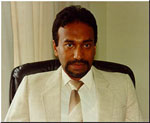 Is an Engineer by professional, at the moment working as The Chief Engineer for Ceylon Intercontinental Hotel Colombo. He was educated at Wesley College Colombo and was Graduated from USA. Enver was born on 8th November 1957. His hobbies are Sports such as Rugby and Athletes and Surfing the Internet.
Is an Engineer by professional, at the moment working as The Chief Engineer for Ceylon Intercontinental Hotel Colombo. He was educated at Wesley College Colombo and was Graduated from USA. Enver was born on 8th November 1957. His hobbies are Sports such as Rugby and Athletes and Surfing the Internet.
Intercontinental Hotel Colombo
akenver@lanka.ccom.lk
 I remember Cecil in the boarding being 2 years my senior. He was a most helpful person and generous to a fault. Cecil’s parents lived in the Survey Camp at Diyatalawa which was a popular 'watering hole' for the numerous school trips, and there were many. With his brother Arthur they were the table tennis champions of the hostel for many years. He was a Christian, and a good one, in all the years I knew him. Cecil took great pleasure in reading the lesson in the hostel Chapel, school assembly, Maradana Methodist Church and at the Festival of Nine Lessons and Carols at College. During the Maxwell De Alwis era they were both members of the enormously successful School Choir and its many productions including the operetta Aladd-In and Out.
I remember Cecil in the boarding being 2 years my senior. He was a most helpful person and generous to a fault. Cecil’s parents lived in the Survey Camp at Diyatalawa which was a popular 'watering hole' for the numerous school trips, and there were many. With his brother Arthur they were the table tennis champions of the hostel for many years. He was a Christian, and a good one, in all the years I knew him. Cecil took great pleasure in reading the lesson in the hostel Chapel, school assembly, Maradana Methodist Church and at the Festival of Nine Lessons and Carols at College. During the Maxwell De Alwis era they were both members of the enormously successful School Choir and its many productions including the operetta Aladd-In and Out.
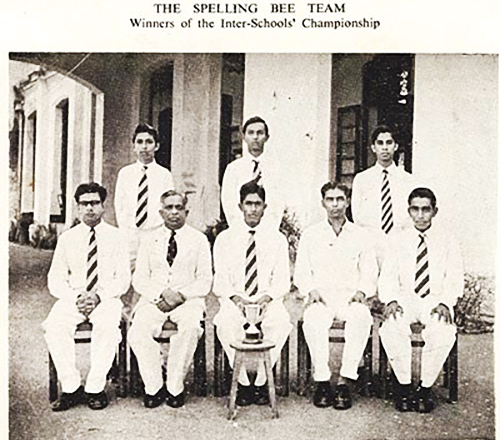
Cecil was a member of the school debating team and a winner of several awards and prizes. He was a College Prefect. During their time at Wesley both Arthur and Cecil immersed themselves fully in the life of the school. I recall the time when Cecil was a proud member of the 14th Colombo Scout Troop under the leadership of Rev.R.W.Pile who was also the School Chaplain. Cecil left school in 1959 and emigrated to Australia. His love for Wesley never waned. There he became a founder member of the ever popular Wesley College OBU which has since gone from strength to strength. He made a most generous donation to Wesley College when the school was in a serious financial crisis in the late 1960's during the Vice-Principalship of Mr L.A.Fernando. Cecil by his very nature had no enemies and was well liked and respected by all. He has always been fiercely loyal to the school. Cecil approached his leisure time and recreation with the same relaxed and easy attitude as his studies. He was knowledgeable and conversant over a broad span of interests. He was a very special human being - kind, warm, compassionate and treated friends and colleagues with respect. At School he was a very dear and trusted friend. Our lives were enriched beyond measure by his presence and contribution. It is 45 years since those days.
Who can't be moved or bought
A voice to keep your name alive
When others have forgot
May God be with him now and in the years to come.
Addendum from Cecil's family in Australia
"Cecil emigrated to Australia in 1959. He studied law in Melbourne and was admitted to practice as a Barrister & Solicitor.
Cecil was active in the Australia Ceylon Fellowship, the oldest Sri Lankan organisation in Australia, and was appointed a Life Member. He was a foundation member and President of the Australia Ceylon Fellowship Co-operative Limited which was responsible for obtaining their own premises in Melbourne."
Discovering Cecil de With Barbut in Negombo By N.S.Weerasekera
Although Cecil de Barbut, has been in Sri Lanka for the last eleven year, only recently Upali Samararatne discovered that he was now a resident of “Nightingale”, a home for elders in Negombo. So some days after Christmas Upali decided that he deserved a visit and summoned Ranjit Dassanayake, Lloyd Wijesinghe, and myself to join him in paying a visit to Cecil. We reached there about 2.00pm in the afternoon, and his carers informed him that visitors had arrived. Cecil emerged rather demurely at first as not all the visitors were known to him bar Upali, and was very quiet at first and only listened to our opening conversation. Memories of his days at Wesley opened his mind and he related his work in founding the Wesley OBA in Australia. This launching received an impetus from the visit of former Principal Cedric Oorloof , who stayed with him, and at a felicitation dinner the Wesley OBA Australia was formally launched. Cecil became the Founder President, and remained as President for 11 years. These were also the dark days of Wesley College, bereft of any Government Grant (mercifully restored by JRJayawardene during his tenure as President) and had to survive financially from the largesse of Old boys and well wishers. Cecil through the Oz OBA answered Wesley’s call and channeled funds to Wesley. The elegant Chapel, stands as a monument to the OBA generosity. They also sent funds for Blazer material for the cricketers and other College sportsmen, and included supplies of the college tie, and also funded the scoreboard. They honoured Kenneth de Lanerolle a luminary of the Wesley staff, as Vice Principal and Principal, and renowned teacher, with airline ticket to visit Australia, and enjoy a re-union with old Wesleyites which Cecil enthusiastically organized.
Since emigrating to Australia Cecil commenced his legal education and initially articled as a legal clerk, and later qualified to practice as Lawyer in the State Government of Victoria. After nearly 30 years in Australia, Cecil decided to return to Sri Lanka to engage in business related to coconut pith, but this floundered due to un-scrupulous partners, leading to Cecil having to retire from working. Cecil now suffers from Parkinson’s disease, for which he is under medication, but it was gratifying to note his mind and memory was clear, and he enjoyed talking about happier days.
Cecil who is partially sighted lives in a retirement home in Negombo and would welcome his school friends to visit him.
22/01/2006
Links to further reading
During his College days he was called " Bamuna or Gajasinghe ".
He was at College from 1971 - 1982 and was in the boarding from 1971 - 1974 Great Times. He works
in the Aviation Industry as a Senior Consultant to the Board of Directors in Dusseldorf, Germany.
He says "I would like to express my sincere thanks to Late. Mr. A.S. Wirasinghe, Mr.& Mrs. Dunstan Fernando,
Mr. & Mrs. M.A.P. Fernando and all Teachers who gave us a great education to stand up in
life."
G.Iranjan C. S. Gajasinghe
College Prefect in 2000-2001. Represented college 1st XI soccer(1999-2000),
2nd XI cricket(97-99) also college Table tennis teams from 1997-2001.
Interact Club President in 2000-2001,Secretary of the English union,Islamic
society, & peace movement.
During his interact Year he was able to bring back the festival of dramatized ballads after a lapse of 3 years.Also completed all annual projects of the club.During his year they were able to do the
English Day(last was done 1998)Islamic day Also a all Island Drama competition(by the interact club).Also he was lucky enough to Receive The Rotary Leadership Award in 2000(3rd Wesleyite)and represented the Youth
summit in India.At the moment he is working at American President lines as customer service officer.
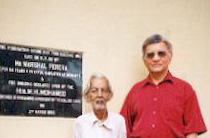
Wesley,under one fraternal band. I was at Wesley from 1951 to 1964 right from the Nursury to Advanced level. I distinctly remember you, particularly in the senior years and you were about two years my senior. What I
remember most about you is your Spotlessly white attire of starched shirt and slacks! My elder brother also entered medical college through Wesley about two years before you as did my cousin Dr. Farook Sikkander.
I
remember Daya Perera and L.S Jayasinghe(Ala-hoppa) also entered medical college around your time. Ala-hoppa's brother was my class mate. I qualified as a Chartered Accountant and have been out of Sri Lanka for over 25 years. I worked in Zambia and the U.A.E and now domiciled in Canada.
I spend a lot of time reminiscing about the wonderful days at Wesley having lost touch with most of my friends. So it was a wonderful and pleasant surprise when my son recently stumbled across the website. I have enjoyed your articles and those of others that bring back nostalgic memories of the past.I have not seen any mention of some of the teachers for whom I have the highest respect and regard. Although some of them may be long gone,I would still like to have whatever info you could provide.
Mrs S.G. Perera - Nursery class teacher. I can still remember the words of the sinhala nursery rhyme -
Pahila idila bimata namila - Barawela athu
Nangitai matai - Gedi dekak ethi
Wediya kadana - Naraka lamai ehema nowe api.
Mrs. Sheila Drieberg (later Mrs. Wijeykoon)- Lower KG teacher.
There was also a Mrs Peiris at kindergarten level. I met her
subsequently in Fort when I was a Accountany student. She did remember me after
all those years.
Mrs. Lembruugen - Upper KG teacher.
Nalini de Mel - Std 2 teacher. Later as LAFA's wife I think she
recognized all her past pupils and would give her ever gentle sweet smile
whenever I went anywhere near the Vice principal's bungalow if she happened
to be around.
Miss I.D. Blacker - Std 3 and Std 5 teacher.
Edmund Dissanayake - Form 1 and Form 3 class teacher.How come there is
not much news about him a famous icon of Wesley College.
The Premawardenes' - Bella and Ravula! Ruvula was the Form 3 sinhalese
language teacher. Famous for Saturday detention on the slightest
misdemeanour.
Mr Sunderalingam - Botany teacher - famous for 'murdering the Queen!'
only two old Wesleyites. If you know the contact details of any
Wesleyites in Canada I will appreciate if you passing on the info to me.
College OBU (U.K)
Christmas. I hope to meet as many old Wesleyites.
Nizar Cader
 Wesley college from ....??? to 1972
Wesley college from ....??? to 1972
Secondary schooling at Walpole Grammar in Ealing, London Bsc hons in Environmental and urban planning in Sunderland unused degree as I was called to work as a missionary All Nations Missionary college - The missionary college diploma ( passed Cambridge theological exams at the same time) Degree in theology at the Brussels theological faculty (in French this time!) Worked in the London City Mission in 1980-
Belgium: church near Charleroi 1982-84 church in the mining area of Wasmes 1984-5 Pastored the church in Mons from 1985- teaching the bible in colleges and schools (protestant RE) to older students
School souvenirs:
I was very young as I left at 13 but memories that stick in my mind are : the singing of all those Wesleyan hymns, the choir practice and performances at Christmas with Haig Karunaratne, the new testament that the principal Mr. Wirasinghe gave me, boiling water with the cubs, cheering on wesley at cricket matches and most of all holding those big flags from the front of the bus windows when we got there first, equally boisterous cheering when a rival school bus goes past, eating the acharou (is that how you spell it :-),
watching the history teacher go through his paces (he always talked about Christopher Colombus), drinking cold milk and having to shake the chocolate from the bottom of the bottle, playing marbles in the playground, the dancing classes in bare feet, watching those Indian films on certain afternoons, the hushed silence as the principal arrived to take assembly....
Dr.Adikaram was at Wesley from STD 3 to Matriculation during the Highfield era
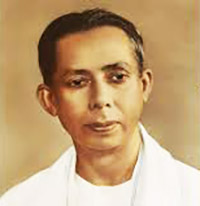 Born:29-Mar-1905 at Kittampahuwa, Palliyagodelle. Primary education at Kalavitigodelle Vihara under Ven. Kolonnawe Saddhananda Thera. Secondary education at Wesley College, Colombo. University College, Colombo in 1922. Passed out with First Class BA (Arts) in 1926. Re-joined University in 1927. BA (Hons) Indo Aryan Language, SOAS (London) 1930, MA (London) 1933, PhD (London). Thesis, Early History of Buddhism in Ceylon. Founded Vidyakara Vidyalaya, Maharagama in 1937, Anula Vidyalaya Nugegoda in 1940, Ananda Sastralaya Matugama and Maha Vidyalaya in 1941, Udahamulla Karawanella and Nigroda Vidyalaya, Maha Maya Nugegoda in 1941. Member National Council of Higher Education (1966-1970), Chancellor University of Sri Jayawardenapura (17-Dec-1979 to 1983). Works, Dhammapada into English, series of text books in General Science, Pali Reader, English-Sinhala Dictionary. Inaugurated the “Thinkers Movement”. Died:28-Dec-1985
Born:29-Mar-1905 at Kittampahuwa, Palliyagodelle. Primary education at Kalavitigodelle Vihara under Ven. Kolonnawe Saddhananda Thera. Secondary education at Wesley College, Colombo. University College, Colombo in 1922. Passed out with First Class BA (Arts) in 1926. Re-joined University in 1927. BA (Hons) Indo Aryan Language, SOAS (London) 1930, MA (London) 1933, PhD (London). Thesis, Early History of Buddhism in Ceylon. Founded Vidyakara Vidyalaya, Maharagama in 1937, Anula Vidyalaya Nugegoda in 1940, Ananda Sastralaya Matugama and Maha Vidyalaya in 1941, Udahamulla Karawanella and Nigroda Vidyalaya, Maha Maya Nugegoda in 1941. Member National Council of Higher Education (1966-1970), Chancellor University of Sri Jayawardenapura (17-Dec-1979 to 1983). Works, Dhammapada into English, series of text books in General Science, Pali Reader, English-Sinhala Dictionary. Inaugurated the “Thinkers Movement”. Died:28-Dec-1985
The following is from an article written by Prof. Mahinda Palihawadana to Sri Lanka newspapers in connection with a symposium held on Dec 28, 2000 at the J. R. Jayewardene Cultural Centre, Colombo, in appreciation of the services of Dr Adikaram, founder of the Sri Lanka Vegetarian Society. Prof. J. B. Disanayaka (Colombo University), Mr Vipin Chand from Chennai, India, Cardiologist Dr D. P. Atukorale, Mrs. Penny Jayewardene (Poorna Health Care Trust) and SLVS President. Mahinda Palihawadana participated as panellists at the symposium. The relevance of vegetarianism for the creation of a cruelty-free and healthy society was a principal topic of discussion.
Dr E W Adikaram’s 15th death anniversary falls on Dec. 28, 2000. He can be counted among the few very uncommon public figures of Sri Lanka during the 20th century.
Dr Adikaram began life as an ardent traditional Buddhist. Listening to a talk at the Dhamma (Buddhist religious) school at age 14, his compassion for animals was heightened and he gave up meat-eating. He remained a vegetarian to the very end of his life. In later times he said that he was vegetarian not in order to gain religious merit or avoid its opposite, but simply because meat came from the killing of animals.
As a young man, he entered Colombo University College (then an affiliate of the University of London) and did the first-year examination with science and mathematics, but later switched to the study of Pali and Sanskrit. He proceeded to England on a government scholarship and did graduate studies at the London School of Oriental Studies, securing a master’s degree in 1931 and the Ph.D. in 1933, based on the thesis “Early History of Buddhism in Ceylon” which has been hailed as a model of careful research.
On his return, he obtained a teaching position at Ananda Sastralaya, Kotte, a grant-aided school run by the Colombo Buddhist Theosophical Society (BTS), saying he would not serve under the British government in any capacity. Having read documents on the administration of Ceylon at the British Museum Library, he felt deeply aggrieved and was keen to join forces with others who worked for a nationalist and Buddhist revival and the overthrow of the imperial yoke. A personal friend of Drs N.M. Perera and Colvin R. de Silva, who went to become stalwarts of the Leftist Movement of Sri Lanka, he would have joined them in their LSSP political party, but for the fact that he was totally against the use of violence to achieve any purpose whatsoever. He had already become an admirer of Mahatma Gandhi, and joined the Navajeevana movement of Mr. Jayawardhana of Wellampitiya, a Gandhian who changed his name to Jayaramdas and advocated the wearing of home-spun khadi and the consumption of country rice in place of imported foods that were then fashionable among the middle class people of the time.
In 1934, Dr. S.A. Wickramasinghe, then General Manager of BTS schools, asked Dr Adikaram to take over the Principalship of Ananda Sastralaya. Dr Adikaram lost no time to create in his school what he envisioned as a true Buddhist atmosphere. He made the diet of the students’ hostel vegetarian and tobacco and alcohol were forbidden within the premises, whatever the function or occasion. In spite of his detractors, whose main complaint was that he was an ‘extremist’, Dr A. became a hugely successful Principal. He championed the cause of Buddhist education and campaigned against Christian missionaries, although he entertained a profound respect for the personality of Jesus Christ. The name Adikaram became a household word among Buddhist workers all over the country and a bye-word for honesty, forthrightness and courage of conviction. His school was a unique institution and those who passed through its portals imbibed the Adikaram spirit at least to a little extent. For many, it was a privilege to be part of the team.
If Dr A. was ‘extremist’ in that he was for going the whole way with his principles, he was no less unconventional when it appeared to him that his ‘principles’ themselves may be suspect.
Someone had given him a booklet which he at first thought was written by Gandhi, but was actually a work by Krishnamurti. Krishnamurti invited his readers to question every belief, every pre-conceived notion and every habit of thought. He had severed connections with the Theosophical movement and was proclaiming a message of inward liberation by understanding the ways of one’s own mind, rejecting the rituals and the paraphernalia of organised religion. He also rejected nationalism as a fatally divisive force in the world. To Dr A. all this seemed to be very much in line with the teachings of the Buddha that one encountered in some of the oldest Buddhist texts, like parts of the Sutta Nipata. He began to turn away from the trappings of organised religion, and in this he felt he was getting nearer to the Buddha rather than turning away from him. He was now ready to question the rightness of what he himself had been advocating thus far in his life.
Sincerity was the hallmark of Adikaram. It was natural therefore, that he was unwilling to continue as Principal of Ananda Sastralaya, knowing full well that he could no longer satisfy the expectations of parents and the management. He had not publicly come out with these sentiments, but in a move that surprised the large circle of his friends and admirers, he resigned from his post in 1945, at age 40 and at the height of his popularity as a dynamic leader and a man of unimpeachable moral stature.
The next 40 years of his life constitutes the story of a vastly changed individual. An in-depth discussion of that would be worth the while but is impossible in a short article. I will only try to highlight in broad strokes a few significant aspects.
Leaving the Sastralaya, Dr A effectively parted company with the social/religious establishment (although of course he sporadically returned to it for short spells). For most of the time thereafter, what he did was essentially to engage in a process of self-examination in tandem with an examination of the psychological implications of the habits and activities of religion and society. In the late nineteen forties or early in 1950, he started contributing a series of articles to the Lankadeepa in which he publicised these explorations. “I wrote these articles primarily for my own benefit. At any time, one’s mind exists in a state of great confusion. It is either attracted to the things we come across, or is repelled by them; or else it is simply indifferent. The problems of life cannot be resolved by such a mind. An effective and clean mind can come about only when one has seen what now makes it ineffective and unclean. Therefore, for some time now, I have been trying to examine ruthlessly the deep-seated ideas and thoughts that pass through my mind. What I am presenting in these articles are the results of that examination.”
Dr A’s articles on religious practices evoked great public interest. What he wrote about the “self-deceptions” inherent in our religious activities such as the rituals of worship was like a deliberate act of stirring a hornets’ nest. Terrific criticisms were levelled against his views, but he was undeterred. He continued writing provocative articles and soon went on to tackle further sensitive subjects like national customs, national language and national culture. National divisions are based on a grand lie, which ignores the essential oneness of the human species. The foundation of the idea of “my nation” is the idea of “me” and this needless division of humankind in terms of us and them is what has created all those acts of mass murder called war.
Dr A continued speaking in this strain in public assemblies, radio discussions, newspaper articles, pamphlets and books and in small private group discussions. The criticisms levelled at him he treated as an opportunity to explore these issues in greater depth and he invariably relished any opportunity to show the weaknesses of the thinking behind these criticisms. In these exchanges, he displayed not only his sharp wit and quick repartee, but also his quintessential human kindness and cheerful sense of humour. To a man who said that smoking was good for the cold weather he replied “Perhaps, if it is the burning end that you stick in your mouth”. His response to a friend who said, “All this is true, but what can one individual do?” reveals his own motivation better than anything else: “But surely, if you see a drowning man, you won’t refuse to help, just because you can’t rescue all the people who are getting drowned in the world?”
Although Dr A. exposed the loopholes in the arguments of his critics with sharpness and clarity, he never resorted to personal attacks. Many of his critics were Buddhist monks and he answered their criticisms by pointing out that their views were inconsistent with the Buddha’s statements found in the Pali canon, from which he was able to quote freely. As time passed, a considerable number of monks agreed with most of what he said and even admired his intellectual honesty. Sadly, few were able to translate agreement into conviction. His personal friendship with members of the Sangha was such that he could easily say what most others dared not to. One of his frequent sayings was, “If only we could convert some of our monks to Buddhism...” – which, though a joke was also a serious statement.
As he criss-crossed the country holding talks and discussions, he sensed the pulse of society and became conscious of the disasters the nation was to face in the years to come. He was deeply anguished and began to urge his audiences to face this issue squarely. Nothing illustrates this sense of urgency than an appeal to parents that he made in a talk given at Sudarshi Hall, Colombo, on January 1, 1976: “I wonder if you are aware that we are caught today in the jaws of an impending disaster? That we are all falling into an abyss where none of us would want to be? Please consider that in another 15 or 20 years, your children may have to face the gun. That is the reality of the world today. If you see that, will you not want to do something to save them from that disaster? Please don’t think that your children will somehow escape . This is an enormous problem which I wish I had the time to discuss with you for days on end. Don’t think that as a parent you can bring up your children separated from others. They will not grow up without being affected by the influence of radio, newspaper, school and all such things. You can’t bring them up inside a closed room. They will inevitably come to associate with other children. So the parents who love their children must consider, must deeply ponder, how shall we bring up not only our children, but also the children of others.”
Based on his talks and discussions with people in various fora, Dr A published 58 booklets that dealt with various issues ranging from the ill effects of smoking and meat-eating to complex religious and philosophical topics. He also established three institutions that he hoped would contribute to a deeper understanding of the causes that make us confused and callous and so lay the foundation for a saner society. The Young Thinkers’ Club, the Vegetarian Society and the Krishnamurti Centre are those institutions. He devoted a great deal of attention to the Krishnamurti Centre because he felt that Krishnamurti’s teachings are a beacon of much needed light to our confused and embattled minds.
Dr Adikaram passed away peacefully in his sleep in the early hours of December 28, 1985.
Institutions founded by Dr. E.W.Adikaram:
1. Schools: Anula Vidyalaya, Nugegoda; Ananda Sastralaya, Matugama; Vidyakara Vidyalaya, Maharagama; Nigrodha Vidyalaya, Gangodawila and branches of Ananda Sastralaya at Ruwanwella and Malabe, now known as Madhya Maha Vidyalayas. All of these are state-run schools at present.
2. Krishnamurti Centre, Sri Lanka, belongs to the network of study centres in various parts of the world, run by people who are interested in the teachings of J. Krishnamurti.
3. Taruna Sitivili Samajaya or Young Thinkers’ Forum, for the discussion of contemporary social, religious, ethical and ecological issues. At one time it had over 8000 members, mostly youths, drawn from all parts of Sri Lanka. Defunct since Dr. A’s death.
4. Sri Lanka Vegetarian Society, Colombo and Matara. The Colombo society was defunct between 1987 and 1997. It was revived and re-vamped in June 1997. See Reviving Dr Adikaram’s Vegetarian Society.
Principal Publications of Dr. Adikaram:
1. Early History of Buddhism in Ceylon, 1946
2. Catalogue of Pali and Sinhalese Manuscripts at the Theosophical Society Library, Adyar
3. The Pali Reader
4. The Dhammapada, an English Translation
5. Asoka Lipi (Sinhala translation of the Inscriptions of Asoka)
6. Paramanuva (A Sinhala work on The Atom)
7. Sitivili
8. Dr A also edited a Sinhala magazine on science named navina vidyava, wrote a series of school texts on General Science and numerous newspaper articles on a variety of subjects such as social criticism, physical and environmental sciences etc.
Rev.Henry Highfield - A tribute by Dr. E. W. Adikaram
I feel honoured that, as an old boy of Wesley College, I am requested to write a few words on Rev.Highfield whom we all respected and dearly loved and I thank the Principal for making this request. As I sit down to pen these few lines, many memories rush in to my mind and I am almost at a loss as to which I am to record. Some of the memories are personal and extremely dear, and I wish I had the opportunity of recounting them in the presence of Rev. Highfield himself.
Rev. Highfield was a firm disciplinarian and could even be harsh when necessary. He was also irritable at times. Perhaps many have seen only this aspect of him. Beneath this firmness, there was a generosity and gentleness, possessed by very few people of his position. He had also the rare ability of sensing who were in need of help and then extending his help in such an unostentatious and gracious manner that those who received his help were made to feel that it was Mr. Highfield who was under obligation for their accepting the help.
Rev.Highfield was a deeply religious man and he made no secret of his convictions, but he never tried to convert pupils of other faiths to his convictions I was a pupil at Wesley College from the third standard up to time Matriculation Form and during that long period I do not remember even one instance when Rev. Highfield interfered, directly or indirectly, with the religious beliefs and convictions of his non-Christian pupils.
A man of the type of Rev. Highfield is indeed rare in this world.
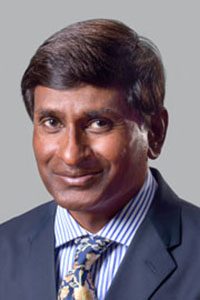
Senior Research Fellow Dr Sarvananthan hails from Point Pedro (Northern Sri Lanka) and did his schooling at Wesley college, Colombo. Muttukrishna Sarvananthan read for B.A. (Hons) in Economics at Kirori Mal College, University of Delhi, M.Sc.(Econ) in Economic Development at the Department of Economics, University of Salford, M.Sc. in Development Planning and Administration at the Department of Social Policy and Social Planning, University of Bristol, and PhD in Development Economics at the Centre for Development Studies, University of Wales, Swansea.
He has worked as a Consultant to the Ministry of Finance and Planning, and the UNDP in Sri Lanka. He was also an intern at the World Bank, Washington, D.C. Presently he is a Research Fellow at the International Centre for Ethnic Studies (ICES), Colombo, and Consultant Macro-Economist (part-time) to the Canadian International Development Agency (CIDA), Colombo. He has just published a book on smuggling between India and Sri Lanka (based on his PhD Thesis) and written a number of articles in academic journals.
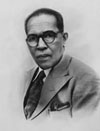 Our founder Malagalage Don Gunasena whose name is today identified and synonymous with the book printing and publishing industry in Sri Lanka hails from the remote village of Wewala in Salpiti Korale. He was the third son of Malagalage Don Carolis Perera and Galpotte kankanamalage Sophaya Perera Hamine and he had his initial education at the Wewala government school and there after studied English at Wesley College which is today in our country one of the leading educational institutions. There after he gained much knowledge in the printing industry at the Boys Industrial Home. MD Gunasena His desire to be in this trade never faded and when the 'Dinamina' was founded by HS Perera the young Malagalage Don Gunasena made his presence felt in the type setting and printing division where his talents were very much appreciated and in demand. Subsequently he became an indispensable part of this institution. His zest and enthusiasm could never be curtailed and he soon found himself working as a compositor at the 'Independent' where he drew his first true salary. There after he joined Victor Press owned by Wijewickramage John Appuhamy situated at Dias place near Price Park where he worked tirelessly as a manager to fulfill his dreams and worked enthusiastically shouldering a multi-role in performing the tasks of salesmen, canvasser, bill collector, designer and printer. There was ample evidence that this young man will achieve and rise to even greater heights and scale the benchmarks of perfection and professionalism. His untiring efforts had finally borne fruit when on the 1st of February 1913 he leased out Victor Press making and marking his entry into the printing industry. In July 1914 we see an important turning point in his printing career when he started the New Victor Press having acquired the present one. New machinery was also introduced to this rapidly expanding business with the press shifting around the Cross-Streets in Pettah from the 1st to the 5th in 1917 and 1919 respectively. In the year 1922, the thirtieth day of November had just gone by and this young man at the age of 29 who was sampling the fragrance from the perimeters of prosperity married Lillian Senehelatha Perera from Grandpass. There after there was no looking back. The possibilities were endless and the young MD Gunasena could envision his dreams materializing on the distant horizon. In 1925 the existing business transformed itself into MD Gunasena and Company which is today one of the most respected and much sought after companies which has reached the zenith of the printing, publishing and book business in Sri Lanka.
Our founder Malagalage Don Gunasena whose name is today identified and synonymous with the book printing and publishing industry in Sri Lanka hails from the remote village of Wewala in Salpiti Korale. He was the third son of Malagalage Don Carolis Perera and Galpotte kankanamalage Sophaya Perera Hamine and he had his initial education at the Wewala government school and there after studied English at Wesley College which is today in our country one of the leading educational institutions. There after he gained much knowledge in the printing industry at the Boys Industrial Home. MD Gunasena His desire to be in this trade never faded and when the 'Dinamina' was founded by HS Perera the young Malagalage Don Gunasena made his presence felt in the type setting and printing division where his talents were very much appreciated and in demand. Subsequently he became an indispensable part of this institution. His zest and enthusiasm could never be curtailed and he soon found himself working as a compositor at the 'Independent' where he drew his first true salary. There after he joined Victor Press owned by Wijewickramage John Appuhamy situated at Dias place near Price Park where he worked tirelessly as a manager to fulfill his dreams and worked enthusiastically shouldering a multi-role in performing the tasks of salesmen, canvasser, bill collector, designer and printer. There was ample evidence that this young man will achieve and rise to even greater heights and scale the benchmarks of perfection and professionalism. His untiring efforts had finally borne fruit when on the 1st of February 1913 he leased out Victor Press making and marking his entry into the printing industry. In July 1914 we see an important turning point in his printing career when he started the New Victor Press having acquired the present one. New machinery was also introduced to this rapidly expanding business with the press shifting around the Cross-Streets in Pettah from the 1st to the 5th in 1917 and 1919 respectively. In the year 1922, the thirtieth day of November had just gone by and this young man at the age of 29 who was sampling the fragrance from the perimeters of prosperity married Lillian Senehelatha Perera from Grandpass. There after there was no looking back. The possibilities were endless and the young MD Gunasena could envision his dreams materializing on the distant horizon. In 1925 the existing business transformed itself into MD Gunasena and Company which is today one of the most respected and much sought after companies which has reached the zenith of the printing, publishing and book business in Sri Lanka.
Kind courtesy of Dallas Achilles
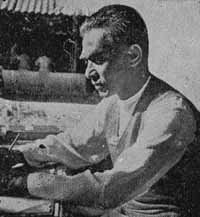 TERENCE de ZYLVA was a student of Wesley College from 1911 to 1915 just four years. But those four years may be described as the most formative years of his life. I remember him as a class mate during all those years. I have a vivid recollection of him as the best dressed student in the class, perhaps in the whole school. He was fastidious in matters of dress to the point of being considered effeminate in that respect. In consequence he was subject to much good humoured banter by his class mates. But this made no difference to him: indeed, I think it had an exhilarating effect on him. WE could discern the faint outlines of the pattern of his future. His friends realised that courage in the presence of opposition was the strongest ingredient in his character.
TERENCE de ZYLVA was a student of Wesley College from 1911 to 1915 just four years. But those four years may be described as the most formative years of his life. I remember him as a class mate during all those years. I have a vivid recollection of him as the best dressed student in the class, perhaps in the whole school. He was fastidious in matters of dress to the point of being considered effeminate in that respect. In consequence he was subject to much good humoured banter by his class mates. But this made no difference to him: indeed, I think it had an exhilarating effect on him. WE could discern the faint outlines of the pattern of his future. His friends realised that courage in the presence of opposition was the strongest ingredient in his character.
At school Terence shone at games. He could turn to almost any game and make his mark there. He was already a good tennis player when he joined Wesley, but at that time Tennis was not an organised school game. He played cricket for Wesley in his last year at school, 1915. One match in which Terence was the hero stands out in my memory. Wesley was set to make over 170 runs to win against St. Thomas’. Five wickets had fallen for 90 runs with almost all the recognised batsmen back in the pavilion. The match seemed lost. But the unexpected happened. Terence came in at this stage and with his Captain.
A.M. Fuard, was able to stem the tide of defeat and achieve a thrilling five wicket victory and Terence became a cricketing hero to his class mates. When he left school his intention was to study Law but for various reasons he had to abandon this although he belonged to a family of lawyers.
Then began his remarkable career as a school master. First, Prince of Wales, then Wesley, Zahira and Sri Sumangala. This was a period of experimentation, as he was, what I might call a “non-conformer”. He was not able to see eye to eye with the heads of any of these institutions. His strong individuality admitted of no compromise and he decided to strike out on his own. Then came his greatest achievement. He established what later was called Kolonnawa Vidyala. He had to create from nothing obtain a site, put up buildings at first temporary, and get together his staff for the private school he set up. It was a prodigious undertaking, but Terence was equal to it. He had from the outset to depend on voluntary subscriptions to run the school. As he worked among the poor he could not expect much in the way of fees. But patience and courage triumphed. At the time he died his school had over a thousand students. Nothing touched The hearts of those assembled at his funeral than the long lines of weeping children along the route to the cemetery.
While engaged in school work Terence was able to find time for local politics. I remember when he was at Wesley he was profoundly influenced by Gandhi’s movement in India. He saw in this movement an effort to better the condition of the underprivileged masses. It was not nationalism that appealed to Terence and many were the lively discussions we had in his room at the Wesley hostel. Later, he was attracted by Marxism and even then his “non-Conforming” nature led by him to plough a lonely furrow. As far as I could make out his political creed was a kind of eclecticism not fully conforming to any accepted pattern of political thought. But this sincerity was never doubted by those who knew him well.
His loyalty to Wesley was almost an article of faith with him. He could never tear himself from. his old school. In the nineteen twenties when Wesley’s cricket prestige had declined, he took a hand in bringing Wesley back to its former position in school cricket. It was a familiar sight to see Terence on many evening of the week on the field with the cricketers.
His greatest service to Wesley was as the secretary of the Old Boys Association. The magnificent additions to Wesley’s buildings in the last decade or two were made possible by Terence’s untiring work as a collector of funds. He had his own method of collecting. He sought out many old boys who had lost touch with their old school and brought them into the O.B.U. Armed with a collector’s list he tracked down many an old boy and even went to the extent of fixing the amount that the would—be contributor should make. There was no escape. If he was unsuccessful in the first attempt, he repeated his visits until the resistance of the contributor broke down. It was his love for Wesley that motivated all these efforts and his energy seemed boundless.
He moved easily with all classes and the wide circle of friends he had was the measure of the breadth of his sympathies. For many years he was the Secretary of OBU. and made the Union a powerful asset of the School and it was fitting that he have been elected to serve on the of Board of Governors. His energy and vitality seemed limitless and the news or his death came as a tremendous shock to all who knew him. I like to think that he met Death with a smile on his lips.
By an Old Boy
Terrence N. de Zylva, (1887– 1960) Compiled by Charles Wesley Ervin
Educated Wesley College, Colombo, 1911-15. School master, Prince of Wales, Wesley College, Zahira, and Sri Sumangala. Established Kolonnawa Vidyala (now named the Terrence de Zilva School). Active in Suriya Mal campaign, 1933-35. Founding member LSSP, 1935. Jailed during WWII. Sided with Philip Guawardena in post-war split in LSSP. Councillor, Kolonnawa Urban Council.
Links to further reading
WESLEY has gained quite a reputation for producing many “FIRSTS” in all walks of life.
The Editors have compiled the following list and sincerely regret any omissions. Wesley is indeed very proud to have produced
(I) The first Ceylonese Governor General Sir OE Goonetilleke
(2) The first High Commissioner to U.K. Sir Oliver Goonetilleke
(3) The first Ceylonese Auditor General Sir OE Goonetilleke
(4) The first Leader of the Senate Sir OE Goonetilleke
Links to further reading
..........................................................................
(5) The first High -Commissioner to U.S.A. Sir Claude Corea

Account of the Life of Claude Corea from the WiKipedia
 Sir Claude Corea was born on 29 January 1894 to a well known Ceylonese political family hailing from the Western seaboard town of Chilaw. His father was Alfred Winzer Corea who was an officer in government police and his mother was Sarah Elizabeth Herat. In the late 19th Century the Corea brothers, wealthy landed proprietors, set up the Chilaw Association, as a political action group.
Sir Claude Corea was born on 29 January 1894 to a well known Ceylonese political family hailing from the Western seaboard town of Chilaw. His father was Alfred Winzer Corea who was an officer in government police and his mother was Sarah Elizabeth Herat. In the late 19th Century the Corea brothers, wealthy landed proprietors, set up the Chilaw Association, as a political action group.
Sir Claude married Lilie Karmini Chitty (born 1903), daughter of James Morel Chitty, Crown Counsellor, also from Chilaw and a son of Christian S. Chitty and his French Huguenot wife, Auguste Matilde "Mitzi" Morel. Lady Corea sported a nose stud and is reported famously to have responded to a journalist’s query as to why she wore a diamond on her nose thus: “I prefer diamonds to sapphires”. The journalist had been visiting the United Nations at the time.
The Clementine Paddleford papers in the Kansas State University Archives and Manuscripts have an intriguing entry: “Corea, Lady Karmini, wife to Sir Claude Corea, Ceylon's, United Nations Ambassador – ‘A Fashion Note at U.N.,’ n.d.” under “People, 1932–1967”Lady Corea played an important role in Sir Claude’s career as a diplomat. He was educated at Wesley College, Colombo.
Early political career
 Sir Claude enjoyed an illustrious political career in wartime Ceylon, entering politics and the State Council in 1931. He acted as Minister of Home Affairs in 1933, becoming Minister of Labour, Industry and Commerce in 1936, coincidentally with his marriage to Lilie Karmani Chitty. He continued as Minister of Labour, Industry and Commerce until 1946. He was elected to the presidency of the Ceylon National Congress in 1932, 1939 and 1941.
Sir Claude enjoyed an illustrious political career in wartime Ceylon, entering politics and the State Council in 1931. He acted as Minister of Home Affairs in 1933, becoming Minister of Labour, Industry and Commerce in 1936, coincidentally with his marriage to Lilie Karmani Chitty. He continued as Minister of Labour, Industry and Commerce until 1946. He was elected to the presidency of the Ceylon National Congress in 1932, 1939 and 1941.
Sir Claude Corea was a prominent member of the State Council of Ceylon. He was appointed Minister of Home Affairs in 1933 and Minister of Labour, Industry and Commerce in 1936. The State Council met in what is now known as the Old Parliament Building in Colombo, Sri Lanka.
On the last occasion, during the Second World War, Sir Claude was adamant that the CNC should not lobbying for “mere constitutional reforms”, but should seek transfer of sovereignty to the people of Ceylon. After the war Sir Claude served as Chairman of the Board of Ministers Sub Committee charged with resolving post-war problems. He was viewed as a potential first prime minister of Ceylon. However Don Stephen Senanayake was keener on this position than he; Sir Claude opted for a diplomatic career.
Diplomatic career
Sir Claude took up the post of Ceylonese Representative in the United Kingdom in 1946, two years prior to independence. It is as a diplomat par excellence that he is remembered. His contribution as a diplomat has given him legendary status among the cognoscenti. Sir Claude was soon commissioned by Don Stephen Senanayake, the first Prime Minister, to undertake diplomatic missions in the United States. He was appointed as the first Ceylonese Ambassador to the United States in 1948.Records in the Truman Library reveal that Sir Claude visited the President on 1 March 1949 and again on 21 July 1952, the dates roughly marking his period as Ambassador of Ceylon in the United States.
During this period he attended the 5th session of FAO in Washington DC from 21 November to 6 December 1949. Sir Claude was appointed as High Commissioner of Ceylon in United Kingdom in 1954. He was given concurrent accreditation to France and the Netherlands in January 1956. He served as High Commissioner at the Court of St. James until 1958.
Post-war relations with Japan
![]()
Japanese Prime Minister Shigeru Yoshida and members of the Japanese delegation, sign the Peace Treaty of San Francisco in 1951. Sir Claude Corea, together with J.R.Jayewardene and R.G.Senanayake, signed the treaty on behalf of Ceylon.
On 8 September 1951, the Treaty of Peace with Japan was signed in San Francisco. Junius Richard Jayewardene (later President Jayewardene), Sir Claude Corea and R. G. Senanayake signed on behalf of Ceylon.
J. R. Jayewardene and Sir Claude, kinsmen and colleagues, worked closely with Dean Acheson and John Foster Dulles, on the American side, to stem an undercurrent at the meeting of Asian resentment against Japanese wartime aggression.
President Reagan made reference to this at the welcoming ceremony for President J. R. Jayewardene on the White House Lawn on June 18, 1984. He said “understanding and appreciating your personal commitment to democratic ideals, Mr. President, it is a pleasure for us to have you as our guest. You underscored this heartfelt commitment during your first visit here in September 1951, during a gathering of the representatives of nations who had fought in the Pacific war. Some at that San Francisco conference insisted that Japan should not be given its full freedom. They argued that Japan should remain shackled as a punishment for its role in World War II. As the representative of Sri Lanka, you spoke out for the principle of freedom for all people, including the Japanese. You quoted Buddha, the great teacher, and said that "hatred ceases not by hatred, but by love."
Multilateral diplomacy
He was drawn increasingly into multilateral diplomacy in this period, being appointed as Chairman of the UN Interim Committee on International Commodity Arrangements of GATT at its 10th session, in 1955 - having been associated with GATT from its inception.Ceylon only became member of the United Nations on December 14, 1955. In August 1956 he participated in the 22-power London conference that discussed the brewing Suez Crisis, before traveling to China.
On 8 September 1956 he arrived in Beijing as Special Ambassador to China, at the head of a Ceylon Government Delegation that was to have preliminary discussions with the Government of the People's Republic of China regarding the establishment of diplomatic relations, trade expansion, economic co-operation and cultural exchanges. The delegation included Sir. Susantha de Fonseka, K.B.E., Mr. T.B.Subasinghe, M.P., Parliamentary Secretary to the Minister of Defence and External Affairs and Mr. R. Coomaraswamy, Senior Assistant Secretary, Ministry of Finance. Mr Coomaraswamy subsequently became Deputy Administrator of UNDP and the other two members became cabinet ministers.
The Suez Crisis boiled over after this Chinese interlude, in the period 5 November to 22 December 1956.
Sir Claude chaired the 12th session of GATT in October 1957 in the Palais des Nations in Geneva.
He was next appointed as Representative to the United Nations in June 1958 and was in office in September of that year when Prime Minister Solomon W. R. D. Bandaranaike was assassinated in Ceylon.Among those who called to offer condolences were Mr. Vazili Kuzanesov, Soviet Deputy Foreign Minister and Mr. V. K. Krishna Menon, India's Defence Minister. Bandaranaike’s widow, Sirimavo Bandaranaike, became Prime Minister in July 1960.
In 1960 Sir Claude Corea reflected on the irony behind Secretary of State Christian Archibald Herter's remark that it was "wholly possible" for Red China to be invited to disarmament discussions, asking wryly whether "if they are not considered good enough to take their place in the U.N., would they be good enough to sit around the disarmament table?"Sir Claude seems to have caught the attention of the Republican National Committee: Documents pertaining to him are to be found in Box 628 of the Dwight D. Eisenhower Library under the rubric “Corea, Claude (Sir) – Ceylon – Chairman U. N. 1st Political Committee.
President of the UN Security Council
Sir Claude Corea created history by becoming the first ever President of the United Nations Security Council from Ceylon in 1960.
Sir Claude became President of the UN Security Council in May 1960.On the first day of his presidency Francis Gary Power’s Lockheed U-2 plane was forced down onto Soviet territory and he was captured.
John.F.Kennedy who was a Senator in 1960 visited Sir Claude Corea in his apartment in New York City, during the U.S. presidential raelectionce. Senator Kennedy consulted Sir Claude Corea, who was President of the United Nations Security Council at the time.
The presidential race was under way at this time and the Democratic contender, Senator John F. Kennedy, visited Sir Claude in his apartment, for consultation. On May 25, 1960, closing a politically stormy month, Sir Claude told the Security Council: "We hold that, at the present time, it is a rule of international law that the air space over the territory of any country belongs to that country and cannot be violated without a breach of international law...." The International Civil Aviation Organization negotiated an international agreement which was signed in Chicago in 1944. The signatories, who were sovereign states, big and small, accepted in that agreement the principle of the sovereign right of each state to the air space over its territory. Among the big states which subscribed to this principle is the United States…” He pointed out that “...secretly, there have been violations of this principle for the purpose of espionage” and that espionage has “… existed for centuries and will continue as long as human frailties continue, and will last as long as states suspect each other, fear each other and seek to dominate each other. But espionage is carried out in darkness, shunning publicity as if it were ashamed of its ugliness. We suppose it is considered necessary in the so-called civilized society of today, although the act itself is demoralizing and degrading."
There are two photographic portraits in the National Portrait Gallery (United States) in Washington, D.C. of 'Sir (George) Claude Stanley Corea (1894-1962), Ambassador of Ceylon in the USA' and 'Carmaine Chitty Corea, wife of Sir G. C. S. Corea' by Elliot & Fry 1954.)
Death
The John F. Kennedy Library records that “Sir Claude Corea, former Ceylonese diplomat, died” on 2 September 1962 in Germany. Lady Corea survived Sir Claude by over 35 years, living a simple life in Colombo, wearing only simple white cotton saris after she had been widowed. There is a photographic portrait of Lady Corea (by Elliot & Fry 1954) in the National Portrait Gallery in Washington D.C. under the name 'Carmaine Chitty Corea, wife of Sir G. C. S. Corea".along with one of Sir George Claude Corea.Sir Claude and Lady Corea had three children: Nihal, Harindra and Chandra. The late Hon. Harindra Corea was a Minister of Telecommunications in the Government of President Ranasinghe Premadasa. He was appointed Deputy Foreign Minister, by President Chandrika Kumaratunga in 2000.
..........................................................................
(6) The first High Commissioner to India Mr. M. W. H. de Silva
M.W.H. De Silva was a Kings Counsel and a leading lawyer in Colombo
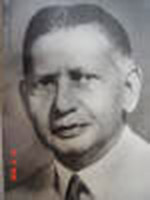
..........................................................................
(7) The first Ceylonese Leader of the State Council Sir Don Baron Jayatilaka

Links to further reading
..........................................................................
(8) The first President of the Senate Sir Gerard Wijekoon
Sir Gerard Wijekoon mentions in his book "Recollections" which was published in 1953 about his life, with references to St. Philip Neri’s Church, Pettah. These recollections are from Sir Gerard’s younger years that are in the early part of the century.
He says: "…..my parents and I attended St. Philip Neri’s, Pettah. It was then the most popular Roman Catholic Church in Colombo." All races and creeds attended this Church", and "also the Military. It was a very imposing sight to see the Military marching to Church with their band on Sundays. The first pew in the Church was occupied by the late Honourable James van Langenberg and his family."
..........................................................................
(9)The first Muslim Knight Sir Mohammed Macan Markar
Links to further reading
..........................................................................
(10)The first Muslim ‘Speaker’ of the House of Representatives Mr. H. S. Ismail
H.S Ismail Al Haj - Member of Parliament for Puttalam and the 1st Speaker of Parliament of Independent Ceylon (Sri Lanka)-
Commemorative stamp in his honour
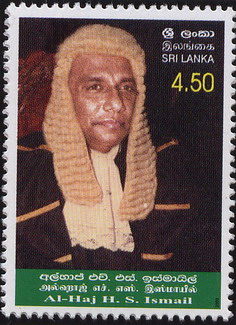
Links to further reading
..........................................................................
(11) The first Muslim Mayor of Colombo — Mr. M. H.. Mohammed
Links to further reading

..........................................................................
(12) The first Ceylonese Air Pilot — Mr. Zubay Caffoor,
In 1931 Mr Caffoor obtained the Air Pilots Certificate from the Air Ministry England . Thus he played a part in the genesis of th(e Air Mail Services in Ceylon- Researched by Dr Nihal D Amerasekera
Hanworth Aerodrome UK in 1931- used by Zubay Cafoor
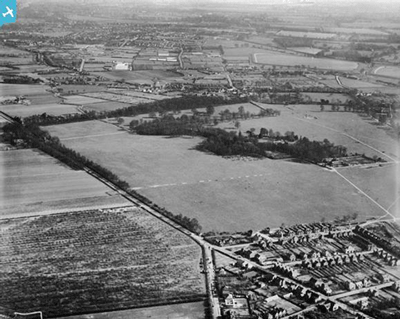
On April 22, 1931, Lankan aviation reached an important milestone when an aeroplane flying in from another country landed on Ceylon soil for the first time. Arriving from Mandapam in South India, the de Havilland D.H.80 Puss Moth single-engine, high-wing monoplane was piloted by Nevill Vintcent. Of South African origin and an enthusiastic promoter of Indian civil aviation, Vintcent was a close friend and business associate of the legendary J.R.D. Tata, who founded the Tata Sons airline which later became Air India. Accompanying Vintcent in the Puss Moth, which landed on the Colombo Racecourse, was Zubair Caffoor, who had earlier laid claim to being the first Ceylonese to obtain a pilot’s licence.
Mr. Vintcent flew back to Bombay on the 6th May, 1931 carrying with him a special edition of the "Times of Ceylon" marked First Airmail Edition. Only 25 newspapers were thought to have been carried. He left Colombo at 6.00am, after refuelling and breakfast at Bangalore he reached Bombay at 5.00 pm a journey of eleven hours. This was an incredible feat as the usual sea mail route took 4 days to Bombay. The idea of an airmail service to Ceylon received a boost.
In April, 1932, Tata Airways commissioned a survey flight and this was carried out by Mr Vintcent. A few letters were carried on this flight and only 4 are known to collectors. The cover is endorsed "Preliminary Investigation Flight" in red and carries Mr. Vintcent’s signature and designation "Dy: Director Civil Aviation Government of India". It is postmarked 8th April, 1932.
One major obstacle to the extension of the Karachi to Madras Service to Colombo was the lack of an aerodrome. Discussions took place over a suitable site and in 1934 the State Council passed a resolution to construct an aerodrome on the site at Ratmalana. This site consisted of two hundred and forty acres of land planted with rubber and coconut which was acquired, cleared and levelled.
In 1936 Tata arranged for a special flight from Madras to Colombo to carry the Christmas mail. Connection with the Imperial Airways flight to and from London enabled Christmas mail from the UK to reach Ceylon. Two special flights in each direction were made between Madras, Trichinopoly, and Colombo.
De Havilland Puss Moth - the type of plane used by Zubay Cafoor
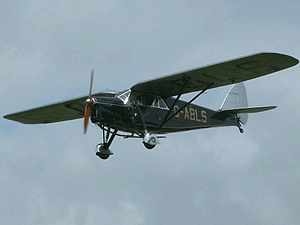
Mails left the UK on December 16th via Imperial Airways to connect with the special flight leaving Madras on the 23rd December, 1936.
A delay occurred in the transit of the English mail and the special flight left Madras carrying only the Indian mail. The return flight left Colombo at 8.00 am on the 24th December and by the time it reached Madras the UK mail had arrived. A second special flight took off landing in Colombo in the evening of 24th December. The second return flight to Madras carried no mail. The return mail reached England on the 2nd January.
Tata & Company issued a special cover for the occasion, coloured blue carrying an imprinted Indian Etiquette and an airplane silhouette. A circular cachet was applied to all mail carried on these flights while the rectangular cachet with first "Special Airmail INDIA-CEYLON DECEMBER 1936" inscribed was applied only to the Indian Mails of December 23rd.
Airmail services rapidly advanced to cover most parts of the globe. The Empire Air Mail Scheme formed a major part of this network covering the British Empire. On 28th February, 1938 Stage 2 of this service was inaugurated coinciding with the opening of the All-Air Service from Colombo. From Ceylon to England in 4½ days and reply from the UK in 10 days was possible. This was of great benefit for the commercial establishments.
This more efficient service allowed a reduction of 30 cents from the cost previously of the combined sea and air route. Most of the mail dispatched on February 28th bore a slogan postmark "Empire Air Mail – Every Day is Mail Day".
This was how the fascinating story of the Airmail Service in Ceylon evolved.
Excerpt from the FLIGHT magazine 24th October 1930 :-.
Ceylon's first Air Pilot- the 1st Ceylon Muslim to learn to fly, Mr Zubay Cafoor, has just qualified for his "A" licence at the NFS School at Hanworth. Mr Cafoor, it will be remembered from previous reports in "Flight" journal started his instructions at the Cinque Ports Flying Club at Limpne and afterwards when his business brought him to London, he transferred to Hanworth. When he returns hone Mr Cafoor hopes to take a machine back with him to Ceylon - probably by air
Ceylon's first airfield was opened at Ratmalana on November 27, 1935, when a de Havilland Puss Moth arrived from India flown by the Madras Flying Club's chief instructor Harold Tyndale-Biscoe, accompanied by passengers W.B. Schleiter and C.B. Darius, a Ceylonese. Then on February 28, 1938, a WACO YQC-6 biplane of Tata Sons launched the first Air Mail service from Ceylon to Britain, via India. That flight also marked the start of scheduled passenger services to and from Ceylon, although by a foreign airline.
Since then, Sri Lankan aviation has progressed immeasurably if not always smoothly. Although Sri Lanka is a tiny island, its aeronautical history is rich with stories of men, women, and their flying machines. Many of those stories, recounted by this author, have been featured in the Sunday Times over the past 17 years or so, and can still be read online. Maybe some day, when the 'centenary dust' has settled from the sky, one or more dedicated historians with a genuine and abiding interest in the minutiae of the subject will write a comprehensive and accurate – in all respects – account of Sri Lankan aviation history.
..........................................................................
(13)The first Ceylonese to win the “Athletics” Blue at Oxford University Mr. M. A. M. Sheriff
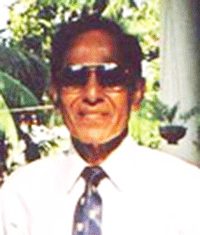
Links to further reading
..........................................................................
(14)The first Ceylonese to win the Hockey Blue in Oxford or Cambridge University - Dr.Lou Adhihetty(Cambridge)
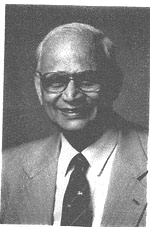
Dr Lou Adhihetty passed away in Switzerland on Wednesday (5 August 2009). He served God and Wesley almost in equal measure.
Lou was one of the finest cricketers produced by Wesley College which has had the distinction of producing M.K. Albert, the Gunasekeras, Mahadevan Sathasivam, Stanley Jayasekera, Bertram Henderling, Edmund Dissanayake, Abu Fuard and the Claessen brothers.
In a period when Wesley played only six inter-school cricket matches, the 50s were, certainly the best years but 1956 was when they struck the purple patch. 1955 and ‘56 were considered by scribes the ‘Lou Adhihetty years’ even though the team he captained to be undefeated inter-school champions in 1956 had accomplished batsmen in brother Vincent Adhihetty, Patrick Schokman and Neil Gallagher; M. Samsudeen of the low trajectory as the opening bowler and a plethora of all-rounder’s in Lou, himself, Bryan Claessen and his brother Herman, Abu Fuad and his brother Ansar in the fore-front.
Lou scored three centuries in 1956 out of the six games the school engaged in and scribes reported they had never seen a better batsman than Lou in the Wesley team. 1956 was the year in which the country’s schools showcased the best batsmen – Ronnie Reid and Michael Tissera of STC; Lorensz Pereira and Brendon Gunaratne of Royal; Malsiri Kurukulauriya and Nimal Maralanda of Trinity and W.Premaratne with Ranjith Doranagama of St Anthony’s being those who are within my memory.
On leaving school, Lou entered Cambridge University and obtained his BA [Hons] and MA [Cantab] PhD. and returned to serve as Wesley’s Principal from 1985 to ‘88. He also served as Director of the Asian Christian Service in Vietnam and as President of the Swiss Sri Lankan Association based in Switzerland.
The funeral is on Monday, 10th August, in Wegenhalde 1, 8162, Steinmuar, Switzerland.
Lou leaves behind his wife, Lisbeth, daughter Sakunthala and son Arjuna. By Sharm de Alwis
..........................................................................
(15) The first person in the World to Captain two Countries in Cricket M. Sathasivam, who captained Malaya and Ceylon In the academic field too, we have met with plenty of success.
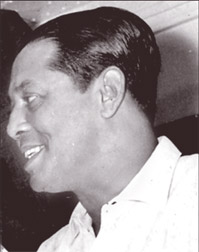
Links to further reading
..........................................................................
(16) Mr. E. Elmar Mack came First in the World in his Junior Cambridge examination obtaining 6 distinctions. He obtained •the same number of distinctions in his Cambridge Senior.
..........................................................................
(17) Mr. H. J. V. Ekanayake (the first editor of the Double Blue—1898) gained a distinction in Drawing in his Cambridge Senior, being First in the World.
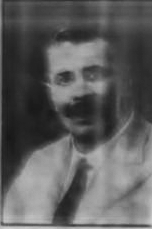
..........................................................................
(18) Mention must also be made of Professor E.F.C. Ludowyk, who won the Ceylon Government Arts Scholarship in 1928. He had the distinction of coming First in the Latham Prize at Cambridge everytime he sat for it. He won it 3 times. He was placed 2nd in the Oldham Shakespeare prize in 1930.
 Evelyn Frederick Charles Ludowyk (1906-1985) a Sri Lankan Burgher Shakespearean scholar, author, playwright and critic, was the first Professor of English of the University of Ceylon. A member of a prominent Dutch Burgher family, Ludowyk studied at Richmond College, Galle and Wesley College Colombo. He went up to Cambridg to complete his studies. He joined the staff of University College, Colombo in 1932, becoming professor in 1936. In 1940 he met and married Edith Gyömröi.
Evelyn Frederick Charles Ludowyk (1906-1985) a Sri Lankan Burgher Shakespearean scholar, author, playwright and critic, was the first Professor of English of the University of Ceylon. A member of a prominent Dutch Burgher family, Ludowyk studied at Richmond College, Galle and Wesley College Colombo. He went up to Cambridg to complete his studies. He joined the staff of University College, Colombo in 1932, becoming professor in 1936. In 1940 he met and married Edith Gyömröi.
When the University College was converted into the University of Ceylon, Ludowyk was appointed its first Professor of English in 1942. He was made the first Dean of Arts in the newly established University in Peradeniya in 1952. In 1956, because the island's humid climate caused Edith health problems, the couple moved to London. Later they settled in Colchester. UK
Ludowyk died in Colchester UK in 1985. (From The Wikipedia)
Links to further reading
..........................................................................
(19) Air Vice Marshall E.R.Amerasekera DFC and Bar. He was the first Sri Lankan to command the Sri Lanka Air Force. E.R Amarasekera was the most decorated Asian in the RAF. He was a hero who flew no less than 85 sorties over Hitler's Germany during the war years.
He flew bombing raids over Hitler's Germany By Wijitha NAKKAWITA (SL Sunday Observer March 2009)

The Sri Lanka Air Force celebrated its 58th anniversary a few days back prestigiously as a professional fighting air force. There were several articles in the newspapers about the valiant pilots and men of the force who had made it strong and capable.
Yet going through most of those articles written for the newspapers one did not find the mention of the name of the first Sri Lankan Commander of SLAF Air Vice Marshall Rohan Amarasekera, the most decorated Asian pilot of the RAF during the second world war, an ace who flew bombing raids over Hitler's Germany 53 times and manoeuvred his aircraft when anti-aircraft fire criss crossed the skies. Even during the night raids on Germany his successful manoeuvring the aircraft when the German search lights dotted the clouds brought him back to base safely though on two of those sorties his aircraft was hit by enemy fire, once severely.
When one rakes through the old newspaper files one reads a reference to the Royal Ceylon Air Force by the satirical writing on our Air Force that was called `Air Farce' during the time that the British Commander headed it. However, when Rohan Amarasekera was the chief of staff of the SLAF in 1962, he made it a real fighting force and was able to get new aircraft and have the officers and his men trained in combat and flying with his unique experience.
The RAF records had these citations among other regarding Amarasekera's valour and dedication to duty. Rohan Amarasekera flew on 20 missions with Flight Sgt. Emms from June to September, 1943 and this crew was decorated for their bravery and courage after the flights, especially for their bravery on November 11, to Cannes. And he was to be awarded a second Distinguished Flying Cross.
"This officer displayed a high degree of courage and determination navigating his aircraft to the target and back. In November, 1943 whilst on a flight to a distant target, the oxygen supply failed early in the sortie. Pilot Officer Amarasekera, though suffering from lack of oxygen and extreme cold, continued his duties and the mission was successfully completed. This officer proved to be a navigator of outstanding ability."In the squadron 158 he was promoted to the rank of Flight Lieutenant and was awarded prestigious bar to the Distinguished Flying Cross, the only Asian pilot of the RAF to win the award during the second world war."
This officer has completed the second tour of the operational duty. In December, 1944 on route to Essen his aircraft was engaged by searchlights and heavy anti-aircraft fire causing severe damage to the aircraft. Despite shell splinters entering his compartment Flying Officer Amarasekera took evasive action and completed his allotted task. His other targets have been Ruhr Valley, Chemnitz and Hanover. On all occasions FO Amarasekera had a set a fine example by his tenacity and devotion to duty."Among the other records of the RAF there are references made to him by his contemporaries who wrote about this great son of Sri Lanka with glowing tribute. The RAF officer Alex Sydall recalls an incident. "The only time I ever saw `Amer' look disconcerted was when on our return from either Essen or Chemnitz, he picked up his parachute which he had stowed under his navigator's seat to find pieces of flak embedded in it! But for that parachute he would have been somewhere uncomfortable."
RAF bomber 640 squadron colleague Ian Roberts remembered him in his article `Leconfield's League of Nations' like this: "Handsome and dapper, with hair swept back and parted precisely in the middle Amarasekera hailed from Ceylon. He completed 52 operations requesting permission from the CO to stay with the Jeeves crew to do so.
He flew 22 missions with the New Zealander Jeeves and Papple. I remember most vividly with red nose and red cheeks as he was rolled in the snow during one of the inventable snowball flights between Sergeants and Officer Messes.
After the war he completed the pilots course and eventfully rose to Chief of Staff of the Sri Lanka Air Force. He was an unforgettable man."In 1962 he became the first Sri Lankan Commander of the Sri Lanka Air Force, proving an astrological prediction made when he was born.
In 1941 though he wanted to join the British Army his family did not give their consent to it, but he sailed to England with a group of Sri Lankans and joined the RAF as an aircraftsman and was promoted to U/T Observer and Leading Aircraftsman. In February, 1942 he was posted to the Empire Air Navigation School and in September that year to the Advanced Flying Unit RAF.His 35th death anniversary also falls on March 20 and one cannot forget a man who brought the highest honour to his country during the second world war, awarded the Distinguished Flying Cross twice and the Bar to the Flying Cross on the third occasion for his valour and dedication to duty that no other pilot in Asia received from the RAF.
Born to an eminent family of Kegalle as a Christian he lost his parents early in life.In 1970 when he retired as the Commander of the SLAF he did not even own a house of his own.He died on March 20, 1974 and is survived by his widow Aloma and two children.
Even at this late stage the attention of the authorities should be drawn to posthumously promoting him to the rank of Air Chief Marshall Rohan Amarasekera who made our Air Force a professional fighting force.
Links to further reading
We are sure that there are many more whose names should be on this list, and we regret their omissions, as these were all we could compile in the time allotted us.
..........................................................................
By Upali Perera
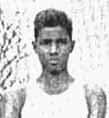
Randolph, Ranjit Alwis who has been honoured by his appointment, as a Member of the Order of Australia (AM) is arguably the first and only old Wesleyite to have received this honour by the Australian Government.The appointment is in recognition for Service to the Development of Multiculturalism in Australia as an advocate and lobbyist, and to the community through the promotion of indigenous reconciliation.
Ranjit, was in the hostel and class in the early 1950’s along with mates like Dr N.D.Amerasekera, Errol Smith, Kenneth de Silva, Cecil & Arthur D’with Barbutt, Lalith Wijesinghe, Dalkin Samidon, Paul David & a host of others. It was not only as a hosteller that I spent time with Ranjit during our school days, he was also my classmate up until 1963. A Senior Hostel prefect and a school prefect, he excelled in studies winning the P H Nonis mathematics prize for University entrance students and also the Lydia Senaratne memorial prize for the best all rounder in the hostel. Although Ranjit was not a recognized sportsman, he was a keen supporter of all college sport.
 After completing his school career, his academic talents took him to Paradeniya University in 1963 to fulfill his degree in Bachelor of Science in Mathematics and graduated in 1967, with flying colours. After obtaining his degree Ranjit joined the staff of Trinity College, Kandy, teaching University entrance students Physics and Mathematics. After 2 years of teaching he moved away from his science education to Chartered accounting.
After completing his school career, his academic talents took him to Paradeniya University in 1963 to fulfill his degree in Bachelor of Science in Mathematics and graduated in 1967, with flying colours. After obtaining his degree Ranjit joined the staff of Trinity College, Kandy, teaching University entrance students Physics and Mathematics. After 2 years of teaching he moved away from his science education to Chartered accounting.
In 1972, this product of Wesley migrated to Australia where he married his Paradeniya University sweetheart Lakshmie and continued to further his academic qualifications. Ranjit joined the University of Adelaide and obtained his Masters Degree.
In Australia Ranjit Randolph Alwis has been a great strength to many community groups on a range of issues affecting them both in state and federal levels, often appearing in the media in relation to community and business matters. A qualified Chartered Accountant Ranjit, runs his own business as a consultant in Adelaide, South Australia.
As a friend and a schoolmate, I salute you for all your wonderful achievements. I am sure all Wesleyites Around the world are proud of you too.
Addendum by Dr.Nihal D Amerasekera
I remember Ranjith Alwis well both in the hostel and in the 6th form. He was a gentle and decent Chap (well, most of the time anyway). He had the right mix of good fun and hard work. He has brought honour to himself, the family, Sri Lanka and to all Wesleyites. Well done for a very great achievement. I recall the wonderful times and the mischief in the boarding and feel proud of him as a friend. Our very best wishes to Ranjit from all of us in the OBU (UK) and from the Double Blue International Website. On my visit to Adelaide in March 2009 as I entered our hotel room there was a message from Ranjit Alwis to phone him. He was with us in a flash and then on until we left Adelaide we remained their guests. Ranjit and Lucky were generous hosts and took time to show us the beautiful city and its surrounds. Ranjit and I were hostellers together since 1954 and parted company in the sixth form in 1962. He is now a chartered accountant in Adelaide and a Managing Director of his own company. He has received an award from the Australian government for his services to the ethnic communities. Deep into the night we recalled events of our lives at Wesley and thereafter. He has a fine memory for his schooldays and speaks warmly of his association with Wesley College. What amazed us both was the closeness we showed despite the gap of 50 years since we last met. We were both sad to say goodbye to Ranjit and Lucky and vowed to meet up again when they visit their daughter in London sometime soon.
ORA ET LABORA
From the Daily News of 9/7/03
Ranjit Alwis an expatriate Sri Lankan who lives in Adelaide South Australia has been honoured by his appointment as a Member of the Order of Australia (Australian version of Queen's Birthday Honours). The announcement of his appointment was made in the 2003 Australia Day honours list.
His appointment is in recognition for: Service to the development of multiculturalism in Australia as an advocate and lobbyist, and to the community through the promotion of indigenous reconciliation.
Alwis played a leading role in anti racism and community harmony activities in Australia during the past thirty years. Mr. Alwis says that while the "White Australia" immigration policy was abandoned more than thirty years ago Australian institutions were very slow to adopt this range.
A lot of work had to be done to change the legacies of the past two hundred years of Australian history to bring about necessary changes at service delivery and operational levels. This required ongoing positive work as well as constant vigilance against negative and obstructionist racist elements in society.
Alwis was twice elected to the key position of the National Chairman of the Federation of Ethnic Communities Councils of Australia.
He was the first non European to be elected to that position. The Federation is the peak national advocacy body for people (and their descendants) from a non Anglo-Celtic background and has as its members more than 150 different organised ethnic groups from all corners of the World living in Australia.
Alwis was one of the authors of the important policy document "New Agenda for Multicultural Australia". This document was launched by the current Prime Minister of Australia as the key policy instrument of his government on multiculturalism.
Alwis says that this pioneering work has changed things for the better for all and in particular for those people from an Asian background living in Australia.
Born in Colombo Sri Lanka, Mr. Alwis received his early education at Wesley College and completed his tertiary studies at the University of Ceylon, followed by postgraduate studies at the University of Adelaide and the University of South Australia. By profession Alwis is a Chartered Accountant and conducts his business consulting practice in Adelaide.
His appointment as a Member of the Order of Australia is particularly significant in that it is for recognition of his services and achievements outside the field of his chosen profession.
Links to further reading
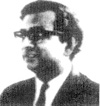
Munsif Meeran was one 0f the most colourful members that the UMAS has had throughout its history. He had his initial medical training at the University of Ceylon and then came to Britain for postgrraduate studies at hospitals in England. After a period as consultant in obstetrics and gynaecology at the Benghazi Women’s hospital in Libya he took the post of Director of the Zambia Flying Doctor Service, became President of the Zambian Red Cross and was involved on committees of the World Health Organisation.
On his return to England he set up a thriving acupuncture clinic in south Croydon. He also began teaching Acupuncture, writing an excellent little paperback Acupuncture: Science and Art and forming the Marina Academy of Acupuncture which successfully started many doctors on the road to Acupuncture Practice. It was his constant frustration that the BMAS persIstently refused to grant approvaI to his course, indeed the Society seemed to have deliberately devised the rules for recognition in order to exclude him.
He was certainly an accomplished self-publicist.. I well remember at the opening ceremony of the Second ICMART World Congress in London, when he evaded the stewards to leap on the podium and present a set of his course video-tapes to a somewhat bemused Minister of Health. And when the Chairman of the conference later complained to him that this was unacceptable behaviour, he caused even more consternation by writing to the ministry for the tapes to he returned.
 For years the BMAS had been very comfortably run by a small, self-perpetuating committee, taking it in turns to hold the senior offices. He managed to throw this comfy system into disarray by having himself proposed as chairman and forcing a ballot. Sadly he received few votes, mainly because many people had difficulty penetrating his thickly accented speech, but he undoubtedly stirred up the committee. Perhaps we could do again with some spirited character to perform a similar task every few years.
For years the BMAS had been very comfortably run by a small, self-perpetuating committee, taking it in turns to hold the senior offices. He managed to throw this comfy system into disarray by having himself proposed as chairman and forcing a ballot. Sadly he received few votes, mainly because many people had difficulty penetrating his thickly accented speech, but he undoubtedly stirred up the committee. Perhaps we could do again with some spirited character to perform a similar task every few years.
The UMAS has attracted its share of eccentrics, but amongst them Dr Meeran was notable for his energy and enthusiasm in encouraging the medical use of acupuncture. Despite the irritation that he so frequently engendered in other society members we need more like him and will truly miss him.
Addendum by NDA:
Dr.MH Meeran was the Senior Prefect at Wesley College in 1951. This note was sent to Shelton Peiris by Rev.William Holden, one of our former Principals 1943-44 who is now in his 92nd year and lives in Glastonbury, England. I have intimated to him that Dr.Meeran sadly passed away in 1998.
From Rev.William Holden in 1974
I must share with readers an incident that took place a few years ago. I had been admitted to a North London Hospital for surgery and was visited by the House doctor. As we talked I learned that he was from Ceylon, that he had been a scholar during my term of office. He remembered me. He remembered how once when we were having open air assembly in the temporary buildings a coconut fell and missed me by inches'. However, once he knew who I was, no kindness was too much for him. His name was Dr. Meeran. I have since lost touch with him but should he read this I hope he will remember and accept my gratitude
 Trevor was a student at Wesley college from 1939 – 1948 and had the privilege of serving under Principals, John Dalby, David Izzet, William Holden and James Cartman.
Trevor was a student at Wesley college from 1939 – 1948 and had the privilege of serving under Principals, John Dalby, David Izzet, William Holden and James Cartman.
Trevor was an outstanding athlete. He was the College’s champion (Moscrop House) and held the school records for both the Hop Step and Jump and 120 yds High Hurdles.
In 1947 Wesley College was placed third for the Tarbat Challenge Cup. Trevor was placed second in both the 100yds High and 200yds low Hurdles, narrowly beaten by Walter May of STCM.
1948 was the golden year for Wesley athletics. In that year the college was placed third for the Obeysekera Challenge trophy, a remarkable performance for schoolboys participating at a national level. Other members of that champion team were Harold Matthysz (pole vault/javelin) Mohammed Sheriff (hop step/long jump), Bertus Perera (220/440yds), Norman De la Harpe (high jump/putt shot), Trevor Van Rooyen (120 yds High Hurdles and Ian Campbell (high jump).
 At the National AAA meet held in 1950, Trevor established a new Ceylon record for the 120 High Hurdles in 15.6 secs. He was awarded the Wilton Bartlett cup for this achievement and was selected for the Asian Games 1951, in New Delhi. At the Asian Games, Trevor qualified for the 120yds high hurdles final and was a certain medal hope, but unfortunately he had to pull out of the event due to an injury just prior to the running of the final. Trevor was a member of the Wesley College champion Hockey Team in 1948, he also played cricket (U 16).
At the National AAA meet held in 1950, Trevor established a new Ceylon record for the 120 High Hurdles in 15.6 secs. He was awarded the Wilton Bartlett cup for this achievement and was selected for the Asian Games 1951, in New Delhi. At the Asian Games, Trevor qualified for the 120yds high hurdles final and was a certain medal hope, but unfortunately he had to pull out of the event due to an injury just prior to the running of the final. Trevor was a member of the Wesley College champion Hockey Team in 1948, he also played cricket (U 16).
Trevor is full of gratitude, praise and respect for that outstanding school master Mr Dick Honter, who was his mentor, teacher and friend. Mr Honter “had the amazing knack of motivating and producing Wesley Champions with the limited resources available to him at that time”.
Trevor was handpicked by the IGP Ceylon for a career in the Police Force and spent some time in training at the Police Academy. However, after a brief spell with the Ceylon Police, he decided to join the Shell Company and participated with great distinction at the Ceylon Mercantile Athletic meet in 1950. winning the 120-yds hurdles and the Hop Step and Jump for which he was awarded the Col. Griffith trophy for the best performance at the meet.
Trevor recollects with glee his foray into acting whilst at college. In his own words “in 1947, a revival of dramatics was orchestrated to give aspiring actors an opportunity to develop ones talent. The theory was to introduce an inter-house competition. My faction MOSCROP House under the guidance of Messrs B.R. Blaze and D.A. Weerasooria put on a modified version of “THE BISHOPS CANDLESTICK”. Moscrop easily accounted for the interlopers in the contest. My claim to fame? The judge at the contest, reported that Van Rooyen in the role of the Bishop is highly commended for his brilliant acting. For a good maximum of 60 seconds, I had this vision of playing Rhett Butler in a remake of Gone with the Wind. Oh the joys of a dreaming schoolboy. Alas the next day it was back to class. Doing the show was great fun, with the likes of Natty Prins, Pete Mendis, Shirley Rodrigo, K.D. Ahmat and others”.
In 1952 Trevor immigrated to Australia and joined the RAAF as an education officer. He continued with athletics and also played Cricket and Rugby for the RAAF whilst stationed in Victoria.
Trevor is so proud to be a WESLEYITE, in his words “what accolades I received, would not have been, if it wasn’t for the great educational institution that is Wesley College, Colombo. My love and unqualified devotion to my College goes without saying. GOD bless Wesley and all who walk through her Portals”
WESLEY TO THE FORE
Daily News 9th May 2003
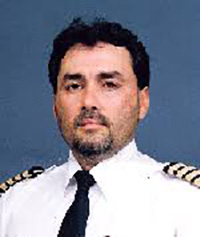 The old Wesleyites sports club at its forthcoming AGM to be held on 10th May, 2003, will felicitate Capt. Navin de Silva, a distinguished son of Wesley and past president of the Old Wesleyites Sports Club. His contribution towards both the School and OWSC could be an ideal benchmark for any to follow, and most fittingly his portrait will be unveiled at this function.
The old Wesleyites sports club at its forthcoming AGM to be held on 10th May, 2003, will felicitate Capt. Navin de Silva, a distinguished son of Wesley and past president of the Old Wesleyites Sports Club. His contribution towards both the School and OWSC could be an ideal benchmark for any to follow, and most fittingly his portrait will be unveiled at this function.
Navin aged 40 years, educated right through at Wesley, was the Senior Head Prefect, received School Colours for Cricket, Badminton, Athletic and Rugby.
He captained the Senior Cricket, Athletic and Rugby Teams and captained the Sri Lanka School Cricket Team in 1980 which toured England and, the Under 22 team which played against India.
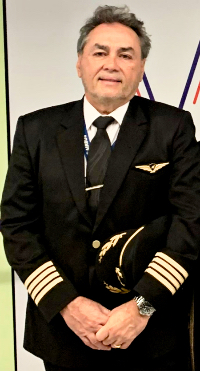 During the period 1980-81 he scored over 1000 runs and took 50 wickets, was awarded the Best Captain, Best All Rounder and received the School Boy Cricketer Award of the year.
During the period 1980-81 he scored over 1000 runs and took 50 wickets, was awarded the Best Captain, Best All Rounder and received the School Boy Cricketer Award of the year.
Later he represented NCC, CCC and Tamil Union in Sara Trophy Cricket. In persusing a career and in keeping with his reputation of a "High Flyer" chose the path of navigating in the sky.
He served the Sri Lanka Air Force as a Volunteer Pilot for 1 1/2 years and joined the Sri Lankan AirLines, where he has been employed for past 17 years and currently serves as an Instructor Captain.
His latest interest is Golf, where within a very short period in taking to hit the stationery ball has won several local and international tournaments. In the international tournaments he took part so far, he was a finalist in the Asian Finals held in Brisbane, World Finals Stuttgart both sponsored by Mercedes. He became the Champion at the world International Air Line Championship in New Delhi and took Sri Lankan Air Lines to the runner-up stage in the team event.
He was the OWSC president from 1999 - 2001. During which period he was responsible for many fund raising projects for his Alma mater.
He was also the pioneering strength towards realizing the 2nd development phase of the Club, which boasts Billiards Room and a Squash Court. (RD)
Daily FT 10th July 2020
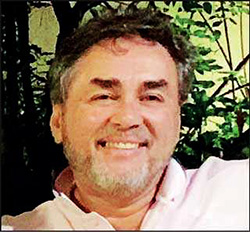 Captain Navin De Silva, serving for 35 years as a Senior Pilot with the National Carrier Sri Lankan Airlines and having held Senior management positions of Chief Pilot and Head of Flight Operations too, has taken over the ‘Controls’ at the prestigious and historic Royal Colombo Golf Club.
Captain Navin De Silva, serving for 35 years as a Senior Pilot with the National Carrier Sri Lankan Airlines and having held Senior management positions of Chief Pilot and Head of Flight Operations too, has taken over the ‘Controls’ at the prestigious and historic Royal Colombo Golf Club.
The RCGC celebrating its 140th year, experienced a significant challenge when the COVID-19 crisis froze the holding of the Annual General Meeting usually scheduled in the last week of March locked-down by the force of nature.
Captain Navin was duly elected unanimously as Captain of the Royal Colombo Golf Club at the Annual General Meeting of the RCGC on 2 July. Capt. Navin, a former Wesleyite, Sri Lanka Schools Cricket Captain and a keen single figure handicap Golfer who has won several local and international Golf events, also served as the Chairman of the National Golf Selection Committee.
Captain Navin is blessed with an Executive Committee boasting an excellent blend of experience and youthful exuberance. Michael Perera Magala, a single handicap golfer and respected Past Captain was elected President. Jehaan Ismail, an esteemed alumnus of the University of Colombo, a keen golfer and a Member of the RCGC Committee for several years, takes office as the Vice-Captain of the Club.
Going down the memory lane, former Ceylon Cricket Captain F. C. De Saram (Derek) served with distinction on the RCGC Committee for several years as the Ground Secretary and his Son-in-Law Neil Chanmugam who also played Cricket for Ceylon and later toured England & Australia with the Sri Lanka Cricket Team as Manager prior to Sri Lanka receiving Test Status, also served on the RCGC Committee and subsequently served as Captain of the Club.
Significantly since then, Mahela Jayawardene a more recent Captain of Sri Lanka Cricket and who himself is a single handicapper, becomes the first Sri Lanka Test Cricketer to join the EXCO of the RCGC as a Committee Member for 2020/2021 at the invitation of Captain Navin.
Amrith De Soysa, five time winner of the RCGC Club Championship and the youngest in its’ history at the age of 15, and a leading Amateur Golfer in Sri Lanka having won 12 Club Championships island-wide, makes his debut within the RCGC, is Committee elected as ‘Honorary Marketing & Communications Secretary’ for the ensuing year.
The newly elected Executive Committee boasts of an excellent balance worthy of steering the RCGC in to the new decade, surfacing from a fresh wave of natures’ bloom, changing the face of economics to virtual reality, notwithstanding the importance of physical wellbeing and the diplomacy of Golf, the signature sport of a well-groomed nation.
The Colombo Golf Club was founded on 13 March 1879, initially based on Galle Face Green, with the then Club House gradually having transformed into the Galle Face Hotel that stands large today. Golf, known as the oldest sport played in Ceylon by the ruling British, was granted The Alfred Model Farm at Borella, named after Prince Alfred, son of Queen Victoria, acquired by the Colombo Golf Club and declared open on 9 December 1896, by His Excellency Sir Joseph West Ridgeway, the Governor of Ceylon.
It was on 7 June 1928, that a despatch from the Secretary of State for the Colonies intimating that His Majesty has been pleased to confer upon the Colombo Golf Club the privilege of using the prefix “Royal” and of being known in future as “The Royal Colombo Golf Club”, with the request to display the portrait of Her Majesty Queen Elizabeth, Head of the Commonwealth of Nations within its premises.
With the passage of time the Late W.P. Fernando (Pin) who became the first Ceylonese to be appointed Captain of the RCGC in 1964 and who was followed by the Late Dr. L. V.R. Fernando (Lance) in 1966 and the Late C. P. G. Abeyewardene (Chrisso) in 1968, these appointments facilitated the dominance of Ceylonese holding office at the RCGC during the transition of British Companies to Ceylon ownership as well. After 1970, the majority of the British in Ceylon left the island nation and within that period Ceylon was renamed “The Democratic Socialist Republic of Sri Lanka”.
Daily FT February 2021
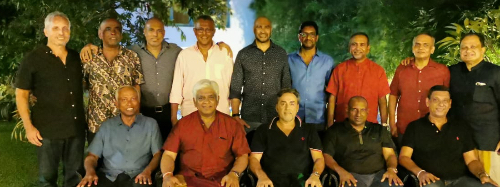
One Saturday night in February 2021, legendary Arjuna Ranatunga, along with his team-mates from Sri Lanka’s first U19 England Tour team, walked down the memory lane to relive the historical day from Island’s glorious past. It was a night of bellyaching laughter and well intention leg-pulling. Of fun and food, and a slice of serious cricket talk. As they reignited their link with Sri Lanka’s first U19 England Tour after a gap of 40 years, Navin de Silva, captain of the tour, brought together majority of the members on one platform at his residence yesterday night, and the outcome was predictably rip-roaring.
The tour, that brought glory for Sri Lanka cricket, was also a forerunner for many greats down the line such as Ranatunga, Aravinda de Silva, Romesh Rathnayake, Graeme Labrooy, Ravin Wickramarathne, Charith Senanayake and Ashley de Silva.
In coming years, Ranatunga went on to rewrite the history of Sri Lanka cricket with greatest cricket triumph in 1996 World Cup. Aravinda, one of the greatest batsman the Island has ever produced, was the mainstay of Sri Lanka’s roller coaster ride.
While Rathnayake, Labrooy, Senanayake played for Sri Lanka and brought glory for their motherland, Wickramarathne and Ashley have been serving cricket board since last two decades!
Other members of the memorable tour Oshadie Weerasinghe, Ranil Peiris, Hiran Cooray, Gamini P, Mihara Egodage and Sanjaka Wijemanna were also presented in the reunion.
By Shamseer Jaleel
Daily FT 10th March 2021
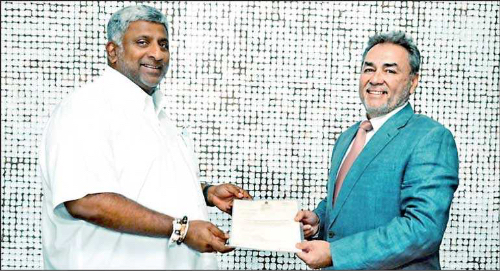
Former SriLankan Airlines Chief Pilot and Head of Flight Operations Capt. Navin De Silva has been appointed to the Board of Directors of the Sri Lankan Civil Aviation Authority (CAA) by the Minister of Aviation, Prasanna Ranatunga.
After graduating from the US as a pilot, De Silva joined the Sri Lankan Air Force (SLAF) as a volunteer pilot at a time when the two squadrons flying fixed wing aircraft were short on pilots. He served with the SLAF for one and a half years, after which he joined SriLankan Airlines as a Cadet Pilot, a journey he continued for 35 years. He was responsible for the training of the first officers and captains at the national carrier overs several decades.
He has flown planes such as Boeing 737, Lockheed Tristar, and Airbus 320/330/340, and logged over 20,000 flight hours. For over two decades he has been an examiner and an instructor.
Speaking to Daily FT, De Silva said: “It’s time that I gave my expertise and input on a national level, and I am grateful to [SriLankan Airlines] Chairman Ashok Pathirage and the board for giving their blessings for my appointment.”
Some of his achievements during his time in senior management were: Simulator Project installation and certification of Airbus A320 and A330 Simulators; Establishment of a New Crew Planning and Resource Management department – to improve the productivity of both tech and cabin crew; the installation of the Sabre Crew Management System – fully automated crew management system to enhance crew planning and rostering; Electronic Flight Bag (EFB) project – the first airline in South Asia to implement class 2 EFB (all aircraft paper manuals/airway charts were replaced by digitally loaded iPads); the implementation of the Flysmart Aircraft Performance calculation tool, which brought about significant savings engine maintenance cost payload calculations; EU Emission Trading Scheme – the first airline in Asia to obtain European Union approval on CO2 emissions monitoring plans and mechanisms, saving the airline Rs. 1.8 billion; Green Operations – fuel saving/CO2 emission reduction and waste management best practices implementation in all departments of Sri Lankan Airlines; and the establishment of Type Rating Training Organisation (TRTO) – A320/A330-type courses for foreign pilots.
Captain De Silva, a product of Wesley College, Colombo, was an outstanding all-round sportsman and Head Prefect of his alma mater. During his time, he captained the first-ever Sri Lanka schools’ side to the UK and still continues his sporting endeavours. He is the present captain of the Royal Colombo Golf Club (RCGC).
Links to further reading
 HSAT Peiris or Shelton Peiris to past and present Wesleyites, can boast of a connection with Wesley spanning nearly 70 years, which is one may surmise is without precedent. Perhaps, it was not entirely co-incidental that he was born on March 2nd , which is also celebrated at Wesley as Founder’s Day, and throughout his school career, his birthday was also Wesley’s birthday, and has remained a special day for him, and he had the added privilege of a school holiday to celebrate it.
HSAT Peiris or Shelton Peiris to past and present Wesleyites, can boast of a connection with Wesley spanning nearly 70 years, which is one may surmise is without precedent. Perhaps, it was not entirely co-incidental that he was born on March 2nd , which is also celebrated at Wesley as Founder’s Day, and throughout his school career, his birthday was also Wesley’s birthday, and has remained a special day for him, and he had the added privilege of a school holiday to celebrate it.
Shelton entered Wesley on the 10th May 1934, admission No 8812, when Rev John Dalby was the Principal. His class teacher was none other than the devoted Miss Rachel Lembruggan. His talents in public speaking were evident from those early days and he won the Class recitation Prize in the very first week of his admission and he continued to win the reading and recitation prizes, and English prizes on a regular basis.
In April 1942 during the 2nd World War , Wesley’s Buildings were commandeered by Military Authorities, and Wesley was literally dis-banded except for a small number of pupils, which included Edmund Dissanayake and Shelton who had to move to improvised accommodation at Kitiyakkara comprising a sprawling old Walauwe. In this time Shelton, now a Senior student was assisting the newly arrived Rev.James Cartman in 1945, taking on teaching tasks in the lower classes. Due to the efforts of Rev Cartman, Wesley was able to re-gain its legitimate premises, and Shelton along with Edmund Dissanayake , led the march back to hallowed original premises, on the 3rd December 1945 that was in a state of considerable dis-repair. They assisted the Principal in overcoming numerous problems encountered whilst settling into the re-gained premises.
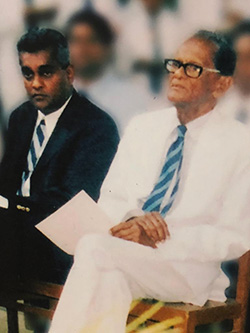
At Wesley, Shelton was a leader, and was the Senior Prefect in 1945, Editor of the College Magazine, and not un-expectedly leader of the College Debating Team. He partook in Drama productions of the Vice Principal, Kenneth de Lanerolle, and had a stint as a make-up artist. His Christian upbringing was well founded and he was natural choice for the position of President of the SCM. He threw himself into many varied activities of the school, and one of which was becoming the Histographer for Kenneth de Lanerolle organized tours of the ruined cities of Sri Lanka. His academic ability and all-round performance resulted in his being the first recipient of the Highfield Merit Award, initiated by Rev. Cartman.
To many a school boy who was in Wesley in the mid 1940’s, two persons stood out from among the students, and that was Shelton Peiris, standing tall in his clean white starched suit as Senior Prefect, assisted by Edmund Dissanayake his Lieutenant and Cricket Captain. Many a boy froze with some fear when they encountered Shelton’s disciplining stare through his bottle rimmed glasses ! But behind the glasses was a compassionate helping hand.
Upon leaving School Shelton was persuaded by Rev.Cartman to join the College staff. He functioned as the first Secretary of the Parent Teacher Association. He also initiated students into forming groups that attended Welikada Prisons and instructed inmates in English, Sinhala, Tamil. He took charge as master in charge of Boxing, Prefect of Games, and functioned as the Chief Librarian. He was also the Scoutmaster 14th Colombo Group.
On leaving Wesley, his efforts continued unabated. He was the obvious choice to become the Editor- in- Chief of the Centenary Souvenir. His efforts in this matter can now be sufficiently appreciated as it was the time of limited funds, and above all the absence of Computers and Word Processors which has greatly simplified such work now. Shelton hammered out every single word all by himself on a manual type-writer. In the Centenary Year at the College Prize Giving he was selected to give the vote of thanks to the Chief Guest, the Hon.Sirimavo Bandaranaike, being the acting Honorary Secretary of the OBU.
He was always seeking out Wesleyites, to whom honour was due. Ranis Appuhamy the school attendant, who served Wesley for 60 years, was remembered by a plaque placed in his memory at the base of the south tower of the College Building. This was sponsored by Shelton.
He organized the Centenary thanks-giving for the life and work of Rev. Henry Highfield (1895-1995). Shelton drew attention to MH Mohammed a distinguished Old Boy who completed 50 years of public service, and he was honoured by having his photograph un-veiled in the College Hall. Similarly, Fred de Mel a Head Master of repute at Wesley had his photograph un-veiled as result of Shelton’s initiative.
Once again when the 125th College Anniversary was celebrated, Shelton was the obvious choice to be the Editor- in- Chief of the Souvenir, to which he brought his wide experience from previous times. The writer had the honour to assist him in this arduous task. Edmund Dissanayake gave of his encyclopaedic knowledge of Cricket at Wesley over the years and edited the entire section on cricket. A very fine souvenir was produced mainly due the joint efforts, led by Shelton. As a part of the 125th College Anniversary celebrations, a tableaux “ From Dam Street to Karlsrhue” was staged with Shelton as the playwright, and was directed by Ranjani Fernando, and very successfully performed at the BMICH on two occasions before a large and appreciative audience. He also composed a 125th Anniversary Anthem which is set to music.
With regard to Anniversary Souvenirs, Shelton occupies a unique position, in being associated closely with the 75th, 100th and 125th, a record few will equal. In the 75th he was the official photographer with Prof . W.Justin F. Labrooy as Editor-in- chief. and as mentioned previously for the 100th and 125th he was the Editor-in- Chief.
Shelton initiated the idea of erecting a plaque to commemorate Wesley’s fallen heroes, and he delivered a moving address at the un-veiling ceremony, which is reproduced at the end of this article.
Shelton had a long and abiding relationship with Rev. James Cartman, bonded with respect, affection, and admiration, who was one of the great post war Principals of Wesley, which began during his student days. Rev. Cartman entrusted him with numerous duties. After his school career, Shelton enrolled at the Law College to follow studies in Law, but Rev. Cartman decided otherwise, and visited him at home and convinced him that his true vocation was to teach at Wesley. Shelton could not resist this call of duty and joined the Wesley staff and also be in charge of the Hostel. When Rev. Cartman was writing his thesis on Hinduism, he escorted him to several Hindu Kovils and obtained explanations of prevailing religious practices. Even after Rev. Cartman left Wesley, Shelton continued his contacts with him right up to his passing away in 1998. Whenever his daughter Christine, and her husband Michael Weaver visited Sri Lanka they would unfailingly be in touch with him, and visit Wesley. In continued admiration for him he initiated the“James Cartman Memorial Trust Fund” to finance a suitable Wesleyite, who wishes to follow a course Theology.
He has been an active member of the Old Boys Union for several decades as a Vice President, and latterly as a Vice Patron. He has represented the OBU as a member of the College Governing Board. His most recent activity was to form the Past Teachers Fellowship of which he is the Founder President.
For a number of years he was active in the YMCA membership Secretary, and continues as a preacher to this day. He was an active chaplain and later President of the Gideons International. He was the Hon Secretary of the Denipitiya Medical Mission in the South and helped vigorously in their work.
Shelton’s wife Dolores has been his support over the years, and they have been blessed with two children, Charles Peter who is a Wesleyite, who was an active sportsman and athlete in College, and daughter Therese Rosanna, who is an old girl of Methodist College. She did much of the typing and secretarial work for Shelton when he was the Hony Secretary of the OBU. We wish him many more years in the service of Wesley and that he will continue to enjoy life with his wife Dolores and children and grandchildren.
NSW Colombo, May 2003
Shelton has a legendary status at Wesley where he was a student, Senior Prefect and Teacher. After leaving Wesley he was an active member and an official in the OBU for several years. Then his connections to the school remained strong all through the years when his son was a student at Wesley. He still remains a die-hard Wesleyite through and through.
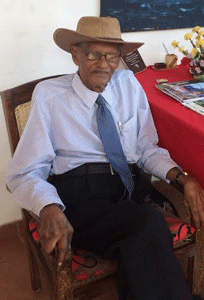 |
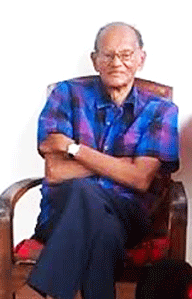 |
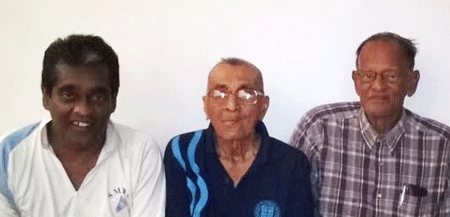 |
After his years of service to the OBU Shelton bowed out gracefully from the hot seat of running the affairs of the organisation. He left it to the younger old boys without any recrimination, hard feelings and sniping. This has enhanced his reputation as one of the most loyal, genuine and competent old boys of his generation. He was never ambitious for power or fame. Shelton had a genuine desire to serve Wesley. His commitment, honesty and dignity touched all those with whom he worked. The eruption of nonsense that ensued in the OBU in later years shows the inherent complexities and problems in running the organisation. Shelton is a gregarious and affable personality who had no interest in grumbling and complaining about people and so he remains a popular person.
 Combining his genuine loyalty and a fine writing style Shelton became a prolific writer about the school, its legends, its history and its people. These have been published in the daily newspapers, School magazines and the many websites including the Double Blue international. His deep knowledge of Wesley's history benefited from Shelton's inexhaustible curiosity. He edited the school's Centenary Souvenir with great distinction. Shelton's time at Wesley during the war years, the move to Kitiyakkara and its many hardships have now been well documented. His anecdotes and of course its inevitable fables have been recounted in graphic detail in his writings. It’s still lovingly remembered, and chuckled over, decades later. He speaks volumes of the great Cartman era and the resurrection of the school from the doldrums of the War years. It was Wesley's great good fortune to have a Principal of the calibre of Rev James Cartman to revive the school. Shelton is now known as the 'historian of the school'. He will be held and cherished as the guardian of the history, the archives and the principles of its founding fathers.
Combining his genuine loyalty and a fine writing style Shelton became a prolific writer about the school, its legends, its history and its people. These have been published in the daily newspapers, School magazines and the many websites including the Double Blue international. His deep knowledge of Wesley's history benefited from Shelton's inexhaustible curiosity. He edited the school's Centenary Souvenir with great distinction. Shelton's time at Wesley during the war years, the move to Kitiyakkara and its many hardships have now been well documented. His anecdotes and of course its inevitable fables have been recounted in graphic detail in his writings. It’s still lovingly remembered, and chuckled over, decades later. He speaks volumes of the great Cartman era and the resurrection of the school from the doldrums of the War years. It was Wesley's great good fortune to have a Principal of the calibre of Rev James Cartman to revive the school. Shelton is now known as the 'historian of the school'. He will be held and cherished as the guardian of the history, the archives and the principles of its founding fathers.
With his long years and avuncular style Shelton is now an integral part of Wesley and as they say "part of its furniture". He has legendary status at Wesley, which is indeed very well deserved. Despite his years and infirmities Shelton never fails to attend its many functions. I had the great good fortune to meet him again at the Great Reunion of September 2012 with Mr Edmund Dissanayake who is his friend and confidante. Even then he was passionate about the school and also quietly confident it would emerge from its well publicised decline. Such attachment and loyalty to an institution is a rarity nowadays. The overwhelming focus has now shifted to acquiring power and wealth. I hope Wesley will continue to produce people like Shelton who are willing and able to show loyalty and gratitude. At present some students leave their loyalty behind the school gates as they start their careers. It is increasingly harder to get old boys to be a part of the network.
Shelton, we need your presence at Wesley to show the new generation what it means to be a Wesleyite. We all admire his quiet and reserved personality, sense of duty and integrity, courteous manner and sense of humour.
We sincerely hope you have many more years of good health and happiness.
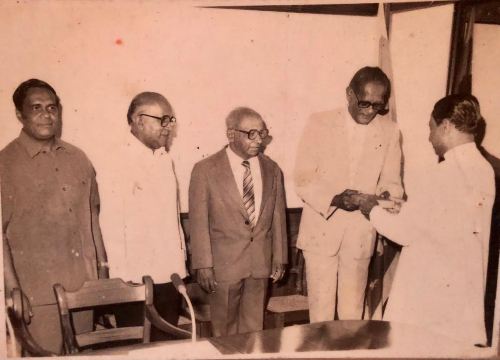
Links to further reading
Shelton Peiris 92 not out - Photos By Peter Peiris
1. Three generations of Wesleyites - Shelton, Peter and Sushendra Peiris
1. Shelton Peiris 92 not out on founder's day
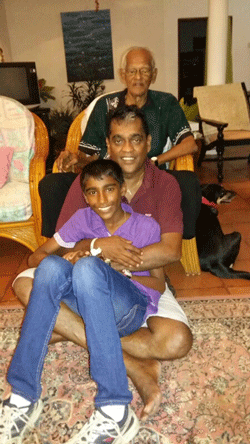 |
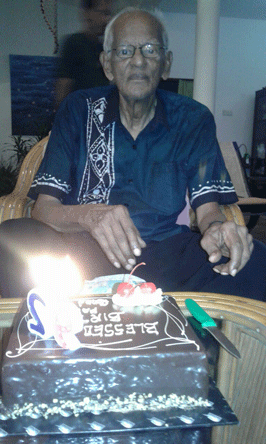 |
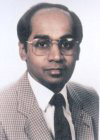
Good day to you, Thank you for the prompt reply. Good to read about Wesley, long time since I heard that name!. There is another famous old boy of Wesley... one called Chelvanayagam Barr Kumarakulasinghe born 1880, his eldest brother Kanaganayagam Barr Kumarakulasinghe was the Vice-Governor for British in Maldives( see Golden Book of Ceylon) Chelvanayagam Barr joined Wesley College in 1887, where in 1899 he won the University Scholarship. In October 1899 he joined Oxford. Rev. H. Highfield, Principal of Wesley College, Colombo, thus refers to Chellam at Oxford in the College report for 1900: "One recent Wesleyite, our last Ceylon Scholar, C.B. Kumarakulasinghe entered Merton College, Oxford in October 1899, and quickly won golden opinions from his tutors and authorities of the College and mentions about his gentlemanliness and most likeable qualities. Chellam was a born gentleman, truly his descent was noble. None said a bad thing of him in his country and in England he lived and died. He had a close association with Wesleyans particularly those of Wesley College in the exalted Puritan atmosphere. In Oxford he commended the care and companionship of Wesleyan Clergy of Merton. He died in August 1900 at the age of 20- in London. He had a close friendship with Karl Marx both are buried at Highgate Cemetery, London.
I had my early schooling at Badulla and later my parents sent me to Jaffna College to learn correct Tamil, joined Wesley in 1959-leaving in Dec. 1965. I left Ceylon in 1966 May for further studies and training in Germany. Later to take up the post of Asst. Front Office Manager of Ceylon Inter-Continental Hotel which was in building stages at that time. Do keep in touch, and pass my greetings to those whom I may know.
Following is an excerpt sent by Daya WijaRatnam Winslow
I am sending you a side about him from our family home page. The book
about him was written by Rev. Dr. Issac Tambyah in 1907.
IN FAVOUR WITH GOD AND MAN
Each office of the social hour
To noble manners, as tha flower
And native growth of noble mind
And thus he bore without abuse
The grand, old name of gentleman."

Chelvanayagam Barr Kurnarakulasinghe was born at Tellipalali on March 5th. 1880. His father the late Mudaliar Joseph William P. Barr Kumarakulasinghe, a Tamil poet and scholar whose name finds worthy mention in Arnold's Galaxy. I do not believe in the distinction of gentle birth unless life is influenced by such gentleness. Chellams claims to noble parentage, high in the social sense, were well warranted by the nobleness of his character. "A mountain stream that ends in mud methinks is melancholy." It is a common failing among men whose lives are, light as vanity without a featherweight of redeeming merit, to rejoice in the glory of a long burnt out star of an ancestral post. High lineage in such cases is only a matter for regret that the last link of a golden chain should be of a baser metal. Where, however, the life lived and the character enshrined in that life are noble in duty and in love we may well allow the claims of lineage seeing that evolution has not erred in the making of man. Give me an who is noble, he is his ancestry.
Chellam was the youngest of nine children. In his life time one of his sisters Mrs. Saktivelupillai died at a lamentably young age. I remember the day at Dehiwala when the sad news came from Jaffna. Chellam was then preparing for a reading prize at the Royal College. He had thoroughly mastered Tennyson's Guinevere, the passage which describes the Queen's penitence, and there was such a naturalness and beauty with which he read the concluding lines of the Queen's soliloquy:
It surely was my profit had I known:
It would have been my pleasure had I seen,
We needs must love the highest when we see it,
Not Lancelot, not another.
it seemed sure that he would have distinguished himself at next day's contest-but the death of a sister, one to whom he was most attached came between. His eldest brother survived him, having seen his best efforts on behalf of Chellam blooming to success and the blossom fade in its prime. Great gladness was his and great sorrow. The other brothers and sisters are alive. Mr. R. R. B. Kumarkulasinghe is the Maniagar of Valigamam North, Mr. S. S. B. Kumarakulasinghe is the Kacherry Mudliar of Trincomalie, Mr. A. B. Kumarakulasinghe is the assistant to the Kacherry Mudliar at Batticaloa. Of the sisters the eldest is the wife of Dr. Joshua at Trincomalee, another is the wife of Mudliyar Muttiah of Kayts, and the youngest the wife of the present writer. Chellam's father died on the 14th of August 1883 at Tellipallai leaving a large family of nine chi1dren and his widow, and the family properties heavily involved. It was the patience, considerateness, and self-denial of the eldest son K. C. B. Kumarakulasinghe Mudliar on whom naturally the burden of the whole family devolved, that restored the properties to the family free and un-encumbered, placed the brothers in positions of trust and competence, and suitably married out the sisters. The eldest had been married in his father's life-time.
In 1890 Chellam was taken to Colombo by his eldest brother and put in the Royal College. He won one of the Cambridge Local exhibitions for three years. After passing the London Matriculation in the 1st division in June 1897 he continued for some time in the Royal College, and then joined the Wesley College where in I899 he won the university scholarship. In October '99 he joined Oxford.
At Manipay, Jaffna, a week before leaving for Oxford, he told me that the Ministry was his choice, indeed he had told me so all along. I have been blamed for not dissuading him from the idea, when he took from me Van Der Hooght's Hebrew Bible and Mason's Hebrew Grammar. At Colombo he was dissuaded from making the Ministry the aim of his life -the Hebrew books were left behind for me. Has there been joy over the change? Though the Civil Service was chosen for him I know that he hankered after Christ's Service-and the Lord has most unmistakably spoken in the emphasis of sorrow that He would have the best, and who hath dared to say Him, nay?
The following is from a letter written to him by Mr. Harward then acting director of public Instruction: "While congratulating you on your success and the great aid you have now obtained towards gaining an education such as falls to the lot of few among your countrymen, I roust not neglect to warn you against the many temptations you will meet with at the University. You will, I trust, steer clear of all these and take every advantage of opportunity-afforded by the generosity of the, Government.
From the accounts given by the Dean of Merton College; Oxford and many others it was evident young Kumarakulasinghe followed Mr. Harward's advice lead a very exemplary life. The Rev. W. Bradfield, Wesleyan Minister, Merton, thus wrote on September 5th 1900, to Mudliar K. C. B. Kumarakulasinghe, of Chellam who had grown in, grace and wisdom and in 'favour with God and man. "As the superintendent Minister of the Oxford Circuit I am charged with the pastoral oversight of Methodists, who come to this University. And so when your brother came to Merton College' in October, I had the pleasure of welcoming him to a Society class for University men which is held at my house on Fridays. He attended the class regularly and also joined a Mission Band of his fellow members and assisted them in evangelistic work in the city and in the villages round about. He won the sincere affection and esteem of us all,. By his unfailing geniality and, kindliness and it was a matter very deep regret to the whole class when we learned that he was' too ill to return for the Easter term."
"Since then I have visited him' from time to time as I have been able; to get to London, and through his illness I found always the same bright, cheerful, uncomplaining disposition and I found too a. simple piety and unaffected faith in our Lord Jesus Christ, and a manifest growth in grace which was 'noticed by those about him as well by myself."
"It was a great personal grief to me, on returning from my, holiday to find a summons to officiate at his funeral. When. my class. comes together again next month I know that we shall all miss him I and mourn over the premature end of a, career that promised so much and as well as over the loss of a welcome and lovable comrade and friend".
The 'Rev. H Highfield, of Wesley College, Colombo refers to Chellam at Oxford in the college report for 1900:
"One recent Wesleyite, our last Ceylon Scholar, C. B. Kumarakulasinghe, entered at Merton College, Oxford, in October of 1899, and quickly won golden opinions from his tutors and the authorities of the College. The senior Fellow, and Tutor, Mr. Scott, writes of his gentlemanliness and most likeable qualities arid says his fault was that he would work too hard, The severity of the English climate tried him greatly and in April he had a bad attack of pneumonia, which developed into rapid consumption, and he passed away in August. Whilst grieving over what, humanly considered, is the cutting short of a most promising career, and offering his bereaved relations our most sympathetic condolence, we rejoice to be able to record the Christian fortitude and patience shown by him in his illness, and the true faith in Christ expressed most clearly as the end, which is also the beginning, came."
Chellam was a gentleman born, truly his descent was noble. None said a bad thing of him in his country, and in England he lived and died, loved and lamented, God's gentleman.
Chellam Barr Kumarakulasinghe - Excerpts from a book by Rev Dr. Isaac Thambiah Circa 1907
The death of Chelvanayagam Barr Kumarakulasinghe, at an age when the promises of life usually begin to bud into fulfilment, was the crushing of many hopes. Why it so happened it is not easy to say. It is happening so daily in many another case, and broken hearts are not a few, but for all that the riddle of Providence who can read? Not merely in the passion of grief, when sorrow blinds our reason, making us speak unadvisedly with our lips, but even in the sober calm that comes after the storm of sorrow has swept over our head and left desolate all that our hearts held dear, our cry goes up to heaven in plaintive despair, "Why?". Time may soothe our feelings but not satisfy our reason Only one thing can appease our sorrow-stricken soul -implicit trust in the goodness of God. God lets us see his providences "in part" only, and then we only see them as through a glass, darkly. Why the pleasantest room in our house is turned into a hospital -why that coffin was carried, like a spectre, up our stairway -why the pillow in that little empty crib is unpressed today -why that income on which so many mouths depended is dried up -why this or that staff was broken, our poor, blind, aching hearts cannot understand. God keep his own secrets; all the answer He vouchsafes to us now is, 'All things work together for good to them that love me'."
Chelvanayagam Barr Kumarakulasinghe, [or, as he was best known, Chellam], early in life -how brief has the life been ! -gave abundant promise of a brilliant career. In the village school at Tellipalai, Jaffna, where he received his first English education, he showed remarkable signs of what he was capable of achieving. He was purposed unto noble ends. In 1891 he went to Colombo, followed by the good wishes and the great expectations of his Master, Mr. Chellappa. He joined the Royal College and distinguished himself there, earning golden opinions from the Principal and Professors of that College. In 1895, at the age of fifteen, he took honours in the First Division of the First Class in the Cambridge Junior Local, with distinctions in Classics. The keen eye of Mr. Harward detected in young Barr the possibilities of a great future. In Classics and English he rapidly distinguished himself and was counted among the best boys of the College in those subject. His merit was recognised by the award of special prizes for English, Latin and Greek. His taste had become confirmed in his choice of English and the ancient language in which he wished to specialise with the object of competing for the English University Scholarship. Every step he took was a step forward -and upward. He laboured hard, I know personally how hard, to acquire and amass knowledge, and he kept in view with unflagging steadiness a high aim before him. From 1898 he made no secret of the noble end towards which he was vigorously directing his best efforts and which was sanctifying his whole scholastic career. "To live for the good of others and to the glory of God" was his cheerful choice. He believed in giving to God the best he had --gold, myrrh and frankincense of head and of heart. He had his eye on the Civil Service, but he added that 1901 was too early to be definite and final. Latterly, I know his mind was made up, and he dedicated his learning and life to God's service. He joined Merton College, Oxford, and ere the ambitions of life could undo his soul's decision, the great peace of God hushed him to rest on the 29th day of August 1900.
What might not have been! He would have been the glory of his house, the pride of his countrymen, and a savour of sweet odour in the service of the Lord. We thirst for fame, men live for fame, men die for fame -what fame would have been his! This is a human regret, that he has not lived to be famous. What might have been? The world looks to what has been, and no record is kept in the archives of fame of what might have been:
'Homeleigh' in Highbury, London, was the place in charge of Mrs. Jecks where young Kumarakulasinghe was touched by the finger of God and he slept. There were with him in the same residence, Mr. Holsington, Mr. E .B. Redlich and Mr. R. F. Honter, all of Ceylon, the last two his fellow students at Wesley College, Colombo. On the 10th of April 1900, Mudaliar Kumarakulasinghe received a telegram from London informing him that Chellam was dangerously ill.
Did he know that in the morning of his life he was nearing eventide, at high noon it was getting dark? Perhaps not. On August 17 1900 he writes to his sister [Mrs. Tambyah] hoping for a speedy recovery, a letter full of courteous and considerate remembrances of men and things. A letter of August 24, 1900 is a triumph of spirit over suffering. The writing is very shaky, unsteady and feeble. The letter is pathetic from the point of view of the great bodily suffering it discloses; it is at the same time a song of joy of one climbing up the golden stairs:
Between the date of the first symptom of his terrible disease and the close of his pain by release from the body, he was in the sick room at "Homeleigh", alternating between hope and fear. While his body was so much wracked by the anguish of his treacherous malady, his spirit was gradually gaining strength and grace. His soul yearned for the salvation of his kith and kin. In proportion to his being purified by pain, refined like gold in the furnace of affliction, there grew up in him a great desire to see the dear ones in distant Jaffna enjoy the peace that passeth understanding. His letters are full of an affectionate solicitude for the welfare of those he loved. On the 21st of May 1900, just after he had a favourable turn in the progress of the disease
The gates glowing portals I see
The comfort over dark Galilee
And wait for the signal to go to the shore
To the ship that is waiting for me
Bret Harte
On Wednesday the 20th day of August 1900, at 10 a.m. at 'Homeleigh', Chellam breathed his last. He was prepared for the end. A friend and eye-witness wrote:
He died in the Lord, for only a few days before his death he told Miss Dutton that if God should call him, he would say, "Thy will be done".
Another writes, his end was wonderful:
It was striking that after a period of storm and gloom, his soul should have passed to his Maker with the first bright rays of the morning sun
Mr. Hunter, of Emmanuel College, Cambridge, then staying at "Homeleigh", bears this witness in a letter to his father:
I went to his room soon after the doctor had been in, and there on the thin, pale, lineaments of his face was an expression of the calmest peace. He had really fallen asleep in God. Mrs. Dutton, who was with him in his last moments, says that his eyes seemed to shine with an intense glow that was not earthly, as he lay gasping out his last life breath. It must have been the dying Christian's joy of soul at a happy release, to go into the presence of the Father.
It is a source of no small comfort for those who still mourn Chellam's untimely end, that in God's purposes the end after so much suffering was seasonable. Let Mr. Honter speak:
Those five months however have been a wonderful time to him. For it was then that Barr began to realize more and more the wondrous indwelling of the spirit of God in him. Some of the spiritual struggles he experienced were of the intensest character. He passed through the fire and came forth refined and fitted for the King's House. God's inscrutable providence is neither to be questioned nor analysed, but we must infer from things seen. Long had Barr clung tenaciously to the hope that he would be healed by God's grace. In moments of extreme weakness and pain his faith in God never faltered. The supreme test of all came on Tuesday [August 2nd 1900]. Miss Dutton said, "Mr. Barr, suppose God should not see it fit to restore you to health and strength?". In a low, but steady voice came the thrilling response, "His will be done.".
"Christianity," continues Mr. Hunter, "can rise to no loftier heights in frail humanity. The glorious hopes of youth, the ardent delight of life itself, everything will be nothing to the Father's will. When a man of restless ambition, tried capacity, of high idealism, is content to say, with patience and humility, "Thy will be done," don't you think the summa crux of his higher life is passed? God took him when he had made him ready."
An account of his closing days, what he said and did, how it fared with his body and soul, has been very kindly furnished by nurse Miss Cearn, his constant attendant. I give it here:-
Before this reaches you, you will have had news of the 'home going' of your dear brother, but I thought you might like a few particulars of his life and words, during the last days before his departure to be with Jesus.
We do not understand as yet God's dealings with us in the taking of him, but we know it must be right, knowing as we do that He does all things well.
You will remember I wrote to you on Friday August 24th, and enclosed it with Mr. Barr's letter of the same day. I told you the doctor's verdict that the right lung was seriously affected and that he was breaking up fast -and I felt that unless God worked marvellously, he would not be with us long -and I felt too that the Lord would not allow him to get worse and worse if He meant ultimately to raise him up, -for I have seen this fact with regard to God's dealings with us for many years past, that He never wastes anything and He would not now waste the manifestation of His strength to him -I mean that He would not allow him to come yet lower physically and then have to build him up.
On Saturday he was weaker. I read to him our Y.M.C.A. text and also the Revised Version of it, Jude 24 "Now unto Him that is able to guard you from stumbling and to present you faultless before the presence of His glory with exceeding joy" etc.
He listened and enjoyed, it as indeed he always did the reading of God's Word.
In the afternoon a friend of his from College called and saw him for about ten minutes. Then Mr. Musa Bhai came to see him [how he had looked forward to his coming!] so that when Miss Winkler came later in the day, he was too tired to see her.
I think perhaps he had his first impression of going home on Saturday evening, for he said to me, 'Nurse if the Lord should take me" and then his breath coming so quickly stopped his further talking for that time. I was rather uncertain at the time if he said "take" me -or "if the Lord should touch me", but as the next thing he said was to ask me if he could have a light in his room all night, a little light, which of course he had, I think my first idea was right, and I was with him nearly all night. From 10 p.m. Saturday to 2 a.m. Sunday he slept, but after that was restless and dozing all the time.
When awake he was moaning. I asked him, 'Can I do anything for you to make you easy?' he answered, 'Only pray for me' which I did -and later on, the same morning, when I had , in a few words asked the Lord to be pleased to ease him and give him sleep -he said 'Is that all you can say for me?' 'No' I said, 'but take this first, you will be better able to pray in spirit' -and I gave him some nourishment. Then we had a real good time in the presence of our Lord -one of those times when one's soul sees Jesus and the beauty of His grace and forgets all else -I thanked the Lord that we were His children -redeemed by the precious blood, and sanctified by the Holy Spirit -and praised Him that through the riches of His grace He had made this known to us by the same Holy Spirit, and that we were heirs of God and joint heirs with Christ.' He responded 'Praise God' during this.
This seemed to calm him wonderfully and lulled him into sleep, and he had an hour or two of good sleep.
But that was the beginning of the four bad nights -and he was not left at all, day or night, after Saturday, and we had many precious times in the quiet of the night -though at times he would be talking unconsciously.
On Sunday morning I helped him to get up and he sat as usual in his sofa-chair -which we wheeled to and from the bed-side. In the afternoon he lay down again in bed and stayed there. Then the rest of the day after tea, the sound of singing came up from the dining room below and he expressed a wish -again- to hear some singing. So Mr. Redlich kindly offered to come up and play some hymns on the piano in the sitting room, on the same landing as his bedroom. We sang from No. 44 New Songs and Solos 'I would not ask for earthly store' -
The last verse was specially appropriate though we did not know it at the time. I give it here.
I cross the narrow sea
Grant, Lord, that on the other shore
My Soul may dwell with Thee
And learn what here I cannot know
Why Thou hast ever loved me so".
I read to him the usual Y.M.C.A. reading for the day, Matt.24.32-51. The text verse for the day was, Watch ye and pray always Luke 21.36. After reading the 41st verse, 'one shall be taken and the other left' he asked me, what does that mean? I told him a little -after that he lay back again, apparently contented.
At tea time he said to me, "I want to ask a favour nurse, that you will sing to me after tea?" I said, "Oh yes, we will have some singing", and so Mr. Redlich came up again -he had so kindly offered to come up any time and play when Mr. Barr could bear the noise of the piano. And he wanted us to sing
Let me hide myself in Thee
which we did and after that,
Jesus Lover of my soul,
and then said "I should like
O God our help in ages past
Our Hope for years to come
Our shelter from the stormy blast
And our eternal home.
Beneath the wings divine
Reserved for all the heirs of grace
Oh, be that refuge mine
I gave him nourishment regularly, at every two hours during the night and morning, and at one of such times, he said "I am good, I take what you bring me"...."Yes", I said, "you are good......you are getting better in this line".......By saying he was good, he was thinking of the times when he had not been good -one of the greatest difficulties in the nursing of him has been to get him to take food; but latterly that was easy to be understood, his throat being in such a bad state.
The last thing he took was at about 8.30, which was yolk of an egg beaten up I warm milk....except water, which he asked for at about 9.15 a.m., and soon after that the moaning ceased and I called Miss Dutton up to see him, and together we watched while he breathed his last, and the spirit returned to God who gave it -he passed quietly and peacefully away, there was no difference in him than there had been all the night and the day previous, except that the moaning ceased.
I must ask you to excuse the many references to myself, but I hardly know how to write it otherwise. It has been a privilege to nurse the dear one just gone from us.
With Christian sympathy, believe me.
Yours very sincerely,
[Nurse] A.M. Cearn."
At Dehiwela, many a Sabbath evening, Chellam and I were wont to read together the In Memoriam, perched on top of a guava tree, dog Bouncer wistfully looking up from below, and often has Chellam said to me, "I am sure to die before you, you must write my In Memoriam," -words which I never, never thought were to find sad fulfilment so soon, so soon.
Hakluyt Prize Winners 2001 and 2002 - Yohan and Bridget
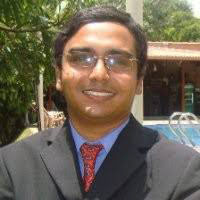 Twenty-one-year-old Yohan Ferreira became the first Sri Lankan to attend the International Space School (ISS) at the U.S. National Aeronautics and Space Administration's (NASA) Johnson Space Center (JSC) in Houston, Texas.
Twenty-one-year-old Yohan Ferreira became the first Sri Lankan to attend the International Space School (ISS) at the U.S. National Aeronautics and Space Administration's (NASA) Johnson Space Center (JSC) in Houston, Texas.
Yohan was among thirty-five students from nineteen countries that attended the prestigious school that provides space-related academic instruction and an introduction to the space industry to international students. The foundation's orientation emphasizes to these students the importance of the worldwide collaboration necessary to open the limitless frontiers of space. Students may use the experiences provided by the ISS in choosing and attaining their academic and professional goals, including those in non-space-related fields.
The first week included lectures followed by question and answer sessions at the University of Houston in Clear Lake. Lecturers included legendary astronauts such as John Young (Apollo, STS-1), medical researchers, flight surgeons, engineers such as Max Faget (designer of the Space Shuttle, Apollo, Mercury, Gemini spacecrafts), managers, and technicians from Johnson Space Center and companies associated with the space program. Lectures covered a wide variety of topics ranging from space law, aerospace medicine, astronaut selection process, space robotics, space science funding, space geography, space geology, logistics, orbital mechanics, Interplanetary mission planning, life support system design, long-duration mission planning to rocketry and spacecraft design.
During the second week, the students worked on site at JSC. They had their own designations, and worked as a member of one of four teams on a simulated First Human International Mission to Mars. The four teams were: Logistics (Green), Getting There (Red), Living There (White) and Working There (Blue). Yohan was the Mission Control Press Officer for the Logistics (Green) team and also responsible for the mission's time line.
The program also involved several tours around the many facilities at JSC, including the world famous Neutral Buoyancy Laboratory (NBL) used to train astronauts in a weightless environment, the Advanced Space Propulsion Laboratory (ASPL) to witness the latest in rocket technology - a plasma engine in operation, Space Shuttle simulators at the Jake Garn Mission Simulator and Training Facility, the International Space Station and Space Shuttle Mock-up Training Facility, the Sonny Carter Training Facility, Ellington Field where T-38 astronaut training aircrafts are based, Rocket Park, the Astrobiology and Astromaterials Research & Exploration Science Institute where meteorites are analysed, the Moon Lab where lunar rocks are analysed, the Space Shuttle Mission Control Center, the International Space Station Mission Control Center and the old Apollo Mission Control Center.
There were also many excursions to locations outside JSC, including the Challenger Center and George Observatory at Brazos Bend State Park, and Moody Gardens - an educational theme park on Galveston Island. A memorable graduation ceremony was held at the Clear Lake Community Center with the participation of the students, host families and special invitees, including several astronauts. The ISS is a program which inspire and motivate students to achieve academic excellence in their chosen fields. The International Space School Foundation was founded in 1994 by Geoff and Annette Mules, and their daughter Kathy Mules Grant.
In an unrelated event, Yohan beat contestants from around the world to win the 2002 Hakluyt Prize, awarded annually by the International Mars Society for the best student letter to world leaders advocating a manned mission to Mars. Yohan sent his letter via e-mail to 319 world leaders and deputy leaders, members of the United States Senate Science Sub Committee, the Council of Europe and the European Parliament. The Hakluyt Prize is named after Richard Hakluyt, the tireless pamphleteer whose writings convinced Queen Elizabeth I and the circle around her to take the policy decisions that made possible the British settlement of North America.
Sri Lankan Airlines gave Yohan a helping hand by providing him a complimentary return air ticket to London, from where he went on to the U.S. to attend the ISS and also to receive the Hakluyt Prize - a Bushnell Voyager telescope and an all expenses paid trip to the 5th Annual International Mars Society Convention at the University of Colorado in Boulder, Colorado. He received a standing ovation from the gathering at the convention banquet after reading his Hakluyt Prize winning letter. Lockheed Martin Corporation sponsored his flight from London to Houston, while Bushnell Performance Optics and the Mars Society sponsored his trip to Colorado.
Yohan has been a NASA volunteer, working as an Education and Public Outreach Coordinator for NASA Quest and several other NASA outreach programs via the Internet, since September 2000. NASA Quest is a Kindergarten to Grade 12 (K-12) educational outreach website based at NASA's Ames Research Center in California. It is designed to interest students, teachers and the public in math, science, technology, astronomy and space exploration, and puts them in contact with experts working in the various programmes of the National Aeronautics and Space Administration (NASA) of the United States. Yohan is the 'Q&A Lead for NASA Missions' at the NASA Quest Question and Answer Project, and is responsible for answering questions from students, teachers and the public related to past, present and proposed NASA manned and unmanned missions. He is part of the Q&A Smart Filter team which liaisons between NASA experts and the public. Yohan is also the Moderator of the NASA Quest Discuss group, a forum for teaching space science in classrooms and distributing information regarding NASA. He is also the Assistant Coordinator of the Student Signatures in Space (S3) Program, sponsored jointly by NASA and Lockheed Martin Corporation and held annually on Space Day (first Thursday in May). The program gives 550 schools worldwide the rare opportunity of flying their students' signatures in space aboard the Space Shuttle every year. His alma mater became the first school from Sri Lanka to participate in the S3 program in 2001.
Yohan, a past student of Wesley College in Colombo, is currently studying for a Higher Diploma in Computer Based Information Systems at the National Institute of Business Management in Colombo. He is also a substitute teacher of speech and drama at the Wendy Whatmore Academy of Speech and Drama in Colombo.
Elected to NCC Inter-faith Relations Post
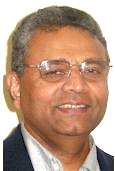
October 8, 2003, NEW YORK CITY -- The Rev. Dr. Shanta D. Premawardhana, a Baptist pastor and a leader in interfaith work in Chicago, was elected Sept. 29 by the National Council of Churches’ Executive Board to serve as the Council’s Associate General Secretary for Interfaith Relations and Director of the NCC Interfaith Relations Commission.For the past 14 years, Dr. Premawardhana has been senior pastor of Chicago’s Ellis Avenue Church (formerly Cornell Baptist Church), and during that time has been active in the Hyde Park and Kenwood Interfaith Council. Founded in 1911, this organization is said to be one of the nation’s oldest interfaith organizations.
From 1996-1998, he served as president of that organization, which currently includes 38 Christian, Hindu, Jewish and Muslim congregations and organizations. He is recognized for his leadership in building relationships across social boundaries that normally divide, for training people in interfaith dialogue and for helping Christian members of the Council reflect on "Removing Anti-Judaism From the Pulpit."
More recently, Dr. Premawardhana has been a leader in the congregation-based community organizing network, the Gamaliel Foundation. Christian, Jewish and Muslim congregations across racial, ethnic and economic lines join in 51 community organizations in 28 states to work together for issues of economic justice and immigrant rights. Dr. Premawardhana also is the vice-president of the Chicago-based Metropolitan Alliance of Congregations, which currently has a membership of about 100 congregations. Recently, these congregations successfully lobbied to pass legislation that allows immigrant students to pay in-state tuition in Illinois colleges and universities. They are also working on legislation to reform education funding, which currently perpetuates wide disparities.
His accomplishments built on earlier interfaith experience, including the insights he gained as founding pastor of the Chicago Ashram of Jesus Christ in Skokie, Ill., a Christian community with an outreach to South Asian immigrants of various faith groups. The Ashram’s programs included small group interfaith dialogues, in which persons of different religious traditions met weekly in each other’s homes, to learn from each other’s journeys of faith.Dr. Premawardhana is Vice-President of the Alliance of Baptists, an NCC member communion. From 1995-98, he chaired the standing committee on Interfaith Relations and was instrumental in helping the Alliance adopt an historic "Statement on Jewish Christian Relations."Of his role as pastor, Dr. Premawardhana notes that his job is "to equip the saints for the work of ministry." Acting on that phrase from Ephesians 4:11-12, he has led members of his congregation in focused efforts to identify the gifts with which God has graced them, and to use their talents in ministries that touch their immediate neighborhood, their city and state. Internationally, he has led the church to develop relationships with churches in Nigeria, Sri Lanka and Zimbabwe.
Among the honors he has earned, the Academy of Parish Clergy, a national organization of Christian clergy, named him 1998 Parish Pastor of the Year. Dr. Premawardhana was born in Colombo, Sri Lanka, and received his seminary education in Sri Lanka and India. He went on to do graduate work at Northwestern University, Evanston, Ill., earning a master’s degree in Comparative Religion: Buddhism and Christianity, and a doctoral degree in Phenomenology of Religions, with a specialty in Hinduism and Christianity.
He is married to the musician and piano teacher, Dhilanthi Fernando, and has three children, Charith, Devaka and Amali.The National Council of Churches is the leading ecumenical organization in the United States. Its 36 Protestant, Orthodox and Anglican member communions (denominations) comprise 50 million adherents in 140,000 local congregations nationwide.
Along with interfaith relations, Council programs include education and leadership ministries, Bible translation, environmental justice, faith and order, church renewal, public policy research and advocacy, research and communication, and work to reduce poverty.
US and Iranian religious leaders seek peaceful conflict resolution -21/02/07
Religious leaders from the US and Iran met yesterday in Tehran to discuss the importance of faith groups finding common ground in peacemaking, particularly in light of the growing political tensions between Western countries and Iran over nuclear power and Middle East politics.
The visit to Iran of a thirteen strong delegation of Christian leaders has been coordinated by Mennonites and Quakers, with ecumenical cooperation and participation.The inter-church National Council of Churches of Christ in the USA (NCCUSA) is represented on the delegation by the Rev Dr Shanta Premawardhana, associate general secretary for inter-faith relations.The three-hour meeting -which went under the title 'Quest for Truth' - was held in the Iranian capital and sponsored by the Islamic Culture and Religion Organization. It was one of a weeklong series of meetings the delegation of US religious leaders is holding with Iranian religious representatives - both Christian and Muslim - as well as political leaders in Iran.
The delegation arrived early on Monday on Monday 19 February 2007 and has since met with the Archbishop of the Armenian Church in Iran and the senior Tehran-based Ayatollah who leads Friday prayers in the capital and is a member of the Iranian Council of Experts.The group is expected to meet with others Iranian leaders during the next few days, including President Ahmadinejad. Their goal is to work with religious leaders in the US and Iran to help ease tensions.At Tuesday's meeting, the presentations offered by representatives and scholars on both sides agreed that although dialogue is important, now is the time for action.
"We need to go beyond dialogue and establish tangible results," said Iranian Ayatollah Dr Monhaghegh Damad of Shahid Behesti University in Tehran. "We need to hold dialogue to eliminate ambiguities and misunderstandings between religions that emerge once in a while and work through them to establish peace.""Inter-faith dialogue strengthens our own theology," added the US National Council of Churches' Dr Premawardhana. "This is a new paradigm that has arrived out of many years of engaging in dialogue." "Peace is the key teaching of Christianity and Islam and this will be realized in our lives," declared Archbishop Sabu Sarkission of the Armenian Orthodox church in Iran. "This is the product of dialogue."The 13-member US religious leaders group includes church members from the Mennonite, Quaker, Episcopal, Catholic and United Methodist traditions.
With the focus is on peacemaking, it is intended that the conversations will be able to broach tough issues and matters of conflict in an honest and constructive way.
A Directorship for Shantha sent by Peter Casiechitty
New York,31 October, (Asiantribune.com): Rev. Dr. Shanta Premawardhana of New York has been appointed as the Director of Inter-religious dialogue and cooperation at the World Council of Churches in Geneva, Switzerland. He will begin this ministry in November. Since 2003, Dr. Premawardhana served the National Council of Churches USA (NCC) as its Associate General Secretary for Interfaith Relations and Director of its Interfaith Relations Commission.
The Rt. Revd. Duleep de Chickera, Bishop of Colombo, who serves as the Moderator of the working group on Inter-religious dialogue and cooperation at the WCC, welcomed the appointment and said that Dr. Premawardhana belonged to a family tradition of Sri Lankan scholars/theologians (his father and uncle were both much respected in Sri Lanka) and will no doubt provide inspiring leadership to the Inter-faith dialogue and work of the World Council of Churches.
Clare J. Chapman, NCCUSA Acting General Secretary, said Premawardhana did much to facilitate in the U.S. "an essential dialogue among faith groups. He helped bring all of us closer together and the mutual insights we gained enhanced both our understanding of other faiths and our commitment to our own. He takes much experience and wisdom to the World Council of Churches."
During his tenure, Premawardhana co-convened on behalf of Christian partners, a Jewish-Christian leaders’ dialogue table, which brought together staff level leaders from the mainline Jewish organizations and Christian denominations in the United States. Often tense – for instance, during the 2004 controversy over divestment of funds from organizations that do business in Israel, proposed by the Presbyterian Church (USA) – Premawardhana insisted that it is particularly during times of tension that religious people must be in dialogue with each other. A similar Muslim-Christian leaders’ dialogue table is presently being planned.
Convinced that a latent racism inhibits Christian relations with other religions, in his writings and presentations, Premawardhana pushed and prodded U.S. churches to examine their continuing anti-semitism, growing islamophobia and religious legitimization for violence.
Emphasizing that Christian theology as a discipline does not take with adequate seriousness the reality of religious diversity, he organized a series of sessions at the American Academy of Religions. He proposed that the time has come when the Christian theological table must include the participation of scholars and leaders of other religious traditions.
At the same time, since the work of interfaith relations must move beyond theological conversations, he advocated for faith-based diplomacy where religious leaders take the lead in diplomatic initiatives, particularly in conflicts that are religion-related and diplomatic maneuvers of politicians are failing. Earlier this year Premawardhana participated in meetings with Iranian religious leaders in Tehran, including a meeting with President Ahmadinejad, at which he challenged the Iranian leader about his comments regarding Israel as well as his denial of the holocaust.
A Baptist pastor and community organizer who did much of his ministry in Chicago, Premawardhana brought significant organizing skills to his work. Recently, a table of religious leaders he brought together organized an interfaith fast to call for an end to the war in Iraq, which took place on October 8, in which thousands of people of all faiths from the USA and several other countries participated.
Advocating that Christians must stand in solidarity with Muslims at a time when the Muslim communities in the U.S. are being discriminated against, he urged churches to learn about the peaceful religion followed by millions of their fellow Americans, so that they can become aware of the distortions about Islam often portrayed in the media. In recognition of his many efforts, the Islamic Society of North America recently presented him with the Interfaith Unity Award.
Having had his seminary education at the Theological College of Lanka, Pilimatalawa, and Tamil Nadu Theological Seminary in Madurai, South India, where he received the BTh and BD degrees respectively, Dr. Premawardhana went on to do post-graduate studies at Northwestern University, Evanston, Illinois, earning an MA in Comparative Religion, and a PhD in the Phenomenology of Religion, specializing in Hinduism and Buddhism. Continuing to live in Chicago, he was the founder/director of the Chicago Ashram of Jesus Christ and pastor of Ellis Avenue Church in the Hyde Park neighborhood for 14 years prior to his move to New York.
Dr. Premawardhana is the eldest son of the late Rev. Cyril and Mercy Premawardhana, and is married to Dhilanthi Fernando, who owns and directs the Taprobane Academy of Music in Cliffside Park, New Jersey. They are the parents of three children: Charith, Devaka and Amali. He is an old boy of Wesley and Trinity Colleges.
Asian Tribune
OBUA Newsletter Dec 2003
Wesley has had mixed success since it began playing rugby union. Over recent years Wesley has improved it’s on field performance beating Trinity College (’02) and Royal College (’03) the traditional ‘leading
rugby schools’ in Sri Lanka. However, the late Dalton D’Abrera’s (the father of rugby at Wesley) legacy lives on in Melbourne. The Rugby World Cup
which is being staged in Australia is an opportune time to profile three of Wesley’s alumni that are actively involved in ‘the game they play in heaven’
in the roles of administrator, coach and referee, right here in Melbourne.
Keith de Kretser is president of the Box Hill Rugby Union Football Club that fields twelve sides – six junior and six senior sides. In this first year in the
chair, he was awarded the Club Administrator of the Year by the Victorian Rugby Union. He played as a schoolboy with the Club and has been a member of Box Hill for thirty two years. His youngest son Stuart captains the under 15 side at the Club and is a regular Victorian State representative. Stuart will be touring with the Under 16 Victorian Schoolboys team at the end of November this year playing games in Sri Lanka, U.K. and Ireland. His Club coach this season is our next personality – Reg Bartholomeusz.
Reg Bartholomeusz’s feats on the rugby field are well known with the pinnacle of his achievements representing Sri Lanka on many occasions. Reg
expressed a keen interest to resume coaching in Melbourne, having given many years of service to his alma mater as head coach in the seventies. He
was invited to resume his coaching career at the Box Hill Club and his under 15 team made the semifinals in this his first year. Our third personality is Binhur Sappideen who has been refereeing for many years in Melbourne at both junior and senior level. Bin claims that he stopped playing rugby due to a collision with our first personality in a practice session at Wesley in the late sixties. He has passed on his passion for the game to his young son Razan who plays with the Harlequin Club. Razan has represented the State of Victoria in the under 12 age group. He is a talented and busy player on the field and plays as scrum-half. Our three personalities have pursued a passion for rugby which they acquired wearing the double jersey on the hallowed turf (gadol surface) at Campbell
Park.
Was born at No. 47, Church Street, Fort, Galle on September 7, 1877. He was educated at Wesley College, Colombo (Pettah) and represented the College Cricket XI under the name of M. M. Muhammad, as he was then known at school. His contemporaries were, C. E. Pereira, who was the captain of the Cricket XI at Wesley, and S.P.Foenander, the worlds official cricket record keeper. Muhammad made an unsuccessful attempt at passing the pre-medical examination before turning to business. He was the Vice Consul for Turkey at Galle and later Consul for Turkey at Colombo during the period 1903 to 1915. He was also a member of the Galle Municipal Council, for twenty five years, during the period 1906 to 1931. later he was a member of the Colombo Municipal Council from 1940 to 1943. he also sat as a member of the Fez Committee and was the founder President of the All Ceylon Moor’s Association for and held that position for a number of years. He, subsequently, held the position of President of the All Ceylon Muslim League in 1945. He represented the Consulta eof Turkey in Ceylon. First Muslim Member for the All Island Seat at the Legislative Council. Senator 1947-1952. In addition, Muhammad was a registered member of the congregation of the Maradana Mosque.
He was Knighted in 1938. Ibrahimiya Arabic College at Galle was founded by his mother, Mrs. O.L.M.Macan Markar, who left endowments for its maintenance. The institution is now being maintained by the firm. Haji Muhammad Macan Markar, Effendi, as he was known then, married Noor Neima Naina-Marikar, the eldest daughter of S.L.Naina Marikar Hajiar, on July 2, 1910, at "Muirburn", Turret Road, Colombo. When the Hijaz Railway connecting Makkah and Madinah was commenced in 1907, Ceylon Muslims presented, at the Grand Mosque, New Moor Street, an address of thanks to the Turkish Consul, Muhammad Macan Markar, for submission to the Sultan of Turkey. A photograph of those who attended this function is still available. Muhammad Macan Markar performed the Hajj piligrimage, in 1906, together with his mother, Aamina Umma, daughter of Aboobucker Mudaliyar, his grandmother Pathumuthu, daughter of Mudaliyar Cassim Lebbe Marikar (Cassile Blanc), his maternal uncle, Avoo Lebbe Marikar and the two ikhwans. S.L.M.H.Abdul Wahab and H.S.M. Izzadeen. They encountered a number of interesting adventures on their journey, including an encounter with a Bedouin tribe while crossing the Arabian desert on camel back, in a caravan. As Turkish Consul, he visited Istanbul together with his brother Abdul Vadood and thereafter Rome, Paris and London on business, in 1909. While in London, he was presented to His Majesty King Edward VII, at St. James’s Palace by Lord Crewe. Muhammad Macan Markar took a keen interest in the promotion of Muslim education and subscribed Rs. 1,000 towards the construction of houses, alongside the New Olympia Theatre at Darley Road, in a project that was estimated to cost Rs. 12,750. He, along with M.T.Akbar and several others, founded the Ceylon Muslim Educational Society Ltd., which established and managed the Hussainiya Boy’s School and Fathima Girl’s School. He realised the disability he suffered from insufficient education and endeavoured to provide his sons the best possible education available. It was in his lavish bungalow, "Villa Stamboul", Galle Road, Colpetty, that the Muslim Ladies of Ceylon, gave an "Arabian Night" reception and presented an address paper to Lady Manning, wife of Governor, Sir Henry Manning, on October 5, 1921.
Muhammad Macan Markar was elected the first Mohammedan Member for the all island seat in the Legislative Council in 1924. He was subsequently elected member for the Batticaloa South electorate in the State Council from 1931 to 1936 defeating E.R. Thambimuthu, and thereby gave the Muslims of the Eastern Province a political consciousness. he was elected the Minister of Communication and Works and it was his deciding vote in the Board of Ministers that introduced Income Tax to Ceylon. He was Knighted in 1938. At a grand public reception given to him in his home town, Galle, he was the first Muslim to openly espouse the establishment of a Sinhala Government, provided that justice and fairplay amongst all te communities in the country was ensured. As a matter of fact, the pro-Sinhala attitude of the All Ceylon Moor’s Association, of which Sir Muhammad was the President, broke the back-bone of the pro-fifty-fifty group. Sir Muhammad’s successor in office, Sir Razik Fareed, carried on this policy with great gusto until the fifty-fifty cry was silenced. Sir Muhammad was appointed a Senator in the first Parliament of Ceylon in 1947 and continued to remain so until his death, after a short illness, on May 10, 1952 (15 Sha’aban 1371H). His wife pre-deceased him. Sir Muhammad made a bequest of Rs. 50,000 towards the construction of a Mosque in the University of Ceylon campus at Peradeniya. He also made substantial endowments towards Muslim female aducation and for post graduate studies for Muslim students.
Hundreds of children in Sri Lanka now sleep comfortably because of a joint program between Rotary International and the Princess Alexandra Hospital Foundation in Brisbane. The children suffer leprosy, mental illness and physical disability and are cared for in several homes in Colombo. They have bee
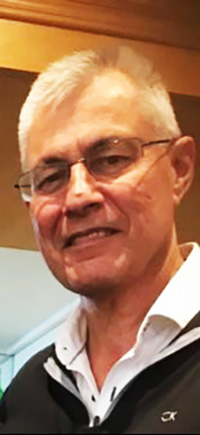 n sleeping without bedclothes and in some cases nightwear. Bill Deutrom, General Manager of Australian Liquor Marketers, and a frequent visitor to Colombo, asked the Princess Alexandra Hospital Foundation to help the children.
n sleeping without bedclothes and in some cases nightwear. Bill Deutrom, General Manager of Australian Liquor Marketers, and a frequent visitor to Colombo, asked the Princess Alexandra Hospital Foundation to help the children.
The Foundation, and Brisbane Metropolitan Linen Service which handles laundry for Brisbane hospitals, arranged for a container of bed linen and garments to be sent to a Colombo Rotary club to be distributed to the children. Donations in Kind (DIK) then organised the shipment. The Sri Lankan High Commissioner, Major-General Janaka Perera, visited Rotary’s distribution centre at Wolston Park Hospital near Brisbane to thank Rotary.
General Perera (see photograph) said hospital beds and other health equipment were urgently needed in many areas of Sri Lanka. As a result of his visit Rotary will also include these items in the shipment. District 9630 Past Governor Bill Waterfield, for DIK, said Donations in Kind had been shipping health and educational goods mainly to Papua New Guinea and the South Pacific for more than ten years. He said: “The total value of shipment is $20 million. We have sent almost 3,000 beds, hundreds of other important health items such as wheelchairs as well as books.
We look forward to working with the Princess Alexandra Hospital Foundation and Colombo Rotarians to bring assistance to these children and others in Sri Lanka.
Addendum: by Dr. Nihal D Amerasekera
I remember Bill as the son of a well respected teacher at Wesley. She taught a generation of students in the 1950's and was much loved. Bill naturally had high standards to maintain and was a quiet dignified person. Since leaving for Australia he has been a great benefactor to the school making numerous donations quietly and without much publicity. I personally acknowledge his generous contribution towards sponsoring the web server and the domain name "wesleycollege.org" which is now the natural universal home of all the popular Wesley College Colombo websites - 1. Double Blue International 2. OBU Australia and 3. OBU (UK) websites. I take this opportunity to thank Bill for his generosity.

William (Bill) Deutrom
Medal of the Order of Australia (OAM) in 2004 Queens Birthday Honours list-
Entrepreneur, Sportsman, Community helper, very loyal and trusted friend sums up this affable true blue (dark and light) old Wesleyite William (Bill) Deutrom’s make-up and character. Willie an expatriate Sri Lankan lives in the beautiful township of Brookfield, Brisbane in Queensland, migrated to Australia in 1965 with his parents and lovable sister Angela. The appointment is in recognition for long standing Service to the Princess Alexandra Hospital Foundation and the Sri Lankan Cricket Foundation of Queensland.
Having joined Wesley in 1950 in lower kinder garden Willie left college in 1965.During these years Willie excelled in sports and in academia, representing Wesley in Cricket, Rugger, Hockey and Tennis. As a Hockey player he excelled in the sport with his fearless goal keeping which helped Wesley to save many a match. I had the privilege to skipper the side in Willie’s first year in 1963, where he achieved a rare honour of representing the Public Schools Hockey team in his first year of senior hockey.
In 1975 Willie qualified as an Accountant after which he achieved Membership of Professional Bodies such as Professional National Account(PNA), Fellow of the Institute of Company Directors(FAICD) and Fellow of the Marketing Institute of Australia(FMIA). In his capacity as a businessman he has held positions as the founding executive director of Australian Consolidated Holdings Ltd, General Manager of Australia Liquor Marketers and a host of others. In year 2002 Willie was admitted to Queensland Hotels Association Hall of Fame and in 2003 he was awarded the Australian Hotels Association Presidents award in recognition of outstanding contribution to the Australian Hospitality Industry. Currently Willie is the Managing Director of Hotel Liquor Wholesalers Pty.Ltd.
Willie and his most charming wife Maureen are blessed with four beautiful daughters, Shannon, Kieryn, Erin and Rhian and their extended family including their handsome grandson William named after the grandfather. It is a great pride and joy for both Charmaine and I, to call Willie, Maureen and the family our very dear and close friends. The generosity and kindness shown by Willie over a number of years to friends, acquaintances and to Wesley alike are boundless. I for one will remember and cherish, Willie and his family for their genuine sincerity and friendship shown to my family and me over the years.
I salute you my friend.
Addendum from ND Amerasekera
The award comes as no surprise. His generosity to his local community old school and country is now well known. As Wesleyites we are proud of this prestigious award. Bill has brought honour to his family, Wesley and Sri Lanka. May God Bless you now and in the years to come.
News from the Net
William (Bill) Deutrom is an entrepreneur, sportsman, and community helper. Bill, an expatriate Sri Lankan, lives in Brookfield, Brisbane, having migrated to Australia in 1965 with his parents and sister. Bill is a distinguished entrepreneur with excellent operational and management experience. As a director, he is involved in decision-making and operations of Infosoft. In 1975, Bill qualified as an accountant and acquired membership in professional bodies such as:
Fellow of the Australian Institute of Company Directors(FAICD)
Fellow of the Marketing Institute of Australia (FMIA)
In his capacity as a businessman he was the founding Executive Director of Australian Consolidated Ltd.
In 2002 Bill was admitted into Queensland Hotels Association Hall of Fame and in 2003 he was awarded the Australian Hotels Association Presidents Award in recognition of outstanding contributions to the Australian hospitality industry. Currently, he is Managing Director of Hotel Liquor Wholesalers Pty. Ltd. Bill was awarded the prestigious Medal of the Order of Australia (OAM) in Queen Elizabeth's 2004 Birthday Honours list. The honor is in recognition of long standing service to the Australian and Sri Lankan communities and the Sri Lankan Cricket Foundation of Queensland.
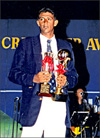
Last year's 'Bata Schoolboy Cricketer of the year' Farveez Maharoof, the former Wesley star all-rounder and captain adds yet another feather in his cap, when on the evening of Thursday November 25, he makes his way amidst a representative gathering, to receive the award for the most Promising Schoolboy Cricketer, from the British High Commissioner in Sri Lanka, Stephen Evans, at 'Westminster House' Colombo.
Memorable and historical as the occasion will be - the much sought after award does also serve to encourage and act as an incentive to young cricketers, giving as well a morale boost to both the recipient and the school he represents.
The award in question, the seventh presentation had its origin in 1998, when it was inaugurated by H. R. H. Prince Charles, to coincide with his visit to share in the celebrations of Sri Lanka's 50th Anniversary of Independence.
On that occasion in 1998, the privilege of being the first winner of the award went to Pradeep Hewage, from St. Benedict's College, in the following year in 1999, it was won by Thomian, Upeka Fernando, in the year 2000 it was, Malintha Gajanayake of D. S. Senanayake College, the year 2001 saw Muthumudalige Pushpakumara of Ananda receive it, in the year 2002 Jeevan Mendis of S. Thomas' was the proud winner, with Sahan Wijeratne of Prince of Wales, taking it in 2003.
This year's winner of this coveted award is the mild mannered unassuming Farveez Maharoof, an outstanding product of Wesley College. Maharoof born on the 7th of September 1984, had his entire education from 1991 at Wesley College - where at quite an early age, he was turning out to be an exceptional cricketer, oozing with talent. In his formative years he did well to captain the under 13, 15 and under 17 cricket teams.
As a fine all-rounder, being a batsman and a pace bowler, he played for the first eleven from 1998 to 2003, captain the side in his last two years. As a tall well set physically built lad, he proved to be an aggressive batsman and determined bowler of pace.
Farveez Maharoof's main scores that stand out are 163 against Prince of Wales, 144 against St. Joseph's both in the year 2001 - 243 not out against Richmond in 2002. 146 and 101 not out against Ananda and Nalanda respectively in the year 2003. Maharoof notched five centuries in his school cricket career, with several outstanding bowling performances as well.
He made the right kind of impression to be on tour with the junior national teams, be it the U 15 and U 17 and also played for the U 19 national team that toured Pakistan and was the captain of the Sri Lanka U 19 side, when the West Indies toured here.
His crowning moment came, when this year while at school he was selected to tour Zimbabwe with the senior national team. Maharoof became the second Wesleyite to do so, the other being Brian Classen.
This apart, Maharoof was a meticulous student and a Prefect of Wesley College, winning the Gihan de Alwis, Memorial trophy for the best all-rounder in the year 2000.
He did well to be selected Schoolboy Cricketer of the year 2003 and as well to be adjudged the best U 19 batsman. In addition he was the recipient of a cricket scholarship under the auspices of BCCSL and its representative, to play for Stanmore Cricket Club in the Middlesex county.
It's to such a fine schoolboy cricketer as this, from Wesley, that felicitations along with the presentation of the award, will take place at 'Westminster House' - a symbolic expression to spur other youngsters to give of their best.
The Pennsylvania State University - Mohamed Faacy Farook of Mechanicsburg has accepted membership in Golden Key International Honour Society and was individually honoured during a recent campus ceremony.
"It is only fitting that a high academic achiever like Mohamed be recognized by Golden Key," said Alexander D. Perwich II, Golden Key's Chief Executive Officer.
"Our members are inspired and motivated by the challenge and not only to be recognized for their outstanding accomplishments but also to make a positive impact on our world through the Society's commitment to service."
Golden Key International Honour Society was founded more than 25 years ago in Atlanta, Georgia and provides academic recognition to college juniors and seniors in the top 15 percent of their class. The mission of the global, non-profit Society is to build global communities of academic achievers by providing opportunities for individual growth through leadership, career development, networking and service. The Society's values are integrity, inclusiveness and collaboration, innovation, teamwork and respect. Golden Key has 335 chapters in the United States, Australia, Canada, Great Britain, Malaysia, New Zealand and South Africa. Membership into the Society is by invitation only, to students in all fields of study.
For additional information visit the Society's web page at: http://www.goldenkey.org
Faacy Farook is the son of Mr. & Mrs. M. C. Farook, Colombo 10, Sri Lanka. He is an old boy of Wesley College and Royal Institute, Colombo.
Seenivasagam Kalaiselvam was appointed as the new Director General of the Sri Lanka Tourist Board with effect from December 23.
An old boy of Wesley College Colombo, Kalaiselvam holds a B.Sc. (Hon) degree from the University of Jaffna. He participated in the UNDP/WTO Fellowship Programme at The George Washington University, USA and was awarded the Postgraduate Certificate of Advanced Tourism Planning in 1989. In addition he has also obtained qualifications in Tourism Marketing, Airline Management and Computer Science. He is a Licentiate of The Institute of Chartered Accountants of Sri Lanka.
He started his tourism career in January 1980 as a Research Assistant in a Tourism research project funded by the International Development Research Centre in Canada. In May 1981, he joined the Sri Lanka Tourist Board as the Market Intelligence Officer. During his 22 years of service in the Sri Lanka Tourist Board he has served in many Divisions and held the posts of the Director/Finance and Director/Plannind and Development. He was the Project Accountant and the Secretary to the steering committee to the Tourism Master Plan during the period 1991-1992. He was also a Senior Lecturer on Tourism at the Sri Lanka Institute of Tourism and Hotel Management
By Professor B. A. Hussainmiya - University of Brunei, Darussalam
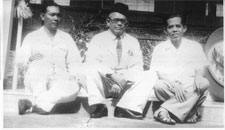 Among the Sri Lankan Malay luminaries, Dr Mohamed Parvis Drahman (1899-1963) stands out as a remarkable person of all times. Through yeoman contributions in every branch of human endeavour in social, economic, cultural, and political life of the community, late Dr Drahman has carved a place for himself as Malay for all seasons. And by his involvement with the activities of the larger Malay world, he also became a Malay for all nations. This article commemorates his entry into the Sri Lankan Parliament 50 years ago as a Malay minority representative.
Among the Sri Lankan Malay luminaries, Dr Mohamed Parvis Drahman (1899-1963) stands out as a remarkable person of all times. Through yeoman contributions in every branch of human endeavour in social, economic, cultural, and political life of the community, late Dr Drahman has carved a place for himself as Malay for all seasons. And by his involvement with the activities of the larger Malay world, he also became a Malay for all nations. This article commemorates his entry into the Sri Lankan Parliament 50 years ago as a Malay minority representative.
Dr M. P. Drahman was born on 5 November 1899 in Colombo to Malay parents whose ancestors had migrated to Sri Lanka two generations ago from the island of Java. He received early education in All Saints College in Galle and later Wesley College in Colombo. After graduating from the Colombo medical college in 1928 he entered government service, a pioneering Malay to enter the noble profession of medicine. After five years he established his private surgery and dispensary in no 15, Rifle Street in the Slave Island ward of Colombo. Thus spurning a lucrative private practice amongst the elite, his set up his clinic among the deprived Malays of the area that began a life long commitment to work for the needy and the down trodden. There he provided care and hospitality not only to the locals but also many foreign Malays, pilgrims and travelers stranded en route and who flocked to seek his service.
While in medical practice in Slave Island, Colombo he galvanized the community for survival and self-help. His forte was in youth leadership and community service. Many were the clubs and organizations devoted to community service that he was a member or a leader. For instance, he took leading roles in such organizations as the Ceylon Malay Youth League, The Malay Progressive Association and all Ceylon Malay Association, All Ceylon Malay Congress and the Ceylon Malay Cricket Club. Also, he helped to form a Malay music group to revive the dying forms of syair and pantun reading in the area with the accompaniment of typical Malay instruments of rabbana, angklung and gong and so on. In his own family circle, through the Uniques club, a band of elite professionals, led by his father in law, M. K. Saldin, a philanthropist/businessman and legislative councilor, he garnered efforts to serve the poor and the destitutes.
A true Muslim at heart, he promoted understanding with other Muslim communities in the island and abroad. As a patron of the original Regimental mosque in the Wekande area, Masjidul Jamiah, he formulated the Mosques endowment fund to help other mosques and especially to improve the Jawatte burial grounds
Besides his philanthropic leanings, he was determined to preserve the distinct entity and dignity of his community. Seeking the special rights of the community, he was in the forefront to demand minority Malay representation in the parliament. His evidence before the Soulbury commission arguing for the minority safeguards in the Constitution is a clear evidence of his conviction.
By representing Malay interests in the Parliament from 1956 to 1959, and from 1960 to 1963 until his demise, he had ceaselessly highlighted the plight of the Malays all over the island, especially in Hambantota and Kirinde to seek redress from the government. His real outlook, however, was much broader than a narrow preoccupation with community issues.
A genial and warm person he was earned him many friends from all communities in all walks of life. In recognition his contributions, the British Government conferred M.B.E on him in 1953 besides the honours came his way from the Malaysian and Indonesian Governments.
Dr Drahman was perhaps the most famous of the local Malays in the Malay world of his time. The linkages he built with Indonesia and Malay Archipelago, the home of the Malays, were many. He had close friends in Malaya, Indonesia, Sabah, Sarawak Singapore and Brunei having played host to many visitors from the region. In fact, before the establishment of formal diplomatic missions, he had been functioning in Sri Lanka as a virtual Ambassador par excellence to the Indonesian and Malay Governments. Many were the overseas Malays in need who flocked to his clinic and later residence in Guildford Crescent seeking his services. Malaysia’s founder Prime Minister Tungku Abdul Rahman and others were among his guests on their sojourn in the island.
During the Indonesian war of independence (1945-1949) Drahman spearheaded the KRIS movement, the Union of Indonesian and Sri Lankan Malays in Colombo as the front organization to support the independence struggle of Indonesia. His clinic doubled up as a chancellery and operations room for several exiled Indonesian fighters. Indonesian Government was especially grateful to the support he lent and invited him as a guest of honor during the first Republic of Indonesia Merdeka celebrations in 1949. Similarly in 1957 when Malaya gained ‘Merdeka’ independence he was again invited by the Malaysians for official celebrations. Dr Drahman’s home at Guildford crescent, Colombo 7, appropriately named ‘Merdeka’ had played host to many international Malay/Indonesian leaders including the late Tunku Abdul Rahman the late Foreign Minster of Indonesia Adam Malik and others. When in 1957 Dr Drahman fell ill in Kuala Lumpur during the Merdeka celebrations, almost the entire Malayan Cabinet ministers headed by the Tunku visited him in his hospital bed in Bangsar Heart Centre.
As much as he valued his own Malay identity, he also was a true Sri Lankan national leader. Above all, he believed in the dictum of unity in diversity, and desired a strong Sri Lanka in which all communities shared the resources to live in blissful harmony. In one of his speeches in the Sri Lankan parliament in 1961 he stressed " if we are to form a single purposeful nation, our task must be to emphasise where we agree"
A devout Muslim, he performed the obligatory Hadj twice, and the second time when he performed Hadj in 1963, he passed away in Mecca to return to his creator in the holy land. He was a happy father to have been survived by wife and five children, three of them followed his footsteps in medicine and carved names for themselves.
They were Sylvain ( Physician) Rievo, (ENT specialist, and Sukarno while the last son Viero became a computer engineer, and the only daughter Kala Bhushana Kartini Mohamed became a prominent broadcaster and media consultant.
Dr Drahman did not belong only to Sri Lanka- He was one of the world Malays whose life and career needs to be studied further to amplify Sri Lanka’s links with the East.
From the Wikipedia
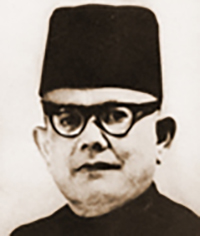 Dr Mohamed Purvis Drahaman (5 November 1889 - April 1963) was a Ceylonese Malay medical doctor and politician. He was the leader of the All Ceylon Malay Congress, and was appointed as Member of Parliament in 1956 and 1960.
Dr Mohamed Purvis Drahaman (5 November 1889 - April 1963) was a Ceylonese Malay medical doctor and politician. He was the leader of the All Ceylon Malay Congress, and was appointed as Member of Parliament in 1956 and 1960.
Born in 1889 in Colombo, Drahaman established a private medical practice in Slave Island in the 1930s. He led several Malay organisations, such as the Ceylon Malay Youth League, the Malay Progressive Association and the All Ceylon Malay Association [2], the All Ceylon Malay Congress and the Ceylon Malay Cricket Club. Drahaman supported the struggle for Indonesian independence. He was made a Member of the Most Excellent Order of the British Empire in 1953.
He died in Mecca in April 1963, whilst performing Hajj for the second time.
From Dr N D Amerasekera
Dr MP Drahman was a contemporary of Hon. Sir O.E Goonetilleke, the 1st Ceylonese Governor General. They were together in the 6th Form at Wesley College during the Henry Highfield era. Thereafter they were contempories in the houses of parliament, serving the people. During the Highfield era the school was at its best. Most prominent politicians, educationists and professionals of the early 20th century were educated at Wesley College. Their names are permanently engraved in the soul of the school to which we all pay homage even today. I have had the good fortune to be associated with Dr Drahman's family through Dr.Revo Drahman who was my contemporary at Medical College. Subsequently he served as an ENT Surgeon in Colombo until retirement and beyond. I appreciate very much their friendship, kindness and generosity over the years. The Drahmans have made a tremendous contributions to society and life in Sri Lanka. Their desire to remain in their country of birth all through the dark days of the ethnic conflict show their tenacity and love for Sri lanka.
Court orders millions in damages
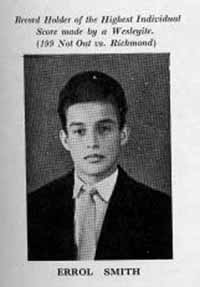
Giving judgment in three civil suits filed by three foreign nationals, claiming damages for injuries caused in a near fatal accident at a rail crossing, due to the negligence of the driver attached to a leading hotel, the Colombo District Judge ordered to pay a massive Rs. 28 million as damages to the Australian Plaintiff father and his two children.
District Judge Aruna C. Ranasinghe ordered Tangering Beach Hotel and its driver, to pay the said damage to the three Plaintiffs Rodney Errol Smith and his two sons Andrew Errol Smith and Ryan William Smith.
The Plaintiffs, residents of Plummer Road, Mentone , Victoria , Australia , in three separate plaints, had cited Tangering Beach Hotel, Mercantile Investment Ltd. of 236, Galle Road , Colombo 3, and Maggonage Wimalasena of Gramodaya Mawatha, Kalutara South, as Defendants.
Rodney Errol Smith, in his plaint, stated that while holidaying in Sri Lanka , he, along with his two sons, were provided a car with a driver, by the Defendant hotel. While driving on January 8, 1999, the Defendant driver, at Maunangoda Road rail crossing at Hikkaduwa, knocked onto a Colombo-Galle train, causing grievous injuries to him and his two sons. Mr. Smith, a football coach by profession, claimed that his injuries included a compound fracture of the left cheek bone and damage to his right ear, resulting in deafness. He complained that, at the time of the accident, he was earning US$ 24,000 (Rs. 1,807,680) per month, which he lost due to the accident.
His 24-year-old son Andrew Errol Smith stated that, at the time of the accident, he was working as an apprentice carpenter earning US$ 11,000 per mensum. He claimed that in this accident he received injuries to his head, chest and left upper limbs, estimating total damage at US$ 240,000.
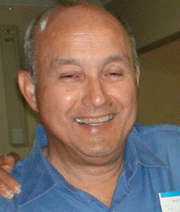 The third Plaintiff, son, Ryan William Smith, a professional sportsman, stated that the accident caused him to suffer severe mental agony and he was experiencing nightmares. He had estimated the damage at US$ 9,942, 240.
The third Plaintiff, son, Ryan William Smith, a professional sportsman, stated that the accident caused him to suffer severe mental agony and he was experiencing nightmares. He had estimated the damage at US$ 9,942, 240.
The three Plaintiffs stated that the accident was solely due to the negligence of the driver, driving at excessive speed, without due consideration to the safety of the Plaintiffs. They complained that the Defendant hotel should have exercised care to transport the Plaintiffs up to the place they should have disembarked.
Filing objection, the Defendants claimed that there was no cause for action against them.
District Judge Anura C. Ranasighe, in his judgment, observed that it was necessary to consider the protection of the tourism industry and the Court had to act fairly. He stated that the Defendant hotel and the driver had not taken proper action to protect the Plaintiff tourists. He also stated that the damage caused to the Plaintiffs could not be compensated in terms of our country’s currency rates.
Court held that there was no cause of action against the second Defendant, Mercantile Investments Ltd. and ordered the other two Defendants to pay Rs 12 million to the father, Rodney Errol Smith, Rs 10 million to Andrew Errol Smith and Rs 6 million to Ryan William Smith.
Links to further reading
On Lanka's Tsunami victims at MCG fundraiser
11/06/2005 05:00PM
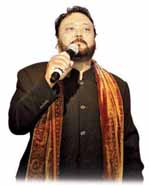
Toronto, Canada - Alston Koch needs no introduction to the world of music. Having captivated audiences and dignitaries from around the globe, Sri Lanka’s very own and once Asia’s Pop Guru, is ready to belt it out yet again. Having migrated to Australia in 1970, Koch at 54, is sounding better than ever. I met Alston Koch and interviewed him when he toured Dubai, the United Arab Emirates in 1993.
Having played with the Jetliners as a teenager, Gabo & The Breakaways and the Esquire Set (Sri Lanka) in the late 1960s, Koch is today the managing director of Fior Drissage, a premier jewelry store in Australia. Koch recently hit world news headlines in over 16 countries with the world’s first diamond and gold cricket ball that was brought to Australia, to celebrate, the start of the cricket season and the opening of his jewelry store. Sri Lankan spin king Muthiah Muralitharan was a special guest at the glittering ceremony Down Under.
Koch a lover of cricket was a special invitee on Monday night at the swanky Melbourne Cricket Ground (MCG) to witness the ground-breaking match between Asia Vs The World. The game was played to a capacity audience of over 75,000 people and it raised $14 million for the Tsunami relief fund. “I was sitting with the Australian Prime Minister John Howard in the famous ‘LEGENDS ROOM’ with the Chairman and President of the ICC, Malcolm Speed, Chairman Cricket Australia, Bob McKinnon amongst a whole crowd of dignitaries.”
“I spoke with the PM for quite awhile and he was most sympathetic towards Sri Lanka. We also discussed the ‘Diamond Cricket Ball’ amongst many other things and he was a very patient and reasonable man being disturbed almost every minute for autographs by the passing cricket greats,” Koch told The Sri Lankan Anchorman.
Koch is also actively involved in raising money for the Tsunami victims in Sri Lanka. “I have been approached by the Sri Lanka association here in Australia to do a series of concerts in Sydney, Melbourne and Brisbane.” “Being the only Sri Lankan born with four International Awards and three ‘Gold’ records to my credit I thought it would be the only way to give something back to my homeland and the displaced and suffering people of Sri Lanka.”
“There is also a discussion of releasing a CD of my songs which I will donate ‘free of charge’ to the cause,” Koch said. A student of Wesley College in Sri Lanka, Koch married former 1970 Miss Ceylon, Yoland Ahlip. They have a son James 23, and daughter Danielle, 19. Singer/songwriter and record producer, Koch is the only Sri Lankan born solo artist, signed to an International record label (BMG/RCA) with international ‘chart success’ in most territories of the world.
He began his career in Ceylon singing with The Jetliners. After moving to Australia, he formed his band Darktan and recorded three international hits for RCA. His tours to international arenas around the world were first with Darktan and then S’witch. He was later to perform as a solo artist on BMG/RCA and EMI, which led him to hit London, Europe, Australia, Asia and the Americas. With Darktan, Koch appeared on all popular TV shows in Australia, including the top rated ‘ABBA TV Special’ aired worldwide. He was also the pioneer of disco music in Australia and was hailed as ‘Asia’s King of Pop’ in Indonesia, Malaysia, The Philippines, India and Thailand, entertaining the monarchy and presidents’ of the territories, he toured time and time again.
His first major hit Disco Lady propelled him into the pop rankings globally and earned him his first gold record. Disco Lady won him the ‘best new talent’ 1979 International Disc Jockey Association Award. Four Platinum A.R.I.A awards, two gold discs, 18 singles three major albums and 12 internationally released videos later, Koch survived! He began his recording career with RCA’s Living Sound Records a subsidiary record label started by then GM of Channel Nine George Chapman and entrepreneur Gene Pierson. The first song released on the label was Don’t Stop it Now written by Errol Brown of Hot Chocolate fame and recorded by Koch & Darktan. The flip side - Kings Of Soul written by Koch, received more airplay on radio stations throughout Australia .
He appeared on all TV pop programs such as Bandstand, Countdown, Sound … etc., promoting Hot Chocolate’s ‘You Sexy Thing’… You Sexy Thing became an instant hit and Koch & Darktan rushed into the studios to record All the people sing this song. This track, a reggae hit written by Koch & Darktan, released on RCA’s new label Laser records, was the start of a radical change in the line-up. With professional direction and more demands from other states for the band, a tour of Australia with record-breaking performances in Melbourne, Adelaide, Perth, Cairns, Brisbane and Newcastle followed. The first big gold record written by Alston & Chris Connelly in a garage in Floreat Park, Perth, was initiated and the disco bandwagon began in Australia. Appearances on Australia’s premier TV show Countdown with the Bee Gees and The Commodores, were followed on Channel 7’s Sounds Unlimited & Thank God Its Friday on Channel 10. Alston introduced The Bus Stop, a crazy trendy dance routine at the time when performing the song on Bandstand.
A new song, "sland In The Sun," was written and released and after more tours and performances abroad…Koch decided to disband the group and pursue a solo career. "Gimme That Banana" was released on RCA in some territories and on Cinevox in Europe followed by the Top 40 Chart success in Italy. By then, he had arrived as a solo artiste. In fact the song became the National Anthem of Coffs Harbour, a city of New South Wales and the Mayor of Coffs Harbour, presented him with a key to the City. More releases and international touring took in a major part of the Asian Continent and its neighbors followed. "Closer To The Phone" and "Vanishing Lady," a magnificent version of Danny Boy received major airplay throughout the territories. RCA released another album called After Darktan.
Koch was commissioned by the Kevin Parry Group to write the album for the Defence of the America’s Cup - The Australian Yacht Challenger Kookaburra. This was a lifetime achievement for Koch, as he had to write, record, perform and produce an album in a month to coincide with the races for the Cup held in Fremantle, Perth. He began the most ambitious promotional campaign in his career with appearances on MTV in America and almost daily spots on TV and radio on a worldwide basis. The music video for the Kookaburra song was played on every live TV network in Australia and throughout the world including CNN and BBC. The album is now a collector’s item. A release of the single I Want Your Love followed and more performances led Koch on tours to Scotland, London, Dubai, Bombay, New Delhi, Sri Lanka, Kenya, Bangkok, Bali, Jakarta, Singapore, Kuala Lumpur, Penang …and finally Australia…! After a long sabbatical in Sri Lanka, a change of residence from Sydney to Melbourne and an extended ‘break from music’ - Alston has re-entered the studios in Australia and is ready to tour the world again….! Koch’s feats and successes in the music industry have been phenomenal to say the least. He has put Sri Lanka on the global stage. The Sri Lankan Anchorman is proud and honored to feature this superstar. And in Koch’s own words: “Not bad for an old codger.”
ACHIEVEMENTS: 4 Aria accredited ‘Platinum’ Awards; 2 Aria accredited ‘Gold’ Awards; 16 International Music Videos released 1980-2001; 28 releases in 16 territories around the World; 17 years with BMG/RCA (Worldwide) WHAT THEY SAID: ‘Alston & Dartan’ is Australia’s leading & Original Disco purveyors’-Glenn. A. Baker/Rock Historian, Australia ‘Try Again’ is one of the best songs released in England this year…’ Mickie Most/Dave Most…legendary Music Publisher/ London. ‘Still one of this country’s most undiscovered talents, Alston is Asia’s answer to Elvis’ Ben Mitchell…People Magazine (worldwide) ‘Danny Boy’…The best version I’ve heard…. ‘ Donnie Sutherland’ Channel 7.
[Reproduced courtesy of The Sri Lankan Anchorman and Dirk Tissera].
From the Dutch Burgher Union
KOCH, Alston, born Slave Island, Colombo Ceylon. He was educated at Wesley College Colombo...In Sri Lanka (Ceylon then) he became the lead singer with Ceylon's celebrated and most popular group THE JETLINERS & toured the Sub Continent with them. He immigrated to Sydney, Australia in January 1971, & was most successful in the entertainment and professional music industry while recording for RCA Records and the Australian TV Network Channel 9's "Living Sound" recording label.
Currently a Permanent Resident of America Alston carried away The Best Actor award at the SIGNIS ASIA FILM AWARDS in 2109 for his role as Father Matthew Pieris in the award winning film ACCORDING TO MATTHEW. The Film also won the BEST FILM at the PRESIDENTIAL AWARDS in 2019. He was also a recipient of the GLOBAL ENTERTAINER OF THE YEAR & SRI LANKAN OF THE YEAR at The DERANA AWARDS held in Sri Lanka in 2018. In Australia, he formed his band DARK TAN performing, recording & composing three international hits on the RCA label. He has performed internationally in most countries of the World. A regular on Channel 9's BANDSTAND his band performed with ABBA on the BEST OF ABBA TV Special in 1977. One other notable appearance was during 'The Stars & Stripes Concert' in 1976, performing under the Sydney harbour bridge on a floating pontoon for Radio 2SM. Rock Brains Of The Universe and music historian Glenn.A.Baker has said that 'Alston & Dark Tan' were the originators of Disco Music in Australia.
Since 1975 he has released 21 singles and 4 albums through record labels such as RCA, BMG, EMI and Sony. In 1986 he was selected and commissioned by the Australian Task Force to write, produce and perform the America's Cup album, The Kookaburra Connection with the theme song "Kookaburra" released both as a single and music video broadcast during the race. His first self-written major hit, "Disco Lady", earned him his first gold record. The song also won him and Dark Tan the 'Best New Talent' at the 1979 International Disc Jockey Association Awards (Before the ARIA'S ) and that same year Dark Tan won Australia's Observer newspaper's 'Best Disco Band' award.
The Daily Mirror (Australia) presented them with the Best Disco Band Award in 1978 and the producers of the Channel 10 TV show Thank God it's Friday presented the band with a Gold Disc during the performance of "Disco Lady". He received his first ARIA (Accredited Award) for Melissa 'Read My Lips' (1990). Three Gold Awards and one Platinum Award from ARIA (accredited) and a recipient of a Gold Disc from RCA/Laser Records in 1978 for "Disco Lady". Since 2007, he has been the Ambassador for Tourism for Sri Lanka. In the same year, he wrote and performed an official song for The Sri Lankan cricketer and world record holder and world champion Muttiah Muralitharan. He was often lauded in the Australian and Asian media as "Asia's King of Pop" or "Pop King of Asia" after gaining international success in the late 1970s. He has performed worldwide and achieved international success in Australia, Indonesia, Thailand, Malaysia, Singapore, India and Sri Lanka among other places.
He received the State of California Senate’s Certificate of Recognition and Certificate of Special US Congressional Recognition for improving the lives of the communities in America. In 2008, he wrote a song about climate change for a United Nations WTO presentation in London. The song was also presented by Geoffrey Lipman Chairman of ICTP at the 'Live the Deal Climate Change' conference in Copenhagen to all the World's leaders. He is the Goodwill Ambassador for the campaign, and the song has been promoted globally by ICTP in their campaign for green growth. Barbara Follet (Minister of State for Great Britain) certified it as 'A gift in song to the world suffering due to Climate Change' while the song received a standing ovation when performed by him.
He was commissioned by Cricket Australia to sing the National Anthem at the One Day International Cricket matches and the important Boxing Day Test. In 2009, he was appointed to the committee for the Cricket World Cup tournament staged in India, Sri Lanka and Bangladesh, and was the official 'GOODWILL AMBASSADOR' for the tournament. In 2010, he was inducted into the Hard Rock Hotel's 'Hall of Fame' at a ceremony in Pattaya, Thailand, when the album, Kookaburra was installed on the venue's 'Golden Wall of Memorabilia'.
In April 2012 his latest album "Don't Funk With Me" written and produced by Alston & the Sherifs, debuted at No. 42 on the official ARIA top 50 Albums chart, eventually peaking at No.16. He was also the first Australian recording artist to launch a single (official release) at an International Cricket final when his song "Soul Sounds" (From the album Don't Funk with Me) was launched during the Australia Vs Sri Lanka final. Member of The Grammy Academy (U.S.A). He is Member of The Australian Performing Right Association.(APRA), Ambassador for Climate Change (I.C.T.P),Ambassador for Sri Lanka Tourism, Member of PPCA (Performing & Publishing Copyright Association of Australia), Member of AMCOS (Australasian Mechanical Copyright Organisation), Ambassador for FAMILY FILM AWARDS (USA) for Australia, Ambassador for The ARTS FOR PEACE FOUNDATION (U.S.A) Award for the Global Entertainer of the Year 2018 - Ada Derana Sri Lankan of the Year.
He was the Lead Actor in the Film ‘According to Mathew’, he played the lead role opposite Bollywood star Jacqueline Fernandez. Executive Producer for ‘Impact Earth’, a Hollywood movie released worldwide in 2015 for Alta Vista Entertainment, Associate Producer: ‘The Road from Elephant Pass’’ (2011) (Wikipedia & Contributed)
By Maxie Kariyawasam
Kindly sent to me by Peter Casiechitty
Whenever Russel Harmer walked into the field, one could sense an aura of excitement among the spectators. Be it with the bat or behind the wickets, Russel had the uncanny ability of simply making things happen. Aggressive batting and slick work behind the he stumps, changed the course of many a game much to the delight of the onlookers and often brought sheer despair to the opposing sides.
Russel learnt the basics of his trade while still a tiny tot at Wesley College when under the guidance of his first coach Mr. Lionel Jayasuriya. Russel was to have a meteoric rise from the under 12 sector stretching up to the first XI via both the U-14 and the U-16 segments. Representing the College Senior team during the last two years of schooling, Russel playing under Everad Schoorman and Donald Thurairatnam, set the school cricket scene alight with some superlative displays both with the bat and behind the sticks. His innings for Wesley against Ananda where he treated the opposing bowlers with utter disdain to score a magnificent 117 will long be remembered by those who were fortunate to witness this gem of an innings. Russsel’s extraordinary talents was to earn him a place in the 1964 and 1965 combined Colleges teams that included Sunil Fernando, Sarath Seneviratne, A.G. Perera, B.Reid, David Heyn and Anura Tennakoon, all outstanding schoolboy stars of yesteryear. While still in college, Russel turned out for Bloomfield C.C. and in his first outing, playing in a Daily News Trophy Match against Colts C.C. scored a scintillating century, which saw him being immediately drafted into the Sara Trophy side.
On leaving School Russel joined Rajendrams Ltd, later to be known as Maharaja’s Ltd and soon realized that he made the correct choice as far as employment was concerned due to the patronage he received form Mr. Rajamahenderan who also went on to recruit a galaxy of cricketing stars which made Maharajah’s a force to be reckoned with in Mercantile Cricket. Russel captained the Maharajah’s team in 1970/71 and had under him such renowned cricketers as Niel Chanmugam, Mervyn Peiris, Ralston Burke, Everard Schoorman, Srinath Silva, K.M. Nelson and his own brother Mervyn. Touring India and Malaysia with the Maharaja’s team Russel showed his calibre with a divesting knock of 100 runs against Malaysia out of a total of 195 for two wickets. Continuing to turn out for Bloomfield in heir first class matches, Russel was once involved in a mammoth stand of 297 runs for the second wicket with A.G.Perera against the B.R.C. Russell’s contribution was a blistering 174 and Perera’s a grand 104 not out. He then went on to captain Bloomfield with distinction.
National duty
In 1972, the Pakistan team led by Intikab Alam toured Sri Lanka and Russel was called upon for National Duty on the merit of his outstanding performances at club level. This writer distinctly remembers Russel coming for the match using the poor man’s conveyance the bus, while his more affluent team mates made it to the grounds in their own vehicles or were driven there by friends. Incidentally, another Sri Lankan great Duleep Mendis made his debut together with Russel in this match. In 1973 the M.C.C. team captained by R. Lewis took on Sri Lanka skippered by Michael Tissera and Russel was once again called up to don the Sri Lanka Cap.
Cold storage
After this encounter, Russel was for some strange reason confined to ‘Cold Storage’ by the National Selectors, although he continued to represent the C.C.A president’s XI in Gopalan Trophy matches against Madras. However, Russel literally fought himself back into the Sri Lankan team with a forceful knock of 132 for Mercantile Cricket Association against government services in the Robert Senanayake Trophy in 1975 and booked a berth for the Indian tour for three unofficial tests that followed.
Final appearance
This preceeded Russell’s final International appearance against Tony Greg’s Englishmen in 1977, which side included Mike Brearley, Bob Woolmer, Bob Willis, Derek Underwood, Derek Randal, Allan Knott and Dennis Amiss, to name a few. In 1978, Russel turning out for the SSC in the premier Division match against Moratuwa CC claimed seven victims behind the stumps and followed this up in 1980 by repeating this very same feat against Saracens SC, thus joining a select band of 18 wicket-keepers who have performed likewise at club, Sheffield Shield and county levels, including the legendary Australian Wally Grout. Russel also set a record in the very first six a side tournament held by the B.R.C. when he clobbered an electrifying 24 runs in a single over.
Highly productive
Russel’s highly productive cricket career could be attributed to the fact that he hailed form a cricketing family. His father, the late Granville was a formidable opening bowler who represented Govt. Services for many years and his brothers Mervyn and Granville Jnr. were gifted cricketers who shone at both college and club levels.
Russels’s cricketing genes appear to have passed on to his son Peter who was himself a crack wicket-keeper/batsman and past Josephian captain now domiciled in Australia. Wesley demanded a hectic sum of money after all the Hamers had done for the school.
Perhaps the most emotional incident in Russell’s cricketing life would have come when he and his son Peter opened batting for the SSC in a Daily News Trophy encounter. Apart from being emotional this father and son opening combination is perhaps a unique occurrence in Sri Lankan Cricket.
Russel is currently in charge of the Ketharama School of Cricket and is extremely grateful to the former Minister of Sports Jeevan Kumaranatunge, Commander H.W. Silva, Director, Mr. Sooriyaarachchi, Manager, Mr. Jayantha Dharmadasa and Mr Duleep Mendis for the invaluable assistance and advice given to run this venture successfully.
He also expresses his deep gratitude to Mr.R. Rajamahendran of Maharajah’s for being his benefactor and guiding both his official and cricketing careers. This then is the saga of Russel Harmer who adorned the cricketing fields of Sri Lanka and abroad, generating a brand of excitement that very few others could emulate.
Addendum by Peter Casiechitty
I want to add that he was paid Rs 6.500 as a full time curator while a lesser known cricketers was paid Rs 25.000 for a similar job at Wesley. This was a shameful act by our management at the time. Russell's services at Wesley were terminated as he spoke out about poor accounts and other issues. When we talk of Justice and Charity, let us as Wesleyites look into our mirrors and see our hypocrisy. We cannot ever forget Russell's immense contribution to cricket at school and his camaraderie and friendship. I hope the present OWSC will recognise the injustice and make amends.
By Keith de Kretser

It is indeed a rare event to be invited to attend the 100th birthday party of a person. In this day and age where we read about so many people dieing so young it is indeed a unique phenomenon to have survived for so long. So it was, that I had the privilege and pleasure of attending the 100th birthday party for Vernon Karl Lorensz Achilles – “Uncle Vernon” to many on Friday 26th October 2007.
An overcast spring morning and light rain did not dampen the spirits and bon-homie as about 60 family and friends gathered to celebrate this wonderful milestone with “Uncle Vernon”. The years have caught up with him and he now lives permanently in a Nursing Home not far from his family as he needs the care and attention to make sure he is comfortable. He is confined to wheelchair but he looked resplendent dressed up in a dark suit and tie, a full head of short cropped silver hair giving him a youthful appearance which belied his 100 years as he smiled and extended his right hand to greet the guests whilst the other hand was clutching a message from Queen Elizabeth. His birthday cake was surrounded by cards and messages from local dignitaries such as the Governor General of Australia, the Prime Minister of Australia and the Premier of the State of Victoria.
When one reflects on the fact that he was born in 1907 and when one puts it in the context of world events at the time, it is quite interesting and fascinating reading. Other famous personalities that were also born in 1907 are these famous stars of the silver screen Gene Autry, Barbara Stanwyck, John Wayne, Katherine Hepburn, Ray Milland and Buster Crabbe. Also from an Australian slant, famous Australian legend Sir Weary Dunlop was also born in the same year.
News events that changed the course of history that were of significance in 1907
1. Britain grants dominion status to New Zealand
2. German neurologist Alois Alzheimer, 43, uses special staining techniques to uncover cerebral abnormalities
3. Albert Einstein postulates E=mc2
4. The Cunard Line's S.S. Lusitania makes her maiden voyage
5. The Meccano Co. started by Liverpool-born bookkeeper Frank Hornby, 44, markets a toy construction set.
6. France's l'Oréal perfume and beauty product empire has its beginnings
7. The Hoover Vacuum Cleaner has its beginnings as an electric suction device for home use
8. The first cabs with taxi meters begin operating in London
9. The famous Neiman-Marcus Fashion Emporium opens its doors for the first time in Dallas, Texas.
10. Oklahoma becomes the 46th State of the United States of America
11. Rudyard Kipling wins the Nobel Prize for Literature
12. The Bondi Surf Bather's Lifesaving Club is formed at Bondi Beach, Sydney, the first of its kind in the world.
“Uncle Vernon” can claim the honour of being the oldest living Wesleyite in the world and is the father of Dallas and Delmer Achilles who were also Wesleyites. When one considers that Wesley College is 133 years old and Uncle Vernon 100 years old, it puts into perspective how significant his life has been. A proud Wesleyite he always reminisced of his days in the Highfield era. Between him and his sons, they have been associated with Highfield, Cartman, Oorloff, Nonis and Wirasinha as Principals of Wesley.
It was a wonderful gathering in a very confined space because of the inclement weather. As flashlights from the cameras clicked as many were trying to capture a special moment with Uncle Vernon, one could not help but think there was a celebrity in our midst. Uncle Vernon was a celebrity indeed who took all the attention and love that was around with grace and responded accordingly to the many good wishes.
As it was a lunchtime party, the aroma of fresh hoppers being made for our consumption got all our taste buds aroused, so Uncle Vernon’s birthday cake was brought in front of him and all joined in singing Happy Birthday before he cut the cake and his great grand children blew out the candles. Lunch was served with hoppers, egg hoppers, chicken curry and katta sambol hitting the spot and especially Uncle Vernon who loves hoppers enjoying the meal. After everyone had eaten, Dallas his eldest son who had recently celebrated 50 years in the entertainment industry, pulled out his trumpet and played a wonderful rendition of “Oh my Pappa” which brought a tear to the eye of many, particularly his four children who were moved by this wonderful tribute.
As many chatted and spoke fondly of their experiences with Uncle Vernon and his family, one could appreciate how enriched his life has been with having met so many people in his lifetime and seen the world change from those humble beginnings in Kolonnawa, Sri Lanka to Melbourne, Australia. A quiet spoken man of simple faith, it was wonderful experience to be present and to celebrate his 100th birthday.
Profile of Vernon Karl Lorensz Achilles
Born 26 October 1907 Vernon was born in Kolonnawa a year after Wesley moved from Maradana to its new premises at Karlsruhe under the Principalship of Reverend Henry Highfield. He began his schooling at St Matthews on 2nd August 1912 and after he completed his primary schooling he joined Wesley College in 1917. A keen sportsman he played Cricket. His interests included reading, chess and singing and he sang in the College Choir. He was a keen participant in singing competitions. When his family shifted to Colpetty, Vernon a staunch Anglican joined the choir at St Michael’s and All Angels and was a regular attendee at Sunday School where he gained much knowledge in Scripture. His knowledge of scripture resulted in him winning the Methodist Scripture Certificate at Wesley College over two years. He was a member of the 2nd and 8th Colombo Scout Troops.
At the request of his parents he left Wesley in 1923. His schooling at Wesley was in the Highfield era and one of his most treasured possessions which he still has today is his school leaving certificate signed by the Saint of Karlsruhe – Rev Henry Highfield. See http://www.wesleycollege.org/vernon.htm
On leaving school he joined as a Junior Clerk with Vavasseurs and Company in 1925. His sporting interest resulted in the formation of their company cricket team which participated in an Inter-Commercial competition where he gained a small reputation as a handy spin bowler. In November 1927 he began his long association with the Ceylon Railways as a Guard where he served for 36 years until 1963 rising to the rank of Head Guard. Whilst living in Mount Mary he also served as General Secretary of the Railway Institute in 1961 and 1962.
Vernon married Dulcie Van Buren on 6th December 1941 and they had four children - Dallas(Wesleyite), Dalrene, Orianna & Delmer(Wesleyite). Vernon and Dulcie migrated to Melbourne in 1978. Always an active person, on arriving in Melbourne he worked as a caretaker of a school until 1989 when he was 81 years old. Socially, Vernon was an active member of the Colts Cricket Club being elected Billiards Secretary until he migrated to Australia in 1978. He is also possibly one of the oldest members of the YMCA having joined in October 1927 on his 20th birthday and is still a member today. Vernon continued his community interest and was an active member of many Sri Lankan Community Clubs and Associations and Elderly Citizen Clubs in Melbourne, always giving generously of his time in various voluntary positions. He was a member of the Wesley College OBU Australia Branch and would always attend functions and the social cricket matches with Royal College and St Thomas’s College Old Boys Associations in Melbourne. When the OBU Australia Branch introduced a Senior Members luncheon, Vernon looked forward to meeting Old Wesleyites of senior years and reminiscing of the good times at Wesley, the Railways and the life and times in Mount Mary. For many generations of Wesleyites, their family links with the Ceylon Railways and Mount Mary enriched the folklore and ties that bound the community to the College.
Sadly in 1995, Vernon lost his wife Dulcie. However they were blessed with 6(3 boys 3 girls) grandchildren and 6(4boys, 2 girls) great grand children. In September 2006 after having had a fall and being hospitalised, Vernon was moved into a nursing home.
The key to Vernon’s longevity could be due to having ridden a push bike till he left Sri Lanka. Many Wesleyites may recall Vernon riding past the College or his local neighbourhood on errands or to work and even to Campbell Park to watch Delmer turn out for the 1st Eleven. He was also a firm believer in the saying - “everything in moderation”.
Vernon has been a generous and loving father, grandfather and great grandfather and is much loved and respected by his family and friends. A quiet spoken god fearing gentleman, may he through the grace of God be around to celebrate many more birthdays in the future
A Message from the Principal of Wesley
M. A. P. Fernando - Principal Wesley College
By Trevine Rodrigo in Melbourne
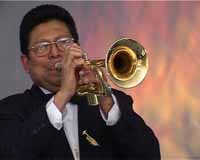
Evergreen trumpeter Dallas Achilles celebrated 50 years in the music business in style taking a trip down memory lane at a musical extravaganza featuring some of Sri Lanka’s best musicians of yesteryear at the Grand Hotel in Wantirna, Australia.
Among a galaxy of performers invited by Alston Koch, who was instrumental in drawing in the invitees to honour Dallas, were the legendary line- up from the 50’s and 60’s comprising, Des Kelly, Conrad de Silva, Malcolm De Kauwe, the latter a respected performer in Perth over the past 27 years, and Claude Selvaratnam who had the audience teary and spellbound with their breathtaking performance.
Dallas Achilles
They were ably backed by guitar maestros Milroy Passe de Silva and Tony Fernando, with famed saxophonist Ernie Walker, Dallas’ Anglo Indian partner Derek Stewart, Elmo Mulholland, Eddie James, Rob Foenander, and among the younger generation, Cathy and Peter Menzies and Andrea Marr appearing as guest performers for the night. Incidentally, Cathy and Peter Menzies are the offspring of legendary musician Tom Menzies who was Dallas’ guru and mentor in his formative years as a trumpeter. Much like their illustrious dad, they were a class act.
There were also the musical comedy acts performed by Chris Pietersz and Arthur Speldewinde that had the crowd in stitches. I caught up with Dallas after his night of nights to capture some of his experiences as he journeyed through five decades in the music industry. He spoke of the days as a lad in Mount Mary where his dad who was a railway man, moved with his family to the railway quarters in Borella.
“My first real gig was in September 1957 where as a 16-year-old, I sang at the Christian Guild for the first time,” he recalled. His talent was soon noticed and before long he found himself moving into the mainstream of Sri Lanka’s music scene being hired by the biggest man in showbiz in the country, Donovan Andree.
Dallas Achilles has been a member of almost every single band of note in Sri Lanka especially the famous combos such as Raddy Ferreira Combo, Adrian Ferdinands Combo, Helen Lucas Combo, Peter Prins Combo, Rex de Silva and the Rhythm Dukes, Gabo and the Breakaways, and the ever famous Jetliners.After migrating to Australia in 1974 with his beauty queen wife Sita, (nee Gunaratne), he played at some of the biggest night spots in Melbourne notably the Swagman, teaming up with Ernie Walker, Tyronne Senn, Felix Fernando, Conrad de Silva and Milroy Passe De Silva who were other well known Sri Lankans to perform at this venue.
At 66, he still enjoys turning up for Replay 6 at their endless dinner dances in Melbourne proving beyond any doubt, that music is a talent that never dies.
From the Sri Lankan Guardian - Fifty Years of Music
A great musician of Sri Lankan origin will celebrate his fifty years in music with an evening bound to be rich in melodic reminiscence and rhythmic nostalgia September 29, 2007 in Melbourne, Australia. He was one of the many gifted people who became a loss to Sri Lanka when the country embarked on a racial and religious paranoia.
Dallas Achilles who was a member of the great jazz and band team, The Sharps, migrated to Australia and became a live wire of not only the Sri Lankan community there but also won the love, affection and admiration of his colleagues, neighbours and connoisseurs of music in the Victorian State capital Melbourne especially jazz and the popular variety. What is also admirable is the fact that The Sharps team too stayed together supportive to each other and during this long association, they have made great contribution to their kind of music.
The anniversary celebrations will be held at 90 Cathies Lane, Off High Street, Wantirna South and will begin at 7 30 PM.
As befits such a landmark evening of celebrations, renowned musicians from the most popular bands of the 50’s and 60’s will participate. They include Desmond Kelly and The Semitones, Arthur Speldewinde and The Cadets, Conrad de Silva, Ernie Walker, Claude Selvaratnam, Jimmy Peck, Elmo Mulholland, Felix Fernando, Derek Stewart, Peter Menezes, Cathy Menezes Sequeira, Milroy Passe de Silva, Chris Pietersz, Eden Pompeus and also personal guests from India, the Legendary Maestros Tommy ‘Guitar Boogie’ Smith and Bob Sheppard and some surprises too.
Music for dancing will be provided by Replays 6 with Sandra and Esric and the show will be hosted by Vijay Corea from Sri Lanka and Leon Belleth. The show which is being produced by the close buddy and schoolmate of Dallas, Alston Koch, will be telecast in its entirety in Sri Lanka and Canada.
The Sharps were the first dance band to hold a jazz and popular music recital in Jaffna. This was in 1964 when they sent a packed audience at the Jaffna Municipal Council Hall into a frenzied and passionate response to their music, the like of which was never heard before in this northern city.
What an evening! By Peter Wise - Melbourne 17-10-2007
I am not known in Sri Lankan journalistic circles and although born to Sri Lankan parents have been a guest at most important Sri Lankan functions in Australia , America and the U.K since 1962.Lately I have stayed away from functions of this nature by choice.
Last night once again and now somewhat in the twilight of my years & reaching the pinnacle of boredom of unimaginative functions one is forced to attend I got dressed and meandered my way to THE GRAND at Wantirna expecting to see the same old faces and the same old entertainment and be hustled and bustled throughout the evening with strange loud sounding bands with little respect to my professional ears and listening to boring speeches from the organizers making sure their good works were brought to the focus of attention.
What greeted me as soon as I opened the door of my vehicle at the car park was the strains of Bill Forbes coming through the breezy evening and on entering the venue I was greeted by a red carpet synonymous with the glitterati functions that I normally cover either in Hollywood , the U.K or for that matter Australia . With a smirk on my face I climbed the steps only to be greeted by a BOX OFFICE that looked straight out of Leicester Square in London complete with posters of concerts and with the usual Graffiti in place as seen on the walls of these popular places. Now, this was something different and I started to feel a sense of inquisitiveness as I wandered through a real Hollywood style red carpet reception handled in a professional manner by Jeanne Ferrer (whom I later learned was a announcer at RADIO CEYLON .)
Still been refreshed with the most gorgeous strains of song from which was now TONY BRENT I suddenly looked up and there I was at the foyer of RADIO CEYLON with portraits of old singers like PERRY COMO and THE DUTCH SWING COLLEGE BAND etc. What? This is unbelievable and who was behind this idea ? I still did not know as I met my host at the entrance to what was RADIO CEYLON.
I was whisked away to my table to another pleasant surprise as the special tables & chairs draped in burgundy revealed actual 12 inch long playing records from the past as table mats! I have never in my civilized life seen anything like this! Brilliant !Brilliant ! I had to meet this guy Dallas Achilles who was behind this function. I was then told at my table that the man behind the function was Alston Koch. I met Alston about 10 years ago when he was a presenter at the ASIAN MUSIC AWARDS and I was looking forward to now perhaps meeting him again and shake his hand on this job well done.
As I looked up from my seat in what was a packed room I noticed the roof and the sides of the room had an almost LAS VEGAS style array of physcodelic lights that gave an ambience that I have never seen at a Sri Lankan or for that matter any Australian function and I think I can add the U.K as well but perhaps not America ! This kept changing from time to time to create the ambience and mood of the people.Very clever! The crowd perhaps did not notice this well planned sequence happening above them & before their eyes as they were perhaps too busy looking at The Mt. Lavinia Hotel on center stage complete with the large Palm trees and tropical décor which the hotel was famous for.
I then sensed a somewhat distant re-occurring sound of the sea which one patron pointed out to me was coming through some carefully hidden speakers under the tables. The musicians had already begun playing a string of melodies from THE BLUE LEOPARD (A popular nightclub In Sri Lanka in the 60s) At the stroke of 7.30 pm as advertised the performances began and it would take all of my entire Sunday to give you a description of the way they were all individually presented so I will cut straight to the chase and tell you that this was good, in fact too damn good.
The atmosphere was so electric that if you do not believe me I suggest that you ask the people who attended. This was so good that people who were not there will soon be saying that they were in fact there. The awesome wave after wave of emotion and nostalgia across the room from corner to corner from entertainer to entertainer. No gaps, no hold ups, no boring repetitive songs we hear at these functions, no speeches but for the ones that were deserving mention and everyone had a nice word for the man with the idea and producer of the show. I then realized that here was a story, and a story that needs to be told to the people that missed the event and I pushed my way across the floor to where I saw Alston dancing with his wife and I insisted that we talk outside somewhere where we could not be disturbed to which he politely said that he had to be back to his position behind some desk soon(which I later learned was a musical term for the mixing modules that stretched from end to end in one part of the room) and that we could perhaps talk later. I gave him my card and having told him I that was an international journalist and we had met before and I would see that this story would reach the more important publications, I awaited some excitement from his questioning eyes (as we, as journalists are certain that certain people do adore the publicity we sometimes give them )but, nothing was forthcoming just a *thanks, I will talk with you sometime next week*
I later learned from Dr. Vijaya Corea who was the Chief Guest guest & compere among three other legendary comperes present on the evening that Alston Koch did all this for his friend Dallas Achilles because he had included Alston in a WESLEY COLLEGE show in Sri Lanka when he was about 13. which apparently started Alston Koch on his now famous musical career. I also later learned he was brilliant student and that his parents were somewhat disappointed of his choice of vocation in life.
Being a Christian and an evangelist Dr Vijay Corea pointed out to me that Alston did for the show what the children of Israel did in biblical times, *Make Bricks without Straw* I also later understood that the show had no sponsors but for the printing of the programme and all the musicians gave of their services free for this evening of delight.
I am glad they did this because they had the best platform to showcase their wares as presented by this unassuming producer who refused to grace the stage when asked to do so. I say this because I have seen all these entertainers perform before as I am sure most Sri Lankans have in the past. But this time around as the saying goes there was magic in the air and everyone I spoke to felt the same. If you were not there you missed something that may never come this way again.
In my opinion this was easily the most professional function that I have ever attended in this country.
“Hari” surviving twin of the Jega’s was in Melbourne to celebrate Christmas with his son and family. So it was indeed an occasion for Old Wesleyites in Melbourne who were friends of Hari’s to gather and fete him before his departure back to the UK. It was almost 20 years ago to the date that a number of Wesleyites held a similar gathering to host his twin Sridharan and Abu Fuard who were in Melbourne in transit to New Zealand for a test series with the Sri Lankan team.
At rather short notice and given that it was the holiday season, a number of classmates, team mates and Wesleyites gathered at my home on Friday night the 11th of January with their partners to host Hari. On a balmy summer evening in Melbourne under a star lit sky it set the mood for relaxing and reminiscing of those happy days at Wesley. To many of us Hari had not changed, still looking trim and fit though showing that father time had tapped him on the shoulder like it had with many of us with the odd grey hair or two and thinning out on top.

It was great too see members of the Schoolboy Team of 1969 catch up in Delmer Achilles, Ivan Van Dort, Edjoy Sinnen and Hari. Exploits in their days with the cricket team and with the All Saints Girls brought back fond memories.
As the numbers swelled so did the chatter and bonhomie and whilst the aromas of freshly cooked hoppers permeated the air, the mood was indeed celebratory no doubt a hang over from the festive season just passed.
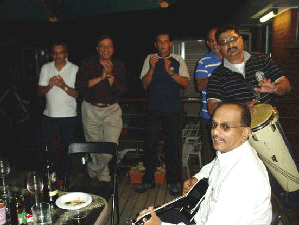
Edjoy Sinnen – “Sinna” who travels with his Drum and noise makers wherever he goes was itching to step up the tempo and recent arrival to Melbourne from Sydney Lalith Fernando brought out his guitar and a rousing sing-a-along began. Wesley boys as always were in good voice and after a hearty sing-a-long sat down to dinner well past midnight.
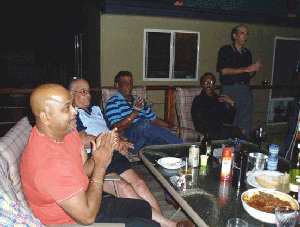
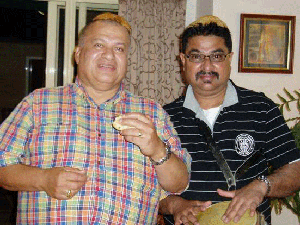
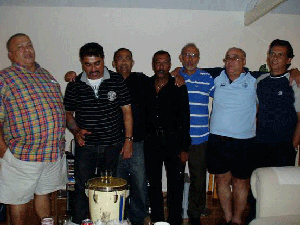
Many stayed for awhile and then it was Baila Time with Sinna in full swing. The night just flowed and even though some had to leave as it was well past midnight, the “stayers” were entertained by Sinna and Hari exchanging stories of their exploits much to the amusement of everyone and in particular our partners who were exposed to some of our boyish exploits from our youth. Finally well after 3 a.m. the College Song and War Cry concluded proceedings as the last of our guests left after what was a terrific evening amongst the fraternal band of double blue.
Those attending the function were: Hari Jeganathan, Reg Bartholomeusz,Trevor Collette, Darryl koch, Braden Koch, Beverley Nathanielsz, Brian Azoor, Cecil Wijeysinghe, Ivan Van Dort, Henry Mathurunayagam, Bryan Wijeyekoon, Michael Labrooy, Tissa Abeydeera, Roger Kellar, Eardley Johnson, Lalith Fernando(brother of Ransiri), Delmer Achilles, Edjoy Sinnen,
Hosts: Myra & Keith de Kretser
A great time was had by all and I am sure Hari went back to the UK with fond memories. I apologise for the delay in getting the photos.
Keith de Kretser
Melbourne
March 26, 2009
My dear friends of Wesley, I write with the distinct privilege of being a past student of Wesley College, Colombo.
As Wesleyites we were privileged that we had the opportunity to receive our education at Wesley College. We were fortunate to be enriched with the guidance of many dedicated teachers. We deeply appreciate the vital role the gifted teachers and talented fellow students who helped in shaping of the mind, learning life’s lessons, and for their guidance in developing personality traits, instilling good citizenship values, and superior professional ethics.
Many of before and after us have made outstanding accomplishments on and off the classroom and the playing field. We had the good fortune of having outstanding academic staff who magnanimously rallied around to advise students how to overcome daily challenges in the classroom and how best to study complex material and excel at public examinations. The teachers in charge of sports and the amiable and loyal grounds staff motivated and helped us all the ways to achieve our aspirations and goals in the field of sport. The office staff supported to keep the school organization strong and stable, and the support staff cheerfully cared for the learning environment to keep it conspicuous and proud. Wesley as a teaching and learning institution guided and supported those who wanted to succeed, be it excellence in academic advancement or outstanding achievement in sports, scouting, drama, social service, SCM, the college choir, school band, spelling bee, or in literary activities. In all this, Wesley sought to balance the educational needs of the body, mind and spirit of all students, in an ever changing context, while maintaining and strengthening the school’s commitment to excellence in education in a Christian faith based environment. It was a team effort to inspire and motivate students to develop character and to the confidence to be role models and become exemplary citizens.
It has been immensely rewarding to see friends of Wesley grow and change over the course of many years to serve in a variety of professions and vocations. We appreciate for the wonderful friends of Wesley who have passionately and earnestly played a part in building Wesley’s good academic standing and sporting tradition. Wesley has enabled many talented and dedicated students to achieve their dreams and goals over the past 135 years. Wesley has helped to produce fervent men of grit and industry and astute politicians and public figures like Sir Oliver Goonatilake the first Governor General of Independent Sri Lanka and Sir Don Baron Jayatillake one of Sri Lanka’s well known public figures. In turn, you my friends have excelled in your own chosen fields and continue to help Wesley to remain one of the best schools in our dear land.
Believing that loyal past students will always be prepared for every time and opportunity and when Wesley’s call shall sound and ready eyes shall always be found. We can look forward to the future that Wesleyites will always stand together hand in hand beneath the Double Blue in one fraternal band. In loyalty and honour bound with financial fortitude and philanthropy to help Wesley to leap into the next decade and achieve academic distraction and excellence in sports in the years to come.
Wesley’s mission has been to seek what it can do for you, in turn let us ask what we can do for Wesley so that others who come after us could benefit and enjoy Wesley’s rich traditions as much as we cherished. We will always cherish and appreciate Wesley for its mission to produce men of grit and industry. Let us join enthusiastically and in unity of purpose to rally around Wesley College to advance student scholarship and sporting excellence, for all things are possible to those who believe -
“Ora et Labora.”
With grateful and sincere wishes.
Shanti McLelland
By Keith de Kretser 19th March 2009, Melbourne
A balmy autumn evening, similar to those beautiful balmy evenings in Sri Lanka added to the sense of occasion and anticipation as the OBU Australia Branch hosted Dr Nihal “ND” Amerasekera and his wife on their visit to Melbourne from the UK. ND who was on a whistle stop tour of Australia was gracious in giving up some time to meet up with the old Wesleyites in Melbourne and in particular his classmates from the early 1960’s. Whilst ND was keen to make acquaintance with school friends after a lapse of over 40 years there was equally a sense of anticipation by Old Wesleyites to meet the man behind the wonderful Double Blue International Website which has showcased to the world Wesley College Colombo - her history, great traditions and the personalities – students, tutorial staff and workers.
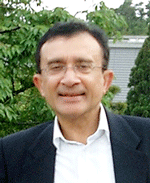
A diminutive gentleman, ND arrived with his wife and was greeted with a warm embrace and handshake by the President of the OBU Australia Branch, Reg Bartholomeusz. A passionate and proud Wesleyite he was very keen to make this visit to Australia and her major capital cities to catch up with friends before illness and old age took its toll. Warm handshakes and hugs were the order as our special guests met and mingled with the many old Wesleyites and their partners who had at very short notice gathered at the Burgher Association Hall to fete ND. If the facial expressions were anything to go by, there was the initial sizing up whilst ones memory was jolted back to the past and ND with confidence named the person followed by a hug and exchange of pleasantries.
There was a buoyant mood in the room as ND did the rounds finding time to catch up and chat with each and everyone. Amidst the clinking of glasses and chatter, photos were being taken to capture the moment for posterity. Reg Bartholmeusz formally welcomed ND and his wife and also visiting Melbourne at the time was Hamilton Amerasinghe who was in attendance. After a brief welcome speech, Reg Bartholomeusz presented ND with a gift to commemorate his visit and recognition of his contribution to furthering the brotherhood of the Double Blues through his International Website. ND was generous in his response and expressed his thanks for the warm welcome and in particular the opportunity to catch up with so many of his friends. A sumptuous buffet dinner followed.
As the next day was a working day it was time to draw the evening to a close. Reg Barthomeusz summoned the Old boys to the centre of the room to sing the College Song and before they began, Keith de Kretser proposed a vote of thanks to ND and a toast to Wesley College. There were many former choristers in attendance and as Lorensz Stork led the singing and we almost raised the roof as you could feel the sense emotional attachment to our beloved alma mater and the fraternal band of double blue that bound all of us that were represented by a cross-section of generations. Upali Perera then led the boys with the traditional war cry. – “ Zum, Zum Zake…..”. Fond farewells and hugs were exchanged as ND and his wife left. Sadly it all had to end as the midnight hour approached. The evening was a great success and the sense of fellowship and good will was outstanding. It was another memorable occasion amongst the double blue fraternity in Melbourne.
Old Wesleyites in attendance were Hamilton Amerasinghe, Tissa Abeydeera, Brian Azoor, Alistair Bartholomeusz, Reg Bartholomeusz, Felix Berman, Dr Jackie Carnie, Trevor Collette, Keith de Kretser, Rodney de Kretser, Beverly de Niese, Nelson de Silva, Bill Deutrom, Gerald de Zilwa, Arthur d’With-Barbut, Lucien Fernando, Harold Juriansz, Darryl Koch, Dayantha “Marky” Makalande, Dr Mahen Menon, Upali Perera, Glen Reimers, Robin Reimers, George Robertson, Errol Smith, Lorensz Stork, Bryan Wijeyekoon,
Some of us are indeed fortunate to have in our possession College magazines which capture the rich history and traditions of Wesley. Whist these items are lost and perish over time, ND has taken what was a simple website designed by Mahendra Dissanayake to another level to showcase Wesley to the world but most importantly to leave a legacy for future generations. His contribution is significant and a labour of love. If you have not visited his website, please do so and also contribute to the marvellous content that it has.
By Terence N de Zylva, Hony. Secretary.

The interest of the Old Boys in the welfare of the College has been maintained throughout the period under review.
Highfield Memorial:-We are happy to be able to state that the Highfield Memorial Buildings have been completed. We launched the Fund in 1956 to help finance the building of 8 class-rooms (i.e. the balance of the 16 class-rooms) the cost of which was Rs. 60,000(-. We are still short of our target by Rs. 10,000/- The total cost of the whole block is Rs. 125,000/-. The old boys have been responsible for, at least, 75 % of this amount. This is our tribute to the late Rev. Henry Highfield who devoted 30 years of his life in selfless service to Wesley as Principal, (1895-1925) in particular, and the people of Ceylon in general. These buildings may also be looked upon as our contribution to the College in a very substantial way. This year saw the completion of the last block.
Welcome to Principal :-On the 28th of September, 1957 the Union accorded a welcome to the Principal, Mr. P. H. Nonis. B.A., (Lond.) and Mrs. Nonis, at a Garden-Party on the Principal's lawn. The Governor-General, Sir Oliver Goonetilleke, President of the Union addressing the large gathering present expressed the pleasure the old boys felt over the appointment of an old boy to guide the destinies of their school. Sir Oliver assured the Principal of the support of the Union. In reply Mr. Nonis said that he was very conscious of the great responsibility of being Principal of a school like Wesley. As an old boy he considered it the highest honour and he would do his best to be worthy of the trust placed in him. He needed the support of the old boys; and the large gathering of all ages, his teachers, contemporaries, colleagues and his own pupils was proof that he would receive it. He thanked the Union for the reception.
Annual Dinner:-The annual OBU dinner was held at the Galle Face Hotei on the 28th of September 1957. Sir Oliver presided. The Chief Guest was the Chief Justice the Hon. Mr. H. H. Basnayake who proposed the toast of the Union and the College to which Mr. P. H. Nonis replied. Sir Oliver proposed the toast of the Sister Colleges and Canon R. S. de Saram, Warden of St. Thomas' College replied. Mr. V. H. Gunesekera proposed the toast of the Guests and Dr. Colvin R. de Silva replied.
Prizes:-In June 1957 the Union awarded the Dias and Mack memorial prizes. This is an annual award.
O.B.V. Celebrations:- The celebrations this year included as many as eight sports activities. Tennis, Soccer, Hockey. Volley-ball, Cricket and for the first time Rugger, Badminton and Basket-ball. These games help to bring the past and present together and infuse a greater degree of interest in the College.
At the annual Lunch the Guests of Honour were Messrs. Ivor de Silva & W. T. CanagaRetna who after 8 years of useful service as teachers at Wesley left to accept greater responsibilities as Vice-Principal of Richmond College, Galle and Principal of St. John's College, Nugegoda respectively. The toast of the guests was proposed by H. E. Sir Oliver Goonetilleke who presided and supported by Mr. T. N. de Zylva while Messrs Ivor de Silva, W. T. Canaga-. Retna & C. T. VanGeyzel replied. The toast of the College Games Club was proposed by Mr. A. Nithanathan to which the Senior Prefect, Mr. Terence Gunawardene replied. Later a pleasant evening was spent at the Garden Party which was well attended.
At the annual general meeting which wound up the activities (held in the College hall), Sir Oliver presided. The Principal addressed the meeting on the progress and work of the College since he took over in May J 957. There were two important questions raised by members following the address. Firstly the question of one session as suggested in the report of the Secretary and accepted by the meeting. To this the Principal replied that a radical change of that nature will have to be decided by the Board of Governors. Secondly the question of a permanent Cricket Coach for the College. The general opinion of the meeting was that the solution was at hand if Ivfr. Edmund Dissanayake was found accommodation in close proximity to the College. The Principal said that while they were badly let down about the middle of October they tried to get the services of an old boy but failed. He would give serious consideration to the suggestion put forward.
Memorial Service:-On Sunday the 2nd of March 1958 a special service of commemoration of the death of Rev. Percy T.. Cash a former Vice-Principal of Wesley who served for nearly 25 years, and a dedication service of the College on its having reached its 84th anniversary was held. The service was taken by the Rev. W. J. T. Small at the Methodist Church Maradana and was well attended by quite a gathering of old boys.
As for me, I was at Wesley from 1949 to 1957. In 1958 I was selected to go to the Royal Military Academy Sandhsurst for military training prior to obtaining a commission in the Ceylon Army.
I left Sri Lanka to New Zealand in 1977 and joined the New Zealand Army. I am now retired.
I read and re read most of the articles in the website and was impressed to note the collections of all the histories of Wesley well written and documented. I remember CM Fonseka who has caned and slapped me many a times because I was naughty. I recall the names of Vethanayagam, Guneratnea (Bullet), LAFFA (I admire him and his teaching skills), Lionel Jayasuriya (driving his 1930 Austin), Felix Premawardene, Fonseka (Long Jaw) Honter, F DeMel etc etc etc. I was sorry to note that Thamotheram has passed away. In 1975 when I was working at the Army HQ during the trouble times (Racial conflict) when I had a telephlone call from Thamotheran. He has just arrived from UK for a holiday in the midst of the racial violence. He wanted help because some thugs were targetting the place where he was staying (at Dehiwela) to loot all the goodies he has brought from England. Thamma has referred the Telephone Directory and looked for any Wesleyietes from whom he could get help. He found my name an old maths student in his class.
On receiving the telephone call I rushed to his place in a Military vehicle at Dehiwela with security personnel. I met him and took him safely to his brother's residence at the Bambalapitiya flats. He was overjoyed and thanked me profusely and said that he will do anything to help me to get my son to a good school in UK if need arises. I will never refuse a helping hand to any of my old Tutors at Wesley. Memories of Wesley will never perish from my mind and I love every brick wall of the college. The Cone Tree, Toffee man and the Tuckshop are icons. I reached great stride in my chosen career because of my solid foundation I received at Wesley
Thank you for sending me this website. I am coming over to London in July to see my son. Will be in London for three weeks.
Kind regards
Careem Zavahir
Major (Retired)
Links to further reading

A hot number in the 70s, Sri Lankan Alston Koch will soon perform in Malaysia, writes Subashini Nair chances are you have not heard of Sri Lankan-born Alston Koch. But ardent disco fans who used to frequent the Tin Mine discotheque at the KL Hilton in the 80s will remember “Asia’s King of Pop”. Koch, who opened the Tin Mine discotheque, the revolving restaurant at the Federal Hotel in Kuala Lumpur and performed at the Study discotheque in Penang Mutiara Beach Resort is an international recording artiste with a string of awards. These include four Australian Recording Industry Association (Aria) Platinum Awards and two Aria Gold Awards. He used to tour with Abba, the Commodores, Joe Cocker and Air Supply in 1976 to 1978. Koch, a cricket fanatic, made a short stopover in Kuala Lumpur recently to meet old friends, indulge in some local food and watch cricket.
Back after more than 10 years, we met at the Royal Selangor Club, Sports Annexe. His first observation: A stall serving banana leaf rice in the vicinity. The 62-year-old is happy the food has not changed much. He will be back, courtesy of the Kuala Lumpur and Penang Cricket Association, for a dinner show to raise funds for the Junior Development Programme at the end of the month. The members of the 1996 World Cup winning Sri Lanka cricket team will also be at the dinner. “It is really an honour for me as most of them are my friends and cricket is simply my other passion,” says Koch.
He began his career in Ceylon singing with the Jetliners. “We used to sing Tom Jones, Elvis Presley, and Rod Stewart’s songs to be popular. That’s all the band did but after some time, I wanted to do something different,” he recalls. But creating original music was not an easy journey. Koch, who is of German and Dutch origin, migrated to Australia in 1969 with only AUS$75 in his pocket. That was the amount with which he was allowed to leave the country. Australia, he says, “was a culture shock in every aspect”. As an Asian, he says, he was not accepted. He washed cars to earn a living. “I lived in luxury when I was in Ceylon, so to leave everything behind was very difficult for me. “But it was something I had to do because my Government at that time did not like western influences. “I had to pursue my passion. For three to four years I struggled in Australia. It was a hard life but I was young. I started writing songs and picked disco,” he adds, while looking out at the cricket field.
Recalling his earlier days with his Australian band, Darktan, in 1975, his disco music was not accepted. He added that Australia has always been a rock music country. To make matters worse, all radio stations in Australia banned his music. “But all the dance clubs played my music. Still, it wasn’t enough as the radios ruled then.” Despite the setback, in 1977 he achieved his first gold disk with Disco Lady. It also won him the best new talent 1979 International Disc Jockey Association Award. The American radio stations picked it up and the rest, they say, is history. Koch says he was also the pioneer of disco music in Australia. He began his recording career with RCA’s Living Sound Records, a subsidiary record label. The first song released on the label was Don’t Stop It Now written by Errol Brown of Hot Chocolate and recorded by Koch and the Darktan.
He has also appeared on TV pop music shows including BBC (Top of the Pops) and Bandstand. Among Koch’s hits are 20 Miles, Gimme Dat Banana, Midnight Lady, Island In The Sun and Kookaburra. For cricket fans, it was Koch’s Murali song that sang to their hearts. The song was a dedication to the world champion bowler, Sri Lankan Muttiah Muralitharan. He is Sri Lanka’s ace spin bowler who overtook Australian Shane Warne’s record when England played Sri Lanka in a three-test series. Murali is now the world’s leading wicket taker — a historic record. Looking through some of his videos in the 70s, you can catch Koch grooving to his music with frizzy long hair and dark glasses.
Koch, now the Ambassador of Tourism for Sri Lanka, is working on a new album and couple of films, about which he is quite secretive. But one of the most humbling moments for Koch was when Grammy Award winner Alicia Keys introduced Koch as a “superstar” at a MTV World Music Awards. “That was overwhelming,” he adds.
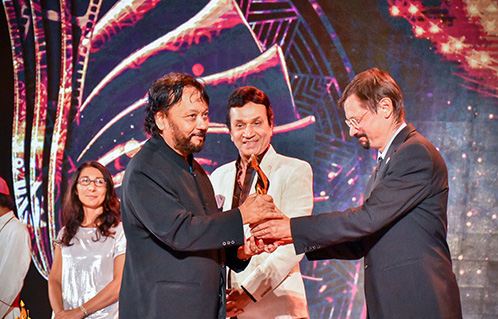
Alston Koch unanimously carried away the 'BEST ACTOR' Award for his role as Matthew in 'ACCORDING TO MATTHEW' at the SIGNIS FILM AWARDS.
A well received decision of the Grand Jury brought an ovation from a very receptive audience for a very demanding & controversial role played to perfection making him the very first winner of a film production in both English & Sinhalese.
It was an award winning year for Alston Koch who earlier won the 'Sri Lankan Of The Year ' for 2018 as well as been chosen as the 'Brand Ambassador' for The Rotary Club.
This year he was appointed as Advisor to The Ministry Of Tourism and Advisor to the Ministry Of Wildlife & also Advisor to the UNWTO (United Nations World Travel Organisation)
It all began in the winter of 1991 when Jai Lameer received many telephone calls from Presidents of other OBA’s in the the UK as to why Wesley a leading boys school in Sri Lanka and that too a cricket playing school with rich traditions of over 100 years have not formed an OBU in the UK to support Wesley College Colombo. Even the founder President of the Festival of Cricket had requested Jai to form and register the OBU with the Festival of Cricket. Jai then got the ball moving, in the beginning when the idea was put to a few senior Wesleyites living in the UK they tried to play down the idea. But Jai did not give up hope and was determined some how to form the OBU in the UK. Refusing to give up Jai got in touch with fellow Wesleyites Sam Thevathasan, S Ramakrishnan, Harry Jeganathan, Iqbal Cader and Azahim Mohamed all of whom readily supported the idea put forward by Jai. At this point I must mention the support given by Tuan Fallil, who urged the six to take on and complete the task. An interim committee consisting of the six was formed to forge ahead with the idea of setting up the OBU UK.
The first meeting of the interim committee was held at the residence of Azahim Mohamed on 10 April 1992. At this meeting the following matters were discussed and agreed. The name of the Union, New letterheads with the college crest, register the OBU with the Festival of Cricket (FOC) as an associate member and make arrangements to play the OBU in the qualifying rounds, to draw up a constitution, (This task was handed to Jai Lameer and Ananda Thevathasan). To inform as many Wesleyites living in the UK through the local Sri Lankan newspapers. The Committee also, arranged to play a friendly Cricket match with St Thomas OBA UK on 22 August 1992 at West Harrow and Harry Jeganathan Captained the Wesley OBU. The OBU also took part in the qualifying rounds of the Festival of Cricket in September 1992 but failed to qualify.
The Second meeting of the interim committee was held at S.Ramakrishna’s residence. It was at this meeting that a decision was made to hold the inaugural meeting of the Union at Victoria Methodist Church on 7 November 1992. It was left to the six of us to network through all the Old Wesleyites we knew, to inform them of the very special day. That day was eagerly waited. Some of us were requested to bring a plate of short eats and drinks to the meeting. Being the first meeting there were 32 Old Wesleyites present. It was a great feeling to meet and greet men who rallying with common interest and common purpose. The aim of that gathering clearly embrace the two essential elements of common interest – Our Beloved Alma Mater, Wesley College Colombo and the common purpose – Fellowship, which to this day form the hub around our constitution is based. The meeting elected 19 members to form the first Executive Committee. Rev James Cartman and Rev David Izzett two former Principals of Wesley College Colombo were appointed as Patrons. Douglas Raymond whose name was proposed by Jai Lameer was elected as the first President of the Wesley College OBU UK.
First Committee of Wesley College OBU UK 1992/1993
Vice presidents:
Sam Thevathasan, Dr N D Amerasekera and
Dr Sam de Zoysa
Secretary: Jai Lameer
Asst Secretary: A W Musafer
Treasurer: Ananda Thevathasan
Asst Treasurer: Paul David
Membership Secretary: A Azahim Mohamed
Social Secretary: Mano Gnanapragasam and Walter Gunawardene
Sports Secretary: S Ramakrishnan
Committee: Iqbal Cader, Harry Jeganathan, Norman Armstrong, Wimal de Silva, Dennis Azariah and Spencer Hoffman
Auditor: Anthony Chandi
A MESSAGE FROM THE REV JAMES CARTMAN, FORMER PRINCIPAL OF WESLEY COLLEGE, COLOMBO
 First of all I would like to thank Mr Jai Lameer for inviting me to become Patron of the newly formed Wesley College Old Boys Union (UK) Branch -1 feel it is a great honour to be invited to do this.
Owing to ill health, I am sorry I am not able to be with you this afternoon, but I would like to send my sincere greetings to everybody ^present at this Inaugural Meeting.
First of all I would like to thank Mr Jai Lameer for inviting me to become Patron of the newly formed Wesley College Old Boys Union (UK) Branch -1 feel it is a great honour to be invited to do this.
Owing to ill health, I am sorry I am not able to be with you this afternoon, but I would like to send my sincere greetings to everybody ^present at this Inaugural Meeting.
This Old Boys Association is something I have hoped for, for many years. I discussed it some time ago with Lou Adihetty. I was therefore very happy when Jai Lameer informed me that something was being arranged and an Old Boys Union was to be formed.
I read with great interest the Objectives of the Union and I consider them to be very worthy and commendable. I hear the Australian Branch is very successful and that they help the College both financially and in many other ways - I am sure this new UK Union will be equally supportive. It is 10 years ago that my wife and I returned to Sri Lanka for a 5 week visit - it was made possible by the organisation and careful planning of some of the Old Boys - and I would like to thank especially Edmund and Graham Dissanayake and Shelton Peiris along with many others who were responsible for planning and organising the wonderful time we spent in Sri Lanka in 1982/3.
I was Principal of Wesley College from 1944-49 - and look back on those years as being an especially happy and rewarding period in my life. During the war, as some of you will remember, the school had to be evacuated as the Indian Army took over the college - and it was my great privilege after the war to re-settle the students back into our college buildings. With the help of both staff, students and many others this operation was accomplished, and from then on the school has grown from strength to strength. I would like to express my gratitude to Jai Lameer’s grandfather, Mr M I Mohammed, who undertook and built the extensions to the College which fittingly marked the 75th Anniversary.
It is, and always will be, my earnest prayer that Wesley College will continue to grow and flourish in the years ahead, guided by the College Motto "ORA ET LABORA". And so by forming this UK Branch of Wesley College Old Boys and the giving of your support both financially and morally you will help the school to go forward in the spirit of the College Song:
Wesley Boys together stand.
And for our dear land we’d be
Men of grit and industry
Honour bright and loyalty
Wesley to the fore
Links to further reading
Rev James Cartman
Those early years were interesting, formative and very important. Meetings which were restricted to members only, were held at homes of committee members where plans and hopes for the future were discussed and determined. These meetings were entertaining and educational as well. The cross sections of members from different eras, recounted their experiences and explained the basis for that generation of Wesleyites had come to here about. Links with the college were forged and strengthened in the years ahead. Proceeds from the Annual Double Balls and other fund raising activities enabled the OBU UK branch to make regular financial financial donations to the college. To this day the committee have being guided by this Principal, that funds will be sent to support projects or needs of the college. Every meeting concluded with a rousing version of the College Song and War Cry.
Australia has attracted many thousands of Sri Lankans who have found a new home there. It was natural that several branches 'of Alumni will emerge, the first being from St Thomas', Royal, St. Josephs', Trinity, St Peters' and not until 1979 was the Wesley College's Australia Branch of the OBU founded. A catalyst for this founding was the impending visit of Cedric & Rachel Oorloff ( past Principal & his Wife) to Melbourne in 1980. A pioneer group of Old Wesleyites comprising Cecil D'with Barbut, Rodney de Kretser, and Keith de Kretser made the initial moves and the inaugural meeting was held on 25th, November 1978 with fourteen(14) old Wesleyites being present.
Constitution & Policy Objectives
The aims of the early gathering embraced two essential elements, which have been further developed and incorporated into the Constitution, ways and means of fostering and sustaining educational standards at Wesley, the Alma Mater encouraging fellowship amongst old Wesleyites, who are responding to a rallying call for a common purpose. The Constitution was discussed and adopted in July 1981, and it has given meaning and purpose in attaining the objectives of the Branch Union. Activities The OBU Branch Union has organised numerous activities such as social outings. Club Nights , Annual 'Double Blue' Ball, Senior Members Luncheons, Cricket matches with 'Old' Joes, Thomians, Royalists, and Bens. At all these events fund raising for financing the Club's activities as well as helping the Old School, has been vigorously pursued. The Branch Unions activities have become an important focal point for Old boys to meet and recount happy memories of their days at Wesley. Ronnie Campbell frequently reminisced his many run- ins with Ranis, and as a token of respect he sometimes wore a sarong to meetings and cricket matches. Every meeting concluded with a rousing rendering of the College Song, and the War Cry , "Zam, Zam, Zakay.."
WESLEY COLLEGE OLD BOYS’ UNION (Australia) CELEBRATES TWENTY-FIVE YEARS
We nearly missed it. During a committee meeting last November someone wanted to know the date of the very first meeting.Nobody knew. We hunted around old files, annualreports, minutes, etc until finally, there it was – the first meeting was in Melbourne on 25 th November1979, following an earlier discussion between Cecild’With Barbut, Rodney de Kretser and Keith deKretser to form an Association of Old Wesleyites. And now here we were, on the same date twenty-five years later, planning next year’s events. The very first office bearers were Cecil d’WithBarbut, Gerald de Zilwa, Keith de Kretser, Nelson de Silva, Rodney de Kretser, Glen Reimers, Ronald Campbell, Neville Ludowyke and Arthur de Silva.
The first occasion, on 1 st February 1980 was a Dinner Dance to commemorate the visit by Mr & Mrs CedricOorloff. From this small beginning, when communication was by word-of-mouth or telephone, we have moved with the times and kept up withtechnology – we now have our own website.It is always good to think back to when we started,and the strong growth that followed – but times have changed, and we must face the challenge of finding newer ways to attract a new generation – younger, and possessed of skills and ideas that were still on the drawing board back in 1979.This will happen. Already there are old Wesleyites in Melbourne whose fathers were at school the same time as some members of the committee. They musttake over and guide the OBU into a new era. We invite all old Wesleyites who are interested, to nominate for position on the committee. This is an opportunity to pass on to another generation the tradition and values that have sustained WesleyCollege and inspired so many young students for wellover a century.
Reflections of my past 25 years with the OBUA By Keith de Kretser
It seems like only yesterday when a small group of Wesleyites met to form the first Overseas Branch of the Wesley College Old Boys’ Union in Melbourne, Australia. In 1979, the Trinity College OBA informed Cecil d’With-Barbut that Mr Cedric Oorloff (Wesley’s Principal 1950-1957) wished to meetmany Old Wesleyites as he could when he visitedMelbourne in 1980. This was the catalyst thatbrought the Old Wesleyites “Down Under” together. Mr d’With-Barbut happened to work with Rodney de Kretser and myself and we discussed plans to host Mr and Mrs Oorloff when they arrived in Melbourne.Until then, the Old Wesleyites did not have anassociation in Melbourne but we were a significantgroup scattered across Melbourne. A date was set for the inaugural meeting and three of us contacted allthe Old Wesleyites we knew, to inform them of thismeeting and the plans to form an Old Boys’ Union. It was a special day. Attendees were requested tobring their own eats and drinks. There were 14 Old Wesleyites present plus many apologies from those that could not attend.
The Keeley Park Scout Hall inClayton was the venue and as each car pulled up the thought raced through everyone’s mind, “I wonderwho that is?” It was a great feeling to meet and greetmen who were rallying with a common interest and purpose. If my memory serves me correctly, thefollowing Old Wesleyites were present at that firstmeeting:Cecil d’With-Barbut, Gerald de Zilwa, Nelson de Silva, Rodney de Kretser, Upali Perera, Ronnie Campbell, Arthur de Silva, Glenn Reimers, Neville Ludowyke, Norman de la Harpe, Arthur d’With-Barbut, Lucien Fernando, Robin Reimers and myself. The group covered many eras and it was fascinatingto hear stories of old about the principals, teachers,administrative staff, the servants and even their ownpersonal experiences
From the OBUA Newsletter 2005 - The Beginning of the OBU Australia
The aims of that early gathering embraced two essential elements – Our beloved alma mater, Wesley College and a common purpose – Fellowship; which to this day form the hub around which our Constitution is based. Little did they realize that the O.B.U. they were about to form would still be in existence twenty five years later and that it would motivate Old Wesleyites across the world to form similar groups in their own countries.
The O.B.U. adopted the title – “O.B.U. Australia Branch” as Melbourne had a significantly larger population of Sri Lankans than any other State in Australia. True to the spirit of its charter, the OBU Australia Branch aims were:
1. To unite in one fraternal band.
2. To afford an opportunity of bringing together past and present pupils of Wesley College.
3. To assist in meeting the needs of the College as necessary.
4. To preserve the honour and dignity of the College. The Foundation Committee comprised:
dictated that we had to proceed. David Schokman lent us a generator which provided the power for the band. Neville Ludowyke had a collection of empty beer bottles that after a quick clean and wash served as candle stands. The ambience of the room was fabulous with the two blues featuring prominently with bunches of balloons and the napkins on the table complimented by the subtle hues of the flickering flames from over 100 candles. The evening got off to a great start and power blackout aside, the fellowship and camaraderie compensated for a truly memorable evening. The Dinner Dance for Mr. and Mrs. Oorloff turned out to be a great success and it enabled the OBU Australia Branch to find its feet and galvanised the group of proud, loyal Wesleyites living in Melbourne.
Those early days were interesting and very important. Meetings, which were restricted to members only were held at Keeley Park Scout Hall, Clayton where our plans for the future were discussed. These meetings were entertaining and educational as well. The cross-section of members from different eras recounted their experiences and explained the basis for the folklore that generations of Wesleyites had come to hear about. Every meeting concluded with a rousing version of the College song and War Cry.
In due course, after a couple of years the committee prepared a draft constitution to present to the Members with a view to future operations as the OBU was growing from strength. The Constitution was adopted at a specially convened meeting on 14 June 1981. The introduction of the Constitution and a formal Executive saw the demise of the informal and convivial gatherings of all Members. This transition was necessary due to the growing membership and clear indications that the fledging Association had taken wing and was in full flight and able to pursue with greater vigour those aims to which it was committed
On 16 April 1993, the OBU became an Incorporated Association and changed its name to “Wesley College (Colombo) Old Boys’ Union Australia Branch Incorporated”. The word “Colombo” was Added to distinguish it from Wesley College in Melbourne. Membership of the OBU Australia Branch is drawn from most Capital Cities in Australia. Melbourne has the largest proportion of members because this is where the organisation was formed and is based. The Sri Lankan Community in Sydney embraced the Past Pupils Association concept in the nineties and the Old Wesleyites there formed a chapter in 1995. Close ties were forged between both Associations and the highlight being the inter-State visits between the associations for a cricket match and a good social outing. Sadly these
- Vice President: Gerald de Zilwa
- Secretary: Keith de Kretser
- Treasurer: Nelson de Silva
- Social Secretary: Rodney de Kretser
- Asst. Social Secretary: Upali Perera
It was decided that future all Old Wesleyites. The frequency of meetings was to be determined. The inaugural meeting was a success and we agreed to meet again and spread the word to as many Old Boys. As the word spread more Old Wesleyites showed up at the meetings. How can one forget the late Ronnie Campbell who would come in his sarong to the meetings and do his Ranis impersonations and talk about the “Kityakara days”. It was truly a nostalgic journey down memory lane that proved to be a regular feature whenever “the past and present” met.
Plans were made to host Mr & Mrs Cedric Oorloff at a Dinner Dance on 1 February 1980. The excitement and anticipation was building up and for a while there were doubts on whether the function would go ahead. The State of Victoria was in the throes of regular industrial disputes with the Electricity Workers Union, and there were frequent blackouts enforced by the Government to manage the crisis. It so happened that power blackouts were to affect our function from 9 a.m. to 9 p.m.. What could we do? The band needed power. The significance of the occasion meetings would be open to visits have not happened in recent years. There are a number of Wesleyites who have, as yet, not enrolled as members of the OBU. It would be a fair estimate that there are more than 300 Old Wesleyites in Australia. Links with Old Wesleyites from inter-State continue with the Claessen brothers, the Bartholomeusz family, Warwick de Kretser all of Adelaide, Haig Claessen and Nigel Christoffelsz from Perth, Bill Deutrom and the Poulier brothers from Brisbane.
The Committee of Management over the years has worked tirelessly to organise social outings such as Club Nights and the “Double Blue” Ball. In the 1980’s we were the first Past Pupils Association to have a Club Nite or as we termed it a “Podi Natuma” for our members residing in the Northern suburbs of Melbourne. These were low budget dances but very effective in getting the support of Old Wesleyites across Melbourne. We were fortunate to have excellent caterers in attendance at all our functions. Old Boys Maurice Mortier and Duleep Boteju, Melbourne’s pioneering Hopper Man have supported and catered for many OBU functions. The “Double Blue Ball” has grown in stature and has featured the creative talents of numerous Old Wesleyites with Dallas Achilles, Willard Joseph, Linden Boustead and Beverley Nathanielsz and their respective bands and the creative décor of Rienzie Mahamooth. The 125th Jubillee Celebration Ball being the standout with the Principal at the time – Ben and Ira Fernando, Old Boy and former Principal – Louis and Lisbeth Adhihetty from Switzerland, Upali Samararatna from Sri Lanka and many Old Wesleyites from inter-State and Melbourne gracing the occasion.
The OBU led the way in the early 1990’s by arranging a Seniors Lunch which has brought together many of our retired Senior Members. Our Senior Members look forward to this occasion when they can catch up with old friends. The success of this event has seen a similar format being introduced in many other Past Pupil Associations. It is well supported by the Senior Members. Whilst on the subject of Senior Members, I believe Vernon Achilles(father of Dallas and Delmer) is possibly the oldest Wesleyite in Australia and the world at the wonderful age of ninety seven.
Cricket matches were organized against the Old Royalist, Old Thomians, Old Trinitians and Old Bens. Stars of bygone eras that were game to play displayed their skills. The likes of Norman de la Harpe, Glenn Reimers, Robin Reimers, Delmer Achilles, Errol Smith, Harold Juriansz, Hilary de Vos, Everard Schoorman, Frank Schoorman, Reza Sinnen, Mahendra Dissanayake, Sanjeeva Wijesinghe and Danesh Dissanyake brought back memories of
their heroics at Campbell Park. Apologies to any names I may have omitted. Sri Lanka’s admittance as a major cricket-playing nation gave the OBU the opportunity to host Sridharan “Jega” Jeganathan and Abu Fuard on many visits to Melbourne. We were indeed proud of their achievements.
Links with the College were forged and strengthened over the years. The proceeds of the Dinner Dance and other fund raising activities enabled the OBU Australia Branch to make regular financial donations to the College. To this day, the Committee has been guided by this principle, that funds will be sent to support projects or needs of the College.
The OBU Australia Branch continues to help the College with the quantum of the individual donations over the years increasing in proportion to our financial standing. Donations have been made for academic (four computers) and sporting needs (matting for wickets, cricket balls, rugby boots, a new scoreboard (still in operation today), blazer fabric), new capital works programmes, building and property refurbishment. A special project to refurbish Marshall Perera’s house in his village was another well-supported project which was completed with the help of the members. The OBU Australia Branch has also established two scholarships. The Australia Branch donated two hundred 125th Jubilee Ties and a Pulpit Bible for the Chapel to commemorate this significant milestone. Funds have also been sent to the Old Wesleyites Sports Club with some of their fund raising projects. The OBU Australia Branch has played a pivotal role in using the resources of its Members to assist needy Old Wesleyites both local and overseas, hosting and assisting students who have come to Australia. The OBU in recent years has consolidated its ties with the Methodist College Old Girls Association. Members like Lassath Algama, Bill Deutrom and Ronnie de Kretser have always provided significant support on many projects and have readily responded to Wesley’s call. All these donations have been supplemented by donations directly to the College by Members of the OBU Australia Branch.
The OBU was a founding member that helped set up the Combined Colleges of Sri Lanka Carol Service in 1998. This event is well patronized by the Sri Lankan community in Melbourne. It has been instrumental in raising $14,000 for charity from the proceeds of the offertory.
The opportunity never slips by for Old Wesleyites to gather be it to host Wesleytites and former teachers from inter-State and overseas when they visit Melbourne. One such occasion stands out in my mind the dinner we held for Mr and Mrs Felix Premawardhena. Though a shadow of his former self he still had an imposing presence with his handle bar moustache. It was a memorable dinner with many Burgher students he had taught in attendance. Memories of those Sinhala classes where the Burgher boys were put through the mill reciting Sinhala Kavi were soon forgotten as did those memories of him meting out punishment for our misdemeanours. Some who could still recall the Kavi they had learned at Wesley proudly recited them. He was quite surprised given that many boys had difficulty in learning Kavi at school. Mr Premawardhena was deeply touched with the overall mood of the evening, particularly to be feted by so many Burgher Old Boys that had endured his classes. Here was a man that we all feared as a teacher but no longer was seen in that light. Instead, he was another caring teacher that had influenced our lives during our time at Wesley. Such an occasion would not have been possible if there was no association. One of the major benefits of the O.B.U. has been the ability to network and be in touch with many Old Wesleyites. Whilst reflecting on the past twentyfive years I have fond memories of those Old Wesleyites that are no longer with us. Their contribution and input has been valued over the years. They are sadly missed but not forgotten and may they find eternal rest.
The changing times in modern society have also seen an erosion of the traditional values in Sri Lanka. Hardly any of the present students represent generational links with Wesley. There is therefore no connection that will perpetuate the rich tradition that is ours. Changing priorities and modern lifestyles have not been conducive to nurturing these values and I do not believe that the newer generation of Old Wesleyites will appreciate the traditions that were such an intrinsic part of our makeup. The OBU Australia Branch has been many things to many people and sadly if the current trend continues I believe the Australia Branch will be lucky to survive and celebrate its fiftieth anniversary. It is not a phenomenon unique to Wesley but one that is being experienced by all the Past Pupil Associations of Sri Lanka in Melbourne. The OBU Australia Branch has given each of us an opportunity to make new friends, reminisce and share those precious moments of our youth as students at Wesley College. Therefore we must treasure what we have and enjoy every moment when we meet. Our sincere thanks to the many volunteers who have given of their time on the many Committees over the past twenty five years to make the O.B.U. what it is today.
It has been my privilege as a founding member to have spent over twenty years in the capacity of Secretary and President and to have been involved in
every aspect of the OBU Australia Branch. It never ceases to amaze me, this camaraderie that we share as Wesleyites regardless of age. Those schoolboy days made a lasting impression on each one of us and as the words of our revered College Song state we are .... “bound by one fraternal band the band of double blue..” We are proud to be Wesleyites – Wesley to the fore.
 |
 |
 |
The journey of forming the Wesley College OBU New Zealand came to fruition by the two branches meeting together, tirelessly working and having the same goal in mind. The Milestone of forming an OBU in NZ is not the end of the goal but a beginning of a journey, an Era. The Journey itself was two folded:
Firstly, the journey began when Dhammika Ariyaratna came to New Zealand in the year 2008. He was curious to know if there was an existing OBU in New Zealand. He was perplexed when he found it was hard to find past pupils in New Zealand, let alone an OBU in New Zealand. However, Dhammika knew that ‘Past and Present kindly meet: Each other proudly greet’ is not just a lyric in our college song but a principle, fellow Wesleyites would practice too. He continued his search for several years and during this search, he came across Bathiya Sanka and Dilanka Sachith Dorakumbura. Damikka, Bathiya & Dilanka initially brainstormed the idea of forming an OBU. During the fundamental stage of forming an OBU, this trio came across Rukshan Gopallawa and Dilshan Palihakkara whom also later weighed in to form the OBU or the goal of forming an OBU at that stage. Rukshan had already created a Facebook page for OBU, even before meeting the initial trio. Rukshan has been receiving an overwhelming response via Facebook and they continued to work on the idea of forming an OBU for Wesley for approximately a year. They knew there is an appeal for an OBU, this would be an idea with certain, be warmly welcomed, among NZ based Wesleyites.
The second part of the journey began in the year 2014 when Mohamed Hafsal came to New Zealand. Similar to Dhammika (though they have met each other yet), Hafsal was also searching the network to see if there is an OBU in New Zealand to be proudly part of but disappointment awaited Hafsal, much like Dhammika, Hafsal was also not able to find an OBU. Later, in a totally unrelated event, Hafsal came into contact with Muhammed Mazeen. Hafsal had known Mazeen since his college days as Mazeem was 2 years senior to Hafsal. Mazeen was well known in his college days due to Mazeem being part of various societies. Mazeen introduced Omar Fahmy and Irshard Mohamed to the circle. The discussion of forming an OBU gathered momentum between them. They decided to have a meeting within them similar to the former fold. Later on, a NZ based Sri Lankan society organised an inter-school sixer side cricket tournament for the first time (commonly known as “Festival of Cricket” or “FOC”). When Hafsal came across the FOC He contacted Mazeen and Irshard to participate. Hafsal managed to gather 5 fellow-Wesleyites to participate in the tournament. Their intention was to only represent Wesley and it did not bother them they were not familiar with the sport. They successfully, proudly represented Mother Wesley.
Fast forward a year, Hafsal received the invitation to participate in the year 2023 too. Again, Hafsal started to share the details and searched for more players from Wesley. By this time, he has come across Kiyas Ashraf, a fellow Wesleyites. Kiyas had a few contacts within NZ based Wesley network and started to share them with Hafsal. Hafsal got to work and by word of mouth, between Wesleyites He got in contact with several Wesleyites.
One of the initial trio-Bathiya was the bridge between Hafsal and Dhammika. At the FOC cricket tournament, Dhammika and Hafsal started discussing of their common goal, an OBU in NZ. They each realised that they both share the same theme and are equally passionate. They carried this discussion off the FOC forum and successfully initiated forming an OBU in NZ, officially.
All of the above members along with Dhammika & Hafsal knew a structure is essential to ensure the continuity of an OBU. Dhammika got to work and gathered the contact details of all interested in joining the OBU. He organised nominations for relevant OBU positions and gathered a meeting pre-AGM. Prior to the pre-AGM, Dhammika approached each member personally to discuss, find their interest in OBU , area of expertise and allocate suitable candidates for relevant positions as nominees. Once nominations were complete, ideas and opinions were shared among the Pre- AGM meeting presentees, the initial lot. All of them agreed on a balance of Nominees who can represent NZ-Wesley OBU nationwide and relevant to Nominees’ expertise should correlate with relevant positions to maintain stability in an OBU. To be the Senior Patron of the board Ranjith Paul Aaron (WCC 1963) was nominated. He was the most senior of the lot and the position of Senior Patrot was apt for Ranjith. Mazeen nominated Omar Fahmy (WCC 1982) as a Patron and was agreed unanimously. Again, Unanimously, from all members present, Dhammika Ariyaratna (WCC 1989) was nominated as the Founder and Patron.
The first AGM was conducted on the 16th of April 2023 in Auckland NZ. Dhammika submitted a nomination paper which was seconded by members present in the meeting both virtually and in person. The board was elected in that meeting, unanimously. As mentioned above; Wesley College Colombo OBU New Zealand is a prime example for
Each the other proudly greet
Hearts ne’er cool that once have beat
Neath the double blue
And when Wesley’s call shall sound
Ready aye shall all be found
In duty and in honour bound
Wesley to the fore”
.....................................................................
The Elected Board Members
Executive Members:-
.....................................................................
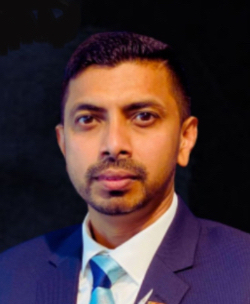 |
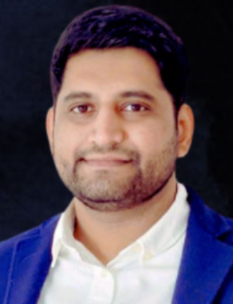 |
|
| President - Muhammed Mazeen | Vice-President - Eshan Harrington |
.....................................................................
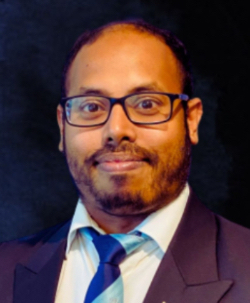 |
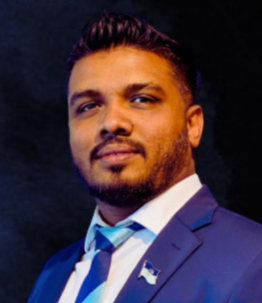 |
|
| Secretary - Mohamed Hafsal | Treasurer - Denuwan D Perera |
.....................................................................
Committee members
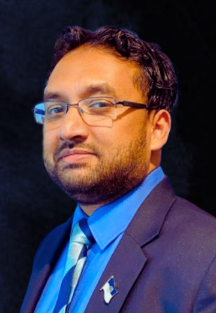 |
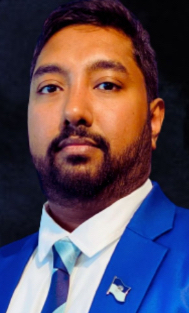 |
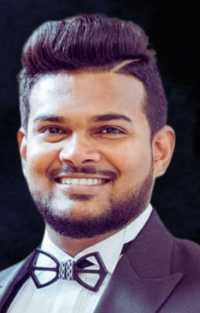 |
|
| Mohamed Irshard | Rukshan Gopallawa | Dilshan Palihakkara |
.....................................................................
Patrons:-.
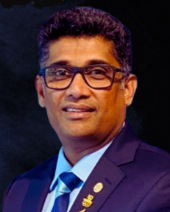 |
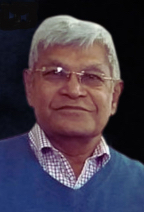 |
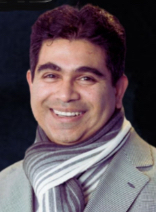 |
|
| Founder Patron - Dhammika Ariyaratne | Ranjith Paul Aaron - Senior Patron | Patron - Omar Fahmy |
.....................................................................
Devinda Amarathunga – Multimedia Coordinator
We currently have 43 members who have joined our OBU NZ and are looking forward to grow this.
From the Editor of the Double Blue International
It gives us such great pleasure that a new chapter has opened in our Wesley Brotherhood in New Zealand. Wherever there are Wesleyites there is a strong urge to meet and greet to recall and remember our Principals, Teachers and friends who have made schooldays so very special.
This is the beginning of a beautiful partnership and a lively and energetic organisation. We envisage many gatherings, reunions and meetings to keep our band of Double Blue alive in New Zealand, although halfway around the world from our beloved school in Colombo.
May the OBU-New Zealand thrive and prosper. On behalf of the Worldwide Brotherhood of Wesleyites I wish them well in all their endeavours.

Ora et labora
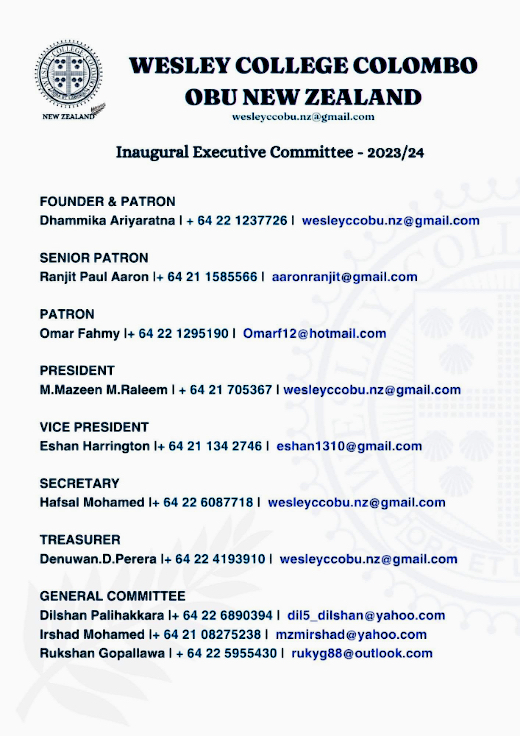
By Dr. Nihal D Amerasekera
It has been around the world in 42 days for Upali and Charmaine. Melbourne – California- New York- London – Singapore- Melbourne
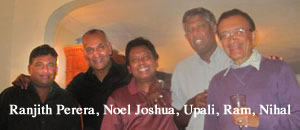
When I was in Melbourne in March 2009 it was wonderful to meet up with several of my schoolmates , many of them after 50 years. It was a special treat to see Upali and Charmaine. Upali I met last in 1973 in the blistering heat in a bus stop in Nawala when he proudly said he was emigrating to Australia. He related his plans for the future and in them I recognised his old enthusiasm which was most apparent in the heat of a cricket match in the small park.
An affable style, boyish face and an enviable ability for mischief are memories we cherish of Upali Perera. Time has not changed his appearance but he was much more sedate now than in those heady days of his youth when he knew all too well the narrower path to happiness. He was too impatient with life as a teenager and wanted the freedom the adults enjoyed. We didn't realise then la dolce vita comes at a price and after some sacrifice. Upali at school had an irrepressible talent for mischief. He never allowed the disciplinary demands of Wesley to interfere with his pursuit of pleasure. He largely escaped serious censure thanks to his being blessed with a barrel-load of charm; he was also utterly without malice.
Upali liked to sail close to the wind, and many of the tall stories he told about his adventures were essentially true, even if the embellishments grew in the telling, as the years passed. He can still work some of his old magic and relate those weird and wonderful stories of old to keep us spellbound.
To teachers, Upali exuded menace, to others he exuded charm; to most, it was a combination of both. The school environment was harsh with Dickensian rules and punishments. In the 1950's discipline came with a capital "D". Law and order was paramount and the staff administered this pretty ruthlessly. The punishments often did not fit the crime but went way above what was needed as a deterrent. On looking back the students were fortunate to have people like Upali to stretch the boundaries and make the teachers think laterally of the validity and justification of some of those rules and punishments. He had a remarkable pain threshold. He was caned by successive Principals and Vice Principals and numerous teachers but he continued to have skirmishes with the laws at school. Although his militancy at school was legendary Upali's resistance to the regime was often measured. In the process he has made enviable networks which has sustained him throughout life. His hardwork, persistence and resilience gave him a rewarding career with Kodak with whom he worked throughout until his retirement. Upali's fierce loyalty to the firm brought him just rewards moving up the corporate ladder.
One of Upali's great achievements in school was when he directed and produced the Chamber of Horrors for the famous Double Blue Fete in 1960. The Chamber looked like Hell on earth. It gave a frightening experience to even the boldest and was masterfully managed by Upali and his friends. He got a coffin from Upali Samararatne's father who owned a funeral parlour. The coffin was brought to Wesley College all along Baseline Road in broad daylight by a band of Wesleyites including Upali and Trevor Collette. The appropriate sound effects and music was recorded from a horror film shown in a local cinema (on Sin Sen's tape recorder). There was a proverbial live cat screeching at regular intervals. On the day it all got too much for some visitors and there was a gent who got a heart attack in the chamber and was rushed to hospital. This dampened the proceedings and Upali was asked by PH Nonis to tone it down. Neverthless this remained the main attraction at the Fete. Some law students who saw Our Chamber of Horrors was so impressed that they wanted Upali to show it at one of their annual events. The President of Sri Lanka William Gopallawa who attended this function congratulated Upali for a splendid show. Upto now Upali has never told us if he was lying in the coffin in the Chamber of Horrors at the Double Blue Fete.
Our friendship goes way back to 1952 when we both faced the draconian rules of the boarding at Wesley College. The harsh environment brought us closer together and the friendship has survived more than half a century. Sometimes arrogant, sometimes wonderfully enthusiastic and at other times knowingly reckless Upali was a mischievous boy at school. He laughed at being scolded for his antics.
Despite all his antics he had enormous loyalty and a deep affection for Wesley. He took an active part in the life of the school. Upali captained 1st XI hockey at Wesley. He was a formidable evangelist for the game he loved and was an irreplaceable stalwart of that team. To him, second place at anything was a failure. He was hugely responsible for a successful year in the sport. Upali played hard and with a stick in hand running towards the opponents with formidable force would have frightened even the boldest. His many friends do remember all the characteristic and diverse features of this remarkable man of many 'talents'. Some of it is best left out even after the passage of over 50 years. At school it used to be said Upali felt most at ease in the front seat at the Liberty Cinema. He is not fighting to clear his name!! Upali's robustness was leavened by a playful sense of humour and he was immensely popular among students.
Upali is fiercely loyal to his friends. This has always been his hallmark and I see it now more than ever. He has been a beacon of help to old Wesleyites who have fallen on hard times or have been in poor health in Sri Lanka and Australia. Upali has gone out of his way to collect money for those in distress. This has endeared him to our brotherhood of old boys worldwide.
The unmistakable dark, laughing face, his curly hair and the wide forehead made him look years younger than his age. We were happy to hear he would be visiting us in London with Charmaine in the middle of the August holiday period..
A group of London Old boys arranged a party for Upali and Charmaine. The venue was Ramakrishnan’s house in Harrow. As it was the middle of the summer holiday season many old boys had gone abroad or were away from home. We managed to gather some from the old era of the fifties and also a younger old boy. Rams’ wife too was away and it fell on Ram and Ranjith Perera to do the cooking for the small band of friends.
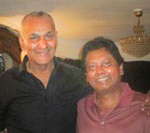 |
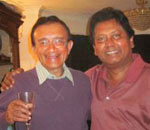 |
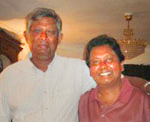 |
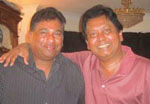 |
Noel Joshua in his enthusiasm was the first to arrive for the party and opened the door for my wife and me. Ram had gone to fetch the Chief guest and as usual got delayed due to the traffic and a diversion caused by a fire in London. Upali has done it again and brought some mayhem to the otherwise peaceful London!! There were hugs and smiles when we all gathered together. The Black Label was unscrewed and the party livened up further. No account of Upali's life so far would be complete without mention of his love for the amber nectar. As the Whisky level dropped from the bottle stories of school took pride of place. We listened as the events of our lives tumbled in to a myriad of exciting stories. Numerous hilarious episodes, anecdotes and jokes filled the air and continued well past midnight. The dinner was a tribute to the culinary expertise of Ranjith and Ram. Meanwhile the girls, Chiu and Charmaine exchanged stories of our families and life in UK and Australia.
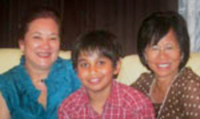 While dining the boys continued unashamedly to relate their unabridged versions of their stories. Each story was self contained and rang as true as the next and correctly captured the life in the late 50's and early 60's. Upali set the ball rolling as he related his exploits as the school hockey captain. We were unbeaten and Upali lead the team with great skill and panache and of course with chacteristic aggression which was his hallmark. His misdemeanours and diabolical advice to the rest of the team could only be believed after the 2nd stiff Whisky. Noel is a fine raconteur and had many tales from his life in the Royal Air Force, adjusted to suit the occasion. It was indeed a memorable evening made possible by the generosity of Ramakrishnan and friends. It was a special occasion to welcome Upali and Charmaine and also his eldest grandson.
While dining the boys continued unashamedly to relate their unabridged versions of their stories. Each story was self contained and rang as true as the next and correctly captured the life in the late 50's and early 60's. Upali set the ball rolling as he related his exploits as the school hockey captain. We were unbeaten and Upali lead the team with great skill and panache and of course with chacteristic aggression which was his hallmark. His misdemeanours and diabolical advice to the rest of the team could only be believed after the 2nd stiff Whisky. Noel is a fine raconteur and had many tales from his life in the Royal Air Force, adjusted to suit the occasion. It was indeed a memorable evening made possible by the generosity of Ramakrishnan and friends. It was a special occasion to welcome Upali and Charmaine and also his eldest grandson.
Saying goodbye after such a fine evening meeting old pals, is indeed difficult and always laced with much emotion. We were immensely fortunate to see our guests and thank them for taking the trouble and the time to see us in London. It is our hope we will see them again in the years to come if not in London in the cosmopolitan city of Melbourne which hosts one of the most loyal band of old boys in the world.
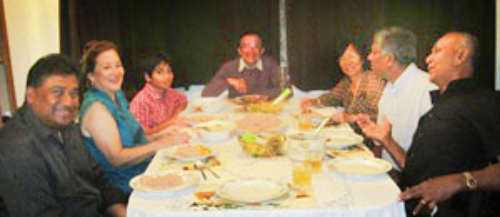
He is now essentially a happy family man and has the satisfaction that comes with the middle years. His transformation from his reckless youth is unbelievably real. He continues to work part time but now has the time to enjoy the beauty, wonder and fascination of nature.
Upali is at present recovering from minor surgery. We wish him a speedy recovery and a return to normal life soon. We send our best wishes to Charmaine during this period of uncertainty and wish them both God’s Good Grace and Help. May their visit to Lourdes bring them the happiness they both richly deserve for a long and happy retirement.
Upali has a love and passion for life like no other and will always remain a free spirit as he was all those years ago.
Links to further reading
From Adelaide, South Australia
Transcribed from the OBUA Newsletter 2009
Looking back on the years of my life I find the most memorable year of my life was 1956. Many major changes occurred in my life in that year, and they were significant events in a life that may have directed me into paths unknown, and unplanned.
And yet, as I believe in a Higher Power that guides me through my life I am confident and thankful. That guidance that has led me now to a point in life where I am at peace, and Contentment with my Life, and a partner who also was a significant person in my major year of 1956.
Since coming to Australia in 1965, and settling in our home in Fulham Gardens in 1972, many of my personal ‘treasures’ were stored away, as we went about establishing ourselves, and dedicated ourselves to the care and guidance of rearing our lovely children. Now in the years of retirement when I have found the time once again to indulge myself in my own dreams, I have come across three old exercise books of mine from my final year at school.
This was again 1956, and I was in what was termed as the ‘Lower Sixth Form’ at Wesley College in Colombo, Ceylon. (Sri Lanka). The Lower Sixth Form was the equivalent of Year Eleven here, to be followed by the Upper Sixth Form, (Year 12), after the final exam you were entered in the University, following a personal interview.
What I am choosing to enter herein are some of the exercises I have found I had written in that class of ‘56, in the subject of ‘Practical Criticism’, relating to English Literature. On re-reading them I was surprised to realize where my love of Philosophy and thought came from!
13th Feb.1956, Subject; ‘Three Advertisements for Smoking.’
The three advertisements all emphasize irrelevant facts about the age, shape and appeal of the Cigarette and the Pipe to the aristocrat. All three could be termed as that type of advertisement that on being read appeals to the mind warped by society, ‘The Snob’.
The fact that the ‘Passing Cloud’ cigarettes oval in shape, and blended with the best Virginia tobacco is not what attracts the customer, but the fact that it is an expensive cigarette which would add to his dignity in public. The statement that ‘ you will not find it in all houses’ is one which adds to it’s rarity and cost and appeals to that type of man who likes to be seen in public, smoking something few others would have.
The advertisement of the Byford Pipe is clearly one, which appeals to the snob. The high language and explanations of the intricate process of the ‘Revolutionary new Capillary Collector’ are relevant but also unnecessary. They are used to make the advertisement more dignified and give a very colorful picture of the Pipe. The fact that it is used by the connoisseur is altogether irrelevant.
The best advertisement, that of the Marcovitch cigarette, is also one, which appeals to the mind, weakened by the desire to be aristocratic in some way or another. Opening with the statement of the Prince of a hundred years ago, who advised the manufacturers to open a bigger shop and begin production on a larger scale, the advertisement goes on to give dates and a brief history of the cigarette which is completely irrelevant in this case. But this is principally what the whole advertisement consists of and helps to add color and pomp to it!
( I was seventeen years old when I did these exercises, and today I was amazed as I have no recollection of writing them, although I see the initials of my Class teacher in my book and I remember him well. He was the first teacher to introduce me to Economics that year and I remember finding the subject most fascinating. Also it is ironic that I was able to be critical of smoking, not having experienced it at that time, but I did smoke later in life, and even began with the love of a pipe I inherited from my brother Wilton, after his death in 1962. It is a pipe he brought back from England and one he smoked for the intervening years. Named a ‘Captain Black’ it is one I still cherish it in my collection.)
And yet another exercise from 1956 that is still very topical today!
“The Importance of the Female figure in Advertising”
In the science of Advertisement Technique of the modern-day it has become apparent that the female figure plays a primary part. Today the exploitation of the female figure and sex has been vulgarized to the crudest extents. Man’s mind of today, though highly developed intellectually, has become warped with regard to sex and femininity.
It is no wonder therefore that certain individuals take full advantage of this trend of the mind, and the result is that in the modern age of advertisements the female figure is used to advantage, and is of greatest importance in this technique.
The theory of old that woman is the world’s most beautiful animal has been worked on, and the placing of the female figure on an advert focuses immediate attention other than any other article on the same poster.
The modern Film has by display of the ‘Feminine Form’ worked on the basest instincts of man. Thus we find that any picture from abroad displays vividly semi-nude women, exposing various parts of their anatomy, and posing in various seductive styles, thus appealing to the male sex, who seeing so much go naturally to see the film, not for the Film’s benefit but merely to see what more they can see, this fact is eminent and has to be faced.
Such posters as are found outside a theater where a film with women like Marilyn Monroe, Gina Lollabrigida and other actresses portrayed are done in the most appealing methods. Showing them in a towel or an almost invisible bathing costume encourages the public to go in, and satisfy it’s baser instincts.
But it must also be stated that the women themselves have brought it upon themselves. They are a secluded part of Society, and are now coming into the limelight and it is more because of them, their walks, methods of dress and the daring fashions that have caused the desire in man to crave the sight of the feminine figure. They have brought about this vulgarization.
The results of the daring exposures of the feminine body have resulted in the Censor. Why should there be a censor at all? It is because of the crudeness, of this art and the bad effect it could have on society. This alone proves that the use of the feminine figure in advertising has been exploited to the fullest degree.
On the other hand there is another side to the use of the Feminine figure in advertising, a much more decent aspect. For instance many adverts of ladies smoking cigarettes, as in that of the ‘DuMauruier’ cigarette displays a certain elegance and is a much more decent advertisement, than of a woman changing her clothes, and the sentence stating” Why not change to a Philip Morris?”
Both these are advertisements of Cigarettes, one, the ‘Demurer’ is a very attractive and pleasing picture to look at, a beautiful lady all dressed up in elegant clothes smoking an expensive cigarette held daintily. This has a certain amount of snob appeal but still is much better than that of the Philip Morris cigarette. The scene of a half-undressed woman is attracting, true, and it may remain in mind longer than the other, but it is utterly debasing.
How much prettier it is to see a beautiful head of flowing long hair, for advertising hair oil, rather than a scantily dressed girl holding up a bottle of the same oil and smiling perpetually at the public!
But thus though they may vary it is the more seductive advertisements which claim more attention and remain more in the mind. But such is Society today and the desire of the Public is played upon, and this is why the technique of advertising has become one of the greatest sciences and will remain so for quite some time in the future, if not for all time!
By Dilshan Boange
Transcribed from the OBUA Newsletter 2009
 Bearing a stark resemblance to a teledrama character that appeared on the famous serial ‘Doodaruwo’ validated Indika Ratnayake being permanently labelled as ‘Podiman’ while in school. And though he found it beleaguering at first this nickname soon turned to a pet-name and transfigured affectionately as ‘Podde’. March 27th this year marks the 26th birth anniversary of the late Capt. Indika Ratnayake.
Bearing a stark resemblance to a teledrama character that appeared on the famous serial ‘Doodaruwo’ validated Indika Ratnayake being permanently labelled as ‘Podiman’ while in school. And though he found it beleaguering at first this nickname soon turned to a pet-name and transfigured affectionately as ‘Podde’. March 27th this year marks the 26th birth anniversary of the late Capt. Indika Ratnayake.
Indika joined Wesley College at Grade 6, in the year 1994, and still to this day I can recall the first glimpse I had of him being introduced to our class by our class teacher Mrs. Nanayakkara. Her words were that there is a new friend who is joining our class (6E), little did we knew how great a friend podde would become in our lives endearing himself to us with his mischievous pranks and sincerely caring ways.
His career in college was characterized by numerous achievements that ranged from studies to sports and a host of extra curricular activities. He became the Secretary of the Junior Buddhist Society in 1997, a forum that set the ground for his skills of Sinhala debating and oratory to gain note.
It was during this time that he took an interest in giving his acting talents a chance to take the stage, and I fondly recall how we put on short play for a variety entertainment program held at the college hall at the end of the term.
Podde played one of the lead roles, which was of a politico who had arrived in hell and tries bribing his way out of paying for his sins. ‘Podiman’ delivered an enthralling performance with his inimitable antics and expressions, which was imperative in making the play a hit amongst our peers.
In the arena of sports Podde first displayed his sporting abilities as a ruggerite in the junior team. Taking an interest in athletics he later went on to become captain of his house in our senior year in college.
While in the upper school Podde’s popularity grew tremendously with both staff and students.The remarks said of him by our school teachers were at times to his detriment on parent’s day when his restless streak of mischievousness came to be mentioned. Podde was famous as a ‘motor-mouthed’ talker whose vocal prowess served him well, and this talent culminated positively when he won the College prize for Sinhala debating (The Ranabahu memorial prize) while in Grade 12.
In my opinion his most significant mark in College was made as a prefect. Unflinchingly he carried out his duties to maintain discipline in the student body; he was known for his sternness which at times brought out an aggressive demeanor. But he was appreciated by many juniors for his fair play and boyishness that pulsated with fraternal feeling, which I know many younger Wesleyites found inspiring. He was ardently committed to perform his role as a prefect and wore his badge with pride as a member of the Prefect’s Guild of Wesley.
Upon completing his A/Ls in Commerce with three ‘B’s he stuck to pursuing his ambition of a military career. He was accepted to the Diyatalawa military academy as an officer cadet of the Sri Lanka Army and soon showed his talents in becoming an asset to the country’s defence establishment.
Winning the prestigious officer-training scholarship to Sandhurst Royal Military Academy in England he returned with valuable military expertise, and passed out from Diyatalawa commissioned to the rank of 2nd Lieutenant in the SL Army’s Engineering regiment.
He earned the respect of both rank and file with his dedicated hard work and conscientious valiance where ever the call of duty beckoned him such as precarious operations as the Silawathura campaign, and several others of note which posted him in the war front.
He was by any standards a remarkable officer and a gentleman who served with untiring effort and undiminished courage, committed to serving the motherland and keeping true to the Wesley spirit which is evoked in our college song in the line - ‘and for our dear land we’d be men of grit and industry’.
He was last stationed in Vauniya, where he spent his final birthday, in active service, turning 25 and being promoted to the rank of (full) Lieutenant that very day. When I called him he said he got the best birthday present ever and told me of the elating news of his long awaited promotion.
When ever he got time off from duty, he never failed to ring up his friends and meet up, now in retrospect it seems he knew he had to make the most of every moment he got to spend the ones close to him, and to make life meaningful.
On his last visit home from the front, as always he met up with a bunch of us, his schoolmates and had a boy’s night out, sharing moments of great laughter and mirth in endeared camaraderie. Four days later Podde passed away falling victim to an anti-tank high pressure mine while engaged in a clearance operation in Vauniya on April 30, 2008.
And so, posthumously, he made the rank of captain.
Never did any of us imagine his unmistakable laughter could ever reach a stop. And now a year is coming to pass, but the memories of him will linger in us, leaving his lively laughter and goodhearted mockery to forever echo in the land called ‘the past’ to which we run to from time to time. He was a brother true to his friends and made every effort to be a friend indeed to those who made meaning in his life.
When the flames of war finally get doused in our beloved country and victory is proclaimed in triumphant finality over the barbarity of separatist terror, may his name be whispered in the solemnity of a prayer to blend with the winds that traverse this earth timelessly
Links to further reading
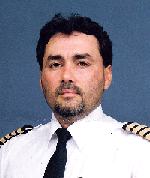
Captain Navin De Silva, recently took up the important post of Chief Pilot of A320s. The 320 is our smallest aircraft, but it is also extremely important because this is the first aircraft that our Cadet Pilots fly, and the first that they will become captains," said Navin. "It's our training ground for future pilots. I enjoy the challenge of the job, especially with so many young pilots being trained in our expanded Cadet Pilot programme. Many in the Airline know Navin as a star-sportsman, who excelled in cricket, squash and golf. He captained the Sri Lanka Under-19 Cricket Team in 1982 (with Arjuna Ranatunga as his Vice Captain), and would probably have gone on to represent Sri Lanka, if he hadn't chosen flying as his career.
Navin always wanted to fly, a boyhood dream !!. He joined Sri Lankan as Cadet Pilot in March 1986, out of the Sri Lanka Air Force where he had served a year and a half as a volunteer pilot to fixed wing aircraft, stationed in Jaffna and Ratmalana. Navin built his reputation in the industry with his love for flying and his sharp intellect. To his great advantage he was invariably a calm and rational man. The same year he became a Second Officer on the Lockheed L101 Tristar, and two years later was promoted to First Officer on the Boeing 737. He became First Officer on the Tristar in 1990, and then First Officer on the Airbus A320 in 1993. In 1994, Navin became a Captain on the A320, followed by Captain on the A340 in 1996 and on the A330 in 2000. Now 42 yrs old he became the Chief Pilot of the A320 in March 2006. A line Instructor and Simulator Instructor Navin says he enjoys imparting his knowledge and experience and watching youngsters grow. He never lost sight for his mission for safety and efficiency in the air and on the ground. His honesty and integrity has gained him the respect of his friends and colleagues and also of his numerous trainees under his wing.
Teaching is a talent and the Instructors must keep themselves abreast of the latest developments in aviation. Flying is a hobby turned profession, a dream of young boys and girls. At Sri Lankan, they get opportunities to fly sophisticated aircrafts at a young age, which. is not something they would do in Europe or the US to become a commercial airline pilot. Voted Schoolboy Cricketer of the year in 1980 Navin captained the Sri Lankan school team on tour of UK and India. He captained Wesley College 1st XI and its athletics team and was senior prefect of the school. He obtained school colours in badminton and rugby in addition to cricket and athletics. He was also awarded cricket colours by the Sri Lanka Air Force, and also colours in both cricket and squash by Sri Lankan Airlines. Five years ago, he took up the game of golf, and has already impressed, representing Sri Lanka in the Asian Golf Finals in Brisbane, representing the country in the World Golf Finals in Stuttgart, Germany, and winding the Mercedes World Finals in 2002. He won the World Inter-Airline Golf Tournament in New Delhi in 2003. Navin and his wife Ruveni have three children, two daughters and a son Neshika, 13, who is at Ladies College; Rahul 11, at Wesley who is following in his father's footsteps and captained the school's under-12 rugby team; and Sulani, 4.. They are a very close-knit family and believe in traditional values.
He was the President of the OWSC in 2000/2001 and currently is the Vice President of the Old boys Union of Wesley College Colombo. He is heavily involved in fundraising for his alma mater. He has always been a true blue Wesleyite more so since leaving school when he has been at the forefront of school politics to keep Wesley College in the top echelons of education in Sri Lanka. In recognition of his immense contribution to the school Navin and his wife will be the Chief Guest at the Wesley College OBU Dance 2009 to be held in London in September. A fitting tribute to a loyal young old boy. We wish Navin a long and rewarding career in the airline industry.
Capt. Navin de Silva to be felicitated - Daily News 9th May 2003
The old Wesleyites sports club at its forthcoming AGM to be held on 10thMay, 2003, will felicitate Capt. Navin de Silva, a distinguished son of Wesley and past president of the Old Wesleyites Sports Club. His contribution towards both the School and OWSC could be an ideal benchmark for any to follow, and most fittingly his portrait will be unveiled at this
function.
Navin aged 40 years, educated right through at Wesley, was the Senior Head Prefect, received School Colours for Cricket, Badminton, Athletic and Rugby. He captained the Senior Cricket, Athletics and Rugby Teams and captained the Sri Lanka School Cricket Team in 1980 that toured England and the Under 22 team which played against India.
During the period 1980-81 he scored over 1000 runs and took 50 wickets, was awarded the Best Captain, Best All Rounder and received the School Boy Cricketer Award of the year. Later he represented NCC, CCC and Tamil Union in Sara Trophy Cricket.
In pursuing a career and in keeping with his reputation as a "High Flyer" Navin chose the path of navigating in the sky. He served the Sri Lanka Air Force as a Volunteer Pilot for 1 1/2 years and joined the Sri Lankan Air Lines, where he has been employed for past 17 years and currently serves as an Instructor Captain. His latest interest is Golf, where within a very short period in taking to hit the stationery ball has won several local and international tournaments. In the international tournaments he took part so far, he was a finalist in the Asian Finals held in Brisbane, World Finals Stuttgart both sponsored by Mercedes. He became the Champion at the world International Air Line Championship in New Delhi and took Sri Lankan Air Lines to the runner-up stage in the team event.
He was the OWSC president from 1999 - 2001. During which period he was responsible for many fund raising projects for his Alma mater. He was also the pioneering strength towards realizing the 2nd development phase of the Club, which boasts Billiards Room and a Squash Court. (RD)
Navin de Silva excels at World Finals
The former skipper of the Wesley Cricket team and now Sri Lanka Air Bus Captain, on taking to golf just fifteen months ago has done the country proud by being the “B” category runner-up at the Amateur World Golf finals held at Stuttgat Germany.
His performance was largely responsible for his three member team,. East Asia, comprising Singapore, Brunei and Sri Lanka, winning the “Nations’ Cup”.
This tournament sponsored for the 12th consecutive year by Mercedes Benz draws around 40,000 amateur golfers through the year, from about 50 countries, which narrows down to 120 at the finals. Navin did will to be first runner-up in Colombo, to be eligible to participate at the Asian finals in Brisbane – from where he qualified with five other Asians to proceed to Stuttgat, to take part in the world finals. He was runner-up in the “B” category having scored Stableford points 37, 35 and 40 respectively.
Playing with a handicap of 13, his final round in rainy cold weather to register 40 points proved decisive to clinch the Nations’ Cup.
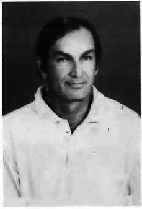 |
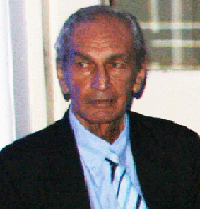 |
| While at Hong Kong and Shanghai Bank | Neil at the Reunion Sept 2012 |
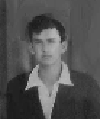
Old boy of Wesley College, fellow classmate and later workmate, my old friend Neil Gallagher took time off to spend a very pleasant afternoon at my home recently, chatting about old times. Neil was holidaying “Down Under” when he managed to visit Victoria, New South Wales, ACT, Southern Queensland and South Australia, meeting up with many of his former school mates on the way. We were students at Wesley when Rev. James Cartman was Principal, and later Mr C J Oorloff and others.
Neil was a keen sportsman, concentrating on cricket and was a member of that now famous unbeaten XI in 1953, under the Captaincy of Bryan Claessen. He joined the staff of the Hong Kong and Shanghai Bank in Colombo sometime after I did, and we remained there until I emigrated to Australia in 1963. Neil has recently retired from the Bank’s Colombo Office and certainly appears to be enjoying his retirement. He was the guest at a gathering of ex Hong Kong Bank boys in Melbourne before he returned home. It was great to meet Neil after more than forty years.
Transcribed from the OBUA Newsletter
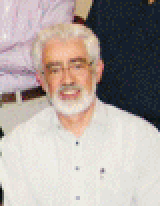
Lorenz, a member of the Wesley Old Boys’ Union in Melbourne was a student at Wesley College from 1950 to 1961. At that time the Principals were Mr. C J Oorlof (1950-1957) and Mr. P H Nonis (1957-1961). Lorenz migrated to Australia (In January 1962.
Quiet spoken and reluctant to talk about himself, Lorenz lists as his hobbies reading, gardening, bush- walking, photography and listening to good music, all of which he enjoys in the tranquil atmosphere of his home in Mt.Evelyn, in the foothills of the Dandenong Ranges.
His abiding interest in music has led him to the world of choral music and male voice choirs, with whom he has sung on numerous occasions at concerts, charity events and social engagements. He has sung as a member of the combined schools’ choir alongside several other members of the Wesley OBU at the annual Combined Colleges of Sri Lanka Carol Service since its inception.
Lorenz has sung on six occasions at the Melbourne Concert Hall with the Melbourne Praise Choir and has produced a compact disc with an “acapella” choir he conducted for six years.
He has worked for the AMP Society for most of the time since his arrival in Australia and recently completed thirty-six years of service.
I chatted to Lorenz when we met at the Wesley Dance last October and was intrigued to learn about some of the projects he and his wife Sandra have undertaken. They are active in Pastoral Ministry and support the work of Parent-Controlled Christian Schools.
They are foster parents to a 20-year old child who requires special care and they, along with others, have volunteered their time and facilities at home to care for this child.
Lorenz will be one of a group who will tour Sri Lanka sometime early next year, combining a schedule of concerts with a sight-seeing trip around the Island.
He says his future plan is to return someday to Sri Lanka after he retires, and to stay with relatives for as long as it takes to complete an undertaking to assist with leadership training and to participate in the Ministry of his former parish church.
This could be the most ambitious project of all, and we wish Lorenz and Sandra every success.
It is the striving of each of us, in realizing our dreams, ideals, ambitions, whatever – that results finally in making our lives more meaningful and in the process perhaps also makes life a little less difficulty for some one else.
That’s not a bad achievement. Just quietly..........

The O.W.S. C. came into being in 1941, mainly due to a bond amongst hockey players in that era when it became necessary for these players to continue the sport after leaving College. The idea of the formation of the club was conceived by Old Wesleyites T.M.N. Mahamooth J.A.A. Perera and A. Nithiyanandan which concept found favour with Mr. P.H. Nonis the Vice Principal. The first historic committee was elected with the assistance of the doyen of Hockey, Walter Jayasooriya, at a meeting at Ranabahu Garage, Braybrooke Place, Slave Island. This was the humble beginning of a club that was destined to lift the image of Wesley College to great heights. The main members of that first committee were Patron the Principal Rev. David S. T. Izzett. President W. Harris de Kretser, Secretary T. M. N. Mahamooth and Treasurer J. A. A. Perera.
The O.W.S.C. was in the forefront of Hockey in Ceylon (as it was then known). The President of the 0.W.S.C. Mr. Harris de Kretser served as a Vice President of the Ceylon Hockey Association in 1941 whilst Walter Jayasooriya and T.M.N. Mahamooth served as council members. Both Jayasooriya and Mahamooth were responsible for the formation of the Ceylon Hockey Federation and the Colombo Hockey Association and did much to organize local tournaments and arrange tours to and from the country. It may interest the reader to know that in the Silver Jubilee tournament committee comprising of five, four of whom were members of the 0.W.S.C. viz. Walter Jayasooriya Chairman. T.M.N.Mahamooth Secretary, Dr. A. S. Ismail and A. Mylvaganam.
Though hockey was the main purpose for which the club was formed the club however in those earlier years did not confine itself to hockey alone. Being affiliated to the various sports bodies it also played cricket matches, traveled all the way to Galle to play a soccer match and the athletes of the club participated in the A.A.A. Championships, with the basket ball players doing duty to the club in the YMCA. Open basket ball tournament for the Carnmack Cup.
Socializing was a part of the club's yearly program The get-togethers and fellowship binges weren't elaborate and so organized as seen today, They were held with the members donating cash or bringing an item of food or drink. The high point of their social activity came, when the club held its first ever dance (the double blue dance) at the Colombo Town Hall on 23rd November 1946 music was provided by the Crake Brothers and tickets were priced at Rs. 5/-with the ladies being allowed free. The dance turned out to be a great success with over 500 persons participating. The O.W.S.C. since its inception in 1941 displayed much enthusiasm which was maintained right up to 1961. But thereafter for a period of 11 years (1961 - 1972) the club was inactive.
O.W.S.C. REVIVED IN - 1972
The club however bounced back in 1972 through the efforts of the Vice-Principal L.A.Fernando, Vice-President T.W. Camball and Hockey Captain Shanthi McLellend. In the field of hockey, the year 1972 turned out to be a successful one for the old Wesleyites, in that they won the Pioneer Shield, the Bacon Cup and were runners-up in the Andriesz Shield.
OWSC REVIVED - 1977
Lying dormant for two years the club in 1977 was activated by T. W. Campball, President , Walter Jayasooriya Vice President, with Donald De Silva as Secretary and S. R. Amarasinghe as Treasurer.
O.W.S.C. REVIVED IN 1989
At a Dinner hosted by Mr. Shanthi McLellend at the Taj Samudra for L. C. R. Wijesinghe and L. R. Goonetilleke in 1988 the revival of the 0.W.S.C. was discussed. The subject was in the mind of L.C.R. Wijesinghe and LR. Goonetilleke, but the initiative was taken only in 1989 when they decided that for the purpose of doing something meaningful for the school and to find a meeting place for Old Wesleyites, reviving the O.W.S.C. with Old Wesleyites who will be committed to the cause, was the only way. They had to find a President who will be dynamic and respected.
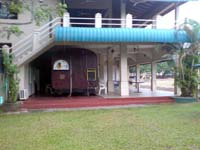 A notice was published requesting all old Wesleyites to attend a meeting at the college hall on the 23rd March 1990 to revive the old Wesleyites Sports Club. There were 37 old Wesleyites present on this date. Mr Dunstan Fernando the Principal chaired the meeting. He welcomed those present and explained the purpose for convening the meeting. Mr. Walter Jayasooriya the founder member of the Old Wesleyites Sport Club out-lined the history and advised that a club house was set up and a constitution had being drafted in 1966.
A notice was published requesting all old Wesleyites to attend a meeting at the college hall on the 23rd March 1990 to revive the old Wesleyites Sports Club. There were 37 old Wesleyites present on this date. Mr Dunstan Fernando the Principal chaired the meeting. He welcomed those present and explained the purpose for convening the meeting. Mr. Walter Jayasooriya the founder member of the Old Wesleyites Sport Club out-lined the history and advised that a club house was set up and a constitution had being drafted in 1966.
Prof. Mahroof Ismail was appointed the President and a committee consisting of 5 Vice Patrons, 15 Vice Presidents, Treasurer, Secretary, 4 General Committee members, 7 convenors of sports were appointed.
L. R. Goonetilleke and Tyrone Maye met the Minister for Transport Wijepala Mendis with a close friend of the Minister and also sought the assistance of the speaker M.H. Mohamed to obtain the railway carriage for a consideration of Rs. 5,000/- L.C.R. Wijesinghe and L.R. Goonetilleke with the assistance of another Wesleyite Cecil Fernando' . attached to the Railway, Department selected a carriage. Logistics of transporting the Railway Carriage had to be worked out. Mr. Sunil Rupasinghe an Old Boy helped with a long bed trailer with M/s Gaffoor and Ashroff helping with the crane to hoist the carriage on a trailer. Mr. O.K. Hemachandra presently D.I.G. organized two police riders to clear the road to bring it from the railway yard to Campbell Park. Unloading was done with the assistance of the same crane.
Refurbishing the carriage was a tough task and our gratitude toL.C.R. Wijesinghe and Kenneth Goonetilleke who worked tirelessly along with Ranjith Amarasinghe an Old Boy of Wesley and Managing Director of Fab Construction Co., Ltd. These people were responsible for the building and other facilities and were assisted by the President, Lucky Goonetilleke, Denzil Perera and Tyrone Maye. L.C. R. Wijesinghe spent all his free time at the site until the Club House was completed and we are grateful for his commitment.
On the 29th of June 1991 the Unique Club House was opened. The motivating genial President, Prof. Mahroof Ismail, who had an excellent rapport with all concerned was requested to be the Chief Guest and declare open the Club House. To open the Club House was a honour bestowed on a President, who was busy as Dean of the Faculty of Medicine, but always gave his time to ensure that the club achieved its targets in all spheres. Mention must be made of assistance given by Mr. Wilhelm Vandort to ensure the Opening was held as scheduled with support from Tyrone Maye and other members of the Committee. Richard Dwight our scribe, has helped us to get the required publicity and also edited the souvenir published for the opening of Phase II of the Club. He was also responsible for the Newsletters.
The Annual Dance of Old Wesleyites was traditionally held by the OBU, but in 1990 the OWSC decided to organize it with the concurrence of the OBU. Since then, the Club organized the Dance very successfully. The proceeds from the Dance helped to swell the coffers of the club. The conveners of the Dance were 1990 - 94 Denzil Perera, 1995 - Jeremy Brohier, 1997 Navin De Silva. Navin set a target of Rs.1 million in, as revenue and almost achieved it.
The President Prof Mahroof Ismail was very keen of having a fixed depost of Rs. 1,000,000/- to ensure that the club was stable, Mr. Kenneth Gunetilleke organized a Mega Motor Show to be held at the B.M.I.C.H. on 22nd
- 23rd August 1992 to achieve the President's target. This turned out to be the most spectacular Motor show ever held in Sri Lanka. He was ably supported by Ajith and Rohan Perera.
Mother event which has earned a name is the School Invitations Six a Side Cricket Tournament. Eric Gauder proposed this event be held in 1993 and been convener since its inauguration in 1993. His skill has earned this event a reputation as the best conducted six a side cricket tournament. The club is grateful to Eric Gauder for up lifting the image of the club and the school, where in 1998 we had teams from the North and East playing in the tournament for the first time. This was Wesley' contribution to interaction between communities and our contribution to foster peace and unity in the country. No other organization had invited teams from North and West to participate in a tournament in Colombo with live television coverage on the final day.
Denzil Perera - Gifted a Billiards Table

Mr. Denzil Perera was appointed the President in 1994 with Tyrone Maye and Sunil Fernando as Secretaries during his tenure. It was during his tenure of office that Captain Navin De Silva was appointed as convenor for the expansion of the Second phase of the club. Navin De Silva was motivated by a donation of Rs. 25,000/- made by Dr. G. Paul and the reserves in the club's coffers. He had Ivor Mahroof as Secretary of the project committee and late R. Kukendran designing and supervising the project. Some old Wesleyities contributed generously for the expansion and their names appear in the Roll of Honour displayed at the Club House. A plaque to honour President Denzil Perera was installed, on his gifting a magnificent Billiards table to the Club. His splendid and generous munificence, certainly enhanced the Club's status and profile.
Ceremonial Opening of the Denzil Perera Board room
The upgrading of the meeting room to a board room is to be named after Past President, late Denzil Perera. The board room looking very modern and smart with fresh coat of paint, better lighting, new furniture, new air conditioners amongst other adjustments is now a wonderful place to have meetings. The area adjoining the board room has also been re-done with an artistic touch.
The Board room was opened on 17th March, 2011 at 6.30pm in a simple ceremony by guests of honour, Rienzie Wijetileke and Neville Perera (Denzil’s brother).
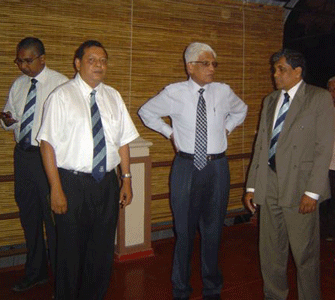 |
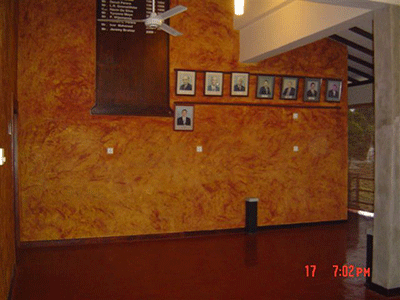 |
The Impressive OWSC Building
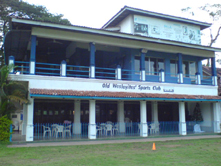
The electrical work was undertaken by the generous committee member Suresh Nithiyanandan at no cost to the club with Clive De Silva, the philanthropist under taking the plumbing free of charge. The foundation stone for the Phase II was laid by Old Boy Reinzie Wijetilieke Managing Director, Hatton National Bank on 28th November 1995. The soft opening was by Thilanga Sumathipala the current president of the Board of Control for Cricket. Phase II of the club was officially opened on July 19th 1996by Hon. Kingsley Wickramaratne, Minister of Internal & International Commerce & Food as Chief Guest. Navin De Silva was supported by Sunil Fernando, Ruwan De Silva, Lucky Goonetilleke, Jeremy Brohier, Tyrone Maye and his able secretary Ivor Mahmof. Selvakumar has been generous with his contribution at all times and sponsored the printing of the Souvenir. Rizwan Sahabdeen always whenever requested made as substantial donation to support our cause.
Lucky Goonetilleke took over as President in 1996 and embarked on recovering the deficit from construction of Phase II, launching tbe fund for a Swimming Rd and stabilizing the finances of the club. All these have been achieved although lot more funds are required for a swimming pool.
The first Schools Invitation seven a side hockey tournament was held in 1998 with Rohan Amarasinghe as convener and Mohamed Rizvi as Secretary. There were many bouquets for organizing an excellent tournament.
It will be relevant to mention the contribution made by the OWSC to sport at Wesley. The club has recognized the efforts of the Coach Bandula Warnapura and Coordinator of Cricket Kenneth De Silva by rewarding them for their achievements. Re-organized the structure of the Cricket and also increased the salary of the Coach in keeping with current emoluments. Similarly the salaries of the Hockey & Rugger Coaches were increased but not adequately. Emoluments for Coaches and Masters must be raised to bring job satisfaction and commitment. The Club has towards this end inaugurated a fund with Wilhelm Deutrom of Australia making the initial contribution.
Nutrition has been provided to the boys engaged in Cricket, Hockey and Rugger, Residential Camps have been funded by the OWSC. Contributions to Cricket, Hockey and Rugger gear have been made by the club. Rugger and Cricket clothing have been purchased. Expenditure has also been incurred on maintaining and improving the ground and gifting a matting every year with boundary ropes. Contributions were also made for overseas tours of Wesleyites representing the National Schools sides in Hockey and for the purchase of Blazers for Prefects.
We are grateful to the O.B.U.' s of U.K. and Australia for supporting us. The O.B.U. of U.K. donated Sterling pounds 1,000/- and vitamins were gifted by Senthil Sinniah of U.K. Wilhelm Deutrom and Upali Perera of Australia have been great benefactors of the Club. We look forward to continued support from our overseas O.B.U's.
We must not forget those who built the club to it's present pristine position. Prof. Mahroof Ismail who was President from the time of the revival in 1990 until 1994 who gave the lead in all activities. Richard EbeIl and Shanthi Sadanandan were the custodians of the exchequer 1990-94. They ensured that the credibility of the club was never in doubt. They were followed by Ruwan De Silva who still continues as Treasurer, These gentlemen never enjoyed a function as they were behind the counters or table counting the collection and it is heartening that our credibility has never been in doubt.
Ajith and Rohan Perera, Kenneth and Dian Gunatilleke, were secretaries and assistants who steered the course with such dedication that own businesses were affected. Tyrone Maye succeeded Ajith and then young Ivor Mahroof took over. He was a young man with great responsibility in a leading mercantile establishment, but never failed to do his duty by the club. Gerard Fernando succeeded Ivor Mahroof in the current year. Our thanks to Mr.. 0. K. Dayaratne who has given five years of dedicated service and continues in the same capacity.
Socializing was apart of the Club's yearly program.' Mr. Parakkrama Wijemanne our social Secretary like his father late D.S. Wijemanne always volunteered to subsidize the event in addition to organizing very enjoyable and successful "Club Nites"
The Old Wesleyites Sport Club entered a side for Division III Tournament of the Board of Control for Cricket. We are indebted to Mr, S unit Fernando who has single handedly handled the side. In the current year we entered a team for the Basket Ball Tournament.
Mention must be made of the class of 90's who have banded themselves together to support and develop sports. This augurs well for the sports club which is assured of it's objectives being achieved even in the future.
125th year Anniversary celebrations commenced with the Schools Invitation Seven a Side hockey Tournament on 13th September 1998. It was followed by the Schools Invitation Six Side Tournament over three days from 26th - 27th September '98. A feature of this tournament was that teams from the North and East participated which made it a truly All Island tournament. There are other tournaments and events planned from 2lstFebruary 1999 to celebrate the 125th year of Wesley's educational excellence. On 21st February Golden Oldies Six a Side Tournament followed by the Anniversary Ball on 27th February 1999.
A triangular Cricket Match among the Old Boys of Australia, UK, and Sri Lanka is fixed for the 01st March 99. Pot Black Snooker is scheduled from 28th February to 5th March and a Hockey Match between present and past Wesleyites against the overseas OBU's On 7th March 99, the Grand Finale will beheld at the B .M.I.C.H. where awards will be presented to winners of the All Island Art competition of the 125 schools selected from district competitions held in 1998.
Old Wesleyites Sports Club celebrated its Oak Anniversary recently. The event was attended by a number of Past Presidents of the Club. The Old Wesleyites Sports Club came into being in 1941, mainly due to a bond amongst hockey players in that era when it became necessary for these players to continue the sport after leaving College. The idea of the formation of the club was conceived by Old Wesleyites T.M.N. Mahamooth, J.A.A. Perera and A. Nithiyanandan. The concept found favor with P.H. Nonis the Vice Principal. The first historic committee was elected with the assistance of the doyen of hockey, Walter Jayasooriya, at a meeting at Ranabahu Garage, Braybrooke Place, Slave Island. This was the humble beginning of a club that was destined to lift the image of Wesley College to great heights. The main members of that first committee were Patron the Principal Rev. David S. T. Izzett. President W. Harris de Kretser, Secretary T. M. N. Mahamooth and Treasurer J. A. A. Perera.
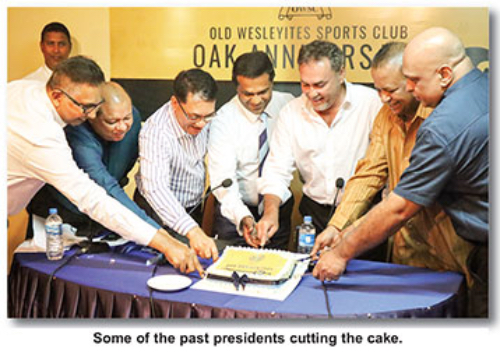
But for a period of 11 years (1961 – 1972) the club was inactive. After having its revivals there was a wind of change in 1988.
At a dinner hosted by Shanthi McLellend at the Taj Samudra for L. C. R. Wijesinghe and L. R. Goonetilleke in 1988 the revival of the 0.W.S.C. was discussed. The subject was in the mind of L.C.R. Wijesinghe and L.R. Goonetilleke, but the initiative was taken only in 1989 when they decided that for the purpose of doing something meaningful for the school and to find a meeting place for Old Wesleyites, reviving the O.W.S.C. with Old Wesleyites who will be committed to the cause, was the only way. They had to find a President who will be dynamic and respected.
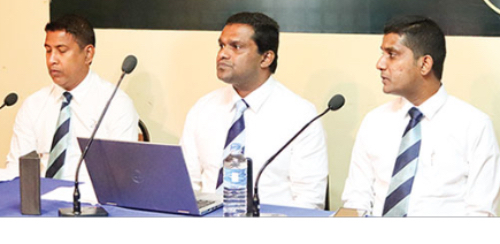
Then in March 1992, a newspaper advertisement was inserted in the Ceylon Daily News inviting past Wesleyites to meet in the Highfield Hall, in an effort to revive the dormant Old Wesleyites Sports Club with the election of an Executive Committee. There were 37 old Wesleyites present on this date. Dunstan Fernando the Principal chaired the meeting. Walter Jayasooriya the founder member of the Old Wesleyites Sport Club out-lined the history and advised that a club house was set up and a constitution had being drafted in 1966.
Prof. Mahroof Ismail was appointed the President and a committee consisting of five Vice Patrons, 15 Vice Presidents, Treasurer, Secretary, four General Committee members and seven conveners of sports were appointed. The OWSC – situated in the familiar surroundings of Campbell Park is considered “home” to all Wesleyites, because it is the meeting place for all Old Boys of the Double Blue fraternity.
To many Wesleyites this was “home away from home”. The Club has grown from strength to strength over the years, and the standards have been maintained. “The Carriage” has become a landmark in Colombo not only to the Double Blue fraternity but to many others.
There have been great Wesleyites who shouldered the weight and responsibility of the OWSC. The club continues its forward journey with the support of its old boys and caring for the home away from home.
OWSC President 2024
Senaka Amarathunga
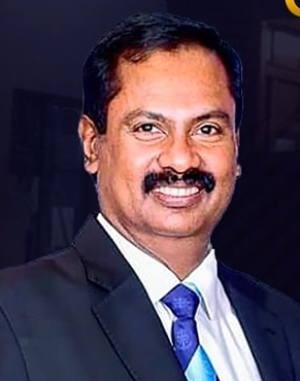
.....................................................................
Recent Past Presidents
Denzil Perera 1994 – 1996
L. R Goonathilleke 1996 – 1998
Navin De Silva 1998 – 2000
Tyronne Maye 2000 – 2002
P Wijemanne 2002 – 2006
Rohan L Perera 2006 – 2008
Ivor Maharoof 2008 – 2009
Jeremy Brohier 2009 – 2011
Ritchie Sappideen 2011 – 2013
S. Renganathan 2013 – 2014
Fowzil Nawaz 2014 – 2017
Farman J Cassim 2017 – 2019
Maithri U Vithanage 2019 – 2022
Dharshana Liyanage 2022 - 2023
Senaka Amarathunga 2024 - 2025
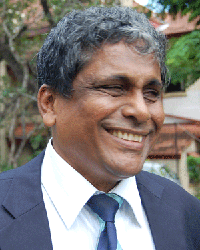 The Wesley College Sports Club was started 80 years ago when the World War II was in full blast. A few of the ardent Old Boys got together and formed the Sports Club particularly to continue the great achievements of Athletes, Hockey players, and Cricketers.
The Wesley College Sports Club was started 80 years ago when the World War II was in full blast. A few of the ardent Old Boys got together and formed the Sports Club particularly to continue the great achievements of Athletes, Hockey players, and Cricketers.
We must remember some of the outstanding athletes who excelled for Sri Lanka. M. Mathias was one outstanding athlete who took part in the 100m and 200m at the Commonwealth Games in Australia. He was a Public Schools winner who brought lot of honour to Wesley running on grass tracks and poor quality spikes. M. Ahamat still holds the One Mile record for over 70 years. In the early 60’s, J. Winslow brought a lot of credit winning the Pole Vault event at the Public schools and at National level. His achievement was outstanding as he used a bamboo pole. We must admire Darrel Maye of Wilkin House winning the 1 mile, followed by Akmeemana of Hillard House. One other outstanding performers were Conrad Fernando who won the Half Mile at the Public Schools and Lal Fernando who won the Public Schools event. One of natural athletes who did extremely well to win in the 100m, 200m, and Long Jump was Reginald Bartholomeusz. He captained the Sri Lanka Rugby team and captained the CR&FC team to lead it become champions. He also played Hockey and Cricket for Wesley. Both Regi and Shanti represented Ace Athletic Club's visits to Bangalore, India. Shanti McLelland holds the 800m record and won the Mile event three times. At National Level Dr. Shanti McLelland won the Pentathlon and was Runner-up in the Decathlon events.
In the field of Hockey, A. Mylvaganam the star full back who played for Ceylon and captained the national team has to be remembered as an outstanding player. He was a National hockey umpire. T.M.N Mahamooth and Walter Jayasuriya spent a lot of time developing hockey in Sri Lanka. They traveled to India to learn and form the Associations in Sri Lanka. Walter managed the first Sri Lankan team to play in Malaysia, He was the king of Sri Lankan hockey. He took many Sri Lankan and Colombo hockey teams abroad and later made sure four International Umpires were appointed. Walter and Rohan Amarasinghe were two of them. Another Wesley hockey player who promoted the game was Mervyn Peiris who was President of the Colombo Hockey Association. D. S. Wijemanne played for the Old Wesleyites team and always helped and supported the hockey team
Dr. Lou Adihetty was selected to play for Sri Lanka at the Asian games 1962. Lou was an outstanding cricketer who captained the school team. He brought the Red Sox hockey team form Switzerland many times to play against the Wesley team. Rajah Jayasuriya, Rohan Amarasinghe, and Shanti McLelland was in the Asian games pool 1974. An outstanding goalie who gave up keeping goals for hockey to play Rugby was Bashurdeen Musafer. He captained the CR&FC team and was a National player. He represented in soccer and cricket. Bill Deutrom has to be given credit for being selected to represent the Schools team as a goalie. He too played Rugby and Cricket for Wesley. C. T. Rodrigo was awarded a certificate for his outstanding performance at the National level. He took 9 wickets for 8 runs which is a record. He must be remembered for winning the National Championship as a Colombo H.A. player at Matale in 1973. Rajah Jayasuriya must be given lot of credit for helping young Wesleyites to play hockey and develop the hockey team for Wesley. His sister Nimal Jayasuriya was a Wesleyite and she excelled at the Women’s Association. Rajah’s son captained the many teams and was a outstanding goalie. The Sports Club was almost without activity in the late 60’s and early 70’s.
Then Dr. Shanti McLelland with the support of Rohan Amarasinghe formed the Old Wesleyites Hockey Team. Tuan Camball assisted team and acted as the Chairman of the team. Mr. L. A. Fernando was a great supporter of the team and acted as the coach. His son Ravi Fernando also played for the team. This team won the Pioneer Shield and Bacon cup trophies. The team has to be remembered as they were unbeaten at the Colombo tournaments. Goalies were Guzzi Musafer who captained the school’s team, M. P. Edema, M.C.A Cader, and A.L.George who represented Sri Lanka and was an Asian games player. Full Backs were outstanding player Rohan Amarasinghe who played for Sri Lanka and was elected as an International umpire. He had the privilege of umpiring the International match between Pakistan and India in Lahore. At the Asian Championships Later he was elected to be the Chairman of the National Umpires Committee.
Five players were selected to the National team. The other players were of the Old Wesleyites team were, Sridharan and Hariharan Jeganathan who represented the National team. Jayalal Jaysekara, Sandy Musafer, Hafeesz Musafer, Zubair Hassen, Wing Commander Kingsley Samaratunga, Jayantha and Parakrama Wijemanna, Neil and Christopher Harvie, Buster Harvie, Priyantha Perera, Adrian and Rohan Wickramaratne, Sunil Rodrigo, Claude de Silav, Kingston de Silva, Senaka Amaratunga, Regi Bartholomeus, A. George, and Donald de Silva. Donald was a great National Umpire and wonderful team mate. Later Rohan Amarasinghe represented the Mercantile team and the National team. Dr. Shanti McLelland captained the Colombo Hockey Association team to win the National Championships with an outstanding performance. He also played as a Sri Lankan player to win the Corera Cup with India. Shanti trained the Mercantile team to win the championships when their first team refused to represent at the Nationals. Shanti McLelland with Mr. A. Suppiah who was the master-in-charge of hockey promoted the Colombo Hockey team.
Four national level outstanding players did not play for the Old Wesleyites. They were, Clifford Rodrigo, M. T. Swangsa, Sarath Wickramaratne, and Buster Harvie. However, they all represented the country.
Cricket – Wesley had very good players. Darrel Maye was outstanding when he bowled the favourites Royal out to be selected the best national team under L.C.R WIjesinghe. The following year Milroy Muthuvaloe kept the record to be an unbeaten team. Navin de Silva brought a lot of credit when he was selected to captain the national schools team to England. Furthermore Amaresh Rajaratnam was selected as the Cricketer of the year with his captaincy of the champion team. Mahendra Dissanayake has to be celebrated as one of the outstanding players with his record centuries and his captaincy of an unbeaten team. Russel Harmer represented Sri Lanka along with three others. They were Sridharan Jeganathan, xxxx and xxx. P. S. Rodrigo, Rev. Rohan Wijessinhe, Prasan Wijesinghe, Ajith Wijesinge, Sxxxx, Rajaratnam, Shan, and many national players highlighted the Badminton team’s performances.
Another sport which brought fame to Old Wesleyites Sports Club were S.Chang captain of the YMBA Judo team. The YMCA team had Asoka Jayawardane as a black belt national champion. Asoka was also Wesley rugby captain. Also, Cassim Cader another Wesley Rugby, Athletics and hockey player won the national black belt championships. Other Old Wesleyites who were members of the team: Ranjit McLelland, Afghar Mohideen, Sextus Taylor, S.Basnayake, and Vijith Kuruppu, Vijitha was a Queen Scout and an excellent swimmer.
Two great swimmers brought fame to the Old Wesley Sports Club. They were the Vandendreizen brothers. Vandendreizen is now the master-in-charge of swimming and senior coach. Swimming was an active part of the Sports club, but not now. Boxing was a sport that Wesley participated in but gave up as it was considered dangerous. Mr. Nissanka was the master-in-charge. Volley Ball and Tennis were two games Old Wesley Sports Club stopped playing in the 60’s. Wrestling was represented for a short time. Kulasuriya was one who is remembered. But, now Table Tennis continues with lot of interest.
We have to remember those who kept the club going in the 60’s and 70’s with great difficulty and very little support. Prefect of Games Mr. Edmund Dissanayake was a strong promoter making sure the members met at least once a month. The other who attended without fail were Frank Samaraweera, J.B.W. Karunatillake, Cecil (Cucka) Fernando, Sam Silva, D. S. Wijemanne, Nihal Wijetunga, Garreth Jayawardana, M. Muthuvaloe, Sarath Wickramaratne, R.M & Rex de Silva, L.R. Goonatillake, Shelton Peiris, Mervyn Peiris, T.M.N.Mahamooth, Walter Jayasuriya, Lakshman Samaraweera, Afgar Mohideen, Kodituwakku brothers, Kenneth de Silva, Diyanesh Rajaratnam, Shanti McLelland, and a few others.
We must not forget to thank the President of the Methodist Church, Rev. W. P. Ebenezer Joseph for his gracious act to allow the Sports Club to kept open, despite the claims that it should be closed by a few who did not support its activities. This was done at the request of the Principal of Wesley College and Old Boy, Dr. Shanti McLelland.
Last but least, we have to thank the current President of the Old Wesleyites Sports Club, Maithri Withanage for his contribution to the club and Wesley. He did a lot of work to collect money for the luxury bus Wesley owns now. He organized events for organizations during Christmas. We wish the Old Wesleyites Sports Club as it celebrates 30 years of renewed energy and enthusiasm.
From Afghar Mohideen
Read with Interest your mail on Wesley Sports in the years gone by ,If my memory serves right to the best of my recollection, I would like to make a few corrections.
Bashudeen Musafer joined the Army straight from school and represented the Army in Rugger, which Team he also Captained. Bashu played for the Army till he retired and migrated to Australia, he never did play for CR&FC.
Reggie Bartholomeusz played regularly for CR and also for Sri Lanka, unfortunately he never got an opportunity to Captain CR although he very much deserved to Captain CR . I recollect Reggie mentioning to me that CR always preferred Royalist , Thomian , Trinitian or Josephian as Captain.
Re Judo at Wesley, in 1964, Wesley put up a Judo team to represent College against home teams YMCA and the YMBA. The Wesley Team was represented by Vijith Kuruppu, M.C.A. Cader, Asoka Jayawardena, and myself as Captain. I received my Black Belt and Colours in 1964 and Cader and Asoka in 1965.
In 1962, The Amateur Judo Association had to field a so called then Ceylon Team against the Japanese Navy, the Team had 8 Judokas, six from the YMCA and two from the YMBA , The Team was Captained by Peter Dharmaratne and had two schoolboys one from St Peters and myself from Wesley,
The OWSC was revived by Mr L.A. Fernando in 1969. You have missed two names in your list of Old boys who also played an active role in the revived OWSC Mr Paul Senaratne who was President and Mr Lincoln Selvadurai who was Treasurer with myself as Secretary. Mr. L.R. Goonetileke played no role whatsoever in the revived OWSC as he took up to Planting and never had any involvement with any Wesley activities till such time in the Mid Nineteen Eighties, I presume when he took up a job in Colombo,
By Saadi Thawfeeq

Lucky Goonetilleke or more commonly known by his initials as LR, is another brilliant cricketer who at the height of his career was forced to take a decision whether he wanted to pursue playing cricket or a working career.
He was an outstanding product at Wesley College and then for NCC as one of the fastest bowlers produced by the country, Goonetilleke was at peak form having broken into the Ceylon side at the age of 20 when he was faced with one of the hardest decisions to make. He had got into the Ceylon team ahead of another fast bowler Sonny Yatawara and was making his mark having represented his country in two Gopalan trophy matches against Madras and in two matches against MCC in 1961 and 1962 when he decided to take to planting. That sadly ended his career as a cricketer.
“It is true that I had to cut short my career because of planting but unlike the present day cricketers, cricket wouldn’t have sustained you. You would have been out of pocket,” Goonetilleke told The Nation. “I had to make a choice and planting was attractive. I applied to a lot of companies and they took me in. It was a strenuous interview unlike today we had 12 guys on the panel nine of them Europeans.”
While being in the plantation sector Goonetilleke played club cricket for two seasons representing Dimbulla and at Ratnapura he also started a Daily News side with cricketers like Sarath Samarasinghe, Lucky Serasinghe and Gamini Salgado. “After I returned to Colombo in 1974 I played one season for CCC but I was never there and I gave up cricket altogether.”
Standing well over six feet, Goonetilleke was ideally suited to become a fast bowler and being left-arm gave him immense advantage over others.
“I used to play in the backyard and I always tried to bowl fast with a tennis ball. I thought with my height I could become a fast bowler and started off at under 14 and under 16 with Wesley College. I came into the first eleven where I was fortunate to have Bertie Wijesinha as my coach in my first year. He got my basics and action right and as a result it made me a successful bowler,” said Goonetilleke. “Being a left-arm bowler I had the advantage of bowling the inswinger. It was difficult for a right-hand batsman to face and for a left-hander you can get the ball to swing out.”
Goonetilleke recalls having three eight wicket in an innings hauls - 8/9 v Maris Stella, 8/18 v Kingswood both in 1959 and 8/45 v Royal in 1960 where he bowled from start to finish 22 overs on the trot. “We lost the match against Royal because our batting failed, but we won against Maris Stella and Kingswood. Nalendra Abeysuriya who captained Wesley in 1959 was his bowling partner and Mihlar Nakeem, brother of the famous Samsudeen Nakeem in his second year in 1960. In both years Goonetilleke ended up taking over fifty wickets in eight first term matches and was picked the Best Schoolboy Bowler in 1959, the year he was also runner-up Schoolboy Cricketer of the Year to Charlie Joseph of St. Anthony’s College, Kandy. “It so happened that I got Charlie’s wicket when we played St Anthony’s but anyway I had to finish runner-up to him. At that time umpires took the decisions.”
Goonetilleke also played for Colombo Schools against Outstation Schools and performed a hat-trick. He joined NCC straight from school in 1960 and paired off with the club captain who was also a fast bowler KMT Perera. “Whenever I was not getting wickets I was told by KMT where I was going wrong and in that respect it was good because I learnt a lot from him as well as from Vernon Prins, Michael Tissera and TCT Edwards.”
In the two years he played for NCC, Goonetilleke continued to excel as a fast bowler taking fifty wickets each year. Against Catamarans which was captained by the prolific hitter HI Fernando he took a match bag of ten wickets including five wickets for one run including a hat-trick. It was while representing NCC that he broke into the Ceylon side.
“That particular season I took 50 wickets and Sonny Yatawara was the fast bowler I had to oust to get into the Ceylon side. He played for the rival club SSC. They put the two of us together at the nets and told us to bowl at the two opening batsmen. Ultimately the selectors thought I was better and I got the break,” said Goonetilleke.
Against Ted Dexter’s MCC side which made a tour of Ceylon twice in 1962, Goonetilleke opening the bowling with Stanley Jayasinghe took 3/57 off 18.3 overs dismissing Barry Knight, Tony Lock and Jimmy Binks. When the MCC toured again the same year, Ceylon got down the services of Jayasinghe, Clive Inman and Gamini Goonesena for the match, all of whom were playing county cricket in England. On this occasion Goonetilleke who shared the new ball with Ian Pieris captured the wicket of Dexter whom he got bowled for 10 to end with figures of one for 34.
Touring India with the Ceylon team in 1961-62, Goonetilleke bowled his team to an innings victory in the two-day practice game against Madras CA President’s XI played at Chepauk taking 3/23 and 3/17 and followed it up with figures of 3/46 (his best for Ceylon) in the Gopalan trophy match against Madras which Ceylon also won by an innings played at the Nehru Stadium.
“I played all my matches for Ceylon under CI Gunasekara he was good as a skipper but he was very unhappy with my first spell. When I got Dexter out in my second spell he put his arm around me and said, ‘that’s the way son keep bowling like that’. I was fortunate that I had about seven NCC players in that side. To have known people in the side gives you a lot of confidence,” recalled Goonetilleke.
“We played and enjoyed the game because it was not played for any money. I don’t think you needed anyone to keep pushing you. Cricket was a game played more for enjoyment than for competition. We didn’t get many games and whenever we got one it was a great opportunity to represent the country,” he said.
Goonetilleke lamented the lack of partisans during school and club matches today. “The crowds really inspired us. Spectator enthusiasm really helps you. Today we find motivation is a bit of a problem as I have found from our side. Most schools that can afford are having motivators for their teams before the game.
“During our time schools closed one hour early and the ground was packed with schoolboys including the masters who also cheered us. Campbell Park was jam-packed I can’t imagine that today there is hardly anyone watching a match. It is really very sad. Even the club matches were very well attended,” said Goonetilleke.
“The lack of spectator support is due to the educational system and the parents working. There are only a few who come to watch their sons play. Cost of living is high and tuition is another reason,” he said.
Goonetilleke had to quit planting and return to Colombo because of his children’s schooling. “Skanda (S Skandakumar) was going to George Steuarts and his vacancy was there at Whittalls and I filled it. I was there till 1975 and went to become Deputy General Manager at State Trading Corporation. Thereafter when the government changed in 1977, I returned to Whittalls because they had privatised the textile mills. I retired in 1995 and was at Link Engineering for a short time before starting my own business concern – turning out aluminium temperate glass for malls, doors and windows for commercial buildings for the past ten years.”
Goonetilleke lives with his wife Nimala Kumari at Nugegoda and they have a son who is vice-president of Warner Brothers business strategy in the USA and two daughters one in Abu Dhabi and the other in Colombo. He also has four grandchildren.
Since quitting cricket Goonetilleke’s only involvement with the game was to become head of Wesley College’s Cricket Development Council four years ago. Since the new principal Shanthi McLelland took over, the council had run into problems and is no longer functioning.
“Where the Council was concerned we were monitoring everything, the coaches, and the players. There was no talking to parents and ‘touchwood’ Wesley was able to achieve that. We managed to put the coaches on the correct path and give them the correct guidance they knew we were watching. We monitored the children from under 13 onwards and got reports on their progress from the coaches. We had a five-year plan and discipline was number one,” said Goonetilleke.
“Last year after the issue with coach Dinesh Kumarasinghe all the members thought there was no point in having a council if the principal was not going ahead with our recommendations. It makes no sense in us having meetings and trying to develop the game. We don’t meet at all.
“Where sport is concerned at Wesley I am a little disappointed with things. We are not employing the best people for the various sports. If you want to develop a side and develop your child you must have knowledgeable people and you can’t buy that knowledge for peanuts. If Wesley is not prepared to pay for it, that’s it.
“The principal says that Wesley cannot afford to pay high salaries but prior to him salaries were paid. What he says is we are spending more money on sports than on education and he wants the reverse. You must balance both. I dare say education is important but the sports side is important as well because it really moulds one’s character. It’s vital that you give the student a proper training and if you don’t they will go on the wrong line,” he said.
Goonetilleke has been following the progress of Sri Lanka cricket very closely and his opinion: “I have been following what has been happening in cricket. It is sad that Sri Lanka is more guilty than other nations in not making room for young players. It has been so commercialised that opportunities are not given to young players and political influence is the other problem. There should be no political influence in any sport. It’s sad because the country loses. Just for an individual it’s not correct for the country to suffer. Politicians must also realise that country comes first it’s important. But unfortunately it has crept into the system. It’s a drawback to our progress in cricket.
“I only hope the present selection committee will do a proper job. I did bump into Aravinda (de Silva) and I asked him will you be able to do your job? He said ‘I took it on that basis’. I said, ‘hats off to you’. I hope it goes on that way because he has brought in some changes which augurs well for the game. Let’s hope he will be able to carry on. We are six months away from the World Cup and we have not yet formulated our side,” he said.
Goonetilleke who is four months away from his 70th birthday has found meditation to be a way of helping him through life. He underwent a by-pass operation some years ago and since then has found meditation a way of relaxation. He is also a trustee of a meditation centre at Horana and was in the executive committee of Dhamma Yathana until he fell ill and underwent the by-pass. “I thought the only way you can advance is by doing meditation. It helps you a lot in your work and in your life.
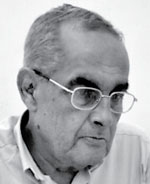
Time flies they say and this has been very true for me as I hardly felt the two years pass since join- ing The Nation in April 2006. Perhaps it is due to my enjoy- ing the work I do as a sub-edi- tor at the sports desk with the added privilege of working in an excellent team.
The build-up in the month prior to the publication of the first issue of The Nation news- paper on Sunday May 21, 2006 was really fascinating, though I was also a bit overawed by the occasion being an absolute beginner in the business.
It was inspiring to witness the top management team in action during this period. CEO KrishanthaCooray,Chief Editor Lalith Alahakoon, Deputy Editor Keith Noyahr supported by veteran sectional heads and some of the finest journalists in the country meticulously planned out the first issue of the paper, executing the plan to perfection. They were exacting but at the same time showed genuine concern for their staff. Their unobtrusive style of man- agement is a model for any busi- ness establishment.
The night of May 20, 2006 was unforgettable. I was quite over- whelmed by the tremendous excitement and tension in the layout room during the hour before the midnight deadline for the pages of the first copy of The Nation to be finalised. But the happiness of reading the first issue a few hours later is a memory that will always stay with me.
Talking of deadlines a poster in the news room carries the encouraging words, “Deadlines amuse me.” Despite having two years experience in the trade I admit that I have not yet advanced to the stage where I find deadlines amusing but, I certainly don’t find them intim- idating anymore.
Our first sports editor, Ravi Nagawatte, had a giant-sized task on his hands. He had to run the sports desk with a young sports reporter, Kalmith Rathnayake, who was straight out of school and the writer, a 64-year-old novice sub-editor. Fortunately Ravi didn’t believe in the adage “You can’t teach an old dog new tricks.” To his credit he patiently and pains- takingly trained the two of us
till we learned to man- age on our own.
In September 2006 vet- eran sports journalist Sa’adi Thawfeeq joined The Nation to take over as sports editor from Ravi who was promot- ed as chief sub-editor.
Kalmith Rathnayake, Naushad Amit and Withanarachchi who helps us out on Saturday and I make up the sports team. I couldn’t ask for a better team to work with.
I am most grateful to the entire layout department head- ed by Wasantha Siriwardene for their wonderful support. Their professionalism and expertise is a great asset that helps to turn out quality pages. The photography section, headed by Pushpakumara Matugama, has always been of great assistance. In addition I sincerely thank Gerwin, Hemantha, Nihal from Rivira, Narda, Rushan, Daniel, Gayan, Mifthah, Marianne and the other sub-editors for tolerat- ing my constant interruptions to their work to seek their help and advice.
The Nation is also fortunate to have an excellent support staff which makes life easier for everyone here. I hope I’ll be pardoned for singling out Thushara as one who goes that extra mile for us.
Looking back, the achieve- ments of The Nation in just two years are very commendable. In this short time the paper has been able to hold its own and even surpass some of its rivals. The greatest achievement is that the paper continues to maintain its stand of being ‘Fiercely Independent’, in keep- ing with its mission stated in the following lines of the first editorial of May 21, 2006: ‘We will be fiercely professional, will adhere to the rich tenets of journalism and will act with fidelity to the basic principles of democracy. We have no agen- da apart from that articulated here. We believe we’ve chosen a path worth taking and one which should not be walked alone.”
Whatever lies ahead it is cer- tain The Nation will not walk this path alone as long as we continue to follow the maxim ‘Fiercely Independent’ taking strength from the words of the 7th American President, Andrew Jackson, who said: “One man with courage makes a majority.”
Addendum by Dr.Nihal D Amerasekera
Kenneth and Geoffrey were brothers who were in the Wesley College Hostel in the.1950's. Kenneth was in my parallel class and in the boarding together and I have fond memories of those years. He was a fine sportsman and represented the school in Cricket in the 1st XI. He was a fine alrounder although he was mosr valued as a spinner. His skills as a soccer player and a table tennis player are well known to us boarders. After leaving school he worked for a Colombo Bank and later became the Prefect of Games at Wesley. He was always well read and wrote well and have now found his niche as a Sports Writer. On behalf of the brotherhood of Wesleyites I wish him a long and rewarding career in Journalism.
Azahim has been elected to the prestigious position of President of the FOC in the UK. The Festival of Cricket (FOC) is the biggest annual gathering of the Sri Lankan community in the UK - a day of fun and excitement for all . This whole day long event has attracted over 5000 people annually for at least the past 5 years.
This event is organised by the Sri Lankan Old Boys Associations' Festival of Cricket. The association is made up of representatives of prominent and leading schools in Sri Lanka resident in UK. Over 22 school OBAs will once again participate in the Festival. The Committee is elected annually and work entirely on a voluntary basis to make the event a great success.
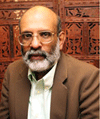 The main attraction of the day is a knock out cricket competition between the participating school OBAs, culminating in a final match late afternoon. The cricket underpins a number of other activities held around the grounds to keep the captive audience/visitors entertained and occupied. These activities include music, children's fun fare, a Sri Lankan Bazaar, excellent quality international hot food stalls, beer tent and Trade Stalls(Air lines, Freight Companies, Insurance etc). In addition, a hospitality marquee is also run to cater exclusively to those entrepreneurs who can entertain clients or friends on the day, watching some exiting cricket and relaxing by sampling the culture and the cuisine of Sri Lanka.
The main attraction of the day is a knock out cricket competition between the participating school OBAs, culminating in a final match late afternoon. The cricket underpins a number of other activities held around the grounds to keep the captive audience/visitors entertained and occupied. These activities include music, children's fun fare, a Sri Lankan Bazaar, excellent quality international hot food stalls, beer tent and Trade Stalls(Air lines, Freight Companies, Insurance etc). In addition, a hospitality marquee is also run to cater exclusively to those entrepreneurs who can entertain clients or friends on the day, watching some exiting cricket and relaxing by sampling the culture and the cuisine of Sri Lanka.
All proceeds are divided amongst the participating schools to purchase educational materials, equipment or Scholarship Funds in Sri Lanka. We also make a substantial donation to the National Cancer Institute of Sri Lanka.
Azahim has been a stalwart of the FOC and has been its Hony. Secretary in the years 2004 and 2006. Chairman of Cricket for the years 2000 and 2003, Served as a Cricket Coordinator for five years Representing the Wesley OBU-UK from 1996 to date.
He is a likeable person and has provided help and support for the OBU-UK since its very beginning. He is a Founder member of Wesley OBU-UK. At various time he has served as Membership Secretary, Hon. Secretary, Social Secretary and President and at present the Sports Secretary of Wesley OBA-UK. He has served as a loyal member of the Executive Committee for fifteen years. Azahim with the OBU-UK and his formidable powers of persuasion has been involved in raising funds for our alma mater to the tune of over £40000.
In the past 2 years we were together in the Executive Committee of the OBU-UK. Then he was the epitome of quiet diplomacy. He is s born poltician some of the traits perhaps he has gained from his illustrious father. He has always a story to relate whenever he is in a difficult situation. His vast experience in school politics has been a great asset to the OBU-UK. His love for his alma mater is never in doubt and will always remain a diehard Wesleyite.
Azahim is the son of Hon. Mr. MH Mohamed, Minister, Mayor of Colombo and a Member of Paliament, who is a distinguished old boy and has been a tower of support for the school for well over half a century. On behalf of the Brotherhood of Wesleyites Worldwide we wish him a successful year with the FOC.
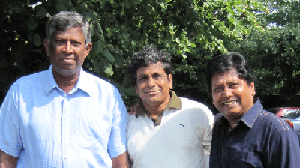
During our recent visit to London in late August early September, Charmaine and I had the pleasure of meeting and having dinner with some of my “old” College friends.
The dinner was hosted by my friend Rama (S.Ramakrishnan ) at his residence and was attended by Dr.Nihal Amerasekara and wife Chue, Noel Joshua and Ranjith Perera - whom I met for the first time. Rama & Nihal have not changed at all since I last met them in Melbourne, Australia. Noel who was my childhood buddy, left for U.K in mid 60’s to join the RAF, still has the same physique, the same sense of humor and the tough persona. We wined, dined and quickly moved into “recollection mode,” as Nihal would say and went down memory lane.
Being biased, in my view, I believe that the best years at Wesley were in the ‘50’s & ‘60s. Wesley, at that time, had high caliber masters who were ably led by excellent combinations of Principals and Vice Principals. They were devoted to upholding all that was best for an educational establishment like Wesley. We excelled in areas of discipline, administration, education and sports.
Whilst we were in this “ recollection mode”, the conversation moved towards the current situation that our beloved College has to grapple with.
Only a week prior to our gathering, I had the pleasure of meeting our present Principal, Dr. Shanthi McLelland. Shanthi was in London having served as Principal at Wesley for three months. The lack of communication, lapses in support and other shortsighted attitudes by the Methodist Mission, the disunity amongst staff members & Old Boys in Colombo forced Shanthi to leave Wesley and quit our Country until the problems he faced were sorted out. The costly and unprofessional way things were handled during Shanthi’s short stay as Principal are now well known amongst the hundreds of loyal Wesleyites spread around the world.
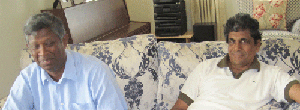 Shanthi, whom I knew well whilst in College, came to see me with Rama. We had lunch & proceeded along with Charmaine to where we were staying in a suburb called Roe Hampton in London. Shanthi, Rama & I spent a very involved and constructive six hours or so discussing Wesley. Both Rama & I urged Shanthi to take up the Principalship once the problems he faced were sorted out. Rama & I heard first hand of the progressive work Shanthi had done during his short period .The topic mainly touched on discipline, fund raising, marketing and above all, the educational standards at Wesley which urgently needed to be reviewed if they were to improve.
Shanthi, whom I knew well whilst in College, came to see me with Rama. We had lunch & proceeded along with Charmaine to where we were staying in a suburb called Roe Hampton in London. Shanthi, Rama & I spent a very involved and constructive six hours or so discussing Wesley. Both Rama & I urged Shanthi to take up the Principalship once the problems he faced were sorted out. Rama & I heard first hand of the progressive work Shanthi had done during his short period .The topic mainly touched on discipline, fund raising, marketing and above all, the educational standards at Wesley which urgently needed to be reviewed if they were to improve.
Not at any stage did Shanthi let down, or speak badly of any person or persons who had created the unfortunate position that Shanthi was confronting. Shanthi discussed at length his ideas, challenges and to a certain extent some of the strategies in the short term that he would introduce to bring our Wesley back to its glory days. We were most impressed as the discussion raised our hopes and raised our confidence in Wesley’s future. His vision and purpose are beyond question.
Since that meeting, we now know the good news. Shanthi Mclelland is back at the helm, doing what he knows best, to work to bring our Old School, Wesley College back to its glory days .I strongly believe that with the passage of time ,all of us will be grateful to Shanthi for turning around the school we love so dearly from what it is today, to become one of the most progressive schools in the country.
My final and only plea is that all of us, a band of Wesleyites spread throughout the world will provide Shanthi with the very best support and backing that he will need to achieve his goal. Let him be the leader and I know that he will seek advice when necessary.
Links to further reading

Rushan entered Grade 1A where he came under the guidance of my mother Mrs. Sherrine Perera from whom he learnt the basic essentials to be the outstanding person he is today. Though Rushan entered Wesley as a Buddhist, he was baptised in Grade 3A and continues to be a devout Christian to date. Rushan shines not only in the field of education but is a maestro at the piano and excels in drama, singing and dancing.
He was taken into the choir by Mr. Dunstan Fernando and is trained as a soprano. He is self-taught in music proving to all his brilliance in this inherent talent, which he uses to thank and glorify the almighty God in cantatas and hymns of praise. Whenever he needs any advice in music he consults Mrs. Thilina Fernando who is always ready to help him. Rushan conducted the "Hundred Voices concert for Peace", where choristers from Methodist College, Ladies College, Bishops College and Wesley College participated. Together with the choristers of Methodist College and Wesley College Rushan organised an Easter Cantata in 2003 April. Currently he also serves as the organist of his church, St. Mathias Laxapathiya.
In recognition of his talent he was awarded a scholarship to the Asian Pacific School of Music in Manila where he attended the Asian Pacific Conference on music. This scholarship was awarded by the National Christian Council and the Student Christian Movement. He was the only representative of Sri Lanka.
In the field of drama he has' been taking part in the Inter School Shakespeare Drama Competitions from 1998,in, which he has been playing the female role from then onwards. In 2003 he was nominated Best Supporting Actor where he portrayed the character of "Nerrisa" in "Merchant of Venice". In 2004 he was nominated as the Best Actor for his portrayal of" Volumnia" in "Coriolanus" where the judges were stunned to see such a powerful female character in a boys school. This year, Wesley College also came up to the finals after a lapse of over 15 years.
He was in the Sokari troupe that took part in the All Island Dancing competition in 1997 where he was Sokari and won the second place for his solo performance the Suraga Vannama.Hewas trained byMrs. Prasanga Fonseka and Mr. Dayaratna.
Rushan was the Secretary of the Student Christian Movement and the president of the Commerce Union in 2002/2003. He helped the Buddhist Society in organising the Buddhist Day 2003 and 2004.
As Head Prefect he performs his duties to his fullest capability, maintaining a healthy friendship with all his Sub Prefects and also enjoying the confidence of his masters and teachers.
Rushanwas rather reluctant to join in outings. He preferred to stay back but since we induced him to join us when the Buddhist Society went to Tissamaharamaya to distribute stationery to students of a less privileged school there, he joined us and since then he joins in trips.
Rushan and l have been friends since I can remember. Friends of his calibre are rare to 'find. Now that we have reached the end of our school career and as we leave the portals of our beloved college I'm confident even though we take different paths in our lives whatever career he chooses I trust the Good Lord will guide and direct him along the correct path.
By Upali Perera
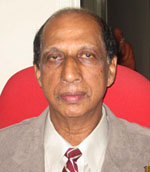
One has to be blessed to have true friends and O.K. is one of those. I have known O.K. from year 1952 when I joined Wesley College. Ever since then O.K. has been one my closest and very dear friends His most admired and noteworthy qualities are unshaken loyalty, ability to help everyone - especially his friends in need, dependability and reliability.
OK was an above average student who was at Wesley from year 1948 to 1959. He successfully completed the GCE O level Science at Wesley and joined Stafford College for a brief period along with another close friend Neville Fernando to study for the GCE Advanced Level.
During this time the Senior Management at Baur and Company, a leading mercantile firm in Colombo offered him a position in the Company for his athletic prowess. OK’s athletic excellence helped Baurs to win the Mercantile Athletic Championships that year. His abilities and talent were spotted by the Sri Lanka Police hierarchy who persuaded him to join the Sri Lanka Police force on 5 January 1962.
The rest is history as they say, where OK during his almost 40 year Police career, from a young Sub Inspector moved up the ranks to became Director Criminal Investigation Department (CID) for 5 years. At the end of this period he was promoted to the rank of Deputy Inspector General, Special Branch for 2 years before retirement in 2001. Since retiring from the Police Force, OK was a member of the National Police Commission from 01 October 2004 to 01 September 2009.
Some of the positions held during his career include, being the Officer in charge of Interpol Division, Officer in charge of Counterfeit Currency Bureau, Officer in charge exercising Supervision and Management of all Bureaus and Divisions of the CID and Homicide Squad.
OK, also gained and acquired vast knowledge in his profession during this illustrious career under going training seminars, at New Scotland yard, London , Interpol Headquarters in France, Criminal Investigation and Organized crime in Tokyo, Japan, Money Laundering in Canada and attending 64th, 65th , 66th, and 67th General Assemblies in Italy, China ,Turkey and India respectively.
O.K.’s sporting talents were discovered in the early part in his schooling days by many great coaches like Messers Kiruperaj, Swaris and Neville Abeygoonewardana.He became a household name in Athletics holding records in the 110 meter hurdles, 400 meters and Relays. For his achievements he was awarded College Colours in Athletics and was a successful participant in many Public School meets. OK was also a very talented Soccer and Rugby player where he was the vice captain of the College Soccer team and also represented the powerful Police teams in Soccer and Rugby. Subsequent to his leaving College OK became the National Champion in the 400 meters in 1963 where his running action became legendary. Ok’s smooth, silky running action style was described as “poetry in motion” by the then famous track and field announcer Bob Harvey. OK was also coached by the legendry athlete DIG. A.C.Dep and was awarded Police colors in Athletics and Soccer.
Our friendship has been over half a century and we were blessed with a core group of very dear friends who consisted of Lalith Wijesinghe, Dalkin Samidon, Kenneth de Silva and Ralph de Silva. This close-knit group still exists and our brotherhood will be in existence throughout our journey in life.
Some of the many things we did together during our formative years are to be cherished. They were carefree, somewhat dangerous and fun filled occasions as a young close-knit group that kept our weekends adventurous and exciting. The trip to Nikawaratiya by OK, Lalith, Dalkin to see me to sort out a discussion we had the weekend before. The return trip to Colombo by the four of us had to be of divine intervention when Lalith took over the wheel of O.K.’s famous Volkswagen EL 497. This car became every ones property. Only now we realize how silly we were to give Lalith the wheel when he did not know to drive. The numerous evenings spent at the Police Mess by all of us, the trips to the Katukurunda Motor races, The Police dances, his birthday parties and his bachelor party in Waliweriya are few of the more memorable occasions during our young days.
OK married beautiful Dhamika and the two are blessed with 2 sons Hasantha and Chanaka and a daughter Hashini. They are now the proud grandparents of 3 grandchildren.
I salute you my friend and thank you for your friendship over these long and memorable years. May you and your beloved family be abundantly blessed.
OK Hemachandra - A tribute by Lalith (L.C.R) Wijesinghe
Ok Hemachandra , affectionately known as OK , was my classmate till grade 10 ( GCE O level). I distinctly recall his prowess both in Athletics and Soccer whilst at College. In fact he was a champion Hurdler and represented Wesley at the Public Schools meet.OK was one of Wesley's outstanding all-round sportsmen excelling in Athletics, Soccer and Basketball and later in Rugby. He left Wesley in 1959 soon after his GCE O'levels and joined the Srilanka Police Force as a Sub Inspector in 1962.
My friendship with OK actually blossomed subsequent to our leaving Wesley.
Our group of friends comprised of Upali Perera,Dalkin Samidon,Kenneth De Silva and Ralph De Silva . All of us met as a group on many an occasion socially ,during our heyday batchelor period in the 1960's.It was a carefree ,funfilled association where our bonds of friendship strengthened and loyalty to each other remarkable.
OK progressed steadily in his career in the Police Force and was a diligent ,honest and courageous Police Officer of whom Wesley must be truly proud.I recall all his milestone promotions of Inspector, Assistant Superindent, Superindent and finally ending as a Deputy Inspector General of Police. The qualities of steadfastness,loyalty,honesty and genorosity that he displayed towards his friends were applied to his career in the Police. This was recognised and hence rewarded by the high position he finally achieved in the Force.
Certain events that took place during the early phase of my friendship with OK are indelibly etched in my memory. The evenings spent at the Police Officers Mess, the Police Dances we attended,his birthday parties,a trip to Nikaweritiya in his trusted Volkswagen Beetle and his last batchelor party are a few of the unforgettable events.
OK was stationed at many Police Stations around the Island during his long Police career.Our group of friends did our best to visit him where ever possible.
OK married the lovely Dhammika and are blessed with two sons, Hasanth and Chanaka and a daughter Hashini.He became a proud grandfather for the third time when Hashini gave birth to a daughter recently. His two sons are domiciled in Australia.
Since retiring from the Police force OK served as a member of the Police Commision until it was discontinued.
A truly admirable quality that OK possesses is his humane qualities and desire to help friends and all others in need at all times.The instances where he has helped friends are legendary.He is reliable and concientious in his relationships and I consider him a true friend who will stand by you when things are difficult.
I wish OK,Dhammika and his extended family a rich and rewarding life.
OK Hemachandra - Remembered by Dr Nihal D Amerasekera
When I joined Wesley College in 1950 in Std 2, I remember OKH was a year senior to me. As he was one of the tallest in class he stood out from the rest. He always wore a smile and often was surrounded by friends. In later years, I recall he excelled in sports and remained a popular student. Football and Athletics were his forte where he gave it his all. Sportsmen like OKH lead a glamourous life at school glorified and exemplified by the extensive coverage in the daily newspapers. With all this he remained modest and managed to keep his feet on the ground. Yet his genial manner attracted many friends at school and beyond throughout his life.
Although I never played competitive sports at school I was a keen supporter of all sports and remained a regular spectator and vocal supporter from the sidelines. I remember well OKH playing soccer 1958/59. We had a talented and unbeaten team coached by Neville D Abeygunawardene. OK's dribbling skills were phenomenal. His ball control was magical and a delight to watch. On occasions he went through the opponent's defence like a knife through butter. The coach in his memoirs have said that many of that team could have played for Ceylon. OKH was a fine middle distance runner and his running style was powerful and graceful. I could only describe it as " showing a clean pair of heels" as the old English saying goes. His style and tenacity brought him much success.
As he left school we lost contact. From time to time through mutual friends I learnt of his rise and rise in the Police Force. In the Police he was a much respected Officer. He took with him into the Police Force the honesty and integrity which he acquired from school and family . His ambition and determination propelled him to the highest rank of DIG which he served with great dignity. Most remarkably throughout this transformation he maintained his humility and kindness. He is a gentleman in the true sense of the word and one of finest products of our school.
The Sri Lanka Police has a long and proud history in the field of sports. The Force has rendered a great service towards the development of sports in Sri Lanka. The Police dominated the athletic scene with some of the greatest athletes from schools up and down the country. His reputation as a sportsman flourished becoming a fine basketball player in addition to Soccer and Athletics. O.K. Hemachandra was the national champion in the 400 metre event in 1962. He took on the prestigious post of Chairman of Athletics in the Police. His service to the Police Force and the people of Sri Lanka will be remembered for many years to come.
Although we haven't met in 50 years, through my editorship of the Double Blue International website I receive information about old boys all over the world. I am aware of the help and kindness OKH has shown to old Wesleyites who have fallen on hard times. The generous support which he has shown to one of our mutual friends over many years until his sad demise last year speaks volumes of his kindness and concern for those in need. This indeed is a tribute to OK Hemachandra.
I was told OKH was responsible for the gargantuan task of clearing the roads to move the Railway carriage from Maradana to its present resting place at the OWSC. This was done during horrendous traffic of a busy day. The coordination, courage and the influence needed for this massive task could only be done by a person like OKH who has loyalty in great abundance. We are indeed immensely grateful for his enthusiasm to provide a suitable environment for old boys to meet and greet by our beloved school.
He is an ideal Old Boy - Keeps away from the conflicts and controversies at the school but shows his loyalty by his actions when help is needed.
It was a great pleasure to speak with OKH on the phone in January 2010 when we reminisced about old times and mutual friends. I wish him a long and happy retirement. As much has happened since our schooldays I hope we will have the good fortune to meet again.
Speech made at Wesley College March 2010
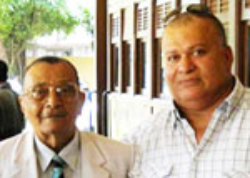
Dr Shanthi McLelland, Old Boys of Wesley, Parents, Teachers, and Students, It is with a sense of humility and gratitude that I take this opportunity to address you on this Founders Day Assembly which commemorates the beginning of our beloved Wesley College. What once was only the impossible dream of Missionary Rev Joseph Rippon in 1858 for a Christian School, finally became a reality under the stewardship of Rev Daniel Henry Pereira when Wesley first opened her doors at Dam Street in the Pettah on 2 March 1874. From that early beginning, Rev Henry Highfield grasped the vision of his grand uncle Rev Rippon to raise it to another level and through his initiative and dedication established this wonderful campus and buildings on this site just after the turn of the 20th century in 1905; a magnificent edifice on Karlsruhe hill that has shone like a beacon guiding generations of young lads to maturity for over 136 years. Yes! It was only the stuff of dreams, but dedication, prayer and labour will always make a dream come true.
As we gather here today to commemorate this occasion and celebrate Wesley’s 136th birthday, we will remember and pay tribute to all those men and women who served Wesley with distinction and dedicated service. Overseeing this service of thanksgiving under his watchful gaze is the portrait of Rev Henry Highfield, the Saint of Karlsruhe; and on the surrounding walls are the photos of our former Principals who have led Wesley on this unique and challenging journey over the past 136 years. They, also, are keeping a watchful eye on proceedings and though they are no longer with us I believe that their spirit lives on and is present with us today. We were to be honoured by the presence of Mrs Christine Weaver, the daughter of legendary Wesley Principal but sadly ill health has prevented her from attending. The Cartman era commenced a “Golden Age” at Wesley which continued under the stewardship of Wesley’s next Principal Cedric Oorloff. As we are on the eve of a renaissance of Wesley’s standing as a school, it would have been nice if Mrs Weaver could have join us, and we extend our best wishes to her for a speedy recovery. Rev Cartman was Principal when Wesley celebrated her 75th Birthday.

On an occasion such as this, it is important that we reflect on what has happened in the past that has helped sustain Wesley College as a premier educational institution in Sri Lanka. Throughout her history, Wesley has produced men of distinction, men of integrity, men of simple faith and wholesome values; they were the forerunners who taught us -
- to respect the laws of nature,
- to respect the differences of religion, race and colour,
- to respect the laws of the land and society in general.
It has been said that “You can take the Boy out of Wesley, but you will never take Wesley out of the boy! “
In other words Wesley College has fulfilled its purpose to educate and produce decent upstanding citizens. This is a legacy that has been handed down from generation to generation and it is an essential element that makes Wesley what it is today and will sustain her in the future. It is these core values, standards and traditions that I wish to focus on today.
We know that Wesley is 136 years old today and the closest similarity I can draw that is relevant to each of us is that she represents the matriarch of our fraternity, our Alma Mater, our Guiding Light. For once you have been at Wesley College, you become a member of “the Wesley College family” and as our College song describes, “the fraternal band of the double blue”.
How many of you here today have a grand parent (an Aaatchi or a Seeya) who is alive today? Please raise your hands. What do they represent other than being the mother or father of your parents?
What are the special things you remember about them? Some may say
- they are very old and have lived for a long time,
- some may say they have a lot of stories to tell about their life and what it was like growing up in Sri Lanka over the years,
- some may say they know everything about the lives of our family particularly our parents, aunties, uncles, cousins and about generations before them,
- some may say they are the keepers of the family values, standards of behaviour, and ensure that we uphold the family traditions which have been passed down from generation to generation.
- some may say that they are very wise, caring and sharing people who love us dearly.
How many of you have grandparents who are over 100 years old? Please raise your hands. Not many or None I see.
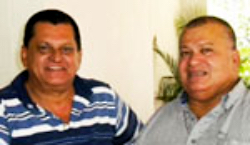
Now if you think how old Wesley College is; - it is 136 years old today and if you think of Wesley College like being one of your grandparents, it is certainly old, not dead but very much alive, it needs to be respected and cared for and we must love it and protect it in return. It is like a great, great, grandparent that has survived for 136 years. It is a living place which has survived over the years. She has survived Global Conflict, Civil Strife and many other upheavals and still maintains her standards and values without compromise. Many of the things we do at Wesley College today were also done by students and teachers over one hundred years ago. Let me tell you a little secret. My father was born in 1904 to a Methodist family. Can you guess the school he went to? My father studied here at Wesley College in 1910 when Rev Highfield was Principal. So when I stand before you today, I am emotionally overwhelmed to think that my father was in this very hall and on this campus and may even have stood on this very stage 100 years ago. This is a moment I shall cherish to my dying day. When I was growing up my father shared many of the stories of his schoolboy days at Wesley and what she stood for - her traditions and values, He also expressed in very simple language what Wesley College meant to him. There are many others in the audience today who have a similar connection with Wesley - who over many generations have maintained the link with the College by studying here. Our current Principal Dr McLelland also has a close link with Wesley, with his grand uncle writing the College Song and his mother teaching at Wesley.
Why is this so important? It is important because for generations past and for future generations to come, Wesley will continue to pass on the respect, values, standards and traditions that have made this College what she is today, and has been throughout her history - not only for us – the present students and past students of Wesley but as a fine educational institution in Sri Lanka. When you compare the history and traditions of the International Schools in Colombo with a school like Wesley, their history can be recorded on the back of a postage stamp. Many students and teachers have passed through these facilities over 136 years, far too many to remember. Over these years they have forged a history that is the envy of these International Schools. Wesley has been a part of the fundamental development of modern Sri Lankan society and education for over 136 years. As Sri Lanka evolved as a nation during and after colonial occupation, so did Wesley College. Therefore in order to maintain this legacy and tradition we need to make sure that our association with Wesley College does not cease once we finish our schooling but that it continues forever.
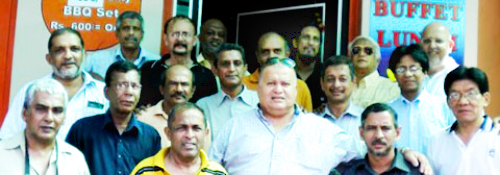
To the current parents, teachers and students, may I say this - whilst you are at Wesley you must do everything possible to maintain the traditions and values of the school. Be involved in everything with the school. Your input will reap twice over in a wonderful experience and lasting memories right through your life. Make sure you perform at your best and are proud of the College and her achievements. We live in a society that keeps constantly changing under the title of progress with new ideas, new procedures, new technology, new teaching aides, new teaching techniques. We must ensure Wesley must be dynamic and be able to adapt to these changes. However, a word of warning! We need to be cautious that we do not abandon 136 years of her traditions, history and values for short-term gain. We must find a balance that ensures Wesley is progressive but also respects and protects her core values, her rich and colourful history. The changes are usually for the better in most cases though sometimes there is the odd failure. When you leave school after your final year, see what you can do to help Wesley maintain these traditions and reforms. Also when you become a father and have sons, send them to Wesley like my father did. This way you can keep the connection alive and have a direct link in maintaining the legacy of the school which is very important.
In the past three decades, sadly, many old Wesleyites who were in the position of seeking a school for their sons, elected to send their boys elsewhere and the impact has been felt by the lack of this generational link between father and son and the College. There were reasons for this but we now need to redress this situation. Like society in general, we undergo change, as we live in a changing world. Under the stewardship of our current Principal, Dr Shanthi McLelland, he is doing his best to re-instate the connection between former students – the fathers and their sons and Wesley College. I congratulate him and wish him every success in his undertakings.
So what should we do to ensure that this legacy lives on and is passed on from one generation to the next?
I have come up with just 5 simple things beginning with the letter P.
- Protect – We must protect Wesley from forces that may change, alter, and deface her fundamental approach to education and her core values for their personal gain.
- Preserve – We must preserve her rich traditions, values and standards. Wesley College is a fine example of how a principally Christian school opened her doors to students of different religions and race to weave a colourful tapestry that represents a modern Sri Lanka where we study with a mutual respect for racial, cultural and religious diversity. That’s what sets Wesleyites apart from the rest.
- Perform – We must perform at the highest level in everything we undertake whether it is academic, sport, extra curricular activities teaching techniques and standards, administration and management.. We must set benchmarks which are achievable and consistently improve the standards. Wesley must set the benchmarks by which others schools are judged.
- Persevere – We must never give up trying to be the best. Set the bar high and keep trying to reach the desired level against all the odds. Even if we do not reach the top, the standard we will achieve will be better than average.
- Pride – We must be proud of the College, her achievements, her students’ and teachers’ achievements, her alumni’s achievements and also be proud of your own achievements, The double blue colours must shine through brightly at all times.
Farewell at the OWSC

Five years ago, the people of Sri Lanka were facing the darkest hour in its history. On Boxing Day in 2004, the Tsunami struck, bringing a wave of destruction that swept everything before it which included the significant loss of life and property. The community together with the aid of the world communities have with courage and resilience emerged from this disaster stronger and with a sense of hope for a better future. We have seen a wonderful turn around after the months of despair; dreams that were shattered and where all hope of returning to normalcy were lost.
Wesley over the recent past has had its moments of despair and darkest times. That is why it is so important to emphasize the maintenance of the values, traditions and standards of this great school. When everything seems lost we can draw once again on these honourable values, traditions and standards that have sustained Wesley in the past.
Last year this island nation was blessed. The civil war that had gone on for more than 30 years ended. Around the same time, Wesley was also blessed and a wash with its own Tsunami of change with the arrival of Dr Shanthi Mclelland as Principal. Rather than waves of destruction, we were engulfed by waves of change, waves of hope, waves of enthusiasm and waves of expectation. The past nine months have been awash with the changing tide which has gathered momentum as the waves of change pound every essential element of Wesley’s whole being. Emerging from the foam is a new, shining Wesley equipped and ready to confront the challenges and expectations of the 21st century, still maintaining with pride her standards, core values and traditions that have stood the test of time. The rebirth and rebuilding of Wesley College to her former glory is now underway. Her hallowed towers glow with the first rays of a new dawn, a new era born of a new vision, a new direction with a new team, led by a new Captain. Wesley’s destiny is in all our hands. So as we give thanks to our founding fathers on this day for leaving us this rich legacy, we also humbly pray that a loving and caring God will give each and everyone of us – the Principal, the Teaching Staff, Management and Administrators, the Students, Parents and Alumni the wisdom, enthusiasm, courage and strength to make these positive and lasting changes happen for the greater good of Wesley College. Therefore my fervent plea to you all is that we must get behind our Principal, Dr Shanthi Mclelland, and work together as one whether you are a teacher, student, employee, parent or old boy of the school.
I began this speech today talking about how a simple dream of Rev Joseph Rippon has led us to this wonderful experience and great institution. Dreams are only achieved if we try harder to make them happen. In August 1963, Dr Martin Luther King Junior in his famous speech to the people of America on the steps of the Lincoln Memorial Washington D C made the proclamation of these famous words “I have a dream”. It took forty five years before we witnessed recent history being made with the election in 2008 of the first Afro-American President of the United States of America in Barack Obama. We all remember in the days leading up to the election his famous catch phrase which has become a popular expression of hope in our vernacular, Three simple words that make such a bold statement …”YES WE CAN!”. Simply translated in Sinhala it means “OW! API PULUWANG”. “OW! API PULUWANG”. Repeat after me “OW! API PULUWANG”. Louder one more time.
Therefore dear students, parents, old boys and teachers we all have a “Dream for Wesley College”. Let these simple words … “Yes we can” be our mantra as we roll up our sleeves and work shoulder to shoulder collaboratively with Dr McLelland to raise the bar at Wesley and restore Wesley to her former glory. We can proudly proclaim “YES WE CAN MAKE WESLEY THE GREATEST SCHOOL OF ALL”.
May God Bless Wesley College and all that attend and serve her
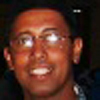
It gives us great pleasure to inform all of you that - Riza Azoor has been appointed as the new District Scout Commissioner for the Colombo District. His appointment was confirmed at the A.G.M. of the S.L.Scouts Association Colombo District Branch held a few days ago.
He succeeds Mr Janaprith Fernando, LLB who held this position for the past 5 years.
As you may recall, Riza (Riza aiyya to most past scouts at Wesley College) has been the Scout Leader at his Alma mater since 1980 and has also been active in the Colombo District Scout Association initially as a District Scout Leader for many years and later as an Assistant District Commissioner. He was also the organizing commissioner of the Annual Colombo district camporee a few years back.
He becomes the first past scout of the 14th Colombo (Wesley College) Scout Troop and Old Wesleyite to be appointed to this prestigious and very responsible position, in the 96 year history of Scouting in the District. He also happens to be the first Sri Lankan Malay to don this mantle.
by Dr Nihal D Amerasekera
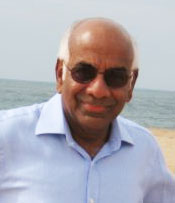
Senthil was born in Colombo in 1940. He attended several schools before finally settling down at Wesley College in January 1953. It is on record that he won the best speakers prize at St Thomas’ Preparatory School in Colpetty in 1952.
Senthil had two serious setbacks quite early in life. His father died suddenly in 1947, a heart-rending tragedy. He adored his father and his world fell apart. He recalls being taught by his father how to read the cricket scores. He remembers most fondly receiving his first cricket bat from his dad which marked the beginning of a lifelong love affair with the game. In 1950 Senthil contracted Diphtheria, a potentially life threatening and debilitating disease. In those days only a few survived the infection. He owes his life to Dr L.O. Abeyratne, the famous child specialist of that era, who took great care of him during those traumatic weeks in hospital. These two events had a lasting effect on his life. Loss of a parent in chilhood is the biggest blow to any child. On looking back trials in life provide great opportunities too; the lessons we learn coping with the loss make us better prepared for life and hardships ahead.
Senthil said the following about his spell at Wesley College: “As I look back, I owe a great debt to Wesley-to all my teachers who taught and influenced me. The sheer personality of Mr. Oorloff, the Principal and the softly spoken but firm Mr. De Lanerolle, the Vice Principal. I enjoyed my education at Wesley mainly due to the wonderful teachers and the wide circle of school friends I had. I entered into the life of the school and its activities loyally and held posts of responsibility and trust. I was a Prefect at school, House Captain of Hillard House, Leader of the Senior Debating Team and a member of the English "Spelling Bee" team, which won the Inter-School contest in 1959. I captained the College Cricket Team in 1960. We had a very young team---Koddituwakku, Lucky Goonetilleke and myself were the only "Coloursman" but the youngsters were immensely talented. I also played in the Rugby XV in 1958-60 and College tennis team. Played Doubles with Nalendra Abeysuriya and reached the quarter-finals in the Public Schools Championships in 1959. Member of the Colombo Schools Combined Cricket Team in 1960 and played for the Colombo Schools Rugby XV in 1960. I observed the rules of the school but was caned by Mr. Oorloff in 1955 for talking with Nalendra Abeysuriya, in the library. We were talking about the Australia Vs England test match and got two strokes each. I never broke that rule again. I am greatly indebted to Mr Edmund Dissanayake who remained my mentor throughout my school career. I learnt much from him about the technical aspects of cricket but above all he taught me to respect it laws, players, umpires and the game itself".

At Wesley Senthil was 2 years my senior. But I remember him well as he was a fine all round sportsman and captained cricket. Senthil was a naturally gifted cricketer. He was a batsman of rare polish and a fine, astute leader. He was prolific with the bat and ball in the 1960 school cricket season. The effortlessness and style of his batting was a pleasure to watch. As a bowler he had an easy rhythm and a sharp brain and took many wickets. During his captaincy the emphasis was on sharp fielding, positive batting, accurate bowling and high standard of behaviour. As the captain his quiet wisdom and gentle humour kept things in perspective. He was popular with team-mates and opponents alike. Senthil lead an exceptional team in 1960 that included LR Goonetilleke, who went on to represent Sri Lanka. He also had spent a year in the boarding.
Speaking of the 1960's, to be a 1st XI cricketer at Wesley was a great honour. Wherever he went, students wanted to shake his hand or simply shout out his name. He always responded with a smile. Cricketers were placed on a pedestal and received much respect. Despite their teenage years they received this adulation with poise and dignity. Conceit grows imperceptibly and the person who is afflicted is usually unaware of it. Fortunately the hard knocks of our lives at school and those in the cricket field were enough to tone it down. The effort to suppress one's feelings and behave well in public continuously must have been a great strain. Many of the cricketers managed to keep their feet firmly on the ground and be aware of the ephemeral nature of fame. Much has to be said about the discipline and training at Wesley which helped to groom such men of modesty and valour. I must say, I looked at them with some envy and respect.
Cricket was all consuming and he had little time for academia. Senthil’s first affection was for English literature, and as was the fashion of the time he committed to memory great cataracts of poetry, which he would still recite with perfect recall.
He dressed elegantly and moved with the upper crust at school. He delighted in debate and was never a push-over. Even in those days of our youth he was talented, stylish and erudite. He was always a gentleman in the finest sense of the word.
When he was 18 he turned down a job to become a tea-taster, a lucrative post, in a famous company in the tea industry. The rejection was a stroke of fortune as it turned out later.
Senthil left school in 1960. In his own words: “After school, I was hoping to enter the Law College to qualify as a Solicitor but unfortunately, I had to obtain a credit pass in Sinhalese (Senior School Certificate). This was legislation introduced by Mr SWRD. Bandaranayake---when he became the Prime Minister. I decided, much against family wishes, to leave for England in September 1960. On reflection, this was the best decision I had made even though it broke my heart to leave my mother and sister”.
He travelled to England by ship round the Cape of Good Hope. Senthil has many stories of the camaraderie of the Sri Lankans who travelled with him. There are some interesting anecdotes of his few days in Cape Town during the Apartheid era. He had a close encounter with the law for joining the "Whites Only queue". In London Rev James Cartman found him a place at the Methodist International House. He was most surprised to see the "No Coloureds and No Blacks" notices hanging outside some guest houses and hotels. His steely determination helped him to overcome these barriers to complete his education with great distinction. He was never short of courage or determination and he successfully negotiated the obstacles that were placed before him. Senthil supported himself with a series of summer jobs. This adaptability and willingness to talk to people and involve himself in their world regardless of their background profoundly shaped his approach to life.
The permissive sixties was the era of sex, drugs and rock and roll. Every radio played the music of the Beatles and the Rolling Stones. The complex and intoxicating world of the Hippies influenced and attracted many who wanted to be free. Senthil was barely out of his teens when he first saw the bright lights of London. But he had the strength of character to maintain his focus on further education and to achieve his goals despite the great temptations around him. His achievements are a glowing testimony to his ability and tenacity.
Senthil found himself thrust into a world altogether different to the one he had grown up in, and with time made himself at home. He worked for the National Westminster Bank from 1962 and completed his Banking examinations to become one of its trusted Managers. He worked with intelligence, imagination, courage and character with a desire to make a better life. He was self-confident, sophisticated and, frankly outspoken. He demanded high standards from those who worked with him and was not afraid to shake the hierarchy above when the need arose. During his long and successful career in the City Senthil became a role-model for a younger generation of Bank managers.
In October, 1965 he Married Norma Turner-Wright, an English Nurse, from Devon. This created quite a stir in his family but he stood firm. Senthil and Norma have 3 children - Son, Rohan --born in Colombo Presently working and living in Manhattan, New York. Twin daughters Naomi and Melanie both married and living in Devon. He has five grandchildren--3 boys and 2 girls. (Isaac, Reuben, Carrick, Orla and Poppy). He is truly proud of his close knit family.
Senthil: “In 1983 I visited Sri Lanka with my family. Sadly, we arrived on the day the race riots broke out. Fortunately, Nalendra Abeysuriya was at the airport and arranged for us to travel to our hotel in two army jeeps. Nalendra and I had kept in touch since leaving school. He was a wonderful friend and I was devastated when he died in October, 1983”.
Senthil continued to play cricket and had many successful season with the Chesham Cricket Club (1970-92). He had a shrewd cricketing brain. Underneath his equable temperament the competitive fire still burned strongly within him. The club established in 1848 has a fine reputation and play their games in the Thames Valley League. It has remained a leading club in Buckinghamshire for over a century. The Club has supplied players to representative cricket at national, regional, county and district levels since its inception. For a self-made Sri Lankan cricketer, he ended his career with the Chesham Cricket Club in pretty good company. In the community of cricketers he was as popular as they come.
He retired from the NatWest Bank in 1992. From 1994—2005 he worked on a part time basis as a Consultant at the Share Centre in Aylesbury. He was respected and admired for his wealth of experience which he always dispensed in a calm and courteous manner. As always he was highly dependable and scrupulously accurate and honest. He kept apart from the drinking culture and the fiercely competitive atmosphere so prevalent of the era, yet was highly respected.
He has many outside interests which retirement gave him the time to enjoy to the full. He plays and coaches cricket, loves to travel, enjoys hiking and rambling and is awfully fond of good food and fine wine, to mention just a few of his interests. He also loves a flutter on the Stock Exchange keeping a regular tab on the FTSE 100. Retirement has also given him the time to pursue his interest in charitable work. Many have admired his sympathetic nature. Senthil has concentrated on helping poor families in Sri Lanka who were hit by the devastating Boxing Day Tsunami of 2002. He has visited Ridiyagama in Hambantota to help 2 destitute families to give them moral and financial support. These acts of friendship gives him great comfort and joy. He makes special mention of LR Goonetilleke who ferried him from the airport on his many visits to Sri Lanka and also on occasions took him to Hambantota. Senthil is most grateful for these acts of kindness. He still keeps in close touch with Wesley College cricketers of his era many of whom are now retired and living in Sri Lanka. He is grateful to the school for his wonderful all round education from which he has benefitted enormously. In return whenever the school needed funds he has dipped deep into his pockets.
The 30 year civil war in Sri Lanka divided and alienated its people. A generation of Sri Lankans grew up in this most unhealthy milieu created by the bitterness that arose from the conflict. This polarised the communities. In all the years I have known Senthil he never took sides but worked hard to build bridges and bring the communities together. He still considers himself a Sri Lankan and yearns for a peaceful country where all the communities can live in harmony and without fear. I wish his dream will come true in our lifetime. Senthil was creased with grief when the Tsunami struck Sri Lanka with the loss of so many lives. His desire to help the Sinhalese families made destitue by the tragedy showed his disregard for the politics of narrow-mindedness and prejudice. Those liberal views and his generosity are a beacon to us all.
When the Wesley College OBU-UK was in serious crisis Senthil stepped in to become its President. As the "boss" he had an arresting presence. He cleared the mess and brought the organisation back to its feet again. His ability as a good and honest leader helped us enormously. His impact on the OBU can never be overstated as he rebuilt the self-confidence of the organisation. To balance the books and keep it clean he was a fund of shrewd advice and penetrating comment. Senthil maintained a dignity, authority and modesty that won him a large measure of affection. It was recognised during his tenure that anyone at whom his acerbic tongue was directed generally deserved it.
I came to know Senthil when we both served in the OBU-UK Executive Committee. Since then we have kept in close touch and have watched cricket together at Lords Cricket Grounds with plenty of time to reminisce and recall those happy years at school. He fondly remembers the many colourful characters, students and teachers, that passed through the gates of Wesley College during our time. Senthil now lives in North Devon in a little village called Landkey. His cottage is in an idyllic setting surrounded by lofty green hills, away from the dust and grime of the city. It is his paradise. Living in a small community has many benefits. There is a sense of belonging, a safe environment and lots of local support. Cricket still remains a part of his life. In his spare time he continues to plays some games for a local Club and also does some coaching for youngsters.
I spent a few days with him in Landkey, which has the gracious atmosphere of a village of the Old South-West and enjoyed the surroundings and his company enormously. By nature he is a private person. Senthil is determined that retirement does not necessarily mean fading quietly away. He is full of energy and huge fun to be with. He has a great gift for entertaining and is charming, witty and urbane. His kind and generous ways made us at home. We had warm sunshine throughout the week and it turned out to be one of our most memorable holidays. He is still the dignified honest gentleman I knew at school. Despite his achievements Senthil remains modest and unassuming. He reflects philosophically on the ironies, successes and disappointments of his life. The years have made him wiser. One of the advantages of growing older is that the emotional climate grows calmer. Contentment replaces ambition. Warmth and affection replace burning desire. Companionship and tolerance replace agony and despair. He now spends his time tending to his lovely little garden, feeding the birds that visit him regularly and seeing his grandchildren grow up to become useful citizens of this wonderful world.
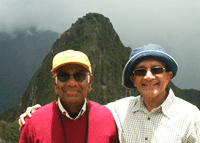 He often describes how his character has been shaped, during his childhood, by his close knit family and his school. He is a gentleman and one of great sensitivity, charm and good humour. He is also exceptionally thoughtful. His love of history, geography, nature and the outdoors is infectious and I got to know it well as we went on a tour of South America in January 2011. That was a fortnight well spent amongst friends. We had much in common to discuss and to reminisce and we laughed a lot. During the trip despite its trials and hardships Senthil was dependable, generous and witty. He had a fine selection of distinctive hats his favourite being a colourful inca hat which he wore with great pride.
He often describes how his character has been shaped, during his childhood, by his close knit family and his school. He is a gentleman and one of great sensitivity, charm and good humour. He is also exceptionally thoughtful. His love of history, geography, nature and the outdoors is infectious and I got to know it well as we went on a tour of South America in January 2011. That was a fortnight well spent amongst friends. We had much in common to discuss and to reminisce and we laughed a lot. During the trip despite its trials and hardships Senthil was dependable, generous and witty. He had a fine selection of distinctive hats his favourite being a colourful inca hat which he wore with great pride.
He is a resolute humanist and a libertarian. Having witnessed deep poverty across the continent the trip awoke his social consciousness and political convictions. Ever-thoughtful, there was in him an ethos of compassionate concern for the downtrodden and exploited Inca people to whom he gave generously. He was always able to strike up an instant and instinctive rapport with the people he met. He saw a strong connection between the suffering he witnessed over the years and the joy and desire of all people to live, love and laugh together.
With his gracious smile he was indeed a great asset to the well being and unity of the whole group. Climbing the steps of Machu Picchu, the stunning views of the Iguazu Falls, the sheer artistry of the Tango in Buenos Aires and the awe-inspiring statue of Christ the Redeemer in Rio de Janeiro were the highlights that come easily to mind. It was indeed a most memorable journey that we will cherish forever. I will remember the charm of his company for many many years.
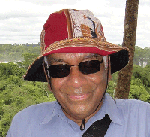 I can never remember him as being overtly religious at school although he took part in the Sunday Services like the rest of us. He now finds comfort in the Church and its teachings and has strong convictions about the integrity of Christian truth. Senthil has learned from his long experience the need for the Church to deal with the more important questions of life and death, rather than with the ecclesiastical trivialities and divisions that claimed so much of its attention. He recognised also the experiences and value of other faiths. In his own life he moved from being a Methodist to embrace the Church of England. He now lives in the shadow of St Paul's Church in Landkey , which the locals believe, was founded by Sir Francis Drake in 1586 as a settlement to escape from the Spanish Armada. Senthil is now an integral part of that Church community being a useful member taking part in its many activities.
I can never remember him as being overtly religious at school although he took part in the Sunday Services like the rest of us. He now finds comfort in the Church and its teachings and has strong convictions about the integrity of Christian truth. Senthil has learned from his long experience the need for the Church to deal with the more important questions of life and death, rather than with the ecclesiastical trivialities and divisions that claimed so much of its attention. He recognised also the experiences and value of other faiths. In his own life he moved from being a Methodist to embrace the Church of England. He now lives in the shadow of St Paul's Church in Landkey , which the locals believe, was founded by Sir Francis Drake in 1586 as a settlement to escape from the Spanish Armada. Senthil is now an integral part of that Church community being a useful member taking part in its many activities.
In his retirement Senthil remains a man of regular and moderate habits, of elegance and charm, of wit and wisdom, of inner peace and spiritual contentment.
Senthil is above all a true Blue Wesleyite and proud of it. On behalf of his many school friends I wish him a long and happy retirement.
A Tribute to Senthil Sinniah by Lalith Wijesingha (L.C.R)
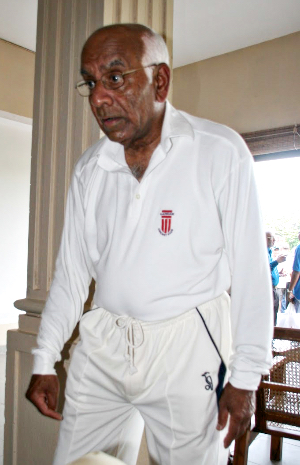 Senthil Sinniah was my 1st X1 Cricket Captain in 1960, which was my second year playing for the Wesley first team.
Senthil Sinniah was my 1st X1 Cricket Captain in 1960, which was my second year playing for the Wesley first team.
I cannot claim that Senthil and I were friends in 1959 and 1960 though we happened to play cricket together representing Wesley. He was my senior by two years and that was a great deal when we discuss seniority, specially during college times. Seniority was respected and we knew to keep our distance. I always felt that Senthil was someone to be admired and respected from a distance. He was far above my league and was always in elite company. Being in the College English Debating Team and spelling Bee were achievements Senthil took in his stride.Some us only aspired to these and never could realise them. I recall Senthil being a very astute Captain, stylish right hand opening batsmen,wily offspinner and a reliable, smart fielder. His allround abilities made many an impact on several 1st X1 cricket matches that we played during 1959 & 1960.
I had lost contact with Senthil and we went our separate ways since leaving college. I recall meeting him with Afgher Mohideen and Lucky Goonetilleke during one of my visits to Srilanka in 2006,I believe. It was a very brief but pleasant evening . Senthil seemed to be such a friendly and humane person and not the distant and aloof personality I imagined him to be. From this time onwards I did get to know him more through email missives and discussions with Nihal Amerasekara,who was a dear friend of Senthil’s.
Since returning to reside in Srilanka permanently I had the pleasure of meeting Senthil in November 2009 at the OWSC with many cricket team members of 1960 - his Captaincy year- to celebrate his 69th birthday. ( a separate account on this appears on the website) It was a joyous and happy occasion. What was most significant for me was the closeness I felt towards Senthil and the reinforcement in my mind that he was truly a sincere person with a broad and mature outlook. We are now in regular contact with each other,discussing mutual matters of interest with Wesley it’s past, and future taking pride of place.I am honoured to be his friend.
I wish Senthil good health and many more years of retired life, which he will spend amidst his loved ones.
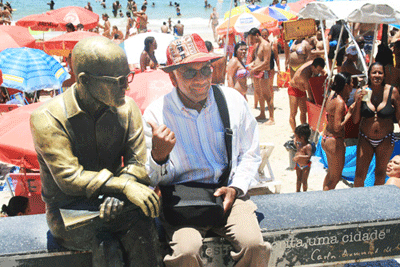 On January 10th, 2010, a party of nine of us---which included Nihal, his wife Chiu and myself-- left Heathrow Airport on an exciting trip to the continent of South America. We were visiting Peru, Bolivia, Argentine and Brazil. As none of us had been to these countries, this was a trip of a lifetime.
On January 10th, 2010, a party of nine of us---which included Nihal, his wife Chiu and myself-- left Heathrow Airport on an exciting trip to the continent of South America. We were visiting Peru, Bolivia, Argentine and Brazil. As none of us had been to these countries, this was a trip of a lifetime.
I have been fascinated by South America---ever since my schooldays. I well remember my geography master (Mr. Ivor de Silva) talking about the Andes mountain range and the Argentinian " Gauchos." At school, Nihal was two years my junior. I well remember him as a very smart lad who never gave the teachers or the Prefects any problems.!!! Little did we know that we would be visiting South America to-gether---some 56 years later.!!!
Our first stop was in LIMA (the capital of Peru) where we spent two days and thence to CUZCO-- 14,000 feet above sea level and the former Inca imperial capital of Peru. We were warned about altitude sickness being a problem to some travellers. I never gave it a thought---having never been at such a high altitude. In Cuzco, we spent the day visiting Sacsayhuaman---the Inca ruins. We returned to our hotel in the evening and freshened up to attend a
concert featuring local Inca singers and dancers. While I was having a shower, I began to feel unwell---my breathing being erratic. However, I decided to attend the concert.
At the concert, I took a turn for the worse and decided to return to the hotel and have an early night. Nihal saw me and insisted on accompanying me back to the hotel. I tried to dissuade Nihal and asked him to stay behind and enjoy the evening but he insisted that he should take me back to the hotel -----"True friends are those rare people, who ask how you are, and then wait to hear the answer."
On returning to the hotel, Nihal helped me up to my room on the fourth floor. At this stage, I was really fighting to breathe and Nihal asked me to lie down to see whether my condition would improve. I knew I was in a bad way but it was so re-assuring to have Nihal with me. As my condition worsened, Nihal said " Senthil, you need a doctor. I will go to the Reception Desk and summon a Doctor." While Nihal was away, I thought my time was up, so I said a little prayer---"Please Lord, dont let me die here---so far away from my family."
I was relieved to see Nihal back and soon after the Doctor appeared---- a Peruvian doctor, who spoke good English, which was a relief to me. Having examined me fully, he said that my oxygen level was alarmingly low ---69, a critical level. The normal oxygen level being 90-100. I was taken to the Clinic----which was about half a mile from the hotel---and spent the night there. I have nothing but praise for the Peruvian doctors and nurses who took care of me---language was no barrier as most of the hospital staff spoke a bit of English.Nihal accompanied me to the Clinic and returned to the hotel at around 10.00pm---"the most precious possessions that comes to a man, in this world, is a true friend -------." I was released that evening.
I am writing this article to say "Thank you" and as a tribute to a very distinguished, un-assuming and urbane Old Wesleyite--- DR. Nihal Douglas Amarasekera. Nihal is reluctant to talk or write about this life saving episode. As a retired eminent consultant----he strictly observes the patient/doctor confidentiality rule. I am certain that were it not for Nihal's presence in my hotel room that January evening, I would not be writing this article. In this cynical world, Nihal is a man of immense moral stature. I am so glad that late in my life and some forty five years since leaving college, I have met and be-friended Nihal and his gracious wife Chiu. "There are big ships and small ships but the best ship is FRIENDSHIP.
I will be in Nihal's debt for the rest of my life and my family join me in saying a sincere "Thank You."
Links to further reading
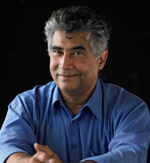
Monroe “Monty” Reimers attended Wesley College from 1959 to 1968. Monroe is a cousin of the famous Reimers brothers Glenn and the late Robin who both excelled in sport. Monroe was the opposite and his passion for the arts was his forte. His love for literature and drama combined with his academic ability has enabled him to enjoy a career pursuing his passion as a professional Actor whilst being an IT Professional. An unlikely combination, but Monroe has graced the small screen in many Television movies and TV series in Australia and also taken part in many stage plays across the nation. His list of credits in stage and screen are many. Monroe is based in Sydney and when I contacted him to do this profile; he was most gracious in agreeing to be our first personality in “Where are they now?” Monroe migrated to Sydney 39 years ago with his family and is still a bachelor. His preferred occupation is Professional Actor. When recalling his career at Wesley, he remembers with fondness playing cops and robbers in the lunch breaks and drawing pictures and writing poems about the teachers. His best friends at Wesley were Michael La Brooy and Wahab. His favourite teachers were Haig Karunaratne and Shelton Wirasinha two icons who were great supporters of the arts at Wesley. Monroe was a Prefect and represented Wesley in Debating and in Drama Competitions. Not sportingly inclined, he remembered that he did have some interest in sport as a young boy and track and field interested him. He remembers winning an award when he was eleven. A member of Passmore House, Monroe took an active role in the Debating Society and Drama. He recalls with fondness the many debating competitions with the girls’ schools and in particular our sister school Methodist College.
Wesley under the stewardship of Shelton Wirasinha in the sixties was enjoying a renaissance in the arts, particularly Drama and Elocution. On the tutorial staff there was Felix Premawardhena of Sinhala Film and Stage fame and Haig Karunaratne another exponent of the classics, Shakespeare and all forms of English literature. Monroe’s moment of glory which I am sure led him to pursue a career as an actor was when he played Cuthbert, in Christopher Fry’s “The Boy with the Cart”. The play set in medieval times tells the story of the Saint Cuthman, who as a boy, pushed his old and destitute mother (which was I) in a handcart from Cornwall to Steyning, saw a miraculous sign there and helped to build a church in the village. His poignant portrayal of this role won the accolades of the judges and he won the Best Actor Award at the inter-School Drama competition and Wesley scooped the pool winning the Best Play in 1968. His academic ability and all round skills and attributes were rewarded with an American Field Scholarship which saw him travel to Portland Oregon, USA where he completed his final year at David Douglas High School.
After returning to Sri Lanka from USA he migrated to Australia with his family. In Australia he studied acting at NIDA, the National Institute of Dramatic Art where Monroe graduated in 1977. At NIDA he studied with Mel Gibson, Steve Bisley and Judy Davis who have carved their names in the film industry as stars of the silver screen. His life has been devoted to the performing Arts and Monroe has performed in all forms of media. His favourite being the live stage, where he has just completed a season of Chekhov’s masterpiece called “The Seagull”. He has also tried his hand in writing though has yet to be successful in that field of human endeavour. He is a sought after Voice and Speech teacher to the profession and has developed a ten week course called Speaking English with a Neutral Accent, details for which can be found on his website www.monroereimers.com. He knows most Australian actors and some English, including Art Malik, with whom he co-starred in the series Shadow of the Cobra which was shot in Sri Lanka in 1988. When quizzed on who he would like to meet again, his response was “I would like to meet with Haig Karunaratne and have a long chat.” I am sure having met Haig recently he would be delighted that one of his protégées has achieved so much and forged a career in the dramatic arts. Away from the grease paint and foot lights or mixing it with the stars of stage and screen, Monroe has not forgotten his roots. Catching up with Monroe was a pleasant experience after so many years, far better than when I was dressed up like an elderly buxom medieval woman (his dear mother) and dragged around the stage in his hand cart in the play “The boy with the cart”.
Links to further reading
 During our recent visit to Los Angeles, Marie and I had the pleasure of catching up with one of Wesley’s finest, Russell Schokman. We spent five very pleasant days in Russell’s company and he was a most generous and kindhearted host. He spent many hours driving us around Los Angeles taking us sight-seeing, shopping and visiting old friends that we had not seen for years. Rusty migrated to the USA in 1963 and lives at the foothills of a town called Altadena, coincidently it is not far from Pasadena, and no! he did not marry the Little Old Lady from Pasadena. Russell is divorced and has two lovely daughters Cherie and Tawnya, who are married and live in the same area. He also has 2 grand children Madison and Luke. Rusty has joined the ranks of us retirees, and previously was employed as a Construction Engineer with the Californian Railways. Russell with daughters He now spends his time indulging himself in his numerous hobbies. Fishing which he does all over the world and has even spent time fishing in Queensland. He was a very keen hunter and although he has a large collection of firearms he now concentrates on shooting with a camera, he is also a very keen hiker and spends many hours hiking in the hills that surround Altadena. He is also a very keen Bird Watcher of both the feathered and human variety. We found him to be a person who is very concerned about the welfare of his many friends and fellowmen; in fact anyone who is in need. Friends we met also spoke of his generosity and kindness that he extends to young people who are in need of a place to stay or need a helping hand to see them out of a tight spot. He epitomises the cliché “A friend in need is a friend indeed.” He is also a true gentleman to the very core. Rusty would love to hear from other old boys of Wesley and anyone who is interested in contacting him can please phone me for further details.
During our recent visit to Los Angeles, Marie and I had the pleasure of catching up with one of Wesley’s finest, Russell Schokman. We spent five very pleasant days in Russell’s company and he was a most generous and kindhearted host. He spent many hours driving us around Los Angeles taking us sight-seeing, shopping and visiting old friends that we had not seen for years. Rusty migrated to the USA in 1963 and lives at the foothills of a town called Altadena, coincidently it is not far from Pasadena, and no! he did not marry the Little Old Lady from Pasadena. Russell is divorced and has two lovely daughters Cherie and Tawnya, who are married and live in the same area. He also has 2 grand children Madison and Luke. Rusty has joined the ranks of us retirees, and previously was employed as a Construction Engineer with the Californian Railways. Russell with daughters He now spends his time indulging himself in his numerous hobbies. Fishing which he does all over the world and has even spent time fishing in Queensland. He was a very keen hunter and although he has a large collection of firearms he now concentrates on shooting with a camera, he is also a very keen hiker and spends many hours hiking in the hills that surround Altadena. He is also a very keen Bird Watcher of both the feathered and human variety. We found him to be a person who is very concerned about the welfare of his many friends and fellowmen; in fact anyone who is in need. Friends we met also spoke of his generosity and kindness that he extends to young people who are in need of a place to stay or need a helping hand to see them out of a tight spot. He epitomises the cliché “A friend in need is a friend indeed.” He is also a true gentleman to the very core. Rusty would love to hear from other old boys of Wesley and anyone who is interested in contacting him can please phone me for further details.
Oscar and his wife Tilaka were in Melbourne visiting their daughter Shevy who was graduating. It was an ideal opportunity for former classmates to catch with him and Anton Selvadurai hosted a dinner in his honour.
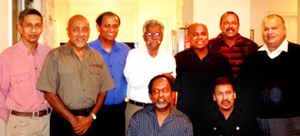
By Dilwin Mendis, Moratuwa Sports Correspondent
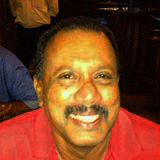 Oscar Dissanayake who represented Saracens, BRC and Galle CC in Sara Trophy and became the Best All-rounder in the Mercantile ‘B’ Division Cricket Tournament held in 1981 representing Kundanmals ended up his cricket career after taking up an appointment at Sierra Leone, South Africa had the distinction of captaining one of the prestigious educational institutions of the island Wesley College in 1972 and 73.
Oscar Dissanayake who represented Saracens, BRC and Galle CC in Sara Trophy and became the Best All-rounder in the Mercantile ‘B’ Division Cricket Tournament held in 1981 representing Kundanmals ended up his cricket career after taking up an appointment at Sierra Leone, South Africa had the distinction of captaining one of the prestigious educational institutions of the island Wesley College in 1972 and 73.
During this period inter-school games commenced at 12 noon on both days and no mandatory overs at the end and the Sara Trophy and Donovan Andre Trophy matches at 1.45 pm on first day and 10 am on day two and Daily News Trophy matches confined to Sundays.
Weslyites, the Campbell Park lads were reckoned as Masters of Matting Wicket (now a turf wicket) and not so easy to beat them over there.
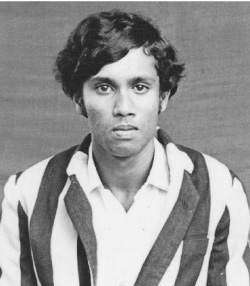 They had a tough fixture meeting the hill country Giants the Trinitians at Asgiriya whom are difficult to beat at their own den not only in cricket but in any other games too. Wesliyetes took the wings to meet the Lions of Hill Capital, Kandy on 15th February 1973 and the match was fixed for 16th and 17th February 1973 and the team comprised of Oscar Dissanayake (Capt), Granville Hamer (Vice Captain), Willam Vandort, Athula Wickramasinghe, Dayaian Sellamuttu, Rennie Devadason, Geethal Peiris, Anura de Silva, Carlyle Peiris, K Dayaparan, Lalith Fernando, Russel Kern and Eric Solomons and out of them Athula, Anura, Carlyle, Lalith, Russel and Eric are domiciled in foreign countries.
They had a tough fixture meeting the hill country Giants the Trinitians at Asgiriya whom are difficult to beat at their own den not only in cricket but in any other games too. Wesliyetes took the wings to meet the Lions of Hill Capital, Kandy on 15th February 1973 and the match was fixed for 16th and 17th February 1973 and the team comprised of Oscar Dissanayake (Capt), Granville Hamer (Vice Captain), Willam Vandort, Athula Wickramasinghe, Dayaian Sellamuttu, Rennie Devadason, Geethal Peiris, Anura de Silva, Carlyle Peiris, K Dayaparan, Lalith Fernando, Russel Kern and Eric Solomons and out of them Athula, Anura, Carlyle, Lalith, Russel and Eric are domiciled in foreign countries.
The Trinity Skipper Ranjith Dissanayake with his deputy Rohan Perera and his men were eagerly looking forward to take the visitors on task.
It was a great coincidence that both the captains were Dissanayakes and the two vice captains Rohan Perera and Granville Hamer were wicket keepers.
Granville is the younger brother of Russel and Mervyn. But Oscar and his team mates had other ideas.
Oscar called the coin correctly and thinking the wicket will suit bowlers invited his opposite number Ranjith to take the first lease and his gamble paid off with Lions walking into the den at regular intervals and finally were all out for 177 runs with Rohan Perera making the top score of 51 runs.
The day two belonged to the visitors. Skipper opened with Carlyle but no sooner wickets tumbled then joined the Hero of the Day Athula and put up a fine partnership of 166 runs for the fifth wicket in 113 minutes in Carribean style pulverising the Trinity attack by hitting to all the corners of the ground like spraying bullets.
Finally Athula got out for a scintillating 107 runs which included 17 hits to the ropes and three towering sixes occupying the crease for 116 minutes. Oscar contributed 74 runs with four fours and one six and the declaration came up at 232 for 8 with 228 minutes batting with a first innings win on 55 runs.
Trinity bowling was propped up by the speedsters A Weerasinghe and Ravi Obeysekera claiming 2 for 39 and 2 for 20 respectively.
While the West Indian Player Rodney Cantrill claimed the prize wicket of Athula stumped by Rohan Perera for his first local wicket.
Homesters in their second essay batted until the close and were all out for 156 with opener Ravi Obeysekera making the top score of 32 with six fours, Rohan Perera 21 with five fours and R Ranasinghe 30 and P Jayasundara unbeaten on 22.
Medium Pacer William Vandort had a fine bowling analysis with a match bag of 8 for 133 (3/63 and 5/70) while Russel Kern took 3 for 36 with his off spinners.
Links to further reading
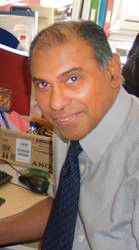
Aubrey Melder who has lived in the UK for many years was recently elected a Fellow of the Chartered Institute of Logistics and Transport in recognition of his work in aviation and the United Kingdom Fisheries and Marine Industry . Aubrey had a brother Eardley (dec.) who was also at Wesley and is the son of Allan Luther Melder who was involved with the Welfare Society at Wesley. During his youth in Sri Lanka/Ceylon, Aubrey was always a keen sportsman. Aubrey played cricket for Air Ceylon, the Colombo Colts CC and the Nationalised Services Cricket Association in tournaments organised by the Board of Control for Cricket. He also represented the Colombo Colts at hockey in the annual 'Pioneer Shield' competition A further highlight of Aubrey’s professional career was an invitation to the Royal Garden Party at Buckingham Palace on 15 July 2008. Aubrey, together with his guest, was formally presented to HM the Queen on the day, by the Lord Chamberlain.He recollects that the conversation with Her Majesty was long and exciting. Aubrey is also a life member of Wesley’s Chapel and Leysian Mission at City Road in London. The Chapel and residence was built by John Wesley in the 18th century and he preached at this Chapel and lived on the premises until his death in March 1791. Keith de Kretser has been elected for a two year term as a Director on the Board of the Victorian Rugby Union, the State governing body for Rugby Union in Victoria. He has had a 39 year association with the game in Melbourne with the Box Hill Rugby Club where he served as a player, President (7 years) and is a Life Member. From the Wesley Times Nov 2010 Brian Batstone attended Wesley from 1954 to 1967. He was affectionately known as “Batti” to his friends. Brian was the only one from his family that attended Wesley College or had any connection with the school. Who would have thought that from those formative years at Karlshruhe he would end up in Cologne, Germany as the Elephant keeper of 14 Asian elephants, the largest of any Zoo in Europe. He lists his occupation as “Animal Keeper”. His interests are nature, wildlife, travelling and fishing. Brian who is sixty one years old is married and has no children and has lived in Cologne since 1973. Brian was in Lempher’s House in the Junior school and in Moscrop House in Senior school. Brian had a great interest in sport and was cricket captain of the under 14’s and under 16’s. He was a cricket colours man and represented Wesley in the Colombo North Zonal Cricket Championships as an opening bowler. His other sporting interest was athletics. Brian was also a sub-Prefect. His fondest memories of his days at Wesley were the good times in the College hostel and “capping” all the pretty girls at All Saints Girls School at Campbell Park. He remembers with deep respect the education he received at Wesley and has fond memories of Mr Edmund Dissanayake and Mr Haig Karunaratne who were his favourite teachers. He lists his best friends as Ronnie Collette, Russell Hamer and Derrick Schokman when he was at College. After finishing school in 1967 Brian pursued his interest in wild life by working on Malwatu Oya Farm (about 300 acres) in an agricultural project. As a coincidence, this farm was close to another farm where Mr. Gamini Jayaweera worked as a manager. He was the brother of another old Wesleyite, Mr. Vivian Jayaweera, Inspector of Police. This was also next to another farm where an old Wesleyite worked, Mr. Brian Werapermal. After two years, in 1969, he had to give up the farm due to floods. To earn money he joined the British Marine Company. In 1972 he first went to Switzerland and worked as a Bar Manager and after that ended up in Cologne, Germany where he still lives today. Because of his interest in nature and animals, he asked the Director of Cologne Zoo, if he could work for him. Fortunately for him, he took him on and he started working first with big apes and since 1985 with elephants as an animal keeper. During the last 36 years he has been travelling to Africa and Asia to observe and study about the behaviour and training methods of elephants. He has lived in elephant camps in India and Thailand and is a frequent visitor of the Pinnawela Orphanage. He is a member of the European Elephant Group, the Elephant Management Association in the USA and an advisor to EEKMA (European Elephant Keeper and Management Association). He is presently in charge of 14 Asian elephants including 4 baby elephants born in Cologne Zoo since 2006. It is the largest collection of elephants in Europe. His position has given him the opportunity to meet many celebrities and famous personalities and one that he recall with interest is Paul Hogan (of Crocodile Dundee fame) and went with him to the elephant barn in Cologne Zoo. Brian looks forward to the day when he can catch up with many of his old friends who had at Wesley and in particular his best friend Ronnie Collette who now lives in Melbourne. Those wishing to contact Brian may do so by email on bbatstone7649@aol.com. Anyone visiting Germany should drop by Cologne Zoo and say hello. I am sure he would relish reminiscing on those happy times at Wesley. I am indebted to Brian who graciously agreed to feature in this article and I am grateful for his co-operation. From Wesley Times Nov 2010 He went to Germany from the United Kingdom where he was studying in 1970 and built one of the world’s biggest container leasing companies in Hamburg. Karan began life in Germany as a dishwasher in a vegetarian restaurant and later joined a container company as a clerk before being promoted a manager due to exceptional ability. He later went on to found his own business in 1977 earning the nickname "Container King" in the North Germany port city of Hamburg as his business prospered. In a trade publication of the container industry, Karan revealed that when an American company head-hunted him at a time he was doing well in Hamburg, he demanded a salary of 10,000 (against the 2,500 he was earning then) meaning Deutsche Marks. But the US Company, thinking in terms of dollars, agreed to pay him US$ 10,000 which he says was an "obscenely high" salary at that time. German Ambassador to Sri Lanka Jens Plötner commended the Lankan born’s achievements. "Germany is home of more than 60.000 Sri Lankans from all walks of life. All of them can be proud of Senator Karan’s achievements. "Ian Karan is not only an immensely successful businessman and now one of Hamburg’s most prominent politicians. He has always been one of most philanthropic citizens of Hamburg contributing to many social welfare projects,’’ the ambassador said. Karan has also contributed to the community and has a building named after him. The Ian Karan Auditorium is a recent addition to the Bucerius Kunst Forum, a unique location popularly known for its cultural and social events. The expansive Ian Karan space can host events that seat up to 120 guests and used for a number of cultural events. These include literary events, art exhibitions, concerts and even lectures and gatherings that promote healthy discussions about art and culture here in the city. Ian is a nephew of Rev. Muthiah Snr. who served as Methodist. Minister in the Moor Road Church and is a cousin of Rev. Kingsley Muthiah. From Wesley Times Nov 2010
CLAESSEN, Radley Lorenz, born 1930, Education – Wesley College, Colombo, where he was Head Prefect. He also captained the first XI cricket team. In 1953 he commenced his working career at the Times of Ceylon. In 1959 he immigrated to Perth, West Australia, but after a few months the family moved to Adelaide, South Australia. In 1964, after five years in the private sector, he joined the South Australian Public Service. He held the position of principal private secretary to the Premier, Don Dunstan. He retired as the Publicity and Promotions Officer of the South Australian Road Authority of the Highways Department. In 1983 he was appointed a Justice of the Peace. In 1988 he was President of the Australia-Sri Lanka Association in Adelaide. (The Burghers of Ceylon Worldwide – Kelaart, 2007) At school Radley was a vibrant, energetic personality with a devouring passion for cricket. His BryL.C.Reemed hair was firmly combed back. He had a strong respect for Wesley and great loyalty to his friends. Radley Claessen was a fine cricketer at Wesley College and captained the team in 1952. Wesley's first match of the season was usually against St Thomas'. However, as a mark of respect for the passing of Sir Francis Molamore, Speaker of the House of Representatives and a distinguished Old Boy of St Thomas', the fixture was postponed. As it turned out, we played St Thomas' at the conclusion of our season and lost the match. However, it is pertinent to mention that, despite this loss, Wesley was declared intercollegiate champions by the Times Group of Newspapers. Owing to several drawn games, etc in previous years, The Times of Ceylon devised a system based on the allocation of points for the various possible outcomes of matches - eg: wins, drawn games, leads on the first innings, etc, etc - and announced well in advance of the commencement of the season. Perhaps it was this that led us to believe that we were unbeaten that year. In 1952 we had a most successful season, a rare achievement indeed when Royal was Captained by Lalith Hewavitharana, St Thomas' Captained by Conrad Barrow, St Josephs Captained by- Ken Serpanchy and St Peters Captained by - H.I.K.Fernando, had such strong teams. Radley's cricket epitomised the best traditions of the school game. Not simply his ability, but also the way he conducted himself, both as a cricketer and as captain of Wesley. Whether batting in a crisis or dominating bowling, Radley's steely resolve never wavered. He was also a most engaging personality, and the glamour that attached to him was in the early days enhanced by his youth. In the heat of battle on the cricket grounds he seemed to know instinctively how best to redeem a difficult situation. Although I used to watch Radley play cricket bewitchingly at Campbell Park in the early Fifties, I didn't get the opportunity to speak to him until 57 years later in Adelaide, South Australia. At Wesley he was recognised to the point of adulation for his immense contribution to the game.
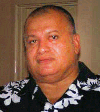
By Keith De Kretser
 It is not often that one comes across someone who has an interesting occupation and a passion for the task at hand. From an early age our featured Old Wesleyite in this issue has nurtured an interest in wild life which has taken him from the wilds of Sri Lanka to many countries in the world as an authority on rearing and caring for elephants.
It is not often that one comes across someone who has an interesting occupation and a passion for the task at hand. From an early age our featured Old Wesleyite in this issue has nurtured an interest in wild life which has taken him from the wilds of Sri Lanka to many countries in the world as an authority on rearing and caring for elephants.
 Old Wesleyite Ian K. Karan (Kirubakaran) born in Point Pedro in 1939 was appointed as "Senator of Commerce" in the Hamburg State Parliament in Germany as from Aug. 26th, 2010 Container entrepreneur Ian Karan has been elected new senator for port and Economic affairs in Hamburg. The City State’s parliament confirmed the 71-year-old’s appointment to the office by the new Hamburg Mayor Christoph Ahlhaus. Ian established his presence in Germany as a Container Entrepreneur. His contribution to the container industry is significant.
Old Wesleyite Ian K. Karan (Kirubakaran) born in Point Pedro in 1939 was appointed as "Senator of Commerce" in the Hamburg State Parliament in Germany as from Aug. 26th, 2010 Container entrepreneur Ian Karan has been elected new senator for port and Economic affairs in Hamburg. The City State’s parliament confirmed the 71-year-old’s appointment to the office by the new Hamburg Mayor Christoph Ahlhaus. Ian established his presence in Germany as a Container Entrepreneur. His contribution to the container industry is significant.
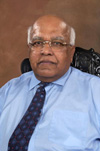 Visiting Melbourne recently from his home in New Zealand was Iqbal Muhammad on 1 August 2010. His appointment which began in 1970 covered New Zealand and was later expanded to include Australia and Fiji. Iqbal was a popular personality when he was based in Melbourne and was often a regular guest at the many Sri Lankan events. He was enjoying a few weeks holiday in Melbourne with his wife Jean catching up with old friends and classmates. He has fond memories of his days at Wesley and still has a passionate interest in Wesley’s progress and hopes future development will make it an academic institution of the highest standards and offering more advanced studies and a modern curriculum
Visiting Melbourne recently from his home in New Zealand was Iqbal Muhammad on 1 August 2010. His appointment which began in 1970 covered New Zealand and was later expanded to include Australia and Fiji. Iqbal was a popular personality when he was based in Melbourne and was often a regular guest at the many Sri Lankan events. He was enjoying a few weeks holiday in Melbourne with his wife Jean catching up with old friends and classmates. He has fond memories of his days at Wesley and still has a passionate interest in Wesley’s progress and hopes future development will make it an academic institution of the highest standards and offering more advanced studies and a modern curriculum
From the Dutch Burgher Union
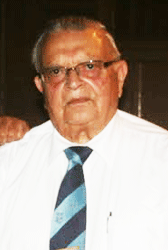
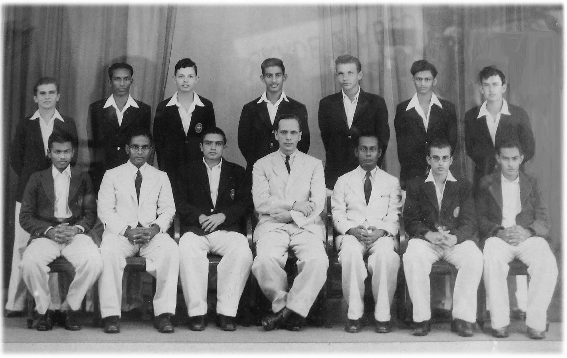
Dinner at Warwick De Kretser's in 2010
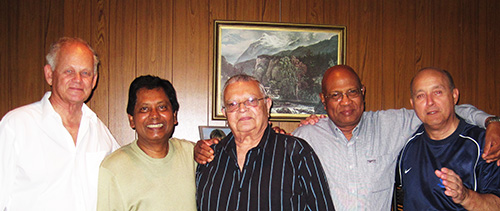
At Bryan Claessen's Funeral in Adelaide


Radley Claessen's family in Adelaide - 2010
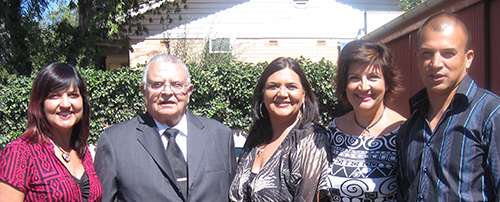
The most successful and entertaining period in Wesley's cricket history to date, the 1950s , has entered the folklore as the Claessen, Adhihetty and Fuard era. They were at the heart of all their most glorious triumphs under the inspirational guidance of coach and manager Mr AV Fernando.The game was simple, and he believed, only people made it complicated. Humour and imaginative motivational ploys were typical of his management style which oversaw the most sensational and productive years of cricket for Wesley. The name Claessen became a house hold name in Ceylon during those years when his brothers Bryan and Herman too played cricket for the school with much success.
Radley recalls those events at school most vividly and in his own words: In 1945/46 Mr. A.V. Fernando wanted to start an under 15 XI shortly after the war. Students were asked to meet after school. One afternoon at the Karlsruhe Garden 'small park', where Wilbert had prepared a practice pitch. The park was 100% "gadol" with not even a blade of grass to break the reddish-brown monotony. Bryan and I were also there along with TS Musafer, Lakshman Abeywardena, his younger brother, Sirima, and several others too many to list here, who formed Wesley's first Under 15 XI. Most of us went on to play for the 1st XI. One could say that Bryan's and my cricketing connection went back to our teens. He and I were known as the 'inseparable twins'. Our cricketing careers were closely connected. As you know, we both attended Wesley; we played cricket together for College and the Colts in the A Grade Sara Trophy Competition; we received our Cricket Colours together in our first year in the College 1st XI, which we captained in 1952 and 1953 respectively. Bryan used to often comment that I was the only Wesleyite who held the three coveted 'plums' of college life - Senior Prefect (staff selection), Cricket Captain (sports) and Secretary of the Games Club (student election). I do not know how far he was correct!!
Radley was a player of great daring and flair. He seemed a batsman without flaw, impeccable in defence, and classically elegant in attack, especially on the off side. At his best Radley could make any attack seem ordinary. He was always an exceptionally fine fielder. As captain his genial ways brought the best out of many players. Radley’s record as captain is impressive. Strongly built, with broad shoulders Radley was a fine and effective fast bowler. He had a front-on action of classical perfection and a most beautiful, rhythmical run-up and delivery. His immaculate control of line and length and his stinging pace off the wicket made him a formidable proposition. He bowled beautifully with the new ball and he was often genuinely fast. He could also employ a vicious bouncer, ferocious enough to embarrass even the best batsmen. He was amiable and polite on and off the field. At school he will always be remembered as an outstanding cricketer.
In that same year, 1952, he was appointed the Senior Prefect when he showed a resolute seriousness to do his job well. One of my firmest memories of him from that time is the charisma and respect he brought to his job as the" top cop". He was also a kind man; and understanding of other people's shortcomings and had perfect rapport with the students. Despite his iconic status he had his feet firmly on the ground. His rather distant, enigmatic personal manner was a part of him. Radley was a leader of men and had the drive and self-confidence even as a teenager and earned the respect of his teachers and fellow students. He had a no nonsense attitude to discipline at Wesley and beyond. Behind that phlegmatic exterior, though, lurked a measure of schoolboy mischief, as all teenagers. Radley won Wesley's coveted "Donhorst Oratorical Prize and was runner-up in Radio Ceylon's Public Schools' Elocution Contest. He made a tremendous contribution to life at Wesley College and as such takes his place in the history of the school. We certainly felt a sense of loss when he left.
After he emigrated in 1958 he had a remarkably successful career in Public Service in Adelaide where he enjoyed great prominence among highly influential people in South Australia. His immense talents and energies had not been wasted. He had always won the admiration and respect of those who worked closely with him. Perhaps, some thought that he had the touches of greatness about him and he did. He eloquently defended what he thought was right. Radley held the responsible position as Hon. Consul for Sri Lanka in South Australia when his work was greatly appreciated. For his services to the public Radley was appointed a JP and continues to serve the community. Despite his high profile work he has an overriding, quiet modesty which the public respects and appreciates enormously.
He remains essentially a family man close to his four children and grandchildren. Sadly his wife, Angela, passed away and he feels the loss deeply. He was gracious enough to phone me at my hotel when I was in Adelaide in March 2009 when we spoke about our schooldays and mutual friends. Despite a few health issues he leads a relatively active life.
Radley remains a loyal old boy of the school. He must be warmed by the esteem in which he is still held by former cricketers and Wesleyites worldwide. He still retains the poise and coolness he possesed as a schoolboy. As a fitting tribute it would suffice to say Radley epitomised in his working life what was good about Wesley's fine ideals and those of post-independent Ceylon. On behalf of the Brotherhood of past students I wish him a long and happy retirement.
The following article was kindly sent by Upali Perera, Melbourne January 2011
Radley Claessen the Public Relations MAN Retires
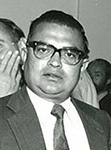 After 23 years, one of the Highways Department's most widely-known personalities, Radley Claessen, has retired. Ill health brought about an early end to working life for the 54 year old former Senior Publicity and Promotions Officer.
After 23 years, one of the Highways Department's most widely-known personalities, Radley Claessen, has retired. Ill health brought about an early end to working life for the 54 year old former Senior Publicity and Promotions Officer.
People in PR circles and road organisatiens around Australia have expressed their best wishes for Radley in his retirement. His work brought him in touch
with the broadest group of people and as a JP and Radley with the large group of friends at his farewell at Walk.
PR man he was always willing to help. erville head office on October 3.
Radley and his wife Angela began their life in Australia in 1958 when they emigrated from Sri Lanka. There Radley had worked as a journalist and company secretary.
In 1964, he started work with Highways in the Correspondence Section. His role in publicity and promotions began in 1969 and in 1977 he was appointed Senior Publicity and Promotions Officer. Radley made his mark as the editor of 'Highway' and was responsible for a profusion of brochures and publications. His efforts attracted awards for the Departments 1982-83 and 1983-84 Annual Reports for 'Distinguished Achievement in Annual Reporting'. He was responsible also for stage-managing many official openings of roadworks and bridges.
RADLEY CLAESSEN
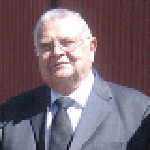
Radley Claessen, the Department's first Information Officer, was born in Ceylon. He had an outstanding college career and was Head Prefect, Cricket Captain and Games Club Secretary.
On leaving college he embarked upon a career in journalism and served as a sub-editor with "The Times of Ceylon" in the Features Section and later in the News Desk. At the age of 23 he was appointed Night Sub-editor of that evening newspaper-a position normally held by a senior journalist. He switched to secretarial work two years before deciding to' make his home in Australia, and worked as Assistant Secretary of a large public company in Ceylon.
He was Secretary of an export and import company in Adelaide for five· years before entering the Public Service in 1963. His first appointment was in the Staff Records Section of the Hospitals. Department and in 1964 joined the Highways, where, until assuming his. present duties, he worked continuously in the Correspondence Section.
Radley is a member of the Australian Journalists' Association. He has played district cricket for Sturt and turf grade cricket for Payneham. His interests now are centred around his. wife and four children. Leisure, he' claims, is a rare commodity with him and what little spare time he has is spent gazing at his tropical fish aquarium and working in the garden-a case of sheer necessity.
An email from Radley to Nizar Sappideen (12th December 2014)
Yes, I do remember you; the name certainly rings a bell. Bryan often spoke of you. I am now 83 years of age and left College in 1952 (I think). I was much senior to you at Wesley and that is perhaps why our paths have not crossed. As you no doubt know, Bryan passed on four years ago (16/3/10) and so have Lou and Vincent. Bryan and I started playing cricket at the same time, commencing in the Under 14 team which Mr A.V. Fernando started at Karlsruhe Gardens Small Park, which was at the time perfectly covered with brown pebbles. Lou’s first year in the 1st XI was when I captained the team.
My years at Wesley are memorable and had an enormous impact on my career in the wider world. I worked for “The Times of Ceylon” as a sub-editor for 5 years on leaving College and also worked at Collettes Limited, Borella as Assistant Secretary before leaving for Australia in 1958 with my wife (Angela, now deceased). We had one child then and since coming to this country we had three more, now all married.
I have had a cardiac condition and arthritis of the knees for some years and my health of late has not been the best. My heart condition has necessitated in my having had a triple heart bypass some years ago and also a defibrillator-cum-pacemaker implant. But I am not doing too badly for my age, for which I consider I am greatly blessed.
I was in Sri Lanka in 2013 with two of my daughters and had the good fortune and privilege of meeting many mates - Lucky Gunatilake, Kuiya Herath, Musafer, Mahroof Ismail, Richard Dwight, Tamitigama, Edmund Dissanayake, Lalith, Kenneth de Silva, Samsudeen, Jurampathy, OK Hemachandra, Afghar Mohideen and many, many others too numerous to list here. A reception for us was organised by Lalith and this gave me the opportunity of meeting so many old buddies and their wives. Unfortunately, I was unable to attend the reunion the previous year due to ill health. Unfortunately, I was not able to meet Mrs Nalini Fernando (nee de Mel) as she was unwell. I mention her because Nalini and I started our school careers on the same day in the kindergarten with Mrs Leembruggen – that’s going back a long time.
Once again thank you for writing, for your Christmas wishes and for thinking of me.
Please do write whenever you have the time or feel like doing so.
My best wishes to you and yours.
RADLEY
Radley L. Claessen JP. MPRIA
(Retired Hon. Consul for Sri Lanka in South Australia)
Links to further reading
From the Wesley College OBUA Newsletter Feb 2011

He made his first XI debut in 1968 and went on to spearhead the Wesley attack. In 1971 he was deemed the fastest bowler in schoolboy cricket as he hurled down thunderbolts that had the batsmen ducking for cover in fear of being hit. In 1972 he shared the Captaincy with A H A Cader. He was one of only 2 players selected to represent Ceylon Schools (with Roy Dias) in the famous all island double wicket tournament in 1972. On leaving school he played cricket for the Colts Cricket Club. I am referring to the amiable and gentle character Tyrone Jansz. Tyrone was not the tall well built paceman but of slender build and youthful good looks and fair complexion. He was popular with his friends and admired by hundreds of schoolboys of that era who looked up to him as their sporting hero. His charm and smile was a big hit with the girls as well and was the cynosure of all eyes at Wesley's nearest neighbours All Saints Girl School. Tyrone's sporting ability was not restricted to the cricket field as he was fleet of foot and took part in Athletics and Rugby in the off-season. Tyrone is one of six brothers Noel, Emil, Alan, Travis (deceased) and Ray who were all educated at Wesley.
Tyrone migrated with his family in the early seventies. Like most new migrants, he took his time to settle in to the new environment and find his feet. He soon fitted in to the lifestyle and challenges of a new city. He continued to play a bit of cricket and also renew acquaintances with many of his Wesley friends who had also migrated to Australia.
Tyrone had also shown early signs of renal disease which was not life threatening or serious at the time but had the potential to escalate very late in life to pose concerns.
One day when returning home after work on the train, for his bad luck he was targeted by some youths who were looking for another victim to rob and assault. That was a fateful day which changed his life. He was severely beaten up and left in the car park which was dimly lit. He was rushed by ambulance to hospital. Tyrone survived but the trauma and injuries had a lasting impact after he was released from hospital. Life after this incident brought a host of medical complications none more serious than it aggravated his renal function to the extent that renal failure was now a reality. Through this whole ordeal his wife Bernadine was a pillar of strength as were some of his dear friends. Very soon after that Tyrone commenced dialysis which meant that he was now reliant on a machine to keep him alive. Coupled with a host of other medical conditions as a consequence of the assault he battled on, never wavering in his efforts to enjoy a reasonable quality of life under the circumstances.
A search for a donor kidney began in earnest. At the time Bernadine offered one of her kidneys but it was found to be unsuitable because Tyrone's antibodies rejected her. Bernadine's sister, Tyrone's sister and a very spirited friend volunteered to donate a kidney but the screening process is so rigorous that they failed. Seven years went bye and Tyrone began to feel it was not going to happen as donor kidneys from cadavers was also subject to patients needs, compatibility with the recipient and medical priorities. Last year Bernadine was again subject to screening based on the advancements in the procedure and treatment over the past seven or more years in non-compatible kidney transplantations. Their faith and prayers were answered when they received the good news before Christmas 2010 that Bernadine's was suitable and it was all systems go for a transplant. What a Christmas present!
On January 12th, Bernadine and Tyrone both underwent surgery and are recovering slowly. Tyrone's new kidney is functioning and each day presents a new challenge after such major surgery Tyrone has new challenges to face but he regains his freedom from being hooked up to a machine every day and can look forward to a life as close to normal as possible. There is the possibility of risks along the way as the immunosuppressant's that he has to take for the rest of his life means he is vulnerable to infections and potential complications. However he has much to look forward to and is hoping that all things being well he could play the odd game of cricket. I know that Tyrone will face the challenges head on as he has done in the past and looks forward to a new and brighter future.
Bernadine's priceless gift of love will make a difference to the one she loves. Many would consider this act of kindness at the significant end of the spectrum for giving. To each and every one of us it demonstrates how we can make a difference – "ring the bell that we can ring" to change someone's life. It does not need to be as significant as this but it will go a long way to help someone. We wish Bernadine and Tyrone good health as they enter a new dawn in their life together.
Dr John Carnie, Chief Health Officer, State of Victoria, Australia
From the Newsletter of the OBUA
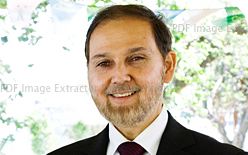
Our featured Old Wesleyite in this issue has brought great credit and honour on himself by his achievements and also for his school. Many who were in College in the fifties and sixties would remember this slim figure make his way along the corridors from the hostel to the science labs with his arms cradling a number of text books that appeared too heavy for his fragile frame to carry. Our featured personality is Dr John Carnie fondly referred to as “Jackie” to some of his friends and family. John migrated to Australia in 1977 and he is married to Jennifer Sissouw and they have no children.
John began his life as a student at Karlsruhe campus in 1953 and ended in 1964 when he entered University of Colombo to study Medicine in 1965. John was one of three brothers that studied at Wesley, being Robin(deceased) and Hillary. The connection just did not end there as he had many cousins Milroy Bulner (dec.), Stewart (Jerry) Dickson, Kenny Dickson (dec.), Ricky Dickson, Jeremy Dickson, Dion Herft, Duke Herft (dec.). As he was a hosteller he was in Moscrop House. John did not fancy himself as the sporting type and after a brief interest in Tennis turned to his favourite pastime of reading. His passion for reading developed his intellect and he did well in his studies earning a double promotion from fourth grade to form 1. He is what they would call a “gifted student” in current terms. John made it a point recommending that parents never do this to their children. John’s other interests were Choir, Debating and Photography Club in College. John’s academic achievements meant that he was a recipient of many prizes over a stellar career at Wesley far too many to list. Much more recently he received the Public Service Medal in the Queens Birthday Honours in 2009 in recognition of his contribution to Public Health.
When asked about who his favourite teachers were he stated it was a toss-up between Rachel Leembruggen and Ivan Ondaatje. Being a hosteller he had many experiences. His best memories are of being forced to do PE at 5.45 am in the hostel garden, usually in the dark; Having to do PE, wash and dress, attend chapel and study time before being allowed a morsel to eat or drink in the morning; Hostel dessert on Thursday nights is another when the Principal came to dinner, was usually jelly that was so hard it could be used as missiles both during and after dinner. His best friends at Wesley among the day scholars were Hilmy Sherriff and Mahendra Menon (who remains a friend today). In the hostel there were too many to name. When asked who he would like to meet up with from his school days he said it would be Tony Musafer.
After leaving Wesley, John Entered Colombo Medical College in 1965 and graduated MBBS in 1970.
- !970 to 1975 – Je obtained experience in Paediatrics and Cardiology at the Lady Ridgeway Hospital for Children and General Hospital Colombo with an 18 month stint at the Gampola Hospital.
- 1975 to 1977 – Postgraduate studies in Paediatrics and Cardiology in England.
- 1977 – Migrated to Australia
- 1978 to 1981 – Worked at the Royal Children’s Hospital Melbourne obtaining further experience in Paediatrics.
- 1981 – Changed careers by joining the Health Department Victoria. He has remained in the Department since then obtaining experience in many aspects of Public Health specialising particularly in Infectious Diseases.
- 1983 – He married Jennifer Sissouw (who had migrated to Australia from Ceylon in 1973).
- 1985 – Spent a year in Boston obtaining a Master’s degree in Public Health from Harvard University.
John’s achievements are many and he has been President of the Australasian Faculty of Public Health Medicine from 2004 to 2007. He was also appointed to the role of Chief Health Officer, Victoria in 2007 and in 2009 also took on the role of Director of Health Protection in the Health Department Victoria.
John’s excellence at College followed him through his career and has a host of qualifications.
- MBBS (Ceylon)
- Diploma in Child Health (Ceylon)
- Member of the Royal College of Physicians (UK)
- Diploma in Child Health (London)
- Master of Public Health (Harvard)
- Fellow of the Australian College of Medical Administrators
- Master of Medicine in Epidemiology (Melbourne)
- Fellow of the Australasian Faculty of Public Health Medicine
- Fellow of the Royal Australian College of General Practitioners
To many Melbournians he is well known when there is a health crisis or issue as he is the “Surgeon General” for the State of Victoria. His appearances on TV and the media have made him a household name in the State. Through his career he has met some famous personalities: Nobel Laureate Professor Peter Doherty, Governor of Victoria Professor David de Kretser, and Governor General Australia Quentin Bryce. In his quiet moments he relaxes with his wife Jenny and catches up when he can on his interests Music, Travel, Swimming, Cycling.
I would like to thank Dr John Carnie for graciously accepting the invitation to be featured in this issue of the Wesley Times and for giving up his precious time to give us a snapshot of his life during and after Wesley College. We wish John continued success in his service to the public.
Dr John Carnie retires after 30 years - 14 October 2011
Victoria’s Chief Health Officer Dr John Carnie has retired after 30 years of service.
Department of Health Secretary, Fran Thorn, said Dr Carnie joined the department in 1981 working in the area of drugs and poisons. “He came to the department with a wealth of clinical and public health experience,” Fran said.
In 1988, Dr Carnie moved to the Infectious Disease Unit of the Department of Human Services, going on to become manager in 1994.
He was appointed as Director of Disease Control and Research in DHS in 2001, taking on responsibility for areas covering communicable diseases, prevention and perinatal health, biotechnology and ethics, public health training and biomedical and public health research. “In April 2007, Dr Carnie was appointed as Victoria’s Chief Health Officer, providing a primary source of expertise within the department and a leading expert to government on public health issues and matters of public and community interest. “Additionally, as Health Protection Branch Director, Dr Carnie has been responsible for the development of integrated, statewide policies and strategies for quality service provision in environmental health, food safety and communicable diseases as well as having a broad role in health protection in Victoria,” Fran said. In January 2005, Dr Carnie led Team Golf, a 24-strong team of doctors, nurses, environmental health officers, microbiologists and a logistician - from Victoria and the Northern Territory - to provide assistance in Banda Aceh following the 2004 Boxing Day tsunami.
Dr Carnie was President of the Faculty of Public Health Medicine of the Royal Australasian College of Physicians between 2003 and 2006 and was awarded a Public Service Medal in the Queen's Birthday Honours in 2009.
“On behalf of the department, I would like to take this opportunity to thank Dr Carnie for his years of dedicated service and wish him all the very best in his retirement,” Fran said.
From the Dutch Burgher Union
CARNIE, Dr John Arnold, MB.BS, MMED, FRAGP, FECP (Lon), FAFPHM, MPH (Harvard), DCH (Lon), Chief Health Officer, Victoria for 30 years, retiring in 2011. He joined the Victorian Department of Health in 1981 working in the area of drugs and poisons. In 1988, he moved to the Infectious Disease Unit of the department of Human Services, going on to become Manager in 1994. He was appointed as Director of Disease Control and Research in 2001, taking on responsibility for areas covering communicable diseases, prevention and perinatal health, biotechnology and ethics, public health training and biomedical and public health research.
In April 2007, he was appointed as Victoria’s Chief Health Officer, providing a primary source of expertise within the department and a leading expert to government on public health issues and matters of public and community interest. In January 2005, he led Team Golf, a 24-strong team of doctors, nurses, environmental health officers, microbiologists and a logistician - from Victoria and the Northern Territory - to provide assistance in Banda Aceh following the 2004 Boxing Day tsunami. He was President of the Faculty of Public Health Medicine of the Royal Australasian College of Physicians between 2003 and 2006 and was awarded a Public Service Medal in the Queen's Birthday Honours in 2009. (Victorian Department of Health, Press release, 2011
From the OBUA Newsletter
Foundation Professor of Law and former Dean of Law, University of Western Sydney
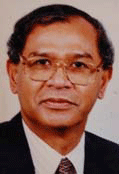 Our featured Old Wesleyite in this issue has brought great credit and honour on himself, his family and his school by his achievements. One of five brothers who all attended Wesley College, he is one of many high achievers that Wesley produced in the Cartman, Oorloff and early Wirasinha eras when Wesley College was ranked with the very best academic institutions in Sri Lanka. Razeen fits in the middle of the five boys with the late Anwar the eldest, followed by Nizar, then Razeen, followed by Seenar and the youngest Binhur. Razeen has pursued a career as an academic and is Foundation Professor of Law and former Dean of Law, University of Western Sydney since 1994. He has also held Professorial appointments at two other Australian Universities prior to this present role. Razeen lives in Sydney and is married to Professor Carolyn Sappideen and they have two sons. His interests are reading, classical music, and thinking.
Our featured Old Wesleyite in this issue has brought great credit and honour on himself, his family and his school by his achievements. One of five brothers who all attended Wesley College, he is one of many high achievers that Wesley produced in the Cartman, Oorloff and early Wirasinha eras when Wesley College was ranked with the very best academic institutions in Sri Lanka. Razeen fits in the middle of the five boys with the late Anwar the eldest, followed by Nizar, then Razeen, followed by Seenar and the youngest Binhur. Razeen has pursued a career as an academic and is Foundation Professor of Law and former Dean of Law, University of Western Sydney since 1994. He has also held Professorial appointments at two other Australian Universities prior to this present role. Razeen lives in Sydney and is married to Professor Carolyn Sappideen and they have two sons. His interests are reading, classical music, and thinking.
The Sappideen family has had a long connection with Wesley College with many cousins also attending the College. Razeen joined Wesley in his earlyteens in 1959 and carved a distinguished academic career during that time winning numerous prizes for his academic achievements. His reward for his efforts and finest accolade was being awarded the much sought after "Hill Medal" for the best student in the University Entrance year of 1963. He was a member of the "Spelling Bee" team 1960-1963 and a member "Do you know" team 1962. His leadership qualities and academic ability were recognised by his appointment as leader of the "Spelling Bee" team 1962 and 1963; Wesley won the National Championship in 1963 – perhaps the only time ever. He was Assistant Librarian 1961-63 and was a Prefect in 1962-63.
A member of Passmore house he balanced his keen interest in his studies with playing sport – representing the school in Table Tennis and Tennis. He represented Passmore house in Inter-house Soccer and Athletics.
When questioned about his favourite teachers he named the following: David Joseph, Haig Karunaratne, Cyril Fernando, Charles de Silva, Ivan Ondaatje, Fred Abeysekere, NAB Fernanado (Nabiya) and LA Fernando (Laffa). These gentlemen must have had a special aura for if there was to be a poll conducted of favourite teachers, these names crop up for all the very best reasons and not those who inflicted some mean corporal punishment in our youth.
Razeen's best friends at Wesley were Robin Perera, William Deutrom, Bashur Musafer, Tony Musafer, Layton Vanderputt, Paul David, ALM Hedayathulla, Mahendra Menon and Russell Schokman briefly (Mahendra and I quarrelled, Rusty went off to California).
When asked what were his best memories of Wesley College, he listed the following:
1. Great friends: My group of friends never gave each other a chance to "put on airs".
2. Great teachers: David Joseph and Haig Karunaratne were truly inspiring teachers.
They taught me how to think than merely the subject content. Needles to say this has had a lasting impact on me. David made me read two books when I was in the Upper Sixth: Harold Laski, The substance of Politics, and MacIver, The Modern State (the latter, he asked me to keep, and which I still have). He inspired and instilled in me the great places of learning in the UK and US. Haig, was less well organised and had misplaced all his teaching materials by the time I got to the Upper Sixth, yet he was an inspiring intellect and what he taught me (including the natural regions and the physical and economic geography of the world, and of the rainfall rhythm in Sri Lanka) have left a lasting impression on me. So were Laffa who taught us Maths for a term in Form IV, and Ondaatje (who preferred his first name Ivan to be pronounced in the Russian form) who taught me History and English; in history he taught us about the personalities of the renaissance, of Da Vinci and Michael Angelo (I always remember him whenever I visit the Sistine Chapel), of Wesley Times June 2011 page 10/24
The Reformation, of Dante and Machiavelli, and Cardinals Richeliu and Mazarin and the reign of Louis XIV, and of Portuguese rule in Sri Lanka), and in English, he read excerpts from Eckersly's Brighter English of Oscar Wilde's The Happy Prince, James Joyce's Ulysses, and Alfred Noyes' The Highwayman, with such passion. He introduced us to the writings of Solokov and Shokolov (I infer that his heart really lay in Russian literature at that time), from which of course it was only a short leap for me to the works of Nikolai Gogol which I learned to appreciate immensely. The Highwayman with such passion. Fred was another inspirational teacher who taught us the French Revolution, The German unification and Bismarck, and of Europe in turmoil in the 19th century, and of Dutch Rule in Sri Lanka. Nabiya taught us about the Ten Year Plan, and the relevance of the study of Political Economy; and Cyril was a tireless teacher who unselfishly devoted himself to teaching History to Sixth formers in both the Sinhala and English medium. The other personality was of course Shelton Wirasinha; while he never taught me, he lent me his outstanding collection of books on Plato, Aristotle and Socrates, spent time discussing them with me, and thus exposed me to deep conceptual analysis, evaluation, and reflection.
3. The tragedy of Wesley: Wesley's decline set in 1960 which saw its bright intellectuals like Ondaatje, Fred, David Joseph leave for other pastures. The funding schemes of Government assisted Schools helped further this decline. For instance, Wesley I gather had its largest and brightest best cohort of University Entrants in 1959 (the likes of ID Raymond and Alfie David), and in 1962 Brian Jegasothy who taught at The University of Pennsylvania Medical School, and until his untimely death at Penn State University.
I believe many alumni who read this article will echo the sentiments expressed in Razeen's third point for Wesley had certainly lost its standing and stature in the last forty years as being one of the finest schools. The past two years has shown that under the stewardship of Dr Shanti McLelland Wesley has turned the corner and is heading in the right direction once again to restore her to her rightful place as one of the best schools in the nation.
On completing his studies at Wesley, Razeen entered University and graduated with LLB Honours from the University of Ceylon in 1967. He then joined the Ceylon Tea Board and was posted to Australia as Assistant Commissioner in 1968. He left the Tea Board in 1971. This was a life changing decision for he went back to Law Studies: graduated with LLM Honours from the University of Sydney, and admitted as a Solicitor of the NSW Supreme Court. The journey as an Academic was underway as Razeen graduated with LLM (Taxation Law studies) from The University of Pennsylvania, LLM (Corporations Law studies) from Columbia University, and JSD (doctorate) from Columbia University. He also did courses of study at Emory University and George Washington University (Washington DC).
He has been an academic since 1972 and taught successively at the Universities of Sydney, New South Wales, Macquarie, and Western Sydney, amongst others. He has been a Visiting Fellow at Cambridge and Oxford Universities, and will be the Tun Ismail Mohamed Ali Distinguished Professor of Law at The University of Malaya for 2011-12 academic year.
When asked who would you like to meet up with or contact from his days at Wesley who he has not met for years his response was Haig Karunaratne, Cyril Fernando, Kenneth de Silva (Glojo-Barbi), and Dr. Omar (Sandy) Musafer.
Having studied and taught at so many distinguished Universities he would have met many famous personalities in his time. Not one to name drop he explained there were far too many to list.
I would like to thank Professor Razeen Sappideen for being generous with his time and for graciously accepting the invitation to be our featured Wesleyite in the June issue of the Wesley Times.
By Dr Nihal D Amerasekera
The word spread that Reggie and Dawn Bartholomeusz were in town. The big burly Wesleyite is immediately recognisable by his Colgate smile. Reggie has been the President of the OBUA and is a tireless supporter of the school. He has been doing the rounds visiting school friends and seeing the sights of London and France. There was a dinner held in his honour by the OBU-UK at the Lihiniya Restaurant in Cricklewood, London on the 9th of July 2011. The next day Ramakrishnan, one of his old friends, held a dinner at his home in Harrow for Reggie and his friends.
The troops gathered around 8pm. As I walked in, the dining table was full of bottles of whisky and wine. We all sat around this lavish galaxy of drinks. Reggie and Dawn arrived to be greeted by a lively crowd of old boys and their wives. These occasions are rare and are to be treasured and we did just that until 3 in the morning.
Reggie was the President of the Australian OBU when I visited that beautiful country with my wife in 2009. He welcomed us most warmly and arranged a lavish dinner with over 50 guests. The courtesy and generosity we received will be fondly remembered. I met my school friends I have not seen in 50 years. This was something I had always wanted to do. Having being a hosteller for 6 years (1952-58) most of my friends now live in Australia. We caught up on those lost years. I thanked Reggie most warmly for giving me the opportunity of a lifetime to see my friends again.

He is a well known figure at Wesley and Sri Lanka. He had outstanding success since he burst into the rugby scene at Wesley at the tender age of 15 in 1962. He later went on to captain the school. He also captained the CR & FC in 1976 and played for Sri Lanka when he should have captained the international side. Despite the passage of years the controversy still rages about the captaincy that year. Reggie was a tough competitor and is a true ambassador for the game. He was a fine athlete and to this day holds the 100 yards sprint record at school. Reggie played cricket and hockey for Wesley with great distinction. Reggie’s enthusiasm for Rugby and his coaching achievements made him a celebrated figure in Australia. His sporting flair and elegance is remembered by Sri Lankans worldwide. He is a fine all round sportsman and a gentleman. Reggie has retained the fundamental enjoyment of rugby and that rubs off on everyone who has the pleasure to meet him. He played the game with the same enthusiasm and joie de vivre with which he did everything.
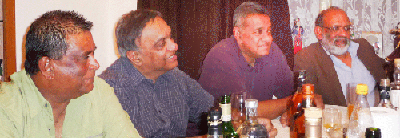
Sorting the problems of the world and of Wesley !!
He is a charismatic talker, weaving lively tales from his past. Reggie has a remarkable memory for events on and off the field during his school years. Anecdotes poured out, voices were imitated, mannerisms were mimicked and situations enhanced, to everyone’s delight. Principals and teachers were not spared. Through all this his unremitting courtesy and great sense of humour came through. Although down to earth, his appeal is undeniable. Reggie as always remains a modest and self-effacing person.
Old boys who had gathered made valuable contributions to make it a memorable evening. The atmosphere round the table was at times manic. All the Sri Lankan ethnic groups and religions were represented. The swiggers mingled freely with the teetotallers. One of the highlights of the evening was the lively and relentless banter across the table between Spencer Hoffman and Leyton Vanderput which had the whole crowd in stitches throughout the evening.

Rama and Lakshmi were wonderful and generous hosts. After emptying several bottles of the amber nectar, delicious morsels of food arrived on the table at regular intervals. Rama’s culinary expertise gave us gourmet fried beef delectably seasoned and laced with green chillies. The feisty and fiery chillie and garlic prawns took our breath away. Laksmie's main course of rice and curry was less firery and totally delicious. There was an appetizing array of signature Sri Lankan dishes mildly spiced and appreciated by all. Rama has the knack of helping the guests to keep their spirits high.
As the evening wore on the spirits rose and tempers frayed. It lead to some strange vitriolic moments. There was a particular unsavoury incident with raised voices to which Reggie in his characteristic flair stepped in to nip it in the bud. He expressed himself with fluency and precision. The storm quickly subsided. There were no hard feelings. Reggie's words of advice: “Friends, we must never forget we are all Wesleyites. Whatever differences we have, we must resolve them with dignity and calm”. I hope and wish those words will resonate and be recalled and remembered. It must be said despite this minor aberration good sense and friendship prevailed through the evening.
The unity and the brotherhood of Wesleyites is unique. The students who have been through the gates of Wesley College and walked its long corridors and classrooms develop a certain chemistry that bond us together. This was also an important topic of conversation to which Reggie made a valuable contribution. Disunity among some old boys and in the OBU has been a vexed problem for more than half a century. This has prevented the progress of the school and has been a serious hindrance to our success. Poor leadership and lack of useful dialogue between the factions are the key reasons for this intolerable situation. They have to get their house in order to be able to help the school. Perhaps we should call for some divine help. Reinhold Niebuhr's serenity prayer may help to deal with those issues amicably:
Courage to change the things I can,
And wisdom to know the difference.
The ambience was typically Sri Lankan with the boys seated round the booze in one corner and the girls seated round a smaller table in the other corner. Nihal Peiris in his enthusiasm ventured into the girls den for some tittle tattle. Unfortunately there wasn't a chair for him. The centre table was long with short legs and had numerous bottles of wine, glasses and soft drinks. In his wisdom Nihal decided to sit at the edge of the table when the opposite end rose rapidly slinging the drinks into the air and dashing on the floor. Nihal lay helpless on the floor for a brief moment and rose to his feet embarrased but unhurt. This added to the fun and the frolic of the evening.
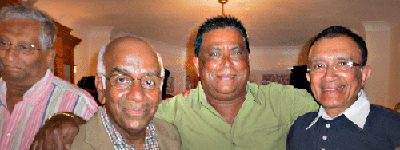
The Brotherhood of Wesleyites - Representing the 4 communities at School
We were pleasantly surprised to see the omnipresent and affable Afghar Mohideen at the party. I remember him well at College but had not seen him since those days of our youth. You cannot find a photo of the OWSC without his rotund presence. It was a great pleasure to see him relaxed exchanging anecdotes of those happy times. Afghar had in large measure many of the qualities needed to lift him in a dozen short years from a travel consultant to a Managing Director. Now he heads a lucrative travel business empire in Sri Lanka. He has ridden the unpredictable under-currents of Sri Lankan politics with consummate ease. Afghar has been a loyal old boy and a generous benefactor of his alma mater. As we chatted and reminisced we wandered into the idealism and exuberance of our youth.
After these rare gatherings it is hard to leave and say goodbye. We sang the College song with the usual spirit and gusto and had the famous war cry to ring in our ears. The photocall and the emotional hugs brought the proceedings to a reluctant end.

We thank Lakshmi and Rama for their wonderful lavish hospitality and friendship. Thanks are also due to Reggie and Dawn for making time to be with old friends during a busy visit to Europe. Dawn was an exemplary Wesleyite’s spouse: she was poised and elegant during the long and eventful party. Her delightful smile and modesty captivated us all and recorded the events of the evening with her camera. Reggie invited Senthil and myself to visit them in Melbourne. That will indeed be an opportunity to re-live those great years at Wesley. We wish Reggie and Dawn a safe journey home and many more happy years together in Australia. They will, I am certain, carry with them our best wishes to the Wesleyites Down Under.
These gatherings are more important than ever before as we retire from work and embark on our final laps of our journey. We do so with hope, joy and freedom. We have met in our formative years and those friendships go far deeper than those made later in life. Let us hope we maintain friendships and keep those happy memories alive. We know not what tomorrow may bring.
By Lalith Wijesinghe (L.C.R)- 16 July 2011
But in my memories they still linger on
I'm glad I grew up in the time that I did
When I was allowed to play cricket like all other kids
The news that my long time friend Glen Reimers was visiting SriLanka in June 2011 was indeed eagerly awaited by me and many of his contemporaries at Wesley. Glen was touring Srilanka with a group of nearly 20 of his close relatives which included his wife, daughter, grandchildren, sisters-in law and cousins all domiciled in Australia. Saturday 16 July evening was the date & time we planned to meet at the Old Wesleyites Sports Club.
Those of us who gathered that evening were Lucky Goonetilleke, Dharmaratne Kodithuwakku, Kenneth De Silva, Sarath Wickramaratne, Milroy Muthuvaloe, Clifford Rodrigo (CT), Priyanath Fernando, Dalkin Samidon, O.K.Hemachandra, Ralph De Silva, Lucky Kottachchi, Afgher Mohideen, Navin De Silva, Wimal De Silva & Noel Joshua (Both from U.K.) Haig Karunaratne and Fred Abeysekera two beloved teachers of Glen as well as all those present also graced this occasion. Edmund Dissanayake could not be present due to a family commitment.

.........................................................................
1st XI Cricket Team - 1962

.........................................................................

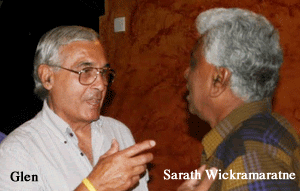



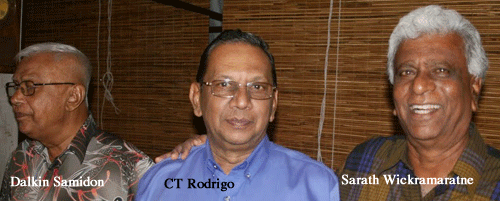

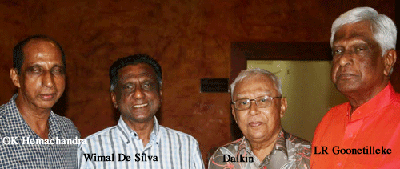


.........................................................................
1st XI Cricket Team - 1960

.........................................................................
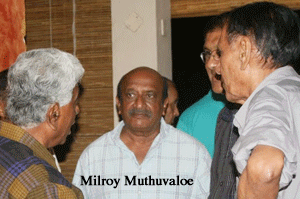
It was indeed a joyous occasion where cricket mates, school mates and teachers all met neath the “Double Blue”. Many tales from yester-year were recalled and related. Memorable incidents from past cricket matches were recounted with authenticity first hand.
Fred Abeysekera & Haig Karunaratne added colour to the evenings proceedings and were roundly complimented on their never fading “good looks” and sharpness of intellect.
A special mention must be made of Noel Joshua and Wimal De Silva both from the UK who attended this get- together at short notice.
It was truly a pleasant evening where a small group of Wesleyites of yesteryear gathered, socialised and partook of a typical Srilankan meal of Hoppers, Stringhoppers & chicken expertly and tastefully prepared by the OWSC Chef. Nearly all commented on the high standard of the food that was served.
A word of appreciation to my friends Lucky Goonetilleke, Milroy Muthuvaloe & Sarath Wickramaratne for organising and coordinating this event. Also a very big thank-you to Glen for having graced this occasion with his presence amidst his tight schedule. He has maintained his good looks and gentlemanly ways.Glen though a man of few words is warm hearted,loyal and generous. All of us wish him,his charming wife Jill and family all that is best in life and admire Glen & Jill for the great courage with which they have faced all that has been thrown at them in their life’s journey.

I was pleasantly surprised to see the larger-than-life, omnipresent and affable Afghar Mohideen on the 9th of July 2011 in London. I remember him at College but had not seen him since those days of our youth. He had his entire education at Wesley and it would be fair to say he is born and bred at the school in Karlsruhe Gardens. This long association has had a lasting impression on Afghar and has remained a true blue Wesleyite. He has been a loyal old boy and a generous benefactor of his alma mater. During the long years of decline of the school and its inevitable consequences Afghar demonstrated a measured low-key pragmatism which earned him a reputation as a mediator.
He was a fine sportsman at school representing Ceylon in Judo while at Wesley. He also won the National and YMCA Colours in Judo. Be it rugby, cricket, hockey or indoor games he was there to support the school teams. As a result he is well known to all Wesley College sportsmen.
His talents were recognized by his peers and the staff and was appointed Senior Prefect in 1967. During his tenure he helped to maintain law and order at school. His inspired leaderships earned the respect of students and staff alike. As a boarder he was a 24 hour Wesleyite and well known to all. These early influences are seen throughout his career which accounted for a streak of austerity, loyalty and good discipline. In his own words "I was in the hostel only for one year, during my final year of the A/Levels. I passed my O/Levels with difficulty, as I was spending more time in Judo and other activities other than my studies Mr. L.A. Fernando had spoken to my father and had suggested that if I had to get through my A/Levels I should be admitted to the College hostel, even though I was staying 10 cents bus fare journey away from the College. The one year that I spent in the hostel I gave up all activities and studied and passed my A/Levels in the first attempt and entered the University. I was a Prefect in the hostel and my cube mate was Dr. Prasadh de Silva, presently in London, a trusted and respected old boy. I am ever so grateful to Mr. L.A. Fernando for his concern and good advice which changed my life".
Afghar entered the University where he completed a degree in Business Administration. Although his heart was in the world of business and finance for short a stint he joined the staff of Wesley College . Soon he was recruited by the long established and impressive Maharajah Organisation. His hard work and enthusiasm paid dividends. The tide finally turned when he joined John Keells Ltd. Afghar had in large measure many of the qualities needed to lift him in a dozen short years from a travel consultant to a top Director. His vision, dedication and skill was valued greatly. The Company recognized his ability and motivation. Afghar rapidly climbed the corporate ladder and rose to become a Director of the company and Managing Director of Associated companies, Walker Tours Ltd., and Keells Hotels Ltd.,
In 1989 he left the Company hoping to forge a career in Politics. Afghar un-successfully contested the 1989 Parliamentary General Elections as the SLFP Candidate for Colombo District. Politics need people like Afghar. It was a loss to the country not to have been elected to the Parliament. With his honesty and integrity he would have made a difference to the murky world of SL politics. If Afghar was elected the dream of an all inclusive and just society for Sri Lankans would have been a reality sooner. In a democracy the people get the leaders they deserve.
In 1991 Afghar's wife sadly passed away. He remembers it as a shattering experience. This sad event changed his life and made him give up politics altogether. Since his days at John Keells he had a liking for the Tourism Industry. He started his own Company calling it United Holidays (Pvt) Ltd., and Go Holidays (Pvt) Ltd. He gave much of his energy to develop his travel business. This was what he did best. His ideas worked. With his experience, expertise and know-how the company grew in size and stature to become the leading In-bound/Out-bound Travel Company in Sri Lanka. The capacity to innovate bore greater fruit when he spotted the energy of the “cheaper flights” and the ability and the desire of the new middle class in Sri Lanka to travel abroad. Afghar's vision and direction turned the company into one of the most valuable and industry-changing companies in Sri Lanka.
He is also the Representative in Sri Lanka for United Continental Airlines, Air Canada and also STA London. Now he heads a lucrative travel business empire. Like Afghar himself his Company is internationally admired and respected. He has a shrewd business mind. You can see him thinking while chatting. Thus, he has ridden the unpredictable under-currents of Sri Lankan politics with consummate ease. His good standing in the industry has been a great asset helping him to tide over difficult economic times.
Despite heavy national and international responsibilities, success, wealth and affluence he remains down to earth. He has stayed in touch with the world of old boys since leaving school. Whenever school friends from his era visit SL he makes time to join the get-togethers and reunions. You cannot find a photo of the OWSC without his rotund presence. Friendly debate, laughter and warmth are the characteristics he brought with him to those gatherings. It is indeed a great pleasure to see him relaxed exchanging anecdotes of those happy times at school.
His family is now scattered in the USA, UK and Sri Lanka and is a source of the greatest happiness and pride. He is often and invariably surrounded by a posse of friends who are trusted old boys of Wesley. As he travels the world he is able to renew his friendships and be a familiar presence at reunions worldwide.
Personally it was a great pleasure to see him in London. He is a man of irrepressible optimism and good nature and saw only the best in others. He is trusting and generous to a fault. As we chatted and reminisced we wandered into the idealism and exuberance of our youth. We vowed to keep in touch. Inshallah !!! We hope to meet again sometime soon.
On behalf of the Brotherhood of Wesleyites I wish him good health and happiness for many years to come.
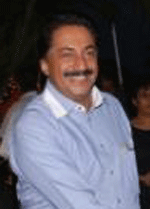
Wijeya Lak Apparels (Pvt) Ltd Company was established in 1992 under the guidance of late Sumathipala Wijemanne as a family concern garment industry pioneered and inspired by his sons Messrs. Jayantha and Parakrama where as other members of the family assisted at his native place of Kumbuke, Gonapola in Horana.
Mr. Don Parakrama Wijemanne, Managing Director of Wijeya Lak Apparels (Pvt) Ltd is seen receiving the Silver Award in the Garments Sector- Medium Category from Mr. Chaminda Hewamallika, Country Manager of DHL (Principal Sponsor)
At presently it is managed by Director Parakrama Wijemanne and Mahadeva Wijemanne the Finance and Administrative Director while the other brothers, brothers in law are working as directors.
Parakrama Wijemanne after his education at Wesley College Colombo began his business in a small way and gradually with dedication and devotion later established an expansion unit of Wijeya Lak Apparels at Ingiriya and another factory named Dimasha Apparels at Boralesgamuwa in which Mr. & Mrs. Wijemanne are the directors.
His garment factories service a select clientele maintaining high standards of quality manufacture.
Wijemanne is fortunate that he had acquired experience in production, the technical side and marketing which he believes is a must for success in his field.
He is a practical person who believes in achieving success through hard work on the floor, proper personnel management and effective teamwork together with a good knowledge of the techniques of production and proper marketing.
The company specializes in producing pants, shorts, blouses, shirts, skirts, dresses and children’s wear for the international market and is geared to meet a capacity of 85,000 PCs monthly.
At the beginning Wijeya Lak Apparels Company had sent their exports specially to Germany through the buying office of his brother Mr. Jayantha. Now the Garments are manufactured and export to U.S.A. specially to the buyers; Khols, Shopco, Costco, Kid "R" US/Big Dogs ‘Inc’, Walmart, Associated Merchandising Corporation. Further Wijeya Lak Apparels do their exports to UK buyers specially Prime Mark and uniforms to British Telecom. Wijeya Lak has found markets in the Netherlands and do export buyer M&S Mode and Portugal and Spain to buyer Maconde Confeccoes.
"Our company’s vision is to be a leader in the garments industry, specially, woven garments for the global market,"said Parakrama Wijemanne, Managing Director and Mahadeva Wijemanne, director, Finance.
"We shall ensure that quality and timely deliveries are maintained through continued training and quality improvement programmes," said Mrs. Amitha Wijemanne (Mrs. Parakrama Wijemanne), Technical Consultant of Wijeya Lak Apparels .
Presently Wijeya Lak Apparels and Dimasha Apparels have provided employment opportunities to over 800 local young men and women and also helping the country to earn valuable foreign exchange in substantial way by these exports.
Wijeya Lak Apparels has received the National Chamber of Exporters (NCE) Medium Sector Garment Industry Silver Award for the Year 2001 for their export performances.
Addendum by Dr.NDAmerasekera:
Parakrama is the eldest son of Mr DS Wijemanne, our well know proprietor of the Wesley College Tuck Shop. His close resemblance to his illustrious father is unmistakable. Parakrama has been a tower of strength to the OBU and the OWSC where he has been its President, a generous benefactor and also a live wire.
Links to further reading
Tuesday’s assault on Sri Lanka Medical Council (SLMC) Registrar N.J. Nonis triggered a fresh round of protests by the Government Medical Officers Association (GMOA) which launched a countrywide token strike yesterday urging President Mahinda Rajapaksa to investigate the matter and punish those responsible.
The GMOA said the attack against Dr. Nonis was not only a threat to the medical professionals in Sri Lanka but also to the rest of the country as such attempts to harm emminent medical professionals could severely damage the medical sector in Sri Lanka.
“The SLMC is a government institution responsible for medicine and health education in Sri Lanka. Any threat made to SLMC officials is a threat to the country’s health sector.
We are asking the President to intervene in this matter and resolve these issues,” GMOA spokesman Upul Gunasekara said. He said before Dr. Nonis was assaulted he was shown a document with his name and the names of three GMOA committee members.
Dr. Gunasekera said the GMOA had received the support of the Government Dental Surgeons Association, specialists and members of the Federation of University Teachers' Association (FUTA).
The GMOA has requested the Health Ministry to provide police protection to all SLMC members including its Chairman Lalitha Mendis, GMOA members and Deans of universities so as to ensure their safety.
“The attack on Dr. Nonis may be connected to the recent controversy over the Malabe Private Medical College issue or an attack by those affected by the Examination for Registration to Practice Medicine in Sri Lanka (ERPM) the results of which were released recently. Either way, it has been done by a party that was affected by activities that Dr. Nonis was involved in,” GMOA Secretary Chandika Epitakaduwa said.
He said the GMOA Executive Committee would be meeting today to discuss what steps to take next and said the Association was already discussing this matter with lawyers on taking legal action against Higher Education Minister S.B. Dissanayake’s recent statement that GMOA President Anuruddha Padeniya was not suitable to work as a doctor.
“In what capacity or based on what credentials is the minister making such statements about medical professionals or taking decisions on behalf of the Health Sector in this country? Rash statements such as these made by such officials have led to more problems now,” Dr. Gunasekara said and added that Dr.Nonis had returned to work at the SLMC.
Meanwhile the Medical Faculty Students Action Committee comprising local medical faculty students from around the country went on a countrywide protest against the assault on Dr. Nonis yesterday.
“The SLMC is the monitoring body of the health sector in Sri Lanka and in many ways is far more important than parliament itself. We are calling on the authorities to carry out an inquiry and address the problems in local universities as opposed to private medical institutions that do not deserve legal recognition,” Action Committee Convener Nilan Fernando said.
Meanwhile,the South Asian Institute of Technology and Medicine (SAITM), the private medical institution in Malabe, yesterday, condemned the assault on the Sri Lanka Medical Council (SLMC) registrar Dr. N. J. Nonis and categorically denied any involvement in it.
SAITM director Dr. Sameera Senaratne said that the institution had had no connection with the attack and that it was unlikely that the attack had been planned by an interested party to disrupt the progress of the private medical college.
“We strongly condemn the attack on Dr. Nonis as he has always been cooperative in the progress of our medical faculty. Also we firmly deny the allegation that SAITM instigated the attack,” said Dr. Senaratne. He said that SAITM was in favour of an independent inquiry into the incident.
“Dr. Nonis is a personal friend of mine and of other doctors employed at SAITM. He has always been working in cooperation with SAITM. We have no desire to injure a friend. And our chairman, Dr. Neville Fernando would never condone such an act,” he said.
One suspect arrested By SupunDias
A suspect was yesterday arrested in connection with Tuesday’s assault on Sri Lanka Medical Council
One suspect arrested Registrar N.J. Nonis outside his residence. The suspect is a resident of Kaludawala in Panadura. Dr. Nonis had been allegedly assaulted by two motorcyclists who accosted him to ask for directions when he got out of his car outside his home at Jacob Mendis Road in Moratuwa.
Dr. Nonis is alleged to have been assaulted with a wooden pole.Police media spokesman Maxie Proctor said the second suspect appeared to have fled the area while the suspect in custody was produced in court.
Addendum by Dr Nihal D Amerasekera
I am appalled by the assault on Nihal Nonis who was only carrying out his duties as an honest arbitor in a dispute about the validity of a Medical School. Such disputes can only be sorted by discussion or referral to the law and not with violence. We hope those who commited this horrendous crime will be duly punished.
Dr Nihal Jayasinghe Nonis was my classmate at Wesley College from the 5th Form upwards and was in the Medical College with me. He was an intelligent, kind and quiet student who got on with the work at school without any fuss or bother to anyone. Although he never partook in the mischief and the riotous behaviour Nihal Nonis remained an innocent onlooker and not a "sneaker". As I recall he came to Wesley from Prince of Wales College Moratuwa during the Principalship of Mr PH Nonis. He qualified as a Physician in the UK and served the Health Service as a eminent Consultant Physician until his retirement when he was appointed to the prestigious postion of Registrar of the Sri Lanka Medical Council. He is immensely respected for his integrity and honesty and brings great honour to Wesley College.
With a heart for any fate;
Still achieving, still pursuing,
Learn to labor and to wait
Mr Nigel Christoffelzs- Former Wesley College sportsman is entertained by his school colleagues at Mr Wimal De Silva's residence, Wimbledon, London SW19. Mr Wimal and Mrs Mercy De Silva entertained Nigel and his wife Fay along with fellow Wesleyites, Dr Prasad De Silva, Mr Leyton Vanderput, Mr Ranjit Perera, Dr Ana Thevathasan, Mr Nihal Peiris and Mr Spencer Hoffman.
It was a delightful evening where the old boys were reminiscing the good old days at school. Nigel was an outstanding sportsman, where he excelled in Rugger and Athletics, before going to Australia.
 |
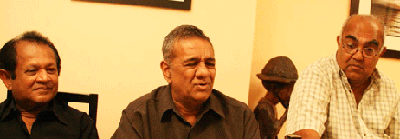 |
 |
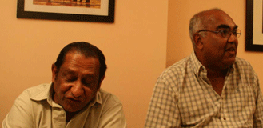
By Lalith (L.C.R) Wijesinghe
And become what you want to be,
But don't forget the days you spent,
When you were young at school with me
The 15th October 2011 was a special day. A few of us were playing host to Upali Perera
and Darrel Maye who were on holiday in Sri Lanka . Both of them are domiciled in Australia.
I was so looking forward to meet Darrel. I had not met him since he migrated to Australia over forty years ago. The Old Wesleyites Sports Club was the venue for our get together. Lucky Goonetilleke had made all arrangements with the Club Manager and a long table & chairs were laid out in the lawn with light blue and dark blue table decor. It was a fairly cool evening with all the heavy rains experienced in Colombo during the week. We were hoping that the weather Gods will not spoil our outdoor function.
Those gathered that evening were Upali Perera ,Darrel Maye our guests with Fred Abeysekara & Haig Karunaratne our former teachers together with Lucky Goonetilleke, Neville Perera, Dharmaratne Kodithuwakku, Milroy Muthuvaloe, Sarath Wickramaratne,Clifford Rodrigo(CT)
OK Hemachandra, Ralph De Silva, Lucky Kottachchi, Afghar Mohideen ,Navin De Silva , Kenneth De Silva & myself.
It was a joyous occasion where our mutual bonds of friendship were being renewed and anecdotes from the nineteen fiftees and early sixtees were recalled with gusto. Our memories were being taxed and tested to the maximum, each one trying to outdo the other with some tale privy to only a few.
Personally I was delighted to meet Darrel after so many years.We were Cricket Team Mates who had a great respect to each other. Australia seems to have provided an “elixir of youth” to both Darrel and Upali who did not seem to have aged and still maintained their good looks.
As we were settling down a heavy drizzle started and all had to run for cover. Proceedings continued indoors. Of course our gatherings are not complete without the spirit that cheers.
Many finger licking dishes were on offer with the drinks. The dinner on the menu were string hoppers and hoppers prepared via a “ live” station. A pleasant evening was had by all and it was the unanimous view of those present that such get togethers be arranged at regular intervals in future.
A word of thanks to Lucky Goonetilleke and Milroy Muthuvaloe for making the Club arrangements
and getting those present to attend.
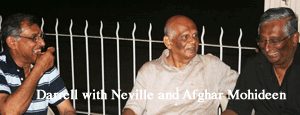
| 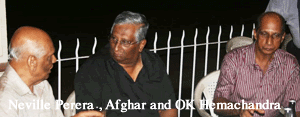 |
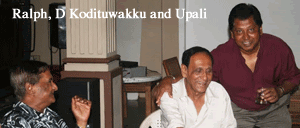 |
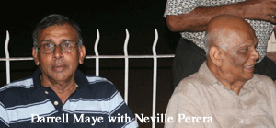 |
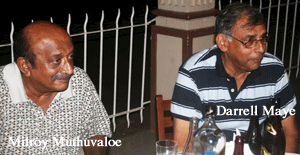 |
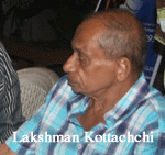 |
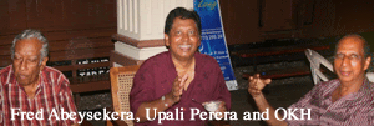 |
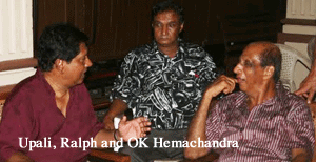 |
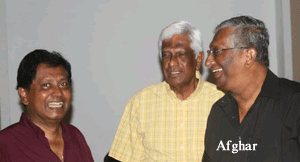 |
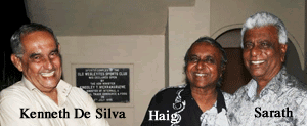 |
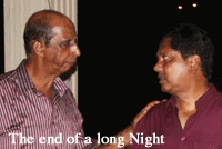 |
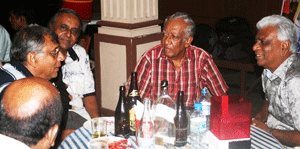 |
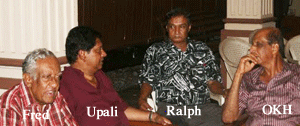 |
 |
 |
 |
Transcribed from the OBUA Newsletter Nov 2011

Our featured Old Wesleyite in this issue made a name for himself with his cricketing prowess, one of many such talents Wesley has produced over the years. An opening bowler who troubled the batsmen with his swing and pace, he will be best remembered for captaining the Wesley First Eleven in 1969 to be voted the Lifebouy Shield Best Schoolboy Cricket Team in the Island and for that stunning victory over Royal College in the last delivery of the match at Campbell Park. He is none other than Amaresh Rajaratnam affectionately referred to as "Loku Raja".
Amaresh grew up and played his cricket in the deep South in the town of Kalutara, Joining Wesley in 1966, in four short years he carved out a stellar cricket career. The link with Wesley College was strong with his brothers Diyanesh(deceased) (The Wesley/Thurstan rugby encounter is played for his memorial trophy), Mahesh and Buvanesh all attending Wesley. Through
marriage he has surrounded himself with the fraternal band of Double Blue with his father-in-law the late R L de Silva ( A former Registrar of Companies of Sri Lanka) and brothers in law Chandima(Jardi) (Captained the College rugby First 15 in 1962) and Lal de Silva. His sister's husband is another Wesleyite, D. Kanendran. Another Wesley connection was Amaresh's older
brother Suresh Chandra who was a staff member at Wesley for a short while during Mr Wirasinha's tenure. He taught in the Junior school and was also Master in Charge of Under 13 cricket. He tutored Wesley's current Principal Dr. Shanthi McLelland when he was taking up the LLB exam. His brother currently sits on the bench of the Supreme Court in Sri Lanka. Dr Mclelland and Amaresh are close friends as both have been living in Canada for many years. His father well known law educationist Late S.S. Rajaratnam was a president of the Welfare Society in the early 70's. Now domiciled in Toronto, Canada for twenty two years, Amaresh is married (wife Saroja) and has two grown up children (daughter Shyamila and son Nuwan).
He works as an area manager for L. S.Travel Retail North America located in the Toronto airport, His interests include watching all kinds of sports, providing cricket commentaries at local cricketing events such as the annual Royal - Thomian in Toronto and the Toronto Mayor's Cup Cricket festival organized by CIMA. He is also keen on Karaoke singing. Whilst cricket is his first love he was an active member and a House Captain of Wilkin House and represented the House in Athletics, Hockey and Rugby. He represented Wesley in the "Do you know" team (Sinhala) taking part in the inter-school competition. He also acted in plays and won the best actor award in the inter-house drama competition demonstrating his keen interest and involvement in extra-curricular activities whilst a student. His stellar cricket career at Wesley led to many successes. As mentioned previously he captained Wesley for 2 years(1968/69)( 1969/70) leading them to be winners of the Lifebouy Shield for best school team in Sri Lanka, He was presented with College colours for cricket in 1967. He was awarded the Best Bowler under 18 Sri Lanka schools in the inter-Zonal tournament 1968. He was appointed as Vice Captain Ceylon Schools team in 1969. He Captained Colombo North schools 1969 where in these teams future Sri Lankan stars such as Duleep Mendis, Bandula Warnapura, Lalith Kaluperuma, Sritharan Jeganathan, Amitha de Costa and many other top notch players were team mates.
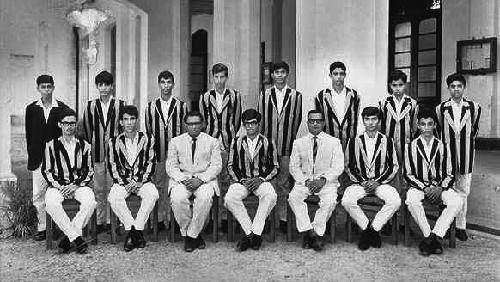
Dissanayake, Gethal Peiris, Rohan Wickremaratne
Seated: Roger Hesse, Ivan Van Dort, The Principal –Shelton Wirasinha, Amaresh Rajaratnam (Capt.), Edmund
Dissanayake(MIC), Delmer Achilles, Sridharan Jeganathan.
Absent: Reza Sinnen
He went on to Captain the Tamil Union Cricket Club in the P Sara Trophy, He also Captained The Mercantile Cricket team in the Robert Senanayake Trophy as well as Captaining Ceylon Tobacco in the Mercantile A Division leading them to victory in all competitions . These teams also included many Sri Lankan stars. He played for the Ceylon Board XI vs Hong Kong in which he opened the bowling with fellow Wesleyite Nihal Seneviratne. In those days Sri Lanka was not an International Test playing nation and Amaresh was invited to national trials on many occasions. Amaresh demonstrated excellent leadership qualities and he was made a Prefect in recognition of his talent. When asked who were his favourite teachers, they were Mrs. Enid Sivasubramaniam, Haig Karunaratne, Felix Premawardena, L C R Wijesinghe (who did a short stint in the late sixties), Miss Dulcie de Alwis and of course the Principal at the time Mr Shelton Wirasinha and Edmund Dissanayake, Master in charge of cricket and coach for a while. His fondest memories of his time at Wesley are many. Although it was not a very long stint at Wesley, he recalls three instances which as one would expect relate to cricket.
1. The first time he was picked to play in the 1st Eleven in the 3rd term versus Prince of Wales College, Moratuwa, Ray Jansz now living in Sydney (Tyrone' older brother) challenged him to prove his worth in the team. Amaresh ended Wesley Times November 2011 page 10/24 up taking 10 wickets, 5 in each innings and he was also the second highest scorer going in as last man .The performance sealed his place in the team and he never looked back.
2. The next memory is when Edmund Dissanayke took him to the Principal's office and Mr .Wirasinha announced that he was being appointed the Captaincy of the 1st Eleven for 1968. He accepted the honour with humility and though nervous at first he was elated at the honour of Captaining this great cricketing College and thinking how far he had come from playing cricket in the city of Kalutara. The current Sri Lankan Captain Tillekeratne Dilshan is also from Kalutara.
3. The third most memorable event is the win off the last ball in 1969 against Royal College at home to win the inaugural Frank Gunasekera Trophy. "I do not think that anyone in that team will ever forget the thriller of a game" said Amaresh. "I may not be wrong in saying that our team was not only the best but also one of the most popular teams among cricket fans that year" as he reflected on that memorable game.
It was a game played in great spirits by both teams and the winner being the game of cricket. He concluded quoting Grantland Rice's famous words "For when the One Great Scorer comes To mark against your name, He writes - not that you won or lost - But how you played the Game." Although it was a short stint at Wesley, due to his cricketing career he was popular with most students and had many friends, too many to mention. He was also a hero to many of the junior boys who would chant from the boundary "c'mon Amaresh bowl him out!". In those days friendships transcended all three streams, English, Sinhala and Tamil. Amaresh was in the Sinhala stream. "What a united bunch of boys we were in those glorious days when race meant no differences" says Amaresh. He still keeps in touch with Laksiri de Silva who is like a brother to him. Patrick Edema was another very good friend although he used to get him in to trouble with his pranks. There were two crazy but genuine friends named Kapila and Premasiri. Kapila would invite his friends to his house and treat them to afternoon tea. His prank was to lace the tea with a laxative as everyone scurried to use the toilet as he quietly watched the scramble amused by the turn of events. He also mentioned Gehan Gunasekera now living in Sydney who was his very first friend at Wesley. They shared the same double desk/bench in class. He is still amused when he reflects back to his wild romantic episodes where Hollywood could not have come up with such a script. "Ah!!! those schoolboy antics" says Amaresh. His journey after leaving Wesley has been interesting.
After completing his A – Levels he joined Ceylon Tobacco as an accounts clerk and then went onto become a Marketing rep. After some time he went to England and obtained a Diploma in Marketing from the Chartered Institute of Marketing, London. He then returned and worked at James Finlays in the Rentokil Division as a Senior Executive. He moved on and joined Richard Pieris and Co.(ARPICO) as the Marketing Manager (New Products) from where he migrated to Canada with his family. He is presently with L. S. Travel Retail North America as an Area Manager. When asked about any famous people he had met over his journey through life he modestly mentioned while in England he had met Sir Richard Attenborough a few times, the singers Cat Stevens and Leo Sayer. In Canada Amaresh works at the Toronto International airport and he has had the opportunity to meet many leading North American baseball, basketball and ice hockey players who are considered celebrities as well as actors in Hollywood. As a commentator at the Mayor's Trophy Cricket Festival for many years he has met some of the political identities in Canada. When asked who would he like to meet up with or contact from his school days at Wesley who he had not met for years, his initial response was " to meet all my cricketing buddies from school for one last hurrah",
Whilst this may be an impossible wish he would like to meet up with Tyrone Jansz his new ball bowling partner. He recalls with admiration his first game as Captain of Wesley in the third term versus a strong Zahira College team , It was Tyrone's first game , Zahira needed only 70 to win in ample time. "Tyrone opened the bowling with me and we crashed through their batting line up and Wesley won the game by 10 runs" . Tyrone made a stunning debut taking 8 wickets and that was the first time he states that he witnessed batsmen running out of harms way from a fast bowler. Glowing in his praise for Tyrone, he credits Tyrone's contribution as setting the tone for Wesley's ride to be the best schools team in 1969. However, he bettered Tyrone's performance in the first term game against an experienced Issipathana team with Wesley's best ever bowling performance of 9 wickets for 10 runs Including a hat-trick.. Humility was always one of Amaresh's attributes and he concluded by saying "I still reckon Tyrone bowled a much grittier and a more fearsome spell." I recall his feats as a cricketer and was a spectator at most of Wesley's games during Amaresh's career at Wesley.
I can still remember the nail biting finish to that great last ball win in 1969 against Royal and Amaresh's great team that year which was loaded with stars (refer article in this issue titled "the Double Blues and the Blue Gold and Blue"). He has been delightful and cooperative in giving of his time and sharing his experiences. The lad with the heavy black framed spectacles came to Wesley as he says – "a rural lad and left a well rounded and confident youth." and might I also add as a stellar schoolboy cricketer of his time. I wish to thank Amaresh for accepting the invitation to be featured in this issue and wish him well in his endeavours. Keith de Kretser,
Links to further reading
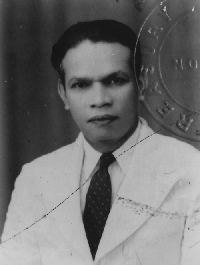
Allan Luther Melder joined Wesley from Kingswood College Kandy. He completed his secondary school education at Wesley after passing the Cambridge Senior Examination in 1925 with credit. He was then granted an exemption from the University of London Matriculation and went on to obtain his degree. At Wesley, Mr Melder was a ‘Rover’ scout and a senior cadet. At one stage he served on the board of governors at Wesley.
He joined the Colombo Industrial School as an assistant teacher and left as a deputy Head-Master in 1948 to join the Department of Prisons (Ceylon), as an Assistant Secretary. Mr Melder was subsequently appointed Secretary, Prisoners’ Welfare, and retired in 1973 due to ill health. He was jointly responsible for setting up the ‘open’ prisons in Ceylon and for commercial education and sports facilitation for categorised prisoners. He worked directly to the Chairman Senator Thomas Amarasuriya OBE, who was the last President of the Senate of Ceylon before this chamber was abolished.
Allan Luther Melder was a keen sportsman in his youth, and played volleyball regularly. He was the Master-in-charge for volleyball when a teacher at the Colombo Industrial School.
Luther Melder is the father of Aubrey and Eardley, both of whom attended Wesley College, and was married to Beatrice Mona (nee Juriansz).
Links to further reading
In the photo Mr. Melder is seated extreme left of table
GRANT HIM O LORD
ETERNAL PEACE
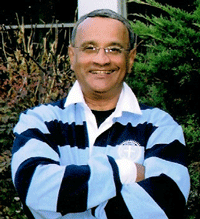
Diminutive in stature but a courageous front row forward (hooker) who played for the Salmon
Pink and Chocolate Brown team from Havelock Park. Now domiciled in Canada and proudly
sporting the rugby jersey of his "alma mater" is Cavan Gauder. Some of you may remember
him in the star studded Havelocks teams of the mid-sixties which featured the likes of Glen
Van Langenberg, Jeff and Dan Ratnam, Tyrone Holdenbottle, Royden de Silva, Gogi
Tillekeratne, Sunderalingam and the Savanghans to name a few. Cavan is hoping to visit
"down under" in the near future and is looking forward to meeting up with his friends
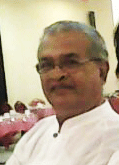 Sheriff was at Wesley College from 1950 to 1960. Joined Whitall Bousteads as a planter in 1964 and ended up as Senior Director Agriculture Development Authority under the late Mr. Ranjan Wijeratne (Minister of Plantations, Agriculture, Defense and Foreign Affairs. Accepted appointment in Sabah Malaysia 1982-1986. Migrated to Australia 1986. Now citizen of Australia and worked in Indonesia as Director Operations with the Forestry Division of Sinar Mas Group. Class mates include Daya Perera, Upali Perera, Rohan Wijesinghe, Lameer, Paul Modder to name a few. Vice Captain Rugby Team under Daya Perera and Captain Tennis Team. In college hostel from 1954-1958.
Sheriff was at Wesley College from 1950 to 1960. Joined Whitall Bousteads as a planter in 1964 and ended up as Senior Director Agriculture Development Authority under the late Mr. Ranjan Wijeratne (Minister of Plantations, Agriculture, Defense and Foreign Affairs. Accepted appointment in Sabah Malaysia 1982-1986. Migrated to Australia 1986. Now citizen of Australia and worked in Indonesia as Director Operations with the Forestry Division of Sinar Mas Group. Class mates include Daya Perera, Upali Perera, Rohan Wijesinghe, Lameer, Paul Modder to name a few. Vice Captain Rugby Team under Daya Perera and Captain Tennis Team. In college hostel from 1954-1958.
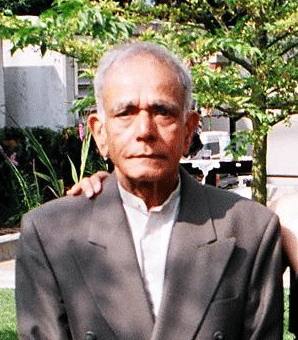 Mrs Ruth Hindle and her son Waldo joined Wesley College in 1949. My first encounter with the hostel Matron Mrs Ruth Hindle was when I joined the boarding in January 1952. The Matron was the Queen of the boarding and its dynamic driving force. She was an impressive fair skinned lady with a big heart. She lived in a room by the Junior Dorm with her son Waldo who was my age. For the couple, mother and son, a normal home and family life was impossible. She was in full time employment and had to remain strong-willed and independent as a single parent in the 1950's. In addition she had to care for dozens of children left in the boarding by their busy parents many of them living far far away.
Mrs Ruth Hindle and her son Waldo joined Wesley College in 1949. My first encounter with the hostel Matron Mrs Ruth Hindle was when I joined the boarding in January 1952. The Matron was the Queen of the boarding and its dynamic driving force. She was an impressive fair skinned lady with a big heart. She lived in a room by the Junior Dorm with her son Waldo who was my age. For the couple, mother and son, a normal home and family life was impossible. She was in full time employment and had to remain strong-willed and independent as a single parent in the 1950's. In addition she had to care for dozens of children left in the boarding by their busy parents many of them living far far away.
Waldo soon became my friend. He would smuggle me into his apartment and give me some food. There was no bigger treat to a hungry boarder in the midst of a famine of biblical proportions. We listened to the test commentaries from the BBC amidst the hiss and the crackle of an old Phillips radio with a green magic eye. He had to kick the beast to improve the reception. Waldo was called "BADA" for his rotund appearance. He was a gentle giant kind to his finger tips. He won numerous friends by his gentle ways and charming smile. Although he lived with his mum, Waldo joined the rest of the boys for sports and study. He was a fine leg spin bowler with the soft ball and a hard hitting batsman in the small park. He was a good table tennis player. Waldo was a fine exponent of the ever popular indoor game called Carrom. We had much laughs together and he was an amiable and generous person. Waldo often reminded me of Billy Bunter, the fictional rotund mischievous comic strip character of the 1950's created by Frank Richards. Every school needs a Waldo Hindle to lighten the proceedings and bring some life and heart to a pretty stiff environment. He did so with great finesse.
Waldo left Wesley College in 1955 to join Trinity College Kandy. He left Trinity in 1958 to work for E.L Senanayaka at Morankanda Estates near Kandy before emigrating to Canada in 1960 where he has spent most of his adult life. Waldo is 72 and lives in Calgary, Alberta, Canada. He lived in Ottawa, Ontario from 1965-96 teaching Geography and Earth Sciences in a High School. He retired from teaching in 1996 and moved to Calgary. He now works in PR for a retail company. He visits Sri Lanka from time to time. Waldo is super slim and trim and has lost his Billy Bunter look of his schooldays .
His cheeky grin and infectious laugh are precious memories for us all. He bestrode his difficult situation in the boarding, as the son of the Matron, with consummate ease. The keystone of his life at school was the warmth of his abiding friendliness.
On behalf of the brotherhood of Wesleyites I wish him well.
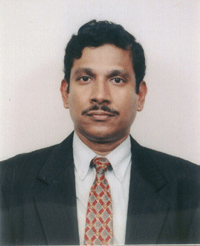
I consider it as a great honour one can achieve in his life as to be the Chief Guest of the Annual Prize Giving of his own Alma Mater. Therefore, I would like to pay my heartiest gratitude to the Principal and the organising committee of the Annual Prize Giving 2012 that has honoured me by inviting me as the Chief Guest, and also for the very informative introduction about myself by the Principal.
I am very happy to say that I can see some of my teachers still working for Wesley. Mr Bandula Welartane was my Mathematics Teacher and Mrs Shirani Edema was my Art Teacher.
As a person who walked on this stage many times as a prize winner at the annual Prize Giving’s held from 1969 to 1982 (except in 1971) indeed this is a memorable day for me. I am proud and happy to state anywhere in the world that I am a Wesleyite, as I had both primary and secondary education only at Wesley College from 1968 to 1981.
This evening I have been given a task by the principal to address you all for about 15 minutes but I decided not to talk anything on my specialisation, since it will be a boring experience for this celebrative audience. Therefore, I decided to provide you all some more additional details of myself but definitely not for boasting.
You may have noticed that I am having several educational and professional qualifications such as BSc (Kelaniya), PhD (Sheffield), CSci, CEng, CPhys, FIET, FInstP, and FIP(SL). Except the first two qualifications which I mentioned, all others are professional qualifications, and they were obtained using my BSc, PhD and my work experience but without doing any other exams or spending any money. However, to keep the memberships alive please note that one has to pay the annual membership subscriptions.
I am proud to state here that the foundation for all of these qualifications is the excellent primary and secondary education, experience and leadership training which I received from Wesley. BSc is my 1st degree and PhD is the one of the highest educational qualifications a person can earn. When you have a PhD, you can use the Title Dr in front of your name for your whole life.
At present I am working as a Professor in the Department of Physics at the University of Kelaniya. Having said all of these you may come to a conclusion that I should be an exceptional student produced by the Wesley with 10 A’s for NCGE and 4 A’s for A/L, which is absolutely wrong and I am sure that I am not that brilliant.
However, I can still remember very well that almost all of my class teachers wrote in the progress section of the end of the year report card that “You have a bright future”.
I had prizes from Grade 1 to 13 except for Grade 3, but secured only 4A’s, 5 B’s and a C for my NCGE in 1976, where I was awarded the Best Performance prize for NCGE. The entire achievement was due to the education I received from Wesley, but not due to any tuition masters since I had not been to any extra classes at all.
Full credit should go to all my teachers who taught me at Wesley, specially, my Mathematics teacher, Mr Bandula Welaratne, Grade 6 &7 Science Teacher Mr Justin De Silva (father of one of my good friends Mr Kumar de Silva, a well known figure in electronic media) and Grade 8 & 9 Science Teacher Mr Sunil Dias who took lot of extra classes to cover the very huge syllabus during weekends and also in vacations.
However, as you all know, once you have good results, the present trend is to change the school. But I decided to remain at Wesley and I think that it was one of the secrets behind my present achievements, if I have any.
In grade 10 we were in an interim state and we did HNC during that time. With the change of the government in 1977, HNC was reverted back to A/L. And then I did Chemistry, Mathematics, Mathematics (Mechanics), and Physics as my A/L subjects.
Even for the A/L I had not been to any tuition class except for Chemistry. We had a very good Chemistry teacher and he did lot of experimental work but less work on theory. Therefore, I was forced to go for tuition in Chemistry by myself. I always tried to follow and understand everything taught by teachers during the class and also finished almost all homework within the school time even-though I was very actively participated in extra-curricular activities.
Mr Abeykoon, our Physics teacher did a marvellous job to teach Light and Heat sections of the A/L Physics curricula and it took almost 1 ½ years, but I new that I was very sound in those sections and I was in a position to answer almost any question from these 2 sections. I think this was the foundation for my present position.
Then he started the Viscosity section. Although this happened in 1980, I can very well remember the incident which happened in the very 1st lecture on this section. It was a double period and Mr Abeykoon started teaching. He drew a diagram on the board and started explaining it. I listened to his explanation and realised that some thing was going wrong. I shouted loudly “Sir, it is wrong”.
You might expect a thundering slap in a similar situation. He turned to us and asked is that Kalingamudali. I said yes sir. He again tried to explain it but I said sir, still it is wrong. Although I said it is wrong, I did not know what was wrong there. Then he said you may be correct Kalingamudali and he admits that something is wrong there. He stopped teaching for that day and it was only 15-20 minutes after starting the class. Then again he started the same section next day, but at the same place I shouted, sir it is still wrong and same thing happened as the previous day. In the 3rd day without my intervention he continued that section. After few weeks unfortunately he was offered a very good job in a foreign country and he was forced to resign from Wesley. Then we were assigned to another teacher and he taught some sections from sound. This was all we covered for the subject of Physics and I had some knowledge in Current Electricity. Believe it or not, I knew equations V=IR and W=VI, and how to use them in circuits even when I was in Grade 2. I think I got to know these from my father.
With this knowledge I sat for the A/L exam in 1980 and I obtained 3 C’s and 1 S (which is for Chemistry), and had an aggregate of 202 which was not enough even to go near to a University gate. At that time minimum aggregate needed for Physical Science was around 220.
For some reason I thought that I need a degree. Therefore, virtually without doing anything I sat the second time in 1981 and ended up with 2 C’s and 2 S, and had an aggregate of 201.
I was a College Prefect and an active member of all societies which were there at that time and held positions from Founder President to Assistant Secretary. In addition, I was in-charge of operating the old valve type public address system for many years. From 1977, I was one of the official photographers of the college, and covered all the college functions. Therefore, almost all students knew who Kalinga is, even those who were in lower grades when I was in A/L classes.
All my classmates are doing well and if I name few of the well-known figures: Mr Hemantha Perera, Teacher at Wesley, Captain Navin De Silva, Director Flight Operations in Sri Lankan Airlines, Mr Kamal Addaraarachchi, Mr Fazal Kamaldeen, Lord of Loddington and Honorary Consul for Guinea-Bissau, Brigadier Dhammika Kariyawasam, and late Lieutenent Colonol Sumith Perera.
However, I did not give up my main idea of obtaining a degree. With the pressure of my friends and having being to some revision classes I sat for the A/L for 3rd time and obtained again 2 C’s and 2 S, and had an aggregate of 191 only. So finally I gave up my university dream and started to look for a job.
In January 1984, I received a letter from UGC stating that there are some un-filled vacancies at the University of Kelaniya, and if I wish I can join for the Physical Science programme before the deadline. So to fill the vacancies I registered at the University of Kelaniya, and later I realised that I had the lowest aggregate from my batch.
Since I knew that Mr Abeykoon was in Sri Lanka for vacation, and I went to meet him to pass the good news as well as to get an advice to select subjects. He was so thrilled about the good news. He told that best subjects are Chemistry, Mathematics, and Physics which was called Royal Combination in the university system.
Then his mood changed and he said I need to advice you on another matter. I asked what it is. He mentioned about the incident which happened almost 4 years ago. I was so surprised. It was the incident that happened when he started the Viscosity section. He advised not to do similar things at the University, explaining the reasons as well.
In the University, since my main intention was to obtain just a degree, I did not work hard. For the 1st year final exam I studied only for one week and obtained 3 C’s, and in with the same effort I obtained 3 B’s for the 2nd year. However, I was selected to follow both Chemistry and Physics (Special) degree programmes. I loved electronics and was able to assemble a complete radio using discrete components when I was in Grade 8. Therefore, I chose Physics (Special) degree programme. I was fortunate enough to secure a 1st Class honours in Physics (Special) Degree programme. Thanks to the free education system privileged by the Sri Lankans which paved the way for me to earn my BSc without spending a cent from my pocket. After 4 months’ time I was recruited to the Department of Physics as an Assistant Lecturer which I never thought would be my carrier.
Although, in many occasions I was one of the reserve players in Under 15 & 17 College Hockey team, I played Hockey in the University and was awarded University colours for Hockey in 2 consecutive years.
Also, I earned my PhD from the University of Sheffield through one of the best Electronic Engineering Departments in the whole world, with funds received from the United Kingdom through a Commonwealth scholarship, without spending a cent from Sri Lankan money. When I was in my A/L classes, I had some idea of becoming an Electronic Engineer, but with the aggregate of 200 marks for A/L this was just a dream. But, although I did not have any luck in going to an Engineering Department in Sri Lanka, I was fortunate to earn my PhD from the area of Electronic Engineering and as I said at the beginning, now I am a qualified Chartered Engineer.
I was also awarded prestigious Fulbright fellowships in year 2002 and 2010 to spend my sabbatical leave in USA. Also, in the university system, academically I achieved almost all. Administratively, I served as the Head of Department for more than 6 years, and there are only 2 more top positions to achieve with any luck.
In the modern world, in addition to academic achievements, leadership qualities and presentations skills play a major role. Therefore, I believe that the best place to learn and improve leadership qualities and presentations skills is the school and I am again proud to say that foundation for my success is due to Wesley College.
The main intention of sharing my past experience were to convince both parents and students that A/L is not the only hope but there are so many other avenues to achieve your targets and goals. In addition, when you do something do it with great enthusiasm, good understanding and correct manner. It definitely helps you to achieve your targets and goals.
Once again I thank you all for inviting me as the Chief Guest of the Annual Prize Giving, and wish you all a good day and a wonderful future ahead for all these brilliant young Wesleyites.
“Ora et Labora”
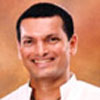 Kumar de Silva is a Colombo-based Public Relations and Media Consultant. A former newspaper journalist, he had his training in television production and presentation in Paris.
Kumar de Silva is a Colombo-based Public Relations and Media Consultant. A former newspaper journalist, he had his training in television production and presentation in Paris.
An award-winning television personality, he is multi-lingual, and equally at ease in both French and English. Audio Visual Officer at the Embassy of France in Colombo for many years, he now runs his own Public Relations and Media Consultancy Company - ‘Adahas’ - with his spouse and business partner Tharindra de Silva.
He is also one of the founder members of the Alliance Francaise de Kotte and a Trustee of the Lester James Peries and Sumita Peries Foundation.
A sought after and versatile compere, and, a keen photographer, he is also a lover of movies and classical music. He lists dabbling in Tarot, growing cacti, writing poetry and observing ‘human behavioural patterns’ as his hobbies.
Photography
I’ve been greatly influenced by the work of the great French photographers Henri Cartier-Bresson and Robert Doisneau. I have nothing against colour photographs BUT I do find black and white photographs far more exhilarating and exciting. You literally get to explore the minutely different and contrasting zillion layers of grey juxtaposed in between the blacks and the whites. I love the tangible textures and the feel of the grays !!!
I was actually collecting and working on a portfolio of images for my personal kick ONLY. I never ever thought of myself as a photographer. But then it dawned on me that January 2011 is a significant one in my life. It is exactly 25 years since I joined the Embassy of France in Sri Lanka, 25 years since I began hosting Bonsoir (March 1986) and 25 years since I first set foot in Paris. It is indeed a triple celebration of the incurable francophone and incurable Francophile in me. The feeling and nostalgia is personified in this exhibition which I shared with the public.
France has kind of been my spiritual home in a sense, ever since the first day I set foot there 25 years ago. I do speak the language and, along the years, that has enabled me to plunge first-hand into its culture without the help of translators and translations. It must be some remote karmic force that made this bond really happen. I love the French verb ‘flaner’. It literally means ‘to stroll, wander around’ and that’s what I love doing in Paris particularly …. with my camera in hand …exploring little known churches and chapels, cobblestone streets and village squares, rustic inns and wayside cafes … indulging off the beaten track … o la la indeed
Poetry
My first exposure to poetry was at school, at Wesley College Colombo… a discovery which both enthralled me and transported me to different realms.
As I graduated to the higher grades, the pleasures of simple rhymes gave way to free verse with its immense potential.
My four years as an undergraduate at the University of Kelaniya further widened horizons and plunged me into the absorbing world of English literature. That journey was most memorable !
Now in retrospect, I find that T.S Eliot has had a marked influence on whatever I wrote. “Rhapsody on a Windy Night’ and ‘Preludes’ rank high in my list of favourites.
No I dare not reproduce those early attempts, but the ones you see here and “readable” in my opinion…
I was in my very early twenties.
He died on an April 12th morning.
Shop were closing for the New Year.
The Nonagathe was setting in.
The cremation was at (Borella) Kanatte on 13 April at 6.30 pm
My aunts (his sisters) from Ambalangoda were to attend the funeral.
They all came, despite public transport petering out
and rushed back to their homes the same night.
celebrating the Sinhala and Tamil New Year,
dressed in auspicious red,
crackers bursting in the hot April morning’s sun,
and the koha shrieking.........,
dressed in white,
I was were at the crematorium
collecting his ashes in a small earthern ware pot
- the burnt bits of bone
mixed with charred wood and mangled wire from the wreaths.
At a rocky outcrop, where as a child he dived into the sea he loved so much,
(said my oldest aunt),
at that same spot, we threw his ashes into the water
together with handfuls of jasmines.
They twirled and eddied and vanished into the ocean.
Ten Sinhala & Tamil New Years later
on April 14th 1997
Rahul, my elder child is born.
He came as the first light streaked the sky,
and the New Year dawned.
He arrived to the bursting of crackers,
and the pealing of temple bells.
Friends and relatives came with sweetmeats.
We rejoiced. We celebrated.
We cremated with my father a decade ago.
It lives in me, and a decade later,
was bequeathed on Rahul.
We are all visitors in Samsara.
We just log in and log out under various names and in various guises.
The aathmer (soul / spirit / consciousness) lives on.
(April 1987 and April 1997)
Television
Kumar de Silva began his television career in 1986 with ‘Bonsoir’, a weekly French cultural television magazine which was a hit during its time. This, in turn, brought him several opportunities on the small screen – from news reading, hosting talk shows and business programmes … to presenting pop music programmes and hosting Buddhist Dhamma discussion programmes. It’s literally been a quarter century ‘love affair’ with the television cameras.
An earlier generation will probably best remember him as the multi-lingual host on ‘Bonsoir’ and the pop music television deejay on ‘Fanclub’. More recently was his ‘indulgence’ on Prime TV’s “Celebrity Chat”, a popular weekly talk show with Sri Lankan celebrities.
Kindly sent to me by Peter Peiris
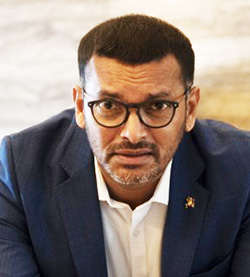 Personality Development and Corporate Etiquette Trainer, as well as Public Relations and Media Consultant, Kumar de Silva has certainly enjoyed a most eventful career journey over the past four decades. Having worked and interacted in different capacities with countless individuals from diverse organisations and backgrounds in Sri Lanka’s multi-layered and multi-disciplined corporate sector, Kumar has built a solid reputation for himself as one of the most sought-after trainers/consultants in Personality Development and Corporate Etiquette in Sri Lanka.
Personality Development and Corporate Etiquette Trainer, as well as Public Relations and Media Consultant, Kumar de Silva has certainly enjoyed a most eventful career journey over the past four decades. Having worked and interacted in different capacities with countless individuals from diverse organisations and backgrounds in Sri Lanka’s multi-layered and multi-disciplined corporate sector, Kumar has built a solid reputation for himself as one of the most sought-after trainers/consultants in Personality Development and Corporate Etiquette in Sri Lanka.
He has also been the Official Corporate Etiquette Trainer for Mr. Sri Lanka, Mrs. Sri Lanka, Miss World Sri Lanka, Miss Universe Sri Lanka, Miss Intercontinental Sri Lanka and Mr. Sri Lanka for Manhunt International. Having received his training in Paris, multi-lingual Kumar is an award-winning television personality, and author of best sellers such as biographies of the late esteemed film maker, Dr. Lester James Peiries and the matriarch of the Sinhala cinema, Iranganie Serasinghe, in addition to his own story ‘Bonsoir Diaries’. In October 2012, the title of ‘Chevalier dans l’Ordre des Arts des Lettres’ (Chevalier in the Order of Arts and Letters) was conferred upon Kumar by the Government of France in recognition of his efforts to promote the French culture and language in Sri Lanka.
Kumar is also known for his recent celebrity talk shows on www.pulse.lk – ‘Anything But with Kumar de Silva’ and the ‘Lockdown Diaries.’ He currently hosts ‘Aperitifs with Kumar’ also on Pulse. Describing his career journey in his own words, Kumar explained, “My journey has been unconventional in the traditional sense. Born to two trained teachers (in Mathematics and Science) I chose neither, but instead did English, French, German and Economics for my A/Ls. This was in 1977 and JR Jayewardene had swept into power. The economy had opened. Tourism was on an upward trajectory and there I was wanting to be a tour guide.”
“It was crazy learning French and German parallelly at the same time. I was learning the same things in two totally alien languages and mixing them all up. That was nightmarish too at times. In the one-year gap immediately after my A/Ls and before entering the Department of English at the University of Kelaniya, I joined the Daily News where I sharpened my writing skills. That experience was invaluable and has come in good stead even to this day.” Four years later, armed with an Honours Degree in English and French, he lectured briefly at the UOK, and then joined the Embassy of France as its de-facto Audio Visual Officer. This opened the world of television to him, primarily with ITN and ‘Bonsoir’. Then came ‘Fanclub’, news reading, anchoring talk shows, Dhamma discussions, live coverages etc.
“‘Kumar de Silva Training’ is something I began six or seven years ago, and strangely that’s what I find most absorbing and what I’m terribly passionate about.”
“I always had a very inquiring mind and asked questions all the time. I had great ambition too, laced with a good dose of narcissism and that remains the same even to this day”, said Kumar, speaking of what made him different in order to bring him to his current standing.
When questioned about the secret to maintaining such a versatile career, Kumar responded, “Career-wise I think I was lucky to get jobs that I was passionate about. They were not mundane and dreary chores. From lecturing to journalism, from PR to training, my heart was literally inside all of them and I think THAT made the difference. Even when I switched from one to the other, it was from one passion to the other. So, Karma has been good to me.”
On the topic of his main focal points in terms of Personality Development and Corporate Etiquette training, Kumar stated, “My main drive is empowering the individual from within. Participants at my sessions are (at different levels) educated, qualified and experienced. That’s one leg they stand on. As they go on in the corporate journey through life, they will be more educated (job-wise), more qualified and more experienced.
The other leg they stand on is their Personal Branding. This is what I work on and what I call the ‘wrapping paper’. We are quick to judge others based on our perception of what we think they are. Hence, the importance of personal branding. What I do in terms of training is far too much to list out here. But you can check it all on my website – www.kumardesilva.com”
Voicing his opinion on the vitality of soft skills and their growing importance, “The vitality of soft skills keeps evolving all the time, as does their importance in this crazy, high-speed world we live in. Soft skills actually harmoniously complement our core and makes the package called the ‘corporate individual’ a very amenable and pleasing product, and hence, a marketable product too”, opined Kumar
Elaborating on the makings of a skilled and influential writer, he said, “To me and in the books that I’ve written it is: The effective use of language as a paintbrush to create imagery on pages of the book, which to me constitute a canvas. Ideally concise, short and non-verbose sentences to keep the reader engaged. Long winding sentences are a total turn off to me. I also pay great importance to spellings and grammar.”
Links to further reading
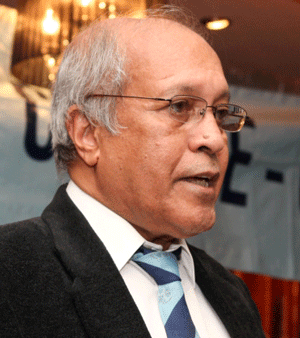 Irwin Douglas Raymond first came into prominence when he got a 1st Division in the Senior School Certificate examination in 1957. He gained many distinctions winning the coveted Gogerly Scholarship that year. From then on he became an iconic figure at school for his brilliance in mathematics. He was made a Prefect in 1958.
Irwin Douglas Raymond first came into prominence when he got a 1st Division in the Senior School Certificate examination in 1957. He gained many distinctions winning the coveted Gogerly Scholarship that year. From then on he became an iconic figure at school for his brilliance in mathematics. He was made a Prefect in 1958.
I came to know Doug when my parents moved to Kolonnawa in 1958. Doug lived in with his mother , sister and brother, just a short walk away from me. I was preparing for my GCE examination and needed some coaching in Physics and Mathematics. Douglas Raymond’s excellence in the subject became so well known that he gave tuition to help students struggling with maths. He most kindly accepted me as one of his first students. I remember the classes held at his home. We went through many years of past question papers . That was one to one coaching. He had a remarkable ability to teach and simplify ‘complex’ routines. Doug could look at a problem and see simplicity where nobody else could find it. He was ever willing to share his knowledge and wisdom.
I learnt much more from Doug than from school when the teaching of maths and physics was well below par. The finger was pointed at a teacher who was in charge of a particular sport. He discussed sports strategy in the classroom and did not teach us the subject. This was our important GCE year. I was in that class and can vouch for the accuracy of those adverse comments. Doug's help gave me a good grounding in mathematics. It became invaluable for the University entrance examination and my dream of a career in Medicine. While still a student Doug remained a fine tutor in Maths and Physics. To many students he was a modest, kindly and an unassuming mentor. He caused a resurgence and an enhanced interest in the subjects at Wesley, which was so crucial for the sciences. Doug improved the future prospects of numerous students of my era by his willingness to teach and impart his knowledge. There are many who benefited from his wisdom and went on to become useful citizens of this world. The name that comes to mind easily is that of Dr Lambert Abeytunge who stayed with Doug before entering the Medical College. He is now a Plastic Surgeon in California, USA
I recall with much nostalgia a party that Doug arranged for his classmate Shanthi Perera, at his home. Shanthi was the Senior Prefect in 1959 and had just been offered a scholarship to train as a pilot for the Royal Ceylon Airforce at Cranwell in the UK. He invited mutual friends and I was called too. We were all in our teenage years and drinking was taboo for school kids in those days. There was plenty of Lanka Lime, Schweppes and Orange Barley. Doug's mum had made some delicious patties and cutlets. The highlight of that evening was the piano accordian playing of Shanthi Perera. He was a talented entertainer. I remember everyone singing Tony Brent's "The clouds will soon roll by" with great enthusiasm.Those were happy days. Sadly Shanthi died of an air accident in England just prior to finishing his 2 years of training.
Doug won the Hill Medal in 1959 and went on to study Engineering at the University of Peradeniya. After a highly successful University career he joined the Port Commission where he remained for 10 years. He was sent to the UK on a Scholarship for his Masters Degree at Imperial College London. On his return to Sri Lanka he worked for a further 3 years and left the Island to take up a job with an Engineering Company in the off shore petroleum industry in the UK. Since then he has held many important and responsible posts in several Companies working in the industry as Project Manager and also as a Consultant. He still remains a valued Consultant and Manager for the Off Shore Companies.
Doug is a very balanced character, generous and calm. He is proud and fond of Wesley and has always remained a die hard and true Blue Wesleyite. He was a founder member of the OBU-UK. He helped enormously to rally the troops and establish the organisation. Doug became its first President and started the ever popular Double Blue Ball to collect money for our Alma Mater. He will be always remembered by past Wesleyites in the UK for his loyalty, honesty and integrity during his tenure as President. To the worldwide brotherhood of Wesleyites he will remain a distinguished scholar, gifted mathematician and one of the best the school has produced.
Links to further reading
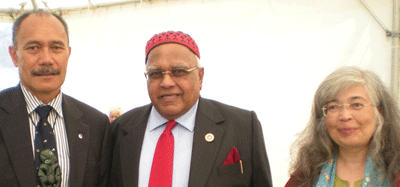
I am attaching a group photograph myself Mohamed Iqbal and my Dearest Daughter Zanhuba Iqbal with His Excellency The Governor General of New Zealand, Lieutenant General Sir Jeremiah [Jerry] Mateparae, GNZM. QSO. KstJ.
Both Zanhuba and I were by special invitation from Mr. RPK [Pita} Paraone, The Chairman of The Waitangi Trust to celebrate New Zealand and Waitangi Day last Tuesday the 5th of February for a Reception by H.E The Governor General of New Zealand for the Waitangi Day .
This was also an very special opportunity to celebrate over 44 years of my living in New Zealand and devoting over half of my life to Aotearoa New Zeaalnd.
Wasallaams!! Mohammed Iqbal.
Classmates at Wesley from 1940 to 1955. Any Errors and Omissions please excuse!!
Bryan Claessen [decd], Abu Fuar, [decd], Arthlow Chapman, Trevor Vincent Ebert, Neil Gallaher, Denzil Perera,[decd], ?? Wickramarachi, V.K. Perera, George Mahendran [decd], Ron Altendorf [decd], Desmond Melder, Hakeem Ismail, Ifthi Ismail, M.N.Ismail, Edward Buell, George Muthuvaloe [decd], Dr.Derrick de Silva, R.M.de Silva[decd], Ranjith de Silva, J.B.W. Karunatilleke [decd], M.D.W Goonetillake, Shuhayb Ghouze, M.Kamil, M. Mohideen, T.M. Samahone,[decd], S. Jayakhanthan, T.Nagendran, Rex Dharmarajah[decd], David Shockman [decd], Chico Spelderwind, David Mack, Dr.S.C Chang [decd], Christopher Stork [decd], Robert L. Brohier, ??De Alwis, Jaffar Ismail, Shuhayb Ghouze, Lou Adihetty [decd], Vinci Adihetty [decd], Ian de Silva, Kenneth de Silva, Cecil Fernando [decd], M.F.Dawood, Nizar Ahamed [decd] ,Derrick Jurianz (deceased), Nihal Wijetunga, Kauhtil Zavahir, D.V.R Rajapakse[decd], Naim Juranpathy, Tissa Amarasingha, Nihal Wijetunga, M.A.P. Fernando, Rajah Sinnaduray, ??Ramachandra {twins}, D.V.R Rajapakse[decd], Two Blind students (Cornelius and William) who joined the Class for the SSC Examination, M.Z.Lameer, Rasheed Dole, Neville Mottau, ??Aziz, N.A.B.Fernando (dcs), Brian Peiris, Shanthi Amarasingha, Darly Wickremesinghe, Kirubai Dwight, Milroy Campbell, O.K. Dayaratne, Dr. U .F Abeysekera
The Life and Times of Mohamed Iqbal.
Iqbal was born in Colombo Sri Lanka on the 5th day of September 1935 to the parents Mohamed Zainudeen Mohamed Niyaz and Mahooma the eldest daughter of Proctor Nagoor Meera Mohamed Haniffa.He is the second of seven children (6 boys and 1 girl). When Iqbal was 5 years old family circumstances meant he gained his stepfather Mohamed Abdul Razak. While a young child, Iqbal had opportunities to meeting people of many different nationalities and religions, both within his homeland and overseas. Through the opportunities presented by his parents Iqbal encountered and therefore became appreciative of many cultures and thoughts including religions.
Iqbal's schooling was at Wesley College (1940–1955). There was a sense of great brotherhood there and Iqbal has kept in contact with both his teachers and past classmates.
Iqbal also has a great love of family. Iqbal has a large extended family now bordering on two thousand in number. Within the family the members are quite diverse. Their socio economic status, religious thought - liberal/orthodox vary very much. The common thread of family though unites them all. Family bonding is strong even with the diversity, and so from a young age lessons of deeply respecting all people were drawn and extended to the human family. This makes Iqbal very approachable to others. Iqbal still continues to have close friends from various backgrounds to give total support to human rights and community issues.
Iqbal's parent’s fervent desire was for him to study of Law and sent him to England to study to become a Barrister (1955- 1958) with the United Kingdom Council of Legal Education. In line with that he became a member of the Honourable Society of Lincoln Inn in London. Iqbal married Jean Irene Stanton on the 26th April 1960 in London who was the only daughter of William and Irene Stanton of England. Their daughter Zanhuba [known as Zan] was born in London on the 3rd of September 1962.
Iqbal’s first employment was at Crown Agents for Overseas Governments and Administrations in London (1959 – 1965). Living in England also gave opportunities for Iqbal and his Dear wife Jean to learn of and work towards transcending numerous religious and racial barriers. In April 1965 Iqbal with his wife and their young daughter migrated to Sri Lanka. Iqbal and Jean's son Razak [known as Zak] was born on the 8th of November 1965 in Colombo. Iqbal became the first Private Secretary to the Honorable Minister of Labour, Employment and Housing. (1965–1967). Later Iqbal became the Deputy Personnel Manager at Shaw Wallace & Lee Hedges Ltd (1967-1969) one of the large Tea Export Organization in Colombo.
In 1967 Iqbal completed a Diploma in Personnel Management.
In August 1968 the family migrated to Auckland, New Zealand with Iqbal joining them in May 1969. In a new country Iqbal his wife and two children started from humble beginnings and experienced the warmth and generosity of the New Zealanders. Iqbal worked as a Legal Officer for the New Zealand Government’s State Advances Corporation (1969-1970). In 1970 opportunity came for Iqbal to represent his Motherland Sri Lanka in New Zealand. Iqbal was employed by the Government of Sri Lanka Ceylon Tea Board as their Commissioner to New Zealand.
His position as Commissioner later extended to cover the whole of Australia and Fiji.. In April 1982 Iqbal became the First Honorary Consul for Sri Lanka to New Zealand. Upon retirement in 1990 Iqbal was appointed as the Honorary Tea Commissioner for Sri Lanka in New Zealand which position he resigned for personal reasons on the 30th June 2012. His work on Tea with the Sri Lanka Tea Board was for over 42 long years.
Honorary Positions:
1972 – To date The Representative and Councillor in New Zealand for the World Muslim Congress. Iqbal in 2012 completed 41 years in representing the World Muslim Congress in New Zealand.
Other Activities:
- Former member of both the Howick and Middlemore Lions Clubs.
- Former member of the Masonic Lodge of Pakuranga, the Howick Club Inc.
- Headed various services to the communities including the Sri Lankans in New Zealand.
- He has organized and assisted in the visits to New Zealand of Overseas Head of States, Prime Ministers, Cabinet Ministers and Members of Parliament and Member of Diplomatic Corps and all Religions Dignitaries.
- Iqbal also assisted the tours of Sri Lanka Cricket to both New Zealand and Australia.
- Currently member of various associations and institutions in New Zealand and in Sri Lanka and the World Conference of Religion & Peace [Auckland Chapter].
Recipient of Special Honours and Awards:
On the 14th of October 2009, Iqbal was awarded a Special Honour and Life Membership by Auckland Indians for his outstanding help and services for over the past 20 years to the New Zealand Indian Community. This special ceremony was held at the Mahatma Gandhi Centre at Auckland.
On 26th of December 2009, Iqbal conferred the Very Special Honour for his outstanding contribution in promoting Integral Human Relationship and awarded the Gold Medal from the Dr. Manamabrata Foundation & Solidarity at the University of Dhaka in Bangladesh. This was a very special Honour and the Gold Medal awarded by the University of Dhaka in Dhaka, Bangladesh.
Both Iqbal and Jean celebrated their “Golden Wedding” anniversary in Auckland on the 26th of April 2009.
He has represented and attended numerous International Conferences, Meetings and Religious Foundations in Europe, Middle East, South and East Asia and Oceania.
He completed 42 years of dedicated service on the 1st of August in 2011 for the Sri Lanka Tea Board in promoting their world finest “Ceylon Tea” in the Oceania region.
During the past four years, Iqbal attended various Conferences, Conventions and meetings including the Admiral Cheng-ho Foundation in Kuala Lumpur, Mallaca, Kelantan, Penang in Malaysia, Singapore, Indonesia, China Beijing, Xining in the State of Quinghai and Hong Kong. He is also involved with the Muslims in China and the export development of Hal’al produce from New Zealand.
In June 2012 Iqbal for very personal reasons tendered his resignation as the Honorary Tea Commissioner which was duly accepted as at the 30th June 2012.
The extract of the relevant Board Minute is appended below:-
"RESIGNATION FROM POST OF HONORARY TEA COMMISSIONER FOR SRI LANKA IN NEWZEALAND
The Board placed on record its appreciation for the services rendered by Mr. Muhammad Iqbal in promoting Ceylon Tea for more than 42 years. Whilst accepting his resignation, the Board noted with gratitude that during his period of service as Honorary Tea Commissioner for Sri Lanka in New Zealand, he has used his own personal resources without burdening the Sri Lanka Tea Board. It was unanimously decided to convey the sentiments of the Board to Mr. Iqbal and the Director Promotion was instructed to follow up."
In November 2012, Iqbal was duly accepted to the membership of the ASEAN NEW ZEALAND Combined Business Council. Having promoted Ceylon Tea in the Oceania and the Pacific regions for 42 long years until the 30th of June year, Iqbal was been made aware that by the end of this Century the Muslims will exceed 50% of the world population. I have therefore in the remaining few years of my active life and living decided to promote Hal'al produce of New Zealand origin to the neighbouring countries. I do hope that with your support, help and assistance I will be able to easily undertake my mission in promoting the Hal'al produce to the Muslims.
In December 2012 Iqbal was duly invited to be an Associate Member of the prestigious Willows Cricket Club in New Zealand, which Iqbal readily accepted.
On the 5th of February Mr. RPK [Pita} Paraone, The Chairman of The Waitangi Trust invited Iqbal and his Dear Daughter Zanhuba to celebrate New Zealand and Waitangi Day at a Reception by H.E The Governor General of New Zealand at Waitangi. This was also an very special opportunity to celebrate over 44 years of my living in New Zealand and devoting over half of my life to Aotearoa New Zealand.
On the 6th of February 2013 Iqbal was invited [on his Late Dearly Beloved and Revered Mother’s 11th Death Anniversary] to be a Honorary Member of the Shri Shirdi Saibaba Sansthan of New Zealand Inc. Being a very special day Iqbal also accepted honour with the deepest respect.
Mohamed Iqbal, No. 16, Cosy Place, HOWICK, Auckland 2014, New Zealand.
Sunday 17th February 2013.
Greetings of Peace,
Most Dearly Respected Brothers Doctor Nihal and Ranjit,
I do express my VERY BIG THANK YOU for all of your kindly actions in posting my personal information in our highly esteemed College's Website for the information of all of our fellow Wesleyites.
Yes!! I have now safely reached the age of 77 years and 6 months and commencing to feel the general weakness in my body and the slowing down of the general systems!!
Needless to mention that I am ever thankful to our God Almighty for what I am today and to kindly help me to peacefully reach my death in this universe.
Blessings!!
Iqbal.
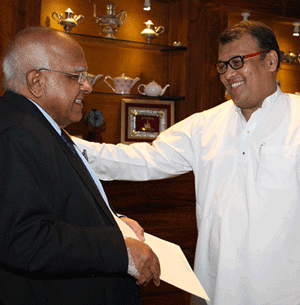
This is a copy of the letter presented to me yesterday the 12th June at 6.00 p.m by the Hon'ble The Minister on behalf of Government of Sri Lanka at the main auditorium of the Sri Lanka Tea Board.
It was a very formal ceremony with only my two younger Brothers present other than the Government Official.
Blessings!!
Iqbal.
From the Editor:
Mohamed Iqbal at the age of 76 has not been in the best of health recently. He made a trip to Sri Lanka in June 2013 which he calls his final visit to the country of his birth. I hope very much he was able to visit the school he loves and also meet his friends from his years at Wesley as a student. We wish him good health in the years to come.
Links to further reading
By Dr Nihal D Amerasekera
Ranjit was a lanky, bouncy and smiley boarder at Wesley in the 1950’s. He is one of the most charismatic and humorous persons to walk the long corridors of the school. As I recall he walked with a slight limp but that didn’t deter him from playing sports and being involved in all the activities within and outside the laws of the school. Blessed with a wide schoolboy grin and a spark of mischief he was the author of a myriad of tricks and pranks. As a story-teller he was hysterically funny. He was a skillful basket ball player making use of his height to his advantage.
In the photo he has the expression of a wily local astrologer in Ariya-Sinhala cape ready to unfold your future. Every school needs a Ranjit Fernando to bring some joy and happiness. He believed laughter is the best medicine for the harsh environment of education in the 1950's. We are grateful for his contribution to the life of the school.
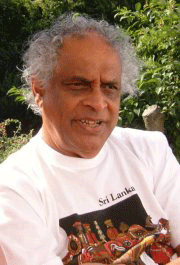 Ranjit was a singer. Where ever he was, one could hear his voice humming or singing the tunes of the day or hymns from the choir practices. He was a tenor in Mr Maxwell De Alwis’ successful School Choir which went on to perform Operettas Robin Hood and Aladd-In and Out to packed houses and rave reviews both in Colombo and Kandy.
Ranjit was a singer. Where ever he was, one could hear his voice humming or singing the tunes of the day or hymns from the choir practices. He was a tenor in Mr Maxwell De Alwis’ successful School Choir which went on to perform Operettas Robin Hood and Aladd-In and Out to packed houses and rave reviews both in Colombo and Kandy.
Both his elder brothers NAB and BGR were stalwarts of the establishment and were appointed Prefects. Ranjit had no such aspirations or ambitions. Little inclined towards academic pursuits, he was considerably more enthusiastic about music and the incipient bohemian lifestyle. In the boarding he played with us, laughed with us, and fought with us. When he left there was a void that was never filled. He fumed and complained about the hostel food, the strict regimentation and the harshness of punishments like the rest of us but we all loved the boarding too. The atmosphere was tense at times. If the 'swish' of the cane didn't the cold water from the freezing showers in the bathroom would have cooled us down. The Mount Mary girls walking down Karlsruhe Gardens calmed our nerves and our raging hormones.
Even now great nostalgia permeates our thoughts although life was pretty basic in the boarding. Dahl, Pol Sambol and Rice must have helped our digestion but we remained hungry, always. Wijemanne's Tuck Shop was our oasis. As we were all in it together the camaraderie and the friendships in the boarding made up for it and more. The cricket and football in the Small Park helped in the bonding. The boarding was our home away from home. When the time came for us to leave the institution many of us did shed a tear. Now we look back at our hostel days with much affection. The skills we learnt in that closed, controlled environment must have helped us in our later lives. Ranjit was a man-machine who never sat still. Above all those boarders will remember his boyish enthusiasm and inherent modesty.
He left Wesley College in 1957 with the GCE. His real interest and gift was in Engineering. He worked for Motor Companies in Colombo, Great Britain and Denmark. After obtaining qualifications from the highly regarded City & Guilds (UK) Ranjit became an Associate Member of the Institute of Motor Industry (AMIMI) and a Member of the Society of Automotive Engineers (MSAE). Thus he was a much respected member of the Engineering community. In his work he became proficient in Danish and several other Scandinavian languages with a working knowledge of Japanese due to his association with Nissan. There were many like Ranjit at school. What was taught and tested was not relevant to what we wanted to do in life. The required knowledge, skill and expertise developed much later. Thankfully we received a good all round education which has stood the test of time.
Ranjit has lived in Denmark for over 50 years with his Danish wife and 4 children. He feels immense pride and pleasure in his family.
Since retirement he has worked at a Radio Station for Senior Citizens. He continues his love of singing with a Choir travelling and performing in the Baltics, England and Germany. Ranjit belong to the Odd Fellow Lodge in Denmark which also has contact to whole of Scandinavia.
Ranjit lives a comfortable life in his retirement. Like everyone of our vintage he has a few health issues. In his own words “I have been in and out for treatment and now I think everything is in place for the next innings”!
He is immensely – and rightly – proud of his Wesley connection and has kept in touch with many friends. He speaks warmly of those happy carefree days. Ranjit was to attend the Great School Reunion of September 2012 in Colombo but had to cancel his arrangements due to ill health. The Brotherhood of Wesleyites Worldwide wish Ranjit and his family a long and happy life in Denmark.
Ah!! those were the halcyon days of BryL.C.Reem and Rock and Roll..
Links to further reading
GRANT HIM O LORD
ETERNAL PEACE
By Marisa de Silva
Back in the day, I used to take my training very seriously. I would be on a strict diet of raw vegetables and became a fitness addict, doing plenty of road work and jogging on soft sand, which was very tough. In addition to all this, and my training at the YMCA, I would regularly swim up to 1 ½ lengths underwater to improve my lung power. I would punish myself just so I could go that extra mile. That’s how I was able to fight in both the Pin and Fly weight categories,” reminisced unbeaten boxer, adventurer, entrepreneur and freelance writer - Sharm De Alwis.
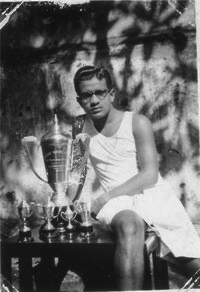 “Having a father who was Captain of the Boxing Team at Ananda College, and an uncle who was a good boxer at Royal, boxing was no stranger to my family. Ever since I can remember, I was very interested in boxing, and was also an avid reader and collector of ‘The Ring,’ and other boxing magazines. During my early days boxing for Trinity College, when I was not even in the College Boxing Team, I managed to pepper L.K.L. De Silva, who was in my same weight class. I still remember how he was always a pugilistic stylist, decked up in his v-necked banyan and boxing shoes, whilst I would box bare foot. When we started boxing at College, we didn’t really have a Coach per se. It was our Captains who trained us. I recall Michael Kagwa, a Ugandian boxer, who was a student at College at the time. We had boys from about 13 nationalities studying at College then,” recalls De Alwis.
“Having a father who was Captain of the Boxing Team at Ananda College, and an uncle who was a good boxer at Royal, boxing was no stranger to my family. Ever since I can remember, I was very interested in boxing, and was also an avid reader and collector of ‘The Ring,’ and other boxing magazines. During my early days boxing for Trinity College, when I was not even in the College Boxing Team, I managed to pepper L.K.L. De Silva, who was in my same weight class. I still remember how he was always a pugilistic stylist, decked up in his v-necked banyan and boxing shoes, whilst I would box bare foot. When we started boxing at College, we didn’t really have a Coach per se. It was our Captains who trained us. I recall Michael Kagwa, a Ugandian boxer, who was a student at College at the time. We had boys from about 13 nationalities studying at College then,” recalls De Alwis.
Later, in around 1950, when he was at Wesley College, Sharm, together with his friend Babu Ahamath had agitated with the College authorities to include boxing to the sports curriculum. Thereafter, Wesley went on to produce many local Boxing Greats, such as David Schokman (first College Boxing Captain) and Ranjit Abeyweera (who later captained the Air Force Rugby team). The latter affirmed Sharm’s theory that boxers make great rugby players because they’re fearless. “Once I left Wesley aged 19, and before I joined Shell Gas, I wound up at an Open Air Carnival - Boxing Competition in Kurunegala, where I fought against Egerton Jobsz who was 22, for four rounds, before ending up in a ‘no contest,’ as we were both equally strong,” he added.
Later in around 1953, Sharm joined Shell Gas, and was subsequently appointed Captain of the Shell Boxing Team in 1954-56, where he fought in both the Pin and Fly weight categories. He went on to win both these titles for three consecutive years at the Best Boxer’s Cup (a Mercantile Boxing Meet where the cream of National boxers competed), thus entitling him to win the Cup outright. The Shell Team, under his Captaincy, also emerged Champions of this meet for three years running.
“Boxing has always been a ‘Cinderella Sport’ in Sri Lanka, with only the real die-hards taking to it. Over the years, we’ve produced many fine boxers of the caliber of Albert Perera, Eddie Gray, Alex Obeyesekere, Lesley Handunge, Michael Bulner, Sumith Liyanage, K. Edwin, Mahasen Weliwitigoda, Anton John, to name a few. My boxing skills were fine tuned under the watchful gazes of the three veterans Gray, Obeyesekere and Perera, at the YMCA in Fort. Coaches such as them never basked in the reflected glory of their protégés. Today, boxers worldwide don’t know their basics.
They don’t have any proper foot work, no science, just slugging like wrestlers hugging each other. This could be due to there not being many coaches who’ve been boxers themselves,” elaborated De Alwis nostalgically. Locally unbeaten in over 25 fights, and on the verge of bagging the National title of Pin Weight Champion, the fast life of the West and the desire to pursue his higher education, lured Sharm away to London. Whilst there he continued to box for the likes of Polytechnic, Crystal Palace and Chelsea, but hung up his gloves prematurely within two years, as, due to his short stature and weight category, his opponents turned out to be mostly teenagers. Whilst in London, he went on to study Advertising and Market Research.
His return to Sri Lanka from London though, is what I found most interesting, and least known about his life. “Having completed my studies, I decided to indulge the adventurer in me by taking three months off to travel back home by land, on my Lambretta Scooter. I started off by taking a ferry from Dower to Calais,” recalled De Alwis.
“I would approach young girls in every European city I visited and tell them it was my birthday. They would shower me with attention and treat me to all sorts of things. It was good fun! I met lots of different people along my travels, some of whom even invited me home for a meal and sometimes sleep over. Once in Austria, I shared a bed with a Policeman and his wife who I met at a heurigen up on the hills, for one night. People were always very friendly and hospitable, especially as it was just my Lambretta and me, and also because I was quite an uncommon sight at the time, as there weren’t many Ceylonese in the West at that time. In Isfahan, a waitress even danced for me whilst I ate. She danced for my supper,” said De Alwis laughingly.
“Having traveled from London, through France, Germany, Austria, Hungary, Greece, Turkey, Afghanistan and finally India through to Sri Lanka, I was able to see the picturesque Hindu Kush plains and rocky land of Afghanistan. I have just one unfulfilled ambition left, which is to follow the course of the Mahaweli River by boat, right from its source downward, but, I think my son who’s inherited my explorer genes, will have to fulfill it on my behalf,” said De Alwis.
Upon his return to Sri Lanka, Sharm took to the field of advertising, after which he started up his own Export Packing and Shipping Company - Kangaroo Packing and Shipping Services, which is now in its’ 40th year in operation. Now, Sharm is also a Freelance Sports, Travelogue and Social Comment Writer.
At the end of the day though, Sharm sums up his life’s experience in one line - “My wife has, is and always will be, the wind beneath my wings…”
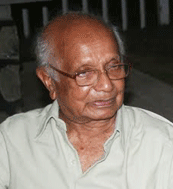 Reggie Fernando, who was enviously termed ‘paper weight’, reminisced recently on the 1959 Kurunegala motor races in which P. B. ‘Kuiya’ Herat fared well in three motor cycle events. Kuiya and I were class mates in my one year stint at Wesley, and a little more information of the pint sized dynamo will not be impertinent.
Reggie Fernando, who was enviously termed ‘paper weight’, reminisced recently on the 1959 Kurunegala motor races in which P. B. ‘Kuiya’ Herat fared well in three motor cycle events. Kuiya and I were class mates in my one year stint at Wesley, and a little more information of the pint sized dynamo will not be impertinent.
‘Kuiya’s’ grand uncle was P. B. Herat [Snr], the first Kandyan Civil Servant who stood tall together with his father-in-law, Adigar S. N. W. Hulugalle when the Colonial Government took draconian measures which were nothing less than despotic in entity. ‘Kuiya’s’ talents were multi-faceted. In motor racing, he was runner-up champion in the light weight and ultra light weight motor cycle categories and rode in the heady company of Pat Coomaravel, Chandra de Costa, Bathiya and Asoka Mirando, Nimal Wijesuriya with rally and Zacky Deen in the heavier class. Kuiya was runner-up to Rally in the 350cc championship meet, although he was astride a 250cc AER MACCHI.
After ending his racing career, he was for five years the President of the controlling body of motor sports, and is the only Sri Lankan to have been on the Judicial Panel of the Federation Internationale de Motocyclisme. Those were days in which circuit races were relatively free of accidents. The only crashes were on the main roads when homing spectators tried to emulate the track specialists. It is moot to mention here that Fangio, when asked if he was ever apprehensive on the track, replied, "no, I have never been nervous because all others on the track were professionals of high competence. But I have been petrified on the main roads, when everyone thinks he is a Fangio."
Reggie Fernando, himself, had burned the tracks in an earlier era, and my searing memory is of attempting to overtake him on a listless afternoon on Galle Road. He was on a Tiger 100 and I rode my 350cc Mac Velocette. The moment he heard a pretender trying his larks, he changed gears and swept past on the second gear and was quickly lost in the horizon. I am privy to a market incident when P. B. ‘Kuiya’ Herat braved a thug to save a member of the fairer sex from theft and molestation. ‘Kuiya’ was at the Sunday ‘pola’ then held at the race course when a pickpocket tried to take a purse from a lady’s marketing bag. ‘Kuiya’ alerted the lady to the pickpocket’s chagrin.
"Thamusey Kawdha?" shot the pickpocket. "Mama vedhek," answered ‘Kuiya’, delivering his sunglasses to the marketing bag. "Thamusey wagay leddunta beheth dhena vedhek." The pickpocket scooted off so fast, that he left a trail of dust. ‘Kuiya’ would have been a karate black belt, if only he had sat for the written exam. He had learned judo under the Japanese black belt Nishikawa and China footing under R. A. Vyramuttu. In his salad days, ‘Kuiya’ took to Law, which was more or less the family bucking horse and ended his legal career in the Ministry of the Legal Profession and retired as Secretary. Earlier, he had undergone a rraining programme at the Training School for Judges in Paris, and had been the Registrar of the Supreme Court.
P. B. ‘Kuiya’ Herat had been the President of the Wesley College OBA and is now the Vice Patron of the OBA as well as Wesley College Sports Club. He is, however, an infrequent participant in the activities, because the club bar is in close proximity to his residence, and he cannot remember even through a haze how he negotiated the winding roads of Ettampitiya, when he was a callow youth.
Distinguished Old Boy and Honoured Citizen of Ceylon
 Hameed Hussein Sheik Ismail, the first Muslim speaker of Parliament of Sri Lanka was born on the 19th of May, 1901 in Puttalam to a well-respected family. He started his education, religious and secular at an early age. Young Ismail began his Quran lessons in 1905. He had his primary education at St. Andrews College, Puttalam and secondary education at Wesley College, Colombo. He then entered Law College, Colombo, passed his Proctors Finals in 1925, carrying away the prizes for Law of Persons and Property, the Law of Contracts and Toris and for Conveyancing. He practiced in Colombo only for a short period of time and decided to move to his home town in Puttalam.
Hameed Hussein Sheik Ismail, the first Muslim speaker of Parliament of Sri Lanka was born on the 19th of May, 1901 in Puttalam to a well-respected family. He started his education, religious and secular at an early age. Young Ismail began his Quran lessons in 1905. He had his primary education at St. Andrews College, Puttalam and secondary education at Wesley College, Colombo. He then entered Law College, Colombo, passed his Proctors Finals in 1925, carrying away the prizes for Law of Persons and Property, the Law of Contracts and Toris and for Conveyancing. He practiced in Colombo only for a short period of time and decided to move to his home town in Puttalam.
In a short period of time, he established himself as an eminent civil lawyer in the Puttalam District. Mr. Ismail’s popularity as a lawyer naturally led him to enter the field of politics in 1928, when he became a member of the Puttalam Local Board. In 1933 he was elected as a member of the Puttalam Urban Development Council. He became its chairman in 1938 and served in that post without a break until 1947. Al- Haj HS Ismail was one of the Muslim leaders who supported the struggle for independence of Ceylon, along with other contemporaries such as Dr. T.B Jayah, Dr. M.C.M Kaleel, and Sir Razik Fareed.
At the first Parliamentary elections which was held in 1947, he was elected uncontested and thus holding the distinction of being referred to as the First Member of the First Independent Parliament of Ceylon. He was appointed as Parliamentary Secretary to the Minister of Food and Co-operatives under the Govt. of Rt. Hon D.S. Senanayake. As a Deputy Minister of food and Co-operatives he managed to open a large number of Co-operative Societies all over the country. Later on he was elected as the Deputy Chairman of Committees and subsequently, had the distinction of being elected as Deputy Speaker of the House of Representatives.
Mr. Ismail’s Contribution to the development of Puttalam was immense. He was responsible for opening the Puttalam Chest Hospital, a maternity ward and a large number of dispensaries in the district, in addition to upgrading the Puttalam District Hospital, the extension of Hydro-Electricity and pipe-borne water supplies to the Puttalam Town were results of his endeavors. The culmination of Mr. Ismail’s political career came when he was unanimously elected as the speaker in 1956, thus creating another first in the annals of Sri Lankan political history; the first Muslim speaker of the parliament of Ceylon.
Mr. Ismail did not confine himself to political activities alone. As a prominent Muslim social activist, he has rendered yeoman service to the progress of his community. In 1953, he was elected as the President of the University of Ceylon Mosque Committee. He not only shouldered the responsibility of initiating the construction of a mosque at the Peradeniya University, but also managed to complete it successfully. In 1957, he established the Ceylon Baithulmal Fund to help the needy Muslims and guided it in all its activities. As a founder member of the All Ceylon Muslim Scholarship Fund, he donated his Saltpans for its permanent income. As the Trustee of the Puttalam Mohideen Jumma Mosque, he contributed much to its development.
As an educationist, Al Haj HS Ismail also spearheaded the movement and influenced Dr. T. B Jayah, the illustrious education activist and freedom fighter to open a branch of Zahira College in Puttalam in 1945. He was also deeply interested in rural education. During his tenures as Puttalam MP, a number of schools were established and additional buildings were provided to several schools in the district. He was also responsible for upgrading the Boy’s school in Puttalam and Kalpitiya areas, encouraging modern education. He continued to be interested in the development of education and was among the Muslim leaders who advocated the concept of Muslim schools in Sri Lanka.
From the time he entered public life, he served his own community as well as other communities for their betterment. He was a true national leader who always worked with the aim of national unity of the country. He was a pious person and always led a religious life. On retirement, Al Haj H.S Ismail deeply involved himself in the Tabligh Movement. His demise on the 4th of August was a loss not only to the Muslim Community but also the nation of Sri Lanka
Kaabiriya' and 'Sudda' of the Daily News
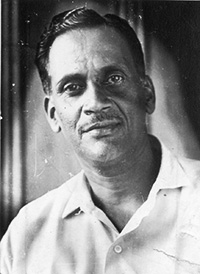 They were the two giants in the Daily News - both six-footers. Christie Seneviratne, Sports Editor, as black as a solid native African, slim and wiry with the physique of an athlete in top form, raconteur par excellence especially of lewd jokes; his buddy Neville de la Motte, could easily pass off for a European, Chief Sub-Editor, a silent Gulliver. They earned the nicknames following a brawl in the outskirts of Colombo. Both were out on a binge drinking at an illicit hooch joint. They fell into an argument with the owner, knocked him out and then reduced the place to pulp. Later a complaint was lodged at the police station that a 'Kabiriya' and 'Sudda' had smashed the place. Police determined that two drunken sailors out on a spree after their ship had berthed at the Colombo harbour had done the damage and the case was dismissed.
They were the two giants in the Daily News - both six-footers. Christie Seneviratne, Sports Editor, as black as a solid native African, slim and wiry with the physique of an athlete in top form, raconteur par excellence especially of lewd jokes; his buddy Neville de la Motte, could easily pass off for a European, Chief Sub-Editor, a silent Gulliver. They earned the nicknames following a brawl in the outskirts of Colombo. Both were out on a binge drinking at an illicit hooch joint. They fell into an argument with the owner, knocked him out and then reduced the place to pulp. Later a complaint was lodged at the police station that a 'Kabiriya' and 'Sudda' had smashed the place. Police determined that two drunken sailors out on a spree after their ship had berthed at the Colombo harbour had done the damage and the case was dismissed.
Christie was a fine cricketer and wrote his cricket commentaries to the Daily News under the nom de plume 'Wrong 'Un' and when the West Indies cricket squad toured Ceylon, Christie played host to them. West Indians took an immediate liking to him perhaps because of his colour or his capacity to entertain them with endless funny anecdotes. As I said he was a superb story teller.
Christie was a Don Juan and did not conceal the fact. He openly flirted with wives of colleagues who came to visit their husbands in office. He had had a chequered career before he took to journalism. During the Second World War he was in Singapore spying, as he claimed furtively, for the Japanese. You were incredulous but he had proof (including documents) to testify to the veracity of his claim. People like Christie don't lie unnecessarily.
Lake House canteen
In the Daily News Sports Desk though, he had a bete noire: sports reporter Aloy Perera. Aloy claimed he could play 13 sports and was more qualified to hold the post of Sports Editor. Aloy was a young wayward boy, a very talented reporter who could tune into a broken down old wireless and take down a cricket commentary beamed across the world. Christie and Aloy hated each other's guts. Once Aloy annoyed Christie to the extreme and Christie who had just returned to office after his afternoon booze, ran down to the Lake House canteen kitchen fetched a manna knife and chased after Aloy. Aloy fled.
Christie loved fun and at any office party you could see him dancing away with girl reporters; he was easy to deal with and the girls loved dancing with him. In one such engagement William de Alwis interrupted him rather crudely and Christie sent him crashing to the floor. Willie was struggling to get on his feet but Christie stood over him menacingly with clenched fists daring Willie to take the challenge. Willie was a tough guy but he was sozzled and did not take the challenge. It was not anything serious: like some school boys' fight. Christie and Willie were good friends. Christie's pal Neville had had a chequered career too before he joined Lake House. Neville was the Chief Jailor in the Prisons Department who helped the Samasamajists - NM, Phillip, Colvin and Edmund - to escape from jail. Neville was sacked for his misdemeanour. Neville didn't give a damn - he joined Lake House as a sub-editor. In 1956 when Phillip Gunawardena became a Minister under the premiership of S. W. R. D. Bandaranaike, he sent for Neville and asked whether he wanted to get back to the Prisons Department or whether Neville wanted some other situation in government service. Neville with his broad smile thanked Minister Gunawardena and said, "No, I am happy as a journalist," and walked off.
Neville always did the night shift. Even in rubber slippers and crumpled trousers with a torch in hand standing on the stairs of the Fort Railway Station after his train ride from Dehiwela he looked a mighty figure.
Personal consumption
At his desk when he was not in the cups Neville wrote profusely in his diaries of which he had quite a number. I used to watch him write and write in a frenzy; I would have loved to read what he wrote but I could not; nobody knew what he wrote. After he died his sister came to office and removed dozens of those unpublished works of Neville de la Motte. Somebody at the desk suggested that those notes of his should be published. But I think it was Gamini Weerakoon who interposed: "No, they were not intended that way. Neville wrote for his personal consumption." Yes, Neville would have disliked his memoirs being published. Neville had his crazy bouts of drinking. For weeks he would keep off work and go on a binge.
Once drunk he confessed to me: "I have one regret; I have no progeny." Neville never married.
He was an excellent sub-editor. In the old Rotary, boys lamented when they did not see Neville's subbed copy. They were so familiar with his hand writing. When his writing re-appeared they were exulted. They used to walk to the desk and say so. Neville of course greeted them with a good-natured smile. No comment.
In between work he ran out for a quickie. In an instant he was back at his desk. I was typing parliamentary copy. Neville turned to me and whispered: "Three down so far," alluding to cricket commentary parlance.
Of the two friends Neville was the first to leave us to whichever land they all went after the brief stay on this earthy land. Lake House provided us with special transport to travel to the Galkissa cemetery to attend Neville's funeral. His death was ironic: he didn't die of cirrhosis. He died of a snake bite: a tragedy encountered while staying with a colleague in the outstations in a rambling house surrounded by wild reptiles. Christie came to the cemetery groggy, crying: "Oh my friend is dead."
From Dr Nihal D Amerasekera:
Christie Seneviratne was a former 1st XI cricketer at Wesley College. He became a respected Sports Editor at the Daily News where he served for many years. His column in the daily papers written under the pseudonym "Wrong'Un" attracted much attention and discussion amongst the cricketing fraternity and the general public. He was a regular spectator at the Cricket matches at Campbell Park over the years. Christie Seneviratne will also be remembered for his support for Mahadevan Sathasivam during his infamous court case. His son Nihal played 1st XI cricket for Wesley College.
Links to further reading
Having read his cricket books in my youth, by publishing this article , I have fulfilled a life long ambition to honour a cricket writer and a gentleman. I found his books a delight to read. Accounts of his life have been largely lost in the mist of time. This article has been compiled using multiple sources of information from which I drew much inspiration - Dr. Nihal D Amerasekera

Samuel Peter (S.P.) Foenander M.B.E., was an old boy of Wesley College. He captained the Wesley College Cricket team in 1901/02 and 03. The school was then in Dam Street Pettah and Rev Henry Highfield was its Principal. He was an eminent cricket journalist in the (1910 - 1960) period and known as 'Ceylon's Walking Wisden'. SPF was one of the most capable and respected cricket writers of his time. His narrations of the matches and portrayal of the people were interesting, honest and accurate. His mature prose was marked by clarity, balance, and indeed by restraint, though he never shrank from emotion or from beauty. SP Foenander's approach to cricket was intuitive and personal, rather than academic and technical. His non-confontational style of writing was greatly appreciated and he was always highly regarded by professional cricketers. All cricket writers of the last century have been influenced by SPF and he remained a model for the aspiring cricket historian. He changed the course of the writing of cricket. He showed what could and should be done. He dignified and illuminated the craft. His writing had great warmth and style, as had S P Foenander.
His name was synonymous with cricket and SPF was a familiar sight at cricket matches both international and inter club games. SPF rendered yeoman service to the game and helped to put Ceylon on the 'Cricket Map of the World'. He is the author of many books about cricket and was a respected friend to many visiting cricketers from England, Australia and the West Indies.
His Sixty Years Of Ceylon Cricket 1863 – 1923 which was published in 1924 gave an accurate insight into the state of cricket in Ceylon. His had a traditionalist approach to cricket; his standards were high. But he was a sound, professional journalist who wrote lucidly and without affectation. His judgment and values were sound and he always maintained a historical and moral perspective.
SPF wrote: The relationship between the British Empire and the Ceylonese in the subject of sports is somewhat different to India, our neighbour country. Undoubtedly we admired the English tradition which flowed through the Colonial system. Just have a look at the “Introduction” written by Pelham Francis Warner in 1923 for S.P. Foenander’s book “Sixty Years of Ceylon Cricket”, published in 1924. In his introduction Warner refers to this invaluable volume as “History of Ceylon Cricket”.
“There is no place in the British Empire where cricket is played more enthusiastically and in finer spirit than in Ceylon and English teams on their way out to Australia always look forward to a game in that beautiful island”.
“The game and the love of it have spread far beyond the imagination of our fathers and grandfathers, and there is no part of the world, where the Union Jack flies, that the stumps are not pitched. Cricket, indeed, has become an Imperial asset and the more cricket played throughout the Empire the better for the game and one may add, for the Empire”.
As a right-hand batsman, Pelham Warner played first-class cricket for Oxford University, Middlesex and England. He played 15 Test matches, captaining in 10 of them, with a record of won 4, lost 6. He succeeded in regaining The Ashes in 1903–04, winning the series against Australia 3–2.
SP Foenander on the left with Sir Don Bradman

S.P. Foenander writing the history of Colombo Colts Cricket Club (1941) says “powerful though the SSC were in the first decade of their history they were never able to inflict a defeat on the Colts who were almost invincible in those days. It was not till 1913 SSC were able to defeat the Colts CC for the first time. It was a sensational finish when SSC won by 4 runs at the Racquet Court.
We should recognise the part SP Foenander has played in the field of Atheletics in reviving its National Association. the AAA, After World War II the standard of athletics among the schoolboys was improving and there emerged several promising young athletes. This prompted the sports enthusiasts and one of Ceylon’s foremost sports writers, Mr S P Foenander to convene a meeting of all sportsmen interested in schools and club athletics to form an Association with a view of staging a National Athletic Championships. The inaugural National Athletic Championships was held on the 24th of September 1921 at the C H & F C grounds in the Colombo Race Course. This meet incidentally led to the revival of the then defunct Ceylon AAA. Since the year 1921 the Annual Championship was held regularly to date.
Books by S P Foenander
- Ceylon Government Service Cricket Association Golden Jubilee Souvenir 1957 [Paperback]
- Ceylon Cricketers' Companion For 1927 [Paperback]
- Famous Cricketers I have met (1933)
- History of the Royal Vs St Thomas' cricket (1949)
- C.C.C. V. Up-country: A Complete Record of Fifty Years' Cricket, 1875-1925
- A Complete History of Test Cricket in Ceylon: Europeans V. Ceylonese, 1887-1927
- Sixty Years of Ceylon Cricket ( Colombo , 1924)
1956-57 Indian Team to Ceylon, S.P. Foenander letterhead titled 'Indian cricket Team in Ceylon' with 15 signatures including P.R. Umrigar (Captain), G.S. Ramchand & Ghulam Ahmed; together with real photo postcard of the team entering the field with 5 signatures, and three scarce match tickets. (5 items)
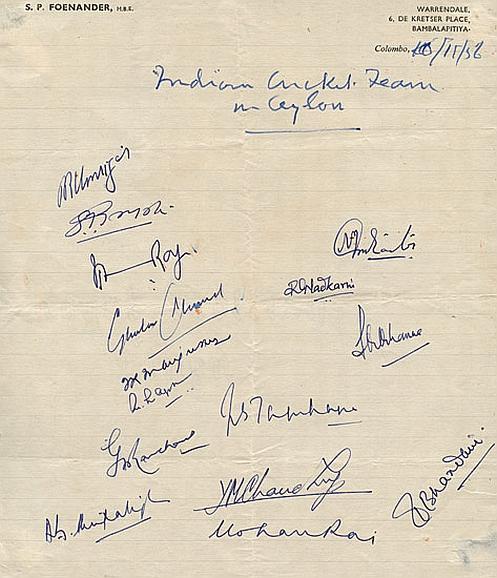
Is the time ripe for a SP Foenander revival? I think yes. He is recognised as one of the foremost cricket journalists of the 20th century like Neville Cardus and EW Swanton. Aspiring sports journalist have much to learn. When young, many writers drift towards a combative and confrontational style. But anyone wishing to look back to a gentler and less pressurised and less money-driven time they will find plenty to enjoy in his fine descriptive relaxed journalism. This is certainly more readable and will help to get a balanced view. After all the game was once played and journaled by gentleman. The happiness, humanity and humour’ spread by SP Foenander will be long remembered. He gave his whole life to the game of cricket and his ability with the pen will live on. The lifetime pleasure of cricket he created over many years will remain forever in the hearts and minds of those who have read his books.
SP Foenander was selected Member of the Most Excellent Order of the British Empire (MBE) for his services to Cricket by Queen Elizabeth of England.
It is almost impossible for us who have followed in the footsteps of giants to adequately express our gratitude for the example and inspiration they have set. They can only be remembered with awe.
A clothing for the soul divine;
Under every grief and pine
Runs a thread of silken twine
Blake
GRANT HIM O LORD
ETERNAL PEACE
19th August 2014
At The Winter Warm-up Curry Night - Melbourne
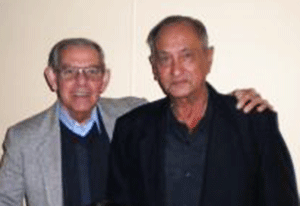
Robert joined Wesley in 1947 in those happy days of the Cartman era. I remember him from the hostel when he was a senior student. He was a genial person kind and sympathetic towards the many young kids who were far away from home. He took an active part in the fun and laughter which was ever present in the boarding. I recall Robert playing cricket and football in the small park which was the arena on our backyard. As he was tall he was a good basket ball player.
Robert was a Chorister in the ever popular Choir of Maxwell De Alwis taking part in the Operettas Alladin-and out and Robin Hood.
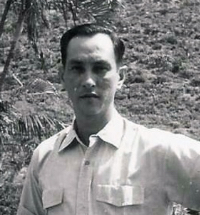 Robert's father was an upcountry planter and his aim was to follow in his footsteps. This he did soon after the Senior School Cerificate. I believe he left Wesley in 1953 to join the lucrative Plantation sector.
Robert's father was an upcountry planter and his aim was to follow in his footsteps. This he did soon after the Senior School Cerificate. I believe he left Wesley in 1953 to join the lucrative Plantation sector.
I recall the time when Robert was at Kiriporuwa Estate in Yatiyantota. His organisational and leadership skills were quickly recognised by his superiors. Hardworking, thoughtful and articulate he was greatly respected in the planting community and rose rapidly to become a PD. He took on this heavy burden with much enthusiasm. In 1972 Ceylon became a Republic within the Commonwealth and changed its name to Sri Lanka. A wave of ultranationalism spread rapidly across the island. Initially, Nationalisation of the estates in 1971/72 brought mayhem to the Plantation industry. Law and order deteriorated and it became increasingly difficult to manage the estates. Militant workers and corrupt officials made life difficult for the Estate Superintendents. Many planters saw their once peaceful domain disappear into chaos and left the industry in their droves. After many years as a successful planter Robert Coburn decided to hang-up his boots and retire to a more peaceful life in Melbourne, Australia.

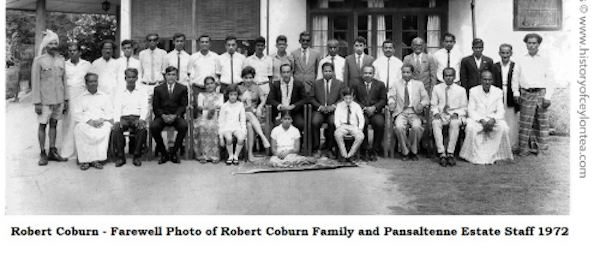
Robert remains a loyal Wesleyite. In Australia, over the years George Robertson and Robert Coburn have become close friends. He is a regular at the Seniors gatherings in Melbourne. The Curry Nights have a special pull for him and a reminder of the good life back home. On behalf of the Brotherhood of Wesleyites I wish him a long and happy retirement.
Seniors Lunch Melbourne 1989
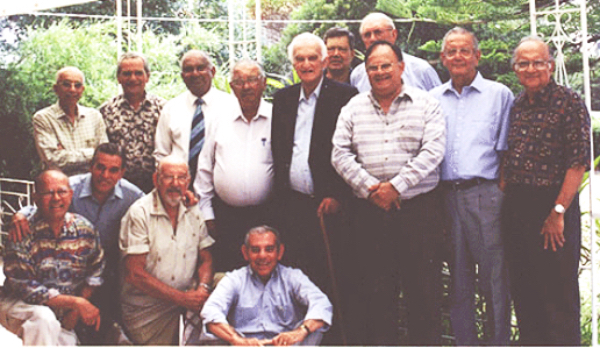
Seniors Dinner Melbourne - December 2011
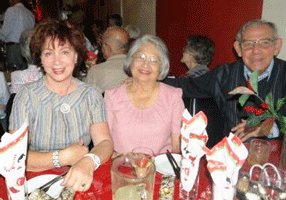 |
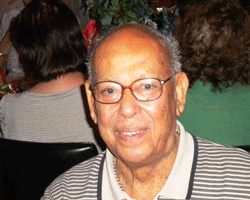 |

Chrisantha Dayaprasad Peiris joined the school and the boarding in 1952. His father was the Methodist Priest at Rawathawatte Moratuwa. His brother Devananda was a couple of years junior to him. They both were in the Junior dormitory of the boarding. Daya was my classmate and we became close friends in the hostel.
Daya was an intelligent student and performed well in class. He had two passions. 1. Cricket 2. Singing. He was not a great cricketer but was a regular in the small park where we played soft ball cricket from 4pm to 6pm on weekdays and all day Saturday. Those were the glorious years of cricket at Wesley. Claessen brothers, Adhihetty brothers and Fuard brothers were in the back pages of the newspapers for their fine performances with the bat and ball. Daya tried hard to emulate Bryan Claessen’s wily bowling action with some success. He was a pretty good bat too. He was best as commentator for the many closely fought cricket matches held in the Small Park. This arena was a dust bowl with stones and gravel on the pitch. It was not suited for serious cricket but that was our 'Oval' as kids and enjoyed the competition and the games enormously.
Daya developed a keen interest in singing. His singing was far better than his cricket. Soon he found his niche in Mr Maxwell De Alwis’ school Choir. Daya’s soprano voice was in great demand and he played an important part in the Operettas Alad-In and out and also Robin Hood which enjoyed rave reviews. He loved the glamour and the excitement of the performances. I can recall with pin-sharp clarity Daya singing a solo “Once in Royal David City” at the Maradana Methodist Church and at the Great Hall at Wesley. For his age he had wonderful control of the pitch and tone that delighted the audience. It was a sensational performance. The Nine Lessons and Carols sung by the Wesley College Choir became a regular event at Christmas every year until Mr Maxwell De Alwis left school. Even after the passage of half a century whenever I hear that Carol I am reminded of Dayaprasad Peiris and his angelic soprano voice.
Daya’s brother Devananda was a tubby 'Billy Bunter' like kid. He was well liked by all. In 1954/55 during the August school vacation Devananda was suddenly taken ill with appendicitis and passed away in hospital. The news of his death brought great sadness to the whole school and to the boarding in particular.
Affable and mild-mannered, Daya was a popular boy and took part in the fun and laughter which was endemic in the boarding. He had a spring in his step and a song in his heart and was a happy-go-lucky chap. In the hostel our mealtimes were more interesting than the meals. For a small lad Daya had an enormous appetite and soon became well known for it. As I recall he finished his plate clean everytime. It used to be said even the 'karapincha' didnt survive on his plate. He was one of the few who managed to gain weight in the boarding.
He left the hostel in 1957/58 and travelled daily from Moratuwa using the 'infamous' school bus. Daya joined the Arts stream while I continued with the Sciences. We maintained contact as we met up at Assembly, in the long corridors and also at the sports events at Campbell Park. He was a regular and a most vocal spectator at the cricket matches. Daya took great pleasure in the sing songs, flag waving and dancing beyond the boundary lines at Campbell Park which was great fun in those days.
Time passed swiftly and relentlessly. After the Senior School Certificate in 1958 Daya left school and we lost contact. The last time we met was in Pettah when he worked for a Furniture Shop in Main Street circa 1969. We reminisced, laughed and related the stories and anecdotes as we had so much in common as kids. I left Sri Lanka in 1974 and never saw him again.
He was good in Sinhala and English and wrote and spoke well. He was kind, generous and caring and could have followed in his father's footsteps and become a Methodist Minister and would have made a good one. But I was told he became a sports journalist. He was widely respected in the profession. With his unobtrusive and lucid style he was a fine writer. On his pet subject of cricket he wrote with great authority and panache. Daya was a regular at Campbell Park during the cricket season and wrote about the matches and our players. One such article was about Danesh Dissanayake who was a fine cricketer for Wesley College and also happened to be the son of Mr Edmund Dissanayake who was his former class teacher.
I was greatly saddened to hear Daya passed away in the 1980’s while still in his 40’s. What a tragic waste!! There was great camaraderie in his profession and there was a culture of drinks parties after a hard days work. Some succumbed to alcohol related problems. He was married with 3 children at the time. My most enduring memories of school days and friends continue to haunt me. On behalf of the Brotherhood of Wesleyites I thank him for his contribution to the life of the school.
Links to further reading
GRANT HIM O LORD
ETERNAL PEACE
From Priyantha Wijesinghe, USA
Dear Dr. Amerasekera,
I am writing to you again about an old boy of Wesley College, my grand uncle Dr. Chandra Dharma Sena Gooneratne. He was originally named Charles Gooneratne and as a boy was known as Charlie Gooneratne, but he changed his name, perhaps when he was in his early twenties while overseas. If you Google "Chandra Gooneratne" you will get many ‘hits’, including several images, e.g. photos from the time he was at the University of Chicago in the 1920s (http://photoarchive.lib.uchicago.edu/db.xqy?keywords=Gooneratne), some brochures relating to talks he gave on Indian topics while in America (e.g. http://digital.lib.uiowa.edu/cdm/ref/collection/tc/id/46042), and a couple of pictures from an article that appeared in an American magazine (The Saturday Evening Post) in July 1952 (see: http://www.saadigitalarchive.org/tides/article/20140708-3618). Like much on the internet, a lot of this has been copied and re-copied many times from a few sources, such as the Saturday Evening Post article. I became aware of my grand uncle’s link to the University of Chicago when I came across the article "Scholar from afar" by Elizabeth Station in the online University of Chicago Magazine (06.28.2013) (http://mag.uchicago.edu/scholarfromafar). Incidentally, my uncle, the late Charles J. A. Gunasekara, about whom I wrote to you before, was named after his uncle, Charles Gooneratne.
Photo - Chandra Gooneratne (Late 1920's)
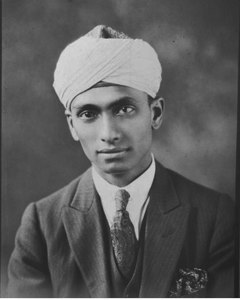 Uncle Chandra was my mother's uncle, i.e. my mother’s mother’s brother. He was the only son of Joseph W. Gooneratne of Madampe and Ellen Ranasinghe of Gampola and Dematagoda. Uncle Chandra had 3 or 4 sisters, one of whom (Mrs. Daisy Gunasekara) was my mother's mother. According to my records Uncle Chandra was born in 1899 but this needs verification. His father Joseph Gooneratne is said to have hailed from the Madampe Walauwa (Manor of Madampe) and my maternal grandmother's family were proud of their semi-aristocratic background. Mrs. Ellen Gooneratne had a large house in Dematagoda called ‘Charlie House’ down Albion Road (now Sri Dharmarama Road). Incidentally, it was Mrs. Ellen Gooneratne who provided the land on which the Baptist Missionary Society’s BMS Ranasinghe Memorial Hall was built. This building still stands, though in a dilapidated state.
Uncle Chandra was my mother's uncle, i.e. my mother’s mother’s brother. He was the only son of Joseph W. Gooneratne of Madampe and Ellen Ranasinghe of Gampola and Dematagoda. Uncle Chandra had 3 or 4 sisters, one of whom (Mrs. Daisy Gunasekara) was my mother's mother. According to my records Uncle Chandra was born in 1899 but this needs verification. His father Joseph Gooneratne is said to have hailed from the Madampe Walauwa (Manor of Madampe) and my maternal grandmother's family were proud of their semi-aristocratic background. Mrs. Ellen Gooneratne had a large house in Dematagoda called ‘Charlie House’ down Albion Road (now Sri Dharmarama Road). Incidentally, it was Mrs. Ellen Gooneratne who provided the land on which the Baptist Missionary Society’s BMS Ranasinghe Memorial Hall was built. This building still stands, though in a dilapidated state.
My grand uncle Chandra spent many years away from Sri Lanka, in America, Britain and Europe. He may have seen action in World War I in India and/or the Middle East, studied in America and did welfare work related to the army in Britain during World War II. It was during his time in Britain that he met Margaret Giffiths, the young Welsh woman who later became his wife. She was secretary to Chandra who was heading the section that cared for soldiers' welfare. She worked with him and when the army moved around so did they, and were based, among other places, in Scotland and in London. During their time in London the car they were travelling in was blown up by a flying bomb and Margaret was seriously injured (including loss of an eye). According to one newspaper report, Chandra Gooneratne was the recipient of the Kaiser-i-Hind Silver Medal which is awarded by the British monarch to civilians for public service in India. On his return to Sri Lanka after World War II in the 1940s he worked for the U.S. State Department at the U.S. Embassy in Colombo. The Saturday Evening Post article ‘The Case of the Tan Stranger’ by George Weller (July 12, 1952) is from this period. Latterly they lived in a flat (apartment) belonging to the Girl Guides in Colombo. He died in the early 1980s. Aunty Margaret worked at the American Center (on Flower Road) in Colombo for many years and returned to Britain (Wales) after retiring in 1984; she passed away in October 2007. As a child I met my grand uncle on only a few occasions when he was quite elderly but even then he struck me as a remarkable personality.
I am attaching a file with two newspaper clippings from 1941, one of which states that Chandra (Charlie) Gooneratne was educated at Wesley College. I thought of writing to you after seeing this evidence that Uncle Chandra was an old boy of Wesley College as he doesn't seem to be mentioned on your Wesley College website. He was a friend of Sir Oliver Goonetilleke who, incidentally, was at his wedding (1946 or 1947). I am attaching a copy of the wedding photograph. The person standing immediately behind Sir Oliver (and second from Aunty Margaret) is my mother, Ruth, at the age of 17 years.
I hope you find this information of interest!
Best wishes,
Priyantha
D. P. Wijesinghe
Correspondence about Chandra Gooneratne between Priyantha Wijesinghe and Elizabeth Station (author of article ‘Scholar from afar’) http://mag.uchicago.edu/scholarfromafar)
From: Elizabeth J Station
To: Dilrukshan Wijesinghe
Sent: Tuesday, December 3, 2013 4:53 PM
Subject: Re: Elizabeth Station's article "Scholar from afar" in University of Chicago Magazine
Dear Priyantha,
Once again, thanks for writing in such detail about your Uncle Chandra. What a fascinating person. I wanted to share with you some of the materials I found in my own searches about him, in case this material is of interest to you.
You probably saw all of the photos in our electronic archives, but just in case, here's a link to the ones I discovered (http://photoarchive.lib.uchicago.edu/db.xqy?keywords=Gooneratne).
His master's thesis and PhD dissertation, undertaken in the Department of Comparative Religion, are housed in the University of Chicago's Mansueto Library and are listed as part of the Google Books Project (see this link: http://www.google.com/search?tbo=p&tbm=bks&q=inauthor:%22Chandra+Dharma+Sena+Gooneratne%22), but have not been digitized yet. I skimmed them both and found them very interesting; his ideas about race, class, and human rights were decidedly ahead of their time and indeed much more progressive than many people's nowadays. The master's thesis was titled "The status of caste in modern India" and completed in 1928. The PhD dissertation is called "The development of political consciousness in India (1757-1931)", and was completed in 1933.
There is a book called "Desi Divas" (http://books.google.com/books?vid=ISBN9781617037320) which talks about a group of lecturers from South Asia, including your uncle, who travelled around the United States. He is mentioned on page 63 — type his name in the search box to get to that page.
I was able to find quite a few (electronic) clippings from the Chicago Tribune newspaper archives that mentioned talks and radio appearances he gave during his Chicago years, in the early 1930s. These are generally brief mentions.
You may have already seen this copy of the brochure from his Redpath lecture tour, which is at the University of Iowa library:
http://sdrc.lib.uiowa.edu/traveling-culture/chau1/pdf/gooneratne/2/brochure.pdf
Just in case you have any more relatives questioning whether he earned his degrees or not, here's what the University of Chicago Registrar reported about his attendance at the University:
Chandra Dharma Sena Gooneratne attended the University during the following periods.
Autumn 1922 to Autumn 1925
Autumn 1926 to Winter 1927
Summer 1927 to Winter 1928
Autumn 1929 to Autumn 1930
Spring 1932
The following degrees were awarded.
Ph.B. June 14, 1927
A.M. August 31, 1928
Ph.D. March 21, 1933
It may interest you to know that the University of Chicago is opening a Center in Delhi in March, 2014, and hopes to strengthen its ties to South Asia, which go back many years. Related to that, I enjoyed attending this event (http://mag.uchicago.edu/university-news/inspiration-india) and writing about another inspiring figure who visited us in Chicago back in 1893, Swami Vivekananda. His speech at the World Parliament of Religions is quite famous, and since learning about it I have been thrilled to stand in the place where he made it. There was an amazing art work (http://www.artic.edu/exhibition/jitish-kallat-public-notice-3) done on the spot a couple years ago.
Your uncle followed a University of Chicago tradition of being independent and argumentative; I think quite a few of the University's graduates have expressed unconventional ideas and rubbed people the wrong way … they are quite proud of that here! In any case, thanks again for reaching out and best of luck to you in your search for further family history.
All best,
Elizabeth Station
From: Dilrukshan Wijesinghe
Date: Monday, November 18, 2013 10:27 PM
To: Elizabeth Station
Subject: Re: Elizabeth Station's article "Scholar from afar" in University of Chicago Magazine
Dear Elizabeth,
Many thanks for your quick response to my email. I am glad to be able to provide some additional information about Uncle Chandra. I happen to be interested in family history and on a few occasions I have been surprised to discover through the internet information relating to members of my family who are no longer alive. I was surprised and delighted to find the photographs and other information about Uncle Chandra at the University of Chicago website. Until I came across this information I didn't know that Uncle Chandra had studied at the University of Chicago or that the PhD degree he was said to have came from that institution. I didn't know about him playing polo while at Chicago and of course had absolutely no idea that he had been a lecturer on Asian Indian matters on the Chautauqua circuit!
Yes, my recollections of Uncle Chandra and Aunty Margaret (as we called them) are from my childhood in Sri Lanka, going back to the 1970s, though I may have seen Aunty Margaret as late as 1984. Uncle Chandra was my mother's uncle (my mother's mother's brother). He was the only son of Joseph Gooneratne of Madampe and Ellen Ranasinghe of Gampola. Uncle Chandra had 3 or 4 sisters, one of whom (Daisy) was my mother's mother. Joseph Gooneratne is said to have hailed from the Madampe Walauwa - "Walauwa" is roughly translated as "manor" and I think my maternal grandmother's family were proud of their semi-aristocratic background! Aunty Margaret's full maiden name is Eileen Margaret Griffiths. She was of Welsh origin, from a small village called Llangenny in southern Powys, Wales. I think Uncle Chandra and Aunty Margaret met in Europe, possibly in Britain, which is where Uncle Chandra lived before returning to Ceylon in the 1940s. As I mentioned earlier, Uncle Chandra was many years older than Aunty Margaret. Latterly they lived in a flat (apartment) belonging to the Girl Guides in Colombo. I am not sure when exactly he died but Aunty Margaret retired from her post at the American Center in Colombo and returned to Wales in 1984. She died in October 2007. (I was able to get in touch with Aunty Margaret's sister's daughter in Wales and it was she who provided me with information about Aunty Margaret's later years.)
From the recollections of older members of my mother's family and sources like the Saturday Evening Post article one feels that Uncle Chandra was a very unconventional person with a strong and rather charismatic personality. He was considered eccentric by some relatives. I remember my mother telling me that when he was a schoolboy Uncle Chandra had provided beggars with food and a place to stay and was very impatient of his mother's disapproval of this "practical charity". He apparently ran away from home in his teens and is thought to have seen action in World War I. Sadly, I have no information about his experiences abroad. He apparently held the title of 2nd Lieutenant in the British Army about 1941, without Army pay or allowances, according to this reference: http://www.london-gazette.co.uk/issues/35360/supplements/6829/page.pdf
Yes, Uncle Chandra certainly seems to have been a trailblazer - the Saturday Evening Post article gives some idea of his unique style of handling awkward situations, including racism. As you indicated, the turban-wearing-Hindu-from-India image must have been a deliberate attempt on his part not to be identified as "colored". But carrying it to the point of giving lectures on India, Gandhi, etc., even making his thesis topic India, with no mention at all of his Ceylonese origins, might strike some as a little strange. Among relatives he was known to have traveled widely and I think some of them were aware that he held a PhD but I remember one person brushing it off with something like "Oh, he got it from some American university", hinting that it may have been "purchased"! (Sri Lanka, being a former British colony, some people in the old days tended to count only graduate degrees from Britain - Oxford, Cambridge, London, Edinburgh, etc. - as worth having!) He was at times a little too forthright and rubbed some people the wrong way - my mother told me that Uncle Chandra once accused my father of being "intellectually dishonest" (those were his exact words)!
I am sure this is far more information than you wanted! One last tip - if you can locate this book it might worth having a look at: "The Red Network: A "Who's Who" and Handbook of Radicalism for Patriots By Elizabeth Kirkpatrick Dilling, 1934 (1935), p. 153 & p. 169. Page 169: The Marvin Data Sheets report: that Communist Manuel Gomez speaking at a meeting of the "Hands Off China Committee" in Chicago, May 8, 1927, said his organization, the Communist All-America Anti-Imperialist League, has formed 172 Hands Off China Committees in the United States and England; that Carl Haessler presided at this meeting and Jane Addams spoke, as did also Chandra Sena Gooneratne, "a Hindu U. of Chgo. student said to be an active propagandist in the U.S. for a revolution in India similar to the one going on in China"; .....
Best wishes,
Priyantha
D. P. Wijesinghe
From: Elizabeth J Station
To: dpwijesinghe
Sent: Monday, November 18, 2013 11:34 AM
Subject: Re: Elizabeth Station's article "Scholar from afar" in University of Chicago Magazine
Dear Mr. Wijesinghe,
Thank you so much for this amazing letter as well as the clipping from the Saturday Evening Post article. How fascinating to have these details about your great uncle — I really appreciate your writing.
I had wondered about whether he was Sri Lankan or Indian, and your letter clears this up. Did he stay and his wife stay in Colombo after retirement, and is that where you last saw him? As for the time prior, I wonder if he wore the turban during his graduate school days to avoid the discrimination that he would have encountered here if taken for an African American.
I wish we knew more about those times. The University's earliest international students, and especially Dr. Gooneratne, were trail blazers in many ways (not just academic). I am grateful to you for reaching out!
All the best,
Elizabeth (Betsy) Station
Senior Writer, Alumni Relations and Development
University of Chicago
401 N. Michigan, Suite 1000
Chicago, IL 60611
From: Dilrukshan Wijesinghe
Reply-To: Dilrukshan Wijesinghe
Date: Sunday, November 17, 2013 12:05 AM
To: Katherine Muhlenkamp
Subject: Elizabeth Station's article "Scholar from afar" in University of Chicago Magazine
Please forward this email to Elizabeth Station
Hello,
I read the article "Scholar from afar" by Elizabeth Station today in the online The University of Chicago Magazine (06.28.2013), about Dr. Chandra Dharma Sena Gooneratne. I am writing to you because I am Dr. Gooneratne's grand nephew.
In spite of identifying himself as an Indian and speaking about Ghandi and on Indian indepence while at the University of Chicago Chandra Gooneratne was actually born in Sri Lanka (then Ceylon) in 1899. He came from an affluent westernized (Anglicized) upper middle class Sinhalese family. He returned to Sri Lanka in the 1940s (I think) and for some years worked for the U. S. Embassy and the U. S. State Department in Colombo. An article about Chandra Gooneratne from this period was published in "The Saturday Evening Post" for July 12, 1952 "The Case of the Tan Stranger" by George Weller (a PDF of the article is attached). His wife Margaret (Griffiths) who was some years his junior was the librarian of the American Center in Colombo. Uncle Chandra died in some time in the early 1980s. I remember him as an intelligent and articulate man - he must have been in his 70s when I last saw him.
As the Saturday Evening Post article mentions Uncle Chandra seems to have wanted to pass as an Indian. He wore a turban as part of this image - his wedding photograph shows him wearing a turban and in Indian dress with Aunty Margaret also dressed in Indian clothing. In actual fact as a Sinhalese man from of Sri Lanka a turban is something that would definitely not have been worn by him normally and was presumably worn only for theatrical effect. His religious background was actually Protestant Christian (Baptist).
The reference to 'a US Ambassador to Ceylon, who thanks a “Dr. C. Gooneratne of my Embassy staff” in a 1956 memoir' in the University of Chicago Magazine article is of course a reference to Philip K. Crowe's (1956) Diversions of a Diplomat in Ceylon.
Best wishes.
Priyantha Wijesinghe
New York
D. P. Wijesinghe
Postscript: Excerpts from “Men and Memories” by E. C. B. Wijeyesinghe – Sunday Observer, 11 November 1979
Every year at the eleventh hour of the eleventh day of the eleventh month, sirens are sounded and a grateful world stands in silence and thinks of the gallant people who died to keep Democracy alive. Nobody, however seems to think of the men who faught the good fight but instead of dying, lived on to tell their children and grandchildren of the perils they had faced and the dangers they had passed….
When preachers in churches, temples and mosques grimly proclaimed on November 11, 1918, that once and for all there would be an end to wars and rumours of war there were a few skeptics in their congregations. They were the men who said that history has a nasty way of repeating itself. They were right, because 21 years later Hitler came on the scene and set fire to Europe. World War II had started and two Ceylonese whose names are seldom mentioned in this context deserve an honorable mention. Both of them are happily alive. One is Dr. Chandra Gooneratne, MA, Ph.D who graduated in the United States but joined up as a Welfare officer in the British Expeditionary Force. He was a handsome bachelor then and had not yet met and married Margaret, the English woman, who presides so efficiently over the American Center in Flower Road.
The other man who volunteered to drive away the blues and roll out the barrel when the Nazis were knocking at the doors of Paris was the lovable doyen of Ceylon painters, Gate Mudaliyar A. C. G.S. Amarasekera now in the naughty nineties. This time he was not painting Paris red, but with the help of Chandra Gooneratne showing Hitler's men a few Sinhala tricks. With support from the Mudaliyar's magic and Chandra's charm, World War II was won but the way they did it despite the diversions and temptations in the French cities is a long story. Once when the Mudaliyar was missing in Paris they searched for him high and low in all the hot-spots. Eventually, they found him of all places in a church, admiring the frescoes and the paintings. Chandra and his search party were greatly relieved, but it was altogether an anti-climax to the pursuit of the Mudaliyar, whose artistic soul since his boyhood has been devoted to the Pursuit of the Beautiful.
(From The Good at Their Best: Selected Writings of E. C. B. Wijeyesinghe Actor & Journalist, edited by F. A. Ranasinghe, 2001, Arjuna Hulugalle Dictionaries, Colombo.)
Some useful inserts:
From the Editor: Priyantha first emailed me after reading the obituary and tribute to Charles Gunasekera in the Double Blue International. Charles was Priyantha's maternal-uncle. I was naturally interested in his comments and memories. I am ever so grateful for this piece on another of his illustrious relatives-(Grand-uncle) Chandra Gooneratne. He was also an old boy of Wesley and a friend of Sir Oliver Goonetilleke, the 1st Ceylonese Governor General of Ceylon. My thanks to Priyantha for this interesting and informative paper cutting, script and photo.
Kindly sent to me by Michael Christoffelsz (Melbourne)
Photograph - Double Click
A Proud Wesleyite appointed as Chief Operating Officer of Commercial Bank
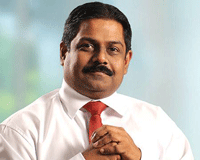 The Commercial Bank of Ceylon PLC has announced the appointment of Mr Sivakrishnarajah Renganathan, the Bank’s Deputy General Manager – Personal Banking, as Chief Operating Officer (COO) and Executive Director with effect from 17th July 2014.
A career banker who has served Commercial Bank throughout the entirety of his 34-year working career, Mr Renganathan has held several key positions in the Corporate Management.
The Commercial Bank of Ceylon PLC has announced the appointment of Mr Sivakrishnarajah Renganathan, the Bank’s Deputy General Manager – Personal Banking, as Chief Operating Officer (COO) and Executive Director with effect from 17th July 2014.
A career banker who has served Commercial Bank throughout the entirety of his 34-year working career, Mr Renganathan has held several key positions in the Corporate Management.
In July 2003, he led the Bank’s acquisition of the Bangladesh operations of Credit Agricole Indosuez (CAI), Commercial Bank’s first ever acquisition of a banking operation, and was appointed Country Manager – Bangladesh, in which capacity he led a team of 225 over a five year tenure, building up the Bank’s operations in Bangladesh. S Renganathan is a Fellow of the Chartered Institute of Management Accountants, UK (FCMA), Fellow of the IFS School of Finance, UK (Fifs) and a Fellow of the Institute of Bankers Sri Lanka (FIB). He is also an associate member of Financial Services Institute of Australasia.
He has served among others, as a Member of the General Council of the Institute of Bankers of Bangladesh, as founder President of the Sri Lanka Bangladesh Chamber of Commerce and Industry, Executive Committee member of the Foreign Investors Chamber of Commerce and Industry and as Assistant Treasurer of the Sri Lanka India Society. Commercial Bank ended FY 2013 with gross income of Rs 73.16 billion, profit before tax of Rs 14.51 billion, profit after tax of Rs 10.445 billion and assets of Rs 606.607 billion.
The only Sri Lankan Bank to be ranked among the world’s top 1000 Banks for four successive years, Commercial Bank operates a network of 237 computer-linked service points and the country’s single largest ATM network of 597 terminals. The Bank has been adjudged ‘Best Bank in Sri Lanka’ for 16 consecutive years by ‘Global Finance’ Magazine and has won multiple awards as the country’s best Bank from ‘The Banker’, ‘Finance Asia’, ‘Euromoney’ and ‘Trade Finance’ magazines.
...................................................
A Respected Banker and a Distiguished Old Boy
Sivakrishnarajah Renganathan who has served Commercial Bank of Ceylon throughout the entirety of his career for more than 38 years and has held several key positions in the Bank.
In July 2003, he was appointed as the first Country Manager of the Bank’s Bangladesh operations which was the first ever overseas operations of the Bank.
He led the team to acquire the banking operations of Credit Agricole Indosuez and established the Bank’s operations in a successful manner with high rating during his first five years tenure.
On his return to the country, he was appointed as the Bank’s first Chief Risk Officer (CRO) and was responsible for preparing and implementing the Bank’s Integrated Risk Management Policies. In April 2011, he was appointed as the Deputy General Manager – Personal Banking Division, with overall responsibility to manage the Bank’s entire branch network.
He was appointed as the Chief Operating Officer and an Executive Director of the Bank Board in July 2014. .
Since July 27,2018 he has been appointed to the pivotal role of Managing Director/ Chief Executive Officer of the Bank which has an asset base of LKR 1.3 Trillions and a gross revenue of LKR 140 Bn.
In addition he also serves on the Boards of Commercial Development Company PLC, a listed company in the Colombo Stock Exchange as the Managing Director and Commercial Bank of Maldives Private Limited, a licensed commercial Bank in Maldives as the Deputy Chairman.
He is a Director of Lanka Financial Services Bureau Limited and Sri Lanka Banks’ Association (Guarantee) Limited.
He is also a Vice Chairman of International Chamber of Commerce Sri Lanka, Executive Member of The Ceylon Chamber of Commerce, Executive Member of The Council for Business with Britain and Treasurer of Sri Lanka India Society and an advisor to the District Governor of Lions Club International - District 306 B1.
He has served among others, as a Member of the General Council of the Institute of Bankers of Bangladesh, Founder President of the Sri Lanka Bangladesh Chamber of Commerce and Industry, Executive Member of the Foreign Investors Chamber of Commerce and Industry in Bangladesh, Past Secretary of the Executives Association of the Bank, Cabinet Treasurer of Lions Clubs International - District 306 B1 for three years and a member of the Cabinet during the past more than 5 years.
In recognition of his social service he was appointed by the Ministry of Justice as a whole island Justice of Peace.
He has been active in supporting his alma mater, Wesley College, Colombo and is a Vice President of the Old Boys Union, past President of the Old Wesleyites Sports Club, past Treasurer of the Welfare Society and Assistant Secretary of the Parents Teachers Association.
S Renganathan is a Fellow of the Chartered Institute of Management Accountants, UK (FCMA), Chartered Global Management Accountant (CGMA), Fellow of the London Institute of Banking & Finance, UK (FLIBF) and a Fellow of the Institute of Bankers Sri Lanka (FIB). He has received extensive Leadership, Management and Banking training in the USA, London, Japan, Thailand, Abu Dhabi, India and many other countries.
...................................................
Mr S Renganathan Director (Independent / Non Executive) Hatton National Bank
Appointed: 2nd April 2024
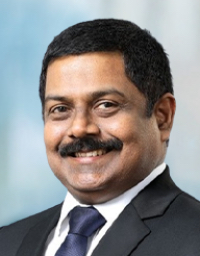 Mr. Renganathan was the former Managing Director/ Chief Executive Officer of Commercial Bank of Ceylon PLC and had held several key positions in the Bank. In addition, Mr. Renganathan served as the Managing Director and a Board Member of the Commercial Development Company PLC, and Commercial Bank of Maldives Private Limited as the Deputy Chairman.
Mr. Renganathan was the former Managing Director/ Chief Executive Officer of Commercial Bank of Ceylon PLC and had held several key positions in the Bank. In addition, Mr. Renganathan served as the Managing Director and a Board Member of the Commercial Development Company PLC, and Commercial Bank of Maldives Private Limited as the Deputy Chairman.
Mr. Renganathan has served among others, as a Member of the General Council of the Institute of Bankers of Bangladesh, Founder President of the Sri Lanka Bangladesh Chamber of Commerce and Industry, Executive Member of the Foreign Investors Chamber of Commerce and Industry in Bangladesh.
He is a senior banker counting over 41 years and has led Commercial Bank’s acquisition of the banking operations of Credit Agricole Indosuez in Bangladesh. He was the first Chief Risk Officer of the Bank and has held positions as the Deputy General Manager in charge of Bank’s island wide branch network and Chief Operating Officer.
He served as an Executive Director in the Board of Directors of the Commercial Bank of Ceylon PLC for nearly eight years.
He was also a Director of the Lanka Financial Services Bureau Limited and the Sri Lanka Banks’ Association (Guarantee) Limited. Further, he also served as a Council Member of the Employers Federation of Ceylon, Executive member of the Council for Business with Britain, Vice Chairman of the International Chamber of Commerce Sri Lanka, and Executive Member of the Ceylon Chamber of Commerce.
He is presently serving as a Member of the International Chamber of Commerce Sri Lanka Policy Advocacy Committee, Sri Lanka Institute of Directors and the Vice President of the Sri Lanka India Society.
Mr. Renganathan currently serves as an Independent Non-Executive Director at Sunshine Holdings PLC, Sunshine Healthcare Ltd., Agility Innovations (PVT) Ltd, Janashakthi Insurance PLC, Ceylon Hospitals PLC, Lina Spiro (PVT) Ltd, Lina Manufacturing (Private) Ltd., Healthguard (Pvt) Ltd., Deputy Chairman of Damro Holdings Ltd, Chairman of Marino Leisure Holdings Ltd.
He is a Fellow of the Chartered Institute of Management Accountants, UK (FCMA), Chartered Global Management Accountant (CGMA), Fellow of the London Institute of Banking & Finance, UK (FLIBF) and a Fellow of the Institute of Bankers Sri Lanka (FIB), and had received extensive Leadership, Management and Banking training locally and in overseas.
4th February 2015
Ernest Visvasam was a student at Wesley in the 1945/50 period. He won the Dr Solomon Fernando Prize for Mathematics, Mary High field Essay Prize , and passed the SSC in the 1st Division. He then joined the Colombo Commercial Co as an Engineering Apprentice, and was awarded a Scholarship to the UK, to undergo a graduate apprenticeship shop floor training with the Hawker Siddeley Group lasting for two years.This tour included visits to several Manufacturers who were represented by CCC in Colombo. Vlsvasam is a Chartered Mechanical Engineer, and obtained his full Membership of the IMechE in early 1960. Whilst in Colombo, he was a Vice President of the OBU. He worked as a Senior Engineer at Colombo Commercial Co and emigrated to Australia in 1974. He worked as an Engineer there until he retired in 1995 after 36 years in the Engineering Profession. He now spends his retirement in New South Wales.
Links to further reading
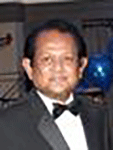 |
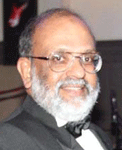 |
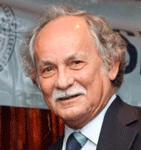 |
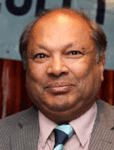 |
| Ana Thevathasan | Azahim Mohamed | Brian Mack | Layton Vanderput |
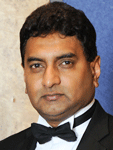 |
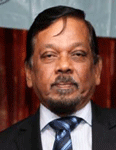 |
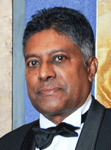 |
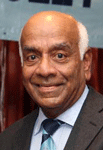 |
| Nalin Perera | Paul David | Rex Devadason | Senthil Sinniah |
By Keith de Kretser
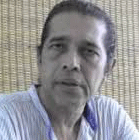 |
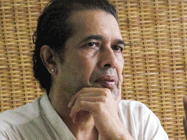 |
After five weeks have elapsed since the new government took over, two independent, senior journalists have been appointed, in place of Rajapaksa henchmen, to head two leading English language national newspapers, namely ‘Daily News’ and ‘Sunday Observer,’ say Lake House sources. Lakshman Gunasekara (59) has been appointed editor of the Sunday Observer. Mr. Gunasekara is the founder president of of the South Asia Free Media Association (SAFMA) - Sri Lanka branch. He was editor of ‘Sunday Observer’ previously from 1994 to 1999. He was a founder member and one time Secretary and Trustee of the Free Media Movement, and has long been active in media and human rights work parallel to his career as a mainstream newspaper journalist. He was part of the founding team of the Sunday Leader newspaper whose founder-Editor is perhaps the most prominent Sri Lankan journalist to have been harassed and then assassinated.
Lakshman or “Lucky” to his many friends was a student at Wesley College, joining Wesley in 1965 from St Thomas’ Prep School with the likes of Wilhelm Van Dort, Sunil Fernando, Hemantha Cooray, Gamini de Silva and Anton Selvadurai. Lucky was of fair complexion, wore glasses and was very conscious of his hair. He was a very polite, well mannered and respectful lad and was subject to the occasional teasing by his friends.
His mother Mrs Marbit Gunasekera was Principal of Methodist College (1967 & 1968). He also had a sister Nelun who caught the eye of many a Wesleyite. Lucky lived in Wellawatte near the corner of Galle Road and Charlemont Road opposite the Savoy cinema. There were a number of Wesleyites who lived in the vicinity including myself and we attended the Methodist Church Wellawatte and the Sunday school. Rohith Fernando, Sunil Fernando, David and Keith Grenier, Rommell and Wavell Pereira, Gamini and Hiran de Silva, Carlyle Wells-Peris, Christopher Goonewardene, Lucky and I were regulars at church and Sunday school and rode on the school bus each day. I had the privilege of meeting Lucky in 2010 when I was in Sri Lanka on a holiday and it was great to catch up with him after forty years. From my conversations with him I gathered that he was a strong advocate for free speech and human rights and at the time kept a low profile for obvious reasons.
As Wesleyites we should all be proud of Lucky and his appointment as Editor of the Sunday Observer. We wish him well as his publication pursues the truth and reports in a balanced and transparent manner. Well done Lucky!
A Brave New State Media? By Lakshman Gunasekara
The changes in leadership that the country’s public-owned news media institutions undergo along with changes in government is now so automatic that it is almost a hallowed tradition.
In one venerable public-owned institution, for example, there is a permanent ‘consultants’ room’ where, come regime change, politically appointed senior media managers of the ancient regime are put into cold storage on being displaced in their posts by the political appointees of the new regime. Sometimes, media executives who had been hibernating in the consultants’ room are rehabilitated and march out to resume their former or new positions while those displaced troop into that room to sit out the tenure of the new regime.
The bulk of the staff in these institutions, however, remain in their work stations, resigned to continuing the same kind of sycophancy and propaganda-style news production in lieu of the professional journalism that they would like to do. Incoming managers, in the past, have tended to
follow the now traditional policy of pro-Government and anti-Opposition propaganda, promotion of political personalities and even dis-information to divert public attention from governmental failures and mis-rule.
This insidious ‘tradition’, hopefully, has been broken by the historic political change that occurred with the presidential election on January 8. Whether the new political environment will remain conducive to substantive and enduring change in the public-owned mass media sector remains to be seen and, depends on how current national political dynamics evolve.
Previously, with regime change, incoming government tended to merely replace managers with their own trusted spin doctors and continue with the same old propagandist practices. The only previous exception to this continuity was in 1994, when, as a result of public exhaustion over the overbearing propaganda and authoritarianism of the pre-1994 regime, the incoming Chandrika Kumaratunga-led government did attempt to fulfill its promise of ‘liberalisation’ of the State media.
For a couple of years, the State media did enjoy relatively liberal management and the public was slightly incredulous at this suddenly liberal State media behaviour. But the Kumaratunga regime fell prey to that vital dynamic of competitive democracy, namely, the criticisms of the political opposition. In addition to the politicians’ need for self-aggrandizement, all governments face the far more important challenge of a critical Opposition.
A critical and watchful political opposition is an essential pillar of a normally functioning liberal democracy. With a vociferous opposition inside and outside Parliament and struggling with the armed insurgent opposition of the Tamil secessionist movement and international propaganda by supportive elements in the Sri Lankan Diaspora, the Kumaratunga regime instinctively resorted to using the State media in defensive mode as did all previous regimes. Thus, the State media enjoyed only a short-lived liberal honeymoon.
This time, however, the political landscape is totally transformed as never before. Most importantly, there is the broadest ever consensual government that Sri Lanka has experienced as a modern republic, perhaps, in this island society’s entire history. There is a nation-wide sense of urgency to repair and recover the basic structures of the Sri Lankan polity after a decade of very serious decay and near collapse. Indeed, for those concerned about nationhood, there is compulsion for rebuilding civilisation. This consensus and these compulsions alone provide a good basis for consistency in government policy. Additionally, and more specifically relevant to the State media is the lack of a coherent and legitimised political opposition.
The lack of a legitimised Opposition whose criticisms are seen as valid by powerful vote banks, has reduced the pressure on the regime to defend itself via the State media (leave aside white vans and other past repressive tools). Thus there is an opportunity for the country’s news media both private and public sector to liberally report, criticise, expose and, most importantly convey the aspirations, grievances and celebrations of the mass of people and all communities, small or big. This is a precious moment in our history when the State media can leap beyond the restraints of political caution, propagandist manipulation and vendetta and function more responsibly to serve the public.
The country’s joint national leadership has the opportunity now to enable the publicly owned mass media to truly serve the citizenry as a critical and watchful media. The critical media will hold up a mirror for the rulers to truly see themselves rather than any ‘graven images’ that sycophancy creates and then leads them astray along with the people.
From Dr Nihal D Amerasekera
We are greatly honoured as Wesleyites by the appointment of Lakshman Gunasekera as the Editor of one of the most pretigious journals in Sri Lanka. To be a journalist in Sri Lanka during the insurgency, ethnic conflict and political turmoil requires courage and a lot of it. Intimidation, threats, assaults and killings have been a part of life for journalists for many decades and more so in the past 5 years. We take great pride in the stance taken by Lakshman during these turbulent times not to give in to political pressure and for organising the Free Media Movement to fight for justice and human rights for journalists.
He serves as a member of the Press Complaints Commission. He was a founding journalist of The Sunday Leader newspaper. Recently Lakshman worked as the Sri Lanka Correspondent for Japan’s Yomiuri Shimbun, a newspaper of the highest quality with a readership of 13.5 million, reaching all socio-economic groups in Japan,. Lakshman is a University of Michigan (USA) Journalism Fellow and also a Visiting Fellow at the Centre for the Study of Developing Societies (Delhi). Lakshman has taught journalism in the University of Colombo. He has lectured at the Asian College of Journalism, Chennai and the Institute for Defence Studies & Analysis, Delhi.
On behalf of the Brotherhood of Wesleyites we wish him well in his new position.
Ranjith was at school 1952-62
Ranjit was born on the 20th of September 1940. He is my cousin and we grew up together in Nugegoda. Ranjit started his education at the Royal Primary School where he was known for his prowess in wrestling. He had an enormous appetite in those days and was a big guy for his age. I recall with much nostalgia playing cricket with him and his sister who was my age. As I remember studying was something alien to him and when he returned home from school there was just one thing on his mind – cricket.
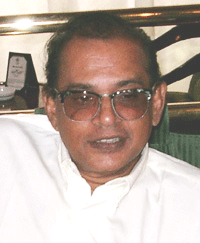 Ranjith left Royal to join Wesley College in 1952 in Form 1 which I believe in the modern curriculum is year 6. Ranjith had a privileged upbringing in a loving family. His parents were now in the new Railway Housing Estate in Dematagoda opposite the Police Station. Ivan Bowen and the Carnie brothers lived on the same road. He walked daily to school, played cricket and got involved in the fun and mischief like the rest of us. As he was 2 years my senior in age I looked up to him and learnt much from him. He was modest and considerate and never laughed at my mistakes. Ranjith showed immense kindness and understanding for his age. He was the eldest of the cousins and had enormous influence on us all.
Ranjith left Royal to join Wesley College in 1952 in Form 1 which I believe in the modern curriculum is year 6. Ranjith had a privileged upbringing in a loving family. His parents were now in the new Railway Housing Estate in Dematagoda opposite the Police Station. Ivan Bowen and the Carnie brothers lived on the same road. He walked daily to school, played cricket and got involved in the fun and mischief like the rest of us. As he was 2 years my senior in age I looked up to him and learnt much from him. He was modest and considerate and never laughed at my mistakes. Ranjith showed immense kindness and understanding for his age. He was the eldest of the cousins and had enormous influence on us all.
My parents were in Gampaha 1952-56 and then in Katunayake 1956-58. During the school holidays Ranjith stayed with us. We had such a wonderful time playing cricket and football from dawn to dusk. There were times we roamed the forests for wild fruits, went fishing in murky ponds and swam in muddy pools. These were pleasures which stemmed from our youthful exuberance. I remember the vigour and the sense of adventure as we set out on our journeys. Those times were a rich gift. Ranjith was a voracious reader and appreciated the Arts. His drawings were colourful. His caricatures were wonderful works of art. I recall once when he created from mud and clay the figure of Jiggs, the American cartoon character, from Bringing up Father by Geo McManus. That was indeed a masterpiece.
My abiding memory from those days is his excellent general knowledge and his gift for writing essays. As he was well read he was articulate and had a fine command of the English language. At Wesley he did well in class and won several prizes at the prestigious school Prize Giving. Although his talents were for the Arts there was the inevitable family pressure to study the sciences with a possibility of becoming a doctor. He knuckled down to some serious hard work in 1957 for the SSC obtaining the required 5 credits with a distinction to study medicine at University.
I remember he was a fine cricketer and a good athlete. Although he went for cricket practices with a view to playing for the school he never applied himself fully and never fulfilled his early promise. He loved the good life and enjoyed the friendships and tomfoolery at school. Well-spoken, with his trademark humorous comments, good looks and a winning smile, he became a popular figure. He was kindly and courteous which endeared him to many who knew him. At school we all had nicknames and Ranjit was called "Boat". By his affable manner and charm he made many friends. He engaged actively in the life of the school. I well recall he wrote a fine piece about the life of the Classical Composer Giuseppe Verdi for the 1958 Double Blue Magazine. He spoke to us about the great tenors Enrico Caruso and Mario Lanza and the fine artistry of the conductor Arturo Toscanini. That was the extent of his knowledge and love for opera and classical music.
It was around this time when he was in the 6th form at Wesley he lost his focus on his studies and slowly drifted away from academia. Ranjith took life easy and enjoyed it. He continued to enjoy sports and social life at school. Although we expected a glittering career it did not quite happen. Ranjith was dispirited, disillusioned and disappointed. Outwardly he seemed happy and got on with his life.
He failed the University entrance a couple of times and decided to take on a job in the Railways (CGR) as an apprentice. His interest was to become a Colour Lights Signals Supervisor. This environment can be a daunting experience for a young man. There was a strong culture of drinking and partying which changed his personality and life. Alcohol in excess takes away the sacredness and dignity of a human being. Ranjith never fulfilled his potential in the CGR. His life was not without mishap during those tragic years. He was relentlessly buffeted by the surging tides caused by his time at CGR. He became a bon viveur who drank, smoked and enjoyed life. Those convulsive changes to his personality had a lasting effect on him. He never fully returned to his normal affable self. His family felt the physical and emotional consequences of this change. He retired early after several years of service in the organization in which his father held a prestigious position. In the years that followed Ranjith tried ever so hard to regain his lost esteem with only some success.
After retirement Ranjith taught English and helped the Alcoholics Anonymous in a voluntary capacity. His work was greatly appreciated by all. His talents and brilliance shone through. Ranjith was greatly admired by those with whom he worked. This he did for many years and it gave him great pleasure and self fulfilment. When he retired his interests changed to philosophy and religion. His bookshelf was stacked with books on Philosophy. Ranjith converted to Christianity after being a Buddhist since childhood.
Whenever I visited Sri Lanka he came to see me in a 3-Wheeler wearing a broad smile. We often got together for a meal. There we reminisced our days in Nugegoda, Gampaha and Katunayake and the many escapades, pranks and mischief we enjoyed. He had a fine memory and remembered much. There was so much to talk about of our younger days. He would relay amusing incidents from his experiences, appropriately embellished to good effect. He made light of the ups and downs of his own life.
We often made a pilgrimage to Wesley College to walk those long corridors once again. Visiting the Great Hall and the Science Laboratories brought back many memories. In that environment I often saw that "far away look" in Ranjith as he recalled those happy times. I was struck by his warmth despite repeated adversity. He knew a lot about his friends at Wesley, where they were and what they were upto. Ranjith had a tremendous love for his old school and remembered his friends with much fondness.
Ranjith was witty and engaging and had a fine sophisticated sense of humour. When he was in a joking mood Ranjith was never less than charm itself. He was a great talent and a fine friend. It was a privilege to spend time with him. Many of his jokes were of his own creation, cleverly put together, about mundane day to day events in our lives. His spontaneous 'one liners' were priceless. It was true that later in life his idiosyncrasies led to complicated relations with others. Yet such episodes only inspired affection and understanding, knowing what he has been through.
Ranjith's life is a story of flair and accomplishment, but also of human frailty, divided loyalty, mistakes, unfulfilled potential and personal misfortune. In this maze his talents were lost and forgotten. Life can be cruel at times. He made unwise choices with dire repercussions. Ranjith was a man of such puzzling conflicts of character. He lived the way he wanted. With him no amount of reasoning, discussion or persuasion was ever possible to make him change his mind. Some prefer to call it the awesome force of destiny.
Sadly he was unable to enjoy his retirement with his family for long as his reckless past caught up with him. Serious illness struck from out of the blue. To all those who know him he will always remain an enigma.
Although I live 5000 miles away from Sri Lanka, there are times I think about him and our childhood together. Those difficult days later on in his life are now a distant memory. I will continue to reflect on those happy times with much nostalgia. As I remember the good times with gratitude I just wish I could sit down with him and put the world to right once more. We can talk about those years gone and our wonderful times together.
Links to further reading
Hi Nihal,
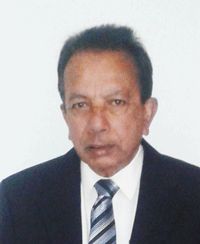 I appreciate your offer to include me in the WCC website. However, my stay in Wesley was short and those few words in Ranjith Dassanayake's reminiscences is more than sufficient. He was a good fellow and a part of the CGR family. He had the potential in 1956 and I did expect him to do very well in the academic field. I knew he joined the Railways but our paths did not cross and I left Ceylon in 1968.
I appreciate your offer to include me in the WCC website. However, my stay in Wesley was short and those few words in Ranjith Dassanayake's reminiscences is more than sufficient. He was a good fellow and a part of the CGR family. He had the potential in 1956 and I did expect him to do very well in the academic field. I knew he joined the Railways but our paths did not cross and I left Ceylon in 1968.
We moved to Trinco and the Bulners were there. Milroy was a close friend and he too departed years ago. The Carnies were with us in Jaffna as well as neighbours. I will have to send a picture of myself when my son is around. I am clueless re selfies and other technological matters. I still use a cheque book which should give you a summary of my progress.
I played under 16 soccer in my 3 years and my last year under Samidon. I was also in the choir of Maxwell De Alwis, when Miss Niles my aunt played the piano, when we sang Palestrina. I am sure you too were there. I met Haig Karunarate who retired after 40 yrs from Wesley recently. He joined in 1958 after my departure in 1957. What he said was a revelation to me. The reason he joined Wesley was because the choirs rendition of Palestrina. I met him in Sam Gnandurai's house here in Canberra, who taught maths in WCC . People join a work place for several reasons, but this is the first time I heard this reason. I told him that I was in that choir. So we can be proud that we were the catalyst for his 40 years service to the church. I also remember you and the boarders coming to Maradana Methodist Church . As my mothers brother Rev DT NIles was the Minister we never missed church. I noted that Ranjit became a Christian. I would love to know , why ?
I graduated from Aquinas and after a brief stint in Shipping went to Nigeria in 1968. I was there till 1985 and during that time I married CJT Thamotheram's niece . Then I moved to Australia in 1986 and worked as an Examiner in the Patents Office in Canberra. Now I am retired. Hoping to visit SL after 30 years. So many people have passed away. Lost touch with all of them. Pity I could not track PS Rodrigo befor his demise. I tried.
I had another Classmate SAM THEVATHASAN. What happened to him ? I have been trolling through websites but only his brothers name comes up, but not Sam.
Good wishes
Mohan
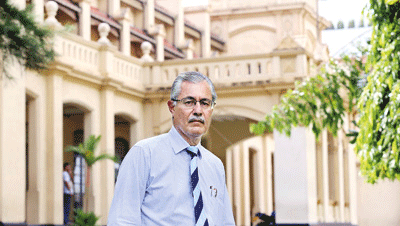 One of Wesley’s distinguished old boys Bill Deutrom is back from Australia to give his alma mater a helping hand.Bill Deutrom isn’t too comfortable talking about himself – characteristically so for a man whose actions have always been his calling card. In his long career, the eminent businessman in Australia has worn many hats and faced many challenges but what brings him back to the land he left behind in the ’60s is simply a call of the heart. These past few months, the distinguished old boy of Wesley College is a man with a new mission – to make his beloved alma mater the best school of all. It may seem a tall order but Arthur William Deutrom is all seriousness. The premier Methodist boys’ school, Wesley College, founded in 1874, is steeped in history and proud tradition, has produced statesmen, scholars and sportsmen of distinction, yet perhaps lacks the recognition its more vaunted peers receive. The potential for excellence, he is convinced, is there. Every morning at 7.30 a.m, he is at ‘College’ , impeccably dressed in long-sleeved shirt and tie despite the sticky heat. Folk at Wesley, from the students to the staff and minor employees have grown accustomed to the lanky figure patrolling the corridors. There isn’t much that his eagle eye misses.
One of Wesley’s distinguished old boys Bill Deutrom is back from Australia to give his alma mater a helping hand.Bill Deutrom isn’t too comfortable talking about himself – characteristically so for a man whose actions have always been his calling card. In his long career, the eminent businessman in Australia has worn many hats and faced many challenges but what brings him back to the land he left behind in the ’60s is simply a call of the heart. These past few months, the distinguished old boy of Wesley College is a man with a new mission – to make his beloved alma mater the best school of all. It may seem a tall order but Arthur William Deutrom is all seriousness. The premier Methodist boys’ school, Wesley College, founded in 1874, is steeped in history and proud tradition, has produced statesmen, scholars and sportsmen of distinction, yet perhaps lacks the recognition its more vaunted peers receive. The potential for excellence, he is convinced, is there. Every morning at 7.30 a.m, he is at ‘College’ , impeccably dressed in long-sleeved shirt and tie despite the sticky heat. Folk at Wesley, from the students to the staff and minor employees have grown accustomed to the lanky figure patrolling the corridors. There isn’t much that his eagle eye misses.
He is here just to help, he stresses, no official capacity, but that help has been substantial as he liaises with the school’s governing body and main committees involved in its administration. In the interim period as Wesley awaits a new principal after the highly results-oriented Dr. Shanti McLelland’s term, Acting Principal, old Trinitian Upali Ratnayake is at the helm, and Bill Deutrom is there to help in any area -Sports, Finance, Maintenance — people all know they can turn to him.
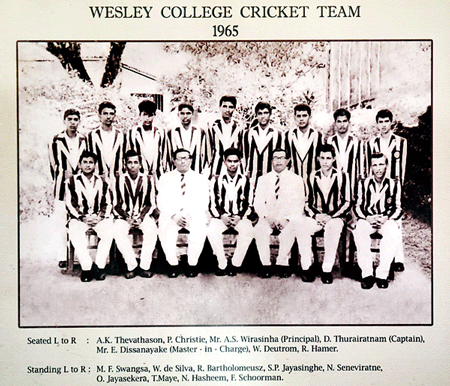
“Bill has always been a great benefactor of our school over the years- financially and in so many ways, ever ready to galvanise things into action. This time he readily responded to our call and agreed to come back to the country for a period, selflessly giving his time, to get things done,” commented another old boy. Bill’s Wesley ties stretch back more than a few decades. It was in 1949 that the young Arthur William joined Wesley and 1965 when he left, in-between stamping his mark as an excellent sportsman, earning colours in cricket, rugby, tennis and hockey, and playing for the Public Schools hockey team, also being a house captain (Passmore) and prefect. His mother Doris Deutrom was a well-loved kindergarten teacher at Wesley- she also taught music, but her son has other less fond memories of her presence in school. Those were the days when errant behaviour earned a beating and he recalls with a wry smile, being hauled out of detention and roundly smacked by her.
Bashur Musafer, a past President of OBA - NSW, Australia (I reckon the best sportsman Wesley has produced in the 1960's) makes his observation below of the situation at College. Also he highlights the great efforts Bill Deutrom and a team of dedicated Wesleyites are doing to improve the conditions there.
The NSW branch has contributed over $ 5,200.00 in the year 2014/15, to various College projects. We are having our Dance this year on 26th Sept. 2015 at the Epping Club, Epping. All Wesleyites please attend this dance, so that our branch can continue supporting College.
 We must pay tribute to Bill who has done so much for Wesley over such a long time. We admire his courage and determination to bring the school back to its former glory, against all odds. Bill had made a tremendous contribution to the welfare of the school. Whenever Wesley needed a financial contribution Bill has been extremely generous.
We must pay tribute to Bill who has done so much for Wesley over such a long time. We admire his courage and determination to bring the school back to its former glory, against all odds. Bill had made a tremendous contribution to the welfare of the school. Whenever Wesley needed a financial contribution Bill has been extremely generous.
Bill has argued passionately for peace during the years of strife at school which devided and destroyed the unity in our brotherhood. He fought both publicly and privately to bring the factions together with much success. Bill took great delight at the revival of the school, after the thirty year decline, and made a tremendous contribution to help Wesley get back onto its feet.
It is wonderful to pay tribute when the recipient of the adulation is alive and able to appreciate our thanks. He has been a true friend to the school both as a student and an old boy. Bill, you are indeed a legend at Wesley, as I hear from Old Boys from around the world. Many have asked me why isn't Bill the Principal or a person of greater authority at Wesley? As loyal old boys I am sure you know the answers to those questions.
Caring for the bricks and mortar and the campus is a never ending task. Although great strides have been made in this regard there is still much to be done. Thanks to Bill and his team it's happening now as we speak.
Sociable and popular, Bill will always remain a friend to the school and its old boys.
From Bashur Musafer
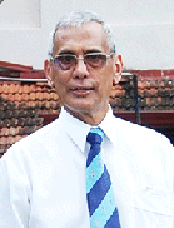 I met Bill Deutrom in Sri Lanka by accident, he has been in SL for the last three months working at College in a variety of roles trying to improve everything at Wesley.His presence has been brought about by the departure of Dr Shanthi Mclelland and the absence of his successor till now. I had the opportunity to visit college and also accompany
him for two rugger matches. including a plate final. which we won. He has with him a dedicated team of prominent old boys all with the best of intentions to revamp and bring about some radical changes and improvement in almost every sphere of the college activities ranging from the financial management and accountability, teaching
responsibilities, student discipline, maintenance of the buildings. class room equipment, Hygiene and sanitation, Occupational health and Safety,Landscaping and improving the overall appearance and image of the college. He has been working seven days a week together with the team who have spent many of their weekends in drawing up plans to
achieve the desired results for which they must be commended.
I met Bill Deutrom in Sri Lanka by accident, he has been in SL for the last three months working at College in a variety of roles trying to improve everything at Wesley.His presence has been brought about by the departure of Dr Shanthi Mclelland and the absence of his successor till now. I had the opportunity to visit college and also accompany
him for two rugger matches. including a plate final. which we won. He has with him a dedicated team of prominent old boys all with the best of intentions to revamp and bring about some radical changes and improvement in almost every sphere of the college activities ranging from the financial management and accountability, teaching
responsibilities, student discipline, maintenance of the buildings. class room equipment, Hygiene and sanitation, Occupational health and Safety,Landscaping and improving the overall appearance and image of the college. He has been working seven days a week together with the team who have spent many of their weekends in drawing up plans to
achieve the desired results for which they must be commended.
It has been over fifty year since I left school and never had the occasion to do a detailed tour except for the brief re-union of old boys co-ordinated by L.C.R Wijesinghe about three years ago. Even at that time it was quite evident that Wesley had grown and expanded beyond belief and needed a lot of support to maintain and improve all of its administrative, educational , sports and extra curricular activities to an acceptable standard . Every sports activity these days needs a huge injection of cash borne by the school and parents and funded by old boys and well wishers.
Rugby for instance is far different to my playing days when we had to borrow boots, swap jerseys and play on the hard uneven surface of Campbell Park. These days we have as our home ground the CR & FC grounds for which we pay together for security and also seek police assistance as a precautionary measure .Coaches are professional and have to be paid, A first aid team is on hand. The players are kitted in smart short sleeved jerseys, track pants and tops whose costs I believe are borne by the college and parents. It was very pleasing to see the college prefects decked in their smart dark blue blazers and white trousers ushering in the spectators, even some of the ardent supporters were decked out in specially made clothing sporting the college colours.. Admission to the matches is by ticket incurring another cost to the supporters. I am sure cricket too involves similar costs not forgetting the other sports and other activities which have to be encouraged.
My observations in respect of the tasks that Bill intends to address and is harnessing support from personal contacts, well wishers and donors is as listed.
There is no doubt that vast improvements have been made possible by the generosity and commitment of the Old Boys but more needs to be done.
The college now caters to over over two thousand students and the demands are more challenging. The wear and tear of the wooden floorboards and staircases is excessive. The walls and surrounds are easily made dirty with the heavy traffic of the students.
There are many new buildings that have replaced the old but they too need repairs and maintenance, whilst some of the old still remain such as the Hostel accomodation and the kitchen which needs a fair amount of refurbishment.
There is a need for a industrial washing machine. The main building the Highfield Block needs a fair amount of repair and painting. The overhead fans in the majestic hall are to be replaced hopefully through a donor.
The electrical cables in most of the class rooms need to be re-wired. Some preliminary work has already been undertaken. The class rooms need a fresh coat of paint ,the desks need repairs and painting. It was observed that old boys of certain classes had made specific contributions toward the upgrade of some classrooms.
Advice is to be sought to improve or relocate the computer room. The general cleanliness and appearance of the premises needs to be improved. to this end he has introduced garbage bins and is encouraging the students with the assistance of the prefects to observe a culture of a litter free environment .
The services of a gardener are being used to landscape the college entrance and its environs and it is hoped that improvements be made to create a lasting first impression of any visitor and impart some pride in the students that they belong to a special school.
The basket ball court which is adjacent to the main building and in a part of the tarred road surface needs to be resurfaced. He is working on the improvement of the toilet and bathing facilities which are hampered by a lack of an adequate supply of water by erecting a higher water tower with a bigger capacity. From them days we know how poor these facilities were, though better than in the past they are still in need of improvement. He is hoping to install four large exhaust fans kind courtesy of a donor to take away the stench of urine which can be overpowering at times when there is inadequate water. Together with this he wants to bring a sense of awareness of better personal hygiene and toilet use to the students. Sadly this is something sadly lacking in Sri Lanka as a whole and not being addressed seriously.
There is a fair amount of tidying up to be done within the school premises front and rear as there are many hazards that are present as a result of poor building practices and renovations that have to be removed to provide a safe environment. Pot holes and uneven surfaces have to be levelled and probably paved to last a life time in a many areas. If this is done it will help with the general maintenance, safety and overall appearance.
All of these tasks cannot be done overnight nor by a single individual . In short there is so much to be done with limited funds and few helping hands. What i would like to say is that we should support Bill and his team in whatever way we can big or small or maybe secure sponsors with contacts you may have, to help improve Wesley. Maybe we could help towards taking ownership of a single project that will help. Can we as proud old Wesleyites help lift Wesley's image and usher in a new future for the new generations of Wesleyites to come. I am sure we can.
"And when Wesley's call shall sound, ready aye' shall all be found "
BSc (Economics) Honours, University of London, UK
MS (Agricultural Economics), Michigan State University, USA
PhD Michigan State University, USA
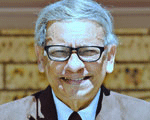 Nicholas Samuel is a professional writer and former Chair Professor. He was previously research manager and senior policy analyst in the Australian government's economics research bureau. He played a leadership role in the deregulation of Australia's primary industries. He held the position of Chair Professor of Agribusiness at the prestigious University of Adelaide and served as the managing editor of a professional journal for several years.
Nicholas Samuel is a professional writer and former Chair Professor. He was previously research manager and senior policy analyst in the Australian government's economics research bureau. He played a leadership role in the deregulation of Australia's primary industries. He held the position of Chair Professor of Agribusiness at the prestigious University of Adelaide and served as the managing editor of a professional journal for several years.
Samuel holds degrees from the London School of Economics and Political Science and Michigan State University, and he has had more than one hundred articles published. His writing has appeared internationally in a variety of professional journals and has been recognized with awards for excellence, by the British Literati Club for published research and by the Chinese government for nationwide pioneering market research on behalf of foreign agribusiness.
Samuel is the author of four books, including a text on applied economics published by Macmillan. His most recent title, Unending Recovery, is simple without being superficial and scholarly without being academic; it is a breezy ansharp-witted take on the world's current economic crisis.
By Duvindi Illankoon
Arfath Saleem follows in the footsteps of Dananjaya Hettiarachchi, who brought fame to Sri Lanka last year by becoming the World Champion of Public Speaking at the 2014 Toastmasters International Convention in Kuala Lampur, Malaysia. Arfath, who was mentored by Danajaya, placed in the Top 10 (from a pool of 30,000 applicant speakers) at this year’s competition at the Toastmasters International Convention at Caesar’s Palace, Las Vegas last month. The 26-year-old began speaking at a young age as a student of Wesley College, although he wasn’t genuinely interested until he started taking part in the All Island Best Speaker competition. He was placed runner up in 2011 for his speech ‘The Wall’, but stumbled the next year.
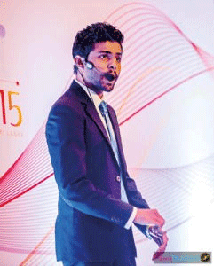
| 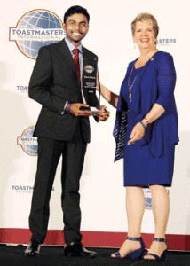
|
“I let it go to my head,” he laughs. “In the end, I didn’t even make it to the finals.” The competition taught him the value of being placed second however, he notes. “When you make it to the top you can become too comfortable there. The person who comes second or third is always striving to do better.”
Arfath joined the Ralph Toastmasters Club in Colombo in 2013. He was inspired by the passion his fellow club members had for public speaking, and was soon rubbing shoulders with the best of them.
In 2013 he took part in his club’s Humorous Speech competition. “I was very nervous,” he remembers. “The first person who laughed was my mother when I told her I was taking part!” Nevertheless Arfath persevered, going on to the district level-in 2014 he was placed second runner up at the District 82 Humorous Speech Contest. In 2013 Arfath attended his first World Champion Public Speaker contest-he didn’t place but was inspired to try again. At Vegas, where this year’s competition was held, Arfath represented Toastmasters District 82 comprising clubs in Chennai, India and all clubs in Sri Lanka.
His prepared speech ‘Orchestra’, about not losing sight of your goal in the razzle dazzle of life, got him through to the convention in Vegas. His speech at the event-the one that placed him in the Top 10-was titled ‘To Be a Legend’. Arfath credits several people for his success-at the top of the list is his family, including dad and “inspiration” Zameen Saleem. Danajaya Hettiarachchi, Dr. Dilip Abayasekara, A. Balraj and Niranjan De Silva are also credited, “especially for helping me understand that humility was a strength, not a weakness.”
In turn Arfath hopes to mentor people when it comes to public speaking in the future, so that they can be inspired the same way he was. After all, he says, “the most successful people aren’t afraid to ask for help.”
By Edmund Dissanayake - From the Island Newspaper 2nd December 2009
Mr. Kenneth Lanerolle, former Principal of three Schools and an outspoken Educationist, once remarked, "Appreciations should be written when the person concerned is alive. Then the person concerned may live longer". It is in that light, that this Eulogy of a true Wesleyite, and my mentor since 1933, is written.
 Shelton was a student at Wesley from 1934 to 1946. He enrolled as a Life Member of the OBU in 1947. He is probably the oldest living Life Member. Shelton was one of the most exalted of Senior Prefects, which office he held in 1945 and 1946. His true personality came into prominence during the regime of Principal, Rev. James Cartman. During World War II, and its aftermath, the significant role played by Shelton has not been published before. Hence this report. Shelton headed a small group of Wesleyites in the cause of Shramadana, shortly after the military handed over the School buildings. It was this small group that took turns as "watchers" of the school property. The Small Park, along with Karlsruhe Gardens, had to be made available for cricket, particularly A deep well had to be filled up. This was done expeditiously. The ground had
to be flattened. Shelton's sense of humour kept us going.
Shelton was a student at Wesley from 1934 to 1946. He enrolled as a Life Member of the OBU in 1947. He is probably the oldest living Life Member. Shelton was one of the most exalted of Senior Prefects, which office he held in 1945 and 1946. His true personality came into prominence during the regime of Principal, Rev. James Cartman. During World War II, and its aftermath, the significant role played by Shelton has not been published before. Hence this report. Shelton headed a small group of Wesleyites in the cause of Shramadana, shortly after the military handed over the School buildings. It was this small group that took turns as "watchers" of the school property. The Small Park, along with Karlsruhe Gardens, had to be made available for cricket, particularly A deep well had to be filled up. This was done expeditiously. The ground had
to be flattened. Shelton's sense of humour kept us going.
The Small Park was soon ready for cricket and soccer. The next project was the area to the south of the former Staff Tennis Court, which was flooded with about three feet of water. The "team" joined hands to relay the earth taken from the soil of the Highfield Memorial Building, before the latter came into existence. Shortly after, the Methodist Church was able to build flats on the earlier flooded area. Subsequently, the Old Boys' Union, headed by the indefatigable Secy Terence de Zylva, ensured the completion of the Highfield Memorial Building.
 |
 |
 |
Campbell Park, wherein several sheds had been built by the military, had to be made ready for sports. What could have been done by the Wesley Boys on their own, was completed in a short space of time.
Shelton had many "firsts" at Wesley. First Secy of the Parent-Teacher Association; Founder President of the Wesley Past Teachers' Fellowship; first recipient of the prestigious Henry Highfield General Merit Award. He was the obvious choice as the Editor of all the Special Issues of the School Magazine - The Diamond Jubilee Magazine of 1949, the Centenary Magazine of 1974, and the 125th Anniversary Magazine. The Tableau "From Dam Street to Karlsruhe" depicting the events of the school from 1974 to the present day, was his handwork. It was he who composed the 125th Anniversary College Anthem which was set to music.
The several poems published by him, giving prominence to important personages and activities at Wesley, have been readily accepted. The James Cartman Library was reorganized by Shelton. It was he who spearheaded I Wesley "War Cry" at Cricket matches "Zam Zam Zakay Zam Zam Zay, Ishuba Ishuba Ooh Ah Eh!" In this, his companions Fred Abeysekera, Dunstan Wijesekera, Neville Weerasekera, Lloyd Peries etc were always with Shelton. Didn't they go to town when Wesley beat Royal and St. Thomas' in 1947, in the Lion's Dens?
Shelton was an excellent debater. Many are the stories in connection with Wesley Inter-Collgiate Debates. Just before one debate, Shelton had worn a sarong to school, and it was expected that the team would do likewise. However the Principal stated that he would cancel the Debate with sister School Methodist College. The Debate was held without incident. The several Scouting Camps, particularly the Camp at Horton Plains where we camped for eight days, being the first to camp under canvas, are but memories. So were the several outings members of the Historical Geographical Association, and particularly the eight days at Jaffna in 1948.
Shelton was indeed a fearless critic of what was wrong and unjust. When the new Wesley Principal, Dr. Shanti Mc Lelland, looked for a person to propose the vote of Thanks at the College Prize Giving on 19th October, he unhesitatingly banked on Shelton. In fact, both at the Centenary Prize Giving when Mrs. Bandaranaike was Chief Guest, and also twice in his capacity as Senior Prefect, he was the Chief Proposer.
This short account of my mentor whom I had known since 1933, has given me much joy and happiness. My wish is that he continue to bat... with a straight bat as he has been doing for the last 86 years.
......................................................................
The Senior Prefect of 2017, Joshua Siriwardene, met Shelton Peiris on the 2nd of March which was his 93rd birthday. He was presented with this gift of a Precious Bible.
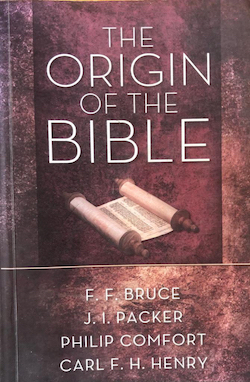 |
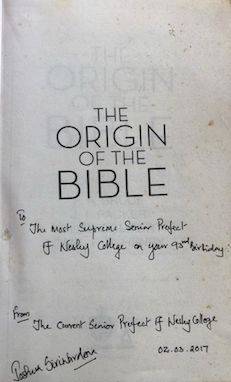 |
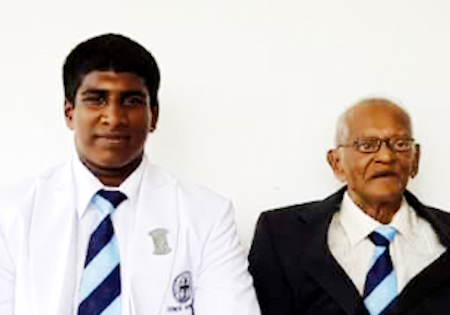 |
.........................................................
A letter from Rienzie Wijetilleke to Shelton Peiris on the 125th Anniversary Souvenir
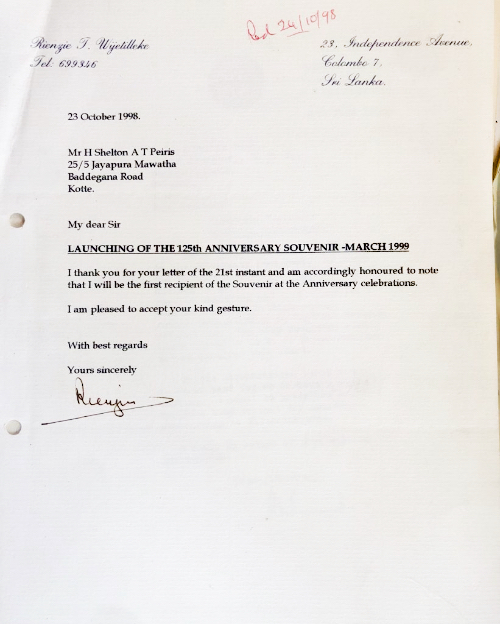
Remembered By Dr Nihal D Amerasekera
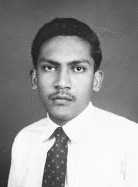 Lakshman was a boarder in the 1950's with his brother Herbert. Being from the Methodist enclave of Kurana Katunayake he joined in the religious activities of the school and was in the school choir. He took part in all the fun and the games in the hostel and at school. I remember him playing softball cricket in Small Park with great enthusiasm. Lakshman was a Prefect at school and in the hostel. As a Prefect he was strict and took no nonsense. He was a good student, hard working and intelligent carrying away many awards at the School's Annual Prize Giving. He entered the Faculty of Medicine in 1958 and qualified as a doctor in 1963. Lakshman was 4 years senior to me in Medical School. I met him many times in the Faculty when we were together but after he qualified our paths never crossed. After a brief spell in the UK he returned to Sri Lanka to become a popular General Practitioner in Colombo. I am unaware if he visited Wesley after he left school. I never saw him at the Grand Reunion of September 2012. The Brotherhood of Wesleyites wishes him well.
Lakshman was a boarder in the 1950's with his brother Herbert. Being from the Methodist enclave of Kurana Katunayake he joined in the religious activities of the school and was in the school choir. He took part in all the fun and the games in the hostel and at school. I remember him playing softball cricket in Small Park with great enthusiasm. Lakshman was a Prefect at school and in the hostel. As a Prefect he was strict and took no nonsense. He was a good student, hard working and intelligent carrying away many awards at the School's Annual Prize Giving. He entered the Faculty of Medicine in 1958 and qualified as a doctor in 1963. Lakshman was 4 years senior to me in Medical School. I met him many times in the Faculty when we were together but after he qualified our paths never crossed. After a brief spell in the UK he returned to Sri Lanka to become a popular General Practitioner in Colombo. I am unaware if he visited Wesley after he left school. I never saw him at the Grand Reunion of September 2012. The Brotherhood of Wesleyites wishes him well.
Transcribed from the Anniversary Chronicle 2024
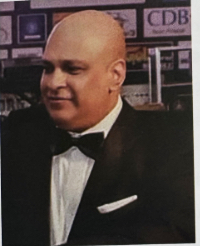 Tuan Reyaz (Richie) Sappideen: Served as Managing Director Emirates Shipping Line, UAE Agents Sterling Navigation Agencies Ltd. Mr. Sappideen began his career in die shipping Industry in 1983at Aitken Spence Shipping Lines Ltd, handling Lloyd Triestino of Italy. He then joined American President Lines in 1986 who were agents for Ceylon Shipping Lines Ltd, and trained in Hong Kong to introduce the online booking system in Sri Lanka. In 1989 he moved to Sealand Service Inc, USA. During this period Richie served as the Chairman Intra Asia Rate Agreement, Deputy Chairman Trans Pacific Rate Agreement.
Tuan Reyaz (Richie) Sappideen: Served as Managing Director Emirates Shipping Line, UAE Agents Sterling Navigation Agencies Ltd. Mr. Sappideen began his career in die shipping Industry in 1983at Aitken Spence Shipping Lines Ltd, handling Lloyd Triestino of Italy. He then joined American President Lines in 1986 who were agents for Ceylon Shipping Lines Ltd, and trained in Hong Kong to introduce the online booking system in Sri Lanka. In 1989 he moved to Sealand Service Inc, USA. During this period Richie served as the Chairman Intra Asia Rate Agreement, Deputy Chairman Trans Pacific Rate Agreement.
In 1999 Richie joined Maersk Line, Denmark AS General Manager. From 2001 to 2007 Richie was Director/ CEO of CSAV Norasia, Chile. Under Richies leadership. Emirates Shipping Line has been awarded Best Shipping Agent -Customer Service - Indian Sub-Continent & Persian Gulf in 2009, Best Shipping Agent - Customer Service - Red Sea and Gulf sector 2010, and the Global Commerce Excellence Award 2012.
.....................................................................
Meeting Richie Sappideen in London in October 2016
By Dr Nihal D Amerasekera
It was with great pleasure I received an email from Richie that he would be visiting London and would be making time for us to meet. We have been in contact by email for more years than I care to remember. They were mostly emails about Wesley and the forthcoming events and functions, lavishly decorated in glorious technicolor.
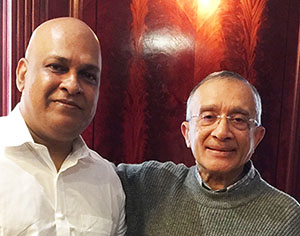 It was an exceptionally mild morning for an autumn day in London. We met at the lounge of the posh Grange Fitzrovia Hotel in Bolsover Street London. Richie and his family were there for 12 days to see the sights of this great city. London is a paradise for theatre lovers like the Richie family. Theatre is indeed a glamorous pastime for the cultured. They had seen most of the shows, a feat not many locals can boast of. It was a great pleasure to meet his charming wife and daughter.
It was an exceptionally mild morning for an autumn day in London. We met at the lounge of the posh Grange Fitzrovia Hotel in Bolsover Street London. Richie and his family were there for 12 days to see the sights of this great city. London is a paradise for theatre lovers like the Richie family. Theatre is indeed a glamorous pastime for the cultured. They had seen most of the shows, a feat not many locals can boast of. It was a great pleasure to meet his charming wife and daughter.
Richie has had an illustrious school career taking part in Athletics, Basket Ball and Junior cricket. He gained the confidence of the Principal, and the staff and the respect of his peers to be appointed a prefect of the school. On leaving Wesley he joined Aitken Spence as a Junior Executive then becoming a Marketing Executive at American President Lines. After receiving training overseas conducted by Forum Corporation USA he was appointed Commercial Manager at Sea Land Shipping Inc, USA. With his brilliant commercial mind and hard work Richie became the General Manager (Commercial) at Maersk Line. Until 2007 he was the CEO/Director of CSAVNorasia Line. Currently he is the Managing Director – Sterling Navigation Agencies Pvt Ltd who are the Agents for Emirates Shipping Lines. Despite all his achievements I was struck by his simplicity, generosity and kindness.
When Wesleyites meet we always talk about school. From the time I can remember Wesley is never short of problems. Rightly or wrongly the school always seems to be in the midst of rumour, innuendo and accusations. There is always a certain hardness and ruthlessness about any form of politics but it is inextricably linked with the politics of management at Wesley. The Methodist Church, Department of Education, the Principal , OBU and Parents - they all have strong views about the running of the school and want it done their way. To be able to please them all is an impossibility. It is a pleasure to speak with a person like Richie who has a formidable grasp of the issues. We all hope a conciliatory and amicable solution will be found.
Richie as always is charming and urbane. He has the courteous and refined manners of a true blue Wesleyite and a gentleman. He is able to discuss them with an open mind without anger, bitterness or rancour. We need more faith in the power of argument to change minds. The principles set out by the founding fathers of the school should be respected. But we have to change with the times and bring the school into the 21st Century.
We were aware right from the beginning that the problems at Wesley will remain unchanged when we depart after our wonderful discussion. He is a practical optimist, an old boy who believed not only that things would get better, but that they could be made to get better. Richie has the remarkable ability to weigh conflicting interests, and come up with a decision that was clearly better.
We have many mutual friends whom we respect and it is a pleasure to speak about them and learn what they are up to now.
- Chairman Dance Committee - "Convergence" - Colombo Hilton 2005
- Head of Organizing - Gala Banquet - "50 Years of Rugby" - Cinnamon Lakeside 2006
- Chairman Dance Committee - "Karlsruhe Centenary" - Waters Edge 2007
- Chairman Dance Committee - "Knights in Double Blue" - Waters Edge 2008
- Chairman Dance Committee - "Stairway to Heaven" - Cinnamon Grand 2009
- Chairman Wesley Walk 2010 – College (Raised Rs 8.9 million net)
- Head of Fund Raising - Swimming Pool Project 2010/11- Wesley College
- Main Organizer – “Proud to be a Wesleyite” 2010– College Premises
- Chairman Org Committee – Founder’s Day Celebrations 2010 & OBU Lunch 2010
- Chairman Org Committee –“Proud to be a Wesleyite 2” 2011 – College premises
- Chairman Organizing Committee - Munchee Cricket Sixes" 2011- Campbell Park
- Chairman Organizing Committee - "Munchee Cricket Sixes" 2012- Campbell Park
- President - Old Wesleyites Sports Club – 2011 to 2013
- Treasurer - Wesley Cricket Reunion 2012 - Galle Face Hotel
- Co-Chairman Organizing Committee – HE Mahinda Rajapakse visit to Wesley College 2012
- Co-Chairman – Felicitation of Champion Rugby team at College Hall 2013
- Head of Organizing – Fete to Rugby Champions at Hotel Hilton 2013
- Co-Chairman -140 year Anniversary Celebrations – Hilton 2014
- Chief Organizer – Principal’s Farewell o/b of Methodist Church at Kingsbury hotel 2014
- Chief Organizer – Farewell to Dr.Shanti McLelland – Principal’s Lawn 2014
- President - Old Boys Union of Wesley College 2014/15
- Member of the Wesley College Board of Governors – March 2014 to March 2016
- Initiator - Classroom Refurbishment Project - Wesley College 2014
- Initiator - Re-installing MH Mohamed Board at Pavilion 2014
- Initiated – Wesley College Updating data base project – 2014
- Initiated provision of uniforms to Wesley College ground staff at Campbell Park - 2015
- Led the Hostel Clean-up Campaign 2014
- Initiated a search for lost Cricket Record boards & transported & put back to Pavilion - 2014
- Initiator - Inventory for Wesley College 2014
- Initiated Sports Council at Wesley College in 2014
- Rolled out the first ever Sports budget at Wesley College in 2014 along with the Sports administrator for 2015.
- Initiator – Wesley College Scholarship Fund - 2014
- Initiator - College Executive Office refurbishment 2015 - Wesley
- Initiator - Official website www.wesleycollege.lk & wesleycollege.lk email domain – 2015
- Committee Member – Wesley Walk 2015
Seeing the long list one cannot fail to admire his enormous dedication and steadfast commitment to Wesley. He is the definitive workaholic to do it all despite his busy work schedule. In whatever capacity he is a quiet but skilled worker with a passionate determination. As he manfully tries to steer the school through the rapids you will never find him having a brawl on email, a clumsy annoyingly common fault. He gives them the silent treatment which is often more effective than a barrage of abuse. Richie’s infectious enthusiasm and his genuine endeavour working for the school usually wins the argument. He is moved by high ideals and is there to make a difference rather than win applause.
The most striking feature I will remember from our recent meeting is his modesty,charisma and affability. I got an insight into the corridors of power at Wesley which I never knew living 5000 miles away from the centre of action.
Richie is one of the most dedicated and impressive Wesleyites of our time. I wish to thank Richie on behalf of the Brotherhood of Wesleyites for his immense contribution to the school over so many years.
From Richard Ebell
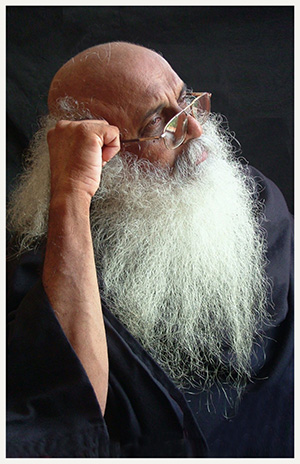 I think this achievement* is well worth conveying to various Wesley audiences at home and abroad. Givantha was a contemporary at Wesley, and is particularly well known to my good friend and colleague Ruvan de Silva. Givantha taught Art at Wesley. He is an extremely talented individual, and his design was recently selected for use on a Sri Lanka stamp to mark the 2016 Olympics**.
I think this achievement* is well worth conveying to various Wesley audiences at home and abroad. Givantha was a contemporary at Wesley, and is particularly well known to my good friend and colleague Ruvan de Silva. Givantha taught Art at Wesley. He is an extremely talented individual, and his design was recently selected for use on a Sri Lanka stamp to mark the 2016 Olympics**.
*- see link "A Lifetime Achievement Award.....".
From Dr Nihal D Amerasekera
It gives me great pleasure to include the achievements and success of past Wesleyites on this website. With his flowing white beard and snowy white hair he looks an artist. We have always known of his creative talents and artistic temperament since Givantha's schooldays. With great pride and joy I include the tremendous contribution and achievements of Givantha Arthasad for the information and appreciation by the Worldwide Brotherhood of Wesleyites.
To be selected from an island wide competition with many hundreds of entries shows his great talent for art. His artistic contribution to the Sri Lankan stamps to commemorate the Rio Olympics will be remembered by all Sri Lankans and the Philatelic world at large for many years to come. On the 21st of November he recieved a special award at the Rupavahini State Awards Festival 2016 held at the Nelum Pokuna, Rangahala, Colombo.
From my recent communications I realise despite the many accolades he remains a modest and self-effacing man and have accepted them with characteristic humility. Givantha has brought honour and glory to his country and the school. We are so pleased he has received his due recognition in his lifetime.
I am grateful for this opportunity to pay this tribute
We wish him well for the future.
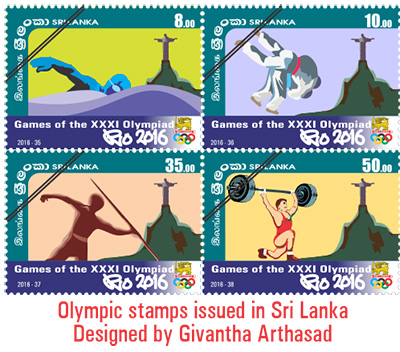
Links to further reading
By Uditha Devapriya
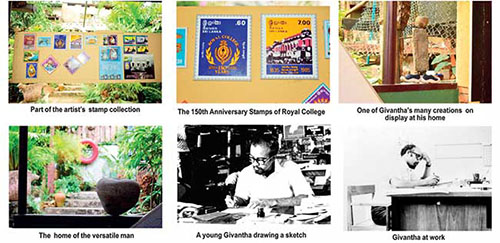
On the way to Moratuwa from Piliyandala you cross the Bolgoda Bridge, where the path bifurcates between the road to Katubedda on your right and the road to Rawathawatta on your left. The road to Rawathawatta is smaller, and yet more crowded: you pass countless furniture shops, fruit and vegetable stalls, fishmongers, and grocery stores, as well as a church and a temple. After driving on for two kilometres, you wind into a suburb called Shramadhana Road, which forks into several small lanes.
This is where Givantha Arthasad lives.
I initially found it difficult to locate him, because of the maze-like lanes that lead to his house. Once I found it, however, all those other houses seemed to vanish before me; this one looked like it stood a world or two apart from them. A series of steps lead to a lower elevation, with copious shrubs and bushes flanking either side. The veranda, where I sat down to meet the man I had come to talk to, was adorned with so much craftwork and so many designs, including paintings and clay figures, that I could only be awed. I felt like I had walked into a lair.
Givantha Arthasad likes to call himself an artist. What kind of artist? Diplomatically, he refrains from answering. For someone who led so many lives – graphic designing, painting, photography, drama, cinema, television, broadcasting, and journalism – calling him an artist hardly captures his versatility, since his contributions surpass anything a crass generalisation of that sort can lead us to assume. This is his story.
He was born Baminihennedige Givantha Arthasad Peiris in Katunayake to a religiously devout father and mother, both of whom were involved in education: his father, George A. Peiris, was the Scout Commissioner of Sri Lanka, while his mother, Dulcie Peiris, worked as a teacher. “I initially attended Methodist College in my hometown, where my father served as principal, before being sent to Wesley College Colombo from Grade Two.”
Givantha inherited his artistic touch from his parents. “My mother used to bring children in our neighbourhood to our home, where she taught them to make toys, sculpt, and paint for free. Naturally, she taught me too.” His father, on the other hand, taught him “to read newspapers upside down, and to read aloud, paying close attention to the dramatic nuances of a passage.” With these early encounters, he moved on to Wesley. His first class teacher there had seen him paint, and, since he painted well for his age, had even once remarked, “You shouldn’t have been born in a country like this.” That classteacher was Cyril Wickramage.
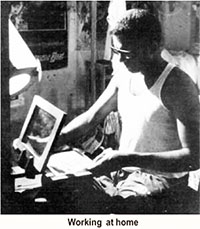 He hadn’t been the only staff member who’d encouraged his talent. “My Grade Three class teacher, Mrs Ivy Marasinghe, used to conduct art classes after school which we helped her with. During weekends she took us to watch cartoons. That’s where I encountered the world of animation, from Mickey Mouse to Donald Duck.” Surprisingly for someone who loved to draw, young Givantha opted for science at Wesley. This became a problem when his studies clashed with his desire to paint and to submit what he painted to various art competitions. The principal of Wesley back then, the renowned educationalist Shelton Wirasinha, had to sign his work before it could be despatched, “and almost every time I went to his office, he’d say something to the tune of ‘Putha, we can’t do this every day, it would be better if you chose art.’”
He hadn’t been the only staff member who’d encouraged his talent. “My Grade Three class teacher, Mrs Ivy Marasinghe, used to conduct art classes after school which we helped her with. During weekends she took us to watch cartoons. That’s where I encountered the world of animation, from Mickey Mouse to Donald Duck.” Surprisingly for someone who loved to draw, young Givantha opted for science at Wesley. This became a problem when his studies clashed with his desire to paint and to submit what he painted to various art competitions. The principal of Wesley back then, the renowned educationalist Shelton Wirasinha, had to sign his work before it could be despatched, “and almost every time I went to his office, he’d say something to the tune of ‘Putha, we can’t do this every day, it would be better if you chose art.’”
Not that he cut himself from science. In fact, physics had been one of his favourite subjects. “As I moved up, I graduated from geometry to mechanical drawing. I can’t say these didn’t influence my career. For instance, when we draw, the foundation for our work is the line and the circle. No matter what those who try to divide art and science try to say, there will always be a scientific aspect to drawing. I realised this very early on.” Still, as he confesses, “Mr Wirasinha’s prodding caused me to wonder whether I ought to be studying science.” Fortunately for him, through the intervention of Wirasinha and Jayantha Premachandra, the head of the Arts Section, he shifted from the science stream to Arts. As for his elders, “my father had wanted me to become a parson due to a promise they’d made to God after the death of my elder brother.” But they gave into his wishes. “After my O Levels, they allowed me to do what I pleased.”
The problem for Givantha was that no institution taught the field he had chosen. “The only place I could go to was Heywood. But Heywood taught music. I realised soon that it wasn’t my cup of tea, so I decided to teach myself.” He reckoned that “an opportunity would come my way.”
The opportunity did come, much sooner than he’d reckoned. Linus Dissanayake, a doctor turned film producer, had started a small but prominent studio called Dissanayake Studios. It had bankrolled Professor Siri Gunasinghe’s groundbreaking film Sath Samudura in 1967, which featured a breakthrough performance by Givantha’s first class teacher at Wesley, Cyril Wickramage. Three years later the studio financed another landmark production, Vasantha Obeyesekere’s Wes Gaththo, also starring Cyril.
By the time of Wes Gaththo’s release, Givantha had come into contact with Dissanayake, “from whom I borrowed a camera and went on to make a short animated sketch on Andare. The Film Critics’ and Journalists’ Association nominated it for their annual Short Film Festival in 1971, where I competed with Sunil Ariyaratne and Dharmasena Pathiraja.”
Givantha’s next destination was Ceylon Theatres, where, thanks to his friendship with the comedian and singer Freddie Silva, he made contact with “a man called Derrick Fernando, who worked as an official there,” and Titus Thotawatte, “who taught me filmmaking and introduced me to Andrew Jayamanne, who taught me cinematography.”
By now he had made another animated short film, Muhuda Yatin Ira Payayi, which won for him a Jury Prize from the Film Critics’ and Journalists’ Association in 1972. His third attempt, seven years later, would leave behind a much larger imprint on cinema.
That third film, Dutugemunu, was not well received by officials at the time of its release in October 1979, though the few ordinary people who saw it had been thrilled by it. Based on an important episode from Sri Lankan history, its charm lay mainly in the dazzlingly novel way it presented an otherwise serious subject. “I didn’t follow a conventional narrative,” Givantha tells me. “Instead of relating the story of the hero, I started with an unlikely beginning: a cat visiting the Ruwanwelisaya Dagaba with its kittens, which ask about the story behind its construction. From there the film relates the Mahavamsa version of events. The cat figures in those events because in one of its previous births, it had served as Dutugemunu’s purohita or chaplain.”
Boasting a prominent cast, including influential figures from Givantha’s own childhood (Cyril Wickramage voiced the eponymous hero, while Felix Premawardhana the thespian, who’d taught literature at Wesley, voiced his main soldier, Nandimitra), Dutugemunu concentrated on the hero’s search for the giants in his battle against Elara. With Henry Jayasena voicing Kavantissa and Givantha voicing various other characters, it was tipped to be a watershed. As things turned out though, “audiences barely noticed it.”
The issue hadn’t been with the audiences. It had instead been with political authorities. In 1977 the United National Party had come to power promising, on the one hand, a dharmista samajayak or a ‘righteous society’, and on the other, ethnic coexistence.
According to Givantha, “certain educationists thought the story of Dutugemunu was not amenable to coexistence, given the racialist overtones of his triumph over Elara. They made a complaint to the Education Ministry, which excised the story from textbooks and imposed a ban on any form of propagating it. That is why I was forced to take out my film right after I’d released it.” An avoidable tragedy, because the movie didn’t carry a racist message – “It was entertainment for kids based on Westerns like The Magnificent Seven!” as Givantha puts it – and also because the director had toiled hard to make its characters – including the sunglass-wearing cat that takes us through history – come alive onscreen. How hard had he toiled, really? Consider that this was a time when digital cinema remained, even in the West, a distant dream. “I had to insert India ink on every frame. In each of my first two films I used more than a thousand such frames. Dutugemunu used more than that. You can imagine the concentration I had to put into these efforts.”
Mercifully, he didn’t have to suffer a loss due to the ban. Far from it, in fact: he tells me that “I bought this house with the compensation I got, for costs incurred on the production, from the authorities after they ordered theatres to stop screening my film.”
The controversy over Dutugemunu notwithstanding, Givantha proceeded to the next phase of his career. Six months before Dutugemunu’s release, television had made its entry to the country. The following year Givantha was sent to study television in Berlin. Upon his return he was posted to the Animation Division of the Sri Lanka Rupavahini Corporation. Later, through a request by the then State Minister Anandatissa de Alwis and then Secretary at the Ministry Sarath Amunugama, he got to work in various other Divisions as well.
In 1987 he tendered his resignation from Rupavahini, two years after he had discovered his eyesight was failing. “Dr Upali Mendis, the head of the Eye Hospital, told me my retina had got damaged, and I’d lose my sight in a few years. He said I would have to live with God. Well, God has been merciful to me. I can see clearly even now,” he tells me.
He also discovered a new career: stamp designing. On the walls of his veranda is a huge poster displaying his most prominent designs, including the 150th anniversary stamp of Royal College and a stamp issued to celebrate the opening of the Victoria Dam. Once again, in a pre-digital era, “drawing these wasn’t the easiest thing to do, even for an artist like me.” For the Victoria Dam stamp, for instance, Givantha had to personally visit and survey the site, “just to come up with a miniature graphical representation.”
In 2001, 22 years after Dutugemunu, Givantha made Sri Lanka’s first digitally animated film: Mahadana Muththayi Golayo Roththayi. Due to the then ongoing war, however, it too passed by unnoticed, though on those who saw it (including an eight year old me), it made a favourable impression. It certainly made an impression on the OCIC. At the 28th OCIC and UNDA Awards Ceremony the following year, it won a Special Jury Prize.
Last year he screened his third feature film – after Dutugemunu and Mahadana Muththayi Golayo Roththayi – called Eureka, for dignitaries and journalists. Unfortunately, it still hasn’t been released. There’s little doubt it’ll pass by noticed this time; in fact there’s reason to believe Givantha will get his long sought after place in the sun that his first two films barely garnered, and his third feature length masterpiece did not, with this newest venture. The writer Thilakarathna Kuruwita Bandara describes Eureka as an experimental work that may well become “a turning point in the cinema for young directors.” Only time will tell if the film, as a whole, stands up to such an estimation. Until then, we can only wait.
...................................................
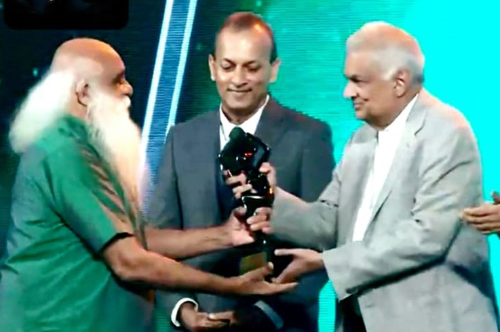
...................................................
Acceptance Speech by Wilhelm Van Dort
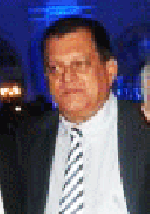 It is my privilege to address you all on this occasion as I take up office as President of the Old Boys Union of Wesley College Colombo. In this 143rd Anniversary of the College standing before this distinguished assembly, I thank the Old boys of Wesley for the trust and confidence placed in me, to give leadership to the OBU and I wish to state that I will make every effort as the President of the OBU to uphold the highest traditions and Values of this prestigious College. To begin with I wish to thank the Outgoing President Jeremy Brohier for his loyalty and service to the OBU and College. Thank you Jeremy for a great job done. A big thank you also to each and every member of the outgoing committee for all the hard work and commitment you all made to uphold the traditions of Wesley College. I wish you all God’s Choicest Blessings.
It is my privilege to address you all on this occasion as I take up office as President of the Old Boys Union of Wesley College Colombo. In this 143rd Anniversary of the College standing before this distinguished assembly, I thank the Old boys of Wesley for the trust and confidence placed in me, to give leadership to the OBU and I wish to state that I will make every effort as the President of the OBU to uphold the highest traditions and Values of this prestigious College. To begin with I wish to thank the Outgoing President Jeremy Brohier for his loyalty and service to the OBU and College. Thank you Jeremy for a great job done. A big thank you also to each and every member of the outgoing committee for all the hard work and commitment you all made to uphold the traditions of Wesley College. I wish you all God’s Choicest Blessings.
I extend my hand of friendship to the President of the Methodist Church in Sri Lanka Rev. Asiri Perera and the Acting Principal of Wesley Mr. Avanka Fernando who is one of our very own Old Boys. While wishing you God’s Blessings as you take up the mantle of Acting Principal of Wesley College, I state that me and my Committee extend you our warm support at all times and will rally round you, to take Wesley College to great heights according to the vision and mission of our founders and the Methodist traditions, on which Wesley was built.
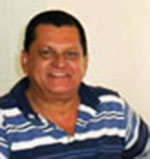 I also wish to emphasize that as the custodians of the Traditions of Wesley, the OBU will always express our concerns and views constructively, in order to ensure that Wesley will remain on the right track in every sphere, so that justice, integrity and fair-play will prevail at all times. We Old Boys would very much appreciate if there was transparency from the Authorities in the true Wesleyan Methodist spirit. We all know that where there is transparency there is progress.
I also wish to emphasize that as the custodians of the Traditions of Wesley, the OBU will always express our concerns and views constructively, in order to ensure that Wesley will remain on the right track in every sphere, so that justice, integrity and fair-play will prevail at all times. We Old Boys would very much appreciate if there was transparency from the Authorities in the true Wesleyan Methodist spirit. We all know that where there is transparency there is progress.
Wesley has a weakness of living in the past, and neglecting what has to be done for the present and future. As a result of this dwelling in the past, there was no progress in the school, because the Authorities and Management lost their focus and stagnated, thereby depriving the students of Wesley from receiving the best from College which is their right. Parents pay donations and fees for their child, and they expect the best. The school also has a moral obligation to provide these, as Children are not to blame for conflicts of the Authorities or mismanagement.
But now, with Rev. Asiri Fernando and Mr. Avanka Fernando at the helm - you have now been placed on the sacred and revered chair on which Rev. Highfield himself sat….we are sure under your dynamic leadership Wesley College is going to experience a transformation from the Era of Talking to an Era of working, to be the overall best Boys School in Sri Lanka, be it in the standards of Discipline, Academics, Moral and Spiritual value education, Sports, Extra Curricular and Infrastructure, quality of teachers and teaching standards…Wesley will be the Role Model school and a beacon to the nation. Mr. Avanka Fernando yourself being an Old Boy and product of this great College knowing Wesleyan Methodist traditions, will I’m sure understand and appreciate that expressing our concern and views does not mean “interference” with the running of the school, but rather it is only sounding a call and an invitation, to walk and work in close collaboration between the College, The Church and The OBU.
I invite all young old boys to come forward and join the OBU because your voices, new ideas and your participation at all future projects and events of the OBU are important, to take Wesley College to greater heights. I felicitate the batches who have done projects and improved the standards of Wesley. Ranil Tillekeratne and Chrishan Rodrigo from the main OBU Committee will coordinate with the different Batch groups and the Main OBU, in order to facilitate and offer support to them.
In our program for this year we have planned some events. The Wesley Walk will be held on the 14th of October- where we plan to raise 20 million for College and for which the Principal Mr. Avanka Fernando has given his approval. Mr. Richie Sapideen from the OBU who has many years of experience handling big events, has graciously accepted to head the Walk Committee from the OBU.
The Walk will be followed by the Double Blue Ball with an International flavor with Old Boys and their families participating from around the world. This will be on the 21st of October at the Cinnamon Grand. The Dance Committee will be headed by Mr. Shiraz Lye.
I will also launch a membership drive to bring in young old boys, and this will be spearheaded by Peter Wijesekera.
I hope to initiate a Wesley Newsletter which will be out every six months and which will highlight news and achievements from here and abroad. This will be available in hard copies and also sent via email. So please keep the OBU secretary updated with photos, write ups and news pertaining to Achievements of present boys and Old Boys in Sri Lanka and overseas. An Editor will be appointed to compile this News Letter. I have also planned two nights for the year for Old Boys and their families which will be held at the OWSC. The dates and themes will be discussed at the next Ex –Co meeting. Also on my agenda is the furnishing of the 3 classrooms next to the hall which will be done in the next few months. Many other events are lined up and these will be notified in due course.
I humbly appeal to the Members of the Committee who have been elected and appointed to various positions, to kindly attend the Monthly Meetings and to come up with ideas for the betterment of the Old Boys Union of Wesley College. I thank the Old boys who are here today, who participated at the lunch and at this Annual General Meeting, and I look forward to your support in the coming year.
I take this Opportunity to send my greetings and Best Wishes to the Committees and Members of the OBU Branches in London, Melbourne, Brisbane, Sydney, Dubai, Sharjah, The United States of America, Canada, the Maldives, for their friendship and fellowship….for keeping the Wesley Spirit alive in their corner of the world, for Binding us all in One fraternal Band. I end my message to you all, In the words of our College song “And when Wesley's call shall sound, Ready aye shall all be found, In duty and in honour bound Wesley to the fore” Thank you and God bless you all.
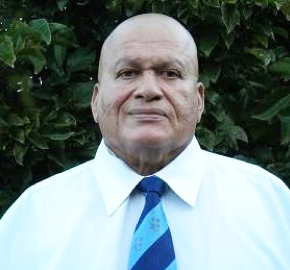 I joined Wesley College in 1959 in the Lower Kindergarten. It is so long ago but my memory recalls standing in a line with my mother and a number of other boys with their mothers to be greeted by Miss Norma de Silva. We marched in to our class behind the boarders dining hall to the music of a military march played on the piano by Mrs Dulcie de Mel. I had no choice as to what school I would attend but later on it made sense why my parents had chosen Wesley College. In those days it was a tradition that the son attended his father’s school when it was his turn. My father attended Wesley College when the “Saint of Karlsruhe”- Rev Henry Highfields was Principal. On reflection it was a great decision, one which I grasped and went on to make the most of the opportunities available.
I joined Wesley College in 1959 in the Lower Kindergarten. It is so long ago but my memory recalls standing in a line with my mother and a number of other boys with their mothers to be greeted by Miss Norma de Silva. We marched in to our class behind the boarders dining hall to the music of a military march played on the piano by Mrs Dulcie de Mel. I had no choice as to what school I would attend but later on it made sense why my parents had chosen Wesley College. In those days it was a tradition that the son attended his father’s school when it was his turn. My father attended Wesley College when the “Saint of Karlsruhe”- Rev Henry Highfields was Principal. On reflection it was a great decision, one which I grasped and went on to make the most of the opportunities available.
From those formative years, due to its racial mix of students there was an English, Sinhalese and Tamil stream. I was a Burgher and I was in the English stream as were all the Burgher boys. Whilst this delineation served its aims, it did generate a respect and tolerance of fellow students of different racial and religious backgrounds. Wesley College inculcated in each of us the fundamental values of respect for your fellow man and regardless of colour, race or creed they were all our equal, values that have stood the test in my lifetime. I still have many friends from all backgrounds as during my time at Wesley we participated in Sport and extra-curricular activities, we travelled on the school bus and some of us lived in the same neighbourhood.
Another great value that Wesley College gave me was the devotion to religion. Being a Methodist school, Christian worship at the start of the day was a great discipline that we were regimented in. We sang wonderful hymns of praise, listened to the bible readings and prayed for God’s guidance and blessing as we began each school day. It gave each of us an opportunity to fulfil our school motto “Ora et labora” which means to Pray and Work. To this day, my Christian faith and prayers have been a great strength and comfort to me as I have journeyed through life and its many challenges, especially in recent years where I have endured many health issues.
Whilst Wesley College had modest facilities, it did not deter any student from developing their talents and expanding their horizons whether it was in academia, sport, oratory, debating, choral and drama productions and quiz competitions. I had the opportunity to play sport – hockey, rugby and athletics. I represented Wesley in inter-school elocution contests. I also participated in inter-school drama contests. But my greatest love was being in the choir which has kept my love for music in particular Christian choral music to this day. I still sing in a choir that I formed in 1998 for the Christmas festivities, called the Combined Colleges of Sri Lanka Choir. Education was another strong facet of Wesley College. The group of teachers during my time were dedicated to their craft and were loyal teachers who had served Wesley College for many years. They did not watch the clock and think more about their private tuition classes after school. Each of us are blessed with many talents and I was fortunate that I was a good student and was ranked around the top of the class till I left for Australia in 1970, not sitting for my O/Level exams. During our journey through Wesley we encountered many teachers with varying personalities and rapport with their students. I have fond memories of my teachers and the solid grounding I received in the three R’s - reading, ‘riting and ‘rithmatic that have held me in good stead to this day. Corporal punishment was acceptable in those times and some delivered it more harshly than others. However what it instilled in each of us was that that we had to observe the rules of the school and meet the expected standards of behaviour, something which we would take with us for later on in life as we had to abide by the rules and laws of the state and be decent citizens of our country. Whilst Wesley did not have a “big match” it did not diminish our status as a good school. The social demographic of the student population did not lean toward students from wealthy families, though there were some who did not show off their wealth. The core principles were that regardless of one’s social standing we were all equal and we learned to respect those who were less well-off or fortunate by teaching us inclusiveness, ensuring that they were included in all our activities and were not made to feel different or inferior.
As you can gather from my previous comments, Wesley College sought to provide each of us with a holistic education. I can confidently state that I received such an education which has stood the test of time and has given me the life skills and confidence to go about my daily duties. Wesley College brought together various races, religions and cultures that reflected a rich mosaic of life in Sri Lanka. Wesley College also gave us a simple set of values that would act like a moral compass to help and guide us along life’s journey. Pouring through the history of Wesley College, the beacon on the Karlsruhe hill has beamed her magnificence in all facets of Sri Lankan society, producing many distinguished scholars, sportsmen and eminent citizens.
I am eternally grateful for the eleven wonderful years at Wesley and my passion stems from this love of my alma mater. That is why “I am proud to be a Wesleyite”.
Keith de Kretser
Melbourne, AUSTRALIA
From the Editor
Keith is one of the most loyal old boys I have met. He has supported the school in word and deed for many many decades. With his tenacity, drive and fine command of the English language he has been the voice of the Old Boys in Australia. Keith's wonderful account of his life at Wesley will no doubt rekindle the fire and bring back happy memories to many old boys. It was a great privilege to meet Keith and Myra in Melbourne on my tour of Australia in February 2009. I will indeed cherish those memories. On behalf of the Brotherhood of Wesleyites I wish Keith good health and happiness in the months and years to come.
Keith has been a prolific writer and a generous contributor to the Double Blue International. Here are some of his writings done most elegantly with much feeling, panache and style. They show his love for Wesley and all who walked through the gates of that great school. Keith makes us all proud to be Wesleyites: -
Links to further reading
- In Memoriam - Keith de Kretser ( Added 28th June 2022
- Boys of Wesley and the link with the Battle of Bannockburn From Keith De Kretser
- Some reflections of my time at Wesley College By Keith de Kretser
- Lab Rodrigo and other Support Staff at Wesley in the Mid 20th Century by Keith de Kretser
- Colombo Reunion of the Class of 68-72 by Keith De Kretser
- Fifty years of Rugby at Wesley by Keith De Kretser
- Rugby Reflections – Keith de Kretser (Melbourne,Australia)
- In Memoriam - Raju Hensman In Memoriam by Keith De Kretser
- In Memoriam - Mrs. Sivasubramaniam by Keith De Kretser
- Tribute to NAB Fernando by Keith De Kretser
- In Memoriam - Tyronne Maye By Keith de Kretser
- In Memoriam- Bertha Bernard nee Weerapass by Keith De Kretser
- Neville Ludowyke Remembered by Keith de Kretser- 29th June 2009
- Chester Robin Reimers By Keith de Kretser
- In Memoriam - Harold Matthysz - A Tribute by Keith De Kretser
- In Memoriam - Ronald Mack De Kretser Added 10th May 2017
- Coat of Arms of Wesley College as it was meant to be? By Keith De Kretser
- A Tribute to Mr Felix Premawardhana by Keith De Kretser
- Celebrating the 100th Birthday of the Oldest Wesleyite on the planet By Keith de Kretser
- Hari Jeganathan's visit to Melbourne by Keith De Kretser
- Speech by Keith De Kretser at Wesley College March 2010 - Founders' Day
- Monroe Reimers by Keith de Kretser - 16/8/2010
- Keith de Kretser elected Director of Victorian Rugby Union Board.
- The Elephant Man’ Brian Batstone by Keith De Kretser - 31/10/10
- Priceless Gift of Love written by Keith de Kretser
- Dr.John Carnie - Chief Health Officer, State of Victoria, Australia by Keith de Kretser
- Professor Razeen Sappideen by Keith De Kretser
- Amaresh Rajaratnam by Keith de Kretser
- Lakshman “Lucky” Gunasekera appointed Editor of the Sunday Observer By Keith de Kretser
From Dr Nihal D Amerasekera
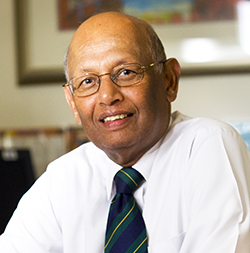
I met Lakshman circa 1955 when he was at Kingswood College Kandy. I had gone to Kandy with the Wesley College Choir to perform the Operetta Alad-in and Out when Maxwell De Alwis was the Choir Master. I was pleasantly surprised to see him in my class in Form IV in 1957. He and his 3 brothers had joined Wesley. We became close being fiercely ambitious in our chosen fields to study medicine. I can still recall with clarity the great times we have had together in the GCE and then in the 6th Form. We were both fortunate to gain entry into the Faculty of Medicine, University of Colombo after a very competitive examination. We both pay Homage to Wesley College and our teachers in the 6th form for their commitment and dedication to get us through.
Then we spent the next 5 years together in the Faculty doing our apprenticeships and learning our trade. After qualifying as doctors in 1967 we went our separate ways and our paths never crossed for many years. I heard Lakshman was training to be a radiologist in Scotland when I was training in the same field in London. But we never had the opportunity to meet. After completing the training Lakshman emigrated to Australia and settled in Brisbane while I remained in London. Except for an occasional email and a Christmas card, contact was sparse.
I settled in rural Hertfordshire in the green and pleasant countryside for the next 35 years. One summer evening in 1995, to my great surprise, I had a phone call from Lakshman to say he was in the UK and would drop in to see me as he was passing through. We reconnected instantly and spoke most warmly of our time together at Wesley and in Medical school. So much had happened to our lives in the intervening years. We hadn't changed much physically but the years had caught up with us. We were both sad to say goodbye as we lived so far apart not knowing when we would meet again. It took a further 17 years to meet again, this time at the Great Reunion of 2012. We chatted in the Great Hall and then at the posh garden party held in the Principal's lawn at Wesley College Colombo. It was an emotional meeting.
Lakshman is a kind, sociable and a generous friend ideally suited for the noble healing profession he has chosen. I wish him good health and good fortune in the months and years to come.
From Queensland Xray
Dr Jayasinghe was the SHO of Surgery for the Portsmouth Group of Hospitals in the UK before moving into the role of Senior Registrar of Radiology at the Aberdeen Royal Infirmary. After moving to Australia, he worked as Director of Neuroradiology at the Royal Brisbane and Women’s Hospital and as Director of Radiology at Greenslopes Veterans Hospital. Dr Jayasinghe joined Queensland X-Ray in 1996.
From Dr Nihal D Amerasekera
Brian Mack was at Wesley during the Cartman/Oorloff era. I remember he played the piano at assembly and for the Christian service. Brian was with Radley Claessen in class when Radley was the Ist XI Cricket Captain and Senior Prefect. Brian left Wesley in 1954. He is a relative of Mr W.E Mack who was a well respected teacher during the Highfield era. There is a Primary School House named after Mr W.E Mack.
I met Brian in London at the OBU Meetings. He is a dedicated and loyal old boy of the school and supported Wesley at every opportunity. He visited Rev RW Pile who was chaplain at Wesley from 1952-56 when he was in Homewood Nursing Home for clergy at Leamington-Spa near Birmingham.
Links to further reading
From Brian Mack
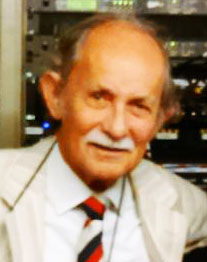 I was born in Ceylon (now Sri Lanka) and came to London in 1954 to take up a scholarship at the Royal Academy of Music, studying violin, piano and composition.I specialised on viola in '56 only because of a dearth of viola players!
I was born in Ceylon (now Sri Lanka) and came to London in 1954 to take up a scholarship at the Royal Academy of Music, studying violin, piano and composition.I specialised on viola in '56 only because of a dearth of viola players!
I went to Dublin in '58 to join the RE Symphony Orchestra. I joined the City of Birmingham Symphony Orchestra in '61 but went back to Dublin after 15 months, suffering homesickness, to re- join the orchestra, now the Radio Eireann Symphony Orchestra (Dublin)! Within the orchestra, I formed the Irish Chamber Orchestra (ICO) with friend and colleague Janos Furst.
The ICO disbanded in '66 because it was "head-hunted" to form the nucleus of the string section of the new Ulster Orchestra.
In '70 I was invited to join the Royal Philharmonic Orchestra (RPO), much to the delight of my parents, who had settled in England in '69.
I left the RPO in '74 to freelance exclusively. I have played under a wide variety of conductors, including Kempe; Klemperer; Kubelik; Abbado; Muti; Giulini; Previn; Kertesz; Sargent; Boult; Beecham; Maazel and composers Stravinsky; Bliss; Bernstein; Copeland; Katchaturian and Henry Mancini. I then enjoyed extensive touring with RPO; London Symphony Orchestra; Philharmonia; Sinatra; Sammy Davis Jr.; Perry Como; Andy Williams; 4 Tops; Stylistics; Johnny Mathis; Shirley Bassey; Glen Campbell; Barry White; Shirley Maclaine; Jack Jones; Tony Bennett.
I spent weeks at the Palladium with Bing Crosby and Rosemary Clooney; Liberace; Bob Hope; Gladys Knight and the Pips; Helen Reddy; Buddy Rich; Mel Torme; The Carpenters and a week each with Barry Manilow and George Benson at Wembley Arena.
I started at the Phantom of the Opera in '86 and "retired" in 2003. I became known as the "Phantom Viola Player" because so much time taken off!! I have been married to Joan, an ex- ballet dancer since '66 and have one son, Peter, a Chartered Surveyor. I have 3 grandsons, the eldest of whom is at Cambridge.
I have thoroughly enjoyed a glamorous career rather than a distinguished one. I am 'Semi- required' now but very grateful to play in the Battle Proms under Douglas Coombes' enjoyable baton! I am very proud to be elected President of the Amici Singers and it is indeed a great honour to serve in any way I can.
 In the past the Sri Lanka Army took Pride of place on and off the field. It has unearthed rural youth from the village greens in order to harness hidden talent to serve the national cause to gain international recognition. At the same time it was one of the nurseries for rugby and track and field events.
Old Weslyite Bashu Musafer was one of them. At present he is leading a quiet retired life in Sydney Australia. He was in Sri Lanka to celebrate a get-together of the Army rugby gold oldies since 1970 chaired by evergreen Saliya Udugama, the captain of the 1975 Clifford Cup winning team where Musafer played a key role. The luncheon get-together took place at the Gymkhana Club (CH and FC).
In the past the Sri Lanka Army took Pride of place on and off the field. It has unearthed rural youth from the village greens in order to harness hidden talent to serve the national cause to gain international recognition. At the same time it was one of the nurseries for rugby and track and field events.
Old Weslyite Bashu Musafer was one of them. At present he is leading a quiet retired life in Sydney Australia. He was in Sri Lanka to celebrate a get-together of the Army rugby gold oldies since 1970 chaired by evergreen Saliya Udugama, the captain of the 1975 Clifford Cup winning team where Musafer played a key role. The luncheon get-together took place at the Gymkhana Club (CH and FC).
He said it as a great effort by Udugama, assisted by P.G. Gunawardena and K.P. Weerasooriya who got 28 of those players together to play for the Army and some of them donned the national the jersey as well. Wijeweera, after a heart surgery was also there.
“Reggie Bartholemeusz, now living in Melbourne Australia and Iqbal Musafer were my team mates. I played only in one-inter school hockey match for Wesley, thanks to the wizard of the curved stick the late T. Mylvaganam and Walter Jayasuriya, a pioneer of Sri Lanka hockey. Imagine I was picked to play for the Sri Lanka Schools at junior national level! The game was very competitive at that time and Sri Lanka Hockey was one of the best teams in Asia.”
“In 1972 the team led by S.P. de Silva, again 1975, under Saliya Udugama Haren Malwatte, P. Weerasinghe, ‘Jupana’ Jayawardena. Jupana, was an ace scrum half. I learnt a lot from Denzil Kobbekaduwa and later matched my skills against Denzil whilst playing for the Havelocks when my mentor Denzil was played for Kandy SC.
When asked for any comments about Australian sports and migrant Sri Lankans living there, Musafer said “They spend a lot on sport development at grassroot level.
The authorities are giving equal opportunities. All are treated as equals even the p1ayers at their peak retire making way for the young prospects. Interest in country is paramount, than personalities which is the cornerstone for success at national level.
“The Sri Lankans living there are living with a lot of understanding. Musafer said that the Sri Lankans domiciled in Australia have not forgotten their roots and are keen to assist the needy and help to uplift their image joined by the Australian counterparts.
They treat everyone as equals. A big welcome awaits the Sri Lanka team for the Boxing Day Test match against Australia on December 26.
Bashu Musafer left Sri Lanka on Nov. 28; his parting words were that the Army made him a man. “My parents taught me to lead a humble life, and my school Wesley at Campbell Park taught me human values – to serve humanity without distinction. “God’s Gift to you is Life, what you do with it is your Gift to God’’.
He paid, a glowing tribute to Brig. Jupana Jayawardena saying though retired he is not forgotten. Also the late Brig P.D. Ramanayake’s efforts to spread sports among the rural youth was another that Bashu remembered. Brig. JPA’s efforts are to bring about togetherness among the Golden Oldies regularly, said Bashu.
Links to further reading
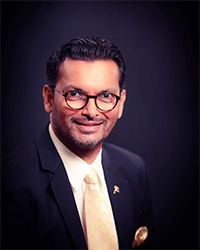
Educated at Wesley College Colombo, Kumar de Silva crowned his illustrious school career by winning the coveted Hill Medal for the Best Student of the Year in 1980. He thereafter entered the University of Kelaniya from where he graduated with an Honours Degree in English and French, and later went on to lecture at the Department of English.
Author of best sellers such as ‘Lester by Lester’ (on the work of Sri Lanka’s internationally celebrated film maker Dr. Lester James Peries), ‘Iranganie’ (the life and times of the matriarch of the Sinhala cinema Iranganie Serasinghe) and the ‘Bonsoir Diaries’, he is also a keen photographer with several one-man exhibitions to his credit, presented by the Alliance Francaise.
French speaking de Silva is a founder member of the Board of Directors of the Alliance Francaise (de Kotte) in Colombo. In 2002 he was knighted by the Government of France as Chevalier in the Order of Arts and Letters (Chevalier dans l’Ordre des Arts et Lettres) for his longstanding contribution to the propagation of the French language and culture in Sri Lanka.
A former journalist at Lake House and member of the Jury of the celebrated Sarasaviya Film Awards, de Silva is a Trustee of the Dr. Lester James Peries and Sumitra Peries Foundation. Multi-lingual de Silva is also a veteran Public Relations and Media Consultant, and a sought-after emcee.
A former ITN news reader, he is a Paris-trained, award-winning television personality, and is best remembered for the ‘Bonsoir’ and ‘Fanclub’ programmes he hosted over ITN.
He currently hosts his highly-rated online celebrity talk show – ‘Anything But with Kumar de Silva’ - across all social media through www.pulse.lk and YouTube.
As a Personality Development and Corporate Etiquette trainer, Kumar de Silva counts almost forty years of experience working and interacting, in different capacities, with hundreds of people from diverse organisations across different layers in Sri Lanka’s multi-disciplined corporate sector.
He now shares his experiences (gained both in Sri Lanka and France) and a wide range of soft skills, with Sri Lankan corporates to help them gain self-confidence, enhance their individual social performance levels and navigate their personal role in a highly competitive corporate journey to success.
In the past few years, several thousand corporates, both young and old, have been through his interactive Personality Development and Corporate Etiquette training sessions. There have also been several hundred school leavers and undergraduates, all of whom will constitute the corporates of tomorrow.
The Chartered Institute of Personnel Management (CIPM) works with Kumar de Silva on a regular basis and presents his sessions to hundreds corporates across the country.
CIMA Sri Lanka also works with Kumar de Silva on a regular basis and presents his sessions to hundreds of AL students, school leavers and CIMA students, islandwide.
He has also been the Official Trainer in Corporate Etiquette (#BrandSriLanka) for Miss World Sri Lanka (2015 to date) and for Miss Universe Sri Lanka (2018).
His parents Justin and Manel de Silva taught at Wesley
Links to further reading
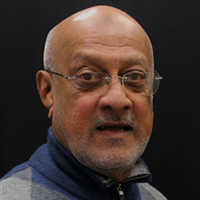
From Dr Nihal D Amerasekera
Dr Haris Fuard is a General Practitioner in New Zealand. Haris was at Wesley in the 1950's and early 60's when he played cricket for the 1st XI. His father A.M.Fuard Captained the 1st XI Cricket in 1916 and his eldest brother M.A.M Fuard (Ansar) Captained in 1954. His brother Abu was a fine cricketer who played in the 1st XI as Vice Captain and later became a respected off spin bowler for the Sri Lankan International Cricket Team. He served as a selector for the National Team for many years. Haris qualified as doctor with an MBBS degree from the Faculty of Medicine in Colombo in 1971.
From Dr.Haris Fuard
I am a Fellow of the Royal New Zealand College of General Practitioners and have been practicing for the past 40 years in Hamilton. I am married and have three children, and two grandchildren. I have enjoyed and continue to enjoy all facets of general practice which included doing general practice obstetrics in the past. I have been the doctor for the national Kiwi rugby league team, the Black Caps national cricket team, New Zealand Diving team at the 1978 Commonwealth Games held in Auckland, and have toured with the Australian national junior diving team to Sweden and Spain. Presently I enjoy working with the great team at Tui Medical in Te Rapa.
Chandra Felix Wijetunge Remembered By Dr Nihal D Amerasekera
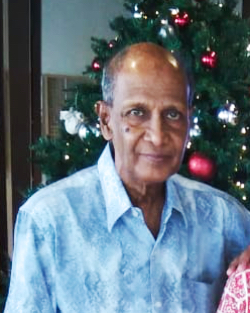 The photo retraces my life and takes me back to those happy days of long ago. I first met Chandra when I joined Wesley in 1950. He was an endearing soul. Our class was called Std 2 and the class master was Mr M.T Rajapaksa. He was an amiable teacher if one knew how to avoid his tantrums. The old primary block with airy classrooms is no more. There is a brand new 2 storey block named after Daniel Henry Perera, the founder of our school.
The photo retraces my life and takes me back to those happy days of long ago. I first met Chandra when I joined Wesley in 1950. He was an endearing soul. Our class was called Std 2 and the class master was Mr M.T Rajapaksa. He was an amiable teacher if one knew how to avoid his tantrums. The old primary block with airy classrooms is no more. There is a brand new 2 storey block named after Daniel Henry Perera, the founder of our school.
Chandra lived in Forbes Road, Maradana. He was a quiet polite lad who got on well with everyone. His helpful kindness to all stood out. He supported the sports but was not a sportsman. As we progressed through the classes year after year Chandra was kind and generous and remained a good and loyal friend to me and to many others. We were best of friends. I was a boarder and recall the time he too joined the boarding. We then became inseparable. In the boarding the boys had a real family affinity. We often spoke of our parents, the life at home we missed so much and also of our hopes and dreams for the future. Chandra and I often walked round the school premises at weekends. Its gardens were immaculately maintained. The flamboyant trees were often in full bloom and the surroundings were so very quiet and peaceful.
We were forever hungry in the boarding. Chandra’s family lived nearby and he got many food parcels from home which we shared. This was indeed a luxury as we had very little cash to buy from the Tuck Shop. Life then was fun and carefree, well most of the time. I have fond memories of Wesley and the boarding. On looking back those were some of the best years of my life.
In 1955 I joined the Science class and Chandra proceeded into the Arts. This was the time he left the boarding and travelled daily from home. GCE was our first public examination. As we prepared for the examination it was harder to keep in touch. Chandra as always remained very religious being part of the strong Student Christian Movement at school. He left school soon after the GCE. I proceeded to the 6th Form and then into Medical School. We lost contact until 1970. Once when in Pettah walking in the Main Street I met him at the CLS Bookshop. I remember how happy we were to meet again. There was a long chat recalling the old days. Chandra remained calm and unhurried as always and happy with his life.
This was a busy time for me. After further examinations I left Sri Lanka in 1974 for postgraduate studies in the UK. Here I entered the fiercely competitive world of hospital medicine. Finding jobs and climbing the steep career path in a foreign country was tough. Building a career, marriage and bringing up children took much time and effort. Despite this there were times I thought of my good friend, Chandra, and made enquiries as to his whereabouts. No one really could help locate my friend. I had asked Nimal Sureweere for information. He was our classmate and mutual friend and now lives in Vancouver, Canada. In August 2019 I had a call from Nimal. He had traced Chandra to Kollupitiya and found me his phone number.
When I called Chandra he was utterly astonished to hear from me. He had tried hard for years to find me thinking I was still in Sri Lanka. Phone calls to the popular Colombo hospitals for helpful information had proved futile. There was a great desire to see each other as we spoke. But we were separated by 5000 miles of land and oceans. He was not into the modern social media. Despite that I felt close to him. As we spoke the years melted away. Chandra loves school and had joined the Old Boys Union. The political ructions in the organisation discouraged him and he left the OBU. We recalled so much of our happy schooldays and of friends and teachers. Chandra was married and had a son. I gather he still remains very religious and worked for the church. With his calm, kind and forgiving nature the church could not have found a better recruit. It was hard to say goodbye but we had to, promising to keep in touch. I will no doubt see him on my next visit home.
It amazes me still how time has flown since those halcyon days at school and how life’s twists and turns have changed our lives so much. We have now passed the biblical age of three score years and ten and should be thankful to be alive. In my retirement as I reflect on my years at school and the friendships that ensued it gives me such a warm feeling. I will cherish those memories for the rest of my days.
I am so proud to have been at Wesley College and to have walked its long corridors with so many good and loyal friends. Still, my claim to fame can be that I once walked amongst them!
Dr. Derryck De Silva Remembered By Dr Nihal D Amerasekera
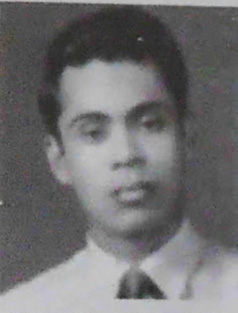 Derryck had his education at Wesley College Colombo in the 1950’s. There he had an impressive academic record. He was a keen Boy Scout and a member of the 14th Colombo Scout Troop. For his duty and commitment he won the Queen Scout Award, the ultimate decoration for a Boy Scout. Derryck was a keen rugby player and represented the school in the Ist XV. There is no greater honour for any schoolboy than being the head boy of the school. He was appointed the Senior Prefect in 1957. Derryck held this position with flair, style and swagger. He was an all round student and to this day remains intensely loyal to his old school.
Derryck had his education at Wesley College Colombo in the 1950’s. There he had an impressive academic record. He was a keen Boy Scout and a member of the 14th Colombo Scout Troop. For his duty and commitment he won the Queen Scout Award, the ultimate decoration for a Boy Scout. Derryck was a keen rugby player and represented the school in the Ist XV. There is no greater honour for any schoolboy than being the head boy of the school. He was appointed the Senior Prefect in 1957. Derryck held this position with flair, style and swagger. He was an all round student and to this day remains intensely loyal to his old school.
In 1960 Derryck was successful in the University Entrance Examination and won a place in the Faculty of Medicine in Colombo. He was a popular medical student arriving daily for his lectures in a big, loud NSU Motor Cycle. This had immense cult status. It was his pride and joy and the envy of many. His popularity grew in the Faculty. Amidst fierce competition he was elected the President of the Medical Students’ Union in 1964. His thank you speech and the party that followed in the Common room are memories to cherish. Derryck was ever present at the many raucous evening functions at the Mens’ Common Room when drinks and music were in plenty and the students let their hair down. He continued with his sports playing rugby for the Faculty and the University and captaining the University Hockey “B” Team. He sailed through the difficult medical examinations and qualified as a doctor in 1965.
Post qualification Derryck worked at the General Hospital Kurunegala. I started my Internship at Kurunegala in 1967. Then the House Officers Quarters was a great place of fun where laughter was endemic. His loud trademark laughter could be heard from his room at all hours of the day and night. Despite his fun, wit and humour Derryck was much respected as a hardworking and conscientious doctor. Those were carefree days of wine and roses with tremendous youthful exuberance. I recall with much nostalgia the annual Kurunegala Law-Medical match, the many parties and the sing-songs that brightened up our lives. He continued to enjoy the good life of a young medic in Kurunegala for 4 years. His work ethic and commitment to his staff and patients was acknowledged by all.
When Derryck was so much a part of the Kurunegala scene it surprised us when he resigned from government service to start General Practice in Tissamaharama. With his wonderful bedside manner, warmth and humanity, his patients loved him. In a short spell of time he developed a roaring general practice opening a satellite surgery in Hambantota. Despite his busy schedule, occasionally, Derryck travelled many hours to visit his friends in Kurunegala. This was a glorious success story. But then Derryck had a restless spirit, constantly wanting to better himself. He had tremendous ambition and motivation to do well in life.
After several years of service to the rural community, in 1974, he sold his practice and left for the UK to pursue a career in Radiology. He worked in the prestigious St Mary’s Hospital in Praed Street London. I knew Derryck at school but got to know him more closely when we were Senior Registrars together at the Maida Vale Hospital for Nervous Diseases. We both served two of the best Neuroradiologists of the time, David Sutton and Brian Kendall. Although the work was difficult and demanding working with Derryck was such a great pleasure. His forthrightness and sense of duty stood out and he was well liked by all. When the need arose, he could be combative. Wherever he worked he established a formidable reputation as a strong and decisive leader who never shrank from speaking his mind. He knew where to draw the line. We all remember the time when a hospital porter called him ‘Derrick’ - he said firmly but with a smile, “call me Dr De Silva”. Derryck’s wit and humour helped us to overcome the tough and tedious work of that institution. With Don Anthony and Anand, the Sri Lankan radiographers who worked with us, there was plenty of spirit and togetherness. The way we stuck together made us a happy team that enjoyed our Radiology providing a fine service that was much valued.
In his youth Derryck was an entrepreneur. Despite the hard work and the onerous routines of Radiology he continued with his business interests dabbling in the lucrative travel industry and buying and selling upmarket luxury cars. He spoke so very little of his burgeoning business empire!!
When he qualified as a Radiologist Derryck’s wandering star resurfaced. This made him move to Essen in Germany where he worked in General and Neuro-Radiology. This heralded a period of great success and achievement. The family were living their dream when tragedy struck out of the blue. The death of his wife to illness was a shattering blow. There was much sound advice along with huge amounts of sympathy but the road ahead was a difficult one. He cared and supported his children to give them a fine education and a good start in life. His son and daughter both qualified as doctors. They now live and work in Colombo. Derryck has spent a great deal of time in Sri Lanka with his wife Renata and the extended family.
We have been friends since schooldays. What stands out is his honesty, integrity and the ability to take life in his stride. My lasting memory of Derryck is his love for sing-songs when he sang “down by the riverside “ standing around a piano. He knew all the words and its multitude of parodies. More recently his own health has not been at its best. Derrwick deals with these issues with enormous courage and characteristic indomitable spirit. He remains cheerful and his enthusiasm for life has not waned. This wonderful attitude to adversity is a beacon to us all. Those who know him will remember him as a raconteur and bon viveur. We wish him many more years of the good life. Doctoring and healthcare has changed beyond recognition since we started all those years ago. He belongs to the ever decreasing number of doctors who worked to embody the spirit of Hippocrates. Meanwhile let us raise a glass of the best Champagne to a friend and a gentleman.
By Dr Upul Wijayawardhana - From The Island Newspaper
 Rienzie Wijetilleke, one of the brightest stars in Sri Lankan banking, has just scored four scores. His extraordinary career in banking culminated in being appointed the Chairman of the Board of Hatton National Bank, HNB that became the leading private bank in Sri Lanka under his stewardship. Though he had the zeal to continue to steer HNB to even greater heights, he retired in 2010 thanks to, what may be considered to be unfair, statutory regulations.
Rienzie Wijetilleke, one of the brightest stars in Sri Lankan banking, has just scored four scores. His extraordinary career in banking culminated in being appointed the Chairman of the Board of Hatton National Bank, HNB that became the leading private bank in Sri Lanka under his stewardship. Though he had the zeal to continue to steer HNB to even greater heights, he retired in 2010 thanks to, what may be considered to be unfair, statutory regulations.
Never the retiring type, he then shifted his focus on travel and tourism to set up Osara Lanka, in addition to being on the board of directors of many companies that were eager to tap on his vast experience. He also set up ‘Pansala Hadamu’ foundation for the upliftment of village temples, realising the plight of the Bhikkhus who lived in these sans even the basic toilet facilities. This foundation also helps to spread modern technology to deprived areas, encouraging the setting up of minicomputer-labs, developing a temple-centric village awakening in remote areas.
My assessment of Rienzie’s achievements, perhaps, would be partial as I am fortunate enough to be related to Rienzie, through marriage, his wife Dhammika being my wife Primrose’s sister: daughters of late Mr P D S Jayasinghe, Colombo Municipal Councillor, and late Mrs Teresa Jayasinghe of Kirulapone. In fact, I remember the first day he ‘visited’ to see Dhammika and it was no surprise he ‘fell’ for her; a beauty and a dancer who adorned an Elephant House calendar. In no time they were married and sailing off to London on ‘The Fairstar’, for Rienzie to work in the London Office of Bank of Ceylon while doing his banking examinations.
 The next time I met them was, three years later, in 1969, when I went to the UK for post-graduate studies. After a very long exhausting flight, in a BOAC Viscount aircraft which had a small board inside indicating that it was on loan to Air Ceylon, it was refreshing and reassuring to be met by Rienzie, Dhammika and her brother Pandu but the centre of attention was Harsha, their first-born who was talkative as ever with Upul Mama. After attending a course in Edinburgh, when I returned to London, their generosity in accommodating me in the, already crowded, one -bedroomed flat is an act of kindness I can never forget.
The next time I met them was, three years later, in 1969, when I went to the UK for post-graduate studies. After a very long exhausting flight, in a BOAC Viscount aircraft which had a small board inside indicating that it was on loan to Air Ceylon, it was refreshing and reassuring to be met by Rienzie, Dhammika and her brother Pandu but the centre of attention was Harsha, their first-born who was talkative as ever with Upul Mama. After attending a course in Edinburgh, when I returned to London, their generosity in accommodating me in the, already crowded, one -bedroomed flat is an act of kindness I can never forget.
When my wife arrived in London and she got employed in Farnborough Hospital in Kent, we were eagerly waiting for the weekend to visit them, to see the antics of little ‘Sashi’ who would explore my pockets for the anticipated sweets and also the hand bag of ‘other aunty’. Shortly before they left London in 1970, Rienzie and Dhammika were blessed with another addition, Chamira, but Kusum had to wait a long time to arrive, till Rienzie went to Dubai to work for the British Bank for the Middle East, in 1984. All three sons followed in the footsteps of their illustrious father and took to banking.
Rienzie was born in Galle, on 10 November 1939, youngest son of the large family of Tudor and Regina Wijetilleke, and had most of his education in Wesley College, in spite of his parents being devout Buddhists. He was ever grateful to his alma mater and was the President of the Old Boys’ Union from 2000 to 2003.
In 1972, Mr M Dharmarajah, the first GM/MD of Hatton National Bank, snatched Rienzie from Bank of Ceylon. Not only that, he persuaded Rienzie to return to the fold of HNB, from BBME, in 1986 offering him the post of Assistant General Manager, which Rienzie could not refuse. On the retirement of Mr Dharmarajah, in 1987, Rienzie was appointed Managing Director of HNB, a move that saw HNB being catapulted to be the leading private bank in Sri Lanka, in no time. On the unexpected and sudden death of the then Chairman, Chrishantha Cooray, in 2004, Rienzie had to accept the invitation of the board of directors of HNB to be the Chairman, in spite of being contemplative of retirement at the time. He had been offered the Chairmanship of Browns Group but the realist in Rienzie made him stick to the subject he knew.
How Rienzie steered HNB to tremendous success is far too well known to be repeated but the obstacles he faced in his monumental project, HNB Tower, is less well known. The visionary in Rienzie was itching for a ‘headquarters-like-no-other’ for his bank and went ahead with this project in spite of many an objection. His vision was one of optimism and wanted to produce an emblem for a positive tomorrow. At a time of economic slowdown, to persuade his Board of Directors to go ahead with such a mammoth project was no mean task, as there were many critics who called it a rash, reckless almost, project that would certainly be a waste of shareholder funds.
Rienzie was a futurist and could not be undaunted by critics. With the support of his Chairman Chrishatha Cooray and the Board of Directors, Rienzie saw to it that the HNB towers, with 23 floors and futuristic features like energy saving devices, rose to be a landmark in the Colombo skyline. HNB towers, opened in January 2003, remains unmatched by any other bank, silencing his critics.
It was, therefore, very fitting that a simple ceremony, graced by Karu Jayasuriya, was held on 9th November, at the impressive Conference Room, surrounded by glass panels which gives an enchanting panoramic view of Colombo including the dazzling waters of Beira Lake, in the 22nd floor of HNB Tower, to launch "Rienzie Wijetilleke – Revisited"; a book edited by the well-known Journalist, Savithri Rodrigo. It is a compilation of excerpts from speeches and articles authored by Rienzie, with additional comments by the author.
In the preface to the book, Rienzie sums up his life’s philosophy: "I also want to impress upon my family and friends that doing good is an inherent trait in all humans. Some let it bloom, others don’t. For me, doing good is about ensuring that the goodness we impart has a sustainable factor. There really is no point in giving a man fish to assuage his huger; we must teach him how to fish because that’s the only way he will never go hungry again. As you will see my social work has been constructed on this foundation – that whatever good we do must be long-standing and sustainable. It must be empowering, strengthening and, most of all, uniting. We must permeate that goodness to as many as we can so that they, in turn, will do the same."
"Rienzie Wijetilleke – Revisited" is a book full of pearls of wisdom and having read it fully my only regret is that it is only for private circulation but not for sale and do hope Rienzie would find a way to make this accessible to the youth of today, badly in need of such guidance, perhaps, publishing it on-line with free access. To say the least, it should be compulsory reading for any young man or woman taking to banking as a carrier.
As long as the HNB tower stands tall, behind the White Dome of the Colombo Municipal Council, adorning the Colombo skyline, Rienzie will be remembered. In 1999, Rienzie, as the interim head of the Board of Control of Cricket of Sri Lanka, pulled Sri Lanka Cricket from the mire it was steeped in, breathing a fresh lease of life of profitability and success. Therefore, let me wish in cricketing parlance "Rienzie, don’t give up till you hit a century!"
Links to further reading
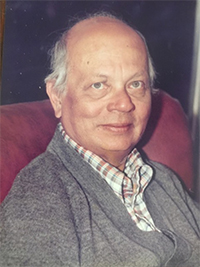 William Justin Frank La Brooy (referred to as Justin) was born on 21.10.1910. in Tangalle. He was the 5th child of Frank La Brooy (proctor in Tangalle) and Maud (nee Poulier). His father was from Colombo where he had attended Royal College before training in Law. His mother was originally from Kandy where she had briefly worked as a teacher before marrying Frank in her late teens.
William Justin Frank La Brooy (referred to as Justin) was born on 21.10.1910. in Tangalle. He was the 5th child of Frank La Brooy (proctor in Tangalle) and Maud (nee Poulier). His father was from Colombo where he had attended Royal College before training in Law. His mother was originally from Kandy where she had briefly worked as a teacher before marrying Frank in her late teens.
Justin had his primary schooling in Tangalle before moving to Wesley College Colombo, where he was boarded, for his secondary education. While he participated in sports, he did not distinguish himself in any. Academically he was one of the brightest students who went through Wesley at the time when Rev Highfield was Principal. He entered University College on the basis of outstanding results in the Cambridge Senior examination.
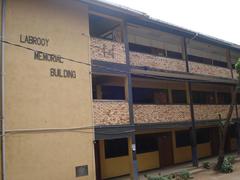 His undergraduate studies in the University were in Arts, majoring in History with an Upper 2nd Class from the University of London. His mentor, Professor S. A. Pakeman is on record as saying that he had expected him to get a First Class and that he was disappointed that he did not achieve this.
Following his graduation, he taught briefly at his old school, Wesley, with which he maintained contact throughout his life. I believe there is a block of class-rooms named the “La Brooy Block” commemorating the family of 4 brothers who were students there, before moving on to a variety of professions, between the 1910’s and 1930’s. He then worked for a short time in the Income Tax Department in colonial Ceylon before being recruited by Professor Pakeman to a position in the
His undergraduate studies in the University were in Arts, majoring in History with an Upper 2nd Class from the University of London. His mentor, Professor S. A. Pakeman is on record as saying that he had expected him to get a First Class and that he was disappointed that he did not achieve this.
Following his graduation, he taught briefly at his old school, Wesley, with which he maintained contact throughout his life. I believe there is a block of class-rooms named the “La Brooy Block” commemorating the family of 4 brothers who were students there, before moving on to a variety of professions, between the 1910’s and 1930’s. He then worked for a short time in the Income Tax Department in colonial Ceylon before being recruited by Professor Pakeman to a position in the
History Department in the University in the early 1930s. He spent the whole of his subsequent working life in this Department. This encompassed the transition of the University College in Colombo into the University of Ceylon around the time of independence, with Ivor Jennings who was intimately involved in formulating the constitution of the new nation, as its first Vice-Chancellor (Robert Marrs had headed up University College, Colombo, before). When the Arts Faculty shifted to the new University campus in Peradeniya, he moved there in 1953. He continued to work in the History Department in Peradeniya, till he retired in 1975 (?) and maintained close contact with it till he died at home in 1979 having been driven home, by Erica, from a lecture he had wanted to attend in the University.
While he enjoyed teaching and encouraging others to undertake research, his own research output was limited. This was undoubtedly contributed to by the breakdown of movement across to Britain due to the 2nd World War and his delayed return to study. Though he commenced work towards a PhD through the School of Oriental and Asian Studies in London University, with sabbaticals while working on this in 1952/3 and 1958, he did not complete this. What he most valued from his work in the University were the students he helped mould. These included his wife, Erica (nee Christoffelsz) who was one of his earliest students and his daughter-in-law (Nirmala Dissanayaka) who was one of his last students, and more importantly many historians who were students or colleagues in the History Department.
The La Brooys in London in 1951
Justin and Erica married in 1937. Their family arrived after some delay: Justin Theodore was born in 1946 and Franklin Charles in 1947 while they were still living in Colombo. Basil Henry was born in 1953 in Kandy after they had shifted to Peradeniya.
They lived first in a bungalow in Mahakande from 1953 to around 1955, then in a University bungalow on Sanghamitta Hill before moving to the Principal’s bungalow at Kandy High School around 1957. When Erica completed her time as Principal of High School, they moved to another University bungalow close to the Mahaveli Ganga in Getambe. Their final move was in the 1970’s to a house on the block which Professor KM de Silva bought from them some years later. My father was living there till he died.
Abiding interests outside of his work included his work in the church, with schools where he was on a number of governing boards, and the support he gave to his extended family. A number of nephews and nieces, his mother, mother-in-law and various sisters and members of their families lived for considerable periods of time, with him and his family. **** ****
From Michael Roberts
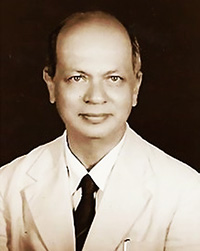 When I entered Peradeniya University and pursued Western History as one of my first year subjects, I found myself in a tutorial group guided by Mr Labrooy –one that included Trevor Roosmale-Cocq, Russell Forbes, Ananda Wickremaratne and Jayantha Dhanapala if my memory is on the mark. Once I chose to spend a further three years pursuing a History course oriented towards the Modern Era I came into greater contact with Mr Labrooy, though also benefiting from a cohort of excellent teachers: Fr Pinto, Karl W Goonewardena, S. Arasaratnam, Shelton Kodikara, and KM de Silva for instance.
When I entered Peradeniya University and pursued Western History as one of my first year subjects, I found myself in a tutorial group guided by Mr Labrooy –one that included Trevor Roosmale-Cocq, Russell Forbes, Ananda Wickremaratne and Jayantha Dhanapala if my memory is on the mark. Once I chose to spend a further three years pursuing a History course oriented towards the Modern Era I came into greater contact with Mr Labrooy, though also benefiting from a cohort of excellent teachers: Fr Pinto, Karl W Goonewardena, S. Arasaratnam, Shelton Kodikara, and KM de Silva for instance.
Mr Labrooy was our Head of Department and when I ended up with a good degree by 1961, he offered me a job with the stipulation that I would have to teach in Sinhala. I took up that challenge of trying to improve my Sinhala, while also deciding NOT to sit for the CCS examination because I felt that I could not survive in that circuit in the the situation prevailing in the 1960s (how wise that reading now in retrospect).
Mr Labrooy’s benevolent duty of care was exemplary. He took the trouble to visit me at my sister’s home in Wellawatte and urged me to apply for a Rhodes Scholarship — something I was not thinking of doing because one had to finance one’s journey to UK , calling for a sum of money beyond my pockets and beyond my pater’s reach. Mr Labrooy overrode my fears: he stressed that the Rhodes stipend in UK would more than make up for the initial voyage ,.
So I did apply.
That made my future.
To WJF Labrooy my eternal thanks ….. and so too to him and Erica for supporting me, Shona and our two kids when we were struggling financially on a paltry Assistant Lecturer’s salary in the late 1960s. Their attentiveness to a duty of care was truly exceptional.
From Dr Nihal D Amerasekera
Professor A.J.A de S Gunasekera- A Distinguished Old Boy
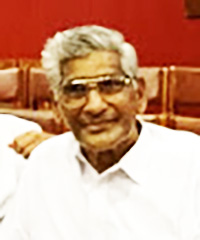
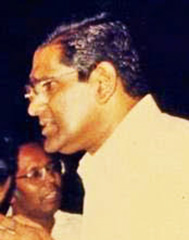
Asoka Gunasekera was a student at Wesley in the 1950’s. He was a respected School Prefect and played Ist XV Rugby for the School in 1958/59. I remember with clarity Asoka cycling to school from his home in Kirillapona dodging the rush hour traffic on busy Baseline Road. Asoka was always well dressed and a refined lad at school. He appreciated the finer things in life and remained a popular student. Even as a teenager there were signs of Asoka’s single-mindedness and focused pursuit of his objectives. After an illustrious school career he entered the Medical Faculty in Colombo in 1960. It was the start of a journey that would lead to a most rewarding career. Meanwhile, Asoka sailed through the taxingly difficult examinations in medical school obtaining a distinction in Obstetrics and Gynaecology in the final examination. Asoka received his postgraduate qualifications in the UK obtaining the FRCS and the MRCOG. He was subsequently awarded the FRCOG by the Royal College of Obstetricians
On his return to Sri Lanka he was appointed to the Ruhuna University as the Professor of Obstetrics and Gynaecology. This University was established in Southern Sri Lanka in 1978 with its Faculty of Medicine in Galle affiliated to the Teaching Hospital at Karapitiya.
In the University and in the hospital environment Asoka was known for his civility. He headed a busy department for many years, teaching medical students and conducting research, in addition to his clinical work. Here many witnessed his commitment and dedication to the profession and to teaching. Asoka was a voice of reason as he rose above the pettiness, irreverence and scepticism that was rampant in the profession. He was an inspiring, enthusiastic and charismatic teacher not only in the lecture-room, ward and theatre but also in the many papers he wrote and edited. Here Asoka was well liked by his students and earned enormous respect as a clinician. The obstetricians and gynaecologists he trained recall his combination of modesty, humility and fine clinical judgment. They fondly remember his patience as a tutor and also his exacting standards. He also had the tremendous ability and confidence in the application of the basic principles to decide on the best plan to manage a clinical problem. Asoka had a brilliant and productive academic career and served in the University with distinction until retirement. Asoka now lives in Colombo with his wife Ramya. Their three children live abroad following successful careers. We wish him a long and happy retirement.
From Dr Shanti McLelland
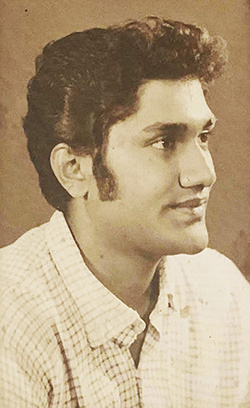
Malik was my classmate at Wesley. He was a very lovable and friendly Wesleyite who used to laugh and be happy all the time. Malik used to visit me and I used to see him at his place very often. But most of the time I would see him at Campbell Park training for the hurdles event. He was an outstanding athlete. He loved to hurdle and was the school 110m hurdle champion at that time. I used to support him to train by jumping over the hurdles while he glided over the hurdles without any effort. Once he invited me to travel with him to his uncle’s coconut estate. We enjoyed our three-day stay. Eat a lot of Guava’s and drank a lot of Thambili. The last I saw him was when he visited me at home and said he will be back on his way home, but that was not to be. Good bye my friend, you be with me all the time.
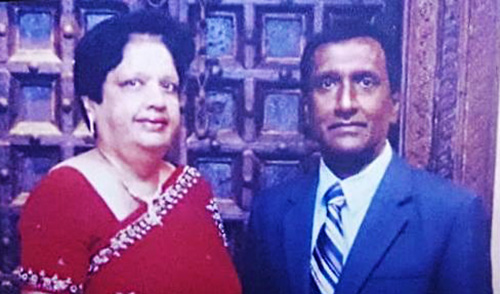
Palitha was his younger brother and he was a few classes junior to me. He was very decent and well mannered. He came to church with his parents. His father was an Irrigation Engineer who studied at Trinity. They attended St. Luke’s Church Borella. Palitha met his spouse Shereen de Livera and got married at the same church. I knew Shereen and her parents who were wonderful people who was kind and lovable. Palitha liked to help the Jazz Club and he spent a lot of his time fund raising for the club. I last spoke to him at the Club house when we had a get together with Anil Fernando from Canada and Nihal Peiris from the UK who were on holiday in Sri Lanka. A few of Palitha’s good friends were Lal de Silva, Anil Bharatha, and Vajira Wimalasena.
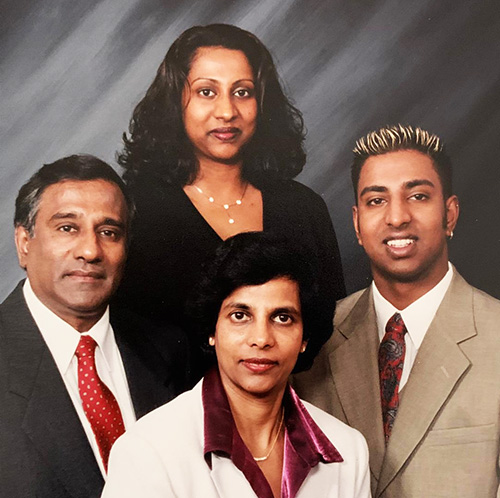
Nimal Sureweere was senior to me but we were very good friends. He lived at Sri Dhamma mawatha close to Nalanda College after coming to Colombo from Kandy. He studied up to the 5th standard at Trinity College. He used to dress well and was well behaved. We visited each other and spent some good times. He was a very lovable person who liked to entertain his friends. D. Kanandran used to stay with him for a short time. Now, Kanendran lives in Ontario Canada. Teachers loved him as a very good and friendly student. Nimal was a very good vocalist. He used to sing his favourite, Santa Lucia, very often in his beautiful voice in Soprano. He was in the College choir, Drama club, and the Oratory club. Mr. Haig Karunaratne was his choir master. Both of went to Kandy for a few days and later visited Matale for 4 days. Nimal married Juliana Horshington who studied at Ladies College. They have a daughter Niroshini and a son Dilshan. They all live in British Columbia now. I asked him to name a few of his friends at Wesley and immediately he remembered the senior prefect during his time – Wanigatunga, also Dr. Nihal Amerasekera who is England now and is the Web page designer. Nimal remembered Dr. Daya Perera who lived in the United States, Harold de Alwis Jayasinghe who is now in Alberta, Canada, and Rev. Rohan Wijesinghe who is now in Lindsey, Ontario, Canada. The others he remembered while he was on the phone with me was, Upali Perera, Lester Perera, Jadi de Silva, and Anton de Silva. He also mentioned Miss Spencer Sheppard as his favourite teacher in the Junior school. Nimal was still on the phone trying to remember a few more names, but I cut off and let him relax.
The memories I have of Nimal Suraweera and the family will be sweet and beautiful.
Dr. Shanti McLelland, July 08, 2020
Links to further reading
From Dr Nihal D Amerasekera
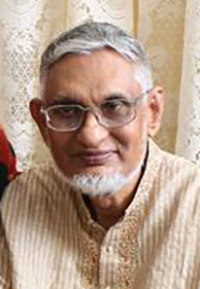 Farouk had his education at Wesley College Colombo from 1949-59. He was in the boarding for a short period in the early 1950’s. Farouk was studious and carried away many awards and prizes at the Annual Prize Giving at Wesley College. Farouk and his brother Fahmy were keen sportsmen. With his brother Fahmy, Farouk represented the school in Under 14 and Under 16 Cricket and Senior Badminton in 1957 and 58. He also played Tennis for the school. He was a co-editor of the Double Blue magazine with Alfred David.
Farouk had his education at Wesley College Colombo from 1949-59. He was in the boarding for a short period in the early 1950’s. Farouk was studious and carried away many awards and prizes at the Annual Prize Giving at Wesley College. Farouk and his brother Fahmy were keen sportsmen. With his brother Fahmy, Farouk represented the school in Under 14 and Under 16 Cricket and Senior Badminton in 1957 and 58. He also played Tennis for the school. He was a co-editor of the Double Blue magazine with Alfred David.
Farouk entered the Faculty of Medicine at the University of Ceylon in 1960. Seemingly he breezed through the difficult examinations in medical school with consummate ease and completed his MBBS degree in 1965. After Internship at the General Hospital Batticaloa Farouk worked at the Base Hospital Kegalle from January 1967 to December 1979. Farouk worked in the UK in 1978 and then again in West Croydon and Frimley Park Hospital in London in 1983. He gained the Diploma in Family Medicine in 1984. Farouk has remained a successful GP at the Rajagiriya Clinic for over half a century and has served the community with enthusiasm, dedication and kindness. Much loved by his patients and colleagues, he has expertise in a wide range of areas in medicine
I remember Farouk as a quaint, gaunt, saint. Modest and self-effacing he was always a calm person with plenty of patience. He was always impeccably turned out, courteous and imposing yet charming. His twinkly eyes were set behind his dark rimmed spectacles. I know personally of many school friends who went to him for medical advice. They speak volumes of his friendly manner and expert care. For him medicine was more than a career, a vocation and a service. He is semi retired now but continues to help in his medical practice.
On behalf of the Brotherhood of Wesleyites Worldwide I wish him well
1958 School Badminton Team
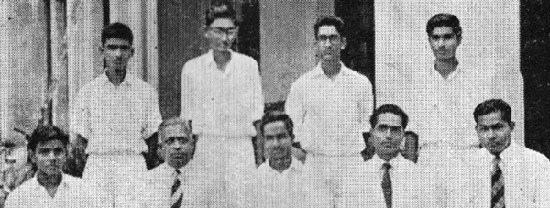
Standing LtoR: Rohan Wijesinghe, Farouk Sikkander, SK Seneviratne, Fahmy Sikkander
Seated LtoR: Nimal Wijesinghe, Mr PH Nonis, PS Rodrigo (Capt), Mr Lanerolle, Mr Wilfred Wickramasinghe (Master in Charge)
Links to further reading
Kindly sent to me by Peter Peiris
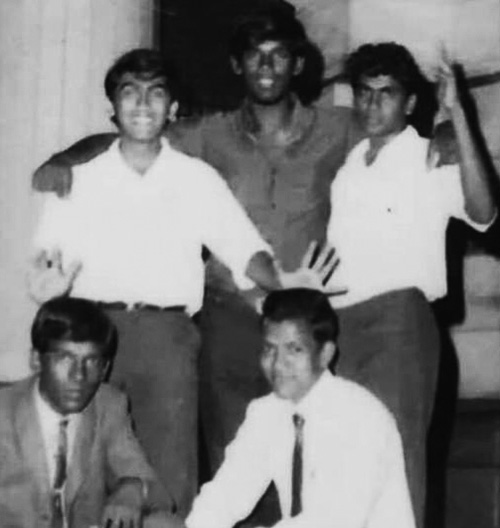
Kindly sent to me by Peter Peiris
Global Banking and Finance Review awards - Singer honored as ‘Retail Brand of the Year - Sri Lanka 2020’
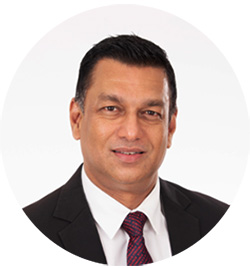
Singer (Sri Lanka) PLC, has been honored with first ever Sri Lanka’s Retail Brand of the Year tribute from one of the most keenly awaited global awards, the British based ‘Global Banking and Financial Awards.
The awards, announced annually by the British based Global Banking and Finance Review, a leading financial platform read by senior decision makers in Fortune 500 firms, investors, traders, and bankers, is a keenly awaited honor by many corporates across the world. Launched in 2011, the 10th Global Banking and Financial Awards 2020 saw intense competition among applicants across the world Mahesh Wijewardene who vied for a slot in one of the categories of this prestigious awards.
Singer (Sri Lanka) PLC is the Awards’ sole and first ‘Retail Brand of the Year Sri Lanka’ winner.
Commenting on the global achievement. Chief Executive Officer, Singer (Sri Lanka) PLC, Mahesh Wijewardene said, “We are extremely delighted and proud to be honored by Global Banking and Finance Review Awards 2020 which highlights our passion to serve the Sri Lankan customers. It has been a challenging period for all the businesses, but Singer (Sri Lanka) has been able to demonstrate a turnaround within a short time span.”
With over 430 retail outlets, a strong dealer network and E-commerce platform. Singer owns a portfolio of over 600 electronic items, 1,200 home appliances and boasts more than 50 internationally renowned brands.
From Singer Finance
Mahes Wijewardene Joined the Board of Singer Finance (Lanka) PLC on 21st February 2019.
Mr. Mahesh Wijewardene was appointed as an Executive Director and the Chief Executive Officer of Singer (Sri Lanka) PLC and its subsidiary companies with effect from 1st November 2018. Mr. Wijewardene holds a Master’s Degree in Business Administration from the University of Southern Queensland and received the Dean’s Award for Outstanding Academic Achievement. He also holds a Diploma in General Management from the Open University of Sri Lanka. Mr. Wijewardene is the past Chairman of the Ceylon Chamber of Commerce – Import section and Sri Lanka – China Business Council and is a member of the Hayleys Group Management Committee.
Mr. Mahesh Wijewardene has served on the Singer (Sri Lanka) PLC board previously as an Alternate Director from 1st June 2006 to 31st October 2018. Mr. Wijewardene serves as a Director of Singer Industries (Ceylon) PLC, Regnis (Lanka) PLC, Regnis Appliances (Pvt) Limited, Singer Digital Media (Pvt) Limited, Singer Business School (Pvt) Limited, Reality Lanka Limited, Domus Lanka (Pvt) Limited and CSR Lanka (Guarantee) Limited.
About Mahes Wijewardene
Currently, Mahesh Hiranya Wijewardene holds the position of Managing Director & Executive Director at Singer Industries (Ceylon) Plc, Group CEO, Executive Director & Managing Director at Regnis (Lanka) Plc and Chief Executive Director at Singer (Sri Lanka) Plc.
He is also Member-Singer Asia Sourcing Committee at Singer Asia Sourcing Ltd. and on the board of 6 other companies.
In the past Mahesh Hiranya Wijewardene was Chairman of Sri Lanka China Business Corp. Council and Chairman-Import Section at The Ceylon Chamber of Commerce.
Mr. Wijewardene received an MBA from the University of Southern Queensland.
From the Ceylon Daily News - Kindly sent to me by Peter Peiris
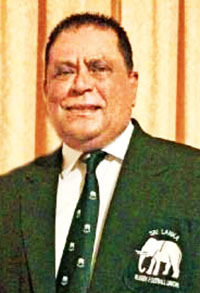 It is very rare to witness a person engaged in several sporting disciplines especially in the school arena later transforming himself to a top sportsman in one or more sports which enabled him to reach the pinnacle to bring honour and fame to his School, Club and the Country.
It is very rare to witness a person engaged in several sporting disciplines especially in the school arena later transforming himself to a top sportsman in one or more sports which enabled him to reach the pinnacle to bring honour and fame to his School, Club and the Country.
Reggie Bartholomeusz was one of the finest sportsmen who had a profound career with his school Wesley College later had an enthralling club career finally ending up donning the National jersey for the country handling the oval shaped ball. His father was Rex Bartholomeusz who was one of the great Thomians while his mum was Eileen de Cruze. He had three sisters Blossom, Maureen and Mavis all of them schooled at St. Bridget’s Convent, Colombo. Reggie had an interesting academic career. As a tiny nursery kid his mother was very particular about enrolling him at a Catholic school and he started his education at St. Bridget’s convent until grade two. Then he was transferred to Wesley College, Colombo for further studies. From his childhood he had a desire to get into sports and finally his dream became a reality. He transformed himself as a champion athlete from under-10 to 19 age category, later went on to establish a record in100 yards in 10.5 seconds in 1965 for his school which is an unbroken record so far. He also played Cricket, Rugby and Hockey for college.
He played for Colombo North team at the hockey carnival. He excelled as a sprinter representing the Ace Athletic Club in their relay teams at many athletic meets in various parts of the country. He went on to represent Wesley at the public school’s athletic meets in the under-16 and 19 age groups winning colours in these meets.
Reggie played rugby for school from 1961 to 1965 as a wing three quarter. He started playing the game at the age of 14 years and went on to represent the college first XV team. His colleagues in the College team were Bill Deutram, Basheer Musafer, Shari Musafar, Kevin Gauder, Trevor Collet a few to be named. In 1964 beating Isipathana and losing to Thomians 9-8 in a nerve tingling game were two of the most unforgettable matches in his school rugby career. He stepped into Club rugby with CR and FC in 1966, under Eric Roles’s captaincy. CR remained an unbeaten side that year, and played in the all India Rugby Tournament in Bombay. Hamzie Hameed and him were picked to go on that tour as the understudy of the regular wing three quarters Thiruchitampalam and Tikiri Banda Wijesinghe, where they won the All India tournament.
He cemented his position at CR in 1967 under Mohamed Azain and in 1968 under Tony Sirimanne (where they won the All India tournament that year). In 1969, under Mohan Sahayam they clinched the prestigious Clifford Cup. by beating Kandy SC 12-6 in the final With his fine performance as a player and in his peak, he was picked to play for Sri Lanka that year against the touring Singapore team, where he planted a try which subsequently turned out to be his first game for the country. In 1971 under Dushantha Samarasekera they won the Clifford Cup by beating Police 27-6 in the final and in 1973 under Kamal(Ali) Ratnapala won the All India tournament after emerging unbeaten league champions but were deprived of the double when Army knocked them out in the Clifford Cup semi final 16 -12 The year 1974 was a memorable one for him as he was appointed as captain of the Longden Place Club. They won every game and remained unbeaten League Champions but lost the Clifford Cup when Havelocks beat them 16 -4 in the finals H e continued his club career playing in 1975 under Ronnie Schokman and in 1976 under Indrajith Coomaraswamy respectively before he called it a day for the fifteen a side rugby. But he opted to play in the short form of the game, the sevens rugby under Dr. Maiya Gunasekera. He would like to mention some of the players which was a pleasure for him to be associated with from 1966 Hadji Omar, Bumpy Jayasekera, Dushantha Samarasekera, C.R de Silva (bulla), Keith Perera, Cecil Perera, Hiranjan Perera, Didacus de Almeida, Shiraz Fernando, Roy Balasuriya, Mohan Balasuriya, Rohan Abeysundera, Kamal Ratnapala, Junie Cader, Sari de Sylva, Michael Perera, Eric Roles, Deepal de Zoysa, Ranil Soysa, Dr. Tony de Sylva, D.R. Weerasinghe, Wendell Flamer Caldera, Ajith Abeyratne, B.C. Molligoda, Mark Sunderalingham, Cargo Siriwardena, Gotabaya Dissanayake, Raja Sahabandu, Hasitha Kanangara, Malik Samarawickrama, Ronnie Schokman, Iqbal Jumar, Dr. Maiya Gunasekera, Sheehan Rahim, S. Chandrasekera, Ronnie Gunaratne, Hamzie Hameed, Tikiri Marambe, Andrew van Hoff, Irvin Howie, Michael Muller, Jagath Fer nando, Mahes. Sabaratnam, Dennis Chanmugan, Hafi Abdeen, T.B. Wijesinghe, Thiruchittampalam Mahendra Talwatte, Shanthi Kumar all from CR. He launched his National career from 1969 till he retired in 1976, where he played with great players. like , Denzil Kobbekaduwa Gogi Tillekeratne Glen van Langenberg, Omar Sheriff, Jeyer Rodriguesz, Jeffrey de Jong Jeffrey Yu, Shafi Janudeen, Desmond Harridge, Tyrone Holdenbottle, George Jayasena, Bryan Baptist Nimal Malagamuwa, Japana Jayawardena, Tony Sirimanne, Bumpy Jayasekera, Jagath Fernando, Roy Balasuriya, Mohan Balasuriya, Hamzie Hameed, Bandula Wijesinghe, (M.P. Amaradasa, G.B. Gunadasa, M.F. Fernando Basheer Musafer - all from Army) Anton Benedict, Indrajith Coomaraswamy, (captain 1974) Nizam Hajireen, Rohan Gunaratne, Lofty Perera, Viper Gunaratne, Ajith Abeyratne, Ronnie Schokman, Mahes. Sabaratnam, Dr. Maiya Gunasekera, Dr. Tony de Sylva, Hamish Patternott, Boga Gunasekera, Clifford Elhart and Gamini Udugama,
He first played for Sri Lanka in 1969 against Singapore in Colombo under Hadji Omar, then played under Jeff Ratnam in 1970 against the Bosuns and Blackheath Rugby Club, England and Paris universities. In 1972 played under Y.C. Chang at the Rugby Asiad in Hong Kong while playing against other touring teams like Dubai Exiles, Australian Emus, Singapore, Japan, Nachanga RFC just to name a few. His greatest joy was playing for the Pink Elephants, a team of all retired players meeting up to have a run around and a good social night. This was made possible by Rodney Patternott and Peter Amerasinghe, who gave a lot of their time phoning players to turn up.
They only had one referee that was B.K Ramachandra who could never lose! (great fun) After retiring from playing, he coached the Wesley College team for a decade from 1971 to 1978.
His greatest joy was to watch some of the boys go on to play good rugby for the clubs and also for Sri Lanka. Guys like Iqbal Musafer, Zubair Doray, Ronnie Omar, Batchie Omar, Kamaldeen, Rushmo Ferdinands, Iqbal Udaman, Ransiri Sahabandu, Fazie Doray (deceased) to name a few He migrated to Australia in 1984 with his wife Dawn and children Natalie and Warren and played a few games for the Box Hill Quenches, which is a team of all retirees over 40 and then coached the Boxhill under-14 and 16 for about four years until he retired permanently from the game.
From the Dutch Burgher Unnion
BARTHOLOMEUSZ, Reggie, educated at Wesley College, Colombo, was one of the finest sportsmen who had a profound career with his school Wesley College later had an enthralling club career finally ending up donning the National jersey for the country handling the oval shaped ball. As a tiny nursery kid his mother was very particular about enrolling him at a Catholic school and he started his education at St. Bridget’s convent until grade two. Then he was transferred to Wesley College, Colombo for further studies. From his childhood he had a desire to get into sports and finally his dream became a reality.
He transformed himself as a champion athlete from under-10 to 19 age category, later went on to establish a record in100 yards in 10.5 seconds in 1965 for his school which is an unbroken record so far. He also played Cricket, Rugby and Hockey for college. He played for Colombo North team at the hockey carnival. He excelled as a sprinter representing the Ace Athletic Club in their relay teams at many athletic meets in various parts of the country. He went on to represent Wesley at the public school’s athletic meets in the under-16 and 19 age groups winning colours in these meets. He played rugby for school from 1961 to 1965 as a wing three quarter. He started playing the game at the age of 14 years and went on to represent the college first XV team.
He stepped into Club rugby with CR and FC in 1966, under Eric Roles’s captaincy. CR remained an unbeaten side that year, and played in the all India Rugby Tournament in Bombay. He cemented his position at CR in 1967 under Mohamed Azain and in 1968 under Tony Sirimanne (where they won the All India tournament that year). In 1969, under Mohan Sahayam they clinched the prestigious Clifford Cup by beating Kandy SC 12-6 in the final With his fine performance as a player and in his peak, he was picked to play for Sri Lanka that year against the touring Singapore team, where he planted a try which subsequently turned out to be his first game for the country.
In 1971 under Dushantha Samarasekera they won the Clifford Cup by beating Police 27-6 in the final and in 1973 under Kamal(Ali) Ratnapala won the All India tournament after emerging unbeaten league champions but were deprived of the double when Army knocked them out in the Clifford Cup semi final 16 -12 The year 1974 was a memorable one for him as he was appointed as captain of the Longden Place Club.
They won every game and remained unbeaten League Champions but lost the Clifford Cup when Havelocks beat them 16 -4 in the finals He continued his club career playing in 1975 under Ronnie Schokman and in 1976 under Indrajith Coomaraswamy respectively before he called it a day for the fifteen a side rugby. But he opted to play in the short form of the game, the sevens rugby under Dr. Maiya Gunasekera. He launched his National career from 1969 till he retired in 1976, He first played for Sri Lanka in 1969 against Singapore in Colombo under Hadji Omar, then played under Jeff Ratnam in 1970 against the Bosuns and Blackheath Rugby Club, England and Paris universities. In 1972 played under Y.C. Chang at the Rugby Asiad in Hong Kong while playing against other touring teams like Dubai Exiles, Australian Emus, Singapore, Japan, Nachanga RFC just to name a few. His greatest joy was playing for the Pink Elephants, a team of all retired players meeting up to have a run around and a good social night.
After retiring from playing, he coached the Wesley College team for a decade from 1971 to 1978. He immigrated to Australia in 1984 with his wife and children and played a few games for the Box Hill Quenches, which is a team of all retirees over 40 and then coached the Boxhill under-14 and 16 for about four years until he retired permanently from the game. (Althaf Nawaz, Ceylon Daily News)

 I used to call him by his last name Cader, but most other school mates and friends called him by his first name Cassim. He was at Wesley in the late 1960’s. He represented the school Rugger side. He was an outstanding player fearless and a attacking player. He brought lot of honour to the school with his dynamic playing strategies. Although Wesley did not have a Basket-Ball team during his time, he played for the YMCA team. He was an excellent player. Cassim tied up with S.J. Sarangapany, Bunny Taylor, & Shanti McLelland to repair the old basket-ball court at the Campbell Park without too much success. But, they got together and played a few exhibition matches to promote the game in the school. Cassim was a member of the Wilkin House athletic and hockey team. He was the winner in the Shot-Putt event and the 400m event. He represented the Old Wesleyites Hockey team in a few matches.
I used to call him by his last name Cader, but most other school mates and friends called him by his first name Cassim. He was at Wesley in the late 1960’s. He represented the school Rugger side. He was an outstanding player fearless and a attacking player. He brought lot of honour to the school with his dynamic playing strategies. Although Wesley did not have a Basket-Ball team during his time, he played for the YMCA team. He was an excellent player. Cassim tied up with S.J. Sarangapany, Bunny Taylor, & Shanti McLelland to repair the old basket-ball court at the Campbell Park without too much success. But, they got together and played a few exhibition matches to promote the game in the school. Cassim was a member of the Wilkin House athletic and hockey team. He was the winner in the Shot-Putt event and the 400m event. He represented the Old Wesleyites Hockey team in a few matches.
His favourite sport was Judo. He was a livewire at the YMCA taking part in the Open and Championship events. He won the Open Black Belt event one year. He started Judo when another Old Wesleyite was actively participating at that time for the YMBA. He was Chang another Wesley Rugger player and Captain of Wilking House. Others who was in the YMCA team was Asoka Jayawardana who won the National Challenge trophy many times. He was a Black Belt. K. Vijitha Kuruppu was another Wesleyite, a very good black belt judoka with national colours. Sextus Taylor, Afgar Mohdeen, Basnayake, Ranjit McLelland, and myself are a few others who was associated with the YMCA judo team. I have to mention another champion who was not a Wesleyite but a very good friend of Cassim, who was a Black Belt National Judo champion – Kithsiri Soysa.
Cassim left for Japan after leaving school. But, while he was in Sri Lanka, he helped to run their family business, which was the photographic studio at Queen Street. We used to get last minute photos for Passports, ID cards and other occasions with the quickest service anyone can provide. I cannot dismiss the kind deeds of Wilson the ground boy. He used to be kind and helpful to Cassim whenever he stays long hours doing nothing or training at the grounds. Thank you Wilson. I can remember the good old days when we he used to join his friends at Borella to eat Cassava (manioc). Akbar brothers used to get their mother to boil the root in the evenings. He also used roam with Kithsiri, Basnayake and Miss De Jonk all Judokas to waste time I want him to know that the days when he used to be with his good friends, Sextus Taylor, Leon Ingram (Derrick & Russell Ingram’s brother), Randolf Crutchley (Tall and handsome Body Builder, Old boy who worked at Sri Lanka Railway, but turned up to play a bit of Rugby or join to enjoy the evening), and Shanti McLeland spent time at Karlsruhe Gardens, Wesley’s back gate and to have have milk tea or dinner at Leon Ingram’s place. Also, the walk from Karlsruhe to Fort after spending the bus fare to eat bread and sugar from the Thumbi boutique at the end of Karlsruhe Gardens or eat Kiri Pani at Maradana. Some of these treats happened when Sextus’s sister sent a few Sterling Pounds from England.
I met him last at the Principal’s bungalow in 2013/14 when he visited the school. His picture with Tissa Abeydeera, Emir Musafer, his brother Abdul Cader, and Shanti McLelland taken before he left Colombo to Japan is the best and simple picture to remember the good old days. Sextus, Asoka, Leon, and I will always remember Cassim with his smiling face, fighting spirit, and his loving friendship. We will always miss his tall handsome and active self. I wish him the best and hope he will be taken care by the almighty.
From Bunny Taylor in Canada
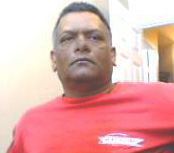 We used to sit in the Wesley Pavilion at Campbell Park and Wilson would tolerate us until we left late in the evening. Wilson did this only because he knew that we all loved Wesley and were did not harm. The others who would join us were Donald De Silva, Leon Ingram, Kithsiri Jayasinghe and Kenny Dickson who lived at Karlsruhe Gardens and Railway Housing at Mount Mary. Sometimes Tuan Camball who lived at Campbell Park will join us after a game of soft ball to have dinner at Buhari Hotel in Maradana. Sometimes we would go back to the back gate of Karlsruhe sit behind Indran Nile’s house at the back gate, borrow Indran Niles’s ukulele I would play it and someone would get a box or a tin and use it as a drum and we would sit outside the back gates of Wesley and have a little sing-along, Cassim’s favorite songs were “Kalu Kelle” and “Kalu Nande” by the way Cassim’s nickname was “Kalu Carder” as there
were many Carders at Wesley.
We used to sit in the Wesley Pavilion at Campbell Park and Wilson would tolerate us until we left late in the evening. Wilson did this only because he knew that we all loved Wesley and were did not harm. The others who would join us were Donald De Silva, Leon Ingram, Kithsiri Jayasinghe and Kenny Dickson who lived at Karlsruhe Gardens and Railway Housing at Mount Mary. Sometimes Tuan Camball who lived at Campbell Park will join us after a game of soft ball to have dinner at Buhari Hotel in Maradana. Sometimes we would go back to the back gate of Karlsruhe sit behind Indran Nile’s house at the back gate, borrow Indran Niles’s ukulele I would play it and someone would get a box or a tin and use it as a drum and we would sit outside the back gates of Wesley and have a little sing-along, Cassim’s favorite songs were “Kalu Kelle” and “Kalu Nande” by the way Cassim’s nickname was “Kalu Carder” as there
were many Carders at Wesley.
There were the 6 of us, I left for the UK and then there were 5, Cassim left for Pakistan and then there were 4, Shee Hung joined me in the UK and then there were 3, Rando left for Switzerland and then there were 2, Ma Hung joined us in the UK and then there was 1, Shanthi left for Canada and then there were none, I immigrated to Canada and linked up with Shanthi, although we were spread all over the world, we remained close friends, some in the group have passed away but the still live in our hearts … one day we will meet again in the Karlshreue gardens in Heaven and do it all over again.
A Brief tribute to Randolph Crutchley by Dr Nihal D Amerasekera
I have often wondered what became of Randolph Crutchley. It is great to see a mention of a name from my years at the boarding at Wesley College 1952-58. Randolph Crutchley was a kind and generous friend and a popular lad in the boarding. We all called him Rando. I remember his wit and humour. He took part in the boyhood mischief that was endemic in the boarding. Being a fine cricketer he was a regular at the softball cricket matches we had in the Small Park that was behind our school in those days. Randolph was a lovely person, tall and handsome. He was in my parallel class along with Dallas Achilles, Sheriff Fallil and Kenneth De Silva. Randolph played for the under 12/ under 14 Cricket Teams. He never showed any interest in academia but loved the sports. I recall he didn't do well in his school examinations and this caused tremendous problems for him over many years. This sadly caused him to leave school far too soon. We were saddened to see him go and this was a tragedy for school cricket as we lost a potential 1st XI cricketer and perhaps even a cricket captain. He was indeed a very able cricketer. His father worked for the Ceylon Government Railways, the CGR in those days and was a fine cricketer playing for the CGR at the Railway Ground near the Baseline Road Station
I sincerely hope life treated Rando kindly. I do wish he has had a good life and a successful career in the Railways. On behalf of the Brotherhood of Wesleyites Worldwide I thank him for his contribution to the life of the school in those happy and distant days. We wish him well for the future.
Links to further reading
- Some Schoolboy Memories of Bunny Taylor 06/01/2011
- Wesley as I remember (3) by Shanti McLelland
- Wesley's public figures and contribution to good governance
- Wesley as I remember (3) by Shanti McLelland
- Wesley's public figures and contribution to good governance by Shanti McLelland.
- Name dropping by Shanti McLelland
- Shanti McLelland - Wesley College Scout Troop 1960-1964
- Names I remember (1): by Shanti McLelland
- Only at Wesley…by Shanti McLelland
- Inter House Competitions by Shanti McLelland
- Life is not a Destination - by Shanti McLelland.
- Languages the binding link - by Shanti McLelland
- In Memoriam - Sextus (Bunny) Taylor Added 17th May 2022
Kindly sent to me by Dr Shanti McLelland
My dad took me out of Wesley for 2nd term and allowed me to travel and visit Ceylon before we left - Yala, the Dutch fort in Galle, Katharaga temple, Kandy, the ruins in Polonaruwa, Anradupura, Mihintale, Sigiriya, the hot springs in Trincomalee, Delft island of the coast of Jaffna, and fishing off the pier in Mannar, climb Pidurithagala elevation 8270' again not possible today.
My dad and I moved to Canada in 1964, and I have lived here ever since. My dad chose to leave due to the political upheaval that he saw coming. He made our trip to Canada a once in a life time voyage. It took us six and a half weeks to to arrive in Montreal: 1) We left Colombo by ship and our first port of call was Aden in Yemen to refuel - my first look at a desert. 2) Then on through the red sea to Port Said - through the Suez canal to Port Suez - a 12 hour crossing. The day time temperature reached a balmy 120 degrees in the sun. 3) From there to Pireus in Greece where we spent 3 days visiting - I got to walk through the Acropolis and the Parthenon - impossible today 4) Then again by ship to Bindisi in southern Italy through the beautiful Corithian canal. 5) From Bindisi to Basel in Switzerland by electric train; through the alps where got to see snow for the first time. 6) Again from Basel to Ostend Belgium by through northern France and Luxemboug. 7) The the ultimate - a channel steamer to Dover England, where we saw the famous white cliffs. 8) Dover to Victoria station in London, on an old fashion steam train that spewed bits of coal. Stayed 4 days - saw the changing of the gaurds at Buckigham palace - Madam Tussauds wax museum, Hyde park, The Marble arch and the London Tube. 9) Then a bus trip to Hampshire in south England where we had a swim in the English channel - water temp =58 F. Not quitre the same as Kalkudah beach at home. 10) Then on to Southampton for the last leg of our trip; a 7 day crossing of the Atlantic through one nasty storm, also an iceberg that caused the ships captain to make a one kilometer detour, have the black and white somewhere. 11) Arrive in Montreal in August to celebrate my 14th birthday. My dad chose this route because he did not want to eastward as he had been there during the 2nd world war.
I am presently living in Ottawa. Below is a brief synopsis.
We started life in Montreal; an bit of a culture shock. I attended a mixed public school with a dress code shirt and tie, flannel pants and polished shoes, and a student body of 2600. One got the see and meet girls in class and not have to wait for a get together with our sister school Methodist College. In my second year I started the schools first ever rugby team and we went on to win the city championship the following year. We played the match in snow with a temperature that was at 0 degrees C. I was a member of the school choir; lead bass, as I was at Wesley; lead soprano. I was also part of the school theater and played lead roles in "My Fair Lady" and "Half a Sixpence". I was made a prefect in my 3rd year and was very active in many of the social clubs at the school. Sadly my school in no more - due to demographics and reorganization. Also while in school I joined a scout troop. I graduated in 1969. I unfortunately could not make into higher education as my father passed away and had to work to support myself.
While still living in Montreal I joined the "Arcadians Amateur Musical Society" and performed in the following: "Fiddler on the roof", "Anything Goes", "Curtain up Act II", and numerous musical caberet type shows for 6 years.
I worked at the Ritz Carlton Hotel in Montreal for 4 years as an assistant manager for 4 years and for FEDEX for 25 years from where I retired in 2014. I was in a city; Montreal, that hosted a world fair in 1967, to celebrate Canada's 100 year of existance - where I worked as a guide - the Olympic games in 1976 - In Ottawa to be part of Canada's 150th year - will be a huge party. I will be participating in one of the activities - "The Vintage Rugby Festival" August 21st to 28th in Ottawa - player categories are over 35, over 50 and over 60 the one that I will be in. I started training for this event in February of 2016 - in the gym for 2 hours 5 days a week, that include weights, endurance, interval, sprint and plyometrics. I have lost 30 lbs and have got my morning resting heart down to 60bpm. I am hoping to be one of the fittest and fastest on my age category team. I am still playing for an over 60's old boys team here in Ottawa, called the Senators, and have been a rugby referee for the last 7 years.
I am happily married and presently live in Ottawa. I consider myself very lucky to have seen and done so much in my lifetime. In 2015 I got to spent a day lobster fishing in the Atlantic of the east coast on New Brunswick. We were on the boat at 05;00 hrs and into seas with 6' waves. The ultimate was to get to eat some of the catch. The trip to New Brunswick from Ottawa was a 13 1/2 drive non stop. On the trip back home we almost hit a large moose-1300 lbs that suddenly decided to cross the highway; Canada's equivalant to running into an elephant.
In retirement I now have more time to pursue the outdoor activities that I like; in the winter = snow shoeing, cross country skiing and cycling and in the summer = long distance kayaking, cycling, hiking and walking. I am also an avid photographer and sing open mike at a couple of clubs. I am on the board of the "Savoy Operatic Theater group" and also sing in it. I am also an active member of the Sri Lankan Canadian Association - and play tennis ball cricket with them every summer.
One of the traditions that I have kept is an annual New Years buffet held on the 3rd Saturday in January. The meal includes the following Ceylonese specialties; Kiri Bath with Kittul pani - Parippu - sambols = Katta, Pol, Kuni, & Seeni the coconut is scraped on a traditional sit on the floor Hiramane - Pol kiri baddum very hot meat curry made with roasted curry powder - Cabbage with mustard seed - Potato curry - Uludu and Kadele Vaddai - Mutton rolls and Roti (bought) - Vatakka and for the peice-de-resistance - Vatillappam made with jaggery and cashews served with chai tea with condensed milk.
Thanks for getting in touch with me. I will try to send you some photos as soon as I can get them downloaded on to my computer. Wishing you and your family the very best for 2017, "SUBA ALUTH ARURUDAK VEVA"
Will & Lyse
My resolution for 2021 is that before I move into 2021 I Can - I Will & I Am going to cancel all of my subscriptions to other people's Drama & Negativity. Covid has forced my hand to build a small workout area in my basement to replace my workouts at Gym that I went to. I have purchased a stepper & a hand bike for upper body endurance. As soon as we get some snow I will start snowshoeing again. I am looking forward to being slimmer & fitter in the new year. Here's wishing you and the family all the very best for 2021 Cheers - Wilhelm
Hi Wesleyites, all is well --- very busy with refereeing rugby. Yesterday I got to referee an U16 international match between Kings School from England and the Bytown Blues of Ottawa. I am also very busy training 2 hrs per day 5 days a week to get ready for the World Vintage Rugby Festival which is coming to Ottawa for Canada 150. The festival is for old boys 40 and over. I will be a referee & playing for a team from the Bahamas as an over 65 player - Yellow bib/cannot be tackled. The festival will be held at the Twin Elm Rugby Park with match days being August 21st -23rd & 25th, 2017, with kick off times @ 11;00 - 13;00 & 1500 @ 4075 Twin Elm Rd --- At the present time there are 26 teams from the Canada / US / Australia / New Zealand / Bahamas / Bermuda / Argentina & possibly Mexico.
18 December, 2017 - Hi - quick update - Will be heading for hip replacement surgery on the 21st - Busy getting ready.
From Dr Nihal D Amerasekera
I remember Mohan Seneviratne who was 2 years my senior as were Nizar Sappideen, Asoka Kularatne and Vivian Jayaweera. Mohan was a great supporter of cricket at school and helped as a scorer in many of the matches. He was a successful planter in Badulla and I have had the good fortune to experience and enjoy his hospitality at Queenstown Group. I have met him in California some years ago. Nizar and Vivian were fine boxers for the school. Nizar is a great supporter of the Double Blue International website and helped me with information and photos of the many events organised by the Old Boys in Sydney. Vivian rose to a high rank in the Sri Lanka Police Force. He was a generous host on one of my visits to Colombo when he took me out for dinner in a posh hotel. Vivian's father was a good boxer and coached the school team for many years. As always Vivian is fine company never short of interesting stories. I remember Asoka very well at school and also his brother Chandra. Chandra sadly passed away some years ago. Their sister Sita was in my class upto Std 2 at Wesley Primary and am told she lives in Colombo.
Nizar, Asoka and Vivian Live in Sydney Australia
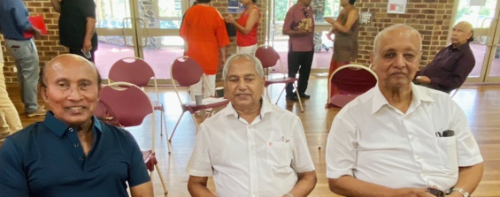
Mohan lives in the Apple Valley, California. He enjoys gardening.
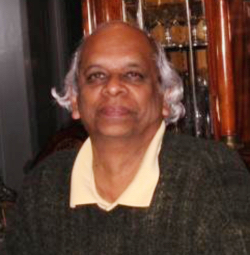
Transcribed from the Sri Lanka Daily News - Saturday, September 22, 2018
Kindly sent to me by Keith de Kretser, Melbourne, Australia
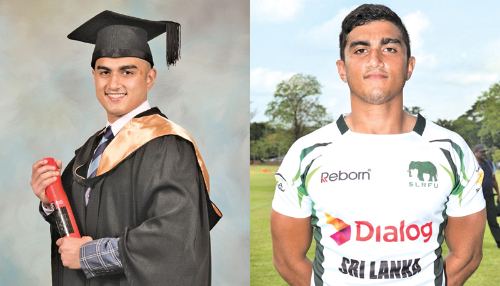
Rahul de Silva, a staunch Wesleyite hails from a family steeped and rich in tradition of a fine sporting background. It is indeed an honour for him to have made his alma mater Wesley College, Colombo proud by not only representing the school and excelling in sports but also by showing his academic prowess, graduating with a Merit Class Degree in Business & Accounting from University of Swinburne, Melbourne, Australia in 2018. During his educational tenure at Wesley College, Rahul has many achievements to his credit. While holding the position as the College Deputy Head Prefect in 2013 he honed his leadership qualities and did come with its fair share of responsibilities. His strong sporting DNA embedded in him drew him to taking up sports. He took to cricket and went on to excel in the game by representing the Wesley College first XI cricket team in the inter-schools cricket tournaments. Cricket however was only to last for a short period of two seasons. His irresistible thirst and passion for the game of rugby drew him away from continuing his cricket career, a slight deviation from the sport which had representation in his family background at College as well as at national level; he took to rugby, easily as a duck would to water.
A new chapter in his sporting life was to then unfold. Excelling in the game of rugby he went on to represent the alma mater and held the honoured position of captain of the Wesley College first XV rugby team in 2013. As captain he showcased his excellent leadership qualities by leading from the front and established his skills as a fine scrum half.
A noteworthy mention to state here would be is that during his tenure as captain, Wesley College first XV team secured a place in the annals of Wesley rugby by winning the silverware in the Sri Lanka inter-schools premier rugby league Milo President’s Knockout Trophy in the year 2013. An accolade and a ‘first’ that the college received in its 65-year history of the sport. A proud achievement for Rahul, his team, and Wesley indeed!
Rugby being his passion his thirst for the game did not stop here. He went on to represent Sri Lanka at the Under 20 Junior Asiad played in Korea as the vice-captain of the team, and thereafter in the Sri Lanka senior team at the Asiad in 2016 held in Hong Kong, no doubt a feather in his cap. His achievements on the rugby playing field were far and wide reaching so much so that soon after his schooling career he was immediately absorbed by the Colombo Rugby & Football Club (CR & FC) to represent them in the local rugby league. However his playing days at CR was short lived as his intentions of pursuing his higher studies in academia compelled him to leave the shores of Sri Lanka and take wing to Australia.
Rugby being his passion he continued to play in Australia through an invitation extended to him by Box Hill RC, ranked as one of the top three rugby clubs in the Melbourne Premier League.
His excellent rugby acumen and skills showcased whilst representing Box Hill RC earned him an invitation to represent Axman, a Melbourne State Rugby Development Squad, a first for a Wesleyite indeed. Whilst reading for his first degree, on his visits to Sri Lanka during his University semester holidays which coincided with the local rugby season, he had the privilege of being invited by the Havelocks Sports Club to represent them in the local rugby league tournaments.
After graduating at Swinburne, though being offered many employment opportunities in Australia, and being a proud Sri Lankan unlike a vast majority of peer colleagues, he decided to return to his country to pursue a career in Business & Accounting.
“Sri Lanka is my destiny and nothing in the world can be compared to it,” Rahul told the Daily News.
Rahul is now happily relocated in Sri Lanka with his family, and is now focussed on building his career here. As regards to his future in rugby, he has now been invited to represent the CR & FC in the local rugby league championship in the upcoming season, to which he is earnestly looking forward to, as handling the oval ball gives him the highest pleasure only next to spending quality time at home with his family.
Being a proud Wesleyite he is ever so grateful and never fails to thank his alma mater attributing his achievements to the stellar quality education received and diligent following of the Wesley College Motto “Ora-et-Labora” – Work and Pray!
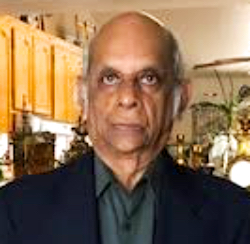 Annesley Mohan Seneviratne was born to a solidly middle class family and enjoyed a privileged upbringing. He started schooling at St John’s School Nugegoda from 1945-48 and then at St Thomas’ Prep School in Kollupitiya 1949-52. He joined Wesley College in 1953. At Wesley we all called him Mohan. I remember Mohan as a quiet unassuming guy two years my senior at school. His interest was mostly in sports. He represented school in cricket and hockey. Mohan took part in athletics at school which was fiercely competitive. The annual inter-house sports meet was ever popular and it was at the forefront of the school calendar. Mohan showed a keen interest in amateur dramatics and was a member of the school choir. The 14th Colombo Scout Troop at Wesley was well thought of by the Scouting circles and was lead by Rev R. Wilfred Pile, our British Chaplain. Our scouts took part in many Jamborees and Mohan was a keen member of the Scout Troop.
Annesley Mohan Seneviratne was born to a solidly middle class family and enjoyed a privileged upbringing. He started schooling at St John’s School Nugegoda from 1945-48 and then at St Thomas’ Prep School in Kollupitiya 1949-52. He joined Wesley College in 1953. At Wesley we all called him Mohan. I remember Mohan as a quiet unassuming guy two years my senior at school. His interest was mostly in sports. He represented school in cricket and hockey. Mohan took part in athletics at school which was fiercely competitive. The annual inter-house sports meet was ever popular and it was at the forefront of the school calendar. Mohan showed a keen interest in amateur dramatics and was a member of the school choir. The 14th Colombo Scout Troop at Wesley was well thought of by the Scouting circles and was lead by Rev R. Wilfred Pile, our British Chaplain. Our scouts took part in many Jamborees and Mohan was a keen member of the Scout Troop.
The Principal Mr P.H.Nonis and the Headmaster of the school Mr J.L.F De Mel have written warmly of Mohan’s commitment to the activities of the school and his loyalty to Wilkin House. Mr De Mel speaks glowingly of his courteous and genial manner and his sense of responsibility.
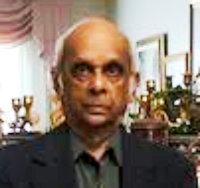 Mohan left school in 1959 to join Aquinas University College, Colombo. There he continued his studies until 1961. He left Aquinas to begin a career in planting. Mohan with his skill and ability rose up rapidly on the steep ladder of the Tea Planting industry. He became an Estate Superintendent (PD) in 1972. Mohan was subsequently promoted to the prestigious position of a Visiting Agent. He served mainly in the Uva district. Mohan had a great sense of humour, but there was also a quiet dignity about him that was accompanied by an aura of complete authority which was required in management.
Mohan left school in 1959 to join Aquinas University College, Colombo. There he continued his studies until 1961. He left Aquinas to begin a career in planting. Mohan with his skill and ability rose up rapidly on the steep ladder of the Tea Planting industry. He became an Estate Superintendent (PD) in 1972. Mohan was subsequently promoted to the prestigious position of a Visiting Agent. He served mainly in the Uva district. Mohan had a great sense of humour, but there was also a quiet dignity about him that was accompanied by an aura of complete authority which was required in management.
The peaceful life that existed since Independence from British Rule gradually faded into chaos. The left wing politics of the time ushered in an era of workers strikes which damaged our economy and ruined the good life that existed in Ceylon. The coup d'etat in 1962 and the insurrection of 1971 brought on political instability. This turmoil, unrest and uncertainty was not conducive to a happy life. Our country and its citizens paid a heavy price. The turbulence and trouble was again exacerbated by the ethnic conflict leading to much fear, alarm and anxiety in the plantation sector. Mohan had an illustrious career and remained in the Tea industry until 1985. All through his years he was dedicated to his profession and inspired many budding young planters. Mohan enjoyed the life as an upcountry planter immensely. After much thought and deliberation Mohan emigrated to the USA with his wife, Dr Damayanthy Seneviratne. Leaving at the top of his profession did raise a few eyebrows in the plantation sector.
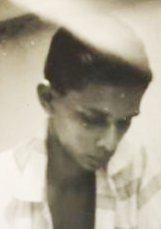 Damayanthy’s brother Nalin was with me in medical school. In 1965 Nalin and I decided to travel the hill country in his beloved, iconic, red Moto Guzzi Motorbike. This was a most memorable trip. We arrived at Queenstown Group, Hali-ela late in the evening. Mohan Seneviratne who was the SD of the estate welcomed us warmly. He had a butler and several servants who looked after our every need. We spent a week in comfort and luxury. He was a wonderful host. I still remember his warm and generous hospitality and the delicious cuisine. During our stay in Hali-Ela Mohan drove us to Badulla where we saw a rugby game and visited friends in the medical house officers quarters. After a week of luxury we were sad to leave Mohan and the comfort of his home.
Damayanthy’s brother Nalin was with me in medical school. In 1965 Nalin and I decided to travel the hill country in his beloved, iconic, red Moto Guzzi Motorbike. This was a most memorable trip. We arrived at Queenstown Group, Hali-ela late in the evening. Mohan Seneviratne who was the SD of the estate welcomed us warmly. He had a butler and several servants who looked after our every need. We spent a week in comfort and luxury. He was a wonderful host. I still remember his warm and generous hospitality and the delicious cuisine. During our stay in Hali-Ela Mohan drove us to Badulla where we saw a rugby game and visited friends in the medical house officers quarters. After a week of luxury we were sad to leave Mohan and the comfort of his home.
Nalin too emigrated to the USA in 1969 and settled in Corona, Los Angeles California. When we visited him in 1994 we enjoyed his wonderful hospitality and the comfort of his mansion. Mohan and his wife Damayanthy lived in Apple Valley, California a few hours drive away. It was such a pleasure to see them and also to keep in touch by email for so many years. Wesley College smoothness has rubbed off on Mohan and remains a gentleman and a fine product of my old school.
Mohan continued to work in the retail sector and later the Postal Services of the USA. He retired in 2005 after remarkably varied careers in two continents. His dear wife Damayanthy passed away in 2020 and Mohan lives alone in his house in the Apple Valley California. They have 2 sons one an Orthopaedic Surgeon in New York and the other in the Fire Service in San Diego. As a life long dog lover he has man's best friend for company.
A man of moderate habits, he has created his utopia in the Apple Valley where he enjoys a comfortable lifestyle living in grace and dignity. Mohan is an extraordinary man who has lived an extraordinary life thus far. Despite being born in old colonial Ceylon and enjoying a good life in Sri Lanka Mohan is now a 'fully paid-up member' of the local community in the Apple Valley. He straddles both cultures, displaying a fierce loyalty to his own country while delighting in American life and traditions.
Mohan has a large garden which he cares for with a little bit of help. He finds contentment in gardening, walking and being in contact with friends and family. Mohan is a wonderful person, incredibly tolerant, gifted with gentle and caring attributes. Mohan cared for his wife in her final years with compassion and total dedication. Mohan had remained a lifelong Christian all his life since attending Sunday School as a child at the Church of St Mary and St John in Nugegoda. In day to day life he is known for his clean-living, being teetotal, non-smoking, non-gambling and non-swearing. By the way he lived his life and conducted himself he was able to show his wife Damayanthi the loving, caring and kind ways of a true Christian life.
He is a loyal old boy and a friend of Wesley. We have kept in touch by email and Social media and also through our mutual friend Senthil Sinniah to whom we were both close.
Friendships are natures great gift to the human race. Ones made in our youth had a certain closeness which we could never replicate later on in life. Even now those friendships remain close despite the passage of years and the oceans that separate us. They seem priceless and have lasted a lifetime.
On behalf of the brotherhood of Wesleyites Worldwide I thank Mohan for his contribution to the life of the school. We all wish him a long and happy retirement.
Links to references from the Principal and Headmaster
Kindly sent to me by Dr Shanti McLelland
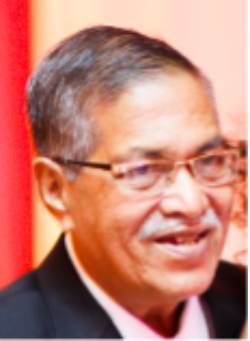 M W ‘’Tuan’’ Camball attended Wesley College Colombo from 1955 to 1974, represented College in Rugby and Soccer. Was a member of Wilkin House and was in involved in all Sports activities.
Was elected as the President of the Old Weslyites Sport Club in the late 70s. The Club was revived after along lapse, with the loyal Old Boys Dr. Shanti Mclelland, Walter Jayasuriya (better known as the father of Ceylon Hokey), Adrian Wickremaratne and a host of keen Old Wesleyites. I was also a committee member of the Old Boys Union during the same period.
M W ‘’Tuan’’ Camball attended Wesley College Colombo from 1955 to 1974, represented College in Rugby and Soccer. Was a member of Wilkin House and was in involved in all Sports activities.
Was elected as the President of the Old Weslyites Sport Club in the late 70s. The Club was revived after along lapse, with the loyal Old Boys Dr. Shanti Mclelland, Walter Jayasuriya (better known as the father of Ceylon Hokey), Adrian Wickremaratne and a host of keen Old Wesleyites. I was also a committee member of the Old Boys Union during the same period.
During my tenure as President in the 70s we were successful in promoting two of our players to represent the Sri Lanka National Hockey team. We were also able to host a Hockey club team, from Switzerland Called ‘’Red Sox Club ‘’ with the assistance of the late Dr Lou Adihetty who was later the Principal of the College. I will always cherish and treasure all the great qualities instilled by my great school. Long live Wesley College and God bless my great school to great height and glories in the future.
Kindly sent to me for publication by Peter Peiris
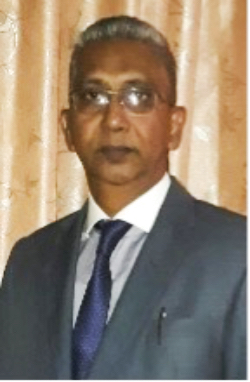
Old Boys Of Wesley in Sri Lanka Unanimously Elected Fowzil Nawaz as Their New President for 2021- 2022. Fowzil Nawaz who joined Wesley College in 1968 had his entire Secondary School Education at Wesley beginning from Grade 1. He was duly elected unanimously as the 34th President of the OBU at an Annual General Meeting on the 10th of April 2021. Due to the restrictions imposed as health guidelines with the outbreak of another wave of Covid 19, the meeting was held digitally which is a first in the history of the OBU.
During his studentship at Wesley Fowzil was active in Sports and was also involved with the Drama Society. He also held responsible positions in the Literary Societies.
Leaving school he immediately got involved with the activities of the Old Boys Union of Wesley by becoming a committee member under the Presidency of Mr. M. H. Mohammed in 1992.
From the year 2007 to 2012 he served in several capacities in the OBU holding the positions of Assistant Treasurer, Treasurer and Secretary under the Presidency of Lasantha Fernando.
From the year 2012 to 2016 he served as a Vice President under the stewardship of Past Presidents Ivor Mahroof, Richie Sappideen and Jeremy Brohier. He also has the unique distinction of being the Secretary of the Old Boys Union of Wesley College from 2016-2021.
Fowzil Nawaz has been a loyal and dedicated old boy of Wesley College who has worked with much zeal and devotion having participated in numerous projects of the school. He served as Chairman of the Life Membership Drive of the Swimming Pool Project having donated successfully. Fowzil actively participated with the organising of the Wesley Walk in 2007, 2010 and as joint treasurer in 2015. He was involved with the musical production “Fusion” on 3 occasions and “Proud to be a Wesleyite” on both occasions. “Hits of Yester Year” musical show organised by the PTA was another one of the projects Fowzil was deeply involved with.
Playing an important role in the affairs of now dysfunctional Parent Teacher Association, Fowzil served as its Treasurer. He headed the Distribution of School Books for grades 1-5 resulting in a turnover greater than Rs. 2M every year. Fowzil was a member of the Wesley College Welfare Society in 2010.
Wesley College
Fowzil Nawaz served as secretary of the Old Wesleyites Sports Club from 2008-2013 serving three presidents, and from years 2015 to 2018 was the President of the Old Wesleyites Sports Club. His experience and guidance bore fruit taking the OWSC out of difficulty and making it profitable, a role worthy of emulation. In addition to the services rendered to his Alma Mater, Fowzil was an active member of the Wellawatte Jaycees (now Junior Chamber International of which he was elected as President in 1988.
Subsequently he became the Vice President, Executive Vice President, Secretary General, General Legal Consul, Deputy National President and finally National President of the Junior Chamber of Sri Lanka in the year 2000 giving leadership to 23 Clubs in the island.
For his outstanding work Fowzil was elected the Vice President of the Junior Chamber International at the world congress held in Sapporo Japan and was assigned to the Asia Region taking responsibility for countries Singapore, Thailand, Malaysia, Indonesia and Philippines.
As the final accolade Fowzil was awarded the title of Senator (life member) 58608 of JCI for his longstanding service and commitment to JCI. Fowzil is a businessman and is the Proprietor of PEARLRICH SHOE MART a family business started by his father in 1958 with branches in Pettah, Liberty Plaza, Nugegoda and Mount Lavinia.
An outline of the vision of the newly elected President.
1. To promote the traditions and culture of Wesley as envisioned by our Founding Fathers amongst the past and present boys.
2. To assist the college in its endeavour to become the premier educational institution in the Island
3. To support the Principal in his plans towards the 150th Anniversary Programme.
4. Continue the provision of new desks & chairs and smart board’s project.
5. Conduct training programs for students on leadership skills, effective communications, project planning, and career guidance.
6. Conduct training/coaching programs for teachers on modern techniques of teaching.
7. To be a partner with the refurbishment of the college pavilion which is considered the pride of the many sportsman of Wesley especially cricketers.
As the newly elected President, Fowzil has already communicated his plans to the Principal who was not in a position to join the virtual AGM. Fowzil also made a courtesy call on the President of the church Rev. Ebenezer Joseph along with the Secretary Peter Peiris exchanged pleasantries and shared his vision with him. Rev. Ebenezer emphasised and acknowledged the importance of the OBU and the role played by the Organisation in the affairs of the school. He also mentioned that the Church recognises the OBU of Wesley College.
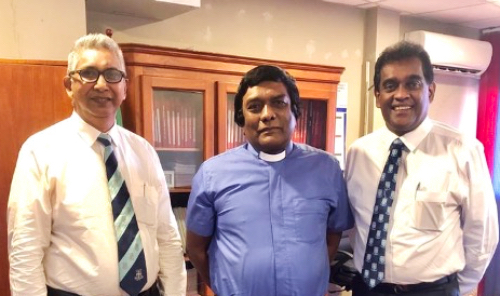
As the newly elected President of the OBU in Sri Lanka, Fowzil Nawaz looks forward to solicit the assistance, cooperation and goodwill of the Principal, all old boys, Overseas branches and other affiliates to work in unity towards the fulfilment of these goals, if found acceptable.
This is a portrait I have done of my friend Vere de Soysa
Friendships are one of God’s finest creations. Those that are made at school during our formative years remain strong in our hearts and minds throughout our lives. The great dispersal at the end of our school careers come as a shock to us all. We then embark on our journeys through life in the wider world getting on the treadmill to carve ourselves careers and raise our families. It is not until these life’s obligations are fulfilled do we get the time to look back and trace our school friends who meant so much to us. Good communications in the 21st Century, internet and telephone services have made these easier. But these still remain an alien culture to many of us who grew up in the fifties. This great dispersal and my own destiny has brought me to the UK where I have lived for the past 47 years. We are separated by 6000 miles of oceans seas and continents.
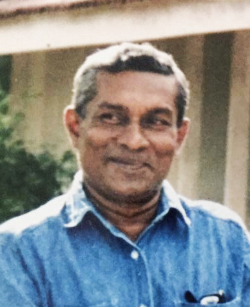 I met Vere De Zoysa when we were boarders at Wesley College Colombo in 1955 both age 13. He was from Wellaboda Road, Panadura and the house number may have been 19. His father died in the Typhoid epidemic of the 1940’s. This was a grave tragedy for the family. I can still recall his mother coming to see him with his sister Verna to Wesley, once a fortnight. He was a shy, quiet lad and had a stammer which was an impediment he tried hard to overcome. Those were the days of Rock & Roll music of Bill Haley and Elvis Presley. He emulated their hairstyles with a curly front which we then called “Thuppe”. Vere was a great drummer making a wonderful beat with his fingers drumming on the school desks. He was of a stocky build and rather muscular and had the reputation as a strong man. School work was of little interest to him but just went along to please his mother. We often sat on the thick buttress roots of the tall Mara trees around Campbell Park and under the Andara trees at the edge of Small Park chatting about our lives at home, friends, relatives and our plans and desires for the future. He often spoke about a girl friend in Panadura whom he met at Sunday School. The love of his life. Vere wanted to be a Planter in an upcountry estate.
I met Vere De Zoysa when we were boarders at Wesley College Colombo in 1955 both age 13. He was from Wellaboda Road, Panadura and the house number may have been 19. His father died in the Typhoid epidemic of the 1940’s. This was a grave tragedy for the family. I can still recall his mother coming to see him with his sister Verna to Wesley, once a fortnight. He was a shy, quiet lad and had a stammer which was an impediment he tried hard to overcome. Those were the days of Rock & Roll music of Bill Haley and Elvis Presley. He emulated their hairstyles with a curly front which we then called “Thuppe”. Vere was a great drummer making a wonderful beat with his fingers drumming on the school desks. He was of a stocky build and rather muscular and had the reputation as a strong man. School work was of little interest to him but just went along to please his mother. We often sat on the thick buttress roots of the tall Mara trees around Campbell Park and under the Andara trees at the edge of Small Park chatting about our lives at home, friends, relatives and our plans and desires for the future. He often spoke about a girl friend in Panadura whom he met at Sunday School. The love of his life. Vere wanted to be a Planter in an upcountry estate.
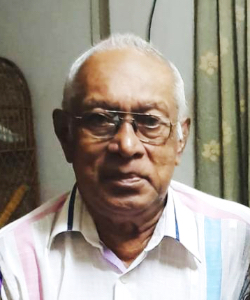 He had a tremendous knowledge of guns of all kinds. Vere had a passion for guns and talked a lot about shooting. More than using the guns himself his interest mostly was in reading about the experiences of others. He read extensively about shooting man eating leopards and about elephant kraals in Africa, Indian and Sri Lanka. He had a massive collection of books on such topics. As he spoke so much about shooting many of his friends called him 'guns and bullets'.
He had a tremendous knowledge of guns of all kinds. Vere had a passion for guns and talked a lot about shooting. More than using the guns himself his interest mostly was in reading about the experiences of others. He read extensively about shooting man eating leopards and about elephant kraals in Africa, Indian and Sri Lanka. He had a massive collection of books on such topics. As he spoke so much about shooting many of his friends called him 'guns and bullets'.
At school graciousness was one of his defining characteristics and his heart was in the right place. Gentle, kind and generous he chose his friends carefully. Vere had many acquaintances but a few good and loyal friends. Walking down memory lane I still recall our good times in the boarding and consider being his closest friend a great privilege.
For the following 2 years we remained inseparable. In 1957 I chose the Sciences and he decided to take up the Arts and we went our separate ways. I believe he left school soon after GCE around 1960. I never saw him again. I have often wondered how life panned out for him. Did his destiny take him to be a Planter? I believe like myself he is married and has raised a family. Vere has not kept in touch with Wesley College or its Old Boys Union. Perhaps this is deliberate or more likely he has had a busy career with less time for those trivial pursuits. I was not sure if he lived in Sri Lanka or has moved away to a far off land dreaming like myself of those distant days at school?
It was much later I learnt Vere became a successful low country planter mostly in the coconut industry(JEDB).He married Kusuma and had 4 girls. Kusuma sadly passed away in 2005. I was sad to hear of the death of his mother in the 1990's and also of his sister in 2021.
More than 60 years had passed since those days. We have both reached that mature age when life is less certain and to see the dawn of a new day is never taken for granted. It became my sincere wish one day we can meet again to relive our past and take stock of what life had offered us in those intervening years.
Around the year 2000 I traced Vere to Clovis Estate in Uhumiya in Kurunegala where he was a Manager. We talked often on the phone and retraced our time since Wesley College. In 2005, after several years in planting Vere retired and moved away and once again we lost contact. That was simply carelessness, an unforgivable offence!!
It took further 16 years to retrace Vere de Soysa again, this time through the courtesy of one of his cousins living in Melbourne, Australia. This was a chance email conversation with Prasanna Mendis that brought us together again. As it is often said "God does work in mysterious ways".
Vere now lives with his daughter in Kudapaduwa in Negombo. He has spent a holiday in Sweden with his daughter who lives there. We hope to be in contact as long as possible. On looking back on his life, Vere is one of those people whom I admire. He was born with a good brain and used it wisely. He educated himself after leaving school and used his innate skills to become a highly valued and respected planter. Witty with a fine sense of humour Vere is a fascinating character and excellent company. I personally have huge respect for him.
Vere is a practicing Christian and a good one with strong family Methodist connections. I do remember he was God fearing as a schoolboy and took his Christian responsibilities seriously. His entire life has been one of service to Christ and his church. He is a gentleman of deep faith and genuine Christian conviction. Now he attends the Methodist Church in Kuliyapitiya connected to his family, despite the long journey from Negombo every Sunday. In the good old Christian tradition he remains a warm and generous person.
Speaking with him more recently I have gathered that Vere has mellowed with age. He now supports the conservation of wild life and works to save wild life from needless destruction. Vere had a huge collection of snakes, lizards, scorpions and spiders all well preserved in formalin. This he has now given away to collectors. I wish him well in his endeavour to safeguard nature and wild life.
I send him and his family my very Best Wishes and May God be with him now and forever.
Links to further reading

My grateful thanks to his Principal, Shanti McLelland and his peers including Peter Peiris and Hari Parameswaran for sending this information to me
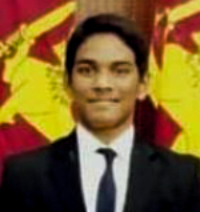 Nabeel Barry has been respectedly awarded the Two Star - V Award with recognition of his involvement, Commitments and Services for achieving Sustainable development Goals in Sri Lanka in the year 2021 together with the coalition of Sustainable Development Goals Youth , Children and Women hosted by Sri Lanka United Nations Friendship Organisation ( SUNFO)
Nabeel Barry has been respectedly awarded the Two Star - V Award with recognition of his involvement, Commitments and Services for achieving Sustainable development Goals in Sri Lanka in the year 2021 together with the coalition of Sustainable Development Goals Youth , Children and Women hosted by Sri Lanka United Nations Friendship Organisation ( SUNFO)
SRI LANKA UNITED NATIONS FRIENDSHIP ORGANISATION
The Sri Lanka-United Nations Friendship Organisation (SUNFO) is working for peace, harmony and the well-being of mankind according to the principles of the United Nations. SUNFO was inaugurated on 22 May 1999 under the patronage of Hon. Speaker of the Parliament of Sri Lanka Dr.K.B.Rathnayake and with the blessings of the United Nations Resident Coordinator Mr Peter Witham.
During the last 17 years, over one million youth, children and citizens have participated in SUNFO programs, activities, mobilizations and campaigns. SUNFO was actively involved in Millenium Development Goal campaigns, Sustainable Development Goal Post 2015 Consultations, COP21 events, and peace and reconciliation missions.
SUNFO has promoted UN Campaign Declaration 2001-2010, building a culture of peace and non-violence for the children of the world. SUNFO operates its children centre to provide shelter and protection to children in Yatagala, which is located in the Galle District of Sri Lanka.
On behalf of the Brotherhood of Wesleyites we congratulate Nabeel on his achievement
Nabeel Barry of Wesley College received UN Youth Award by RUZAIK FAROOK
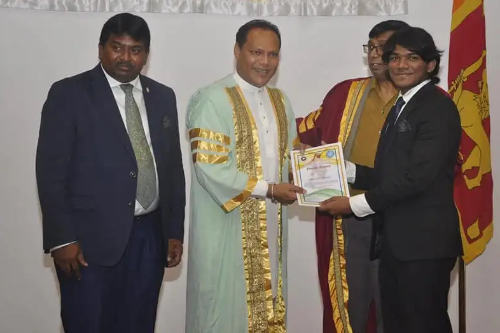
The Sustainable Development Summit 2021 focused on UN Week 2021 and Sustainable Development Goals ( SDG ) Action Decade 2021-2030 was held at the Bandaranaike Memorial International Conference Hall recently. It was organized by the Sri Lanka United Nations Friendship Organization (SUNFO).
The Chief Guest of the day was State Minister of Batik, Handloom and Local Apparel Dayasiri Jayasekera and Guests of Honour were Ex-MP Malini Fonseka and the Director General of Health Services Dr. Asela Wickramasinghe.
The welcome address was delivered by Ambassador of Peace Dr. Sir Deshapriya S. Wijetunge – the Director General of SUNFO and Policy Advisor for SDG Alliance in Sri Lanka. A message from the United Nations Secretary-General, His Excellency Antonio Guterres was delivered at the occasion.
The Sustainable Development Goals Award for Youth was awarded to Nabeel Barry of Wesley College for his Exemplary Leadership and Selfless Service to promote the United Nations Sustainable Development Goals. He was also bestowed with the two star V award in recognition of his involvement, commitment, and dedication to achieving the Sustainable Development Goals of Sri Lanka at a previous occasion this year. The event was held together with the collaboration of Sustainable Development Goals – Youth, Children, and Women hosted by the Sri Lanka United Nations Friendship Organization (SUNFO).
Nabeel Barry Awarded 4-Star Award at the BMICH
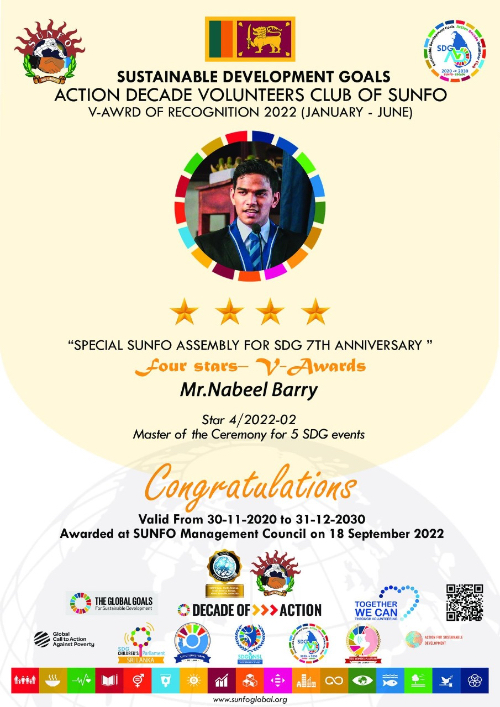
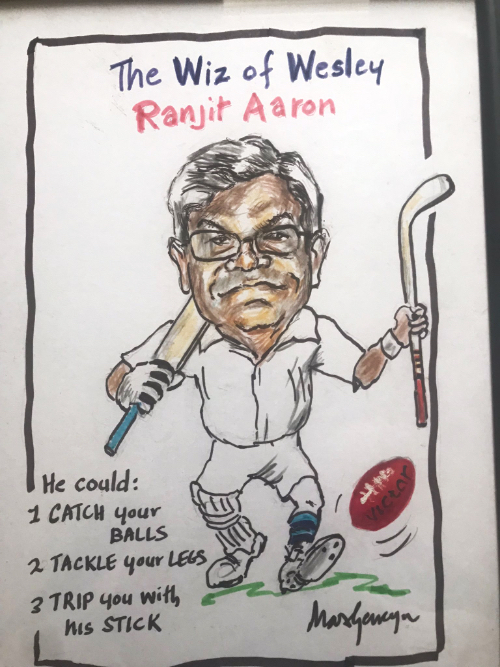
About the famous cartoonist Max Gerreyn by Ranjit Aaron
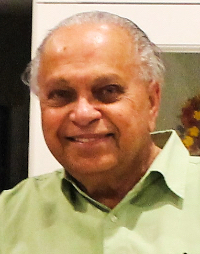 It was Ricky Muthukumarasuwamy a former rugby Great from St. Anthony’s College Katugastota, who first introduced me to Max Gerreyn who had come to witness the NCC vs Police rugby clash in 1964. Ricky played alongside me as a Wing Forward for NCC in the Clifford Cup Rugby tournament. Max and Ricky were bank officer from Bank of Ceylon Head office in Fort. Maxi’s brother Mark Gerreyn too was a leading cartoonist in Sri Lanka.He contributed cartoons and illustrations to all the English medium newspapers in Colombo and free-lanced as the cartoonist for The Daily and Weekend Sun newspaper of the Gunasena Group for over 15 years.He immigrated to Perth, West Australia in June 1977.
It was Ricky Muthukumarasuwamy a former rugby Great from St. Anthony’s College Katugastota, who first introduced me to Max Gerreyn who had come to witness the NCC vs Police rugby clash in 1964. Ricky played alongside me as a Wing Forward for NCC in the Clifford Cup Rugby tournament. Max and Ricky were bank officer from Bank of Ceylon Head office in Fort. Maxi’s brother Mark Gerreyn too was a leading cartoonist in Sri Lanka.He contributed cartoons and illustrations to all the English medium newspapers in Colombo and free-lanced as the cartoonist for The Daily and Weekend Sun newspaper of the Gunasena Group for over 15 years.He immigrated to Perth, West Australia in June 1977.
Wesley College Rugby Team 1962
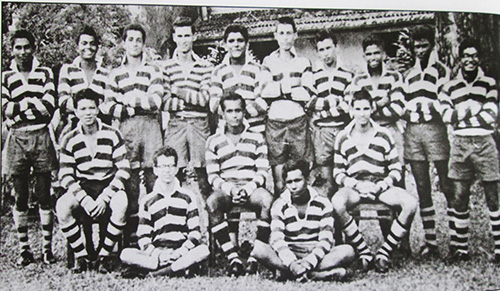
The Life and Times of Ranjit Aaron by Dr Nihal D Amerasekera
Ranjit was born in Badulla in that salubrious climate in the hills. His parents wanted him to be educated in Colombo. He joined school in 1952 and took well to life at Wesley. Ranjit Aaron was at Wesley during the splendid Oorloff/Nonis era of the 1950's and 60's.
Spending his holidays in Badulla, he speaks warmly of the idyll of his early childhood spent roaming the countryside. Ranjit has written with great warmth his train journeys to Badulla during those immediate post colonial era when those trips were pleasurable as they were memorable.
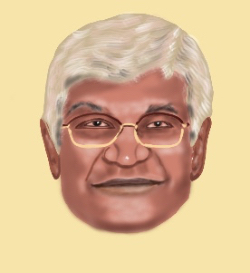 Although he was several years my junior at school, I remember him as an energetic lad wearing thick rimmed glasses always actively running in the garden in front of the school before morning assembly. During the intervals he was often found playing football and cricket in the dust bowl that was the small park. As the years passed Ranjit played Rugby for the 1st XV under the captaincy of J.R. De Silva in 1962 and Sin Sen Chang in 1963. He also played 1st XI Hockey for Wesley.
Although he was several years my junior at school, I remember him as an energetic lad wearing thick rimmed glasses always actively running in the garden in front of the school before morning assembly. During the intervals he was often found playing football and cricket in the dust bowl that was the small park. As the years passed Ranjit played Rugby for the 1st XV under the captaincy of J.R. De Silva in 1962 and Sin Sen Chang in 1963. He also played 1st XI Hockey for Wesley.
After leaving school he was at the Polytechnic for a year and continued playing Rugby for the NCC in the B division in the Clifford Cup Tournament. Subsequently from 1967 he embarked on a career with Brown and Company in Lindula and Uda Pusellawa in the Tea machinery division. It was there he had a nasty car accident and nearly lost his life. Ranjit continued to work for Brown and Co until 1985. Subsequently Ranjit worked and gained experience in several companies. With his ability to lead and inspire he rose to become the Marketing Consultant in the Hardware Division at Alliance Finance Ltd. Ranjit retired and emigrated to New Zealand in 2008. Never afraid of change, he met the challenges head on and made a good life in his new country.
Ranjit and his wife Rita now live in picturesque Ōpunake, a small town on the southwest coast of Taranaki in New Zealand's North Island. From all around Opunake there are stunning views of the snow clad Mt. Taranaki, a dormant volcano.
Until Covid put a stop to foreign travel Ranjit was a regular visitor to Colombo. The OWSC has become the common watering hole for local and expat old boys to exchange those pearls of school gossip. With those huge gusts of boyish enthusiasm he caught up with school friends to enjoy a chat and a drink at the endearing and enduring Railway Carriage. It is hard not to be entranced by those old stories. On his visits to Perth, Melbourne and Sydney Australia he met with the Wesley fraternity and those events are well recorded in the DBI.
Always genial, charming and easy going, We have remained friends for many years. He is a uniquely vivid and affectionate friend. Among his most endearing and occasionally exasperating qualities was his inability to say an unkind word about anyone, even if they had done him a bad turn. All through the vicissitudes of life he never lost his abundant sense of humour. As he lives halway round the world away from me and closer to Antartica we chat on WhatsApp and email. He is one of the most passionate and loyal old boys I know. Being a fine and prolific writer with a wonderful memory he has contributed enormously to the Double Blue International. His contributions are a storehouse of information and deeply nostalgic. Those refreshingly long trips down memory lane capture his essence perfectly. Those reminiscence are indeed a pleasure to read.
Ranjit remains a sports enthusiast watching cricket and rugby on TV at all hours. He follows the fortunes of the Sri Lankan cricket despites its swings and ups and downs. The endless success of the All-Black Rugby team gives him the joy and happiness he richly deserves.
Devoted to his children and grandchildren, their company remains the greatest happiness of his life. On behalf of the Brotherhood of Wesleyites Worldwide, I wish Ranjit and Rita a very happy and a long retirement in peaceful Opunake.
Ora et labora
Links to further reading
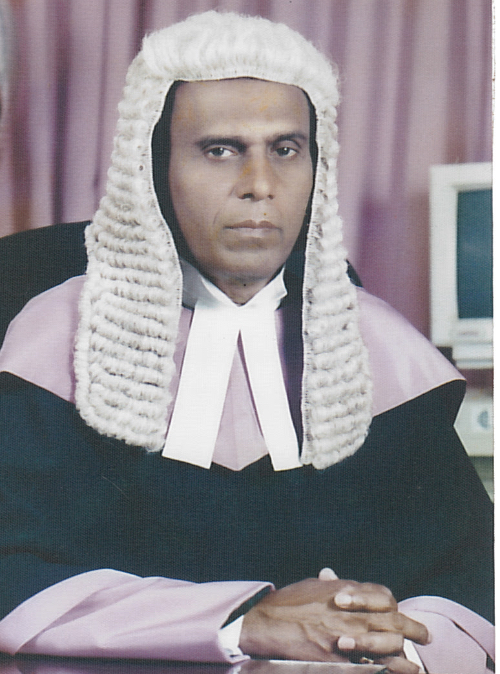
I joined Wesley College in 1950. In a class of around 30 students, I clearly recall a scraggy kid, just like myself, called NVG Chandradasa. He was rather quiet and attentive in the class and never got into any scrapes, unlike some others. I do not recall if it was in 1951, his brother NVG Maithripala, too joined our class. It was a rather unique situation to have two brothers in the same class. This indeed did raise eyebrows and drew some comments and attention. I remember they too travelled with me from Nugegoda using the KV line from Baseline Road.
We moved class every year and time passed relentlessly. I remember with such clarity the tragic and untimely death of the Prime Minister SWRD Bandaranaike in 1959. There was great public outpouring of grief. SWRD was well known for his brilliant oratory since his days at Oxford University. His vigorous thinking and his animated, insistent delivery became popular amongst his fans and followers. Many imitated SWRD’s style and mannerisms in their speeches. That was a time when oratorical contests at schools became popular and interhouse and inter school debates at Wesley College came to the forefront. This brought out the best in NVG Chandradasa. He soon came into prominence and became known for his clear thinking, fine oratory and debating skills. It was then we saw the beginnings of his interest in a career in the legal profession.
We remained together until 1957 when the division of the class into the Arts, Sciences and Commerce began. Chandradasa went on to the Arts and I to the Sciences. We continued to exchange greetings on the long corridors of the school. As I moved to the 6th form Chandradasa left Wesley to join the Ceylon Law College. Subsequently, he changed his name to Chandradasa Nanayakkara.
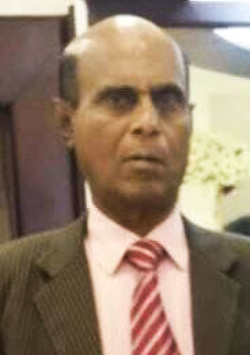 After being enrolled as an Attorney at Law by the Supreme Court of Sri Lanka in 1968 Chandradasa soon collected further qualifications , LLM - University of Colombo, M.A (International Relations) – University of Colombo, PhD in Law- National Law School of India, Bangalore, India. He pursued his academic interest in law under the guidance and tutelage of Prof. G. L. Peiris, the Dean of the Faculty of Law at the University of Colombo. Chandradasa has authored a book entitled ‘Freedom from torture: A right without limits’ outlining and supporting its legal and moral basis. This has been well received by the public and by many prominent legal luminaries.
After being enrolled as an Attorney at Law by the Supreme Court of Sri Lanka in 1968 Chandradasa soon collected further qualifications , LLM - University of Colombo, M.A (International Relations) – University of Colombo, PhD in Law- National Law School of India, Bangalore, India. He pursued his academic interest in law under the guidance and tutelage of Prof. G. L. Peiris, the Dean of the Faculty of Law at the University of Colombo. Chandradasa has authored a book entitled ‘Freedom from torture: A right without limits’ outlining and supporting its legal and moral basis. This has been well received by the public and by many prominent legal luminaries.
Chandradasa Nanayakkara enjoyed a distinguished career both at the Bar and on the Bench and became a most respected member of the judiciary for 28 years. This was helped enormously by his fluency and fine command of both the Sinhala and English language. He used this to great effect with his fine oratorical gestures and outstanding debating skills. Bold, innovative and outspoken, Chandradasa was not a run-of-the-mill High Court judge. To be a successful judge in a developing country one has to be fearless, tenacious and pragmatic. Although there was a current trend in the profession towards specialisation, he enjoyed a wide-ranging career. Chandradasa soon became a senior judge hearing a wide variety of criminal, civil and family cases. His reputation was that of a robust and practical judge who is clear-minded, strong and fair. His thesis for the PhD was on the subject of ‘torture’ in the field of human rights. Chandradasa became very well known for his views on the subject and was prevailed upon to judge some of the important cases involving human rights violations in Sri Lanka. He upheld the law fiercely and nothing could soften his courageous approach.
Chandradasa respected the ethos and ethics of the profession and upheld its much-valued traditions. Being a Judge can be a lonely job. They have to lead lives that are remote and detached from friends and society. This is a huge price to pay for the position they hold. In making their decisions, despite the law and the reasoning, someone is left unhappy and dissatisfied. The Judge must bear this burden that cannot be shared. Chandradasa had what it takes to be a good High Court Judge, a hard shell and a soft centre.
He retired after a long career as a High Court Judge at the Court of Appeal. Even after retirement he has the energy to continue to sit on Important Boards of Review and high profile Commissions of Inquiry. He now lives in Nugegoda and writes regularly to the newspapers on various topics from Jurisprudence to Buddhism. Chandradasa fights with his pen for the independence of the judiciary, the need for high professional standards, the elimination of corruption and political interference. Chandradasa Nanayakkara’s opinion is greatly valued and he continues to offer his help.
Chandradasa is friendly, convivial and immensely proud of his old school. He visited his former Vice Principal K.M De Lanerolle while he was in a residential home in his final years. Chandradasa wrote a fine eulogy on his demise. In 1997 he was invited to be the Chief Guest at the Annual Prize Giving at Wesley College by the Principal Mr N.A.B Fernando. This is a privilege afforded to only the very best products of the school.
I have many fond memories of my years at school and consider them some of the best in my life. As I emigrated to the UK, managing a career and bringing up a family took away much of my time. Meanwhile I had lost contact with Chandradasa for many years until he phoned me in the new millennium while on a visit to the UK. But I was too busy professionally and we never had the good fortune to meet again. It is a long 70 years since we first met. The ravages of time has taken its toll on us both. More recently we have kept in touch and exchanged views about mutual friends. It is such a great pleasure to be in contact again. There have been many interesting topics to discuss. I admire immensely his talents, enthusiasm and ambition which propelled him to the very top. As a friend I respect him enormously for his outstanding professional achievements and remarkable contributions to society.
His brother, Maithripala, passed away in September 2021. May he find the Ultimate Bliss of Nirvana.
On behalf of the Worldwide Brotherhood of Wesleyites I wish Chandradasa a long and happy retirement.
Ora et labora
Links to further reading
The 25th Anniversary Celebrations of the Wesley College "Year 1996 Batch" was held at the Old Wesleyites Sports Club on Saturday the 5th December 2021. Over 110 participants along with 10 teachers attended the grand event. It was organized by a committee (Photo attached) led by Harish Dilshan who travelled from Manila, Philippines. Harish captained the College Rugby Team.
Organising Committee
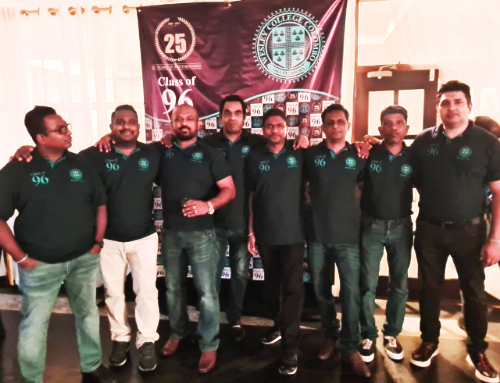
The Class of 96
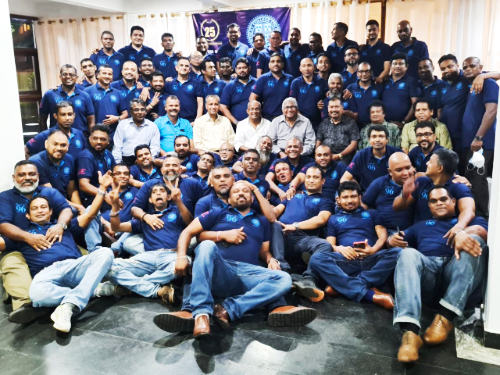
Curriculum Vitae
JOINED WESLEY IN 1948 - LEFT IN 1963
STUDIED UNDER FIVE PRINCIPALS: REV. CARTMAN, C.J ORLOFF, P.H. NONIS, KENETH DE LANAROLLE, A.S. WEERASINGHE.
ENTERED UNIVERSITY OF CEYLON: 1964 BSc. Honours Agriculture Post Graduate: MSc. First Class: Food Science & Technology, Obihiro State University Hokkaido, Japan
Certificate in Rice Processing and Nutrition (Japan)
Career: Academic Staff University of Ceylon, Peradeniya
Paddy Marketing Board of Sri Lanka: Storage Superintendent F.A.O. Rice Processing Centre Anuradhapura: Research Officer Managing Director: Green Agro Lanka (Pvt) Ltd. Awarded Pioneering Status by the Export Development Board of Sri Lanka for the development of Coir Based Growing Media.
Senior Agricultural Consultant: Export Agriculture
Country Consultant Dole Foods Inc. U.S.A & Dole Asia (Pvt) Ltd. Established Dole Lanka (Pvt) Ltd. (2004)
Consultant for Shing Sun Seoul Korea
Academic Achievements:
International Association of Soil Science Annual Sessions Munich Germany
Presented Paper on soilless Coir Based Growing Media.
All Japan Association of Food and Nutrition, Annual Sessions, Kyoto, Japan.
Presented Paper on Nutritional Status of par-boiled Sri Lankan rice varieties.
Pioneering Research and Introduction of Coco Peat as a Growing Medium in UK, Europe, USA, Japan, Korea and Australia.
UNIDO Country Consultant on Coconut Husk Products. Presented Paper – (Greening of the Supply Chain).
Extra-Curricular Activities
College Prefect Acting Senior Prefect
Secretary College Sports Council
Best All-round Student in the Lower vi
Best All-round Sportsman
College Colours: Cricket, Athletics and Hockey College Athletics Captain
Cricket: Represented College 1960 – 1963
Selected for Colombo Schools Eleven 1961
Selected for “Daily News” Schools Eleven 1962
Hockey: Represented College “Colombo North Schools” and Ceylon Schools Pool.
Athletics: Winner Pole Vault, Javelin Throw, Long Jump and 100 metres (College Sports Meet)
Winner Pole Vault Colombo North Group Meet Represented College: Public Schools Meet (Pole Vault, High Jump, 110 metres hurdles)
Junior AAA Meet 1961: Placed 3rd 110 metres hurdles.
University of Ceylon Peradeniya 1965 – 1969
President Arunachelam Hall Society – President
Agriculture and Vet nary Faculty Students Society – President
Students Council – General Secretary
Inaugural Combined Universities Students Council 1969 (General Secretary)
Captain Cricket and Athletics 1968-1969
President Sports Council 1968
Best All-round Sportsman of the Year 1967 and 1968.
Represented All Varsity in Cricket, Hockey, Rugby and Athletics.
All Varsity Colours in Cricket, Hockey, Rugby and Athletics.
Sports and Sports Administration National Level:
Cricket:
Captain: Silly Mid Off Cricket Club – Winners Daily News Trophy
Exco Member for Board of Cricket
Chairman Umpires Committee Board of Control for Cricket in Sri Lanka.
Member Organising Committee for the Inaugural Test Match against MCC 1982
Liaison Officer for Visiting Test Team 1982
Captain Central Province Cricket Association in Robert Senanayake Trophy 1970 – 1971
Captain Central Province Cricket Association against the visiting Malaysian Cricket Team 1971
Represented Central Province Cricket Association against the visiting Pakistan Test Team 1971
Captain Central Province Cricket Association against the visiting MCC Test Team 1971 taking 3 wickets and scoring 19 runs. Called for National Trials 1971.
Represented the State Services Cricket Association in Lucknow, India
Hockey: Represented CHA against the visiting Indian Olympic Team.
Toured India with the CHA Team.
Captain State Services HA in the Hockey Nationals
State Services Hockey Star of the Year
National Selector Ceylon Hockey Association
GOLF:
Executive Committee Member Royal Colombo Golf Club
Ground Secretary RCGC
Multi Winner Calcutta Medal, Pin Fernando Trophy, Senior Club Champion, Winner
Grand Prix and Multiple Medal Round and Club events,.
Sri Lanka Golf Union National Selector
Photo: Sarath Wickramaratne receiving the Golf Trophy
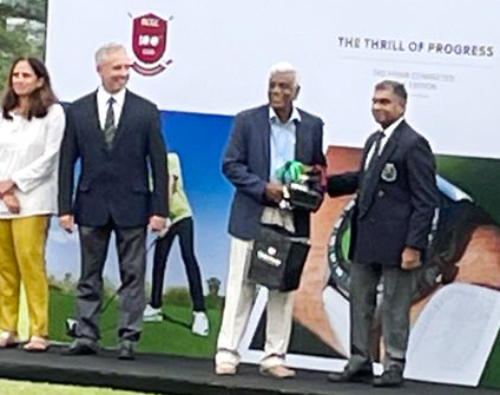
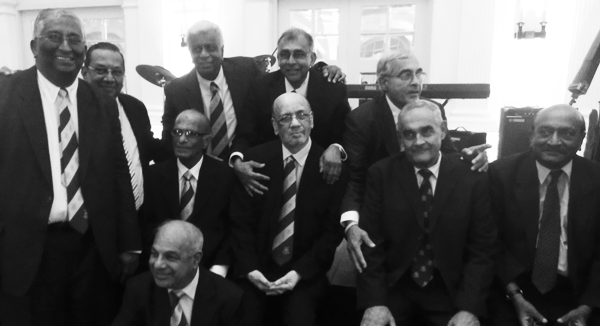
Front Row L to R: Everard Schoorman, M.N Mihlar, L.C.R Wijesinghe, Kenneth De Silva, Milroy Muthuvaloe
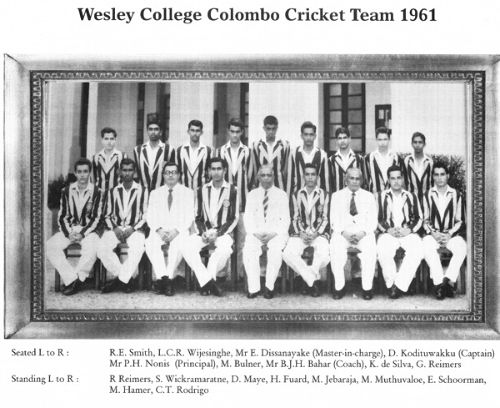
Wesley College 1st XI Cricket Team 1962
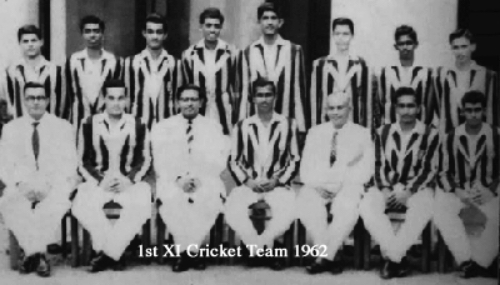
Standing L to R: Everard Schoorman, Sarath Wickramaratne, Batcha Fuard, Milroy Jebarajah, Priyanath Fernando, Bill Deutrom, Rodney Perera, Russell Hamer
Seated L to R: Mr Edmund Dissanayake, Kenneth De Silva, Mr Shelton Wirasinha (Principal), L.C.R Wijesinghe (Capt) Mr. BJH Bahar, Milroy Muthuvaloe, Darrell Maye
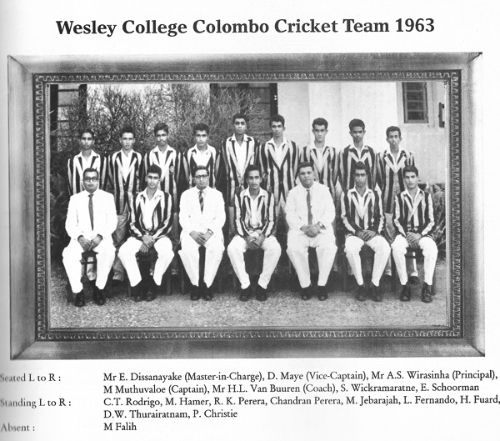
From Dr Nihal D Amerasekera
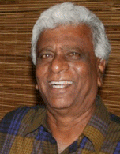 I first met Sarath when I joined Wesley College in January 1950. He was one of the youngest in our class. Then Mr M.T Rajapaksa was our Class Master in Std 2. I remember Sarath arriving to school daily with his mother and brothers. He didn’t seem to work too hard in class but was a bright lad. This was due to the intelligence written into his DNA!! Sarath had the most remarkable memory which he used to its maximum. His main interest seemed to be playing cricket. He did so in the school intervals and also after school closed. This love for the game remained all through his school career and beyond.
I first met Sarath when I joined Wesley College in January 1950. He was one of the youngest in our class. Then Mr M.T Rajapaksa was our Class Master in Std 2. I remember Sarath arriving to school daily with his mother and brothers. He didn’t seem to work too hard in class but was a bright lad. This was due to the intelligence written into his DNA!! Sarath had the most remarkable memory which he used to its maximum. His main interest seemed to be playing cricket. He did so in the school intervals and also after school closed. This love for the game remained all through his school career and beyond.
As we progressed through the years it became apparently clear that Sarath’s academic work seemed less important to him than his love for his cricket and hockey. In sports he was ferociously competitive and his charisma and indomitable spirit stood out. His spontaneous flair and exuberance was infectious. Sarath was renowned for his agility on the cricket field. Fielding close-in was his forte. His dexterity and flexibility were his defining traits. He was a very elegant batsman, a wily spinner, and an exceptionally good fielder. Being a fine athlete Sarath was a good hockey player at school. Whatever sport he played, Sarath gave 100 percent all of the time. I have been an avid spectator of cricket at Campbell Park. In the games Sarath played in the early 1960’s he has contributed in no small measure to some magnificent moments.
As a classmate his sense of fun won him many friends. All through the years I’ve known him, Sarath has remained a dependable friend. In the senior years at school Daya Perera, Rohan Wijesinghe, P.S Rodrigo, L.S Jayasinghe, Mervyn Fernando and Sarath formed an inseparable group. They remained close friends until 1962 when that great dispersal occurred when we left school.
Sarath had the wisdom to focus on what was important to him and the wonderful ability to forget the rest. Over the years he carried away many prizes at the annual school prize giving. Sarath followed a degree course in Agriculture at the University of Ceylon Peradeniya. Subsequently he started his own business venture with great success. Unsurprisingly he had these unique and amazing powers of persuasion and could sell a freezer to an Eskimo!!
As I emigrated to the UK in 1974 whenever I visited Sri Lanka I often met up with Sarath ending up with a lunch or dinner at the Royal Golf Club where he has been a regular for many decades. I have always greatly admired his enormous ability to remain unemotional in victory and defeat in sports and also when receiving good and bad news. I wonder if he just didn’t show his emotions and suppressed them deep within. With the passage of years he has remained thoughtful, single-minded, always a perfect gent and delightfully unconventional on occasion. His indomitable spirit is infectious.
It is a great pleasure to reminisce and walk down memory lane with Sarath who has a tremendous ability to recall people and past events. I cherish those wonderful times when there was never a dull moment. We always had a lot of grounds to cover as we have known each other for over 70 years. Although vast swathes of land and ocean separate us, we stayed connected with phone calls and text messages over many years.
Sarath remains a busy man in Colombo but ever present at school functions and the OWSC. He is a great supporter of his alma mater and has been since he left Wesley. His son is a successful General Practitioner in Canberra, Australia.
On behalf of our batch of 1950 and the rest of the Wesley fraternity we wish Sarath a happy onward journey.
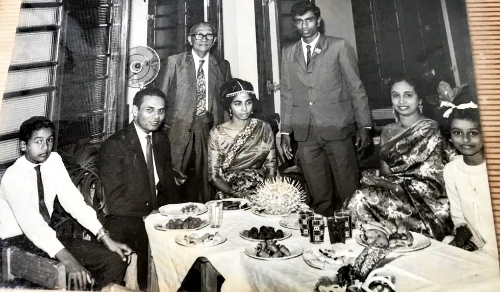
Sarath remains a busy man in Colombo but ever present at school functions and the OWSC. He is a great supporter of his alma mater and has been since he left Wesley. His son is a successful General Practitioner in Canberra Australia.
On behalf of our batch of 1950 and the rest of the Wesley fraternity we wish Sarath a happy onward journey.
Links to Further reading
Friendships are one of God’s finest creations. Those that are made at school during our formative years remain strong in our hearts and minds throughout our lives. The great dispersal at the end of our school careers come as a shock to us all. We then embark on our journeys through life in the wider world getting on the treadmill to carve ourselves careers and raise our families. It is not until these life’s obligations are fulfilled do we get the time to look back and trace our school friends who meant so much to us. Good communications in the 21st Century, internet and telephone services have made these easier. But these still remain an alien culture to many of us who grew up in the fifties.
These regular meetings are organised by Lalith Wijesinghe and friends. Lalith most kindly sends me a group photo to jog our memories of how much we all have changed in appearance. With the passage of years we all admire greatly they still are able to meet and socialise. On behalf of the Worldwide Brotherhood of Wesleyites we wish them all good health and happiness. Long may they meet and long may it last.
Friends Meeting in July 2020
Kindly sent to me by L.C.R Wijesinghe
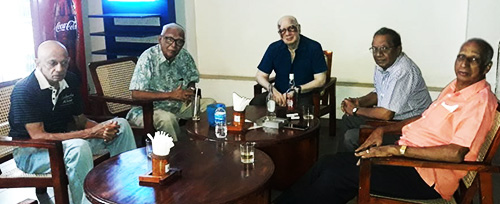
.............................................
Friends Meeting in December 2021
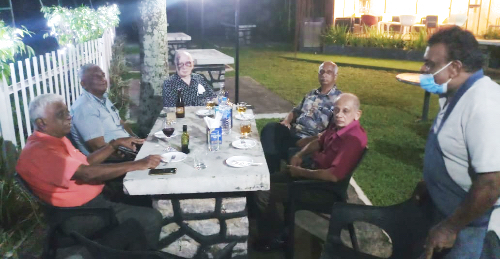
.............................................
Friends Meeting 31st March 2022 - OWSC
The friends overcame the current difficulties, restrictions and shortages to meet and greet in the usual way in familiar surroundings.
The Rail Carriage is now a symbol of the OWSC. A place of friendship. We all must thank O.K Hemachandra for his efforts to allow the Railway Carriage to find its way into Campbell Park from the Railway Running Shed in Maradana. As A Senior Police Officer he made sure the traffic was cleared for this task. The Iconic and beautifully maintained Railway carriage is now an integral part of the OWSC.
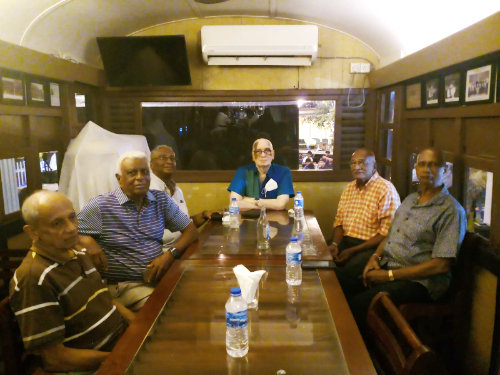
.............................................
Friends together at the Capri Club 5th July 2023
As it is often said, life is short, but friendships, loyalty and dedication are enduring qualities. Despite the passage of time and the land and oceans that separate us Wesleyites of our generation enjoy seeing photos of our school friends. It is so lovely to see friends wine and dine and put the world to right. My thanks to Lalith Wijesinghe for keeping me informed of school events in Sri Lanka. Let us now raise a glass for absent friends!!!
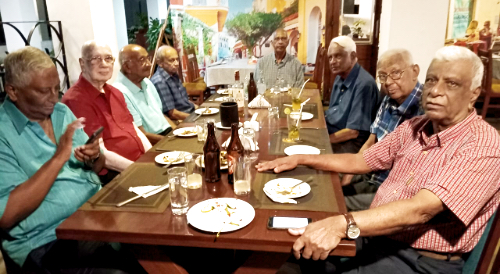
.............................................
Sixties Group Dinner - Capri Club, 25th October 2023
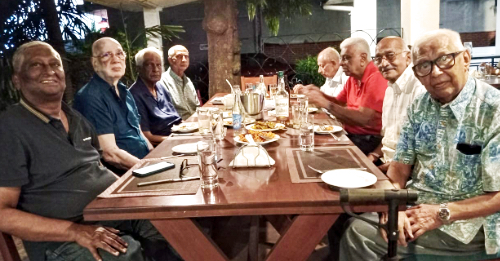
.............................................
Friends together at the Capri Club December 2023
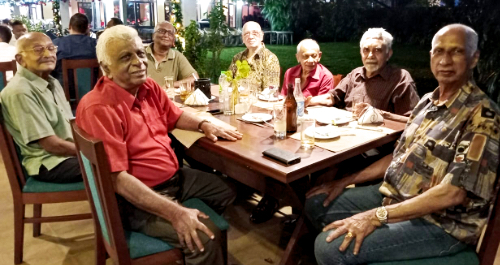
.............................................
Friends together at the Police Officers Mess 11th June 2024
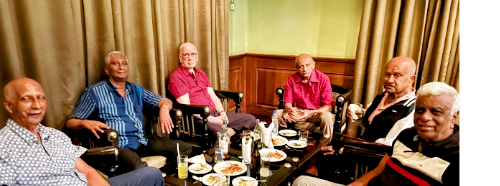
.............................................
Friends together at the OWSC on 5th October 2024
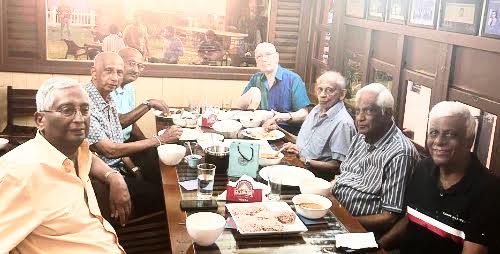
.............................................
Links to further reading
 Today, 24 January 2022, I had a relaxing conversation with Sextus who was recovering at the Mississauga hospital. We recollected some of the exciting and funny stories we had during our school days at Wesley College, Colombo in the 1960’s. Most people knew him as Bunny. But, then I always called him Taylor. We talked about Cassim Cader, (Rando) Randolph Crutchley, Leon Ingram, Tuan Camball, Donald De Silva, Indran Niles, Vijaya Perera, Shee & Ma Hung, Patrick and Malcom Jansz, Akbar Brothers, Tissa Abeydeera, and a few others.
Today, 24 January 2022, I had a relaxing conversation with Sextus who was recovering at the Mississauga hospital. We recollected some of the exciting and funny stories we had during our school days at Wesley College, Colombo in the 1960’s. Most people knew him as Bunny. But, then I always called him Taylor. We talked about Cassim Cader, (Rando) Randolph Crutchley, Leon Ingram, Tuan Camball, Donald De Silva, Indran Niles, Vijaya Perera, Shee & Ma Hung, Patrick and Malcom Jansz, Akbar Brothers, Tissa Abeydeera, and a few others.
Later, to relax and have a quiet dinner I turned on the TV. The movie I accidently watched had a connection with Sextus. It was the movie, “I Still Believe” with Sharnia Twain, K.J. Apa, Britt Robertson filmed on 28 March 2020. May Sextus too enjoy this film and get the inspiration to lift him to the heights that he deems to reach.
In school, I first got to know Sextus at the Scout Camporee in the early 1960’s. I am sure Bunny remembered Fuzzy and Ronald de Silva who were good friends at the camp. Ramakrishna (England) also attended this camp. R.E. Abraham, A. Arulaiah, A. Dhanapala, and E.L. Rodrigo were scout master during this time. I remember Bunny was in the Kingfisher Patrol of the 14th Colombo Scout Troop. As a scout, Sextus joined us to attend the camp at Pidurutalagala, Nuwara Eliya. Delmar Achilles, Garrick O’Neil, Wilhelm Van Gayzel, Bunty Dole, Dr. D. Anandanesan, Vijitha Kuruppu, Ravindra de Silva, Ranmal de Silva, were some of the scouts who experienced this camp.
We trained together for the Wesley athletic meet. Sextus won the 100m and 200m events for Passmore house. Sextus also was a member at the YMCA. He was a team member of the Judo team, along with Asoka Jayawarthana, Cassim Cader, Afghar Mohideen, Ranjit McLelland, and Basnayake. A memorable event that Sextus put his heart and soul was to make a Basket Ball court at Campbell Park where the Old Tennis Courts were. Sextus was joined by S. J. Sarangapany, Cassim Cader, Shanti McLelland, Asoka Jayawarthana, and a few others. They played a match with Dehiwala YMCA to keep it active.
Sextus and I used to get up at 5am and run on the roads to keep fit and practice for the athletic meet. Then on Sundays go to Dehiwala Beach and run on the sand. After school we used to practice at Campbell Park for athletics. Sextus played for the Wesley Rugby Team. He was an excellent athlete, won the 100m and 200m events for Passmore House to become champions during his time.
Before Sextus migrated to England, he played a rugger match with the Sri Lanka team at Welisara. He walked almost every evening with Cassim and Shanti to Fort to drop Cassim at his home. Sometimes Randy Crutchley joined them. They walked after eating bread and sugar at the Thambi boutique at the end of Karlshure Gardens or Kiri Pani at the Pasgorasa at Maradana. Once in a way, Tuan Camball volunteered to give a feed to a few of us at the Buhari Hotel at Maradana.
Sextus visited Sri Lanka a few times. I carried his purse during his stay. He stayed with me few times. The last time he visited Sri Lanka was when I was the Principal at Wesley. He joined the Old Boys from England and had a great time and contributed to the Wesley Development Fund. I visited England and stayed with Sextus. He took care of me like brother. He was working for the Bank De Roma in London. Before that he worked for the London Railways. Later he studied to become a computer programmer. After he migrated to Toronto Canada, he worked for a few companies in the United States as a programmer for the Year 2000 project.
In Toronto, he was one of the leaders of the Organizing Committee when Old Wesleyites organized a get together at the Marina in Whitby, Ontario. Over 250 attended the event. They played cricket, had a musical chairs competition and had a dance with a band played at the end of the day. The team barbequed Hamburgers for lunch and charge only $5.00 for the event.
Bunny have two sons, Leon and Rohan. They live in Canada. Bunny’s sister, Patricia, lives in England and she is a retired nurse. She is married to Kumar de Silva. He worked at the Tin can factory. We were always welcome to their house in close to the Airport. We stayed there many times and they made sure we got to the flights in time in mornings by driving us to the Airport. She visited Sri Lanka a few times. The first time she stayed with us in Colombo. Bunny’s brother who is a Lawyer lives in London. His name is Hillary The family calls him by his pet name, which is Cucu. Bunny had two more brothers. One emigrated to England before Bunny emigrated in 1968. The other brother moved to Hamburg, Germany. I met Bunny’s father, when I visited Anuradhapura. He was the manager at Miridiya Hotel. He took care of us and had dinner with him. The most remembered and admired person in Bunny’s family was his Grandmother. She looked after all of them with utmost care. We stopped at their home off Dematagoda Road, Maradana. She believed Bunny was safe with all of us.
Now, as I write, I scanned my emails. A few friends were praying for Bunny, they were, Akbar Musafer (Wesley Hosteller, and Furst X1 Cricketer), Azahim Mohamed, Afghar Mohideen (Senior Prefect, Wesley Rugger team and Oratory team, YMCA Judo Team), Bunty Haniff (Sith Form), Rehez Ahlip (Wesley Rugby Team), Bill Deutrom (Wesley Cricket, Rugger and Hockey Teams), and Asoka Jayawarthana (Black Belt, National Judo Champion, Captain, Wesley Rugger Team).
Cassim was a black belt, National Judo Champion, an excellent Basket Ball player for the YMCA, a champion athlete at Wesley, a spirited Rugger player for Wesley, an amazing hockey goalie for the Old Wesleyites team, a Junior Cricketer, and more a great friend of many who needed his support. Cader had a Photograph Studio at Queen Street, Fort. Cassim migrated to Japan.
Rando another Old Boy was very much senior to us, but he was a warm friend who worked for the Ceylon Government Railway. He was a tall and handsome body builder and always dressed in white and long sleeves shirt. He played Rugger with our team at Campbell Park.
Shee Hung and Ma Hung were Wesley’s proud Rugger players. They studied hard and long hours with the vision to become doctors. They were Wesley’s long term Hostellers. They migrated to England.
Tissa lived at Borella next to Rohan Amarasekara, Jayantha and Parakrama Wijemannes’s houses opposite the Bicycle Bazaar. Leon Ingram, brother of Derrick and Russel Ingram lived at Mt. Mary Railway Quarters. We went to their home almost every evening to have a cup of tea and play cards. Leon played Rugby for Wesley and was a Junior Athlete. He is still in Sri Lanka.
The Akbar brothers who lived at Puvalingam Place, Borella was the place to stop to have the Manioc(Cassava) that was lifted from a garden or the St.Lukes Church, Borella. Tuan Camball was part of the team as he lived at Campbell Park. Donald De Silva was a memorable friend. He played Hockey, Cricket, Soccer, and Rugby. Donald was a National Hockey Umpire. He had four brothers who studied at Wesley.
Indran Niles lived behind Wesley on Karlsrhue Gardens. He came from St. Thomas’ and played Cricket for Wesley. We used to sit behind his house and had fun after school. Vijaya Perera was from Maradana, he lived opposite Wick’s Advertising owned by Minister of Parliament, P Kingsley Wickramaratne.
Patrick and Malcom were junior to us and they lived at the Railway Quarters and Mt. Mary. Patrick was a determined sportsman who kept wickets for Wesley and keep goals at hockey.
1st XV Rugby Team 1967
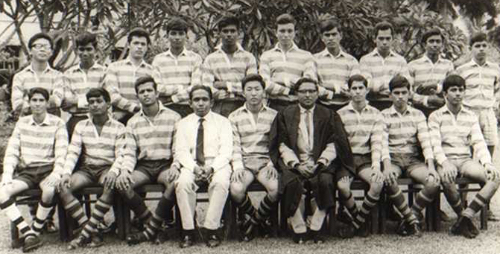
Seated:
Standing:
Links to Further Reading
I have often wondered what became of Randolph Crutchley. It is great to see a mention of a name from my years at the boarding at Wesley College 1952-58. Randolph Crutchley was a kind and generous friend and a popular lad in the boarding. We all called him Rando. I remember his wit and humour. He took part in the boyhood mischief that was endemic in the boarding. Being a fine cricketer he was a regular at the softball cricket matches we had in the Small Park that was behind our school in those days. Randolph was a lovely person, tall and handsome. He was in my parallel class along with Dallas Achilles, Sheriff Fallil and Kenneth De Silva. Randolph played for the under 12/ under 14 Cricket Teams. He never showed any interest in academia but loved the sports. I recall he didn't do well in his school examinations and this caused tremendous problems for him over many years. This sadly caused him to leave school far too soon. We were saddened to see him go and this was a tragedy for school cricket as we lost a potential 1st XI cricketer and perhaps even a cricket captain. He was indeed a very able cricketer. His father worked for the Ceylon Government Railways, the CGR in those days and was a fine cricketer playing for the CGR at the Railway Ground near the Baseline Road Station
I sincerely hope life treated Rando kindly. I do wish he has had a good life and a successful career in the Railways. On behalf of the Brotherhood of Wesleyites Worldwide I thank him for his contribution to the life of the school in those happy and distant days. We wish him well for the future.
From Dr Shanti McLelland
Fassi was in school during the days I was in School. I knew him as an active Scout and an active Rugby player. He was an interesting student and a very good friend. I asked him to write something that you may publish.
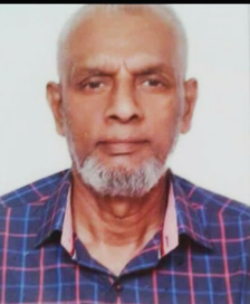 M.C.M Fassi is an old boy of Wesley College Colombo. He left the school in 1970. He loves his school which gave him the best of education and knowledge. He respects all his Principals, his classmates, and all his schoolmates. He can yet remember the good old days which he enjoyed, studied, and had fun with his classmates and scouting with all the school mates. He played rugby for the school. He remembers all the rugby players who played with them, specially Cassim Cader who was a wonderful friend. He sends his best wishes to Sextus Taylor, Eric Foster, and Ronald de Zilva who were three of his best friends.
M.C.M Fassi is an old boy of Wesley College Colombo. He left the school in 1970. He loves his school which gave him the best of education and knowledge. He respects all his Principals, his classmates, and all his schoolmates. He can yet remember the good old days which he enjoyed, studied, and had fun with his classmates and scouting with all the school mates. He played rugby for the school. He remembers all the rugby players who played with them, specially Cassim Cader who was a wonderful friend. He sends his best wishes to Sextus Taylor, Eric Foster, and Ronald de Zilva who were three of his best friends.
Boys of Wesley to the Fore
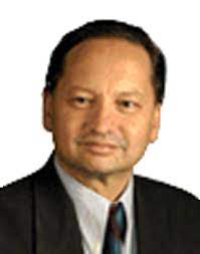 Dr Bartholomeusz is an Old boy of Wesley College Colombo. He graduated from the University of Adelaide in 1980 with a Bachelor of Medicine, Bachelor of Surgery (MBBS). He went on to train in Gastroenterology and Nuclear Medicine (including PET) and was made a Member of the Australian and New Zealand Association of Physicians in Nuclear Medicine (ANZAPNM) upon achieving his Nuclear Medicine qualifications. In 1999, Dr Bartholomeusz completed his Doctor of Medicine (MD) at Adelaide University, publishing a thesis on the role of labelled leukocytes in inflammatory bowel disease. Dr Bartholomeusz joined Dr Jones & Partners in 2002 and consults in Nuclear Medicine, PET, Bone Densitometry and Clinical and Procedural Gastroenterology.
Dr Bartholomeusz is an Old boy of Wesley College Colombo. He graduated from the University of Adelaide in 1980 with a Bachelor of Medicine, Bachelor of Surgery (MBBS). He went on to train in Gastroenterology and Nuclear Medicine (including PET) and was made a Member of the Australian and New Zealand Association of Physicians in Nuclear Medicine (ANZAPNM) upon achieving his Nuclear Medicine qualifications. In 1999, Dr Bartholomeusz completed his Doctor of Medicine (MD) at Adelaide University, publishing a thesis on the role of labelled leukocytes in inflammatory bowel disease. Dr Bartholomeusz joined Dr Jones & Partners in 2002 and consults in Nuclear Medicine, PET, Bone Densitometry and Clinical and Procedural Gastroenterology.
He is also a Senior Physician in Nuclear Medicine and Gastroenterology at the Royal Adelaide Hospital and a Senior Lecturer at University of Adelaide. Dr Bartholomeusz special interests are Nuclear Medicine in Gastroenterological diagnosis, Gastrointestinal Transit, Inflammatory Bowel Disease, PET Scanning in Gastrointestinal Disease, Head and Neck Malignancy, Breath Testing and Lymphoscintigraphy.
Kindly sent to me by L.C.R (Lalith) Wijesinghe
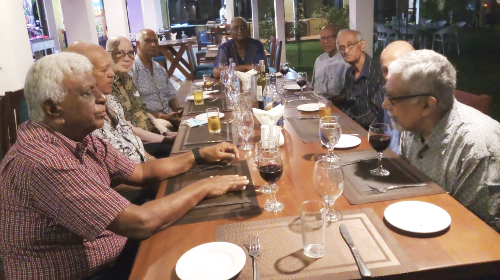
From L to R:
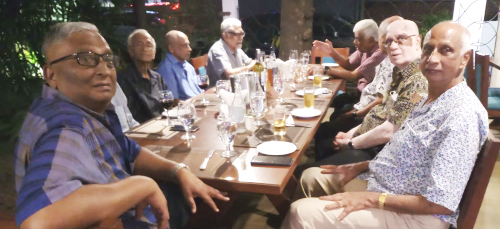
From L to R:
Links to Further Reading
Dr Nihal D Amerasekera is one of the most distinguished alumnus of Wesley College. In 1997, he created the Double Blue International. A website on all things Wesley. It gives a detailed account of the history of Wesley College. The website includes sub headings such as Principals, Teachers, Old Boys, In Memoriam, Latest News etc . The website is an invaluable resource for past , present and future Wesleyites and their families . We should all laud his vision, passion and effort in creating the Double Blue International website .
Nihal (called ND at Wesley) joined Wesley college in 1950 at the standard 2 level . He was in the school Boarding from 1952 to 1958. I was 2 years senior to him in school . I distinctly remember Nihal in school. He was a quiet, well behaved boy, his warm personality being reflected in a perpetual smile on his face. He was very studious and used to carry the class prize each year. A secret to his success, was his habit of reading. Reading truly maketh a man.
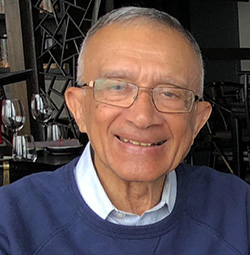 At the age of eight, Nihal was hospitalized for tonsillectomy surgery. During his stay in Hospital, he observed the dedication and missionary zeal of the Nurses and Doctors , towards their patients. This created a lasting impression on Nihal’s young mind and greatly influenced his decision to become a Doctor.
At the age of eight, Nihal was hospitalized for tonsillectomy surgery. During his stay in Hospital, he observed the dedication and missionary zeal of the Nurses and Doctors , towards their patients. This created a lasting impression on Nihal’s young mind and greatly influenced his decision to become a Doctor.
Nihal hails from a very respectable upper middle class family. His father was an electrical engineer, who worked for the Local Government Service. It was a transferable job and he was posted to places like Bogowanthalawa, Kadugannawa, Katunayake, among other places. As Nihal was an only child his parents understandably doted over him. It was a sad occasion when he left home for the school boarding, when the holidays were over. There were hugs, kisses and tears aplenty.
At Wesley, Nihal seamlessly progressed from class to class. Finally, it came time to sit for the University Entrance Examination. Nihal’s mild personality belied his steely determination. He locked himself in his room and studied for 18 hours a day. When the results came in, he had passed and was admitted to the Medical Faculty. In Medical College, it was five long years of rigorous training and studying. Nihal came through with flying colors and passed out as a doctor in 1967 .
In med school, Nihal was friends with my brother in law. At this time, I was planting in the Uva district. In 1966, Nihal and my b.i.l spent a few days with me on the Estate. I entertained them and showed them around. Nihal considers this vacation as a memorable one, to this day.
Nihal’s first posting as a Doctor was to Kurunegala ; one year as an Intern and two years in the OPD. From 1970 to 1974, he was the Medical Officer in charge of the Central Blood Bank, based in Colombo.
Beginning in 1956, conditions in Sri Lanka were on a downward spiral. The Sinhala only act, the poor quality of the politicians, the 1972 Che Guvera movement whose members attacked police stations with the idea of toppling the Government. The Che Guvera movement has morphed into the present day JVP. The communal riots and the regressive policies of successive Governments since 1956. Living in Sri Lanka was like being the proverbial frog in the well. With the regressive policies, Sri Lanka became more isolated and inward looking - the frog in the well situation becoming magnified. Like Nihal, many of us who live in other countries today, saw the writing on the wall. In 1974, Nihal packed his bags and left for the United Kingdom.
A new chapter in Nihal’s life began, with his emigration to the UK. Initially, life was tough.The only way to ensure steady employment and better salary and perks was to obtain higher qualifications. This he did. In 1976, he was successful at the prestigious MRCP examination. Thereafter, he passed the FRCR exam in 1981. Nihal trained in Radiology at University College Hospital and Kings College Hospital in London. Though it involved working long hours, life was good.
In 1976, Nihal met and married Chiu. Chiu is originally from Hong Kong. Their marriage is a strong and happy one. In 1978, their son Steve was born, followed by Andrew in 1982. Nihal and Chiu were fully immersed in bringing up their two boys whilst both of them had their own careers.
In 1982, Nihal received an attractive offer to work as a Consultant Radiologist in a hospital in Stevenage in the County of Hertfordshire, which is approximately 50 miles from London. He accepted their offer and worked at this hospital till retirement, in 2007.
Nihal liked his job at the Stevenage hospital and decided to settle down in a nearby town called Letchworth. They purchased an estate style home with a large garden . Their sons attended the local school . Nihal and Chiu were involved in the social activities of the city. The family had a peaceful and contented life.
Their elder son Steve, went on to attend Pembroke College, Cambridge University. He obtained his Hockey Blue and later became a Doctor. The younger son, Andrew studied Economics at Pembroke College Cambridge University and joined the UK civil service. Both sons are now married and have their own families. Nihal and Chiu are proud grandparents to three adorable grand kids - Sophie,Olivia and George.
Around 2015, Nihal and Chiu became empty nesters. They did not need a large house. After much thought, they decided to downsize. They sold their house in Letchworth and purchased an apartment in London. Nihal and Chiu were both fully retired. In order to keep busy and involved, they joined some of the numerous clubs and societies based in London. Chiu keeps a beautiful home and is an excellent cook.
Nihal spends his time, reading and writing. He is a connoisseur of fine wine. He is also partial towards the 'amber nectar' - a term coined by Nihal. He appreciates classical music but digs pop music too, especially, pop music of the fifties and sixties. Nihal is a keen follower of cricket. His home is just a few minutes away from the hallowed cricket grounds, Lords. He has witnessed some memorable test matches. Nihal and Chiu love to travel. They’ve taken trips to Europe, Australia, Asia, North America and South America. Nihal loves going to the theater and has seen some great productions in London. Nihal is dignified, cultured and a scholar and gentleman. Nihal, I wish you health, wealth and a long and productive life. It is a privilege to be your friend.
From Dr Nihal D Amerasekera
Dear Mohan
Thank you very much for the generous tribute. We have known each other since the early 1950's and have lived in and near Nugegoda since the time I can recall. Your wife Damayanthy and her brother Nalin I have known since medical school days in Colombo. Thank you so much for keeping in touch over the years.
With my very best wishes
Nihal
Links for further reading
My dear Nihal,
It has been my intention to write to you for some time but never got down to it. Can put it down to procrastination, ageing or downright laziness. I may have not met or spoken to you but the face remains a familiar one from schoolboy days. The juniors tend to remember their seniors. I was in the group of the likes of Bill Deutrom, Trevor Collette, Jackie Carnie, Tony Musafer,Razeen Sappideen and the late Robin Perera, Robin Reimers, Jai Lameer and Mervyn Harmer. Others in parallel classes were P R David V P Sivalingam, Lloyd Peter, Ranjit Aaron, Rodney Perera, Nihal Perera and Desmond Jayawardene and more.
 The lockdowns imposed resulting from the Covid 19 pandemic led me to reading so many articles and obituaries contained in the Double Blue International website that has prompted me to express my sincere appreciation of the existence of such a remarkable journal and to thank you for being the founding editor of the Double Blue International. It was sad to note that many of my teachers, schoolmates seniors and juniors with whom I was associated or knew are no more . However it was heartening to read the proud accomplishments of many old schoolboys after they left college of which I never knew and am certain most would share that view too.
The lockdowns imposed resulting from the Covid 19 pandemic led me to reading so many articles and obituaries contained in the Double Blue International website that has prompted me to express my sincere appreciation of the existence of such a remarkable journal and to thank you for being the founding editor of the Double Blue International. It was sad to note that many of my teachers, schoolmates seniors and juniors with whom I was associated or knew are no more . However it was heartening to read the proud accomplishments of many old schoolboys after they left college of which I never knew and am certain most would share that view too.
The many photographs brought back memories of the youthful faces of those students that graced the college assembly hall as prefects, students and those that represented the school in various sports and other activities. Wesley had many multi talented sportsmen and allrounders who failed to get much recognition and opportunities as the college network lacked the clout the other schools had , especially in the sporting arena, the mercantile and planting sector. Despite this handicap many did quite well to progress with their sheer talent and ability.
I must at the same time also express my sincere thanks to Keith de Kretser for his contribution to the Old boys domiciled Downunder in circulating his newsletter from so long ago.. I am sure there are so many unsung heroes in the background who have made their contributions to keep the Double blue fraternity informed. Keith who has been a tower of strength to the OBU community in Melbourne was the source of inspiration to the formation of the Sydney branch under the presidency of Siva Subramaniam the son of Mrs Sivasubramaniam who was a teacher at Wesley.
It has given me so much pleasure all through the years to read many an article written by you and articles contributed by Old Wesleyites and others as well. It was great reading those articles which covered many a subject from the history of Wesley, Its Principals, Prominent Old Boys, Teachers, Sportsmen and the loyal staff of the likes of Ranis, Marshal,Wilbert and others. At that time I took it for granted that it was great to have something to read about college without realising how much time and effort went towards its publication.
The initiative you took in 1997 to host the website as quoted by you "To create a website to unify all wesleyites whatever race religion or ethnic background they may have. At Wesley we were multi ethnic, multi religion and multi cultural community. I consider the many students who passed through the gates of the school as belonging to one large family. It was my desire to bring them all to this site wherever in the world they maybe.There is no better meeting place than the internet to reflect, meet and greet.” should be applauded as you have achieved the many things you outlined in your message as the first editor to serve the Old Boys of Wesley.
It would have been a difficult journey for you, without sponsorships and advertising revenues that would have meant dipping into your own pockets just to ensure that the project would not fail.It has exceeded all expectations. Your commitment and persistence has created a journal that will now live forever cherished by the old boys. It s a ready reckoner to the proud History of Wesley and all those associated with the school.
I must not fail to express my gratitude to all those who old Wesleyites who over the years supported you and Keith and contributed towards the success of this publication and the newsletter.
It may be said that as a school grows the ties are not that great and strong as during our times. It is like the Sri Lankan Army of today, three hundred thousand strong when it was around a few thousand in the seventies and we virtually knew all of the officer cadre..Being in the Regiment of Artillery we prided our selves belonging to the Gunner tribe just as Wesley was a family . At a military funeral not so long ago a Young officer impressed by the spirit de corps and loyalty expressed by the retired officers quipped that that the tribe was getting too big and the core values were fast deteriorating. Sadly it is a common occurrence in the world and especially in Sri Lanka..
For some trivia the Army had a fair share of Wesleyites in the likes of D.M.H.B Tammitigama who was a senior prefect ,S Musafer (Bomba), Careem Zavahir, Vince Addihetty, Batuwitege, Llyod Wijesinhe, Dalkin Samidon, Upali.Perera all of whom I remembered as being at school, Some of the officers that followed them paid the supreme sacrifice in defence of the country during the bitter conflict of the thirty year war. Mahes Samarweera retired in the rank of Maj General. His father Lakshman Samaraweera was an ardent old boy.
Others whom I remember from the Airforce were Terrence Gunawardene who became the Airforce commander, Eddie Buell the first rugby captain of Wesley, Ranjith Abeydeera and Hemal Fernando. That Air Vice Marshall E R Amarasekera was an old boy and the first Ceylonese commander of the Royal Ceylon Air Force - was a fact only known to me via the Double Blue Interrnational. Wesley can be proud of producing two Sri Lanka's air force commanders.
The Rajasinham brothers in the Navy together with Brian Pereira (retd) who was I met at Kirinda during the 1971 insurgency. Derrick Mack served in the Royal Ceylon and Australian Navy. Later entries to the Navy were Wahid Musafer and am told the son of Mr and Mrs Wilfred Wickremesinghe both teachers at college.There was also an old Wesleyite senior to me maybe around your vintage in school who reached the top ranks of the Navy whose name I cannot recall.. He was an engineer by qualification.
I also bumped into Dr Derrick de Silva at Tissamaharama during the 1971 insurgency a few days after his wedding. There was another old Wesleyite whom I met in Hambantota during the height of the insurgency a tamil electrical engineer whose name I also cannot recall , who may have been around your vintage too. He was tasked if not ordered by the coordinating officer to restore the electricity to the Hambantota district as a result of the overhead cables being sabotaged. Though frightened by the prospects of being harmed by the insurgents he accomplished his task in record time.
In the police we had Bertus Perera, O K Hemachandra and B M Jurangpathy who retired as D I G's. There were quite a few who joined the Police force as sub inspectors and a few names that come to mind Ajith Wijesinhe ?, Vivian Jayaweera, Joe David (brother of AK, PR and C David) and Sharir Musafer. Sharir died under tragic circumstances at Middeniya during the 1971 insurgency. His brother A F Musafer was a recipient of the Hill medal as was A K David.
It was unfortunate that Shanthi Perera the brother of Dr Daya Perera (both senior prefects as I remember) who was undergoing training at the Royal Air Force Academy Cranwell died in a tragic accident on his last training flight . He had excelled in his course and would have certainly been a great leader. I remember attending the military funeral accorded to him as part of the college contingent.
I have also read so many an Article written by you in the Island Newspapers reminiscing of Ceylon, your medical school days and a realistic article “Our ride into the sunset “ exhibiting your journalistic skills.and supporting it with your photograph to reveal how much you have aged.The features are still recognisable.
Thank You once again for serving Wesley to re-live its past and leaving the legacy of the DBI, lets hope the new generation will carry the torch you and Keith and all the unsung Old Weleyites contributed to.
Stay Safe and Well
Kind Regards,
Bashur Musafer
From Nihal D Amerasekera
My dear Bashur
Thank you for a wonderful heart-warming email which made my day. I remember from my childhood growing up in old Ceylon that 'Thank you' was not a word we used often. It was simply implied by our body language. I appreciate your comments about the DBI and its journey immensely. My thanks go to everyone who has supported the DBI over the years by visiting the website and also contributing articles and photos. No one so far has refused to send me information whenever I have asked old boys. Presently Graham Norton, President of the Melbourne OBU has most kindly made arrangements to pay for all the expenses to keep the DBI riding the ether for all to see online. I appreciate the kindness and the courtesy Graham has shown all through the changes that have taken place. Keith de Kretser has been a tower of strength over many years.
I commend you for expressing your feeling so lucidly and candidly. Our former teacher "Miss Blacker" must have taught you English!!! A knock on the knuckles with the ruler made us use the punctuations correctly.
In 1960 we had 1200 students and we knew them all , by face, if not personally. So I do remember you very well indeed. I was forever a keen supporter of all sports at Wesley and I'm sure I spent as much time under the tall "Mara" trees at Campbell Park as I did in the class-rooms.
The guy you refer to in the Navy must be NGA (Nihal) Fernando a fellow boarder with me 2 years senior to me. The RCyAF - E.R Amerasekera was my father's brother. He sadly died age 58 yrs.
Keep safe and keep well.
With my kindest regards
Nihal
Links for further reading
From Ranjit Aaron
Haig Claessen and his wife Pam picked Rita and I from our daughter’s house to Nigel and Fay’s residence. It was an hour’s drive to Baldavis. After the normal exchange of hugs and kisses we sat to a round of drinks from Nigel vast cellar. He has an assortment of wines.
We enjoyed chatting about our school days and our school rugby playing days. The three ladies spoke of their school days, as Pam and Rita were past pupils of Good Shepherds convent, Kotahena. Pam had even baked a cake for Fay, as her Birthday was around the corner. After a very sumptuous lunch we sang Happy Birthday to fay and the cake was cut. It was a wonderful reunion after almost 4 years.
From Dr Nihal D Amerasekera, Editor DBI
One gets a warm feeling to see old friends from my era meeting up in a 'foreign field' after all those years. It must be so lovely to look back through the mist of time. It must also be such a delight to come together again, exchange pleasantries and rummage old stories and rugby vignettes.
Nigel and his brother Michael Christoffelsz were with me in the boarding. Good fun, wit and humour were endemic in the boarding in those days. The boarding does not exist anymore. As I walked the corridors and the dormitories of the boarding house in 2012 it all looked lonely and spooky.The voices and the laughter from the old days must reverberate in the ether of that old building.
We played cricket and football in the dust bowl behind the school which we called 'Small Park'. Sadly, the Small Park too is no more and is now a collection of houses.
Jayantha De Silva was a year junior to me in school. I met him at the Grand Reunion of 2012 in Colombo. We had a long chat about old times. He manages a Cinnamon Plantation and most generously gave me some sticks of cinnamon to bring back to the UK. To the airport security they looked like sticks of dynamite and they had a good long look at it before allowing me to carry on. Perhaps they were overwhelmed by its strong aroma.
The name Claessen is like royalty to all Wesleyites and to the cricket loving public of the 1950's when Bryan and Radley captained the school and Herman was a fine all rounder. Their photos and names filled the sports pages of the Daily News papers bringing fame and honour to our school and joy to us all. I am told Haig is no relative of the famous brothers but still the name Claessen means so much to all Wesleyites.
I have been in touch with Ranjit Aaron for many years and is a regular contributor and visitor to the Double Blue International. Such loyalty to the alma mater is a beacon to us all.
I wish you all a very good time together as you will I'm sure meet again before Ranjit Returns back to New Zealand.
Wesley College 1st XV Rugby Team - 1962

Standing L - R
Seated L - R
Ground L - R
Nigel Christoffelsz, Ranjit Aaron and Haig Claessen
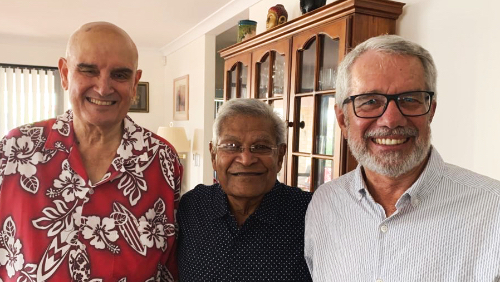
Friends Caricatured by the famous Cartoonist - Max Gerryn
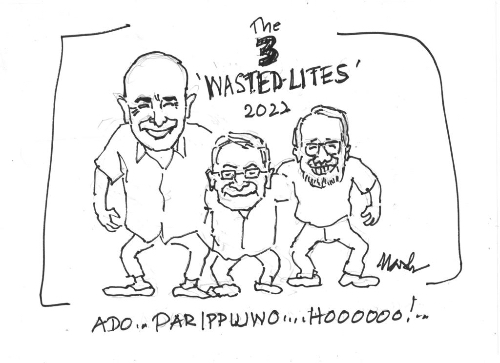
Nigel Christoffelsz and Ranjit Aaron at the Optus Stadium in Perth - 2023
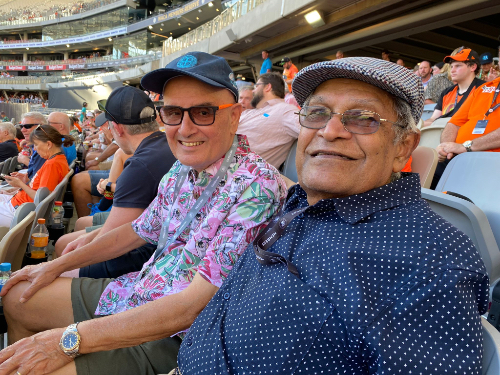
Links to further reading
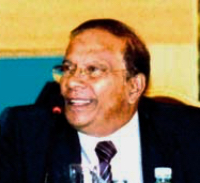 Justice Ameer Ismail was educated at Wesley College, Colombo, Sri Lanka.
He obtained the Bachelor of Laws degree from the University of Ceylon in 1967 and then passed out as an Advocate from the Sri Lanka Law College. He was enrolled and admitted as an Advocate of the Supreme Court of Sri Lanka in 1967.
Justice Ameer Ismail was educated at Wesley College, Colombo, Sri Lanka.
He obtained the Bachelor of Laws degree from the University of Ceylon in 1967 and then passed out as an Advocate from the Sri Lanka Law College. He was enrolled and admitted as an Advocate of the Supreme Court of Sri Lanka in 1967.
Justice Ismail has obtained a Diploma in International Air Law from the Utrecht University, Netherlands in 1983. He has followed a course in 1998, in Dispute Resolution organized by the Institute for the Study and Development of Legal Systems in the University of California, Berkeley.
He joined the Attorney-General's Department (Sri Lanka) as a Crown Counsel in 1971 after a brief period of practice in the unofficial bar. He served the Department for a period of 12 years as a State Counsel and as a Senior State Counsel.
He was absorbed into the judiciary in 1983 as a High Court Judge. After serving in various stations as a Judge of the High Court exercising original jurisdiction, he was promoted as a Judge of the Court of Appeal in 1990. He became the President of the Court of Appeal in 1998.
He was then elevated as a Judge of the Supreme Court of Sri Lanka in 1990. During his tenure as a Supreme Court Judge, he served as a Member of the Judicial Service Commission. He was also appointed a Member of the Council of Legal Education. He retired as a Supreme Court Judge in 1994.
Justice Ismail was appointed as the Chairman of the Commission to Investigate Allegations of Bribery or Corruption [1] by Her Excellency the President on the recommendation of the Constitutional Council in March 2005 for a period of five years ending March 2010.
During the Principalship of Dr Shanti McLelland, Justice Ameer Ismail was invited to be the Chief Guest at the Annual Prize Giving at Wesley College
From Dr Nihal D Amerasekera
Ameer Ismail and his brother Hakim hailed from the strong Muslim enclave of Sammanthurai in the Eastern Province. I remember Ameer Ismail from the school boarding in the 1950's. He was a fine softball cricketer in the Small Park and also a good soccer player. He had an air of confidence even in those days respecting the endless rules and laws of the boarding. Ameer was appointed a hostel Prefect and was greatly respected.
We admire greatly his meteoric rise in his chosen profession and being appointed as the Chief Justice of Sri Lanka.
On behalf of the Worldwide Brotherhood of Wesleyites I wish him a long and happy retirement.
Links to further reading
A Tribute by Capt. Rohith Fernando (a fellow Scout at Wesley)
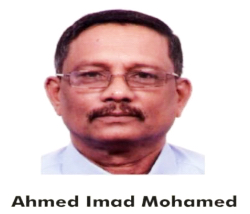 Mr. Ahmed Imad Mohamed joined the Scout Movement in the early 1960’s when he was studying at Wesley College, Colombo. After leaving Sri Lanka, Imad joined Scouting at Eqypt’s Al Azhar University and completed his leader training in the University’s Scout Troop. After returning from Eqypt to his home in the Maldives, he was appointed as the first Maldivian Scout Master of the Majeediayya School. Together with Mr. Abdulla Rasheed, he played an instrumental role in establishing the Scout Association of the Maldives.
Mr. Ahmed Imad Mohamed joined the Scout Movement in the early 1960’s when he was studying at Wesley College, Colombo. After leaving Sri Lanka, Imad joined Scouting at Eqypt’s Al Azhar University and completed his leader training in the University’s Scout Troop. After returning from Eqypt to his home in the Maldives, he was appointed as the first Maldivian Scout Master of the Majeediayya School. Together with Mr. Abdulla Rasheed, he played an instrumental role in establishing the Scout Association of the Maldives.
In 1993, Imad served in the Asia Pacific Regional Sub-Committee on Training. He was awarded the Asia Pacific Regional Chairman’s Award in 2000 in recognition of his outstanding services to the Scout Movement. He was the first scout in the Maldives to receive the most coveted “Wood Badge” and also the first to receive the “Four Bead” Leader Trainer recognition. He also received the Bronze Coconut Award from the Scout Association of the Maldives for his contribution to Scouting in the country.
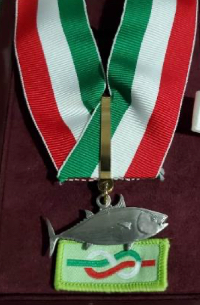 The Silver Tuna Award was bestowed on Imad by HE. Ibrahim Solih, President of the Republic of Maldives, the Chief Scout of the Maldive Islands. This presentation was made on 30th May, 2022 at the Kurumba Village Resort in Male' atoll. Imad’s notable contributions include the Scouting Resource Library named “Imad’s Scout Library”. Through this library, he continues to provide resources to Scout Groups throughout the country.
Imad was a very enthusiastic and active member of the “14th Colombo” Scout Troop at Wesley College. He was a member of the “Woodpeckers Pack”. He was a proud recipient of the Scout’s 1st Class Badge followed by the “Green Chord”. At Wesley, his Troop
The Silver Tuna Award was bestowed on Imad by HE. Ibrahim Solih, President of the Republic of Maldives, the Chief Scout of the Maldive Islands. This presentation was made on 30th May, 2022 at the Kurumba Village Resort in Male' atoll. Imad’s notable contributions include the Scouting Resource Library named “Imad’s Scout Library”. Through this library, he continues to provide resources to Scout Groups throughout the country.
Imad was a very enthusiastic and active member of the “14th Colombo” Scout Troop at Wesley College. He was a member of the “Woodpeckers Pack”. He was a proud recipient of the Scout’s 1st Class Badge followed by the “Green Chord”. At Wesley, his Troop
Leader was Ranmal de Silva and his fellow scouts to name a few were Ching Fong Sheik, Late Nazimudeen, Rohana de Silva, Chulika Cooray, Sathasivam, Arumuganayagam, Satiyanandan, Mowzool, Hamza Nizar, Rohith Fernando and Anil Fernando. At Wesley, Imad worked with Scout Masters such as Mr. Dhanapala, Mr. Rodrigo, Mr. Prasan Wijesinghe and Mr. Anandanesan. His fellow Maldivian classmates at Wesley were Rasheed, Aziz and Shihab. During this time a number of Maldivians joined schools in Sri Lanka and they were distributed amongst leading Christian schools like Trinity, Wesley, Carey and St. Peter’s.
On his return to the Maldives, Imad entered the Tourism industry and had a share in one of the country’s resort islands. He was also the agent in the Maldives for a Swiss Charter Airline named Balair, a subsidiary of Swissair. He is presently retired and living with his family in the Maldives. Imad was a very friendly, charitable and hospitable person, always with outstretched arms to help anyone who needed assistance. To date he remains a very strong and faithful follower of the Islamic faith. Old Wesleyites of his era wish him wonderful years in his retirement.
Links to further reading
From the Daily Newspaper on his retirement
Surgeon Retires
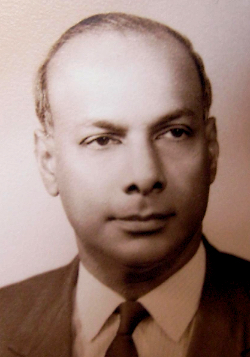 Dr N. A. Jayarajah Niles FRCS Eng. Consultant Surgeon General Hospital, Colombo has retired after 35 years of service. At a farewell function in his honour Dr Niles portrait was unveiled in the consultant’s lounge by Dr. P. R Anthonis, A large gathering of doctors nurses and well- wishers were present. Dr S. A. Cabraal, Mr. A. T S. Paul and Dr. Anthonis paid tributes to Dr Niles. Dr. Niles qualified as a medical officer. After 14 years of service he proceeded to England and obtained the FRCS (Eng ) After serving as a surgeon in the provinces he was appointed consultant surgeon to the General Hospital in 1958.
Dr N. A. Jayarajah Niles FRCS Eng. Consultant Surgeon General Hospital, Colombo has retired after 35 years of service. At a farewell function in his honour Dr Niles portrait was unveiled in the consultant’s lounge by Dr. P. R Anthonis, A large gathering of doctors nurses and well- wishers were present. Dr S. A. Cabraal, Mr. A. T S. Paul and Dr. Anthonis paid tributes to Dr Niles. Dr. Niles qualified as a medical officer. After 14 years of service he proceeded to England and obtained the FRCS (Eng ) After serving as a surgeon in the provinces he was appointed consultant surgeon to the General Hospital in 1958.
The reference given by the Principal of Wesley (Rev John Dalby) on the 10th of October 1934
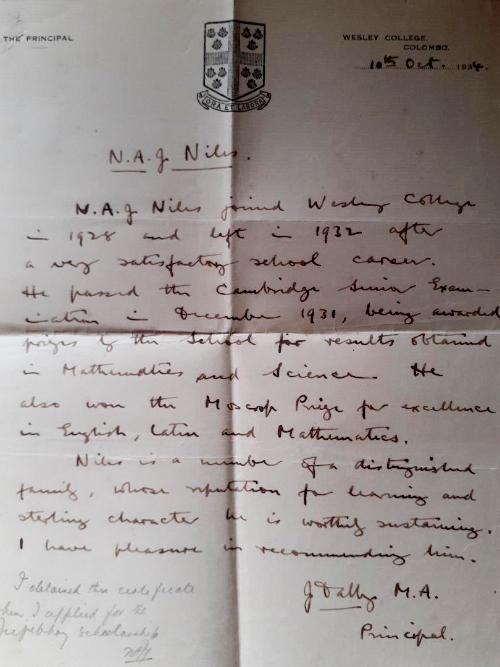
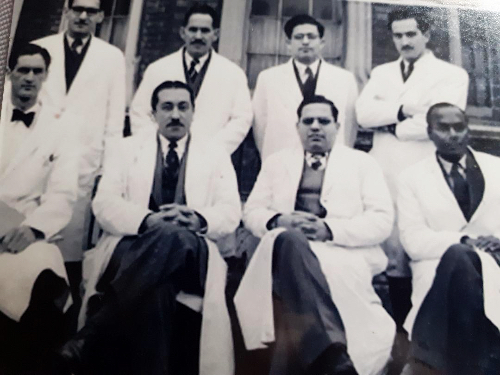
...................................................................
An award received from Rev John Dalby, Principal 1929 -1940
Gamini was in the boarding from 1961-67. He picked this Award which was a book from a used Bookseller in the pavement in Colombo about 40 years ago.
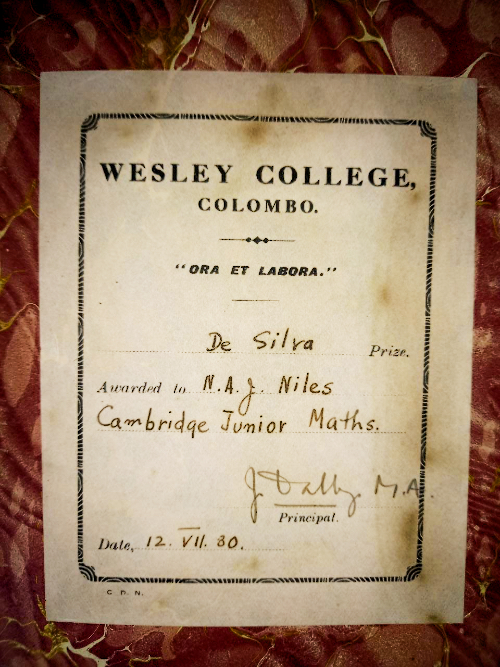
...................................................................
Biography of Dr. N.A.J. Niles FRCS Eng. by his son, Wesley Niles
Born 6th December 1913 in Manipay Jaffna and entered Glory 16th August 1978. Son of late Mr. W.D. Niles who was a District Judge.
His early education was at Central College, Jaffna and later attended Wesley College, Colombo where he completed most of his studies. He passed the London Matriculation examination and gained admission to the Medical College Colombo when very young and qualified with flying colours with the prestigious Rockwood Gold Medal for Surgery at the final examination. He was 23 years of age when he qualified as medical officer.
Wesley College Colombo was then (and even now) the premier Methodist school in Ceylon. It was managed by the colonial missionaries during that era and maintained a very high educational standard in par with the best in the world. All students from different races, religion and creed studied without any discrimination as one big family. There was a strong bond of unity and friendship among the students and some achieved greater height in their chosen career path.
He was also a student of the legendary Mr. P.H. Nonis. who later became the principal of the school 1957-61. He was taught by many other school teachers who were truly dedicated to the teaching profession.
Another remarkable person of his era was Mr. Ranis who became the chief peon in later years. He had the privilege of ringing the school bell every school day during the latter part of his life. Even though he did not hold any high office was a highly respected individual. His moustache and the combed hair knotted at the back was a customary sight to behold. He was a junior peon during my dad’s school days. He recognized my dad after many years almost immediately when he saw in the early sixties.
My dad was good in studies and won many awards at the annual school prize giving.
During his school days he related to us numerous witty incidents in school which he often shared with us at home. Some of his class mates were rioters, and one of them was one Mr. Gunasekera. Many of them usually indulged in the usual school boy pranks. One incident over-shadows the rest. During that time one foreigner of African origin nick named “Gun boat Jack” came to Ceylon and challenged any to meet him in the boxing ring and if that person could last 2 round or more was ready to reward him with a big prize. This was an open challenge. One of his classmates made use of this opportunity and anonymously notified the name of a very old school teacher in school at that time who could hardly walk, as the person willing to meet this challenger in the ring. This boxer was very curious to know this individual in person and came all the way to college during school hours to meet him face to face. There was a big commotion due to this intruder during school session. This old teacher who was resting between his school session in the staff rest room, was astonished and was in tears when he heard this and told the boxer some prankster had sent this message without his knowledge and consent. He then managed to convince him not to get offended. That was the end of the story and the entire school had a hearty laugh. Don’t know what happened to the poor prankster with the principal of the school thereafter.
My dad used to always mention during those days there were hardly any corrupt individuals in society including politicians. Most of them were honest and God fearing and behaved in an honourable way. Even the ordinary police constable or better referred locally as the “Ralahamy” those days were highly respected because of their honesty. If he was alive today, he will be very sad to see the level of dishonesty and corruption prevailing in the country.
His philosophy in life was to help the poor and needy. His hospital patient whether rich or poor were treated alike. He always mentions that God had bestowed on him a good brain to help him achieve his ambition as doctor and in return wants to give back to the poor and needy free of charge all he could by way of medical assistance and other help at his disposal.
His contemporaries in his medical career included General Surgeons Dr. Bartholomeusz, Dr. Austin Dr. Anthonis, Dr. Misso, Dr. Rustmonjee - ENT surgeon, among others.
There are many more incidences given below in his life which he shared with his family members and close friends. Some of them are very interesting but I feel could not be included in his biography in the school magazine –
1. His first encounter after qualifying as doctor was with the most powerful person in Ceylon, that time, the late Mr. D.S. Sennayake, the first prime Minister of Ceylon. Two drunk accident victims were sent to him one day for medical report. Medical examination revealed that they were both fully intoxicated and the blood alcohol level were both very high and dad reported as such. They happened to be the driver and body guard of the prime minister. That late evening PM on hearing these events was quite embarrassed and perturbed over the whole incident and was trying to find a scape goat to cover up this unfortunate incident. Under the influence of liquor crashed the PMs vehicle on the small raised podium in the Galle Face area close to Galle Face hotel and the Galle face flats. Now this so called “podium” is a common sight in Colombo those days and used by traffic police to stand and direct traffic. It is a raised platform where the traffic police could be seen easily when giving hand traffic signal. The front end of PMs vehicle was damaged and the police had intervened for necessary action. In the meantime the car was dispatched to Rowland for repairs without anyone’s notice, especially the press and the damage podium was too repaired overnight and looked normal the following morning) In walk the PM and shouts at our Dad saying these two guys never touched alcohol in their life and the doctor had made a serious mistake. Dad thought he will have to pack his bag and go home. Subsequently to his luck, Dr.S.A Paul (father of Prof Milroy Paul and Mr A.T.S Paul, Thoracic surgeon) was passing by and the PM wanted him to re-examine them. After a while when inquired by the PM, Dr. P stated they were both dead drunk. The PM felt ashamed of his earlier outburst at our dad and virtually said sorry to our dad for his own stupid behaviour. He supposedly had friendly chat with dad and left. When this incident took place dad felt his entire medical career would have been blasted if not for the intervention of this good soul Dr. Paul.
2.One day he was on duty as the casualty surgeon at the General hospital (now referred as the National Hospital). It happened to be a Christmas eve, and was on duty from 7pm to 7 am the following day. He was operating continuously all the accident victims. Few days later the church priest enquired where he was on that Christmas eve night service as he felt his absence in church. Dad said he was at his church praying. The priest was very inquisitive and keen know which church it was. His answer was the church opposite the Medical college, Kinsey Road. The priest thought for a while and said there is no church in the vicinity but only a hospital. His answer was that is his church where he prayed that day. Dad always believed God will be more than happy if someone helps the needy rather than pray and do nothing. That is our Dad. He never belied in false notions about life.
3.When he was 3rd year medical student he was boarded at the YMBA Borella. He daily cycled to medical college and when he had to help the ward staff of Dr. Nicholas Attygalle, on days assigned to him, is generally in the ward there as early as 7am even thigh he could be there by 7.30 am. Whereas most other medical students of his batch come late some as late at as 8.15am just before the consultant Dr. Attygalle, comes on his ward rounds and pretend to be there busy helping the ward staff. On the final day Dr. Attygalle kept the all the medical students standing in attention and questioned each one by one, as to what time they usually came in the mornings for the past 6 months to help the ward staff. Most of them lied saying 7.30 am onwards. For each answer he roared back “you are a liar”. When the turn came to my Dad he though If he says the actual time of 7 am it will look bad and funny and said 7.30am. for that too like others said you are a liar too. Finally, he looked at all the medical students in their eyes hard and said Niles is the only person who comes early as 7am every day and does his work conscientiously and help the nursing staff. He had been checking from the ward staff continuously during the recent past and got his first hand information. He praised our dad for helping his ward staff for coming early and left. That is our dad. He never helped people with an ulterior motive. No wonder he was a poor man when he died. For him principles matter more than anything else.
Dr. Nicholas Attygalle, later in life was knighted and was better known as Sir Nicholas Attygalle. He was a virtual terror and most of his students and staff were very scared of him. He was later Dean of the Colombo Medical College and the Vice Chancellor of the University of Ceylon thereafter.
....................................................
My father, the dedicated surgeon | Dr. N.A.J. Niles by his son, Rohan Niles
My brothers, Rajeswaran, Jayantha and I write these words of appreciation of our late dearly beloved father, to mark his 100th birth anniversary which falls this year.
Here’s an extract of an article in the Times of Ceylon edition of September 15, 1957 (Page No. 20) which stated, “Take the Batticaloa hospital, for example. The surgeon is a qualified specialist. He elected to do full time work and refused private practice. After initial discontent everything now works smoothly and all operations are done, free in the hospital – which means that all people in the entire eastern province in need of surgical aid find adequate attention in this hospital. This is no thanks to the Department. It speaks of one thing that is a steadfast, honest surgeon”.
This surgeon was our father who served in the Batticaloa General Hospital in the late 1950s. His decades working in the medical field were not driven by greed but rather a satisfaction derived from tending to the sick while simultaneously challenging his surgical skills.
Those days there were no advanced private hospitals and everyone had to go to a government hospital and there were only a few highly qualified specialists in Sri Lanka. He showed no partiality or favouritism to anyone and never did private practice although he had enough opportunities to do so, and would have ended up as a wealthy and famous surgeon. He never expected anything in return, except his state salary.
Apart from his duties as a surgeon, he also served as a Senior Consultant and Visiting Lecturer. As a doctor and teacher, he set incredibly high standards of integrity, punctuality and dedication and expected his students and those who worked for him to follow his example in these virtues, which are rare today. Our father’s illustrious work in the field of medicine was too well known to his contemporaries to elaborate here.
Having served in many rural hospitals islandwide and finally at the Colombo National Hospital, he reached the pinnacle of the medical profession and retired in 1973. He was the most senior surgeon in the country at that time. Although our father was healthy and active while in service, he was not so after he retired. During his retirement he led a modest and simple life with only his pension as an income, although he had the designation next to his name as FRCS (Fellow of the Royal College of Surgeon. London). He came from a well known Christian family and was the brother of the late Rev Dr. D.T. Niles. Our dear Pappa, passed away in 1978 at the age of 64 after a brief illness.
Our memories usually fade away with the passage of time, yet memories of our loved ones of outstanding qualities and human values remain in our hearts for a long time.
....................................................
My personal memories of Dr N.A.J Niles, Consultant General Surgeon at the National Hospital in Colombo, 1958-73
By Dr Nihal D Amerasekera
Dr N.A.J Niles was born in Manipay in 1913. His father was a District Judge. After his early education at Jaffna Central College, he moved to Wesley College (1928-32). There he had an outstanding career wining several prestigious awards. After being successful in the Cambridge Senior examination he proceeded to the Ceylon Medical College.
He came from a staunch Wesleyan Methodist background. His religion meant a lot to him and made a deep impression on his life. This also shaped the way he approached his medical career. He considered his skills as a God given gift and used it in the service of humanity.
Remarkably diligent, Dr Niles had an illustrious passage through Medical College. He won the Rockwood Gold Medal for Surgery at the final examination. In 1936 he qualified as a doctor aged 23. He proceeded to England in 1940 and was soon successful in the FRCS (Eng) examination. On his return to Ceylon, he served as a surgeon with great distinction working in several hospitals in the ‘out station’. Dr Niles was appointed surgeon to the General Hospital Colombo in 1958.
I first saw Dr Niles when he drove his posh Humber Hawk into the school drive bringing his sons to Wesley College. His elder son, Wesley Niles was in my class in the 6th form.
Tall, dark and imposing, Dr Niles’ photo brings him back to life with a flood of reminiscences. I met him in 1964 when I started my clinical work as a medical student. He taught me Surgery until I qualified in 1967. This was a time when the Surgeons and Physicians in hospital benefitted enormously from private practice. Dr Niles was one of the few consultants at the time who never went out of his way to enhance his private income. Hence, he was never party to the competitive bitterness that existed in the realm of private medicine. He was a fine dedicated surgeon who gave his all to his patients whether they were fee paying or not. His surgical skills were exemplary. He worked tirelessly and with great empathy for the benefit of his patients. He had a brilliant mind, but his erudition was lightly worn.
Dr Niles worked as a general surgeon. Among his contemporaries were Dr Noel Bartholomeusz, Dr L.D.C Austin, Dr Clifford Misso and Dr P.R Anthonis. He was hugely popular and deeply respected by his consultant colleagues in the General Hospital Colombo. His photo hangs proudly in the Consultants’ Lounge at the National Hospital as a thank you for his dedication and service to the hospital and his patients.
With his fine ability to teach and educate, Dr Niles took on his duties as a tutor seriously. He had an unpretentious approach to his craft. He trained and educated us in the basics of surgical diagnosis and treatment in a way we could remember. We recorded in our notebooks his insightful nuggets of wisdom. He taught in a quiet, selfless manner that reflected his personality. His talks during ward rounds seemed utterly spontaneous and were without formality. I vividly recall his unstoppable flow of conversation. This is not an attempt to deify Dr Niles. Very occasionally his fits of fiery vexations would shatter the serenity of the ward. Soon it was all over in the blink of an eye. Dr Niles was ever so kind to the staff working in the ward and to all the students whom he taught.
I remember working in his ward as a student. He had a wonderful sense of humour. This most certainly lightened the endless burden of hard work in the ward. Dr Niles was a fine comedian and a born entertainer. His teaching ward rounds were delightfully entertaining. He had a multitude of funny stories about his experiences with patients. Once on a ward round a patient told him he passes ‘Piti’ or flour like stuff in his urine. The patient in the next bed told him he passes sugar in his urine. Dr Niles told them both, you pass flour and this guy passes sugar why don’t you both join up and start a bakery. This amusing story has entered the folklore of the Colombo Medical Faculty for its brilliant side-splitting humour. Dr Niles had the unique ability to see the funny side of day-to-day life. There is a vast repertoire of Dr Niles’ anecdotes which are recounted by those who knew him. We all adored and cherished his eccentricities, and there were many. He was a legend in his own lifetime.
As a student I count myself fortunate to have had Dr Niles as a clinical tutor. He inspired us all by his intellect, competence and courtesy. His students judged his teaching as superb, while his juniors, assistants and successors attributed to him all the best qualities of a skilful surgeon. He radiated charisma, influence and inspiration. Many will fondly remember his many charming ways, immense kindness as a surgeon and his excellence as a clinical teacher.
Dr Niles retired in 1973 after 35 years of dedication to the Health Service leaving a stream of emotions and many happy memories. He had not amassed great wealth and lived a frugal life but was forever happy and content. He passed away in 1978 age 64, far too young to leave this wonderful world.
....................................................
GRANT HIM O LORD
ETERNAL PEACE
....................................................
Deputy Inpector Generals of Police
By Dr Nihal D Amerasekera
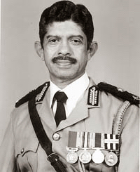

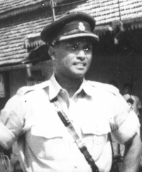
Everyday of every minute the police protect us and ensure justice is served against those people who don’t respect the importance of law and order. Yet it comes at a heavy price as some policemen and women lose their lives doing so. Maintaining law and order in a developing country is not an easy task. There can be political unrest and political interference which makes ensuring fair-play challenging in the extreme.
We are immensely grateful to the many Wesleyites who have served in the police force. The policemen who have reached the highest rank as the Deputy Inspector General are Bertus Perera, B.M.N Juranpathy and O.K. Hemachandra. They have reached those dizzy heights in the Police Force through their honesty, integrity, loyalty and dignity. Wesley College is rightly proud of their service and achievements
Wesley College 1st XI Cricket Team 1948
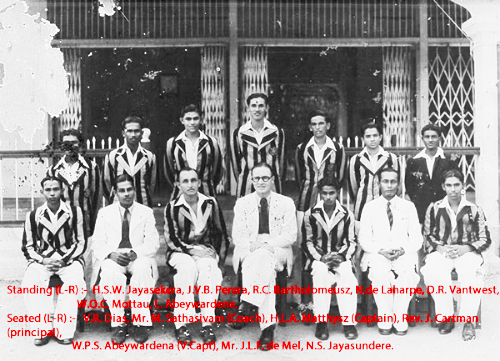
Bertus Perera: Played cricket for Wesley in 1948 and then for the Ceylon Police. He was a distinguished and loyal old boy of the school. He was an all round sportsman. Bertus with another Wesleyite L.Abeywardene were in the Combined Colleges Cricket team which played against the touring West Indies side in 1950. West Indies team was captained by John Goddard and included Jeff Stollmeyer, George Headley (Black Bradman), Clyde Wolcott, Everton Weekes, C. A. Mcwatt, W. Ferguson, George Carew. The match was played at the Colombo Oval (Saravanamuttu Stadium). He retired as Deputy Inspector General of Police
Wesley College 1st XI Cricket Team 1955
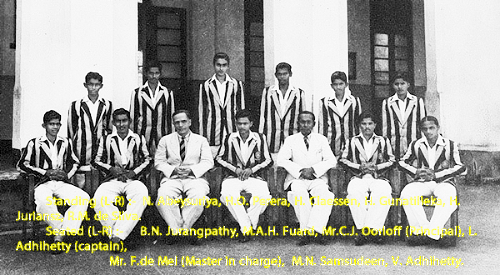
B.M.N.Jurangpathy: During the Grand Reunion of 2012 - On the 6th of September BMN Jurangpathy (1st XI Cricketer 1954-55) held a dinner at the Senior Police Officers Mess in Havelock Town for the cricketers and the organising Committee of the Reunion. The Mess was built in 1928 for the Senior British Officers of the Police Force. Its magnificent dining hall, exquisite furniture, panelled walls and grand bar shows the opulence of that era. I was unable to attend but was told it was a sumptuous buffet and a fine party held in lavish surroundings. The four piece band that played Sri Lankan music brought back many happy memories to the guests. The rhythms of the baila music were a special favourite which made some guests dance and gyrate providing much amusement and merriment. Friendships flourished and connections were made and firmed. The bar was open until the wee hours of the morning when the guests departed. We thank BMN Jurangpathty and his wife for their generosity and commitment to the Reunion. It was wonderful to see him again after those glorious Claessen years of cricket.
O.K.Hemachandra: He was a year senior to me at school and was a fine athlete and a skillful soccer player. O.K held the records for the 110 meter and 400 meter hurdles and ran the relays. He was vice captain of the school soccer team. OK joined the Police force in 1962.
..............................................................
I am certain there are many other Wesleyites who joined the Police Force. L.V Jayaweera was 2 years my senior at school. He joined the Mounted division of the Police Force where he served with great distinction. C.Amaradasa Fernando was my classmate and also a fellow boarder. He rose up to become a Superintendet of Police. He sadly passed away young. R.A Wimalasena too was my classmate from Kolonnawa who became a Superintendent of Police. I lost contact with him when I left the country.
Once in 1971 I was driving along Baseline Road. Just opposite Wesley College I was stopped by a Police car. Two bigmade Policemen walked up to me shouting instructions to raise my hands up. It happened to be C.A Fernando and R.A Wimalasena who were in training at the Police Academy in Kalutara. We had a jolly good laugh and had a long chat about how life has treated us over the years. Sadly I never saw them again.
..............................................................
From Bashur Musafer
In the police we had Bertus Perera, O K Hemachandra and B M Jurangpathy who retired as D I G's. There were quite a few who joined the Police force as sub inspectors and a few names that come to mind Ajith Wijesinhe, Vivian Jayaweera, Joe David (brother of AK, PR and C David) and Sharir Musafer. Sharir died under tragic circumstances at Middeniya during the 1971 insurgency.
Links to further reading
From Dr Nihal D Amerasekera
The Royal Ceylon Air Force was born on 2nd March 1951. The Bill was read in Parliament on 30th August 1949 which provided for a Regular Air Force. The RCyAF thus became the youngest of the Defence Services of Ceylon.
The Governor-General, Lord Soulbury, ratified the Bill on 3rd October 1949 and the Air Force was formally born. The British Government seconded Group Captain Graham Clerke Bladon to set up the RCyAF, and command it through its formative years.
Wesley College has the unique honour of producing two of the finest Air Force Commanders who adorned that distinguished position. They did so with great distinction, panache and style. Their maturity and natural leadership saw them shine amongst their competitive peer group. They took those extra responsibilities in their stride to serve the country. They proved over time that they were reliable, and able to accomplish any task set with absolute professionalism. Highly competent, calm and intelligent they were natural leaders and served us well.
.........................................
 Ekanayake Rohan Amerasekera was an officer in the Royal Air Force (RAF). After that, he was enlisted in the Royal Ceylon Air Force. He was eventually elevated as the third Commander of the Royal Ceylon Air Force (RCyAF) from 1962-1970. He joined the Royal Airforce in 1940 aged 24 and fought in the 2nd World War. He flew 60 sorties over Germany. For his enormous courage and daring he received the Double DFC and Bar. He became the most decorated Asian in the Royal Air Force. I personally remember him for his simplicity, generosity and immense kindness.
Ekanayake Rohan Amerasekera was an officer in the Royal Air Force (RAF). After that, he was enlisted in the Royal Ceylon Air Force. He was eventually elevated as the third Commander of the Royal Ceylon Air Force (RCyAF) from 1962-1970. He joined the Royal Airforce in 1940 aged 24 and fought in the 2nd World War. He flew 60 sorties over Germany. For his enormous courage and daring he received the Double DFC and Bar. He became the most decorated Asian in the Royal Air Force. I personally remember him for his simplicity, generosity and immense kindness.
He was my father's brother. I recall most fondly the many chats with him over the years. What stood out was his humility and modesty. There was a great reluctance to speak about the 2nd World War. The tragedy and the carnage he witnessed brought him much sadness. All this he mostly kept to himself. Although born a Christian he later embraced the Buddhist doctrine and its 5 precepts. He accepted the uncertainty of life from what he witnessed in the war. After retirement he led a quiet peaceful life far removed from the glitz and glamour of his previous existence. Meditation and mindfulness took precedence. He led a good life and passed away at the relatively young age of 58.
.........................................
 Air Chief Marshal Makalandage Johnny Terrence De Silva Gunawardena VSV, NDC, PSC was the 8th Commander of the Sri Lankan Air Force. He was appointed on 1 August 1990 and retired on 16th February 1994. Terrence Gunawardena was several years my senior at Wesley and was the greatly respected Senior Prefect of 1958. There he showed his fine leadership qualities. He played soccer in the 1st XI and was an excellent goal keeper.
Air Chief Marshal Makalandage Johnny Terrence De Silva Gunawardena VSV, NDC, PSC was the 8th Commander of the Sri Lankan Air Force. He was appointed on 1 August 1990 and retired on 16th February 1994. Terrence Gunawardena was several years my senior at Wesley and was the greatly respected Senior Prefect of 1958. There he showed his fine leadership qualities. He played soccer in the 1st XI and was an excellent goal keeper.
He was that quintessential officer and a gentleman. Many remembered Terrance’s strong character, zeal and great charm. In retirement Terrance too sought a spiritual way of life and spent time in meditation. He sadly died in 2014.
.........................................
Links to further reading
...................................................
Photo: Wesley College Rugby 1st XV 1992
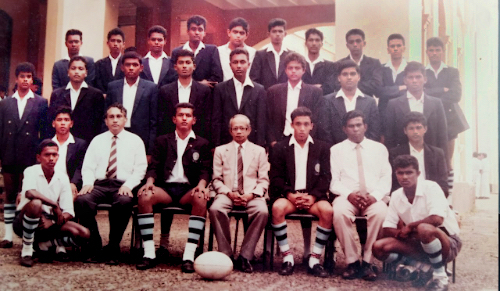
...................................................
From the Daily News 10th of May 2021 - Written by Althaf Nawaz
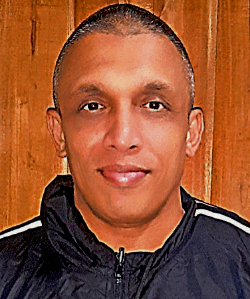 Some yesteryear sportsmen are inspired by the players competing in the international arena. The game of rugby too has similar happenings where players in the international circuit are followed by certain local players who later blossom out as phenomenal players reaching the climax in the game.
Kishan Musafer was one of them whose rugby icon was an England player and had an illustrious career and finally ended up playing for the country. Kishan was born in 1974 in Colombo and his father is Nizam Musafer a retired Naval Officer and Zarina his mother is a housewife.
Some yesteryear sportsmen are inspired by the players competing in the international arena. The game of rugby too has similar happenings where players in the international circuit are followed by certain local players who later blossom out as phenomenal players reaching the climax in the game.
Kishan Musafer was one of them whose rugby icon was an England player and had an illustrious career and finally ended up playing for the country. Kishan was born in 1974 in Colombo and his father is Nizam Musafer a retired Naval Officer and Zarina his mother is a housewife.
He has two brothers Roshan and Shihan who played rugby at competitive level. Kishan is a stockily built player who had a liking for sports from his younger days. He was enrolled at Wesley College, Colombo where he completed his academic career.
He engaged in several sporting disciplines including soccer, hockey and athletics at college. But rugby had a prominent place in his sporting career due to love and passion of the game. He launched his rugby career at school when he was 13 years old.
The unique feature of his career was when he had the opportunity of representing his ‘Alma Mater’ in the first XV rugby team at the early age of 15 years, under the guidance of coach late Zubair Doray (former Sri Lanka and CR full back) and captained the college rugby team in 1992.
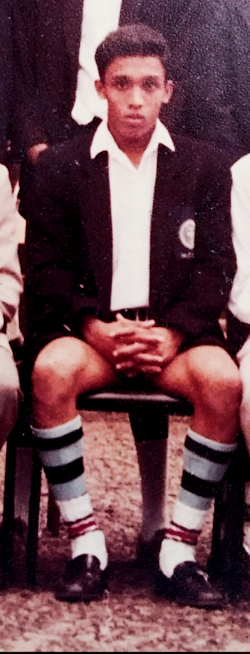 During the final year of his college rugby career, he was also coached by many players including Rugby Legend Summa Navaratnam (former Sri Lanka and CR winger) and former Police skipper retired SSP S Sivendran. Apart from his initial boost towards handling the oval shaped ball, he was a great follower of Rory Underwood the Wing Three Quarter of England, who was one of the leading try scores in the International arena. This inspired him to play in his favorite position of winger. During his tenure at college with the senior team he competed under the captaincy of Shalan Rupasinghe, Ali Noordeen, Hirosh Rupasinghe, Asela Hapugalle and Jeremy Daniel.
During the final year of his college rugby career, he was also coached by many players including Rugby Legend Summa Navaratnam (former Sri Lanka and CR winger) and former Police skipper retired SSP S Sivendran. Apart from his initial boost towards handling the oval shaped ball, he was a great follower of Rory Underwood the Wing Three Quarter of England, who was one of the leading try scores in the International arena. This inspired him to play in his favorite position of winger. During his tenure at college with the senior team he competed under the captaincy of Shalan Rupasinghe, Ali Noordeen, Hirosh Rupasinghe, Asela Hapugalle and Jeremy Daniel.
In 1994, he was selected to represent the Sri Lanka Schools Rugby team at the Pan Pacific Youth Rugby Championships which was held in Chinese Taipei, where Sri Lanka was placed sixth out of nine countries.
After an eventful tenure with his school, towards the end of 1994, he joined his favourite club CR and FC, under the leadership of Lasitha Gunaratne (Bonsa) and went on to represent them till 2004. During his career as a player was associated under the leadership of the following players Lasitha Gunaratne (1995), Viraj Prasantha (1996), Alfred Hensman, (1997), Champika Nishantha, (1998 and 1999) Savantha De Saram (2000), Asanga Rodrigo (2002) and Shamly Nawaz (2003).
He was appointed to lead the Longden Place club in 2001 and they won the Presidents Trophy defeating Police SC 25-16 in the final.
His rugby career spanned over a decade, played under several coaches such as C.P Abeygunawardena, Tavitha Tulagaese (Laga), Tony Amit, Asanga Seneviratne, Ana Saranapala, Grant Dwyer and Chandrishan Perera who helped in the coaching arena.
While he was playing for CR in 1997, was called to don the National jersey and represented Sri Lanka Rugby till 2004, both in XV a-side and seven-a-side tournaments in countries such as Malaysia, Thailand, Singapore, Hong Kong, England, Dubai and Australia. He also locked horns at the two Commonwealth Games held in Kuala Lumpur, Malaysia 1998 and in Manchester, United Kingdom 2004 in the Sevens tournaments.
He had an unforgettable incident in his career playing against late All Blacks player Jonah Lomu at the Commonwealth Games in 1998 in Malaysia, which was a proud moment in his life. During his presence with the Sri Lanka team played under the captaincy of Priyantha Ekanayake, Viraj Prasantha, Asoka Jayasena and Haris Omar, which was rated as the golden era of Sri Lanka rugby. His first employment was at HNB and then joined the HSBC (Data processing unit), served at MAS Holdings and Thermo Plastics respectively.
Currently he is working at Amana Bank as a Relationship Manager at Prestige Banking Centre. While he was representing the former employers, he competed in the Mercantile Rugby Tournaments, and captained HNB and HSBC (HDPL) Rugby teams.
He holds a Master’s Degree in Business Administration from the University of Cardiff (UK), and also is a certified trainer holding an Advanced Diploma in Teaching and Training (City and Guilds UK). His wife is Sharmila and has two sons Shevaan and Seshaan schooling at St. Peter’s College.
Mohan Gurusinghe was a student at Wesley College Colombo from 1967-80
Photo: Mohan Gurusinghe
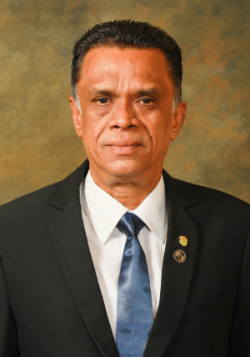 Fédération Internationale de l'Art Photographique, or FIAP (The International Federation of Photographic Art), is an international organization of national associations of photography. The International Federation of Photographic Art develops its activity world-wide. Its purpose is the promotion of photographic art under all its aspects and by all kinds of photographic events. All considerations of political, ideological or racial order are absolutely banned from the activities of FIAP. The FIAP is an international federation which affiliates as operational members, the national associations of photography. FIAP counts more than 85 national associations in the five continents and represents the benefits of nearly one million individual photographers.
Fédération Internationale de l'Art Photographique, or FIAP (The International Federation of Photographic Art), is an international organization of national associations of photography. The International Federation of Photographic Art develops its activity world-wide. Its purpose is the promotion of photographic art under all its aspects and by all kinds of photographic events. All considerations of political, ideological or racial order are absolutely banned from the activities of FIAP. The FIAP is an international federation which affiliates as operational members, the national associations of photography. FIAP counts more than 85 national associations in the five continents and represents the benefits of nearly one million individual photographers.
Mohan Gurusinghe has been awarded the prestigious distinction EFIAP/b (Excellence FIAP Bronze) by The International Federation Of Photographic Art, France. The work is accepted worldwide in a photo contests with patronage from Fiap salons. He is the third Sri Lankan to be awarded this. Mohan Gurusinghe is from Colombo, Sri Lanka. While studying at Wesley College, Colombo he was involved in arts and drama.
Photo: Receiving an award at the International Photo Salon in Tokyo
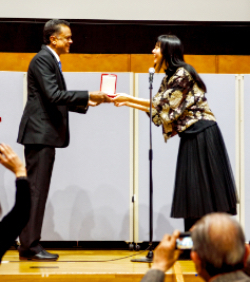 A Businessman by profession, who took up photography as a hobby and went on to win many awards and accolades. He bought his first DSLR camera in 2013 to capture a memorable moment in his son’s schooling career and that sparked in him a passion to take up photography seriously.
A Businessman by profession, who took up photography as a hobby and went on to win many awards and accolades. He bought his first DSLR camera in 2013 to capture a memorable moment in his son’s schooling career and that sparked in him a passion to take up photography seriously.
Thereafter he joined The Photographic Society of Sri Lanka to study and understand photography in depth. In 2019 he obtained a Diploma in photography with Distinction from The National Photographic Art Society of Sri Lanka. Amongst the photos captured by him, 195 photos were featured in 290 FIAP Salons in over 50 countries, out of which 163 International FIAP awards were won by him. This includes 7 FIAP Gold Medals, 3 Fiap Silver medals and 3 FIAP Bronze medals. To his credit he has received 1388 FIAP Acceptances to date. He has also won 58 local awards including a Silver trophy in 2016 and 2021 from The State Photography Festival.
Receiving an award at the Trierenberg Super circuit, Linz, Austria - 2019
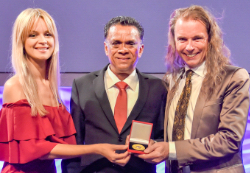
He specializes in street, culture, candid, nature and art photography.
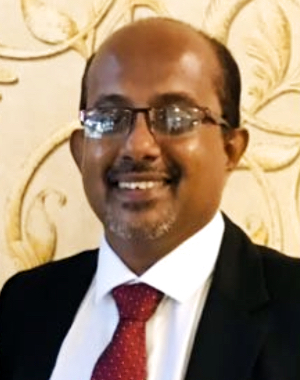 Wasantha joined Wesley College as a student in 1973 when Mr Shelton Wirasingha was the Principal. There he earned the respect of his friends and the teachers including the Principal. When he finished schooling Wasantha was offered a teaching post at his alma mater in 1985. The Principal then was Dr.T. L.de Z. Adhihetty.
Wasantha joined Wesley College as a student in 1973 when Mr Shelton Wirasingha was the Principal. There he earned the respect of his friends and the teachers including the Principal. When he finished schooling Wasantha was offered a teaching post at his alma mater in 1985. The Principal then was Dr.T. L.de Z. Adhihetty.
He has served the school with loyalty, affection and distinction for 38 years. During this time he has taught several generations of Wesleyites. It is his wish to continue to serve the school for a further 2 years before taking his well earned retirement after 40 years of service. Then in total it would be 50 years at Wesley - a lifetime
I came to know Wasantha just by chance. As the editor of the Double Blue International it is an enormous task for me to gather information about Wesley College and Wesleyites as I live 5000 miles away in London. I have been totally dependent on loyal Wesleyites like Wasantha to provide information and photographs for the website. Wasantha has been a great asset to me in that respect providing information promptly. I am indeed most grateful to him for taking the time and the effort to help me to keep the DBI updated.
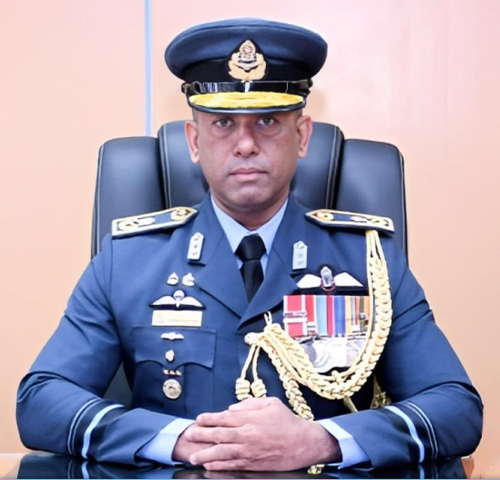
He is a proud product of Wesley College Colombo. While he was schooling, he represented Sri Lanka in Soccer and played cricket and rugby football for his college. He is married to Mrs. Pumali and blessed with two sons namely, Diyon (23 Y) and Daniel (19 Y).
Air Vice Marshal RS Wickremeratne RWP and two Bars, RSP and two bars, USP, MSc (Strat Stu), M Phil, MIM (SL), MITD (SL), ndc (Ind), fawc, qfi Air Vice Marshal Sampath Wickremeratne, joined the Sri Lanka Air Force in the General Duties Pilot Branch in 1989. He was chosen to be specialized as a fighter pilot of his illustrious career, flying many different fighter platforms. He is a Qualified Flying Instructor, Qualified flight Safety Officer and was given extensive training in Pakistan, Israel, China, India, and Ecuador.
Before assuming duties as the Director General Air Operations, he served as a diplomat at the Sri Lankan Embassy in Washington DC in the post of Minister (Defence) where he was responsible for maintaining friendly bi-lateral relations of the militaries of Sri Lanka and the USA.
In 2007, he was appointed as the Commanding Officer of No 05 Fighter Squadron at Sri Lanka Air Force Base Katunayake. His contributions in service to the country were amply recognized and appreciated by the award of gallantry medals in six occasions and also, he was awarded Uttama Sewa Padakkama for his unblemished service carrier to date.
From August 2012 to June 2014, he commanded both No 05 and No 10 Fighter Squadrons which are in possession of multirole fighter jets.
In his pursuance of academic qualifications, he completed his, ndc in India, M Phil (Def & Strat Stu) Madras University with ‘A First Class’, Fellowship of Air War College from the Air War Collage Pakistan, MSc (Strat Stu) from National Defence University Pakistan, Senior Aviation Commanders Course from Air Force Command College China, Diploma in Human Rights and International Humanitarian Law, Qualified Flight Safety Officer Course in Pakistan, Qualified Flying instructor course in India, participated in IHL related Flight Planners Course in Italy.
In moving from operational to higher level management in the Sri Lanka Air Force, AVM Sampath Wickremeratne was appointed as the Base Commander Sri Lanka Air Force Base Hingurakgoda which is the home for two highly operational helicopter squadrons in 2014.
In Jan 2017 he was posted to Air Force Headquarters as the Senior Air Staff Officer (SASO) at the Directorate of Air Operations and handled Air Operations at Air Headquarters and Ministry of Defence (MOD) level.
In Sep 2018 he was appointed as the Base Commander Sri Lanka Air Force Base Ratmalana which is the home of 12 independent formations including the VVIP Helicopter Squadron. During the tenures as the Base Commander, he was responsible for coordinating HADR operations in the North-East and South- East of the country respectively.
He was nominated for several high level engagements in the defence establishment during past years. Among those were; member of formulating the Defence Policy for cabinet approval in 2018/19, represented the Air Force in Japan – Sri Lanka initial talks for operational engagements in defence at the Ministry of Foreign Affairs, Head of Delegation to visit Bangladesh UN Mission establishments to make recommendations to the SLAF UN operations, represented SLAF at the US Indo Pacific talks, represented SLAF at 2019 International Flight Safety Seminar in Dhaka, Member of high level officers delegation to visit China on BRI, member of the board appointed by the office of Chief of Defence Staff to make recommendations on Australian Mutual Logistic Support Agreement.
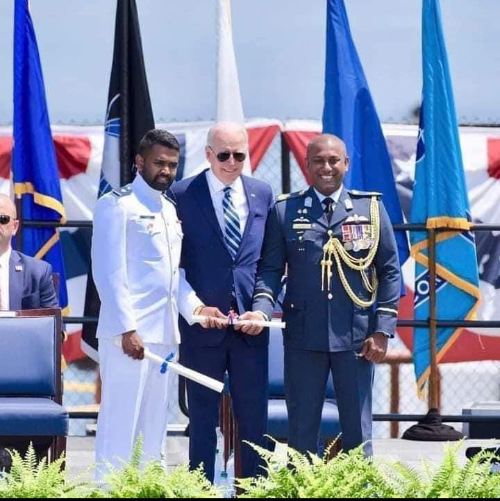
Air Commodore Sampath Wickramaratne (on the left of the US President), a proud Wesleyite from the class of 1989. Sampath has been posted as Defence Attaché to the USA. Sampath played junior cricket and thereafter focused on soccer. A super all round sportsmen. Played rugby too, but he was famous for being a super Soccer goalie. Was the SL 19 goal keeper at the U 19 Asia Cup.
Links to further reading
While at Wesley he was Best Actor in the Inter School Drama Competition
Monroe Reimers stars in S. Shakthidharan’s Counting and Cracking in Australia
From Monroe Reimers
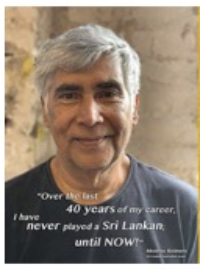 At one of the early workshops for Counting and Cracking I told the group that Sri Lanka was once named Serendipity, the accidental discovery of something wonderful. I was surprised to note that neither the writer or director knew this but as it turned out Serendipity it was. It was soon clear that Shakti’s sprawling narrative that spanned three generations was a special work that was going to require a very special production. Sydney and Adelaide had never seen anything like it before and it was to change the theatre landscape in Australia forever. Though the play is in English it required the speaking of seven languages that had to be in most cases learned phonically by the actors.
At one of the early workshops for Counting and Cracking I told the group that Sri Lanka was once named Serendipity, the accidental discovery of something wonderful. I was surprised to note that neither the writer or director knew this but as it turned out Serendipity it was. It was soon clear that Shakti’s sprawling narrative that spanned three generations was a special work that was going to require a very special production. Sydney and Adelaide had never seen anything like it before and it was to change the theatre landscape in Australia forever. Though the play is in English it required the speaking of seven languages that had to be in most cases learned phonically by the actors.
For the first time in my professional career this was the first time I was going to be playing a Sri Lankan and perform in Singhalese no less. It was a daunting task but with the help of wonderful fellow actors and YouTube I managed to pull it off. The play covered three generations so the costumes and props had to be very specific and the brilliant Anandavali ( the writer’s mum and subject of the story) with her amazing attention to detail was perfection itself. Altogether it took six years to get the play from script to stage there were many problems to be overcome but in the end the problems turned into brilliant solutions.
The play was nominated for eight Helpman awards and grabbed seven of them, every one richly deserved. It was a wonderful journey for me both as an actor and ex-Sri Lankan, being able to re-visit my homeland albeit in a virtual way. There are murmurs about re-mounting the play next year in Sydney and Melbourne hopefully it will come to pass.
About Monroe Reimers by Keith de Kretser - in 2019
Monroe Reimers is a seasoned actor, voiceover artist, teacher, newsreader and screenwriter who can quietly boast over thirty years of experience in the performance industry, going back to his 1979 feature film debut on "Hoodwink", which was nominated eight times by the AFI Awards. As a NIDA graduate who has a pragmatic view on the three decades-long growth of the industry that he loves, his ambiguously portrayed ethnicity (whether it be Indian, Polynesian, Southern European, Hispanic or even Eurasian) often took a backseat to the authoritative yet gentle veracity of his talent. In fact, he has often played a doctor throughout his career.
Monroe takes a similar grip on the adventurous, semi-biographical, coming-of-age element in "Race the Sun" (1995) sharing the same space as Halle Berry, James Belushi, a young Eliza Dushku and Casey Affleck. He also has acted opposite local luminaries the likes of Jack Thompson, Hugo Weaving, David Wenham, Judy Davis and Michael Caton. Based on J. M Coetzee's novel, Monroe's latest feature "Disgrace" (2008) was a significant sociopolitical piece on racism, rape and cavalier abuse of authority in post-apartheid South Africa with John Malkovich. He was on the right side of the law in "Better Man" (2013), integral to the outcome in the real-life case of Van Nguyen's crime as a drug mule in Singapore. At times, he'll go for more lighthearted fare, such as popular children's TV series "Spellbinder", "Time Trax" and "The Girl From Tomorrow" in the early to mid-90's
Links to further reading
 Born in Badulla and attended Uva College, a Methodist Institution. My oldest brother attended Wesley College in the early 50’s. As a colleague of Lou Adhihetty, they both left for England to pursue higher studies. I followed in my brother’s footsteps and joined Wesley in 1955.
Born in Badulla and attended Uva College, a Methodist Institution. My oldest brother attended Wesley College in the early 50’s. As a colleague of Lou Adhihetty, they both left for England to pursue higher studies. I followed in my brother’s footsteps and joined Wesley in 1955.
From 1955 to 1961, I lived in the hostel while attending 5th Grade to upper sixth form. My hostel colleagues were Nihal Amarasekara, Kenneth de Silva, Sheriff Fallil, and Ratnavale to name a few (Mr. Ben Jayasinghe hostel master, Mr. Cedric J. Oorloff Principal). Over the years, based on my seniority, involvement in sports activities and academic abilities, I was appointed as a hostel and college prefect (A.C. Wijetilleka, Senior Prefect, Mr. Frank Jayasinghe hostel master, Mr. Harold Nonis - College Principal).
During my college days I was an avid athlete. Representing Moscrop House in sprints, I participated in 100 and 200 yard races, as well as 4X100 yds relays. I also represented the college in the Group Meets in the above mentioned events (athletics coach Mr. T.Kirupparaja). If my memory serves me correctly, I equaled the college record for 100 yds timing of 10.7 sec. in 1959. I also represented college in soccer for several years under the captaincy of Mr. Dalkin Samidon (soccer coach Mr. Abeygunawardane, see attachment).
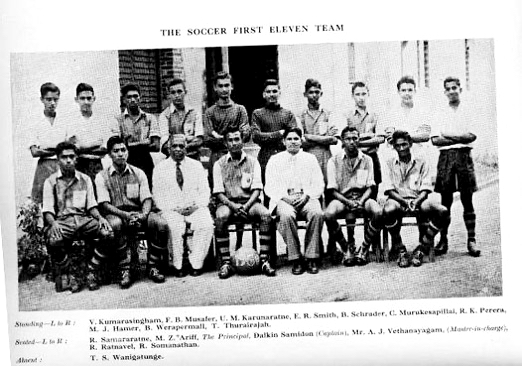
Education
1963-1967 B.Sc. Chemistry major, University of Peradeniya, Sri Lanka
1968-1970 M.Sc. University of Peradeniya, Sri Lanka(I was the first recipient of the M.Sc. degree from the Dept.of Chemistry, Uni. Of Peradeniya)
1971-1974 Ph.D. University of Sheffield, England
Professional experience
1975-1981 Research Scientist, University of Liverpool, England and University of California Davis, USA.
1981- 2023 Professor of Chemistry San Diego State University, USA and Center for Graduate Studies, Institute of Technology Tijuana, Mexico. 2023- present Professor Emeritus Institute of Technology Tijuana, Mexico Awards and Recognitions
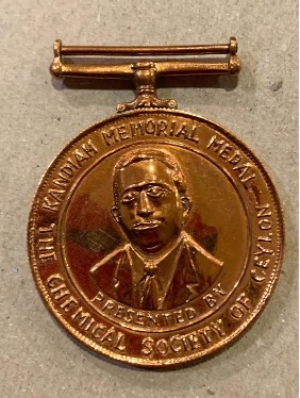
1. 1970 Received Kandhia Medal for the best Master Thesis, University of Peradeniya. (See attachment)
2. A new chemical structure of a natural product named calabaxanthone was discovered during my master’s thesis research work (1968-1970), since it was the first compound to be isolated and its structure determined in Sri Lanka, it was selected to be an ideal candidate for Sri Lankan stamp in 1992, commemorating the 50th anniversary of the Institute of Chemistry Ceylon (see attachment).
3. US patent for making Reverse Osmosis Membrane for water purification, Industrial and household (see attachment).
4. 1990-1993 Faculty advisor to student Chemistry club (affiliated to the American Chemical Society), San Diego state University, USA.
5. Member of the Mexican National Science fellow from 1997-2023
6. Member of the Editorial Board Journal of the Mexican Chemical Society
7. 1951-1986 Served in the National Technological Institute, Postgraduate Chemistry curriculum committee Mexico.
8. I was one of the founding members of the Center for Graduate studies Institute of Technology Tijuana (ITT), Mexico. After 41 years of service, as a token of gratitude the organic laboratory was named after me (see attachment).
9. Supervised thesis work of over 50 masters and doctoral students (1981 to 2022) from San Diego State University, USA, and ITT Mexico.
10. Published over 200 papers including 21 Chapters in books in peer reviewed international journals and over 3000 citations. Semantic scholar rates 45 of these publications as highly influential papers in chemistry (google search Ratnasamy Somanathan). Have participated in numerous seminars and symposiums in the USA and Mexico.
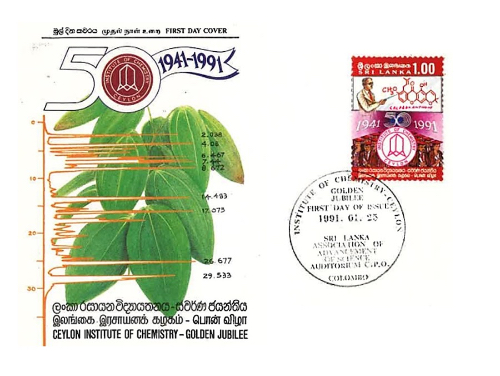
1. Kandiah medal 1970 Kandiah Memorial Award
2. Stamp bearing the structure discovered during my master’s thesis research.
2a. First day cover, wikipedia link: https://en.wikipedia.org/wiki/Institute_of_Chemistry_Ceylon
2b. Stamp bearing the chemical structure of calabaxanthone.
2c. Structure was published in the Journal of Chemical Society
3. US patent for making Reverse Osmosis Membrane for water purification:United States Patent (19) Tran et al. 54 (75) (73) (21) 22 (51) 52) (58) (56) THIN-FILM. COMPOSTE MEMBRANE Inventors: Chinh N. Tran, Garden Grove; Adrian C. Maldonado, Chula Vista; Ratnasamy Somanathan, San Diego, all of Calif. Assignee: Allied-Signal Inc., Morris Township, Morris County, N.J. Appl. No.: 882,396 Filed: May 13, 1992 Int.
ABSTRACT A thin-film seimpermeable composite membrane employs the reaction product of N-alkyl phenylenediamine or N,N'-dialkyl phenylenediamine and a poly acyl halide, such as trimesoyl chloride. Preferably the mem brane is post-treated with an acid solution followed by an aqueous solution of polyvinyl alcohol and a buffer and/or base to improve its physical properties. 8.Organic laboratory in ITT, Mexico named after me.
Links to further reading
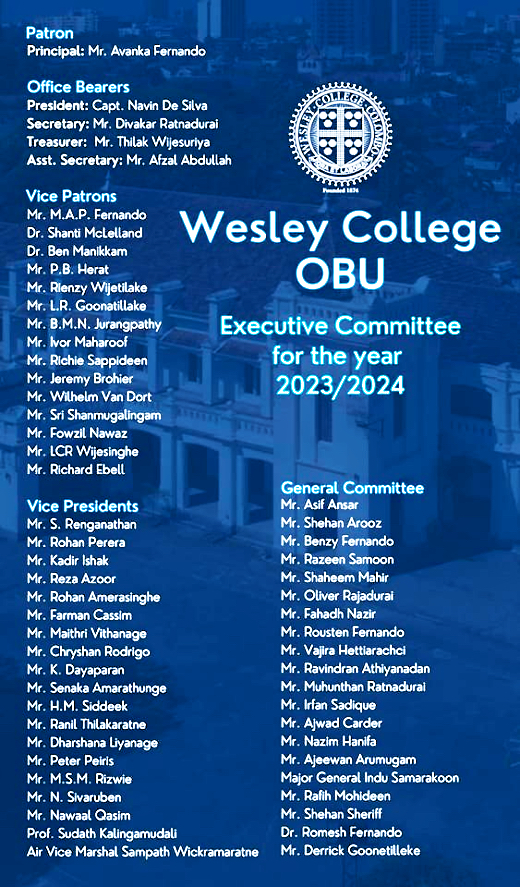
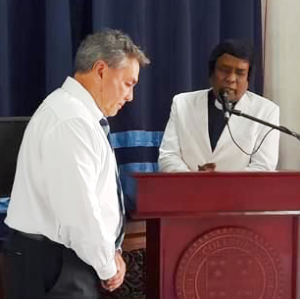 The OBU AGM was held on the 4th of March 2023 at the College hall. Capt. Navin De Silva was unanimously appointed as the new OBU president for year 2023/24. In a fine from the heart speech he constructively pointed out the pitfalls that the Principal and the Manager is facing and assured them that he would be more than willing to join them in rectifying the draw backs and make Wesley a better place for all. He concluded by handing over a donation of LKR ONE MILLION to the building renovation fund to the Principal.
The OBU AGM was held on the 4th of March 2023 at the College hall. Capt. Navin De Silva was unanimously appointed as the new OBU president for year 2023/24. In a fine from the heart speech he constructively pointed out the pitfalls that the Principal and the Manager is facing and assured them that he would be more than willing to join them in rectifying the draw backs and make Wesley a better place for all. He concluded by handing over a donation of LKR ONE MILLION to the building renovation fund to the Principal.
We wish him the best and we as his classmates will support him unreservedly
It brought us great pleasure to appoint Kalinga as the Vice president of the OBU. We pass on our Congratulation to them both and our very best wishes.
The Sesquicentennial OBU AGM was held on the 9th March 2024 at the College Hall.
Capt. Navin De Silva was unanimously appointed for a 2nd term as OBU President.
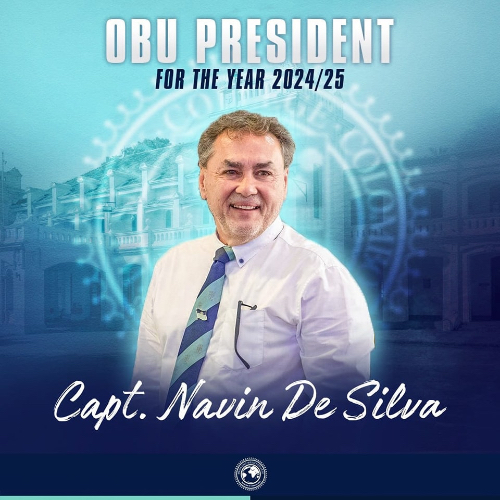
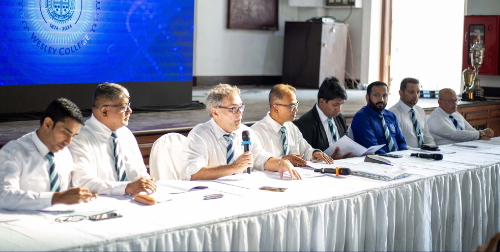
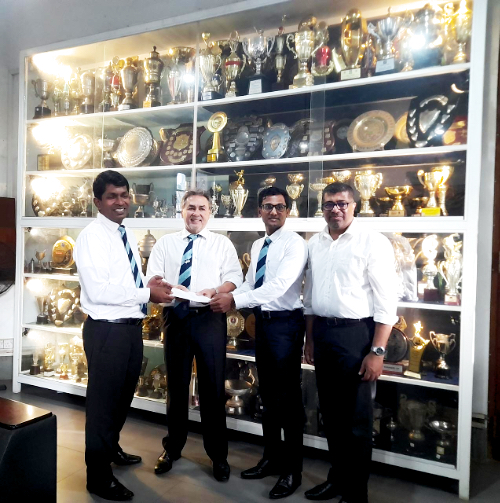
OBU President Capt. Navin De Silva donated towards the 'Sponsor a Player Rugby Fund' to the Principal Avanka Fernando in the presence of the Vice Principal Iresh Ravindra Kumar and HOS Shiraz.
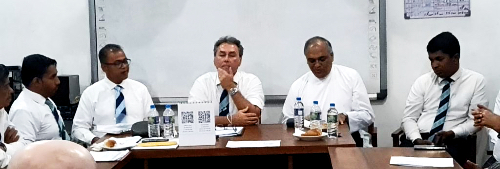
The new Manager Ven Perry Brohier, the New Vice Principal Mr. Iresh Ravindra Kumar with the Old Boys at their first OBU meeting with President Capt Navin De Silva
Ora et labora
Links to further reading
Mohamed Nawaal Qasim has bagged Asia's Outstanding Entrepreneur Award MAY 02, 2023 - I ADMIN. On behalf of the Worldwide Brotherhood of Wesleyites we send our heartfelt congratulations for receiving this prestigious honour.
Asia's Outstanding Entrepreneur Award for the Year 2022 - 2023 is awarded to Mohamed Nawaal Qasim, Director, Ambianz (Pvt) Ltd, Sri Lanka
The Award is Proudly felicitated by ASIA Awards, In association with World Research Congress & Times of London as online media partner.
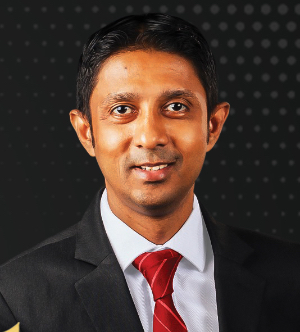 A Prominent Management Professional with 20+ years of experience. An excellent team leader with the ability to maintain the integrity of self and of his co-workers.
A Prominent Management Professional with 20+ years of experience. An excellent team leader with the ability to maintain the integrity of self and of his co-workers.
M.N Qasim is a well-qualified Professional with excellent interpersonal skills. He aims to achieve company goals and objectives by maintaining professional ethics and values. He has a proven track record of spearheading the Organization towards success.
Nawaal Qasim essentially is a people person who enjoys the challenge of developing creativity and finding innovative solutions to problems as they occur. Receiving his primary education at Wesley College, Colombo, Sri Lanka, Nawaal also processed a Diploma in Human Resource Management (HRM). He completed a further Masters degree in Business Administration (MBA) from the Sikkim Manipal University, India. He effectively manages the resources working with cohesive teams. He has vast experience in Computer Sales, Hotels, Manufacture Die-casting, IT and Fast-Food, Retail and projects.
Furniture, has led him to spear head one of the leading furniture brand in Sri Lanka called "SPACE"
SPACE, brings contemporary furniture and decor from all over the world to Sri Lanka. The exclusive brand has three showrooms in Colombo - Space, Space Italia in & Space Office.
Nawaal Qasim was also awarded the CEO of the Year award in 2021 by the CEO magazine in Sri Lanka. He is also the proud recipient of "Asia's Outstanding Entrepreneur" Asia awards powered by World Research Congress for the year 2022-2023.
..................................
Ora et labora
..................................
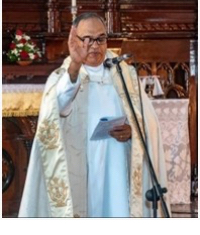 Ven. Perry Brohier B.Th. (Serampore): Is currently (2023) the Archdeacon of Colombo and Vicar of the Cathedral of Christ the Living Saviour. He is the first Wesleyite to be appointed an Archdeacon of Colombo of the Anglican Diocese of Colombo. He began his Ministry as a Daham Sevakar (Lay worker) at St. Stephen’s Church, Negombo. He also served as an Asst. Curate at St. Paul’s Church Milagiriya, the Church of The Ascension, Bandarawela, St. Andrews Church, Haputale, St. James Church, Diyatalawa with St. John The Baptist Church, Koslanda. Ven. Brohier served as Vicar at the Church of the Good Shepherd, Jawatte, Christ Church, Dehiwela and St. Michael’s & All Angels Church Polwatte.
Ven. Perry Brohier B.Th. (Serampore): Is currently (2023) the Archdeacon of Colombo and Vicar of the Cathedral of Christ the Living Saviour. He is the first Wesleyite to be appointed an Archdeacon of Colombo of the Anglican Diocese of Colombo. He began his Ministry as a Daham Sevakar (Lay worker) at St. Stephen’s Church, Negombo. He also served as an Asst. Curate at St. Paul’s Church Milagiriya, the Church of The Ascension, Bandarawela, St. Andrews Church, Haputale, St. James Church, Diyatalawa with St. John The Baptist Church, Koslanda. Ven. Brohier served as Vicar at the Church of the Good Shepherd, Jawatte, Christ Church, Dehiwela and St. Michael’s & All Angels Church Polwatte.
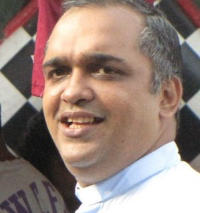 He also served as Chairman of many boards and committees of the Diocese of Colombo and as member of two school Governing Boards of the Church of Ceylon (Anglican Diocese of Colombo). He has also represented the Anglican community at many international conferences in the United States of America, Thailand, Indonesia and India. One of highlights during his ministry was being invited by the Primate of Australia to address the opening of the General Synod Diocese of Melbourne. Ven. Perry Brohier has been appointed as the Chaplain of The Mission to Seafarers, Colombo and serves as the Port Chaplain in Colombo. He also serves as member on the Ethics Committee on Hospital in Colombo.
He also served as Chairman of many boards and committees of the Diocese of Colombo and as member of two school Governing Boards of the Church of Ceylon (Anglican Diocese of Colombo). He has also represented the Anglican community at many international conferences in the United States of America, Thailand, Indonesia and India. One of highlights during his ministry was being invited by the Primate of Australia to address the opening of the General Synod Diocese of Melbourne. Ven. Perry Brohier has been appointed as the Chaplain of The Mission to Seafarers, Colombo and serves as the Port Chaplain in Colombo. He also serves as member on the Ethics Committee on Hospital in Colombo.
.........................................................................
From the Editor Double Blue International
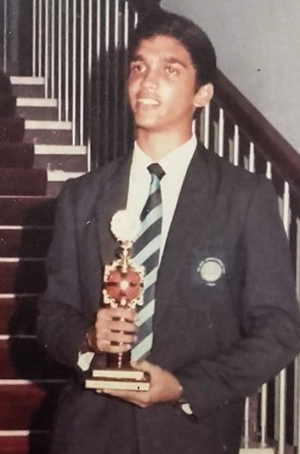 We are grateful Perry has chosen the priesthood. Gratitude is our overwhelming feeling; gratitude for God’s call and for Perry’s generous response for the immense service he provides to society in these times of enormous hardship to so many people. We are aware of his Community Kitchen project that feeds the needy at this time of economic upheaval.
We are grateful Perry has chosen the priesthood. Gratitude is our overwhelming feeling; gratitude for God’s call and for Perry’s generous response for the immense service he provides to society in these times of enormous hardship to so many people. We are aware of his Community Kitchen project that feeds the needy at this time of economic upheaval.
Perry comes from a fine cricketing stock. His father Ralph Brohier played in the hugely successful St Joseph's Team of 1952 captained by Ken Serpanchy. Ralph captained the team in 1955. Ralph's brother Milroy too played in the 1st XI cricket team for St Joseph's College Colombo.
Perry's brother Jeremy captained the unbeaten Wesley College Cricket Teams at Under 14 and Under 16 levels. He played in the 1st XI Team from 1974-77 as an all rounder.Jeremy was also a fine athlete representing Wesley at the Public School Meet in the 100 and 200 metre events and also the long jump.
At Wesley College Perry became an integral part of the life of the school. He remained a fine cricketer all through his years at school. In 1985 Wesley 1st XI Cricket Team was unbeaten and was chosen as the Champions and the best Schools Team in Sri Lanka. The formidable bowling duo Perry Brohier and Mahendra Dissanayake opened the bowling with great success and the rest, as they say, is history.
1st XI Cricket Team - 1985
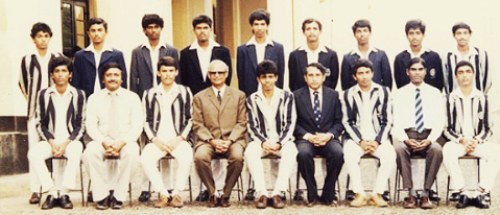
........................................................
The Archdeacon of Colombo the Ven. Perry Brohier Welcomes British Royalty
By Dr Nihal D Amerasekera
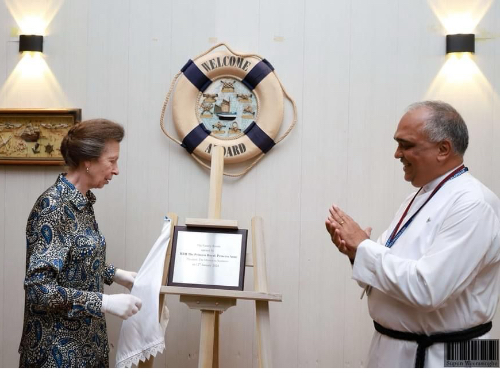
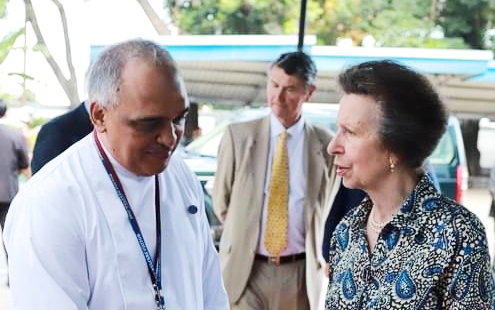
At a Welcome Ceremony at Bandaranaike International Airport, Her Royal Highness Princess Anne was received by dignitaries including the British High Commissioner to the Democratic Socialist Republic of Sri Lanka, His Excellency Mr. Andrew Patrick and Minister of Foreign Affairs of Sri Lanka, His Excellency Mr. Ali Sabry.
As Patron of Save The Children UK, Her Royal Highness unveiled a plaque commemorating the 50th Anniversary of Save The Children working in Sri Lanka.
Following this, The Princess Royal visited Lady Ridgeway Hospital for Children to see Save The Children’s Social Emotional Learning Tool Kit Programme, Tilli, in action.
She also met President Ranil Wickremesinghe at the President’s House in Colombo.
The trip coincides with the 75th anniversary of bilateral relations between the United Kingdom and Sri Lanka.
The Princess Royal delivered a message from The King to the President and First Lady of Sri Lanka this evening.
The worldwide Mission to Seafarers was established in 1854. As the Global Head of the Mission to Seafarers, Her Royal Highness, the Princess Royal, Princess Anne visited the Mission in Colombo. She has served as President to the Mission to Seafarers since 1984.
The Mission to Seafarers is a worldwide organisation that provides help and support to the 1.89 million crewmen and women who face danger every day to keep our global economy afloat.
The Ven. Perry Brohier is the Port Chaplain. It is his job to provide seafarers spiritual support and help to address any issues that they may face so that they can continue to prosper and carry out their vital work.
The Archdeacon of Colombo the Ven. Perry Brohier welcomed and hosted Princess Anne at the Mission in Colombo. It was a wonderful and prestigious occasion to Welcome a member of the British Royal Family. Princess Anne was on an official visit to Sri Lanka.
On behalf of the worldwide Brotherhood of Wesleyites it brings me great pleasure to record this event in honour of the high regard and the eminent position held by the Ven.Perry Brohier, a past student of Wesley College.
From Dr Nihal D Amerasekera
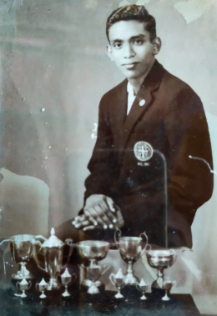

Conrad was at Wesley College from 1960 to 1966. During those years he was in the boarding. There he took part in the fun and frolic that was endemic in the boarding. Living in hostel there was ample time to develop the sports of one's choice. There were plenty of enthusiastic friends who would join in. Conrad had an illustrious school career as a sportsman. He captained the Wesley College athletics team and was judged the champion athlete in 1964 winning the 800 metres. In 1963 and 64 in the Colombo North Schools event Conrad won the Pole Vault and the triple jump. He was competitive and had the discipline and committment to train regularly to achieve his goal. Those wonderful achievements placed him on a pedestal.
In addition to his tremendous success in athletics Conrad was greatly respected by his peers and teachers alike for his decency, decorum and dignity. He was greatly honoured to be appointed the Senior Prefect in the hostel in 1963. The following year he was made a Prefect at the main school. After an outstanding school career, in 1964 Conrad was awarded the prestigious Lydia Senaratne Memorial Prize for the best all-rounder in the hostel.
After leaving school he joined the Walkers Group. Through hard work and enthusiasm, Conrad rapidly climbed the corporate ladder. Although he left school he did not leave competitive athletics behind. He captained the Walkers Athletics team in 1968 until 1970 winning several events at the Mercantile Athletics Championship. Conrad left Walkers in 1974 to work for a short period in Oman. He re-joined Walkers Marketing and Sales division in 1976 and stayed on until 1978. After a brief stint at Anglo-Asian Group he joined George Steuarts in 1982. He retired from the company in 2004 and left for Fiji in 2006. There he was a General Manager of a company and remained in Fiji for a period of 4 years before returning to Sri Lanka. Conrad continues to work as a Senior Consultant for Ceylinco General Insurance.
Conrad is respected as one of the finest products and a distinguished sportsman of the school. In 1993, his accomplishments were remembered and celebrated when he was invited to the Annual Sports Meet at Wesley as the Chief Guest. That was a great honour indeed for a fine sportsman.
He enjoys his work and keeps himself busy. Conrad still speaks warmly of his time at school and the boarding. With his good humour, affable and amiable qualities Conrad has made many friends from his schooldays and also from the corporate world. He continues to keep in touch with friends on social media. His friends remember Conrad for his charming ways, fine human qualities and natural modesty. On behalf of the Worldwide Brotherhood of Wesleyites I wish him good health and happiness in the years to come.
Ora et labora
From the Daily Mirror Sri Lanka 28th June 2023
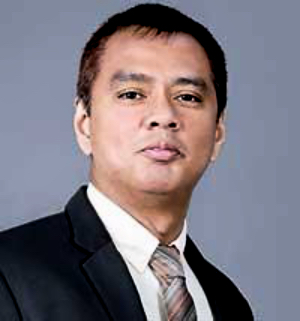 BCS The Chartered Institute for IT Sri Lanka Section (BCSSL) elected its new leadership for the year 2023/2024, at the Annual General Meeting held recently at the BMICH.
BCS The Chartered Institute for IT Sri Lanka Section (BCSSL) elected its new leadership for the year 2023/2024, at the Annual General Meeting held recently at the BMICH.
The new leadership team consists of the Executive Committee led by Chairman Alanzo Doll, Secretary Sanjeewa Perera and Treasurer Sampath Senadeera, while Vajeendra S. Kandegamage being Immediate Past Chairman.
Doll is a well-known industry personality, with more than 30 years of ICT industry experience in multinationals such as Microsoft, IBM and AIA Insurance. He is CTO of Engenuity AI (Pvt.) Ltd and Co-Founder of Triune Consulting International Ltd.
He is a Chartered IT Professional (CITP – UK) and holds a Master’s Degree in Business Administration (MBA – UK), Certified Management Accountant (CMA – AUS), Degree in Computer Science (BSc – UK) and Member of the British Computer Society (MBCS), having received his primary and secondary education at Wesley College, Colombo.
Elaborating on his vision for BCS Sri Lanka Section, Doll said, “This year is a significant and transformational year for our entire ICT industry, with the Technology Ministry reaffirming its deep commitment to create a more digitised and modern Sri Lanka, at the launch of DIGICON 2030. We, at BCS Sri Lanka Section, are an integral part of this journey, working closely with the Technology Ministry, ICTA and other industry bodies to achieve this goal.”
The parent body, the British Computer Society (BCS), is the industry body for IT professionals and a Chartered Engineering Institution for Information Technology (IT) in UK. Having members in over 100 countries around the world, BCS is the foremost leading professional and learned society in the field of computers and information systems.
Ora et labora
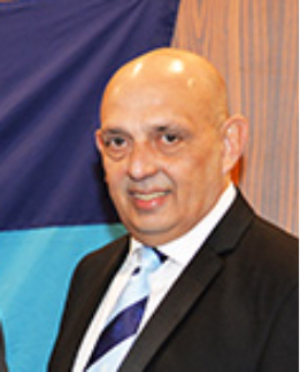
Mr Keith Grenier from NSW Australia has generously offered to assist the Wesley College Rugby committee's appeal from Sri Lanka to provide 150 junior training balls, 50 mouth guards and 35 rugby boots.
The boots have been shipped from Sydney and the rest are purchased through a supplier in India.
As Wesleyites, we are proud and grateful to have generous old boys who donate wholeheartedly and continue to support our school in many ways, such as Keith’s contribution for the development of junior rugby. With Wesley winning the all island Under 14 Rugby title for the 2nd year in succession, it's prudent to support and strengthen the roots, to ensure we remain a strong brand in the school rugby circuit in SL
Cheers Keith for embodying the true spirit of -
Ora et labora
From Dr Nihal D Amerasekera
Greetings my friends!! It is such a great pleasure to see Wesleyites meeting, greeting and enjoying themselves. After all friendships are one of God's special gifts to be admired, cherished and appreciated. Although I left school in 1962 I wish I was there too to reminisce and relive those halcyon days at Wesley. I am there in spirit in every gathering of Wesleyites wherever in the world they may be.
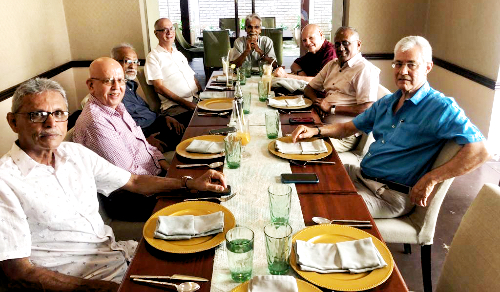
Links to further reading
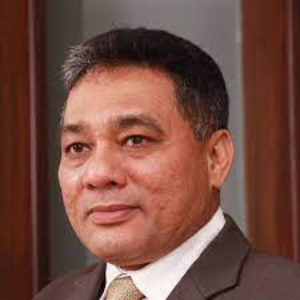 Ivor Mahroof has been appointed as the Deputy Chairman of the Metropolitan Holdings in Sri Lanka. Previously he has held several high profile managerial positions in the Company.
Ivor Mahroof has been appointed as the Deputy Chairman of the Metropolitan Holdings in Sri Lanka. Previously he has held several high profile managerial positions in the Company.
Ivor is a loyal old boy of Wesley College. He has been the President of the Old Boys Union of Colombo and became its 29th President in 2012. The Wesley College Old Boys Union, under the leadership of its President Ivor Mahroof, conducted an immensely successful workshop in career guidance for the school’s sub-prefects and Advanced Level students. This entire exercise was initiated by the dynamic and far-thinking leadership of Principal Dr. Shanthi McLelland, under whose stewardship Wesley College has forged ahead in the recent past.
Ivor Mahroof was the President of the Old Wesleyites Sports Club (OWSC) in 2008.
Ivor was an active member of the committee that organised the successful Grand Reunion of the school alumni in 2012. He is now at the forefront in organising the events for the 150th Anniversary of the school. There is now an enormous effort to rebuild the Pavilion at Campbell Park. Ivor is the Chairman and Vice Patron of this worthy Pavilion Project. We admire greatly his devotion and loyalty to the school over so many years.
The compiling of this list of my Classmates ,Schoolmates and Sportsmen young and old who passed through the gates of Wesley in the period 1950 to 1965 was done as an exercise to satisfy my own curiosity as to the number of students who would have passed through the gates of Wesley and those whom I can remember.
I do recall many of their names and faces and their achievements though many years have since rolled by.
This could not have been done without the Information extracted from the numerous articles, lists and photos published in the Double Blue International. It only goes to prove the value and existence of such an important website that must be continued and supported by all Old Wesleyites.
It is a big disappointment that many of the group photographs are unavailable to provide a continuous record of college activities and also do not bear the names of individuals . I call upon those Old Boys, if in possession of photographs or can name the individuals featured to help fill in the missing links.
This list is incomplete and the cut off date is 1965. All those who enrolled at school as late as 1965 in the LKG and who would have completed the full cycle of thirteen years as a student in 1978 are not included in this list.
I must insist it is by no means accurate and there are duplications owing to the multi talented individuals excelling in more than one field which cannot be covered or edited in this list .
Lastly my apologies for any omissions and inaccuracies.
Bashur
From Dr Nihal D Amerasekera
 I was at school from 1950-62 hence this period portrays my time perfectly taking me on a memorable and nostalgic journey. The compilation of the classmates and schoolmates after the passage of more than half a century is more than a monumental task. It can only be done by a person with loyalty, dedication and commitment that transcends the many vagaries of ageing like dodgy memory, downright laziness, hospital appointments and the numerous nagging family commitments. For me personally it brings back many happy memories of long lasting friendships and also a lot of sadness too of departed friends.
I was at school from 1950-62 hence this period portrays my time perfectly taking me on a memorable and nostalgic journey. The compilation of the classmates and schoolmates after the passage of more than half a century is more than a monumental task. It can only be done by a person with loyalty, dedication and commitment that transcends the many vagaries of ageing like dodgy memory, downright laziness, hospital appointments and the numerous nagging family commitments. For me personally it brings back many happy memories of long lasting friendships and also a lot of sadness too of departed friends.
Wesley will always remain a shining star in the firmament of schools. There is a certain closeness and harmony amongst Wesleyites which I rarely see elsewhere. We thank the Missionaries who founded the school for introducing this remarkable spirit of friendship which has survived the years.
The other person to successfully attempt this was Bryan Claessen who made a pyramid of friends with a poignant poem written by him. He was not only a cricket legend but a skilled poet who could crafts emotions, thoughts, and experiences into captivating verses. Bryan had a tremendous love for Wesley and its alumni and kept in touch with his old teachers all the way from Adelaide, Australia. I am proud to display his effort on the Double Blue International.
My heartfelt thanks to Bashur for this storehouse of memories so very logically documented.
......................................
Please Double Click the links below
Links to further reading
Junior Schoolmates at Wesley enrolled at Wesley Pre 1965
This compilation of my Classmates ,Schoolmates and Sportsmen Part 2 refers to those juniors who would have enrolled as late as1965 and completed a full cycle of schooling ending in 1978.
All of this information has been extracted from the DBI. It is regretted that more names could have been listed had there been names among the many photographs posted. A team photograph is the pride of an individual but meaningless when there are no names included and as such they will remain unknown to the others with the passing of each year.
I have highlighted the years where action is required and it is my sincere wish that the captains or players of the teams in which they represented, where no photographs are available and not posted can take the initiative to forward the missing photographs or names to the editor of the DBI for inclusion. Their names will form a part of the long history of Wesley College and remain there in posterity.
This list is by no means accurate as it has been compiled with information made available to the DBI. Duplications are inevitable as they portray the multi talented individuals. My apologies for any omissions and inaccuracies.
In conclusion I would like to state that it brought back fond memories of the period I was at Wesley. It is indeed a pleasing thought to note that so many have passed through the college gates who will always remember their teachers, schoolmates and Wesley as a great institution that moulded us to be good global citizens. Men of Grit and Industry and simple faith.
Ora et Labora
Bashur
Please Double Click the links below
1950 was a time of idyllic splendour and tranquility in Ceylon. D.S.Senanayake was the Prime Minister. The sense of humanity and decency instilled by the British for over a century was still in place. The Galle Face Hotel, The Queens Hotel Kandy and The Grand Hotel Nuwara Eliya were the only Hotels with any star quality. The affluent and the not so wealthy indulged in a weekend flutter on the horses at the Race Course in Reid Avenue. The Parliament was by the sea and the breeze helped the politicians to think rationally and clearly- or so it seemed. You shop at Cargills or Millers , have tea at the Pagoda Tea Rooms in Chatham Street or the Fountain Café at Union Place and buy your Lingus (Spicey sausages), Orange Barley and Lanka Lime at the Ceylon Cold Stores at Slave Island. During April the rich went "upcountry" to Nuwara Eliya to escape the Colombo heat. Galle face Green on a Sunday was packed with people sucking Alerics Ice Cream. When all was said and done those who needed Devine favours went to the "Novenas" on Wednesdays, at All Saints Church Borella .
I wish someone said to me on the day I set foot on the hallowed grounds of Wesley College " This is the most important day of your life. Nothing will ever be the same again. You have not chosen a school but a whole way of life". And so it was for the next 12 years. The school life is an experience that I still cherish.
I remember as if it were yesterday walking up the hill between the tall Casuarina trees into the main building of Wesley College. The year was 1950 and I was 8 years old. I was mesmerised by the elegant sweep of the beautiful school buildings. My uncle, Neville Weerasekera , who was a sixth former showed me the classroom which was to be the centre of my universe for a year. The bespectacled M.T.Rajapaksa introduced me to the school rules and the rest of the " scallywags" of Std-2. There I met my friend Daya Perera and many others who were to play a major role in my school life. Daya was an excellent host when I Stayed with him in Los Angeles, where he was an Anaestherist. As it is often said "Only the good die young" He sadly passed away in 2003 aged 60yrs
CJ Oorloff was the Principal and Kenneth de Lanerolle, the Vice-Principal. The Headmaster was Mr R.A Honter.The environment in education was harsh and corporal punishment was the norm. I have received 6 of the best from Mr Oorloff for someone else's indiscretion. It felt like capital punishment. Unlike in a court of law you are guilty until punishment is meted out. As you rightly guessed I still feel hard done-by.
Mr M.T Rajapaksa was a fine teacher of the old school. He later became my Hostel master in 1952. His brothers Henry was a hostel master and Lionel, a senior student. My first brush with the law came quite early in my school career. I was involved in a serious conversation with a classmate, Rohan Wijesinghe, at assembly when CJO spotted my indiscretion and asked us both to stand-up for the whole proceedings. We coped with the embarrassment quite well but on our return to class Mr. MT Rajapakse gave each of us a rasping blow on the face. I remember being dazed for a few minutes and unable to hear for couple of days. Soon all was forgotten and we both got back to our old ways.
When I was a kid, children had no rights at home and none at school. We were only to be seen and not heard. At Wesley in my day life was not a bed of roses. It was worst in the Primary school where there was an aura of fear that pervaded the classrooms and the corridors. Discipline was administered with an iron fist and the school rules were to be respected at all times and at any cost. This climate of fear eased as we moved into the middle school. In the sixth form we were treated as adults and given responsibilities as Prefects to uphold the rule of law and discipline. On looking back I cannot find fault with the manner in which discipline was administered and the school was run. Those who were in school with me have turned out to be useful and respected citizens of this world. The old boys too form a cross section of society with its complement of saints and sinners. Whilst some became politicians, lawyers and doctors, a few may not have kept to the straight and narrow ending up in the massive complex opposite Wesley College.
Many years later I met Mr MT Rajapaksa when I was working in Kurunegala hospital in 1967. He came to see his brother Henry’s young son who was unwell and was admitted to my ward. I took him and Henry Rajapaksa for a cup of tea to my quarters. Henry was at the time had left Wesley and was teaching in a school at Mawathagama in the Kurunegala district. It was a happy reunion after so many years. We reminisced at length about students, staff and the schooldays. Although my hearing is fine I was tempted to tell him I still can’t hear from that ear. I resisted the temptation as I appreciate the wisdom of the old Shakespearean adage “ discretion is the better part of valor”
As the years pass and the grey hairs appear there comes an irresistible urge to trace old school friends. The internet and better telecommunications have been an enormous help. With me the shocks are about the passage of time. There is an eerie silence that leaves me wondering where all the friends and the time have gone. It was just the other day when I was to meet M.W Wickramaratne alias "Mynah" after 50 years opposite Bond Street station in London. We walked past each other a few times before we finally made contact. We met Ranjit Rosa who was the chief engineer at Claridges and had a long chat. The years in between melted away when we spoke as if it was another meeting on the school corridor in the late 50's. The passage of time and the rigors of work and family have taken its toll but the spirit of camaraderie and friendship has not diminished. The bonds were made and firmed in the classrooms and playing fields of Wesley College.
I seek the wisdom of — Muhammad Ali:
......................................
Please Double Click the links below
Our Congratulations on his promotion to this prestigious position.
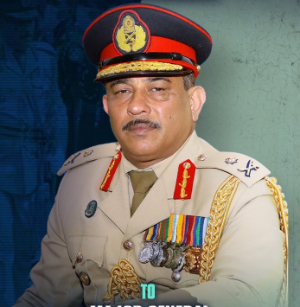 In August 2021 Major General Indu Samarakoon Hdmc Lsc assumed duties as the Commander, Army Logistic Command at the Headquarters Logistic Command Kosgama. He has been appointed as the Deputy Chief of Staff of the Sri Lankan Army in December 2023.
In August 2021 Major General Indu Samarakoon Hdmc Lsc assumed duties as the Commander, Army Logistic Command at the Headquarters Logistic Command Kosgama. He has been appointed as the Deputy Chief of Staff of the Sri Lankan Army in December 2023.
Major Samarakoon follows a long line of Wesleyites who have served Sri Lanka in the defence of the Nation.
On behalf of the Worldwide Brotherhood of Wesleyites I thank Major Samarakoon for his services to the country thus far and wish him well for the future.
*New Deputy Chief of Staff Begins His Office at Army HQ*
Major General SPAIMB Samarakoon Hdmc Lsc of the Corps of Sri Lanka Electrical and Mechanical Engineers, the newly-appointed Deputy Chief of Staff (DCOS), 3rd most senior appointment of the Army assumed office on Friday (15 Dec) at the Army HQ during a simple ceremony.
As Buddhist monks began chanting ‘Seth Pirith’, Major General SPAIMB Samarakoon Hdmc Lsc signed an official document symbolizing the acceptance of the new office. Later on, he offered ‘Pirikara’ and ‘Gilanpasa’ to the monks and received spiritual blessings.
At present, Major General SPAIMB Samarakoon Hdmc Lsc in addition is performing duties as the Colonel Commandant of the Corps of Sri Lanka Electrical and Mechanical Engineers.
Senior Officers, Staff Officers at the office of the Deputy Chief of Staff (DCOS) and Other Ranks joined the occasion.
Here is a brief profile of Major General SPAIMB Samarakoon Hdmc Lsc;
Major General SPAIMB Samarakoon Hdmc Lsc was enlisted in the Regular Force of the Sri Lanka Army as an Officer Cadet on 22 February 1988. Upon successful completion of military training at the Sri Lanka Military Academy - Diyatalawa in the Intake 29, he was commissioned in the rank of Second Lieutenant and posted to the Core Of Srilanka Electrical and Mechanical Engineers on 16 December 1989. After being steadily elevated to subsequent Ranks in the course of the span of service in the Army, he was promoted to the rank of Major General on 18 May 2021. He is a proud product of Maliyadeva College Kurunegala and Wesley College Colombo.
Throughout his military career, he has served in Command, Staff, and Instructional appointments exemplifying his extraordinary capacities in respective appointments in the Sri Lanka Army and also he has served overseas as the technical officer for Sri Lankan contingent in the UN Peace-keeping Mission in Haiti during his three decades of military career.
He has followed many local and foreign courses during his military career, such as Modern Motor Vehicle Technology Course, Unit Commander Refresher Course, Logistic Staff Course (Pakistan), Young Officer Course (India), Psychological Operations Training Course (Conducted by USA), Workshop Company Commander Course (India), Financial Management, Logistic Material Management and Human Resource Management Course (Pakistan), Senior Officer EME Course (India), Ground Artillery Repair Engineer Course (China) and Higher Defence Management Course (India).
The Senior Officer has also followed a number of higher educational and non-military courses such as Master of Management Studies (MMS) and MSC in Logistic and Supply Chain Management and the International Higher Diploma Certificate in Computer Programme. With his profession, he has become a member of the Automobile Association of Ceylon (AA), the Institute of Management of Sri Lanka (MIM), the Chartered Institute of Logistic and Transport International (CMILT) and a member of the Institute of Automobile Engineers (MIAE). He is also a honorary member of the College of Military Engineering and Technology Sri Lanka (CMETSL).And also he is member of Institute of Supply and Material Management (MISMM).
Further, Major General SPAIMB Samarakoon Hdmc Lsc is widely known as a professional and veteran national award winning racing driver and motorcycle racing rider in Sri Lanka. He has held number of appointments in the sphere of motor sports. He is the chairman of motor sports selection committee of the ministry of sports and federation of Motorcycle Sports in Sri Lanka.He is also the chairman of the Army Motor Sports Committee.And also he is the designer of Diyatha Uyana broadwalk restaurant,flower stalls and aquarium ,and the person who designed the Delkanda Pola and padukka pola concept, and designed the bus halting place at Colombo Metropolitan are during his tenure as Colonel Project at Diroctorate of EME at AHQ. Also he is the one who designed and fabricated Unicolt trucks,Aimov and Uni cob APCs vehicles during the tenure of Director General EME at Army Headquarters.
Major General SPAIMB Samarakoon Hdmc Lsc has served 35 years of loyal and dedicated service to SriLankan Army which prove his qualities of good team leader and gentlemen officer at Sri Lankan Army.
From: Shreedharen Dharmalingam,
Secretary/Public Officer,
Wesley College Colombo OBA NSW Inc. (Australia)
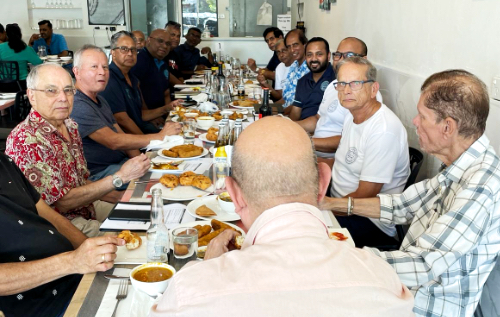
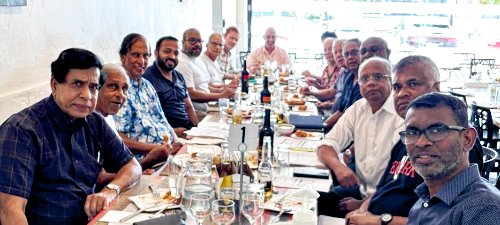
The Wesley College Colombo Old Boys Association NSW Inc. (Australia) held its 30th Annual General Meeting (1994 - 2024) at The Indo Lankan Restaurant (61 Boomerang Place, NSW 2147), on Saturday 3rd February 2024.
President Kugan Thiru (since Jan 2022) thanked the members, their families, old boys, patrons, sponsors and well-wishers for their faith in his leadership and the Executive team’s capability and their continuous unconditional support and love for their Alma Mater.
He addressed that 2022 and 2023 were successful years of the history of the Wesley OBA, NSW (Sydney) Australia especially for the Double Blue Ball held on Saturday 27th May 2023 with a record-breaking ticket sale of 435 tickets sold and a net profit of $19,530.88 was made on the night. The Treasurer Mr. Ravi Nadarajah presented the Financials to the Members.
The President thanked the Executive Committee for their hard work, commitment, dedication, sincerity and tremendous support in everything they did during his leadership in 2022 and 2023, otherwise, the success and achievements would not have been possible.
He also pointed out that the membership attendance at the AGM was significant and reflected the enthusiasm of the members to support their Alma Mater and the Wesley College Colombo OBA NSW Inc.
In the President’s speech, he said that he would like a new leader to be appointed in 2024. However, the Members and Patrons declined his request but asked the President and Executive Committees to stay in the role in 2024 as well.
As a result, the members and patrons voted unanimously for the Office Bearers to stay in their respective roles in 2024 too, except for a few changes to the Committee Members.
The newly elected president Kugan Thiru thanked the members once again for the trust reposed in him for the 3rd consecutive year of Presidency and the honour conferred on this 30th year of Wesley OBA NSW Inc.
He thanked the outgoing Committee Members Zaki Ousmand and Zaeem Al Careem for their support in 2023.
Elections of Office Bearers for the year 2024/2025:
President:
Mr. Kugan Thiru
Vice President:
Mr. Derrick Ginger
Secretary/Public Officer:
Mr. Shreedharen Dharmalingam
Treasurer:
Mr. Ravi Nadarajah
Committee Members:
Mr. Roshan Deivendra
Mr. Mohan David
Mr. Jason Caderapanpulle
Mr. Joshua Jebaseelan
Mr. Nuwan De Silva Kulasekera
Honorary Auditor:
Mr. Reggie Abel
Patrons:
Mr. Jaya Winslow
Mr. Lalith Fernando
After the appointment of the new Office Bearers and Committee, President Kugan Thiru informed the members that the following activities would take place in 2024:
Mid-year dinner with patrons to ensure inclusiveness.
Members’ popular Bus (coach) trip and picnic to a selected destination in May or September 2024 (to occur during warmer weather)
Sporting activities
Fellowship Night (October/November) or Christmas Party (November/December) - one or the other.
Ora et Labora
Wesley College (Colombo) Old Boys' Association (NSW) Inc. is an incorporated body under the Associations Incorporations Act of 1984 of New South Wales, Australia
Incorporation number INC9888341
Incorporation date: 26 October 2007
Written by Arthur d’With-Barbut, Melbourne, Australia
My Dad, Cecil Alexander d’With-Barbut was born in Colombo, on the 13th of December 1906. Dad, on reaching school age, became the third generation of our family who attended Wesley College Colombo, Sri Lanka.
From the time I could read I was fascinated by this ‘Honour Plaque’ which was given pride of place in our lounge room.
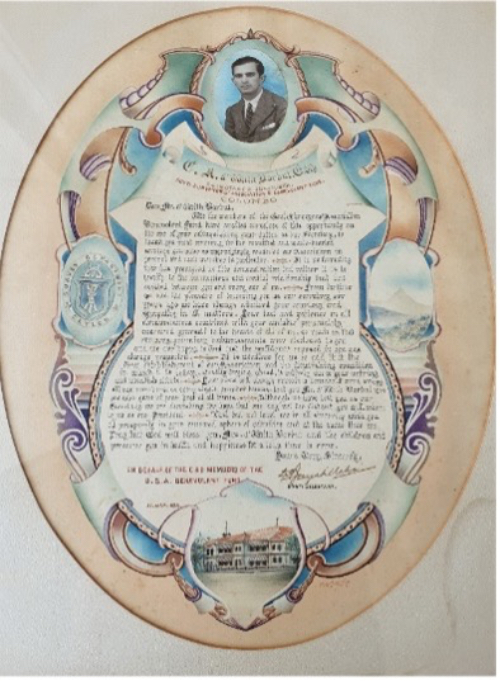
I soon learnt that my Dad would voluntarily seek out positions where he could be of service to members of the community. Another plaque in the Government Surveyors Sports Club in Diyatalawa shows that my Dad served as Secretary from 1951 to 1957 which was the longest period in Club History!
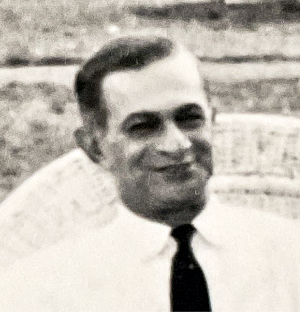 Dad, like his father before him had become a Surveyor in the Sri Lankan Survey Department. My Grandfather at 52 had reached the position of Assistant Superintendent of Surveys. Family folklore state he was being groomed to become Surveyor General of Sri Lanka. Sadly his untimely death at that age ended that dream. Similarly my Dad at 53 had reached that same position and was also the Principal of the Training College for Surveyors, (Now incorporated in the University of Sri Lanka). The family dream of being Surveyor General was alive and well. It was not to be.
Dad, like his father before him had become a Surveyor in the Sri Lankan Survey Department. My Grandfather at 52 had reached the position of Assistant Superintendent of Surveys. Family folklore state he was being groomed to become Surveyor General of Sri Lanka. Sadly his untimely death at that age ended that dream. Similarly my Dad at 53 had reached that same position and was also the Principal of the Training College for Surveyors, (Now incorporated in the University of Sri Lanka). The family dream of being Surveyor General was alive and well. It was not to be.
My brother Cecil and I are eternally grateful that he sacrificed all his personal ambitions to immigrate to Australia in the hope of giving us a better future in life. Sadly he resigned in 1960 at the age of 52 so that we could immigrate to Australia.
His great knowledge, qualifications and previous experience were not recognised in Australia and he had to settle for a menial position as Survey Assistant with the State Electicity Commission of Victoria in 1960.
Dad soon became heavily involved with the Australia Ceylon Fellowship(ACF) which was the first Sri Lankan organisation formed in Australia. It’s main focus was to help new Sri Lankan immigrants settle in their new country.
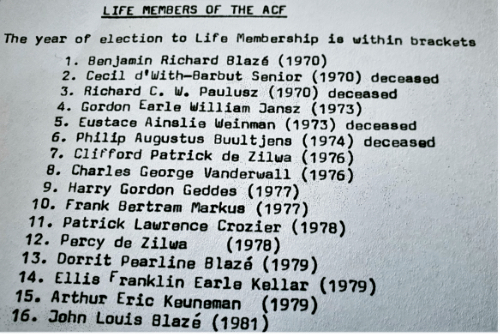
In recognition of his work the ACF appointed him their first Life Member along with the founder of the ACF Benjamin Blaze. He served as Vice president from 1967 to 1974 .
However his outstanding service was as Chairman of the ACF Migration Committee. This committee helped intending Sri Lankan migrants get finance and provide advice. Dad was a devout Christian and would attend All Saints Anglican Church in Clayton. His work and leadership in the church was soon recognised and he was appointed Church Warden.
An Excerpt from the Parish paper:
My mother had progressively suffered from Senile Dementia. In early 1978 she could not recognise us and was unable to speak. She was admitted to Kingston Geriatric Centre. This was a great worry for my Dad and the family.
After some months, Mum was scheduled for an operation on 23rd May 1960 to amputate her left leg because gangerene had set in. This caused a lot of stress to my Dad. On 22nd May 1978 Dad was admitted to hospital after suffering a heart attack. Sadly he passed away the next morning at the age of 71 a few hours before her successful operation.
This was the saddest day of my life.
..................................
From Dr Nihal D Amerasekera
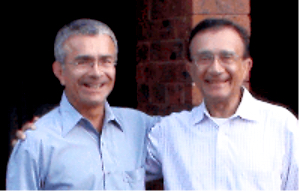 I remember Mr C.A d’With-Barbut bringing his sons to the school boarding at the beginning of term and returning to collect them at the end of term. He looked around the school with great interest and spoke to the hostel masters and some students. Mr Barbut lived at the survey camp at Diyatalawa. The Barbut’s were generous hosts to the boarders at their annual hostel trip where they provided accommodation and also sumptuous food for the group.
I remember Mr C.A d’With-Barbut bringing his sons to the school boarding at the beginning of term and returning to collect them at the end of term. He looked around the school with great interest and spoke to the hostel masters and some students. Mr Barbut lived at the survey camp at Diyatalawa. The Barbut’s were generous hosts to the boarders at their annual hostel trip where they provided accommodation and also sumptuous food for the group.
Senthil Sinniah captained cricket in 1959/60. His father was a surveyor and was known to Mr Barbut. Senthil’s father died suddenly at a young age. Having heard about his untimely death Mr Barbut invited Senthil to spend a holiday with them in Diyatalawa. Senthil spoke to me of the generosity of the Barbuts and their kindness and wonderful hospitality all through his stay in Diyatalawa.
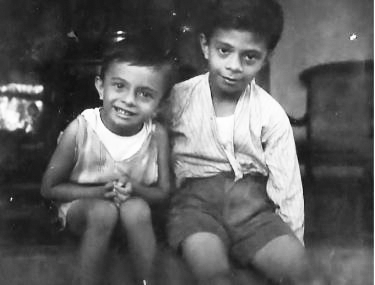 |
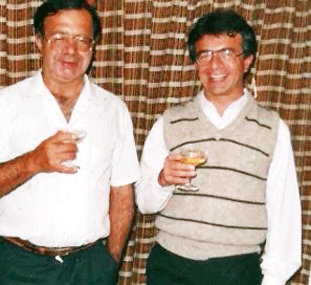 |
Mr L.A Fernando who was then a Senior Hostel Master too spent a happy holiday in Diyatalawa through the kind generosity of the Barbuts.
Mr Mr C.A d’With-Barbut and their sons Arthur and Cecil have been loyal Wesleyites. On behalf of the Worldwide Brotherhood of Wesleyites I thank them for their immense contribution to the life of the school.
Mr C.A d’With-Barbut and his elder son, Cecil, have now passed on. May their Souls Rest in Peace. We pass on our best wishes to Arthur.
..................................
Ora et labora
..................................
Links to further reading
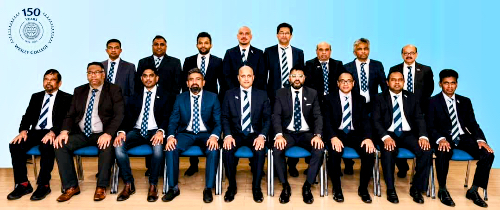 Wesley College Old Boys’ Union United Kingdom (WCOBU UK)
Elections of office bearers for the year 2024/2025
Wesley College Old Boys’ Union United Kingdom (WCOBU UK)
Elections of office bearers for the year 2024/2025
President: Mr Niroze Ahamed
Secretary: Mr Ghanzanfar Hameed
Treasurer: Mr Kareem Lameer
Social Secretary: Mr Tharanga Jayasinghe
Sports Secretary: Mr Sarith Fernando
Membership Secretary: Mr Suresh Perumal
PRO/ Editor:Mr Kushil De Zoysa Siriwardana
Vice President: Dr Paul David, Mr Anura De Silva
Committee Members:
Mr Ranjith Chandrasena
Mr Nalin Perera
Mr Sathyendra Kumar
Mr John Kern
Mr Ajithsingh Balasingham
Mr Imran Sallay
Mr Kaushallya De Alwis
Mr Feroze Deen
Mr Hirantha Avishka Liyanage Mr Udayakumar Kandasamy

Spotlight on N.R. Gajendran
It is the 150th Anniversary of Wesley College Colombo. Stepping into the shoes of the orator for such a momentous occasion is N.R. Gajendran, whose career spans over four decades, dedicated to tax and fiscal matters. As the Chairman of the International Fiscal Association (Sri Lanka Branch) and a figure who has held various leadership positions in the realm of taxation, Gajendran embodies the pinnacle of professional achievement. His connection to Wesley College runs deep, making his role in the Shelton Wirasinha Oration not just a professional engagement, but a heartfelt homage to his alma mater. The selection of Gajendran as the speaker is a testament to the caliber of individuals Wesley College has nurtured over its 150 years.
A Gathering of Generations
Set for 5.30 pm on a Wednesday evening, the event is more than just an oration; it's a confluence of generations. Alumni, current members, and well-wishers of Wesley College will gather in the College Hall, a space teeming with memories and aspirations. The event, open to the public, is a unique opportunity for the wider community to engage with the rich history and legacy of Wesley College. It's a moment for reflection, celebration, and forward-looking, as the institution not only honors one of its most revered figures but also sets the stage for future chapters.
In the grand tapestry of Wesley College's 150-year history, the Shelton Wirasinha Oration by N.R. Gajendran promises to be a highlight, weaving together threads of legacy, achievement, and community. As the college stands on the cusp of this milestone, the event is a beacon of the institution's enduring spirit, its commitment to excellence, and its unwavering dedication to shaping the minds and hearts of future generations.
The Oration will be delivered by distinguished old boy of the College and well-renowned tax specialist N.R. Gajendran, and is open to the public.
......................................................
1st XI Cricket Team - 1976/77
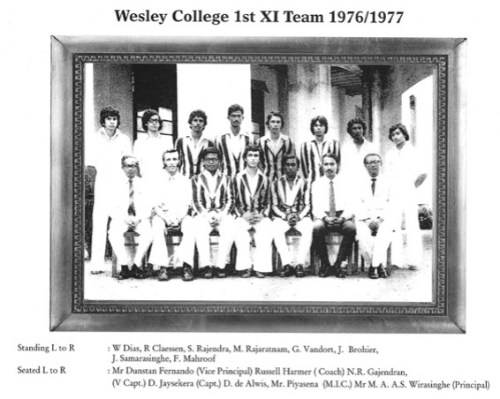
W. Dias, R Claessen, S.Rajendra, M Rajaratnam, G.Van Dort, J Brohier, J Samarasinghe, F.Mahroof
Seated L to R:
Mr Dunstan Fernando (Vice Principal), Russell Harmer(Coach), N.R Gajendran (Vice Capt), D Jayasekera (Capt), D De Alwis, Mr Piyasena (M.I.C), Mr A.S Wirasinha (Principal),
......................................................
N.R. Gajendran was educated at Wesley College. He also was the vice-captain of First XI Cricket Team 1976/77 and a fine right arm off spin bowler.
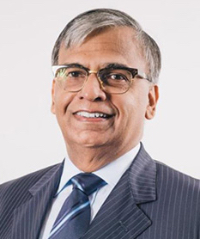 MR. N. R. GAJENDRAN is the senior partner, a Fellow member of the Institute of Chartered Accountants of Sri Lanka with over 25 years of post-qualification experience in various fields. He was a Council Member of the Institute of Chartered Accountants of Sri Lanka. He has substantial consultancy experience in Financial Management and Advisory Services, Accounting and Audit. His area of specialization includes international taxation, acquisitions & mergers, restructuring of privatized enterprises and consultancy. He is a member of the Taxation Cluster of the National Council for Economic Development (NCED).
MR. N. R. GAJENDRAN is the senior partner, a Fellow member of the Institute of Chartered Accountants of Sri Lanka with over 25 years of post-qualification experience in various fields. He was a Council Member of the Institute of Chartered Accountants of Sri Lanka. He has substantial consultancy experience in Financial Management and Advisory Services, Accounting and Audit. His area of specialization includes international taxation, acquisitions & mergers, restructuring of privatized enterprises and consultancy. He is a member of the Taxation Cluster of the National Council for Economic Development (NCED).
He was a former senior tax partner of the representative office in Sri Lanka, one of the big five firms. He was the Chairman of the Taxation Committee of the Institute of Chartered Accountants of Sri Lanka. Presently he is the alternate Chairman of the Faculty of Taxation of the Institute of Chartered Accountants of Sri Lanka.
He is also the Chairman of the International Fiscal Association (Sri Lanka Branch). He was the National Rapporteur for the 48th Congress of the International Fiscal Association. He was a former Examiner cum Moderator for the paper on Taxation conducted by the Institute of Chartered Accountants of Sri Lanka and also the former Chairman of the Executive Committee of the Taxpayers’ Association of Sri Lanka. He delivered the Inaugural Annual Tax Oration at the Institute of Chartered Accountants of Sri Lanka on the subject “Taxpayers Rights and Remedies”.
He authored and presented a paper on “Rights and Obligations of Tax Payers and Revenue Officers” at the Commonwealth Association of Tax Administrators (CATA). He was a past Rotary District Governor of Sri Lanka and a past Fiscal Agent of The Rotary International, Sri Lanka.
.........................................................................
1st XI Cricket Team - 1986
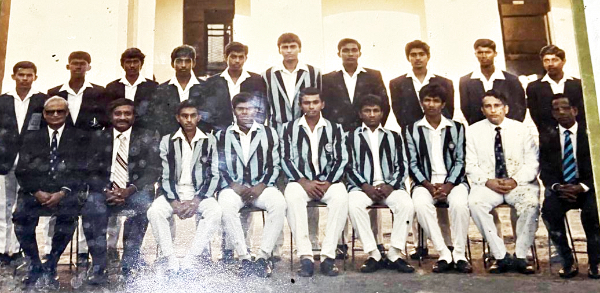
S.Rodrigo,R.Devendra, S.Wijayanayake,M.Sharaz,R.Mapitigama, S.Sappideen, S.Perera, M.Jayasinghe, R.David, S.Perumal
Seated Left to right:
Dr Louis De Z Adhihetty(Principal), M.Muthuvaloe(Coach), D.Dissanayake, J.Wijeratne, D.Nissanke (Capt), S.Jayasena, Z.Mantara,Mr.MAP Fernando(V.Principal),P.G.R Fernando(Master-in-Charge)
.........................................................................
1st XI Cricket Team - 1987
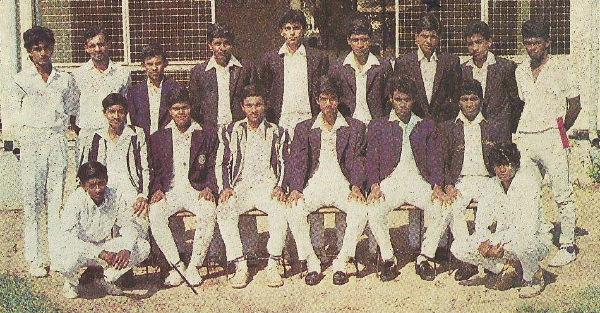
Manjula Jayasingha. De France, Shilpa Rodrigo, Shanaka Perera, Sappideen,Sanjeewa Seniviratne, Dharshana Liyanage, Shahnaz Mohamed, Karunakaran
Seated L- R Danesh
Dissanayake, Vijenathan V.Capt, Duminda Nissanka,Zeshan Mantara, Keith Paul, Selsi Jayasinha
On ground L to R:
Suresh Perumal, Shehan Wijenayaka
.........................................................................
From Dr Nihal D Amerasekera
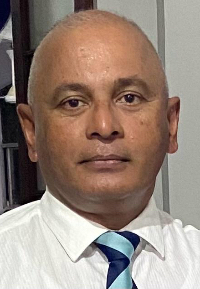 It is with great pride and joy I include this most amazing curriculum vitae of Duminda Nissanka. Born in 1969 Duminda joined Wesley College and the hostel in 1979. He rose up to become the Senior Prefect in the hostel in 1987. Duminda impressed the Principal and the staff and earned the respect of fellow students to be appointed in 1988 to the prestigious position as the Senior Prefect of the School.
It is with great pride and joy I include this most amazing curriculum vitae of Duminda Nissanka. Born in 1969 Duminda joined Wesley College and the hostel in 1979. He rose up to become the Senior Prefect in the hostel in 1987. Duminda impressed the Principal and the staff and earned the respect of fellow students to be appointed in 1988 to the prestigious position as the Senior Prefect of the School.
In 1985 he was a member of the All Island Champions Cricket Team. Duminda captained the school 1st XI cricket team in 1987 and 1988 and became the Second Wesleyite to score 1000 runs in a season.
Being a versatile all round sportsman Duminda established a new record in 400 x meters (52.8 sec) & this still remains unbroken for 34+ years . He was placed first in 400 & 800 meters at Borella Circuit & Colombo District Athletics Meet. Duminda Represented the All Island Athletics Championships in 400 & 800 meters. He captained the school Athletics Team in 1988.
In 1988 he was the Captain of the school's Basketball Team and represented Sri Lanka Schools in the sport.
Multitalented Duminda won his school colours in Cricket, Rugby, Athletics and Basketball and became the only Wesleyite to captain 3 sports.
Duminda left Wesley in 1989. He joined the SSC Cricket Club playing Division One Cricket for SSC in 1988 and 89
In 1989 he was employed as a Tea Taster at Eastern Brokers.
Duminda Joined the Sri Lanka Army in 1990 as an Officer Cadet. He graduated the following year with flying colours as a Second Lieutenant passing out first in order of merit. In his Army career he held many prominent senior appointments. He continued his love of sports in the Army representing the organisation in Cricket, Rugby and Basketball at club level. Despite his meteoric rise in the Armed Forces he took Pre-mature retirement while a respected senior Major in the Army.
In 2008 Duminda proceeded to Skilled Migration to Australia with his family. He now lives in Melbourne employed as an Operations Manager for G4S Custodial Services in Victoria. Duminda continues to play domestic cricket.
Links to further reading
The genesis of a much loved school song
Adapted from an account by Shelton Peiris written for the 125th Anniversary Magazine - later published in the Times Newspaper in Sri Lanka on the 17th of March 2024
As Wesley boys – young and not so young, gathered proudly for their school’s 150th year celebrations this past fortnight, the familiar refrain of their school song ‘Boys of Wesley through the land’ was heard, sung with much gusto on many occasions.
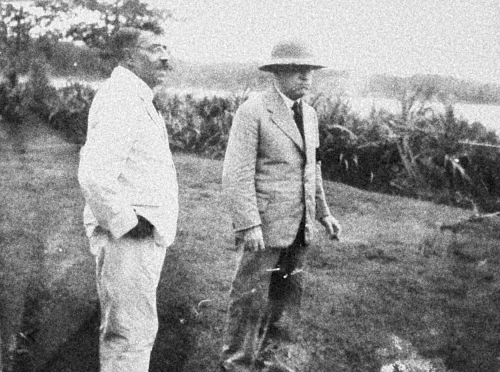
The song with its rousing patriotic lyrics …”and for our dear land we’d be, men of grit and industry…” that resonate with all Wesleyites, was composed by a notable old boy of Wesley College, H.J.V.I. Ekanayake, scholar and legal luminary. The song he composed was first sung at the college hall at a farewell dinner to a junior master when the school was still in its first home in Dam Street. It became so popular it was adopted as the School Song and has endured through the years, sung not only at the school now at Karlshrue Gardens but also at all Wesley reunions overseas.
 So who was H.J.V.I. Ekanayake? He joined Wesley College in 1882 during the era of Rev. Arthur Shipman as principal and also came under the influence of Rev. Thomas Moscrop. H.J.V.I., who came from a background of family wealth was also possessed of a high intellect. He was Editor of the first College magazine published in 1898. An outstanding orator, he argued for ‘Oriental languages in a collegiate course’ at a time when English held sway. A student of the classics, he was also well versed in Sanskirt and Pali, interestingly encouraged by Moscrop’s interest in Buddhism.
So who was H.J.V.I. Ekanayake? He joined Wesley College in 1882 during the era of Rev. Arthur Shipman as principal and also came under the influence of Rev. Thomas Moscrop. H.J.V.I., who came from a background of family wealth was also possessed of a high intellect. He was Editor of the first College magazine published in 1898. An outstanding orator, he argued for ‘Oriental languages in a collegiate course’ at a time when English held sway. A student of the classics, he was also well versed in Sanskirt and Pali, interestingly encouraged by Moscrop’s interest in Buddhism.
H.J.V.I. won the school’s coveted Hill Medal two years running – 1888 and 1889 and was also a keen sportsman, playing in the First XI cricket team. After leaving school, he taught at Wesley for a short time and started the Wesley Cadet Corps.
When he chose to follow a career in law, he won a scholarship given by the Board of Legal Education. He was called to the Bar in 1890 and later appointed a magistrate and it is said, his judicial abilities were displayed during the Ambalangoda riots. In 1906, he was appointed a District Judge and entered the civil service.
H.J.V.I. married Geraldine Louise May, the daughter of Maha Mudliyar James Amerasekera and they had a son – Edward Stubbs Dewinton, named after the British Governor Sir Edward Stubbs, who was the baby’s godfather. Sadly, they lost him at the tender age of 17 in a drowning accident. Always a keen sportsman, HJVI was a founder member of the Sinhalese Sports Club and served as its Vice President. He was also Patron of the Wesley Old Boys Union. Soon after his death, a portrait of H.J.V.I. Ekanayake was unveiled in the Wesley College Hall by Principal Rev. David S.T. Izzette, in memory of a loyal and outstanding son of Wesley in whose name a prize is still presented at the annual prize giving, but who will above all, be gratefully remembered for generations to come, for the school song.
Links to further reading
The Singhalese Sports Club was formed at meeting held on March 27th 1899 at Wesley College Hall situated at Dam Street Pettah – 35 members attended the meeting.
 In March 1899 the Combined Colleges (which happened to be an all Singhalese eleven XI) lost by one run to Colts CC. This great effort was the spur to form a Club for the Singhalese. The combined Colleges XI was C.E. Perera (Capt), R. Wickremasinghe, W.O.Nathanielsz (all Wesley College) F.L. Goonewardena, M.S. Gooneratne & D.L. de Saram (St. Thomas College) H.de Silva and W. Fernando (St. Joseph's) F.A. Obeysekera, E. Weerasuriya, D.B. Gunasekara(Royal College). In those days Royal College was at San Sebastian Hill Pettah, Wesley at Dam Street Pettah, St. Josephs at Suduwella (now Maradana), St. Thomas' Mutuwal. C.E. Perera the finest school boy batsman was a member of the Colts CC and SSC.
In March 1899 the Combined Colleges (which happened to be an all Singhalese eleven XI) lost by one run to Colts CC. This great effort was the spur to form a Club for the Singhalese. The combined Colleges XI was C.E. Perera (Capt), R. Wickremasinghe, W.O.Nathanielsz (all Wesley College) F.L. Goonewardena, M.S. Gooneratne & D.L. de Saram (St. Thomas College) H.de Silva and W. Fernando (St. Joseph's) F.A. Obeysekera, E. Weerasuriya, D.B. Gunasekara(Royal College). In those days Royal College was at San Sebastian Hill Pettah, Wesley at Dam Street Pettah, St. Josephs at Suduwella (now Maradana), St. Thomas' Mutuwal. C.E. Perera the finest school boy batsman was a member of the Colts CC and SSC.
The Convenor of the Meeting to form a club was H.J.V.I. Ekanayake of Wesley College, (Later a District Judge). Other names associated with the Inauguration of the Club are given later. One of the finest products of Wesley College, D.B. Jayatilleke then on the staff presided, later he was to be Principal of Ananda College, a member of the Legislative Council & was Knighted by his Majesty the King of England. The meeting was held at the Wesley College Hall Dam Street Pettah. There was close affinity between the Royalists & Wesleyites & this was evident in the composition of the Singhalese Sports Club Cricket Team in the early years.A few of the early matches were originaly played at Price Park, now call A.E.Goonasinghe play ground.
In 1900 the Club was able to obtain a lease of the land adjoining the Colombo Museum. The large extent was covered with Cinnamon shrubs & the soil was sandy. Much labour & expense was needed to bring the land into a good cricket ground. When leveled out the out field was sandy & scoring of four was difficult. Gradually the handicaps were overcome & a matting pitch laid out. A tent was pitched (where the Nomads CC Pavilion now stands) to serve as a pavilion on match days. Although a committee was appointed to collect funds for improving the grounds & building a pavilion not much progress was made till about 1910. The First Match of the Club
The Handbook of Ceylon Cricket – Other Field Sports (1902) reports the scores of the first match played by the Club. The Ceylon Annual mentioned B. Tennakoon having a match bag of 10 wickets for SSC vs Galle. The Ceylon Independent of 15.07.1901 – commenting on the magnificent performance of the Singhalese Sports Club in their first match stated "The SSC a new organization has taken the cricket world by storm. Their first essay entitles them to an undisputed place amongst the First Class Clubs & its expectations are not hopelessly falsified. The Club is hopeful of giving the Colts much trouble in maintaining their rights to the style & dignity of the Premier Club.Not long after the SSC met the Colts CC in 1902 but were beaten by an innings and 19 runs. "
The Colombo Cricket Club / Colts CC or the NCC/Colts CC match held pride of place in local First Class Club Cricket, but with the formation of the SSC, the Colts CC/SSC match attracted much attention. The First President of the Club was Sir Harry Dias, First Hony. Secretary H.J.V.I. Ekanayake, First Treasurer Philip de Silva & First Cricket Captain – O.G. de Alwis. The Club attracted the best school boy players from Royal, S. Thomas’, Wesley, St. Josephs & Trinity.
S.P. Foenander writing the history of Colombo Colts Cricket Club (1941) says “powerful though the SSC were in that first decade of their history they were never able to inflict a defeat on the Colts who were almost invincible in those days. It was not until 1913 SSC were able to defeat the Colts CC for the first time. It was a sensational finish when SSC won by 4 runs at the Racquet Court grounds. Played on Galle Face on July 14th 1901, and won by the SSC by 189 runs on the 1st innings.
Links to further reading
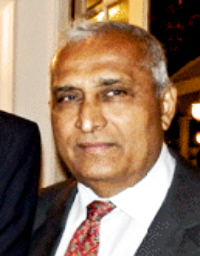 It was January 1960. I remember as if it were yesterday a handsome, fair skinned lad walking towards us in the biology corridor at Wesley College Colombo. I was then in the lower 6th Form, a newcomer to the upper echelons of the school. He told us proudly he came to us from Veyangoda Central College. But never boasted about his brilliant academic career in that school achieving 6 distinctions in the sciences. Sarath was a respected Government Scholar in his previous school. He became a protégé of Mr L.A Fernando , the Vice Principal, who made his entry to Wesley College a possibility. We must thank Mr Fernando, as Sarath does too, for facilitating his entry to our school. We all benefitted enormously from Sarath's presence.
It was January 1960. I remember as if it were yesterday a handsome, fair skinned lad walking towards us in the biology corridor at Wesley College Colombo. I was then in the lower 6th Form, a newcomer to the upper echelons of the school. He told us proudly he came to us from Veyangoda Central College. But never boasted about his brilliant academic career in that school achieving 6 distinctions in the sciences. Sarath was a respected Government Scholar in his previous school. He became a protégé of Mr L.A Fernando , the Vice Principal, who made his entry to Wesley College a possibility. We must thank Mr Fernando, as Sarath does too, for facilitating his entry to our school. We all benefitted enormously from Sarath's presence.
We were together in the 6th form for a happy 2 years. During those years he joined in all the fun and the frolic that was endemic in the 6th form. What was evident to us all was that he was in a league of his own academically and remained a student of outstanding ability and intelligence. With all that he was kind and helpful and most generous in disseminating his knowledge and expertise to us all. He raised our standard and skill level . He was successful in the hugely competitive and difficult University Entrance examination in 1961 to enter the Faculty of Medicine at Peradeniya. Sarath won the Dr.E.A Cooray Memorial scholarship for the best results at the University Entrance examination.
Sarath had a brilliant academic career in the university and qualified as a doctor in 1967. He passed the Diploma in Child Health (DCH) in 1971 and proceeded to the United Kingdom. He was awarded the MRCP(UK) in 1972 while working as a Paediatric registrar at the prestigious North wick Park Hospital in Harrow Middx. He completed a year’s training programme in General Practice in Harrow Middlesex. 1974 Sarath joined an Anglo American copper mine in Zambia as a consultant physician and returned to Sri Lanka in 1978 to work as a Visiting Physician. The Ceylon College of Physicians awarded him the FCCP.
For me it was a great pleasure to be seated with Sarath Ranasinghe at the special dinner at the Galle Face Hotel. This was at the Great Reunion of Wesley College in 2012. We took the opportunity to recall and reminisce those happy years in the 6th form.
Sarath remains close to his friends in the 6th form. He invited Sarath Wickramaratne, Ratnasamy Somanathan - who was the Guest of Honour at the 150th Anniversary and L.C.R(Lalith) Wijesinghe to his house for lunch prior to the anniversary celebrations in Colombo in March 2024. It was an emotionally charged reunion.
He continues to work as a Paediatrician in Kandy where he provides a fine service to the community. He lives with his family in elegant surroundings in full view of the beautiful Kandy lake.
Links to further reading
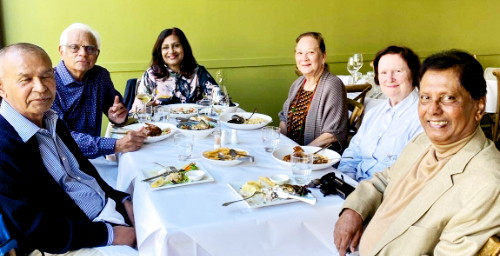
Lunch at Ambrosia Restaurant yesterday with Dr.Mahendra Menon and wife Nimmi, Professors Razeen and Carolyn Sappideen. This Sumptuous Lunch was hosted by Mahen. After lunch we were treated to Coffee and a drink of Old Arrack . It certainly was a glorious and happy long afternoon.
From Dr Nihal D Amerasekera
I have known Mahendra Menon from the school days. His father owned the Pharmacy next to the Police Station in Dematagoda. Then he was at the Faculty of Medicine in Colombo a year or so junior to me. It is lovely to see him and also Upali Perera I have known since way back in the happy days as a hosteller in the 1950's. It was indeed a great pleasure to meet Upali and Charmaine in London
Links to further reading
Written by By Tarini Pilapitiya for the Sunday Times Sri Lanka
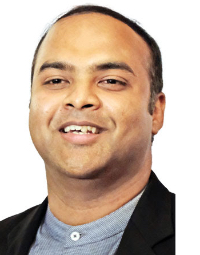 We have just got started, says founder of Sri Lanka Unites, Prashan De Visser who was recently awarded the Commonwealth Point of Light in recognition of his work
We have just got started, says founder of Sri Lanka Unites, Prashan De Visser who was recently awarded the Commonwealth Point of Light in recognition of his work
How can I help? – The catchphrase made famous by customer service assistants has been put into practice by Prashan De Visser for most of his life. Prashan is the founder of Sri Lanka Unites (SLU), a youth movement which has in the past 11 years grown to around 20,000 young people from different ethnicities and religious backgrounds from 25 districts, all working to foster peace and reconciliation in the country.
From Prashan De Visser
At present SLU has six reconciliation centres in Monaragala, Nuwara Eliya, Kalmunai, Mullaitivu, Puttalam and Matara for young leaders to engage each other and have discussions on promoting peace. The organization also helps youth find employment and higher education opportunities bringing growth and prosperity to their communities.
On Monday, August 13, Prashan was recognized by Britain’s Queen Elizabeth II, the head of the Commonwealth, as a Commonwealth Point of Light. This prestigious award honours inspirational volunteers across the 53 Commonwealth nations for the differences they made to their communities and beyond. Prashan is Sri Lanka’s 2nd Commonwealth Point of Light and the 65th globally to receive the award. Humbled and honoured to receive the award Prashan chuckles, “I was the one who took the picture when Kushil Gunasekera received the first Point of Light award.” But he adds, “ none of us in the movement are doing our line of work to get recognized.”
Hailing from Gampaha, Prashan is a past pupil of Wesley College and credits his family and school for fuelling the flames of his passionate work. “My parents from a very young age always opened our home to anybody,” he shares. When he was young, his parents opened an orphanage so he had “many brothers and sisters” growing up. “They always made sure I didn’t ever look down on a person based on ethnicity, religion, financial status, their ability to speak English or not,” he says. Receiving a scholarship to pursue his Bachelor of Arts in international affairs at Gordon College, Boston, Prashan was able to study urban communities and the indicators of what creates cycles of poverty and violence. “When you go to a foreign university you sometimes feel like the outsider,” he states. Proactive by nature, Prashan counteracted the loneliness by thinking of those who suffered more than him. “How can I help them out?”he repeatedly states throughout our conversation.
Bridging barriers wasn’t easy. Not being invited to others’ homes, he invited friends into his dorm through his newly acquired skill of – cooking! “I hadn’t cooked a day in my life in Sri Lanka,” he chuckles “but I started by skyping my mother and watching her.” People got to know him better over a meal and during his four year stint at college “I felt like I had cooked for 500 people,” he laughs. But Prashan has also been on the other side of discrimination. After the death of his friend’s father in the World Trade Centre bombing in ’97 he honestly proclaims “I remember feeling so frustrated.” Sixteen years old at the time, he recalls going through radical assumptions that everyone in the North was a terrorist.
However his new neighbour, a boy from Vavuniya changed his perspective. “He was a year older than I and was interested in joining the LTTE so his parents sent him to school in Colombo.” “I was very hostile to him as he was to me,” he states laughing“but we still played cricket together. I changed my thinking to, ‘everyone else is bad but this one is ok’.” Joining his new friend on a leadership training mission in the North, Prashan recalls seeing children as young as 13 being recruited in the war – some willingly, some forced.
His emotional experience coupled with the research he did for his final year bachelor’s thesis ‘reconciliation in a world of conflict’ made Prashan “really think”. Coming back to the country in 2008 he organized groups from the North and South to say 10 things about each other. “Nine out of the 10 were always negative although they had never met. At that time we found that 70% of Sri Lankan youth didn’t have a friend outside their ethnicity or religion but they had many opinions about them.”
Prashan comments that roughly 96% of students today study in their own medium of language making them unable to speak with a person from another ethnicity. SLU emerged as a means to start a conversation. Conferences took place in Jaffna, Galle, Kalmunai, Kurunegala etc. Advertised as the Future Leaders Conference where the best and brightest in Sri Lanka come together, Prashan happily recalls the positive response to the programme.
SLU was able to strategically divide the young participants by ethnicity, race and religion engaging them in sports, discussion etc. By cheering for the same team and sharing grievances the young learnt quickly that “everyone suffered in the war” Prashan comments.
Back home, SLU picked a leader to represent their school urging others to join his/her club and partnering them with another school from a different ethnicity. The students stayed in touch, visiting each other and even staying at each other’s homes some even going on to change their parents prejudices.
But why young people? To this Prashan responds, “It’s very difficult to teach someone who has lived and breathed something for 20 to 30 years. Young people learn and absorb change better. They have built their opinions based on inherited opinions so you can give them a positive experience,” he feels. “If you want reconciliation and peace in Sri Lanka you need a generation to work at it.” Women leaders were a big emphasis for Prashan. “Women need to be part of the negotiating table,” he states adding that they add more advantages to peace building.
Prashan has four indicators for success. Firstly breaking the cycle of violence which has dogged this country for over 30 years, resulting in a needless loss of life.
The second is creating a better understanding among communities. “At the moment we can’t even imagine a president, prime minister or parliamentarian getting voted by people predominantly outside their ethnicity or religion,” he states, “people will vote for their crook but we want people voting for the good.” “I want my son to grow up in a country he can be proud of” Prashan smiles counting a success if conflict could be spoken about in the past tense. And lastly Prashan hopes that every Sri Lankan one day sees themselves as a “first class citizen regardless of their differences.”
With SLU “we’re building a proactive, independently thinking, engaging generation,” he shares. “Violence has been seen as a sign of manhood, as a sign or protection,” he explains adding that SLU projects “that violence is a lack of intelligence, a lack of capacity to think independently and a lack of maturity.” Steps taken towards reconciliation will also further benefit Sri Lanka to be seen as a country good for foreign investments.
SLU has been expanded to become Global Unites, including several countries from all around the world aimed at building peace and reconciliation among nations. The movement will also be hosting an investor ‘shark tank’ of sorts in Sri Lanka in the coming months where students from all over the country will be able to present their business proposals to investors who will help finance and mentor them. Citing the case of a girl who has opened her own bicycle repair shop in Monaragala as one of the many bi-products of SLU, he says, “We make them employable and give them opportunities to let them know that they are supported.”
“We’ve done maybe 5% of what we’re supposed to do,” he shares hoping that his story will encourage others to help their community. “Community service isn’t about taking a selfie and posting it on social media saying ‘oh look at me I’m a nice person’, community service has to be strategic and have a long term effect. You don’t need to know my name. You don’t need to know who I am. But you need to know what we can do for this country.”
What continues to motivate his work? “The job’s not done,” he affirms, smiling “we’re just getting started.”
Written by Bashur Musafer, Sydney, Australia
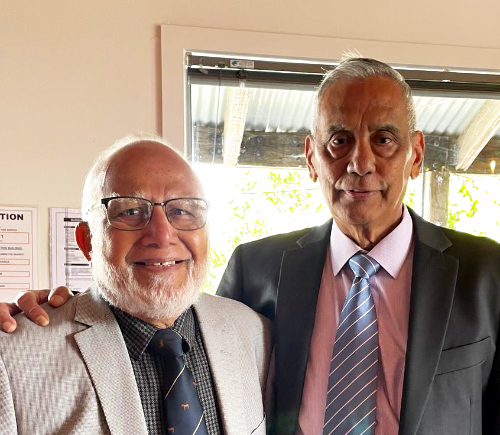
.........................................................................
Rugby 1st XV Team - 1959
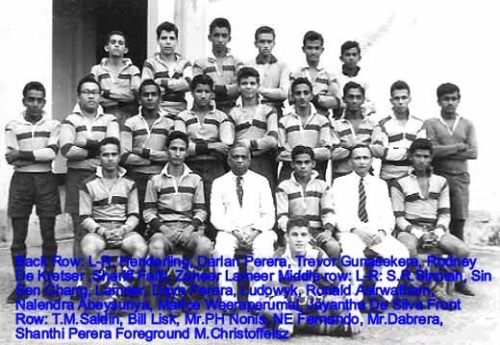
.........................................................................
Rugby 1st XV Team - 1960
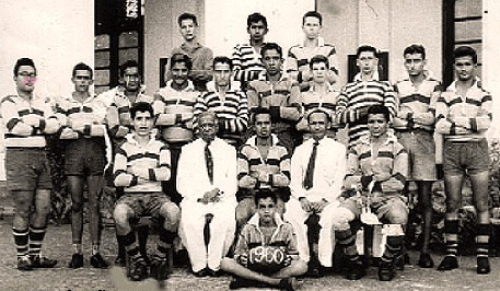
Fore Ground:- Robin Reimers
.........................................................................
I attended a wedding of a relative in Wellington, New Zealand in Jan 2024 and was pleasantly surprised to see the familiar face of Bunny Saldin a senior schoolmate and an all round sportsman.whose age hasn’t changed much of him. Still looking fit and well.
An Old Wesleyite and a former Rugby Captain, Bunny was a few years senior and only known to me as a very good sportsman. He together with his brother Eshan who became a prominent fashion designer was one of those students who was schooled from the Kindergarten to the Upper school.
In recalling his days at Wesley he mentioned the names of all his teacher’s the likes of Mrs Joyce Lembruggen, Miss Blacker, Mr Fonseka, JLF de Mel Mr David Joseph, Mr Haig Karunaratne, the Principals Mr CJ Orloorf & Mr PH Nonis and a host of others.
He very fondly remembers those teachers who did not hesitate to wield the cane especially in the kindergarten and primary school.It was in an era where it was thought that the cane was the tool used for maintaining discipline ” Spare the rod and spoil the Child” was not a method adopted by the teachers of that generation.
When Rugby was introduced to college in 1956 he took an instant liking to the sport from an early age. He said he played during the captaincy of Eddie Buell, Shanthi Perera , Ajitha Wijesinghe and NLC Fernando and eventually captained the side in 1960. He also played Hockey, Soccer and represented the school at the Public schools athletics meet. He fondly remembers his colleagues at college and had many a story to share of their pranks and exploits.
On leaving Wesley he joined Carson Cumberbatch a leading mercantile establishment and represented the firm in hockey. It was then whilst I was still at school he persuaded me and three other Wesleyites to play for the Malay Cricket Club Hockey team, he was hoping to form. Incidentally the Malay Cricket Club is the oldest cricket club in Sri Lanka and as old as Wesley College ,a 150 years . Hafiz Musafer, Sandy (Omar) Musafer and Ranjith Gomes all Under 17 players obliged. This trio were brilliant students who graduated in Engineering, Medicine and Physical science.
The club ended up being runners up in the Bacon Cup losing to the more fancied Old Bens in its very first year of participation.
Since the initiative taken by him to revive Hockey at the Malay Cricket club in1962 it still continues as a dominant team in the inter club scene. He continued to play Hockey for the Malays and also excelled in the Mercantile league . He was a popular figure a good leader, administrator and a great organiser of getting things done.
He retired as a very senior executive in the Browns Group of Companies and later migrated to New Zealand.
A very humble and unassuming individual who has served in many a sporting and community organisation and still continues to devote his time to working with the community and the welfare of the Seniors in his adopted homeland of New Zealand. A good citizen of the world and a proud Product of Wesley indeed!.
We wish Allister a very happy 90th Birthday and thank him for his service to the OBU Australia.
 Born 30 April 1934 will be 90 years old on the 30th of April 2024 (amongst one of the oldest Wesleyites in Australia). He joined Wesley in 1946, left Wesley in 1953. At school during the period of the Claessen brothers.
Born 30 April 1934 will be 90 years old on the 30th of April 2024 (amongst one of the oldest Wesleyites in Australia). He joined Wesley in 1946, left Wesley in 1953. At school during the period of the Claessen brothers.
Principals during his time -David Izzett, James Cartman and C. J Orloff Allister won the Light of Asia Junior Elocution contest for Wesley
He was a member of the Kinross Surf Lifesaving club in 1947 while still at school, The Club soon became a byword in swimming and dominated the Two- Mile Sea Swims. Swim Champions Gerd von Dincklage, Ralph Forbes, Hugh Stewart. Hilmi Khalid, Carlisle Chalon, Allister Bartholomeusz, Ian Kelly, Tony Williams (1960 Olympics) Desmond Templar, Rattan Mangharam, Randy Gray, Henry Perera, are names that come to mind. Other names who made significant contribution to the Club, wereTissa Ariyaratne, Gunaseelam Kanakratnam. Aubrey Van Cuylenberg (Water Polo, Ceylon Soccer goalkeeper), Langston and Fred Pereira.
Allister swam in the two-mile sea swim from 1949 for 9 years and was placed 3rd one year. Won the bronze medal for surf lifesaving awarded by the Surf Lifesaving Association of Ceylon. Was an active life saver performing regular duties on Sundays at both the Mount Lavinia and Kinross beaches. He played water polo for the Kinross club. Allister represented Ceylon in Water Polo against the Singapore RAF.
He joined ‘Jeanne Holland’ a mercantile company and swam in the Mercantile Cup, being part of the winning team for two years. He also served as the Honorary Secretary of the Ceylon Amateur Swimming Association.
After been employed as a Shipping Executive for Aitken Spence based in Colombo, Galle and Trincomalee, Allister migrated to Australia in 1965. While in Melbourne Allister was a very active member of the OBUA, serving on the Committee for many years. He served as Editor for two years and was also Vice President during his tenure
From Dr Nihal D Amerasekera
You are a shining example of strength, wisdom, and grace. Happy 90th birthday! On behalf of the Worldwide Brotherhood of Wesleyites I wish Allister a very happy birthday and thank him for his services and contribution to the life of the Old Boys Union in Australia. We wish you good health and happiness.
Links to further reading
From Bashur Musafer, Sydney, Australia
.........................................................................
1st XI Cricket Team - 1952

.........................................................................
 Visiting Sri Lanka for the 150th year celebrations in March 2024 and hoping to meet as many of my classmates, schoolmates, seniors and juniors, high on my list was to visit my eldest cousin Lt Col Sahardeen Musafer a very senior old boy of Wesley.
Visiting Sri Lanka for the 150th year celebrations in March 2024 and hoping to meet as many of my classmates, schoolmates, seniors and juniors, high on my list was to visit my eldest cousin Lt Col Sahardeen Musafer a very senior old boy of Wesley.
He was the patriarch of the second generation of fourteen Musafers at Wesley and also of a third and a fourth generation that followed. The most prominent of the third generation was Krishan Musafer who captained the college rugby team in 1992 and later represented Sri Lanka.
The first generation being my uncles ZD, AR the cricket captain (1933 and 1934) and my Dad. My maternal grand uncle Z H Mantara captained the cricket team in 1894. The family connection with Wesley going back a 130 years. Mus or Bomba as he was commonly referred to was a humble, soft spoken and friendly individual. Now 92 years of age he resides at an Army retirement home in Negombo well cared for and looked after. No longer spritely but not being confined to a wheel chair he still shows a lot of grit and determination to move slowly around unassisted. Though having lost the sight of one eye he is still an avid reader.
 He has a remarkable memory of past incidents and recalls his admission to Wesley attributed to my Dad and Mr Joseph who was a teacher at Wesley. He told me it was the life changing moment of his life.
He has a remarkable memory of past incidents and recalls his admission to Wesley attributed to my Dad and Mr Joseph who was a teacher at Wesley. He told me it was the life changing moment of his life.
Incidentally my youngest brother Iqbal and the youngest son of Mr Joseph, Vinod co -shared the captaincy of the college rugby team in 1973. I had the pleasure of meeting Vinod at the celebrations and conveyed Bomba’s story and appreciation.
Mus was a member of the famous cricket team of 1951 captained by Derrick Mack ( A Graduate of the Peradeniya University who joined the Sri Lankan Navy and later served in the Australian Navy and retired as a Lieutenant Commander in Australia ) and in 1952 in the team captained by Radley Claessen . This team was dubbed as the greatest side that Wesley ever produced. This was an era where Wesley cricket was at its peak. The team had an array of names whom he fondly remembers and had kept in touch with including those team mates who had migrated to Australia and England. Bryan Claessen in an article to the DBI names the following as having represented the college at cricket during that period. : Lou Addihetty. Arthlow Chapman. Neil Gallagher, Patrick Shockman, MN Samsudeen. Abu Fuard, Ansar Fuard Bryan Pereira , V Alasunderam,(Public Schools Athlete ) l Abeywaredene, Derrick Mack , Denis Ebert, G Abeysooriya, H Felsingher, G Jayathunga, A Batuwitage, Spencer Mack, N Fernando, D Range, A Casiechetty G Nanayakkara , M Jurampathy and Herman Claessen.
Bryan Claessen as a schoolboy represented Ceylon against the visiting English and Australian test teams. Later on Abu Fuard and MN Samsudeen also represented Ceylon.
Herman Claessen (18 years ) another promising cricketer was tragically killed in a motor cycle accident .
Bomba or Mus as he was affectionately called was the wicket keeper batsman who was hardly called upon to fulfil the role of a batsman owing to the strength of the batting line up. He however remembers the hilarious and nail biting finish in a match against Prince of Wales which Bryan Claessen has so eloquently covered in an article in the DBI titled “Wesleys Glorious Years of Cricket “ .
Having left school he was the first Wesleyite to be selected as an officer cadet to undergo military training at the prestigious Royal Military Academy at Sandhurst England. Vincent Adhihetty, HB Tammitigama and Careem Zavahir also followed in his footsteps.

Bryan Pereira who also played in this famous team was the first Wesleyite to be selected as a naval cadet to undergo his naval training in the equally prestigious Britannia Royal Naval College at Dartmouth England.
The first Wesleyiite to be selected to the Royal Airforce Academy at Cranwell England was the late Shanthi Perera who tragically died in a plane crash on his last training flight. His body was flown back to Ceylon and accorded a military funeral in which the students of Wesley were also participants. Had he survived he would have followed in the footsteps of Air Vice Marshal Rohan Ameresekera (uncle of the editor of the DBI Dr Nihal Ameresekera ) who was the first Commander of the Royal Ceylon Air Force and a former World War II pilot in the Royal Air Force.
Air Chief Marshal Terrence Gunawardene senior prefect and soccer captain and a Ceylon cap was the sixth Commander of the Sri Lanka Air Force from 1990 to 1994. When Mus represented the Military Academy (RMA) at cricket and made his debut at Lords Rev Cartman on reading the newspaper article sent him a letter of congratulations saying that it was a proud moment for Wesley. Rev Cartman was overseeing the welfare of the Ceylonese student community in England in a voluntary role.
He recalls that he was awarded his cricket colours after a stoic batting performance which helped the RMA beat the more fancied British Army side in their annual encounter.
Having passed out from the RMA and being the first in his batch he did a further six months training at the Royal Army Service Corps Training Centre at Aldershot. Onhis return was commissioned as a second lieutenant in the Ceylon Army Service Corps. He played cricket for the Army and Combined Services team.
His son Haroon was also a very talented cricketer and rugby player who played for Royal College and the CH&FC. His late wife Chasnyn who was a pillar of strength to him was president of the Malay Rupee Fund charity for many years. A charity that helped the poor and assisted many disadvantaged students of all faiths through their schooling and university education.
Having served his Country for over twenty five years he retired as a Lieutenant Colonel. He was later recalled to service after retirement and was fortunate to have survived a LTTE bomb attack on the Joint Operations Command Headquarters in Colombo .
Speaking to two past cricket captains of 1962 and 1963 LCR Wijesinghe and M Muthuveloe at the 150th year reunion they mentioned that Bomba when ever present at a cricket match never failed to speak and inspire the young cricketers. He was also a mentor and great source of inspiration and encouragement to me when I joined the Army and represented them at Rugby, eventually captaining the Amy and Defence services team in 1972.
The cricket team of 1962 captained by LCR Wijesinghe and coached by BJH Bahar (Snr) and Edmund Dissanayake as master in charge was also labelled as a champion side. This team included many of my classmates and contemporaries who were very talented all round sportsmen, namely Mervyn Harmer, Bill Deutrom, Rodney Perera, Darrel Maye, Milroy Jeberajah, Sarath Wickremaratne, Batcha (Haris) Fuard, Milroy Muthuvaloe, Kenneth de Silva, Priyanath Fernando and Everard Schoorman (Capt 1964 )
Bomba is one of the three last surviving members of the team, the other two being MN Samsudeen and Patrick Shockman. Their innings are drawing to a close but to many the cricketing prowess of that team left a lasting impression on many a student whether he was a cricketer or not.
The recollections of names date back to over half a century and are etched in memories of those unforgettable schoolboy days of inter communal friendship, fun, mischief and sporting folklore.
It was unfortunate that a bout of a virulent flu did not permit me to attend the many events organised to meet and greet as many old boys as I wished who converged from all parts of the world to honour their old school on this historic occasion. However I am glad I did attend the celebrations in “The Sunset of my Life “ to pay homage and my tributes to a great school which I am proud of and eternally grateful to and also to see a few familiar ageing faces perhaps for the last time.
Links to further reading
From the 150th Anniversary Chronicle
 It is an honour for me to pen an article in tribute to on one of Wesleys legends, the late Mr. Shelton Peiris. I will try my best, hoping that I have done justice to not just an ordinary old boy of Wesley, but an icon who strolled the hallowed grounds and its precincts as a colossus unmatched. Trying to gather information of this great man was an extreme challenge, but having done so,
I thought that I would give a brief synopsis on Mr. Shelton Peiris who was surprisingly born on the 2nd of March, the day Wesley was founded, and departed from this world on the 9th May, the day he gained admission to Wesley. Shelton gained admission to Wesley on the 10th May 1934, admission No: 8812, when Rev. John Dalby was the Principal. His class teacher was none other than the devoted Miss Rachel Lembruggen.
It is an honour for me to pen an article in tribute to on one of Wesleys legends, the late Mr. Shelton Peiris. I will try my best, hoping that I have done justice to not just an ordinary old boy of Wesley, but an icon who strolled the hallowed grounds and its precincts as a colossus unmatched. Trying to gather information of this great man was an extreme challenge, but having done so,
I thought that I would give a brief synopsis on Mr. Shelton Peiris who was surprisingly born on the 2nd of March, the day Wesley was founded, and departed from this world on the 9th May, the day he gained admission to Wesley. Shelton gained admission to Wesley on the 10th May 1934, admission No: 8812, when Rev. John Dalby was the Principal. His class teacher was none other than the devoted Miss Rachel Lembruggen.
Showcasing his talent as a student, Shelton Peiris won many awards, particularly showing an exception in English. In 1942 when the world was sent into turmoil with the outbreak of the 2nd World War, the buildings of Wesley were taken over by the military. Wesley, as a school, was literally split up; leaving a small group of students, which included his long-time friend and foe, Mr. Edmund Dissanayake, to move into an improvised accommodation at Kitiyakkara comprising a sprawling old Walauwe. With the war coming to an end, Shelton Peiris, together with Rev. Cartman travelled to the Army HQ, which was located in Kandy, and persuaded the army command to evacuate the military from the College premises. Having succeeded in their negotiations, Wesley was able to regain its legitimate premises. Leading the march back to Karlsruhe was none other than Shelton Peiris with his friend Edmund Dissanayake.
Finding the buildings in a state of disrepair, Shelton Peiris engaged himself once again in assisting Rev. Cartman to rebuild Wesley to its magnificent past glory. Truly an accomplishment Wesleyites from any vintage, and especially Rev. Henry Highfield, would be proud off.
Appointed as Senior Prefect, Shelton Peiris became the recipient of the 1st ever Henry Highfield Merit Award, which was initiated by Rev. Cartman, who was the then Principal.
It is very perceptible from the many articles written by Mr. Shelton Peiris, that Rev. Cartman was a man who inspired him remarkably. The impact was so potent it left very litde to doubt that Rev. Cartmans persuasion convinced this wonderful man to join the staff of Wesley, although Mr. Peiris had preferred to follow a career in law. I remember at an oration delivered by him in the College Chapel, many years ago, Mr. Shelton Peiris spoke purely on the Cartman era. His very words and I quote, “My head is frill of Cartman”, unquote. The bond of friendship with Rev. Cartman and his family continued even after they left Wesley and returned back to England until Shelton breathed his last.
There is a saying that leaders are not made but born, and true to those words Mr. Shelton Peiris epitomised those qualities. He not only functioned as the first Secretary of the Parent Teacher’s Association, he oversaw Boxing as Master-in-Charge, while functioning as the Prefect of Games, in addition to being the Chief Librarian while at Wesley. He was also the Scoutmaster of the 14th Colombo Scout Troop.
Leaving Wesley, Mr. Shelton Peiris continued his engagement with the school in different capacities. He was a very committed member of the OBU and served the organisation as its Secretary, Vice President and Vice Patron. Representing the OBU as a Governing Board member, I have heard that he had many interesting debates with the management of that time, especially debates between the two Shelton’s; that being Mr. Peiris and Mr. Wirasinha, which were always looked forward to by the members of the Board.
The articulacy of the English language delivered and with wit exhibited was a treat to listen. (In lighter vein, I guess the Chairman of the Governing Board would have appreciated if Shakespeare sat in his chair instead to understand what was debated!). The disagreements were numerous, but Mr. Peiris never took his disagreements out of the Boardroom or to the outer perimeters of Wesley. The level of confidentiality maintained would be superfluous for me to reiterate. Soon after the meetings, a hand of goodwill was always stretched out to whomever he disagreed with, respecting the friendships, and most importantly maintaining unity and camaraderie as a dignified old boy.
Here was a gentleman, and a gende giant, whose traits Wesleyites across many vintages, and those around the globe should try to emulate. Completing 44 years at an educational institution, Mr. Shelton Peiris had the noble distinction of celebrating Wesleys magical 75th, 100th and 125th anniversaries; a feature very few Wesleyites could proudly claim. With this background, Mr. Shelton Peiris held in his possession the virtual history of the school, credentials of which undoubtedly crowned him to be the unquestionable historian and scribe of Wesley.
No wonder he was appointed the official photographer for Wesley’s 75th anniversary souvenir which was edited by Prof. Justin E La Brooy and then went on to be the Chief Editor of Wesleys centenary and 125 th anniversary souvenirs, a unique feature that will be hard to equal.
I do not know if any of you are in possession of the 75th anniversary and centenary souvenir, but I am fortunate to own a 125th anniversary collection which delivers a fabulous publication of Wesleys history.
Wesley was not Mr. Shelton Peris’s only passion, as he continued as a teacher at Christian College Kotte. As the scoutmaster of Christian College Kotte, he had a special affection for agriculture because his scout room was located adjoining the land where practical s and classes was conducted in agriculture. Strangely, for some reason, Mr. Shelton Peiris always found time to be busy in his scout room during the agriculture period. One thing led to another and soon the cubs and scouts began delivering notes discreetly to the agriculture teacher. She was none other than his charming wife-to-be, Delores, whom he went on to marry. Mr. SheltonPeiris functioned as the Membership Secretary of
the YMCA and was the Chaplain of the Gideon’s International, finally ending as its President. He was also involved with the Denepitiya Medical Mission in the South, which was a part of the Anglican diocese of Colombo.
My association with this great old boy has been very minimal and that was mainly due to the huge difference in age and the vast gap in vintage we were associated with. However Mr. Shelton Peiris did inspire me personally as a Wesleyite who shared a wealth of knowledge on the historical aspects of the College. His knowledge of Wesley history can be literally considered as incomparable. Speaking to this noble gentleman on maybe just a few occasions, 1 vividly remember one such occasion, which I would like to share with you.
In 2012 there was a re-union of past cricketers who represented Wesley in 1st XI cricket. There were many functions that were organised during that particular week, which, finally culminated with a sit down banquet held at the Galle Face Hotel. Mr. Shelton Peiris along with his good friend of over 70 years, Mr. Edmund Dissanayake took me to aside during cocktails and spent a fair length of time chatting with me. I vividly remember Mr. Peiris talking to me intensely on the book I edited on Wesley’s cricket history. His words of encouragement and congratulatory message remain an honour that I shall cherish, especially coming from the undisputed and iconic scribe of Wesley.
Mr. Shelton Peiris has left Wesley with a gigantic vacuum to be filled, especially as its historian and scribe. Befitting this noble old boy of Wesley is a tribute with which I shall end my article.
 Jeremy was born on the 12th of November 1959 to Ralph and Jean Brohier. In the early 1950’s Ralph and his brothers were fine cricketers at St Joseph’s College Colombo. Incensed by a quirky admission rule at his former school, Ralph decided to send his sons Jeremy, Miles and Perry to Wesley College. This indeed changed the course of his family history and the destiny of them all.
Jeremy was born on the 12th of November 1959 to Ralph and Jean Brohier. In the early 1950’s Ralph and his brothers were fine cricketers at St Joseph’s College Colombo. Incensed by a quirky admission rule at his former school, Ralph decided to send his sons Jeremy, Miles and Perry to Wesley College. This indeed changed the course of his family history and the destiny of them all.
The Burgher community has contributed enormously to the welfare of the country for several centuries. There was a mass exodus of members of the Burgher community post-independence, the majority to Australia. But the Brohiers belonged to the minority who remained to build our new nation despite the ebb and flow of its fortunes and the many difficulties. The country remains grateful for their valued contribution. As always, they have remained a colourful community, hardworking, loyal and successful.
Jeremy’s schooling at Wesley began in 1965 and there commenced a love of a lifetime. Cricket being in his blood he started young. He played for the school U12 team and captained the U14 and U16 teams. Jeremy went on to represent Wesley in the 1st X1 from 1974 to 1977. Leaving school in 1978 prevented him from being the captain of the 1st XI team.
His sporting prowess extended beyond cricket. Jeremy excelled in Athletics representing the school at the Colombo North Sports meets winning the 100, 200m and long jump events thus qualifying for the highly competitive Public Schools meet. After winning many prestigious awards in athletics his career was cut short by a serious attack of viral hepatitis.
After leaving school he joined the oldest Tea Broking Company in Sri Lanka, Somerville & Co Ltd, as a Warehouse Supervisor. The company soon recognised his skill and potential and was promoted to the important position as a Stores Manager and a Tea Taster. After working 14 years in a Broking Company he moved his career to work for a tea export company and to oversee their tea export operation in the factory. Before long Jeremy was entrusted to take on the duties as the General Manager to the company’s subsidiary flexible packaging plant.
Although Jeremy left Wesley his devotion and loyalty to the school never waned. In 1991 he joined the Old Wesleyites Sports Club (OWSC) when the institution was revived and rejuvenated by Prof. Mahroof Ismail. Having recognised his commitment to Wesley, Jeremy was made Chairman of the Double Blue Dance Committee in 1995 until 2000. When the school needed a gymnasium, the management looked to Jeremy. He organised a musical extravaganza to generate funds for the project through the courtesy of the famous Gypsies. The show was a sell-out success. The net proceeds were utilized to equip a new state of the art gymnasium in the upper floors of the OWSC. As a committee member, he was involved in almost every project that the OWSC organized including the Schools’ Sixes Tournament. This was sponsored by Elephant House and Ceylon Biscuits Limited. In 2009 Jeremy was elected the OWSC President, a position he served for two years. As the President he made a strategic decision to completely refurbish the kitchen. This enabled the club to run a modern restaurant facility. This vastly improved its dining provision for the benefit of the members. The club has since continued to grow in popularity as a meeting place for Wesleyites of all ages. Jeremy refurbished the upper floors of the OWSC with the creation of a board room. The room was named after Denzil Perera to remember his loyalty to the club.
When Wesley’s cricket history was celebrated in 2012 with much pomp and pageantry, Jeremy undertook the enormous task of compiling the cricket history of the school. He channelled his love of the game and the acquired knowledge of its history into a fine collection of cricketing memories. This coffee table book was soon sold out and is still in great demand.
In 2015 Jeremy was elected as the President of the Old Boys Union, a position he served for 2 years. It was a challenging time. Wesley then had no permanent Principal and was managed by an Acting Principal. Jeremy, with his urbane charm and irrepressible energy organized a successful “College Walk of Grit” under the OBU banner. During his tenure Jeremy worked with loyalty and dedication for the greater good of the school. He successfully completed many important projects.
1. Sourcing the College blazer material from the UK
2. Obtaining covers for the turf wickets from Sri Lanka Cricket
3. Initiating the Sir Oliver Goonetilleke Shield for the Wesley vs. S. Thomas rugby match
4. Initiating the Brian Claessen / Arthur Hakel Trophy for the Wesley vs. St. Josephs cricket match.
5. Sourcing a donation of a container load of school desks and chairs from Switzerland for the Resource Room.
6. Resurfacing the basketball court.
7. Initiating the wooden desk and chair project.
Jeremy presenting the Chronicle to the President of Sri Lanka - His Excellency Ranil Wickramasinghe

Jeremy Presenting the Chronicle to the British High Commisioner Andrew Patrick
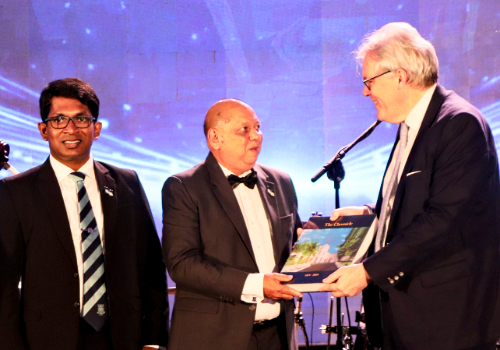
Jeremy presenting the Book to Avanka Fernando, the Principal of Wesley College
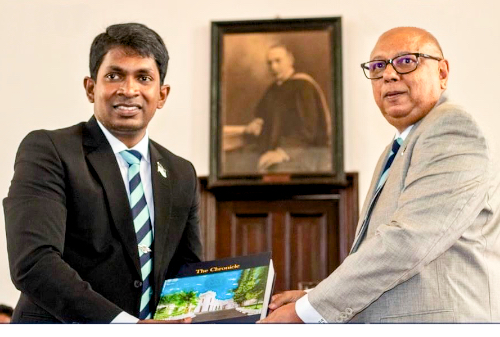
Chronicle being presented to the Guest of Honour Ian Karan at the Banquet

The year 2024 was to be a memorable year for Wesley College. The school was commemorating its 150th year since its lowly beginning in Dam Street Pettah. When the school decided on a chronicle to record its illustrious history, in their wisdom they decided on Jeremy to lead a team to complete this enormous project. The task was completed after 6 gruelling years of research and hard work. The Chronicle was launched on the 1st of March 2024 at the Sesquicentennial Founders Day Assembly. A personalized copy of the Chronicle was presented to The President of Sri Lanka His Excellency Ranil Wickremasinghe at the Sesquicentennial Banquet held on the 11th March 2024. Copies were also presented to the Guest of Honour Mr. Ian Karan and also the British High Commissioner Andrew Patrick.
When I received the copy of the Chronicle in London through the kind courtesy of Navin De Silva, I virtually needed a wheelbarrow to bring it home. It is a struggle to carry it with one hand. To me personally, reading through its pages is a nostalgic journey into my schooldays. The lovely front porch, the great hall, the long corridors and the laboratories form a large part of my personal memories which I have cherished since I left school in 1962. The photographs of the school brought those happy days vividly to life again. The narratives on the school hostel transported me to those magical days in the boarding seeing the sunset and the sunrise on Karlsruhe Hill and our elegant school buildings. Voices from the past must echo in the ether of our great institution and will do so in the decades to come.
Jeremy and the team have delved deep into the archives to unearth some hitherto unknown gems, both from Pettah and Karlsruhe. The book is a scholarly work going into great detail about the founding of the college and of the subsequent 150 years. The Chronicle is all of 822 pages full of history spanning three centuries. The book is beautifully bound in a blue hardcover. This work will be selected by scholars of history of our school as being culturally important and no doubt be a part of the knowledge base of the history of education in our country. This book will adorn the bookshelves of Wesleyites and the Cartman Library. Hence the Chronicle will continue to keep the vibrant history of the the school alive.
Restoration of the pavilion is yet another huge undertaking for the 150th Anniversary. This mammoth task needed to be adequately funded. Jeremy through his research for the Chronicle found an old boy who was completely unknown to the fraternity. He most generously donated a princely sum of Rupees 10 million for the Pavilion Fund. This indeed helped the project enormously to reach the required target.
Through his diplomacy and communicating skills Jeremy has been successful in sourcing a donor to install a solar system to one of the buildings of Wesley for Rs. 4 million (now installed). He has also helped in the refurbishment of the main hall finding a donor for Rs.450 thousand.
Jeremy's heartfelt contribution to Wesley, as an alumnus, is a gesture of gratitude for the inspiration he received from his teachers. They have helped shape his life and make him a well-rounded individual. By assisting with all of Wesley's entrusted projects, Jeremy expresses his thanks to his Creator for granting him strength and wisdom, as well as for the genuine friends he made from various eras at Wesley.
The old adage still rings true, “Behind every successful man there is always a woman”. Jeremy bestows immense credit to his beloved wife, Susan, who has steadfastly supported and guided him through life's ups and downs.
On behalf of the Worldwide Brotherhood of Wesleyites I thank Jeremy for his loyalty, dedication and integrity in all the years of support for Wesley College. We wish him a long and happy life.
Links to further reading

The Wesley College Alumni Middle East UAE(WCAME UAE) has recently concluded its Annual General Meeting and successfully appointed the new office bearers to support our great Alma Mater.
On behalf of the WCAME UAE, it’s my honour and privilege to introduce the new committee and their appointed roles from 2024
President – Ajith Kamalanathan
Secretary – Azmil Oumar
Treasurer –Abdul Qadir
Excom Members
Kaveen Amerasinghe
Rizmie Mohammed Abdul
Tyrone Harrison
Ashan Musafer
S Umanandan
Shaaheen Jurangpathy
Radwan Zainudeen
Shiraad Idrees
Azran Burah
Prabath Seekkuge
Thineshwaran Selladurai-Immediate Past President
Advisory Board
Isthiaq Raziq
Milhan Mohamed
Shilpa Rodrigo
Rukshan Oumar
Ishak Sallay
Lahiru Sithpriya
Rukshan Oumar
Outgoing General Secretary
From Rohan L Perera,
Vice President
Wesley College Old Boys Union
𝗥𝗘𝗩. 𝗘𝗕𝗘𝗡𝗘𝗭𝗘𝗥 𝗝𝗢𝗦𝗘𝗣𝗛
Early Life and Education
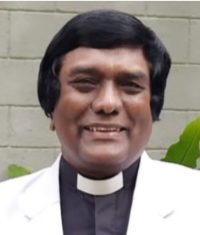 Rev. Ebenezer Joseph the second sibling of 3 was born to devoted Methodist Parents namely Mr. Henry D Joseph & Mrs. Dora Joseph on the 4th of August 1954 in the serene hills of Kandapola in Nuwara Eliya District. With Jabaz Joseph as his elder brother and Esther Joseph as his younger sister, Ebbey as he is referred to by his family, had his life marked by an unquenchable thirst for knowledge and an unyielding spirit from his formative young age. At Wesley College, Colombo 09, he not only excelled academically but also shone in extracurricular activities, becoming a beacon of leadership and inspiration demonstrating a keen interest in electronics as well as the school scripture union. As College and Hostel Prefect, Secretary of the Hostel Literary Union, and President of the Tamil Literary Union, he won the Lydia Senaratne Memorial Prize for the Best Hosteler, setting the stage for a life dedicated to service and excellence.
Rev. Ebenezer Joseph the second sibling of 3 was born to devoted Methodist Parents namely Mr. Henry D Joseph & Mrs. Dora Joseph on the 4th of August 1954 in the serene hills of Kandapola in Nuwara Eliya District. With Jabaz Joseph as his elder brother and Esther Joseph as his younger sister, Ebbey as he is referred to by his family, had his life marked by an unquenchable thirst for knowledge and an unyielding spirit from his formative young age. At Wesley College, Colombo 09, he not only excelled academically but also shone in extracurricular activities, becoming a beacon of leadership and inspiration demonstrating a keen interest in electronics as well as the school scripture union. As College and Hostel Prefect, Secretary of the Hostel Literary Union, and President of the Tamil Literary Union, he won the Lydia Senaratne Memorial Prize for the Best Hosteler, setting the stage for a life dedicated to service and excellence.
Seminary Formation
Driven by a calling to serve, Rev. Joseph pursued theological studies at Tamil Nadu Theological Seminary in Madurai, India. There, he not only achieved academic brilliance but also emerged as a compassionate leader, serving as Secretary of the Student Body and the Human Rights Forum. His journey took him to Germany, where he furthered his mission training, embodying the spirit of global brotherhood and understanding.
Academic Achievements
Rev. Joseph's academic journey is a testament to his relentless pursuit of knowledge. He graduated with distinction, earning a B.Th. (1979), B.D. (1980), and M.Th. (1989) from the University of Serampore, West Bengal. His accolades include the highest aggregate in his B.Th. degree, the Senate Prize for Biblical Studies, and a first-class M.Th. degree, with his research thesis earning a Grade A. These achievements underscored his profound understanding of theology and social analysis, equipping him to make a lasting impact.
Professional Accomplishments
Wesley College Colombo: Rev. Ebenezer Joseph, during his first tenure of office as the President of the Methodist Church, served as the Principal & Manager of Wesley College from 5th April 2014 to 31st March 2015. He was primarily instrumental in opening two Primary School branches of Wesley College in Havelock Town and Thampola - Seeduwa respectively. It’s fitting to mention that Rev. Joseph’s professional life is a chronicle of unwavering dedication and transformative leadership.
Colombo City Mission (1980-1986): In the aftermath of the 1983 riots, Rev. Joseph breathed new life into the mission, launching programs for slum dwellers and pioneering self-reliance initiatives for cart and port workers, known as Natamis. His work in Pettah's bilingual Methodist Church bridged communities, offering hope and solidarity.
Theological College of Lanka (1989-1993): As a lecturer and Director of Field Training, he shaped the minds of future leaders. His creation of the Church History Documentation Centre preserved invaluable ecclesiastical heritage.
Superintendent Minister, Kandy Circuit (1997-1998): His pastoral care and innovative programs for women and children in distress, along with medical camps in war-torn areas, showcased his boundless compassion.)
National Christian Council of Sri Lanka (1999-2014, 2018-2020: As General Secretary and Chairperson, he guided the council through critical times, fostering unity and reconciliation.
Dedication to Methodist Church, Sri Lanka
• President of Conference (2005-2010, 2020-present)
• Secretary of Conference (2004-2005)
• Superintendent Minister, Methodist Church Kollupitiya (2019-2020)
• Contributions to Peace and Reconciliation
• Rev. Joseph's heart beats for peace and reconciliation. His initiatives have healed wounds and bridged divides:
• Founded the Kalmunai Peace Foundation, uniting Tamil, Muslim, and Sinhala communities.
• Organized intercultural visits and peace forums in conflict zones, embodying the spirit of reconciliation.
• Actively promoted interfaith dialogue and understanding, paving the way for enduring harmony.
• Rev. Ebenezer Joseph has devoted himself tirelessly to bringing together young people of different faiths, nurturing a spirit of unity and understanding with his boundless compassion and inspiring leadership.
• International Ecumenical Involvement
• His influence extends globally:
• Central Committee member, World Council of Churches (2006-2012)
• Council member, United Evangelical Mission (2006-2012)
• Vice Chairperson, Asia Regional Board, United Evangelical Mission (2009-2012)
• Executive Committee member, World Methodist Council (2006-2016) Awards and Recognitions
• In 2016, he was honoured with the title “SAMAYANTHARA DARSHANA SEVITHA SHASANA SOBITHA” for his profound contributions to national unity and religious coexistence.
• The World Methodist Peace Prize 2022. This prestigious honour is awarded by the World Methodist Council to outstanding individuals who have worked with fearless consistency and creativity for the building of peace, justice and harmony in the world. It was awarded during his 2nd tenure as the Grand Leader of the Sri Lanka Methodist Council, Rev. Ebenezer Joseph in a show of gratefulness & indebtedness to is alma mater, insistently received the award at the Main Hall of Wesley College, Colombo.
Personal and Family Life
Residing at 252, Galle Road, Colombo 03, Rev. Joseph's life is a symphony of service, resilience, and unwavering faith. His journey, marked by sacrifice and triumph, is an enduring source of inspiration.
Rev. Ebenezer Joseph W.P. is a luminary whose life is a testament to the power of faith, courage, and dedication. His legacy of service, peace-building, and academic excellence continues to inspire and uplift. His story is not just a biography; it is a beacon of hope, urging us to strive for a world where unity, compassion, and understanding prevail.
................................................................
𝗡𝗢𝗧𝗜𝗖𝗘 𝗢𝗙 𝗥𝗘𝗩. 𝗘𝗕𝗘𝗡𝗘𝗭𝗘𝗥 𝗝𝗢𝗦𝗘𝗣𝗛'𝗦 𝗙𝗔𝗥𝗘𝗪𝗘𝗟𝗟 𝗗𝗜𝗡𝗡𝗘𝗥
From Rohan Perera
Dear Wesley Hostel Friends,
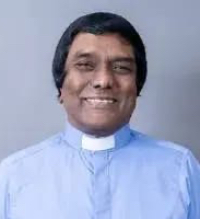 Let us come together as “The Brothers of the Wesley Hostel Family” to honour and celebrate the remarkable contribution made by Rev. Ebenezer Joseph, fondly known as “Ebbie,” at the Farewell Dinner hosted by the Wesley College Old Boys Union on Thursday, 8th August, at the Main Hall of Wesley College. The tickets are priced at Rs. 6000/- & can be sourced on request.
Let us come together as “The Brothers of the Wesley Hostel Family” to honour and celebrate the remarkable contribution made by Rev. Ebenezer Joseph, fondly known as “Ebbie,” at the Farewell Dinner hosted by the Wesley College Old Boys Union on Thursday, 8th August, at the Main Hall of Wesley College. The tickets are priced at Rs. 6000/- & can be sourced on request.
Rev. Joseph, a beacon of hope & courage, has made us hostellers as well as all Wesleyites immensely proud by serving two tenures as President of the Methodist Church and as Manager of Wesley College. He has earned numerous international awards for his humane leadership & selfless services to humanity, often at great personal risk.
Ebbie will *most likely be the last Wesley Hosteller* to serve in these prestigious roles resultant of the closure of the Wesley College Hostel. His self-sacrificing commitment and contributions hold a special place in our hearts & have set an exemplary standard for us all.This farewell dinner is a unique opportunity to express our deep appreciation & gratitude as fellow brothers of the "Hostel Family." It is more than just a dinner;
It would be wonderful if we hostellers could join this momentous occasion, making the evening a memorable celebration for a truly inspiring individual. Let’s gather as one, share our heartfelt thanks, and create lasting memories in honour of our very own Ebbie – Rev. Ebenezer Joseph.
................................................................
An outstanding product of the Wesley College Hostel
From Dr Nihal D Amerasekera
Although the hostel was heaven at times and hell at other times, We were lucky kids; we spent a happy childhood living in Karlsruhe Gardens as boarders. Memories of life in the boarding can fill a book. Humour was invaluable in the darker moments. As a group the boarders were self reliant, resourceful and developed amazing skills of leadership and survival.
There is no place like the boarding to get to know the fellow students. There are people you meet and then spend rest of the years avoiding them. There are others you meet on a corridor and then become friends for the rest of your life. The Saints, sinners and the scholars reveal themselves in the fullness of time and there is no better preparation for the life outside. The teachers fall into those categories too. Overall the sinners were very few like the Saints. The majority belong to some category in between. I feel incredibly lucky to have enjoyed the company of such wonderful friends while receiving an excellent education.
As a past hosteller I wish Rev Ebenezer Joseph my very best for the future. May the farewell dinner bring the past hostellers closer together to wish you well. You have indeed brought great honour to the hostel and what it stood for. Well done.
................................................................
From the International Dialogue Centre
Rev. William Premkumar Ebenezer Joseph
Minister, Methodist Church of Sri Lanka
Rev. William P. Ebenezer Joseph is a minister of the Methodist Church of Sri Lanka and the Co-Secretary of the Congress of Religions and the Secretary General of the Inter-faith Coalition for Peace. Having pioneered many innovative peace-related programmes, including interfaith initiatives, he passionately promotes interfaith activities addressing issues of religious freedom as well.
Rev. William was the General Secretary of the National Christian Council of Sri Lanka for 14 years, promoting ecumenical relations among various Christian denominations and promoting inter- and intra-faith dialogue.
He served as the head of the Methodist church in Sri Lanka from 2005 to 2010, addressing many sensitive issues related to the tsunami of 2004 and the final phase of the thirty-year-old war in the country. He facilitated innovative ways of addressing issues related to relief, rehabilitation, justice and reconciliation, partnering with the Maha Bodhi society (Buddhist), Muslim Aid (Muslim), United Methodist Committee on Relief (Christian), among others.
Having specialized in theology and social analysis and lectures in many theological institutions, he is a sought-after speaker in many peace-related and religious forums. He currently serves as the Minister of the Methodist Church Kollupitiya, Colombo, and as the consultant on interfaith relationship for the Christian Conference of Asia.
He was conferred the title of “Samayanthara Darshana Sevitha Shasana Sobitha” in recognition of his contribution for National Unity and Religious Co-existence in Sri Lanka by the Anti-war Front in 2006.
................................................................
Rev. Ebenezer Joseph wins World Methodist Peace Prize 2022
The World Methodist Peace Prize 2022 awarded by the World Methodist Council to people who have worked with fearless consistency and creativity for the building of peace, justice and harmony in the world has been awarded to the Grand Leader of the Sri Lanka Methodist Council, Ebenezer Joseph.
This award, started in 1977, has earned the respect of nearly 800,000 Methodist devotees around the world. Since then, this peace prize has been awarded 38 times to people dedicated to peace and harmony in the world. For the sake of national, religious and ethnic harmony and mutual peace in America, Egypt, England, Zimbabwe, Korea, Ireland, Germany, Israel, South Africa, Ghana, Argentina, Sierra Leone, Brazil, Australia, Nigeria, Kenya, Bolivia, etc.
The Methodist Peace Prize has been awarded to outstanding individuals as well as great men such as Nelson Mandela, Jimmy Carter, Mikhail Gorbachev and Kofi Annan.
Reverend Ebenezer Joseph is the first recipient of the award in the Asian region.
Born in Kandapola, Nuwara Eliya, Ebenezer Joseph received his basic education at Wesley College, Colombo. He then started his higher education at the Theological Institute in Tamil Nadu and graduated from several universities.
He started his priestly career as a Methodist pastor in 1980 and started his work at the City Mission Church located in Wella Street, Colombo. He worked very closely with the people of the urban slums of Colombo and the Nattami community of the city of Colombo and played a major role in protecting the Tamil people of the city during the July 1983 riots.
From 1999 to 2020, he held the position of Secretary General of the National Christian Board twice.
He worked closely with the people of the North and the South of Sri Lanka to build national unity. He worked together with Buddhist, Hindu, Catholic and Muslim religious leaders to provide the necessary facilities for the education and nutrition of the children in the refugee camps.
Together with Buddhist and other religious leaders, he worked to take a deep message about the religious harmony of this country to the world by participating in various conferences in the country.
He has received many national and international honors and awards for his work for the peace of this country.
The ceremony of presenting the Methodist Peace Prize to Ebenezer Joseph will be held on Saturday, February 18, at 5 pm at Wesley College, Colombo, by the President of the World Methodist Church (Korea), Bishop K.J. Park and its Secretary General, Bishop Ivan Abraham (Africa) and will be held with the participation of nearly 50 international representatives of the Methodist Church, said Reverend Leslie Dariju, Secretary of the General Assembly of the Sri Lanka Methodist Church.
Written by H.W Rathnayake Retired Manager People's Bank
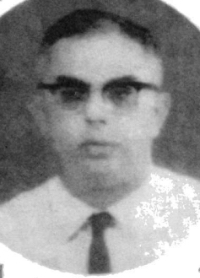 Wilmir Heart Soloman who passed away on 11th May 1970 was the first general manager of the People's Bank. In 1961, prior to becoming general manager of the people's bank, he was Chief Inspector Bank of Ceylon. In 1938 had been Manager in all departments of Bank of Ceylon as as in several branches. While serving in Bank of Ceylon, Mobile Banking Service was first Introduced to the bank by Soloman. Then, he had been working in five prestigious banks in England such as Barclays Bank, Westminster Bank, Lloyd's Bank, Bank of England and Manhattan Bank Within these organisations, he gained a wide knowledge of the banking system and had served, for a short period, as manager of Bank of Ceylon, London Branch, as well. Later, to gain further knowledge of banking procedures and systems, he was sent by the Sri Lanka Government to the Moscow State Bank, Russia.
Wilmir Heart Soloman who passed away on 11th May 1970 was the first general manager of the People's Bank. In 1961, prior to becoming general manager of the people's bank, he was Chief Inspector Bank of Ceylon. In 1938 had been Manager in all departments of Bank of Ceylon as as in several branches. While serving in Bank of Ceylon, Mobile Banking Service was first Introduced to the bank by Soloman. Then, he had been working in five prestigious banks in England such as Barclays Bank, Westminster Bank, Lloyd's Bank, Bank of England and Manhattan Bank Within these organisations, he gained a wide knowledge of the banking system and had served, for a short period, as manager of Bank of Ceylon, London Branch, as well. Later, to gain further knowledge of banking procedures and systems, he was sent by the Sri Lanka Government to the Moscow State Bank, Russia.
In 1961 the first General Manager of People's Bank and served in the same capacity with a lot of courage and devotion day and night, irrespective of time served, with great dedication for the progress and improvement of People's Bank. Having assumed duties as the first General Manager of People's Bank in 1961 till he retired in 1966, he worked incessantly with such dedication for the improvement of People's Banking Service, The rights privileges and the responsibilities of the employees whilst providing clean administration in the banking service.
The leadership of Soloman was unique. It is 44years since he passed away From the commencement of People's Banking Services, no employee had the good fortune of working under him will ever forget and shall not forget the immortal name "W.H, SOLOMAN a distinguished bank employee and a rare banking superior. He was also an ardent social worker a member of the F.O.C.H. Movement now an International Organizations which beginning in the battle field at France the last stages of World War Il. He could be said to have expended personal funds in the propagation of the F.O.C.H. H.W. Rathnayake
Movement whose activities among others covered the running of boy's club several parts of the Island; the beneficiaries of which were poor boys who deserved to be encouraged to become useful future citizens He was educated at Kingswood College, Kandy and later at Wesley College, Colombo. He Obtained the BSC (Econ:) degree from the University of London and became the first Ceylonese follow of the Institute of Banker’s London. He was a teetotaller and non-smoker being a Ruggerite in his days quite an unassuming with no heirs about him. Soloman was a passionate, gentlemen.
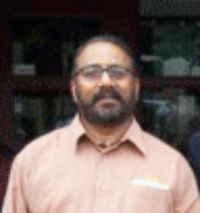 The Wesley College pavilion and the greener pasture attached to it, is none other than a place of heritage, history and divinity. So many of Wesley's sports personalities have gone through and lived through unforgettable experiences and nostalgic memories there. So many of international sports personalities have also been part of the history there. During my wonderful days at Wesley, the pavilion was used for Table Tennis and I really enjoyed every single moment of it (being part of the TT team, my brother Ram Parameswaran was also a member of the TT team). Playing cricket those days at Wesley was on matting wicket and I have to say the ground staff made sure the matches went on irrespective of the weather . Playing on "matting" is a matter of skill testing for cricketers and some of the visiting teams did not like to play on matting. I ponder and laugh now because cricket went from matting to turf and then astro turf and nothing can come close to matting wicket in my opinion. Our cricketers of yesteryears played excellent cricket and performed so well no matter "where they played or what wicket for cricket was presented to them". Wesley always maintained discipline, sportsmanship and intellectual prowess in any situation, condition or environment. These qualities have to be remembered and reminded as Double Blues marches towards Double Hundred not out (200).
The Wesley College pavilion and the greener pasture attached to it, is none other than a place of heritage, history and divinity. So many of Wesley's sports personalities have gone through and lived through unforgettable experiences and nostalgic memories there. So many of international sports personalities have also been part of the history there. During my wonderful days at Wesley, the pavilion was used for Table Tennis and I really enjoyed every single moment of it (being part of the TT team, my brother Ram Parameswaran was also a member of the TT team). Playing cricket those days at Wesley was on matting wicket and I have to say the ground staff made sure the matches went on irrespective of the weather . Playing on "matting" is a matter of skill testing for cricketers and some of the visiting teams did not like to play on matting. I ponder and laugh now because cricket went from matting to turf and then astro turf and nothing can come close to matting wicket in my opinion. Our cricketers of yesteryears played excellent cricket and performed so well no matter "where they played or what wicket for cricket was presented to them". Wesley always maintained discipline, sportsmanship and intellectual prowess in any situation, condition or environment. These qualities have to be remembered and reminded as Double Blues marches towards Double Hundred not out (200).
Campbell Park and the mini Oval (Lords) pavilion is and have always been an integral part of Wesley and all efforts on that front should be made in securing them for Wesley at any cost.
I love the way both Captain Navin De Silva and Rev. Ebenezer Joseph very aptly and diplomatically put forward the idea of Wesley owning the Campbell Park in front of the President of Sri Lanka and I thank both of them for that.
Congratulations to everyone who took the time and effort to reignite and rekindle the yearning for the Wesley spirit to survive and continue, marching forward with pride and excellence.
Ora et Labora
Links to further reading
This Memorable Photo was taken on the 3rd of November 1996
At Upali Perera's Daughters Wedding

Glen Reimers, O.K Hemachandra, Upali Perera, Robin Reimers, Maurice Mortier, Bill Deutrom, Hillary De Vos, Everard Schoorman, Arthlow Chapman, Errol Smith
.........................................................................
Hockey 1st XI Team - 1963
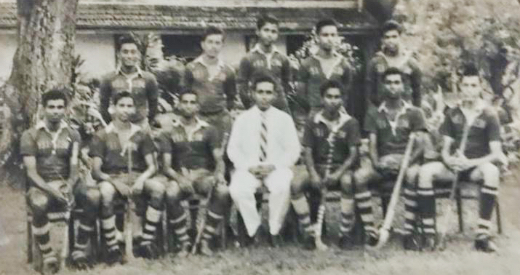
Lal Fernando,(Vice Capt) C.T Rodrigo, I.Thurairajah, Mr NAB Fernando (Master in Charge), Upali Perera(Capt),Sarath Wickramaratne, W.Deutrom,
Standing: L to R:
R.Jayasooriya,T.Maye, Devaraj, H Musafer, D Thiagalingam
.........................................................................
Rugby 1st XV Team - 1962

Upali Perera, H.Jayasekera, T.Collette, R. Oorloff, S.Wijesinghe, W.Deutrom, M.Harmer, S.Ekanayake, R.Bartholomeuz, R.Aaron
U.Chang, J.De Silva, N Christoffelsz
H.Claessen, Sharir Musafer
.........................................................................
From Dr Nihal D Amerasekera
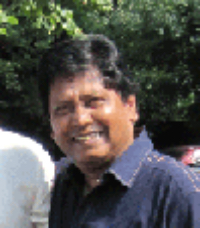 I first met Upali in 1952 when I joined the hostel at Wesley College. He was my classmate as were Dayaprasad Peiris, Chandra Weeraratne, Chandra Wijetunge and Nimal Sureweere. Upali's brother M.N.G Perera too was in the boarding with us.
I first met Upali in 1952 when I joined the hostel at Wesley College. He was my classmate as were Dayaprasad Peiris, Chandra Weeraratne, Chandra Wijetunge and Nimal Sureweere. Upali's brother M.N.G Perera too was in the boarding with us.
Upali’s interests were mainly in the sports field. The Small Park was the cradle of sports for all Wesleyites. We learnt to bat, bowl and kick a football in a small gravel field behind the school called the Small park. The likes of Neil Gallagher, A.R Chapman, Nalendra Abeysooriya, Kenneth De Silva, Senthil Sinniah and the Carnie brothers all started their cricket in the Small park. It was situated between Karlsruhe Gardens and the Nalanda Grounds, both ends lined by tall Andara trees. Every evening we were in the small park playing sports. I can still recall the intensity of those hard fought games.
When Upali left the boarding he continued with his love of sports. He proceeded most successfully to play hockey for the school and also captaining the 1st XI team in 1963. He also loved the rough and tumble of Rugby and played for the school team in 1962.
Everyone will remember Upali for the fun and mischief that he generated wherever he was. He had a group of friends who joined in the fun. They made those school years enjoyable and also most memorable. The group sometimes got into trouble with the prefects and the staff for breaking rules. Those fun years culminated in the Chamber of Horrors at an exhibition held at the school in 1962. A coffin was borrowed from a local funeral parlour. Perhaps there was a student acting as a dead body. His movements provided great entertainment and also much fear and anxiety, all for a good cause.
Upali emigrated to Melbourne Australia around 1973. He worked for Kodak for many years. Although far away from his roots he remained deeply loyal to Wesley. When Cecil d'With Barbut started the Old Boys Union in Melbourne to welcome Mr C.J Oorloff, Upali joined and became a committee member. This remains a vibrant school community even today.
I met Upali on my tour of Australia in 2009 when the old boys organised for me a most memorable reunion dinner with 50 people in attendance. It was such a great pleasure to meet so many of my school friends after the passage of so many decades. My friends from the school boarding were there in force. To meet Upali, Neville Ludowyke, Errol Smith and Arthur Barbut was a special treat. Bill Deutrom flew all the way from Brisbane for the event. I was so happy to see Robin Reimers who attended although unwell. It was so wonderful to see George and Beryl Robertson. This is indeed a most treasured memory. I will never forget that evening.
It was such a great pleasure to meet Upali and Charmaine in 2003 and then again in 2009 in London. We reminisced a great deal and enjoyed the many hilarious anecdotes about schooldays related in Upali's own inimitable style.
I wish Upali and Charmaine a long and happy retirement.
Links to further reading

Air Vice Marshal Shehan Wijayanayake, a proud product of Wesley College from the Class of 89. Being awarded the Sridharan Jeganathan trophy for the most sensational innings in 89 he played 1st XI Cricket and was a member of the 85 Champion side under M. Ganesh.
He won his College Colors in Hockey in 89 and represented CH & FC Hockey in 88/89. He player for the College 1st XV team and the U-19 Soccer team and was a member of the 1989 School champion team.
He was a Prefect and won the H.J Pieris award for the best all-rounder in the senior school in 1988. He captained Moscrop in 1989.
After leaving school he joined the Sri Lanka Air Force as a Cadet Officer with other Wesleyites such as Air Commodore Sampath Wickramarathna (Pilot), Wing Commander S. Jaladin (Rtd), Ramzil Noordeen (Now SSP) and Saman Menaka.
We pass on to Air Vice Marshal Shehan Wijayanayake our very best wishes.



